
The Project Gutenberg EBook of The American Revolution, by John Fiske This eBook is for the use of anyone anywhere at no cost and with almost no restrictions whatsoever. You may copy it, give it away or re-use it under the terms of the Project Gutenberg License included with this eBook or online at www.gutenberg.org Title: The American Revolution Author: John Fiske Release Date: November 2, 2012 [EBook #41266] Language: English Character set encoding: ISO-8859-1 *** START OF THIS PROJECT GUTENBERG EBOOK THE AMERICAN REVOLUTION *** Produced by Charlene Taylor, KD Weeks, Charles Franks and the Online Distributed Proofreading Team at http://www.pgdp.net
TRANSCRIBER’S NOTE:
Very few corrections were made. The few that were made were due to obvious printer’s errors, and are cataloged, in a note at the end of this text. A few instances of missing punctuation have been silently added, where space for it can be seen on the printed page.
Several images of documents are included. Transcriptions of these texts appear in the end notes as well and are linked from each caption as "See Transcription".
This text included two volumes, with separate tables of content and pagination. Both tables refer to the original pagination. Each entry will direct the reader to the relevant page in each Volume.Clicking on these highlighted texts will direct the reader back to the associated page of the Table of Contents. The topics were nearly all printed as marginal “sidenotes”. Depending on your reading device, you may see these topics as right-justified blocks or as highlighted phrases in line with the text.

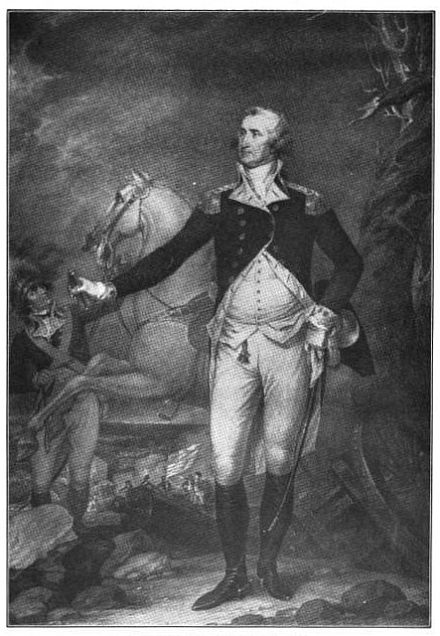
WASHINGTON AT TRENTON
By John Trumball
BY
JOHN FISKE
With Many Illustrations
TWO VOLUMES IN ONE

Published for
THE EDUCATIONAL PRESS
By
HOUGHTON MIFFLIN COMPANY
BOSTON
COPYRIGHT, 1891, BY JOHN FISKE
COPYRIGHT, 1896, BY HOUGHTON, MIFFLIN AND COMPANY
COPYRIGHT, 1919, BY ABBY M. FISKE
ALL RIGHTS RESERVED, INCLUDING THE RIGHT TO REPRODUCE
THIS BOOK OR PARTS THEREOF IN ANY FORM
The Riverside Press
CAMBRIDGE MASSACHUSETTS
PRINTED IN THE U.S.A.
TO
MRS. MARY HEMENWAY
IN RECOGNITION OF THE RARE FORESIGHT AND PUBLIC SPIRIT
WHICH SAVED FROM DESTRUCTION ONE OF THE NOBLEST
HISTORIC BUILDINGS IN AMERICA, AND MADE IT A
CENTRE FOR THE TEACHING OF AMERICAN
HISTORY AND THE PRINCIPLES OF
GOOD CITIZENSHIP
I DEDICATE THIS BOOK
| CHAPTER I THE BEGINNINGS | |
|---|---|
| PAGE | |
| Relations between the American colonies and the British government in the first half of the eighteenth century | 1 |
| The Lords of Trade | 2 |
| The governors’ salaries | 3 |
| Sir Robert Walpole | 4 |
| Views of the Lords of Trade as to the need for a union of the colonies | 5 |
| Weakness of the sentiment of union | 6 |
| The Albany Congress | 6 |
| Franklin’s plan for a federal union (1754) | 7, 8 |
| Rejection of Franklin’s plan | 9 |
| Shirley recommends a stamp act | 10 |
| The writs of assistance | 11 |
| The chief justice of New York | 12 |
| Otis’s “Vindication” | 13 |
| Expenses of the French War | 14 |
| Grenville’s resolves | 15 |
| Reply of the colonies | 16 |
| Passage of the Stamp Act | 17 |
| Patrick Henry and the Parsons’ Cause | 18 |
| Resolutions of Virginia concerning the Stamp Act | 19, 20 |
| The Stamp Act Congress | 20-22 |
| Declaration of the Massachusetts assembly | 22 |
| Resistance to the Stamp Act in Boston | 23 |
| And in New York | 24 |
| Debate in the House of Commons | 25, 26 |
| Repeal of the Stamp Act | 26, 27 |
| The Duke of Grafton’s ministry | 28 |
| Charles Townshend and his revenue acts | 29-31 |
| Attack upon the New York assembly | 32 |
| Parliament did not properly represent the British people | 32, 33 |
| Difficulty of the problem | 34 |
| Representation of Americans in Parliament | 35 |
| Mr. Gladstone and the Boers | 36 |
| Death of Townshend | 37 |
| His political legacy to George III. | 37 |
| Character of George III. | 38, 39 |
| English parties between 1760 and 1784 | 40, 41 |
| George III. as a politician | 42 |
| His chief reason for quarrelling with the Americans | 42, 43 |
| CHAPTER II THE CRISIS | |
| Character of Lord North | 44 |
| John Dickinson and the “Farmer’s Letters” | 45 |
| The Massachusetts circular letter | 46, 47 |
| Lord Hillsborough’s instructions to Bernard | 48 |
| The “Illustrious Ninety-Two” | 48 |
| Impressment of citizens | 49 |
| Affair of the sloop Liberty | 49-51 |
| Statute of Henry VIII. concerning “treason committed abroad” | 52 |
| Samuel Adams makes up his mind (1768) | 53-56 |
| Arrival of troops in Boston | 56, 57 |
| Letters of “Vindex” | 58 |
| Debate in Parliament | 59, 60 |
| All the Townshend acts, except the one imposing a duty upon tea, to be repealed | 61 |
| Recall of Governor Bernard | 61 |
| Character of Thomas Hutchinson | 62 |
| Resolutions of Virginia concerning the Townshend acts | 63 |
| Conduct of the troops in Boston | 64 |
| Assault on James Otis | 64 |
| The “Boston Massacre” | 65-68 |
| Some of its lessons | 69-72 |
| Lord North becomes prime minister | 72 |
| Action of the New York merchants | 73 |
| Assemblies convened in strange places | 74 |
| Taxes in Maryland | 74 |
| The “Regulators” in North Carolina | 74 |
| Affair of the schooner Gaspee | 75, 76 |
| The salaries of the Massachusetts judges | 76 |
| Jonathan Mayhew’s suggestion (1766) | 77 |
| The committees of correspondence in Massachusetts | 78 |
| Intercolonial committees of correspondence | 79 |
| Revival of the question of taxation | 80 |
| The king’s ingenious scheme for tricking the Americans into buying the East India Company’s tea | 81 |
| How Boston became the battle-ground | 82 |
| Advice solemnly sought and given by the Massachusetts towns | 82-84 |
| Arrival of the tea; meeting at the Old South | 84, 85 |
| The tea-ships placed under guard | 85 |
| Rotch’s dilatory manœuvres | 86 |
| Great town meeting at the Old South | 87, 88 |
| The tea thrown into the harbour | 88, 89 |
| Moral grandeur of the scene | 90, 91 |
| How Parliament received the news | 91-93 |
| The Boston Port Bill | 93 |
| The Regulating Act | 93-95 |
| Act relating to the shooting of citizens | 96 |
| The quartering of troops in towns | 96 |
| The Quebec Act | 96 |
| General Gage sent to Boston | 97, 98 |
| CHAPTER III THE CONTINENTAL CONGRESS | |
| Protest of the Whig Lords | 99 |
| Belief that the Americans would not fight | 100 |
| Belief that Massachusetts would not be supported by the other colonies | 101 |
| News of the Port Bill | 101, 102 |
| Samuel Adams at Salem | 103, 104 |
| Massachusetts nullifies the Regulating Act | 105 |
| John Hancock and Joseph Warren | 106, 107 |
| The Suffolk County Resolves | 108 |
| Provincial Congress in Massachusetts | 109 |
| First meeting of the Continental Congress (September 5, 1774) | 110, 111 |
| Debates in Parliament | 112, 113 |
| William Howe appointed commander-in-chief of the forces in America | 113 |
| Richard, Lord Howe, appointed admiral of the fleet | 114 |
| Franklin returns to America | 115 |
| State of feeling in the middle colonies | 116 |
| Lord North’s mistaken hopes of securing New York | 117 |
| Affairs in Massachusetts | 101 |
| Dr. Warren’s oration at the Old South | 119 |
| Attempt to corrupt Samuel Adams | 120 |
| Orders to arrest Adams and Hancock | 121 |
| Paul Revere’s ride | 122, 123 |
| Pitcairn fires upon the yeomanry at Lexington | 124, 125 |
| The troops repulsed at Concord; their dangerous situation | 126, 127 |
| The retreating troops rescued by Lord Percy | 128 |
| Retreat continued from Lexington to Charlestown | 129 |
| Rising of the country; the British besieged in Boston | 130 |
| Effects of the news in England and in America | 130-133 |
| Mecklenburg County Resolves | 133 |
| Legend of the Mecklenburg “Declaration of Independence” | 133-135 |
| Benedict Arnold and Ethan Allen | 135 |
| Capture of Ticonderoga and Crown Point | 136-140 |
| Second meeting of the Continental Congress | 141 |
| Appointment of George Washington to command the Continental army | 142-144 |
| The siege of Boston | 145 |
| Gage’s proclamation | 145 |
| The Americans occupy Bunker’s and Breed’s hills | 146 |
| Arrival of Putnam, Stark, and Warren | 147 |
| Gage decides to try an assault | 148, 149 |
| First assault repulsed | 149 |
| Second assault repulsed | 150 |
| Prescott’s powder gives out | 150 |
| Third assault succeeds; the British take the hill | 151 |
| British and American losses | 151, 152 |
| Excessive slaughter; significance of the battle | 153 |
| Its moral effects | 154 |
| CHAPTER IV INDEPENDENCE | |
| Washington’s arrival in Cambridge | 155 |
| Continental officers: Daniel Morgan | 156 |
| Benedict Arnold, John Stark, John Sullivan | 157 |
| Nathanael Greene, Henry Knox | 158 |
| Israel Putnam | 159 |
| Horatio Gates and Charles Lee | 160 |
| Lee’s personal peculiarities | 161, 162 |
| Dr. Benjamin Church | 163 |
| Difficult work for Washington | 164 |
| Absence of governmental organization | 165 |
| New government of Massachusetts (July, 1775) | 166 |
| Congress sends a last petition to the king | 167 |
| The king issues a proclamation, and tries to hire troops from Russia | 168-170 |
| Catherine refuses; the king hires German troops | 170 |
| Indignation in Germany | 171 |
| Burning of Falmouth (Portland) | 171 |
| Effects of all this upon Congress | 172, 173 |
| Montgomery’s invasion of Canada and capture of Montreal | 174, 175 |
| Arnold’s march through the wilderness of Maine | 176 |
| Assault upon Quebec (December 31, 1775) | 177 |
| Total failure of the attempt upon Canada | 178 |
| The siege of Boston | 179 |
| Washington seizes Dorchester Heights (March 4, 1776) | 180, 181 |
| The British troops evacuate Boston (March 17) | 182, 183 |
| Movement toward independence; a provisional flag (January 1, 1776) | 184 |
| Effect of the hiring of “myrmidons” | 185 |
| Thomas Paine | 185 |
| His pamphlet entitled “Common Sense” | 186, 187 |
| Fulminations and counter-fulminations | 188 |
| The Scots in North Carolina | 188 |
| Sir Henry Clinton sails for the Carolinas | 189 |
| The fight at Moore’s Creek; North Carolina declares for independence | 189 |
| Action of South Carolina and Georgia | 190 |
| Affairs in Virginia; Lord Dunmore’s proclamation | 190 |
| Skirmish at the Great Bridge, and burning of Norfolk | 191 |
| Virginia declares for independence | 192 |
| Action of Rhode Island and Massachusetts | 192 |
| Resolution adopted in Congress May 15 | 193 |
| Instructions from the Boston town meeting | 194 |
| Richard Henry Lee’s motion in Congress | 194 |
| Debate on Lee’s | 195, 196 |
| Action of the other colonies; Connecticut and New Hampshire | 196 |
| New Jersey | 197 |
| Pennsylvania and Delaware | 197-199 |
| Maryland | 199 |
| The situation in New York | 200 |
| The Tryon plot | 201 |
| Final debate on Lee’s motion | 202 |
| Vote on Lee’s motion | 203 |
| Form of the Declaration of Independence | 204 |
| Thomas Jefferson | 204, 205 |
| The declaration was a deliberate expression of the sober thought of the American people | 206, 207 |
| CHAPTER V FIRST BLOW AT THE CENTRE | |
| Lord Cornwallis arrives upon the scene | 208 |
| Battle of Fort Moultrie (June 28, 1776) | 209-211 |
| British plan for conquering the valley of the Hudson, and cutting the United Colonies in twain | 212 |
| Lord Howe’s futile attempt to negotiate with Washington unofficially | 213, 214 |
| The military problem at New York | 214-216 |
| Importance of Brooklyn Heights | 217 |
| Battle of Long Island (August 27, 1776) | 218-220 |
| Howe prepares to besiege the Heights | 220 |
| But Washington slips away with his army | 221 |
| And robs the British of the most golden opportunity ever offered them | 221-223 |
| The conference at Staten Island | 223, 224 |
| General Howe takes the city of New York September 15 | 224 |
| But Mrs. Lindley Murray saves the garrison | 225 |
| Attack upon Harlem Heights | 225 |
| The new problem before Howe | 225, 226 |
| He moves upon Throg’s Neck, but Washington changes base | 227 |
| Baffled at White Plans, Howe tries a new plan | 228 |
| Washington’s orders in view of the emergency | 228 |
| Congress meddles with the situation and muddles it | 229 |
| Howe takes Fort Washington by storm (November 16) | 230 |
| Washington and Greene | 231 |
| Outrageous conduct of Charles Le | 231, 232 |
| Greene barely escapes from Fort Lee (November 20) | 233 |
| Lee intrigues against Washington | 233, 234 |
| Washington retreats into Pennsylvania | 234 |
| Reinforcements come from Schuyler | 235 |
| Fortunately for the Americans, the British capture Charles Lee (December 13) | 235-238 |
| The times that tried men’s souls | 238, 239 |
| Washington prepares to strike back | 239 |
| He crosses the Delaware, and pierces the British centre at Trenton (December 26) | 240, 241 |
| Cornwallis comes up to retrieve the disaster | 242 |
| And thinks he has run down the “old fox" at the Assunpink (January 2, 1777) | 242 |
| But Washington prepares a checkmate | 243 |
| And again severs the British line at Princeton (January 3) | 244 |
| General retreat of the British upon New York | 245 |
| The tables completely turned | 246 |
| Washington’s superb generalship | 247 |
| Effects in England | 248 |
| And in France | 249 |
| Franklin’s arrival in France | 250 |
| Secret aid from France | 251 |
| Lafayette goes to America | 252 |
| Efforts toward remodelling the Continental army | 252-255 |
| Services of Robert Morris | 255 |
| Ill feeling between the states | 256 |
| Extraordinary powers conferred upon Washington | 257-258 |
| CHAPTER VI SECOND BLOW AT THE CENTRE | |
| Invasion of New York by Sir Guy Carleton | 259 |
| Arnold’s preparations | 260 |
| Battle of Valcour Island (October 11, 1776) | 260-262 |
| Congress promotes five junior brigadiers over Arnold (February 19, 1777) | 262 |
| Character of Philip Schuyler | 263 |
| Horatio Gates | 264 |
| Gates intrigues against Schuyler | 265 |
| His unseemly behaviour before Congress | 266 |
| Charges against Arnold | 267, 268 |
| Arnold defeats Tryon at Ridgefield (April 27, 1777) | 269 |
| Preparations for the summer campaign | 269 |
| The military centre of the United States was the state of New York | 270 |
| A second blow was to be struck at the centre; the plan of campaign | 271 |
| The plan was unsound; it separated the British forces too widely, and gave the Americans the advantage of interior lines | 272-274 |
| Germain’s fatal error; he overestimated the strength of the Tories | 274 |
| Too many unknown quantities | 275 |
| Danger from New England ignored | 276 |
| Germain’s negligence; the dispatch that was never sent | 277 |
| Burgoyne advances upon Ticonderoga | 277, 278 |
| Phillips seizes Mount Defiance | 279 |
| Evacuation of Ticonderoga | 279 |
| Battle of Hubbardton (July 7) | 280 |
| One swallow does not make a summer | 280-282 |
| The king’s glee; wrath of John Adams | 282 |
| Gates was chiefly to blame | 282 |
| Burgoyne’s difficulties beginning | 283 |
| Schuyler wisely evacuates Fort Edward | 284 |
| Enemies gathering in Burgoyne’s rear | 285 |
| Use of Indian auxiliaries | 285 |
| Burgoyne’s address to the chiefs | 286 |
| Burke ridicules the address | 286 |
| The story of Jane McCrea | 287, 288 |
| The Indians desert Burgoyne | 289 |
| Importance of Bennington; Burgoyne sends a German force against it | 290 |
| Stark prepares to receive the Germans | 291 |
| Battle of Bennington (August 16); nearly the whole German army captured on the field | 292, 293 |
| Effect of the news; Burgoyne’s enemies multiply | 294 |
| Advance of St. Leger upon Fort Stanwix | 295 |
| Herkimer marches against him; Herkimer’s plan | 296 |
| Failure of the plan | 297 |
| Thayendanegea prepares an ambuscade | 298 |
| Battle of Oriskany (August 6) | 298-300 |
| Colonel Willett’s sortie; first hoisting of the stars and stripes | 300-301 |
| Death of Herkimer | 301 |
| Arnold arrives at Schuyler’s camp | 302 |
| And volunteers to retrieve Fort Stanwix | 303 |
| Yan Yost Cuyler and his stratagem | 304 |
| Flight of St. Leger (August 22) | 305 |
| Burgoyne’s dangerous situation | 306 |
| Schuyler superseded by Gates | 306 |
| Position of the two armies (August 19-September 12) | 307 |
| CHAPTER VII SARATOGA | |
| Why Sir William Howe went to Chesapeake Bay | 308 |
| Charles Lee in captivity | 308-310 |
| Treason of Charles Lee | 311-314 |
| Folly of moving upon Philadelphia as the “rebel capital” | 314, 315 |
| Effect of Lee’s advice | 315 |
| Washington’s masterly campaign in New Jersey (June, 1777) | 316, 317 |
| Uncertainty as to Howe’s next movements | 317, 318 |
| Howe’s letter to Burgoyne | 318 |
| Comments of Washington and Greene | 319, 320 |
| Howe’s alleged reason trumped up and worthless | 320 |
| Burgoyne’s fate was practically decided when Howe arrived at Elkton | 321 |
| Washington’s reasons for offering battle | 321 |
| He chooses a very strong position | 322 |
| Battle of the Brandywine (September 11) | 322-326 |
| Washington’s skill in detaining the enemy | 326 |
| The British enter Philadelphia (September 26) | 326 |
| Significance of Forts Mercer and Mifflin | 327 |
| The situation at Germantown | 327, 328 |
| Washington’s audacious plan | 328 |
| Battle of Germantown (October 4) | 329-332 |
| Howe captures Forts Mercer and Mifflin | 333 |
| Burgoyne recognizes the fatal error of Germain | 333 |
| Nevertheless he crosses the Hudson River | 334 |
| First battle at Freeman’s Farm (September 19) | 335 |
| Quarrel between Gates and Arnold | 336-337 |
| Burgoyne’s supplies cut off | 338 |
| Second battle at Freeman’s Farm (October 7); the British totally defeated by Arnold | 338-340 |
| The British army is surrounded | 341 |
| Sir Henry Clinton comes up the river, but it is too late | 342 |
| The silver bullet | 343 |
| Burgoyne surrenders (October 17) | 343, 344 |
| Schuyler’s magnanimity | 345 |
| Bad faith of Congress | 346-349 |
| The behaviour of Congress was simply inexcusable | 350 |
| What became of the captured army | 350, 351 |
During the seventy years which elapsed between the overthrow of the Stuart dynasty and the victory of Wolfe on the Heights of Abraham, the relations between the American colonies and the British government were, on the whole, peaceful; and the history of the colonies, except for the great and romantic struggle with New France, would have been almost destitute of striking incidents. In view of the perpetual menace from France, it was clearly unwise for the British government to irritate the colonies, or do anything to weaken their loyalty; and they were accordingly left very much to themselves. Still, they were not likely to be treated with any great liberality,—for such was not then, as it is hardly even yet, the way of governments,—and if their attachment to England still continued strong, it was in spite of the general demeanour of the mother-country. The Lords of TradeSince 1675 the general supervision of the colonies had been in the hands of a standing committee of the Privy Council, styled the “Lords of the Committee of Trade and Plantations,” and familiarly known as the “Lords of Trade.” To this board the governors sent frequent and full reports of the proceedings in the colonial legislatures, of the state of agriculture and trade, of the revenues of the colonies, and of the way in which the public money was spent. In private letters, too, the governors poured forth their complaints into the ears of the Lords of Trade, and these complaints were many and loud. Except in Pennsylvania and Maryland, which were like hereditary monarchies, and in Connecticut and Rhode Island, where the governors were elected by the people, the colonial governors were now invariably appointed by the Crown. In most cases they were inclined to take high views regarding the royal prerogative, and in nearly all cases they were unable to understand the political attitude of the colonists, who on the one hand gloried in their connection with England, and on the other hand, precisely because they were Englishmen, were unwilling to yield on any occasion whatsoever one jot or tittle of their ancient liberties. Moreover, through the ubiquity of the popular assemblies and the directness of their control over the administration of public affairs, the political life of America was both really and ostensibly freer than that of England was at that time; and the ancient liberties of Englishmen, if not better preserved, were at least more conspicuously asserted. As a natural consequence, the royal governors were continually trying to do things which the people would not let them do, they were in a chronic state of angry warfare with their assemblies, and they were incessant in their complaints to the Lords of Trade. They represented the Americans as a factious and turbulent people, with their heads turned by queer political crotchets, unwilling to obey the laws and eager to break off their connection with the British Empire. In this way they did much to arouse an unfriendly feeling toward the colonies, although eminent Englishmen were not wanting who understood American affairs too well to let their opinions be thus lightly influenced. Upon the Lords of Trade these misrepresentations wrought with so much effect that now and then they would send out instructions to suspend the writ of habeas corpus, or to abridge the freedom of the press. Sometimes their acts were absurdly arbitrary. In New Hampshire, the people maintained that as free-born Englishmen they had the right to choose their representatives; but the governor held, on the contrary, that this was no right, but only a privilege, which the Crown might withhold, or grant, or revoke, all at its own good pleasure. To uphold the royal prerogative, the governor was instructed to issue writs for elections to some of the towns, while withholding them from others; but the resistance of the people to this piece of tyranny was so determined that the Lords of Trade thought it best to yield. The governor’s salary In Massachusetts, for more than thirty years, there went on an unceasing controversy between the General Court and the successive royal governors, Shute, Burnet, and Belcher, with reference to the governor’s salary. The Lords of Trade insisted that the governor should be paid a fixed salary; but lest this should make the governor too independent, the General Court obstinately refused to establish a salary, but made grants to the governor from year to year, in imitation of the time-honoured usage of Parliament. This method was, no doubt, inconvenient for the governors; but the colonists rightly valued it as one of the safeguards of popular liberty, and to their persistent refusal the Crown was obliged to give way. Similar controversies, in New York and South Carolina, were attended with similar results; while in Virginia the assembly more than once refused to vote supplies, on the ground that the liberties of the colony were in danger.
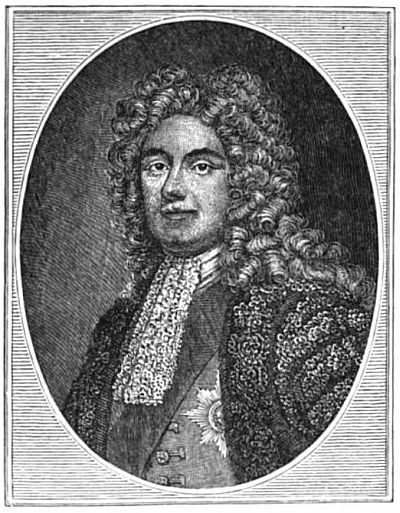
SIR ROBERT WALPOLE
Such grievances as these, reported year by year to the Lords of Trade,
and losing nothing in the manner in which they were told, went far to
create in England an opinion that America was a lawless country, and
sorely in need of a strong government. From time to time various schemes
were proposed for limiting the powers of the colonial assemblies, for
increasing the power of the governors, for introducing a titled
nobility, for taxing the colonists by act of Parliament, or for
weakening the feeling of local independence by uniting several colonies
into one. Until after the French troubles had been disposed of, little
came of any of these schemes. Sir Robert Walpole
A plan for taxing the colonies was once
proposed to Sir Robert Walpole, but the sagacious old statesman
dismissed it with a laugh. “What!” said he. “I have half of Old England
set against me already, and do you think I will have all New England
likewise?” From time to time the liberal charters of Rhode Island and
Connecticut were threatened, but nothing came of this. But in one
direction the Lords of Trade were more active. One of their most
cherished plans was to bring about a union of all the colonies under a
single head; but this was not to be a union of the kind which the
Americans, with consummate statesmanship, afterward wrought out for
themselves. It was not to be a union based upon the idea of the
sacredness of local self-government, but it was a union to be achieved,
as far as possible, at the expense of local self-government. To bring
all the colonies together under a single viceroy would, it was thought,
diminish seriously the power of each local assembly, while at the same
time such a union would no doubt make the military strength of the
colonies much more available in case of war.  In 1764, Francis Bernard,
Governor of Massachusetts, wrote that “to settle the American
governments to the greatest possible advantage, it will be necessary to
reduce the number of them; in some places to unite and consolidate; in
others to separate and transfer; and in general to divide by natural
boundaries instead of imaginary lines. If there should be but one form
of government established for the North American provinces, it would
greatly facilitate the reformation of them.” As long ago as 1701, Robert
Livingston of New York had made similar suggestions; and in 1752,
Dinwiddie of Virginia recommended that the Northern and Southern
colonies be united respectively into two great confederacies.
In 1764, Francis Bernard,
Governor of Massachusetts, wrote that “to settle the American
governments to the greatest possible advantage, it will be necessary to
reduce the number of them; in some places to unite and consolidate; in
others to separate and transfer; and in general to divide by natural
boundaries instead of imaginary lines. If there should be but one form
of government established for the North American provinces, it would
greatly facilitate the reformation of them.” As long ago as 1701, Robert
Livingston of New York had made similar suggestions; and in 1752,
Dinwiddie of Virginia recommended that the Northern and Southern
colonies be united respectively into two great confederacies.
The desirableness of bringing about a union of the colonies was also recognized by all the most liberal-minded American statesmen, though from a very different point of view. They agreed with the royal governors and with the Lords of Trade as to the urgent need for concentrating the military strength of the colonies, and they thought that this end could best be subserved by some kind of federal union. But at the same time they held that the integrity of the local self-government of each colony was of the first importance, and that no system of federation would be practicable which should in any degree essentially impair that integrity. To bring about a federal union on such terms was no easy matter; it was a task fitted to tax the greatest of statesmen at any time. At that time it was undoubtedly a hopeless task. The need for union was not generally felt by the people. Weakness of the sentiment of unionThe sympathies between the different colonies were weak and liable to be overborne by prejudices arising from rivalry or from differences in social structure. To the merchant of Boston, the Virginian planter was still almost a foreigner, though both the one and the other were pure-blooded Englishmen. Commercial jealousies were very keen. Disputes about boundaries were not uncommon. In 1756, Georgia and South Carolina actually came to blows over the navigation of the Savannah river. Jeremiah Dummer, in his famous “Defence of the New England Charters,” said that it was impossible that the colonies should ever be brought to unite; and Burnaby thought that if the hand of Great Britain were once taken off, there would be chronic civil war all the way from Maine to Georgia.
The Albany CongressIn 1754, the prospect of immediate war with the French led several of
the royal governors to call for a congress of all the colonies, to be
held at Albany. The primary purpose of the meeting was to make sure of
the friendship of the Six Nations, and to organize a general scheme of
operations against the French. The secondary purpose was to prepare some
plan of confederation which all the colonies might be persuaded to
adopt. New Hampshire, Massachusetts, Rhode Island, Connecticut, New
York, Pennsylvania, and Maryland—only seven colonies of the
thirteen—sent commissioners to this congress. The people showed little
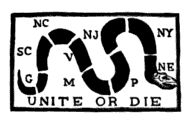 interest in the movement. It does not appear that any public meetings
were held in favour of it. Among the newspapers, the only one which
warmly approved of it seems to have been the “Pennsylvania Gazette,”
edited by Benjamin Franklin, which appeared with a union device and the
motto “Unite or Die!”
interest in the movement. It does not appear that any public meetings
were held in favour of it. Among the newspapers, the only one which
warmly approved of it seems to have been the “Pennsylvania Gazette,”
edited by Benjamin Franklin, which appeared with a union device and the
motto “Unite or Die!”
The circumstances of Franklin’s life, no less than the wide sweep of his intelligence, had fitted him for sounder views of the political needs of the time than were taken by most of his contemporaries. As a native of Massachusetts who dwelt in Pennsylvania, he may be said to have belonged to two very different colonies; and he had spent time enough in London to become well acquainted with British ideas.Franklin’s plan of union, 1754 During the session of the Albany Congress, a first attempt was made to establish a permanent union of the thirteen colonies. It was to Franklin that the plan was chiefly due. The legislative assembly of each colony was to choose, once in three years, representatives to attend a federal Grand Council; which was to meet every year at Philadelphia, a town which could be reached by a twenty days’ journey either from South Carolina or from New Hampshire. This Grand Council was to choose its own speaker, and could neither be dissolved nor prorogued, nor kept sitting longer than six weeks at any one time, except by its own consent or by especial order of the Crown. The Grand Council was to make treaties with the Indians and to regulate the Indian trade; and it was to have sole power of legislation on all matters concerning the colonies as a whole. To these ends, it could levy taxes, enlist soldiers, build forts, and nominate all civil officers. Its laws were to be submitted to the king for approval, and the royal veto, in order to be of effect, must be exercised within three years.
To this Grand Council each colony was to send a number of representatives, proportioned to its contributions to the continental military service; yet no colony was to send less than two or more than seven representatives. With the exception of such matters of general concern as were to be managed by the Grand Council, each colony was to retain its powers of legislation intact. On an emergency, any colony might singly defend itself against foreign attack, and the federal government was prohibited from impressing soldiers or seamen without the consent of the local legislature.
The supreme executive power was to be vested in a president or governor-general, appointed and paid by the Crown. He was to nominate all military officers, subject to the approval of the Grand Council, and was to have a veto on all the acts of the Grand Council. No money could be issued save by joint order of the governor-general and the council.
This plan, said Franklin, “is not altogether to my mind, but it is as I could get it.” It should be observed, to the credit of its author, that this scheme, long afterward known as the “Albany Plan,” contemplated the formation of a self-sustaining federal government, and not of a mere league. As Frothingham well says, “It designed to confer on the representatives of the people the power of making laws acting directly on individuals, and appointing officers to execute them, and yet not to interfere with the execution of the laws operating on the same individuals by the local officers.” It would have erected “a public authority as obligatory in its sphere as the local governments were in their spheres.” In this respect it was much more complete than the scheme of confederation agreed on in Congress in 1777, and it afforded a valuable precedent for the more elaborate and perfect Federal Constitution of 1787. It was in its main features a noble scheme, and the great statesman who devised it was already looking forward to the immense growth of the American Union, though he had not yet foreseen the separation of the colonies from the mother-country. In less than a century, he said, the great country behind the Alleghanies must become “a populous and powerful dominion;” and he recommended that two new colonies should at once be founded in the West,—the one on Lake Erie, the other in the valley of the Ohio,—with free chartered governments like those of Rhode Island and Connecticut.
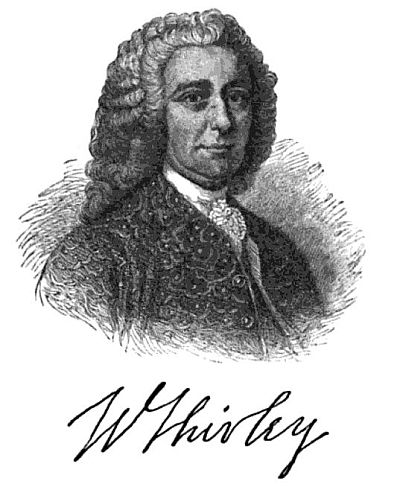
But public opinion was not yet ripe for the adoption of Franklin’s bold and comprehensive ideas. Of the royal governors who were anxious to see the colonies united on any terms, none opposed the plan except Delancey of New York, who wished to reserve to the governors a veto upon all elections of representatives to the Grand Council. To this it was rightly objected that such a veto power would virtually destroy the freedom of elections, and make the Grand Council an assembly of creatures of the governors.Rejection of the plan On the popular side the objections were many. The New England delegates, on the whole, were the least disinclined to union; yet Connecticut urged that the veto power of the governor-general might prove ruinous to the whole scheme; that the concentration of all the military forces in his hands would be fraught with dangers to liberty; and that even the power of taxation, lodged in the hands of an assembly so remote from local interests, was hardly compatible with the preservation of the ancient rights of Englishmen. After long debate, the assembly at Albany decided to adopt Franklin’s plan, and copies of it were sent to all the colonies for their consideration. But nowhere did it meet with approval. The mere fact that the royal governors were all in favour of it—though their advocacy was at present, no doubt, determined mainly by sound military reasons—was quite enough to create an insuperable prejudice against it on the part of the people. The Massachusetts legislature seems to have been the only one which gave it a respectful consideration, albeit a large town meeting in Boston denounced it as subversive of liberty. Pennsylvania rejected it without a word of discussion. None of the assemblies favoured it. On the other hand, when sent over to England to be inspected by the Lords of Trade, it only irritated and disgusted them. As they truly said, it was a scheme of union “complete in itself;” and ever since the days of the New England confederacy the Crown had looked with extreme jealousy upon all attempts at concerted action among the colonies which did not originate with itself. Besides this, the Lords of Trade were now considering a plan of their own for remodelling the governments of the colonies, establishing a standing army, enforcing the navigation acts, and levying taxes by authority of Parliament. Accordingly little heed was paid to Franklin’s ideas. Though the royal governors had approved the Albany plan, in default of any scheme of union more to their minds, they had no real sympathy with it.Shirley recommends a stamp actIn 1756, Shirley wrote to the Lords of Trade, urging upon them the paramount necessity for a union of the American colonies, in order to withstand the French; while at the same time he disparaged Franklin’s scheme, as containing principles of government unfit even for a single colony like Rhode Island, and much more unfit for a great American confederacy. The union, he urged, should be effected by act of Parliament, and by the same authority a general fund should be raised to meet the expenses of the war,—an end which Shirley thought might be most speedily and quietly attained by means of a “stamp duty.” As Shirley had been for fifteen years governor of Massachusetts, and was now commander-in-chief of all the troops in America, his opinion had great weight with the Lords of Trade; and the same views being reiterated by Dinwiddie of Virginia, Sharpe of Maryland, Hardy of New York, and other governors, the notion that Parliament must tax the Americans became deeply rooted in the British official mind.
Writs of assistanceNothing was done, however, until the work of the French war had been accomplished. In 1761, it was decided to enforce the Navigation Act, and one of the revenue officers at Boston applied to the superior court for a “writ of assistance,” or general search-warrant, to enable him to enter private houses and search for smuggled goods, but without specifying either houses or goods. Such general warrants had been allowed by a statute of the bad reign of Charles II., and a statute of William III., in general terms, had granted to revenue officers in America like powers to those they possessed in England. But James Otis showed that the issue of such writs was contrary to the whole spirit of the British constitution. To issue such universal warrants allowing the menials of the custom house, on mere suspicion, and perhaps from motives of personal enmity, to invade the home of any citizen, without being held responsible for any rudeness they might commit there,—such, he said, was “a kind of power, the exercise of which cost one king of England his head and another his throne;” and he plainly declared that even an act of Parliament which should sanction so gross an infringement of the immemorial rights of Englishmen would be treated as null and void. Chief Justice Hutchinson granted the writs of assistance, and as an interpreter of the law he was doubtless right in so doing; but Otis’s argument suggested the question whether Americans were bound to obey laws which they had no share in making, and his passionate eloquence made so great an impression upon the people that this scene in the court room has been since remembered—and not unjustly—as the opening scene of the American Revolution.
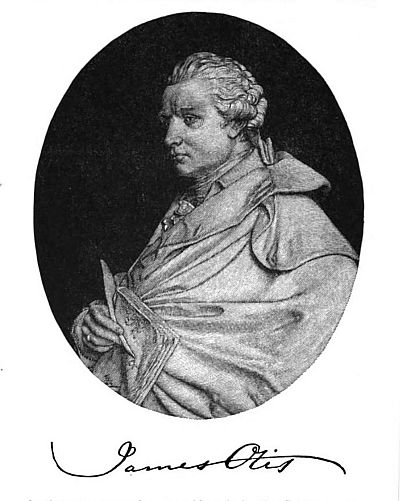
The chief justice of New YorkIn the same year the arbitrary temper of the government was exhibited in New York. Down to this time the chief justice of the colony had held office only during good behaviour, and had been liable to dismissal at the hands of the colonial assembly. The chief justice was now made removable only by the Crown, a measure which struck directly at the independent administration of justice in the colony. The assembly tried to protect itself by refusing to assign a fixed salary to the chief justice, whereupon the king ordered that the salary should be paid out of the quit-rents for the public lands. At the same time instructions were sent to all the royal governors to grant no judicial commissions for any other period than “during the king’s pleasure;” and to show that this was meant in earnest, the governor of New Jersey was next year peremptorily dismissed for commissioning a judge “during good behaviour.”
In 1762, a question distinctly involving the right of the people to control the expenditure of their own money came up in Massachusetts. Governor Bernard, without authority from the assembly, had sent a couple of ships to the northward, to protect the fisheries against French privateers, and an expense of some £400 had been thus incurred. The assembly was now ordered to pay this sum, but it refused to do so.Otis’s “Vindication” "It would be of little consequence to the people,” said Otis, in the debate on the question, “whether they were subject to George or Louis, the king of Great Britain or the French king, if both were arbitrary, as both would be, if both could levy taxes without Parliament.” A cry of “Treason!” from one of the less clear-headed members greeted this bold statement; and Otis, being afterward taken to task for his language, published a “Vindication,” in which he maintained that the rights of a colonial assembly, as regarded the expenditure of public money, were as sacred as the rights of the House of Commons.
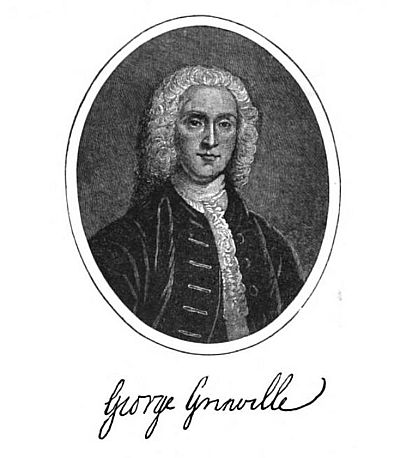
In April, 1763, just three years after the accession of George III., George Grenville became Prime Minister of England, while at the same time Charles Townshend was First Lord of Trade. Townshend had paid considerable attention to American affairs, and was supposed to know more about them than any other man in England. But his studies had led him to the conclusion that the colonies ought to be deprived of their self-government, and that a standing army ought to be maintained in America by means of taxes arbitrarily assessed upon the people by Parliament.Expenses of the French war Grenville was far from approving of such extreme measures as these, but he thought that a tax ought to be imposed upon the colonies, in order to help defray the expenses of the French war. Yet in point of fact, as Franklin truly said, the colonies had “raised, paid, and clothed nearly twenty-five thousand men during the last war,—a number equal to those sent from Great Britain, and far beyond their proportion. They went deeply into debt in doing this; and all their estates and taxes are mortgaged for many years to come for discharging that debt.” That the colonies had contributed more than an equitable share toward the expenses of the war, that their contributions had even been in excess of their ability, had been freely acknowledged by Parliament, which, on several occasions between 1756 and 1763, had voted large sums to be paid over to the colonies, in partial compensation for their excessive outlay. Parliament was therefore clearly estopped from making the defrayal of the war debt the occasion for imposing upon the colonies a tax of a new and strange character, and under circumstances which made the payment of such a tax seem equivalent to a surrender of their rights as free English communities.Grenville’s Resolves In March, 1764, Grenville introduced in the House of Commons a series of Declaratory Resolves, announcing the intention of the government to raise a revenue in America by requiring various commercial and legal documents, newspapers, etc., to bear stamps, varying in price from threepence to ten pounds. A year was to elapse, however, before these resolutions should take effect in a formal enactment.
It marks the inferiority of the mother-country to the colonies in political development, at that time, that the only solicitude as yet entertained by the British official mind, with regard to this measure, seems to have been concerned with the question how far the Americans would be willing to part with their money. With the Americans it was as far as possible from being a question of pounds, shillings, and pence; but this was by no means correctly understood in England. The good Shirley, although he had lived so long in Massachusetts, had thought that a revenue might be most easily and quietly raised by means of a stamp duty. Of all kinds of direct tax, none, perhaps, is less annoying. But the position taken by the Americans had little to do with mere convenience; it rested from the outset upon the deepest foundations of political justice, and from this foothold neither threatening nor coaxing could stir it.
Reply of the coloniesThe first deliberate action with reference to the proposed Stamp Act was
taken in the Boston town meeting in May, 1764. In this memorable town
meeting Samuel Adams drew up a series of resolutions, which contained
the first formal and public denial of the right of Parliament to tax
the colonies without their consent; and while these resolutions were
adopted by the Massachusetts assembly, a circular letter was at the same
time sent to all the other colonies, setting forth the need for
concerted and harmonious action in respect of so grave a matter. In
response, the assemblies of Connecticut, New York, Pennsylvania,
Virginia, and South Carolina joined with Massachusetts in remonstrating
against the proposed Stamp Act. All these memorials were remarkable for
clearness of argument and simple dignity of language.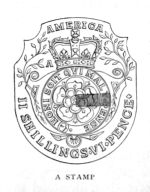 They all took
their stand on the principle that, as free-born Englishmen, they could
not rightfully be taxed by the House of Commons unless they were
represented in that body. But the proviso was added, that if a letter
from the secretary of state, coming in the king’s name, should be
presented to the colonial assemblies, asking them to contribute
something from their general resources to the needs of the British
Empire, they would cheerfully, as heretofore, grant liberal sums of
money, in token of their loyalty and of their interest in all that
concerned the welfare of the mighty empire to which they belonged. These
able and temperate memorials were sent to England; and in order to
reinforce them by personal tact and address, Franklin went over to
London as agent for the colony of Pennsylvania.
They all took
their stand on the principle that, as free-born Englishmen, they could
not rightfully be taxed by the House of Commons unless they were
represented in that body. But the proviso was added, that if a letter
from the secretary of state, coming in the king’s name, should be
presented to the colonial assemblies, asking them to contribute
something from their general resources to the needs of the British
Empire, they would cheerfully, as heretofore, grant liberal sums of
money, in token of their loyalty and of their interest in all that
concerned the welfare of the mighty empire to which they belonged. These
able and temperate memorials were sent to England; and in order to
reinforce them by personal tact and address, Franklin went over to
London as agent for the colony of Pennsylvania.
The Stamp ActThe alternative proposed by the colonies was virtually the same as the
system of requisitions already in use, and the inefficiency of which, in
securing a revenue, had been abundantly proved by the French war.
Parliament therefore rejected it, and early in 1765 the Stamp Act was
passed. It is worthy of remark that the idea that the Americans would
resist its execution did not at once occur to Franklin. Acquiescence
seemed to him, for the present, the only safe policy.
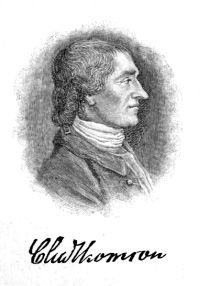 In writing to his
friend Charles Thomson, he said that he could no more have hindered the
passing of the Stamp Act than he could have hindered the sun’s setting.
“That,” he says, “we could not do. But since it is down, my friend, and
it may be long before it rises again, let us make as good a night of it
as we can. We may still light candles. Frugality and industry will go a
great way towards indemnifying us.” But Thomson, in his answer, with
truer foresight, observed, “I much fear, instead of the candles you
mentioned being lighted, you will hear of the works of darkness!” The
news of the passage of the Stamp Act was greeted in America with a burst
of indignation. In New York, the act was reprinted with a death’s-head
upon it in place of the royal arms, and it was hawked about the streets
under the title of “The Folly of England and the Ruin of America.” In
Boston, the church-bells were tolled, and the flags on the shipping put
at half-mast.
In writing to his
friend Charles Thomson, he said that he could no more have hindered the
passing of the Stamp Act than he could have hindered the sun’s setting.
“That,” he says, “we could not do. But since it is down, my friend, and
it may be long before it rises again, let us make as good a night of it
as we can. We may still light candles. Frugality and industry will go a
great way towards indemnifying us.” But Thomson, in his answer, with
truer foresight, observed, “I much fear, instead of the candles you
mentioned being lighted, you will hear of the works of darkness!” The
news of the passage of the Stamp Act was greeted in America with a burst
of indignation. In New York, the act was reprinted with a death’s-head
upon it in place of the royal arms, and it was hawked about the streets
under the title of “The Folly of England and the Ruin of America.” In
Boston, the church-bells were tolled, and the flags on the shipping put
at half-mast.
The Parson’s CauseBut formal defiance came first from Virginia. A year and a half before,
a famous lawsuit, known as the “Parsons’ Cause,” had brought into public
notice a young man who was destined to take high rank among modern
orators. The lawsuit which made Patrick Henry’s reputation was one of
the straws which showed how the stream of tendency in America was then
strongly setting toward independence. Tobacco had not yet ceased to be a
legal currency in Virginia, and by virtue of an old statute each
clergyman of the Established Church was entitled to sixteen thousand
pounds of tobacco as his yearly salary.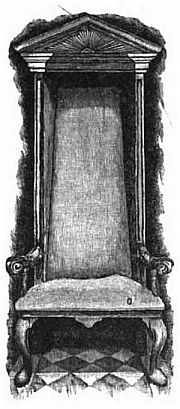
SPEAKER’S CHAIR, HOUSE OF BURGESSES In 1755 and 1758, under the
severe pressure of the French war, the assembly had passed relief acts,
allowing all public dues, including the salaries of the clergy, to be
paid either in kind or in money, at a fixed rate of twopence for a pound
of tobacco. The policy of these acts was thoroughly unsound, as they
involved a partial repudiation of debts; but the extreme distress of the
community was pleaded in excuse, and every one, clergy as well as
laymen, at first acquiesced in them. But in 1759 tobacco was worth
sixpence per pound, and the clergy became dissatisfied. Their complaints
reached the ears of Sherlock, the Bishop of London, and the act of 1758
was summarily vetoed by the king in council. The clergy brought suits to
recover the unpaid portions of their salaries; in the test case of Rev.
James Maury, the court decided the point of the law in their favour, on
the ground of the royal veto, and nothing remained but to settle before
a jury the amount of the damages. On this occasion, Henry appeared for
the first time in court, and after a few timid and awkward sentences
burst forth with an eloquent speech, in which he asserted the
indefeasible right of Virginia to make laws for herself, and declared
that in annulling a salutary ordinance at the request of a favoured
class in the community “a king, from being the father of his people,
degenerates into a tyrant, and forfeits all right to obedience.” Cries
of “Treason!” were heard in the court room, but the jury immediately
returned a verdict of one penny in damages, and Henry became the popular
idol of Virginia. The clergy tried in vain to have him indicted for
treason, alleging that his crime was hardly less heinous than that which
had brought old Lord Lovat to the block. But the people of Louisa county
replied, in 1765, by choosing him to represent them in the colonial
assembly.
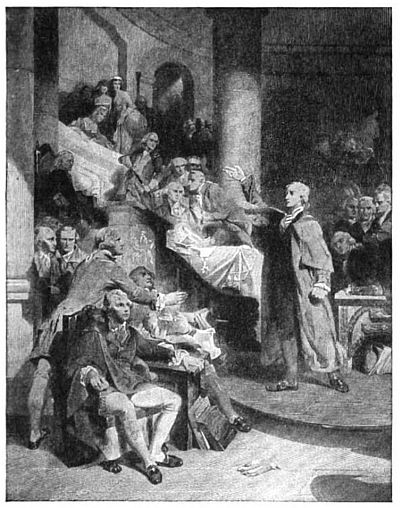
PATRICK HENRY MAKING HIS TARQUIN AND CÆSAR SPEECH
Patrick Henry’s resolutionsHardly had Henry taken his seat in the assembly when the news of the Stamp Act arrived. In a committee of the whole house, he drew up a series of resolutions, declaring that the colonists were entitled to all the liberties and privileges of natural-born subjects, and that “the taxation of the people by themselves, or by persons chosen by themselves to represent them, ... is the distinguishing characteristic of British freedom, without which the ancient constitution cannot exist.” It was further declared that any attempt to vest the power of taxation in any other body than the colonial assembly was a menace to British no less than to American freedom; that the people of Virginia were not bound to obey any law enacted in disregard of these fundamental principles; and that any one who should maintain the contrary should be regarded as a public enemy. It was in the lively debate which ensued upon these resolutions, that Henry uttered those memorable words commending the example of Tarquin and Cæsar and Charles I. to the attention of George III. Before the vote had been taken upon all the resolutions, Governor Fauquier dissolved the assembly; but the resolutions were printed in the newspapers, and hailed with approval all over the country.
The Stamp Act Congress Meanwhile, the Massachusetts legislature, at the suggestion of Otis, had issued a circular letter to all the colonies, calling for a general congress, in order to concert measures of resistance to the Stamp Act. The first cordial response came from South Carolina, at the instance of Christopher Gadsden, a wealthy merchant of Charleston and a scholar learned in Oriental languages, a man of rare sagacity and most liberal spirit. On the 7th of October, the proposed congress assembled at New York, comprising delegates from Massachusetts, South Carolina, Pennsylvania, Rhode Island, Connecticut, Delaware, Maryland, New Jersey, and New York, in all nine colonies, which are here mentioned in the order of the dates at which they chose their delegates. In Virginia, the governor succeeded in preventing the meeting of the legislature, so that this great colony did not send delegates; and, for various reasons, New Hampshire, North Carolina, and Georgia were likewise unrepresented at the congress. But the sentiment of all the thirteen colonies was none the less unanimous, and those which did not attend lost no time in declaring their full concurrence with what was done at New York. At this memorable meeting, held under the very guns of the British fleet and hard by the headquarters of General Gage, the commander-in-chief of the regular forces in America, a series of resolutions were adopted, echoing the spirit of Patrick Henry’s resolves, though couched in language somewhat more conciliatory, and memorials were addressed to the king and to both Houses of Parliament. Of all the delegates present, Gadsden took the broadest ground, in behalf both of liberty and of united action among the colonies. He objected to sending petitions to Parliament, lest thereby its paramount authority should implicitly and unwittingly be acknowledged. “A confirmation of our essential and common rights as Englishmen,” said he, “may be pleaded from charters safely enough; but any further dependence on them may be fatal. We should stand upon the broad common ground of those natural rights that we all feel and know as men and as descendants of Englishmen. I wish the charters may not ensnare us at last, by drawing different colonies to act differently in this great cause. Whenever that is the case, all will be over with the whole. There ought to be no New England man, no New Yorker, known on the continent; but all of us Americans.” So thought and said this broad-minded South Carolinian.
Declaration of the Massachusetts assembly While these things were going on at New York, the Massachusetts assembly, under the lead of Samuel Adams, who had just taken his seat in it, drew up a very able state paper, in which it was declared, among other things, that “the Stamp Act wholly cancels the very conditions upon which our ancestors, with much toil and blood and at their sole expense, settled this country and enlarged his majesty’s dominions. It tends to destroy that mutual confidence and affection, as well as that equality, which ought ever to subsist among all his majesty’s subjects in this wide and extended empire; and what is the worst of all evils, if his majesty’s American subjects are not to be governed according to the known and stated rules of the constitution, their minds may in time become disaffected.” This moderate and dignified statement was applauded by many in England and by others derided as the “raving of a parcel of wild enthusiasts,” but from the position here taken Massachusetts never afterward receded.
Resistance to the Stamp Act in Boston
But it was not only in these formal and decorous proceedings that the
spirit of resistance was exhibited. The first announcement of the Stamp
Act had called into existence a group of secret societies of workingmen
known as “Sons of Liberty,” in allusion to a famous phrase in one of
Colonel Barré’s speeches. These societies were solemnly pledged to
resist the execution of the obnoxious law. On the 14th of August, the
quiet town of Boston witnessed some extraordinary proceedings. At
daybreak, the effigy of the stamp officer, Oliver, was seen hanging from
a great elm-tree, while near it was suspended a boot, to represent the
late prime minister, Lord Bute; and from the top of the boot-leg there
issued a grotesque head, garnished with horns, to represent the devil.
At nightfall the Sons of Liberty cut down these figures, and bore them
on a bier through the streets until they reached King Street, where they
demolished the frame of a house which was supposed to be erecting for a
stamp office. Thence, carrying the beams of this frame to Fort Hill,
where Oliver lived, they made a bonfire of them in front of his house,
and in the bonfire they burned up the effigies.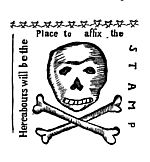 Twelve days after, a mob
sacked the splendid house of Chief Justice Hutchinson, threw his plate
into the street, and destroyed the valuable library which he had been
thirty years in collecting, and which contained many manuscripts, the
loss of which was quite irreparable. As usual with mobs, the vengeance
fell in the wrong place, for Hutchinson had done his best to prevent the
passage of the Stamp Act. In most of the colonies, the stamp officers
were compelled to resign their posts. Boxes of stamps arriving by ship
were burned or thrown into the sea. Leading merchants agreed to import
no more goods from England, and wealthy citizens set the example of
dressing in homespun garments. Lawyers agreed to overlook the absence of
the stamp on legal documents, while editors derisively issued their
newspapers with a death’s-head in the place where the stamp was required
to be put.and in New YorkIn New York, the presence of the troops for a moment
encouraged the lieutenant-governor, Colden, to take a bold stand in
behalf of the law. He talked of firing upon the people, but was warned
that if he did so he would be speedily hanged on a lamp-post, like
Captain Porteous of Edinburgh. A torchlight procession, carrying images
of Colden and of the devil, broke into the governor’s coach-house, and,
seizing his best chariot, paraded it about town with the images upon it,
and finally burned up chariot and images on the Bowling Green, in full
sight of Colden and the garrison, who looked on from the Battery,
speechless with rage, but afraid to interfere. Gage did not dare to have
the troops used, for fear of bringing on a civil war; and the next day
the discomfited Colden was obliged to surrender all the stamps to the
common council of New York, by whom they were at once locked up in the
City Hall.
Twelve days after, a mob
sacked the splendid house of Chief Justice Hutchinson, threw his plate
into the street, and destroyed the valuable library which he had been
thirty years in collecting, and which contained many manuscripts, the
loss of which was quite irreparable. As usual with mobs, the vengeance
fell in the wrong place, for Hutchinson had done his best to prevent the
passage of the Stamp Act. In most of the colonies, the stamp officers
were compelled to resign their posts. Boxes of stamps arriving by ship
were burned or thrown into the sea. Leading merchants agreed to import
no more goods from England, and wealthy citizens set the example of
dressing in homespun garments. Lawyers agreed to overlook the absence of
the stamp on legal documents, while editors derisively issued their
newspapers with a death’s-head in the place where the stamp was required
to be put.and in New YorkIn New York, the presence of the troops for a moment
encouraged the lieutenant-governor, Colden, to take a bold stand in
behalf of the law. He talked of firing upon the people, but was warned
that if he did so he would be speedily hanged on a lamp-post, like
Captain Porteous of Edinburgh. A torchlight procession, carrying images
of Colden and of the devil, broke into the governor’s coach-house, and,
seizing his best chariot, paraded it about town with the images upon it,
and finally burned up chariot and images on the Bowling Green, in full
sight of Colden and the garrison, who looked on from the Battery,
speechless with rage, but afraid to interfere. Gage did not dare to have
the troops used, for fear of bringing on a civil war; and the next day
the discomfited Colden was obliged to surrender all the stamps to the
common council of New York, by whom they were at once locked up in the
City Hall.
Nothing more was needed to prove the impossibility of carrying the Stamp Act into effect. An act which could be thus rudely defied under the very eyes of the commander-in-chief plainly could never be enforced without a war. But nobody wanted a war, and the matter began to be reconsidered in England. In July, the Grenville ministry had gone out of office, and the Marquis of Rockingham was now prime minister, while Conway, who had been one of the most energetic opponents of the Stamp Act, was secretary of state for the colonies. The new ministry would perhaps have been glad to let the question of taxing America remain in abeyance, but that was no longer possible.Debate in the House of Commons The debate on the proposed repeal of the Stamp Act was one of the keenest that has ever been heard in the House of Commons. Grenville and his friends, now in opposition, maintained in all sincerity that no demand could ever be more just, or more honourably intended, than that which had lately been made upon the Americans. Of the honest conviction of Grenville and his supporters that they were entirely in the right, and that the Americans were governed by purely sordid and vulgar motives in resisting the Stamp Act, there cannot be the slightest doubt. To refute this gross misconception of the American position, Pitt hastened from a sick-bed to the House of Commons, and delivered those speeches in which he avowed that he rejoiced in the resistance of the Americans, and declared that, had they submitted tamely to the measures of Grenville, they would have shown themselves only fit to be slaves. He pointed out distinctly that the Americans were upholding those eternal principles of political justice which should be to all Englishmen most dear, and that a victory over the colonies would be of ill-omen for English liberty, whether in the Old World or in the New. Beware, he said, how you persist in this ill-considered policy. “In such a cause your success would be hazardous. America, if she fell, would fall like the strong man with his arms around the pillars of the Constitution.” There could be no sounder political philosophy than was contained in these burning sentences of Pitt. From all the history of the European world since the later days of the Roman Republic, there is no more important lesson to be learned than this,—that it is impossible for a free people to govern a dependent people despotically without endangering its own freedom. Pitt therefore urged that the Stamp Act should instantly be repealed, and that the reason for the repeal should be explicitly stated to be because the act “was founded on an erroneous principle.” At the same time he recommended the passage of a Declaratory Act, in which the sovereign authority of Parliament over the colonies should be strongly asserted with respect to everything except direct taxation. Similar views were set forth in the House of Lords, with great learning and ability, by Lord Camden; but he was vehemently opposed by Lord Mansfield, and when the question came to a decision, the only peers who supported Camden were Lords Shelburne, Cornwallis, Paulet, and Torrington.Repeal of the Stamp Act The result finally reached was the unconditional repeal of the Stamp Act, and the simultaneous passage of a Declaratory Act, in which the views of Pitt and Camden were ignored and Parliament asserted its right to make laws binding on the colonies “in all cases whatsoever.” By the people of London the repeal was received with enthusiastic delight, and Pitt and Conway, as they appeared on the street, were loudly cheered, while Grenville was greeted with a storm of hisses. In America the effect of the news was electric. There were bonfires in every town, while addresses of thanks to the king were voted in all the legislatures. Little heed was paid to the Declaratory Act, which was regarded merely as an artifice for saving the pride of the British government. There was a unanimous outburst of loyalty all over the country, and never did the people seem less in a mood for rebellion than at that moment.
The quarrel had now been made up. On the question of principle, the British had the last word. The government had got out of its dilemma remarkably well, and the plain and obvious course for British statesmanship was not to allow another such direct issue to come up between the colonies and the mother-country. To force on another such issue while the memory of this one was fresh in everybody’s mind was sheer madness. To raise the question wantonly, as Charles Townshend did in the course of the very next year, was one of those blunders that are worse than crimes.
FUNERAL PROCESSION OF THE STAMP ACT
In July, 1766,—less than six months after the repeal of the Stamp
Act,—the Rockingham ministry fell, and the formation of a new ministry
was entrusted to Pitt, the man who best appreciated the value of the
American colonies. But the state of Pitt’s health was not such as to
warrant his taking upon himself the arduous duties of prime minister. He
took the great seal, and, accepting the earldom of Chatham, passed into
the House of Lords.The Duke of Grafton’s ministry The Duke of Grafton became prime minister, under
Pitt’s guidance; Conway and Lord Shelburne were secretaries of state,
and Camden became Lord Chancellor,—all three of them warm friends of
America, and adopting the extreme American view of the constitutional
questions lately at issue; and along with these was Charles Townshend,
the evil spirit of the administration, as chancellor of the exchequer.
From such a ministry, it might at first sight seem strange that a fresh
quarrel with America should have proceeded. But Chatham’s illness soon
overpowered him, so that he was kept at home suffering excruciating
pain, and could neither guide nor even pay due attention to the
proceedings of his colleagues. Of the rest of the ministry, only Conway
and Townshend were in the House of Commons, where the real direction of
affairs rested; and when Lord Chatham was out of the way, as the Duke of
Grafton counted for nothing, the strongest man in the cabinet was
unquestionably Townshend. Now when an act for raising an American
revenue was proposed by Townshend, a prejudice against it was sure to be
excited at once, simply because every American knew well what
Townshend’s views were. It would have been difficult for such a man even
to assume a conciliatory attitude without having his motives suspected;
and if the question with Great Britain had been simply that of raising a
revenue on statesmanlike principles, it would have been well to entrust
the business to some one like Lord Shelburne, in whom the Americans had
confidence.
and adopting the extreme American view of the constitutional
questions lately at issue; and along with these was Charles Townshend,
the evil spirit of the administration, as chancellor of the exchequer.
From such a ministry, it might at first sight seem strange that a fresh
quarrel with America should have proceeded. But Chatham’s illness soon
overpowered him, so that he was kept at home suffering excruciating
pain, and could neither guide nor even pay due attention to the
proceedings of his colleagues. Of the rest of the ministry, only Conway
and Townshend were in the House of Commons, where the real direction of
affairs rested; and when Lord Chatham was out of the way, as the Duke of
Grafton counted for nothing, the strongest man in the cabinet was
unquestionably Townshend. Now when an act for raising an American
revenue was proposed by Townshend, a prejudice against it was sure to be
excited at once, simply because every American knew well what
Townshend’s views were. It would have been difficult for such a man even
to assume a conciliatory attitude without having his motives suspected;
and if the question with Great Britain had been simply that of raising a
revenue on statesmanlike principles, it would have been well to entrust
the business to some one like Lord Shelburne, in whom the Americans had
confidence. 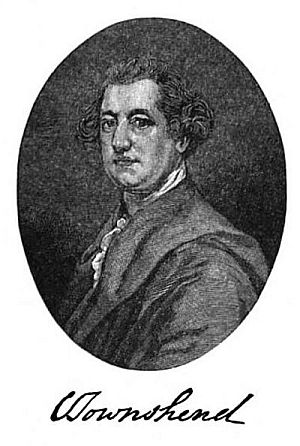 In 1767, Townshend ventured to do what in any English
ministry of the present day would be impossible. In flat opposition to
the policy of Chatham and the rest of his colleagues, trusting in the
favour of the king and in his own ability to coax or browbeat the House
of Commons, he brought in a series of new measures for taxing America.
“I expect to be dismissed for my pains,” he said in the House, with
flippant defiance; and indeed he came very near it. As soon as he heard
what was going on, Chatham mustered up strength enough to go to London
and insist upon Townshend’s dismissal. But Lord North was the only
person that could be thought of to take Townshend’s place, and Lord
North, who never liked to offend the king, declined the appointment.
Before Chatham could devise a way out of his quandary, his malady again
laid him prostrate, and Townshend was not only not turned out, but was
left practically supreme in the cabinet. The new measures for taxing
America were soon passed. In the debates on the Stamp Act, it had been
argued that while Parliament had no right to impose a direct tax upon
the Americans, it might still properly regulate American trade by port
duties. The distinction had been insisted upon by Pitt, and had been
virtually acknowledged by the Americans; who had from time to time
submitted to acts of Parliament imposing duties upon merchandise
imported into the colonies. The Townshend ActsNay, more, when charged with inconsistency
for submitting to such acts while resisting the Stamp Act, several
leading Americans had explicitly adopted the distinction between
internal and external taxation, and declared themselves ready to submit
to the latter while determined to resist the former. Townshend was now
ready, as he declared, to take them at their word. By way of doing so,
he began by laughing to scorn the distinction between internal and
external taxation, and declaring that Parliament possessed the undoubted
right of taxing the Americans without their own consent; but since
objections had been raised to a direct tax, he was willing to resort to
port duties,—a measure to which the Americans were logically bound to
assent. Duties were accordingly imposed on wine, oil, and fruits, if
carried directly to America from Spain or Portugal; on glass, paper,
lead, and painters’ colours; and lastly on tea. The revenue to be
derived from these duties was to be devoted to paying a fixed salary to
the royal governors and to the justices appointed at the king’s
pleasure. The Crown was also empowered to create a general civil list in
every colony, and to grant salaries and pensions at its arbitrary will.
A board of revenue commissioners for the whole country was to be
established at Boston, armed with extraordinary powers; and general
writs of assistance were expressly legalized and permitted.
In 1767, Townshend ventured to do what in any English
ministry of the present day would be impossible. In flat opposition to
the policy of Chatham and the rest of his colleagues, trusting in the
favour of the king and in his own ability to coax or browbeat the House
of Commons, he brought in a series of new measures for taxing America.
“I expect to be dismissed for my pains,” he said in the House, with
flippant defiance; and indeed he came very near it. As soon as he heard
what was going on, Chatham mustered up strength enough to go to London
and insist upon Townshend’s dismissal. But Lord North was the only
person that could be thought of to take Townshend’s place, and Lord
North, who never liked to offend the king, declined the appointment.
Before Chatham could devise a way out of his quandary, his malady again
laid him prostrate, and Townshend was not only not turned out, but was
left practically supreme in the cabinet. The new measures for taxing
America were soon passed. In the debates on the Stamp Act, it had been
argued that while Parliament had no right to impose a direct tax upon
the Americans, it might still properly regulate American trade by port
duties. The distinction had been insisted upon by Pitt, and had been
virtually acknowledged by the Americans; who had from time to time
submitted to acts of Parliament imposing duties upon merchandise
imported into the colonies. The Townshend ActsNay, more, when charged with inconsistency
for submitting to such acts while resisting the Stamp Act, several
leading Americans had explicitly adopted the distinction between
internal and external taxation, and declared themselves ready to submit
to the latter while determined to resist the former. Townshend was now
ready, as he declared, to take them at their word. By way of doing so,
he began by laughing to scorn the distinction between internal and
external taxation, and declaring that Parliament possessed the undoubted
right of taxing the Americans without their own consent; but since
objections had been raised to a direct tax, he was willing to resort to
port duties,—a measure to which the Americans were logically bound to
assent. Duties were accordingly imposed on wine, oil, and fruits, if
carried directly to America from Spain or Portugal; on glass, paper,
lead, and painters’ colours; and lastly on tea. The revenue to be
derived from these duties was to be devoted to paying a fixed salary to
the royal governors and to the justices appointed at the king’s
pleasure. The Crown was also empowered to create a general civil list in
every colony, and to grant salaries and pensions at its arbitrary will.
A board of revenue commissioners for the whole country was to be
established at Boston, armed with extraordinary powers; and general
writs of assistance were expressly legalized and permitted.
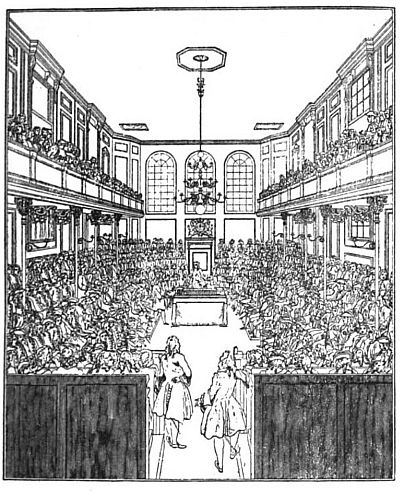
HOUSE OF COMMONS
Such was the way in which Townshend proceeded to take the Americans at their word. His course was a distinct warning to the Americans that, if they yielded now, they might expect some new Stamp Act or other measures of direct taxation to follow; and so it simply invited resistance. That no doubt might be left on this point, the purpose for which the revenue was to be used showed clearly that the object of the legislation was not to regulate trade, but to assert British supremacy over the colonies at the expense of their political freedom. By providing for a civil list in each colony, to be responsible only to the Crown, it aimed at American self-government even a more deadly blow than had been aimed at it by the Stamp Act.Attack on the New York assembly It meddled with the “internal police” of every colony, and would thus have introduced a most vexatious form of tyranny as soon as it had taken effect. A special act by which the Townshend revenue acts were accompanied still further revealed the temper and purposes of the British government. The colony of New York had been required to provide certain supplies for the regular troops quartered in the city, under command of General Gage; and the colonial assembly had insisted upon providing these supplies in its own way, and in disregard of special instructions from England. For this offence, Parliament now passed an act suspending the New York assembly from its legislative functions until it should have complied with the instructions regarding the supplies to the army. It need not be said that the precedent involved in this act, if once admitted, would have virtually annulled the legislative independence of every one of the colonial assemblies.
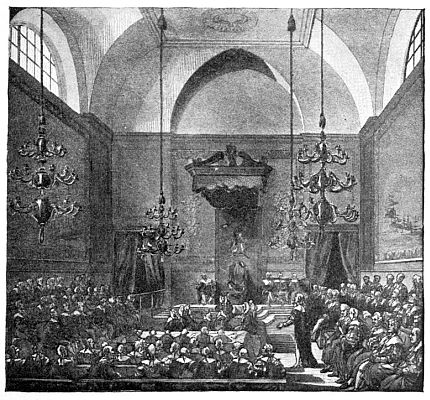
HOUSE OF LORDS
Parliament did not properly represent the British people We may perhaps wonder that a British Parliament should have been prevailed on to pass such audacious acts as these, and by large majorities. But we must remember that in those days the English system of representation was so imperfect, and had come to be so overgrown with abuses, that an act of Parliament was by no means sure to represent the average judgment of the people. The House of Commons was so far under the corrupt influence of the aristocracy, and was so inadequately controlled by popular opinion, that at almost any time it was possible for an eloquent, determined, and unscrupulous minister to carry measures through it such as could never have been carried through any of the reformed Parliaments since 1832. It is not easy, perhaps, to say with confidence what the popular feeling in England was in 1767 with reference to the policy of Charles Townshend. The rural population was much more ignorant than it is to-day, and its political opinions were strongly influenced by the country squires,—a worthy set of men, but not generally distinguished for the flexibility of their minds or the breadth of their views. But as a sample of the most intelligent popular feeling in England at that time, it will probably not be unfair to cite that of the city of London, which was usually found arrayed on the side of free government. No wiser advice was heard in Parliament, on the subject of the New York dispute, than was given by Alderman Beckford, father of the illustrious author of Vathek, when he said, “Do like the best of physicians, and heal the disease by doing nothing.” On many other important occasions in the course of this unfortunate quarrel, the city of London gave expression to opinions which the king and Parliament would have done well to heed. But even if the House of Commons had reflected popular feeling in 1767 as clearly as it has done since 1832, it is by no means sure that it would have known how to deal successfully with the American question. The problem was really a new one in political history; and there was no adequate precedent to guide the statesmen in dealing with the peculiar combination of considerations it involved. As far as concerned the relations of Englishmen in England to the Crown and to Parliament, the British Constitution had at last reached a point where it worked quite smoothly. All contingencies likely to arise seemed to have been provided for. But when it came to the relations of Englishmen in America to the Crown and to Parliament, the case was very different. The case had its peculiar conditions, which the British Constitution in skilful hands would no doubt have proved elastic enough to satisfy; but just at this time the British Constitution happened to be in very unskilful hands, and wholly failed to meet the exigencies of the occasion.Difficulty of the problem The chief difficulty lay in the fact that while on the one hand the American principle of no taxation without representation was unquestionably sound and just, on the other hand the exemption of any part of the British Empire from the jurisdiction of Parliament seemed equivalent to destroying the political unity of the empire. This could not but seem to any English statesman a most lamentable result, and no English statesman felt this more strongly than Lord Chatham.
There were only two possible ways in which the difference could be accommodated. Either the American colonies must elect representatives to the Parliament at Westminster; or else the right of levying taxes must be left where it already resided, in their own legislative bodies. The first alternative was seriously considered by eminent political thinkers, both in England and America. In England it was favourably regarded by Adam Smith, and in America by Benjamin Franklin and James Otis. In 1774, some of the loyalists in the first Continental Congress recommended such a scheme.Representation of Americans in Parliament In 1778, after the overthrow of Burgoyne, the king himself began to think favourably of such a way out of the quarrel. But this alternative was doubtless from the first quite visionary and unpractical. The difficulties in the way of securing anything like equality of representation would probably have been insuperable; and the difficulty in dividing jurisdiction fairly between the local colonial legislature and the American contingent in the Parliament at Westminster would far have exceeded any of the difficulties that have arisen in the attempt to adjust the relations of the several States to the general government in our Federal Union. Mere distance, too, which even to-day would go far toward rendering such a scheme impracticable, would have been a still more fatal obstacle in the days of Chatham and Townshend. If, even with the vast enlargement of the political horizon which our hundred years’ experience of federalism has effected, the difficulty of such a union still seems so great, we may be sure it would have proved quite insuperable then. The only practicable solution would have been the frank and cordial admission, by the British government, of the essential soundness of the American position, that, in accordance with the entire spirit of the English Constitution, the right of levying taxes in America resided only in the colonial legislatures, in which alone could American freemen be adequately represented. Nor was there really any reason to fear that such a step would imperil the unity of the empire. How mistaken this fear was, on the part of English statesmen, is best shown by the fact that, in her liberal and enlightened dealings with her colonies at the present day, England has consistently adopted the very course of action which alone would have conciliated such men as Samuel Adams in the days of the Stamp Act. By pursuing such a policy, the British government has to-day a genuine hold upon the affections of its pioneers in Australia and New Zealand and Africa. If such a statesman as Gladstone could have dealt freely with the American question during the twelve years following the Peace of Paris, the history of that time need not have been the pitiable story of a blind and obstinate effort to enforce submission to an ill-considered and arbitrary policy on the part of the king and his ministers. The feeling by which the king’s party was guided, in the treatment of the American question, was very much the same as the feeling which lately inspired the Tory criticisms upon Gladstone’s policy in South Africa.Mr. Gladstone and the Boers Lord Beaconsfield, a man in some respects not unlike Charles Townshend, bequeathed to his successor a miserable quarrel with the Dutch farmers of the Transvaal; and Mr. Gladstone, after examining the case on its merits, had the moral courage to acknowledge that England was wrong, and to concede the demands of the Boers, even after serious military defeat at their hands. Perhaps no other public act of England in the nineteenth century has done her greater honour than this. But said the Jingoes, All the world will now laugh at Englishmen, and call them cowards. In order to vindicate the military prestige of England, the true policy would be, forsooth, to prolong the war until the Boers had been once thoroughly defeated, and then acknowledge the soundness of their position. Just as if the whole world did not know, as well as it can possibly know anything, that whatever qualities the English nation may lack, it certainly does not lack courage, or the ability to win victories in a good cause! All honour to the Christian statesman who dares to leave England’s military prestige to be vindicated by the glorious records of a thousand years, and even in the hour of well-merited defeat sets a higher value on political justice than on a reputation for dealing hard blows! Such incidents as this are big with hope for the future. They show us what sort of political morality our children’s children may expect to see, when mankind shall have come somewhat nearer toward being truly civilized.
In the eighteenth century, no such exhibition of good sense and good feeling, in the interest of political justice, could have been expected from any European statesman, unless from a Turgot or a Chatham. But Charles Townshend was not even called upon to exercise any such self-control. Had he simply taken Alderman Beckford’s advice, and done nothing, all would have been well; but his meddling had now put the government into a position which it was ruinous to maintain, but from which it was difficult to retreat. American tradition rightly lays the chief blame for the troubles which brought on the Revolutionary War to George III.; but, in fairness, it is well to remember that he did not suggest Townshend’s measures, though he zealously adopted and cherished them when once propounded. The blame for wantonly throwing the apple of discord belongs to Townshend more than to any one else.Death of Townshend After doing this, within three months from the time his bill had passed the House of Commons, Townshend was seized with a fever and died at the age of forty-one. A man of extraordinary gifts, but without a trace of earnest moral conviction, he had entered upon a splendid career; but his insincere nature, which turned everything into jest, had stamped itself upon his work. He bequeathed to his country nothing but the quarrel which was soon to deprive her of the grandest part of that empire upon which the sun shall never set.
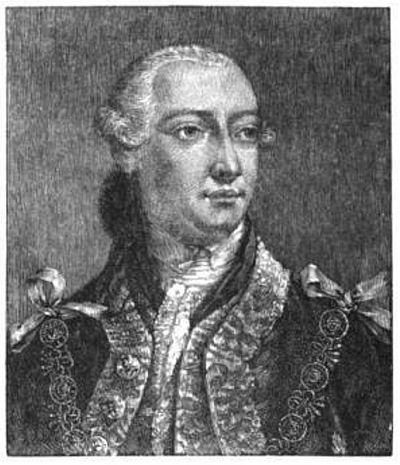
GEORGE III
If Townshend’s immediate object in originating these measures was to
curry favour with George III., and get the lion’s share in the disposal
of the king’s ample corruption-fund, he had doubtless gone to work in
the right way.His political legacy to George III. The king was delighted with Townshend’s measures, and
after the sudden death of his minister he made them his own, and staked
his whole political career as a monarch upon their success. These
measures were the fatal legacy which the brighter political charlatan
left to the duller political fanatic. The fierce persistency with which
George now sought to force Townshend’s measures upon the Americans
partook of the nature of fanaticism, and we shall not understand it
unless we bear in mind the state of political parties in England between
1760 and 1784. When George III. came to the throne, in 1760, England had
been governed for more than half a century by the great Whig families
which had been brought into the foreground by the revolution of 1688.
The Tories had been utterly discredited and cast out of political life
by reason of their willingness to conspire with the Stuart pretenders
in disturbing the peace of the country. Cabinet government, in its
modern form, had begun to grow up during the long and prosperous
administration of Sir Robert Walpole, who was the first English prime
minister in the full sense. Under Walpole’s wise and powerful sway, the
first two Georges had possessed scarcely more than the shadow of
sovereignty. It was the third George’s ambition to become a real king,
like the king of France or the king of Spain. From earliest babyhood,
his mother had forever been impressing upon him the precept, ”George, be
king!” and this simple lesson had constituted pretty much the whole of
his education.Character of George III. Popular tradition regards him as the most ignorant king
that ever sat upon the English throne; and so far as general culture is
concerned, this opinion is undoubtedly correct. He used to wonder what
people could find to admire in such a wretched driveller as
Shakespeare, and he never was capable of understanding any problem which
required the slightest trace of imagination or of generalizing power.
Nevertheless, the popular American tradition undoubtedly errs in
exaggerating his stupidity and laying too little stress upon the worst
side of his character. George III. was not destitute of a certain kind
of ability, which often gets highly rated in this not too clear-sighted
world. He could see an immediate end very distinctly, and acquired
considerable power from the dogged industry with which he pursued it.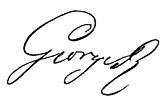 In
an age when some of the noblest English statesmen drank their gallon of
strong wine daily, or sat late at the gambling-table, or lived in
scarcely hidden concubinage, George III. was decorous in personal habits
and pure in domestic relations, and no banker’s clerk in London applied
himself to the details of business more industriously than he. He had a
genuine talent for administration, and he devoted this talent most
assiduously to selfish ends. Scantily endowed with human sympathy, and
almost boorishly stiff in his ordinary unstudied manner, he could be
smooth as oil whenever he liked. He was an adept in gaining men’s
confidence by a show of interest, and securing their aid by dint of fair
promises; and when he found them of no further use, he could turn them
adrift with wanton insult. Any one who dared to disagree with him upon
even the slightest point of policy he straightway regarded as a natural
enemy, and pursued him ever afterward with vindictive hatred. As a
natural consequence, he surrounded himself with weak and short-sighted
advisers, and toward all statesmen of broad views and independent
character he nursed the bitterest rancour. He had little faith in human
honour or rectitude, and in pursuing an end he was seldom deterred by
scruples.
In
an age when some of the noblest English statesmen drank their gallon of
strong wine daily, or sat late at the gambling-table, or lived in
scarcely hidden concubinage, George III. was decorous in personal habits
and pure in domestic relations, and no banker’s clerk in London applied
himself to the details of business more industriously than he. He had a
genuine talent for administration, and he devoted this talent most
assiduously to selfish ends. Scantily endowed with human sympathy, and
almost boorishly stiff in his ordinary unstudied manner, he could be
smooth as oil whenever he liked. He was an adept in gaining men’s
confidence by a show of interest, and securing their aid by dint of fair
promises; and when he found them of no further use, he could turn them
adrift with wanton insult. Any one who dared to disagree with him upon
even the slightest point of policy he straightway regarded as a natural
enemy, and pursued him ever afterward with vindictive hatred. As a
natural consequence, he surrounded himself with weak and short-sighted
advisers, and toward all statesmen of broad views and independent
character he nursed the bitterest rancour. He had little faith in human
honour or rectitude, and in pursuing an end he was seldom deterred by
scruples.
Such was the man who, on coming to the throne in 1760, had it for his first and chiefest thought to break down the growing system of cabinet government in England. For the moment circumstances seemed to favour him. The ascendancy of the great Whig families was endangered on two sides. On the one hand, the Tory party had outlived that idle, romantic love for the Stuarts upon which it found it impossible to thrive.English parties between 1760 and 1784 The Tories began coming to court again, and they gave the new king all the benefit of their superstitious theories of high prerogative and divine right. On the other hand, a strong popular feeling was beginning to grow up against parliamentary government as conducted by the old Whig families. The House of Commons no longer fairly represented the people. Ancient boroughs, which possessed but a handful of population, or, like Old Sarum, had no inhabitants at all, still sent their representatives to Parliament, while great cities of recent growth, such as Birmingham and Leeds, were unrepresented. To a great extent, it was the most progressive parts of the kingdom which were thus excluded from a share in the government, while the rotten boroughs were disposed of by secret lobbying, or even by open bargain and sale. A few Whig families, the heads of which sat in the House of Lords, thus virtually owned a considerable part of the House of Commons; and, under such circumstances, it was not at all strange that Parliament should sometimes, as in the Wilkes case, array itself in flat opposition to the will of the people. The only wonder is that there were not more such scandals. The party of “Old Whigs,” numbering in its ranks some of the ablest and most patriotic men in England, was contented with this state of things, upon which it had thrived for two generations, and could not be made to understand the iniquity of it,—any more than an old cut-and-dried American politician in our time can be made to understand the iniquity of the “spoils system.” Of this party the Marquis of Rockingham was the political leader, and Edmund Burke was the great representative statesman. In strong opposition to the Old Whig policy there had grown up the party of New Whigs, bent upon bringing about some measure of parliamentary reform, whereby the House of Commons might truly represent the people of Great Britain. In Parliament this party was small in numbers, but weighty in character, and at its head was the greatest Englishman of the eighteenth century, the elder William Pitt, under whose guidance England had won her Indian empire and established her dominion over the seas, while she had driven the French from America, and enabled Frederick the Great to lay the foundations of modern Germany.
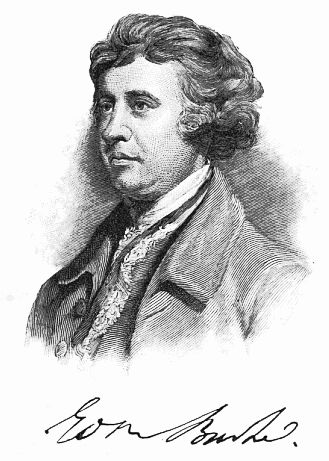
George III. as a politician Now when George III. came to the throne, he took advantage of this division in the two parties in order to break down the power of the Old Whig families, which so long had ruled the country. To this end he used the revived Tory party with great effect, and bid against the Old Whigs for the rotten boroughs; and in playing off one set of prejudices and interests against another, he displayed in the highest degree the cunning and craft of a self-seeking politician. His ordinary methods would have aroused the envy of Tammany. While engaged in such work, he had sense enough to see that the party from which he had most to fear was that of the New Whigs, whose scheme of parliamentary reform, if ever successful, would deprive him of the machinery of corruption upon which he relied. Much as he hated the Old Whig families, he hated Pitt and his followers still more heartily. He was perpetually denouncing Pitt as a “trumpeter of sedition,” and often vehemently declared in public, and in the most offensive manner, that he wished that great man were dead. Such had been his eagerness to cast discredit upon Pitt’s policy that he had utterly lost sight of the imperial interests of England, which indeed his narrow intelligence was incapable of comprehending. One of the first acts of his reign had been to throw away Cuba and the Philippine Islands, which Pitt had just conquered from Spain; while at the same time, by leaving Prussia in the lurch before the Seven Years’ War had fairly closed, he converted the great Frederick from one of England’s warmest friends into one of her bitterest enemies.
His chief reason for quarrelling with the Americans This political attitude of George III. toward the Whigs in general, and toward Pitt in particular, explains the fierce obstinacy with which he took up and carried on Townshend’s quarrel with the American colonies. For if the American position, that there should be no taxation without representation, were once to be granted, then it would straightway become necessary to admit the principles of parliamentary reform. The same principle that applied to such commonwealths as Massachusetts and Virginia would be forthwith applied to such towns as Birmingham and Leeds. The system of rotten boroughs would be swept away; the chief engine of kingly corruption would thus be destroyed; a reformed House of Commons, with the people at its back, would curb forever the pretensions of the Crown; and the detested Lord Chatham would become the real ruler of a renovated England, in which George III. would be a personage of very little political importance.
In these considerations we find the explanation of the acts of George III. which brought on the American Revolution, and we see why it is historically correct to regard him as the person chiefly responsible for the quarrel. The obstinacy with which he refused to listen to a word of reason from America was largely due to the exigencies of the political situation in which he found himself. For him, as well as for the colonies, it was a desperate struggle for political existence. He was glad to force on the issue in America rather than in England, because it would be comparatively easy to enlist British local feeling against the Americans as a remote set of ^ldquo;rebels,” with whom Englishmen had no interests in common, and thus obscure the real nature of the issue. Herein he showed himself a cunning politician, though an ignoble statesman. By playing off against each other the two sections of the Whig party, he continued for a while to carry his point; and had he succeeded in overcoming the American resistance and calling into England a well-trained army of victorious mercenaries, the political quarrel there could hardly have failed to develop into a civil war. A new rebellion would perhaps have overthrown George III. as James II. had been overthrown a century before. As it was, the victory of the Americans put an end to the personal government of the king in 1784, so quietly that the people scarcely realized the change.[1] A peaceful election accomplished what otherwise could hardly have been effected without bloodshed. So while George III. lost the fairest portion of the British Empire, it was the sturdy Americans who, fighting the battle of freedom at once for the Old World and for the New, ended by overwhelming his paltry schemes for personal aggrandizement in hopeless ruin, leaving him for posterity to contemplate as one of the most instructive examples of short-sighted folly that modern history affords.
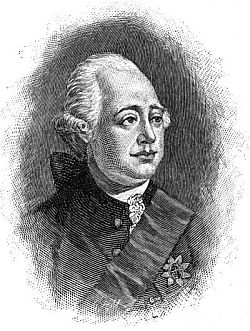
Townshend was succeeded in the exchequer by Lord North, eldest son of the Earl of Guildford, a young man of sound judgment, wide knowledge, and rare sweetness of temper, but wholly lacking in sympathy with popular government. As leader of the House of Commons, he was sufficiently able in debate to hold his ground against the fiercest attacks of Burke and Fox, but he had no strength of will. His lazy good-nature and his Tory principles made him a great favourite with the king, who, through his influence over Lord North, began now to exercise the power of a cabinet minister, and to take a more important part than hitherto in the direction of affairs. Soon after North entered the cabinet, colonial affairs were taken from Lord Shelburne and put in charge of Lord Hillsborough, a man after the king’s own heart. Conway was dismissed from the cabinet, and his place was taken by Lord Weymouth, who had voted against the repeal of the Stamp Act. The Earl of Sandwich, who never spoke of the Americans but in terms of abuse, was at the same time made postmaster-general; and in the following year Lord Chatham resigned the privy seal.
While the ministry, by these important changes, was becoming more and more hostile to the just claims of the Americans, those claims were
powerfully urged in America, both in popular literature and in
well-considered state papers. John Dickinson, at once a devoted friend
of England and an ardent American patriot, published his celebrated
Farmer’s Letters, which were greatly admired in both countries for their
temperateness of tone and elegance of expression.John Dickinson In these letters,
Dickinson held a position quite similar to that occupied by Burke.
Recognizing that the constitutional relations of the colonies to the
mother-country had always been extremely vague and ill-defined, he urged
that the same state of things be kept up forever through a genuine
English feeling of compromise, which should refrain from pushing any
abstract theory of sovereignty to its extreme logical conclusions. At
the same time, he declared that the Townshend revenue acts were “a most
dangerous innovation” upon the liberties of the people, and
significantly hinted, that, should the ministry persevere in its
tyrannical policy, “English history affords examples of resistance by
force.”
more hostile to the just claims of the Americans, those claims were
powerfully urged in America, both in popular literature and in
well-considered state papers. John Dickinson, at once a devoted friend
of England and an ardent American patriot, published his celebrated
Farmer’s Letters, which were greatly admired in both countries for their
temperateness of tone and elegance of expression.John Dickinson In these letters,
Dickinson held a position quite similar to that occupied by Burke.
Recognizing that the constitutional relations of the colonies to the
mother-country had always been extremely vague and ill-defined, he urged
that the same state of things be kept up forever through a genuine
English feeling of compromise, which should refrain from pushing any
abstract theory of sovereignty to its extreme logical conclusions. At
the same time, he declared that the Townshend revenue acts were “a most
dangerous innovation” upon the liberties of the people, and
significantly hinted, that, should the ministry persevere in its
tyrannical policy, “English history affords examples of resistance by
force.”
The Massachusetts circular letter
While Dickinson was publishing these letters, Samuel Adams wrote for the
Massachusetts assembly a series of addresses to the ministry, a petition
to the king, and a circular letter to the assemblies of the other
colonies. In these very able state papers, Adams declared that a proper
representation of American interests in the British Parliament was
impracticable, and that, in accordance with the spirit of the English
Constitution, no taxes could be levied in America except by the colonial
legislatures. He argued that the Townshend acts were unconstitutional,
and asked that they should be repealed, and that the colonies should
resume the position which they had occupied before the beginning of the
present troubles. 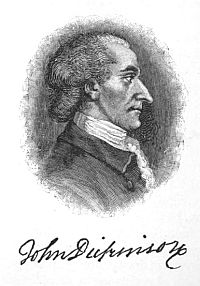 The petition to the king was couched in beautiful and
touching language, but the author seems to have understood very well how
little effect it was likely to produce. His daughter, Mrs. Wells, used
to tell how one evening, as her father had just finished writing this
petition, and had taken up his hat to go out, she observed that the
paper would soon be touched by the royal hand. “More likely, my dear,”
he replied, “it will be spurned by the royal foot!” Adams rightly
expected much more from the circular letter to the other colonies, in
which he invited them to coöperate with Massachusetts in resisting the
Townshend acts, and in petitioning for their repeal. The assembly,
having adopted all these papers by a large majority, was forthwith
prorogued by Governor Bernard, who, in a violent speech, called them
demagogues to whose happiness “everlasting contention was necessary.”
But the work was done. The circular letter brought encouraging replies
from the other colonies. The condemnation of the Townshend acts was
unanimous, and leading merchants in most of the towns entered into
agreements not to import any more English goods until the acts should be
repealed. Ladies formed associations, under the name of Daughters of
Liberty, pledging themselves to wear homespun clothes and to abstain
from drinking tea. The feeling of the country was thus plainly enough
expressed, but nowhere as yet was there any riot or disorder, and no one
as yet, except, perhaps, Samuel Adams, had begun to think of a
political separation from England. Even he did not look upon such a
course as desirable, but the treatment of his remonstrances by the king
and the ministry soon led him to change his opinion.
The petition to the king was couched in beautiful and
touching language, but the author seems to have understood very well how
little effect it was likely to produce. His daughter, Mrs. Wells, used
to tell how one evening, as her father had just finished writing this
petition, and had taken up his hat to go out, she observed that the
paper would soon be touched by the royal hand. “More likely, my dear,”
he replied, “it will be spurned by the royal foot!” Adams rightly
expected much more from the circular letter to the other colonies, in
which he invited them to coöperate with Massachusetts in resisting the
Townshend acts, and in petitioning for their repeal. The assembly,
having adopted all these papers by a large majority, was forthwith
prorogued by Governor Bernard, who, in a violent speech, called them
demagogues to whose happiness “everlasting contention was necessary.”
But the work was done. The circular letter brought encouraging replies
from the other colonies. The condemnation of the Townshend acts was
unanimous, and leading merchants in most of the towns entered into
agreements not to import any more English goods until the acts should be
repealed. Ladies formed associations, under the name of Daughters of
Liberty, pledging themselves to wear homespun clothes and to abstain
from drinking tea. The feeling of the country was thus plainly enough
expressed, but nowhere as yet was there any riot or disorder, and no one
as yet, except, perhaps, Samuel Adams, had begun to think of a
political separation from England. Even he did not look upon such a
course as desirable, but the treatment of his remonstrances by the king
and the ministry soon led him to change his opinion.
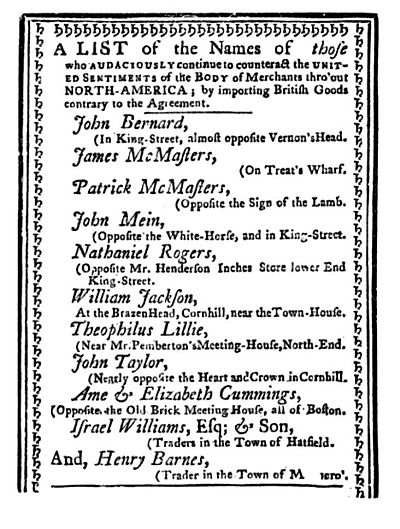
The petition of the Massachusetts assembly was received by the king with silent contempt, but the circular letter threw him into a rage. In cabinet meeting, it was pronounced to be little better than an overt act of rebellion, and the ministers were encouraged in this opinion by letters from Bernard, who represented the whole affair as the wicked attempt of a few vile demagogues to sow the seeds of dissension broadcast over the continent. We have before had occasion to observe the extreme jealousy with which the Crown had always regarded any attempt at concerted action among the colonies which did not originate with itself.Lord Hillsborough’s instructions to Bernard But here was an attempt at concerted action in flagrant opposition to the royal will. Lord Hillsborough instructed Bernard to command the assembly to rescind their circular letter, and, in case of their refusal, to send them home about their business. This was to be repeated year after year, so that, until Massachusetts should see fit to declare herself humbled and penitent, she must go without a legislature. At the same time, Hillsborough ordered the assemblies in all the other colonies to treat the Massachusetts circular with contempt,—and this, too, under penalty of instant dissolution. From a constitutional point of view, these arrogant orders deserve to be ranked among the curiosities of political history. They serve to mark the rapid progress the ministry was making in the art of misgovernment. A year before, Townshend had suspended the New York legislature by an act of Parliament. Now, a secretary of state, by a simple royal order, threatened to suspend all the legislative bodies of America unless they should vote according to his dictation.
When Hillsborough’s orders were laid before the Massachusetts assembly, they were greeted with scorn. “We are asked to rescind,” said Otis. “Let Britain rescind her measures, or the colonies are lost to her forever.” The “Illustrious Ninety-Two”Nevertheless, it was only after nine days of discussion that the question was put, when the assembly decided, by a vote of ninety-two to seventeen, that it would not rescind its circular letter. Bernard immediately dissolved the assembly, but its vote was hailed with delight throughout the country, and the “Illustrious Ninety-Two” became the favourite toast on all convivial occasions. Nor were the other colonial assemblies at all readier than that of Massachusetts to yield to the secretary’s dictation. They all expressed the most cordial sympathy with the recommendations of the circular letter; and in several instances they were dissolved by the governors, according to Hillsborough’s instructions.
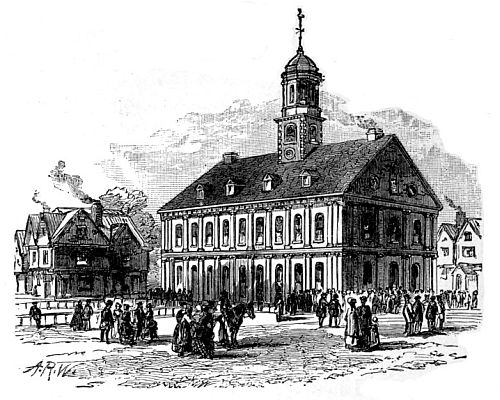
FANEUIL HALL, THE CRADLE OF LIBERTY
While these fruitless remonstrances against the Townshend acts had been preparing, the commissioners of the customs, in enforcing the acts, had not taken sufficient pains to avoid irritating the people.Impressment of citizens In the spring of 1768, the fifty-gun frigate Romney had been sent to mount guard in the harbour of Boston, and while she lay there several of the citizens were seized and impressed as seamen,—a lawless practice long afterward common in the British navy, but already stigmatized as barbarous by public opinion in America. As long ago as 1747, when the relations between the colonies and the home government were quite harmonious, resistance to the press-gang had resulted in a riot in the streets of Boston. Now while the town was very indignant over this lawless kidnapping of its citizens, on the 10th of June, 1768, John Hancock’s sloop Liberty was seized at the wharf by a boat’s crew from the Romney, for an alleged violation of the revenue laws, though without official warrant. Insults and recriminations ensued between the officers and the citizens assembled on the wharf, until after a while the excitement grew into a mild form of riot, in which a few windows were broken, some of the officers were pelted, and finally a pleasure boat, belonging to the collector, was pulled up out of the water, carried to the Common, and burned there, when Hancock and Adams, arriving upon the scene, put a stop to the commotion. A few days afterward, a town meeting was held in Faneuil Hall; but as the crowd was too great to be contained in the building, it was adjourned to the Old South Meeting-House, where Otis addressed the people from the pulpit. A petition to the governor was prepared, in which it was set forth that the impressment of peaceful citizens was an illegal act, and that the state of the town was as if war had been declared against it; and the governor was requested to order the instant removal of the frigate from the harbour. A committee of twenty-one leading citizens was appointed to deliver this petition to the governor at his house in Jamaica Plain. In his letters to the secretary of state Bernard professed to live in constant fear of assassination, and was always begging for troops to protect him against the incendiary and blackguard mob of Boston. Yet as he looked down the beautiful road from his open window, that summer afternoon, what he saw was not a ragged mob, armed with knives and bludgeons, shouting “Liberty, or death!” and bearing the head of a revenue collector aloft on the point of a pike, but a quiet procession of eleven chaises, from which there alighted at his door twenty-one gentlemen, as sedate and stately in demeanour as those old Roman senators at whom the Gaulish chief so marvelled. There followed a very affable interview, during which wine was passed around. The next day the governor’s answer was read in town meeting, declining to remove the frigate, but promising that in future there should be no impressment of Massachusetts citizens; and with this compromise the wrath of the people was for a moment assuaged.
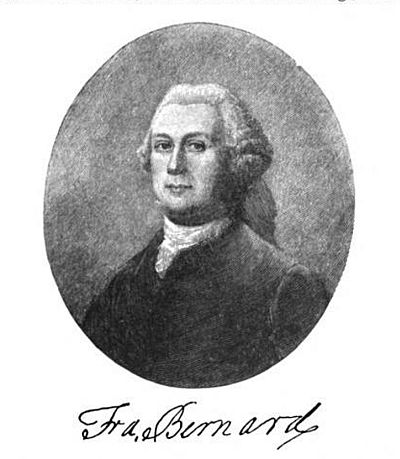
Affairs of this sort, reported with gross exaggeration by the governor and revenue commissioners to the ministry, produced in England the impression that Boston was a lawless and riotous town, full of cutthroats and blacklegs, whose violence could be held in check only by martial law. Of all the misconceptions of America by England which brought about the American Revolution, perhaps this notion of the turbulence of Boston was the most ludicrous. During the ten years of excitement which preceded the War of Independence there was one disgraceful riot in Boston,—that in which Hutchinson’s house was sacked; but in all this time not a drop of blood was shed by the people, nor was anybody’s life for a moment in danger at their hands. The episode of the sloop Liberty, as here described, was a fair sample of the disorders which occurred at Boston at periods of extreme excitement; and in any European town in the eighteenth century it would hardly have been deemed worthy of mention.
Even before the affair of the Liberty, the government had made up its mind to send troops to Boston, in order to overawe the popular party and show them that the king and Lord Hillsborough were in earnest. The news of the Liberty affair, however, served to remove any hesitation that might hitherto have been felt.Statute of Henry VIII. concerning “treason committed abroad” Vengeance was denounced against the insolent town of Boston. The most seditious spirits, such as Otis and Adams, must be made an example of, and thus the others might be frightened into submission. With such intent, Lord Hillsborough sent over to inquire “if any person had committed any acts which, under the statutes of Henry VIII. against treason committed abroad, might justify their being brought to England for trial.” This raking-up of an obsolete statute, enacted at one of the worst periods of English history, and before England had any colonies at all, was extremely injudicious. But besides all this, continued Hillsborough, the town meeting, that nursery of sedition, must be put down or overawed; and in pursuance of this scheme, two regiments of soldiers and a frigate were to be sent over to Boston at the ministry’s earliest convenience. To make an example of Boston, it was thought, would have a wholesome effect upon the temper of the Americans.
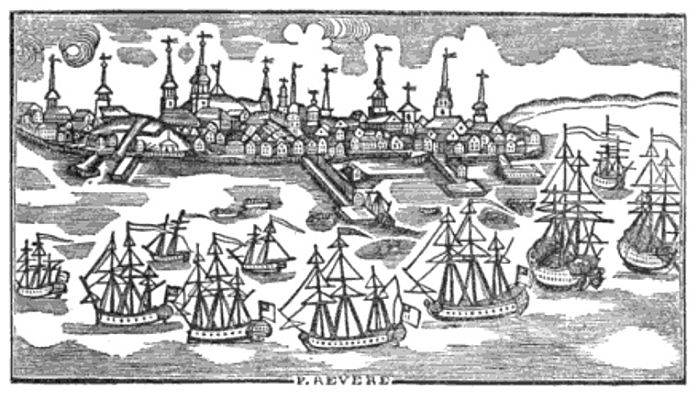
LANDING OF THE TROOPS IN BOSTON, 1768
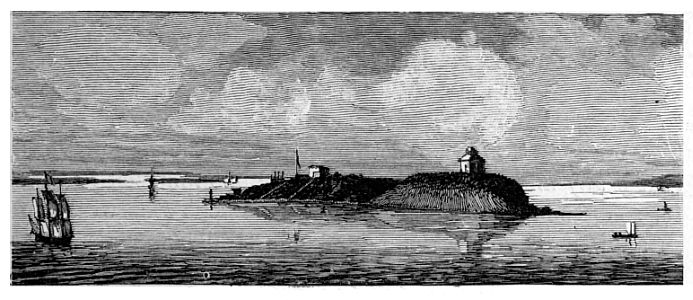
CASTLE WILLIAM, BOSTON HARBOUR
It was now, in the summer of 1768, that Samuel Adams made up his mind that there was no hope of redress from the British government, and that the only remedy was to be found in the assertion of political independence by the American colonies.Samuel Adams makes up his mind, 1768 The courteous petitions and temperate remonstrances of the American assemblies had been met, not by rational arguments, but by insulting and illegal royal orders; and now at last an army was on the way from England to enforce the tyrannical measures of government, and to terrify the people into submission. Accordingly, Adams came to the conclusion that the only proper course for the colonies was to declare themselves independent of Great Britain, to unite together in a permanent confederation, and to invite European alliances. We have his own word for the fact that from this moment until the Declaration of Independence, in 1776, he consecrated all his energies, with burning enthusiasm, upon the attainment of that great object. Yet in 1768 no one knew better than Samuel Adams that the time had not yet come when his bold policy could be safely adopted, and that any premature attempt at armed resistance on the part of Massachusetts might prove fatal. At this time, probably no other American statesman had thought the matter out so far as to reach Adams’s conclusions. No American had as yet felt any desire to terminate the political connection with England. Even those who most thoroughly condemned the measures of the government did not consider the case hopeless, but believed that in one way or another a peaceful solution was still attainable. For a long time this attitude was sincerely and patiently maintained. Even Washington, when he came to take command of the army at Cambridge, after the battle of Bunker Hill, had not made up his mind that the object of the war was to be the independence of the colonies. In the same month of July, 1775, Jefferson said expressly, “We have not raised armies with designs of separating from Great Britain and establishing independent states. Necessity has not yet driven us into that desperate measure.” The Declaration of Independence was at last brought about only with difficulty and after prolonged discussion. Our great-great-grandfathers looked upon themselves as Englishmen, and felt proud of their connection with England. Their determination to resist arbitrary measures was at first in no way associated in their minds with disaffection toward the mother-country. Besides this, the task of effecting a separation by military measures seemed to most persons quite hopeless. It was not until after Bunker Hill had shown that American soldiers were a match for British soldiers in the field, and after Washington’s capture of Boston had shown that the enemy really could be dislodged from a whole section of the country, that the more hopeful patriots began to feel confident of the ultimate success of a war for independence. It is hard for us now to realize how terrible the difficulties seemed to the men who surmounted them. Throughout the war, beside the Tories who openly sympathized with the enemy, there were many worthy people who thought we were “going too far,” and who magnified our losses and depreciated our gains,—quite like the people who, in the War of Secession, used to be called “croakers.” The depression of even the boldest, after such defeats as that of Long Island, was dreadful. How inadequate was the general sense of our real strength, how dim the general comprehension of the great events that were happening, may best be seen in the satirical writings of some of the loyalists. At the time of the French alliance, there were many who predicted that the result of this step would be to undo the work of the Seven Years’ War, to reinstate the French in America with full control over the thirteen colonies, and to establish despotism and popery all over the continent. A satirical pamphlet, published in 1779, just ten years before the Bastille was torn down in Paris, drew an imaginary picture of a Bastille which ten years later was to stand in New York, and, with still further license of fantasy, portrayed Samuel Adams in the garb of a Dominican friar. Such nonsense is of course no index to the sentiments or the beliefs of the patriotic American people, but the mere fact that it could occur to anybody shows how hard it was for people to realize how competent America was to take care of herself. The more we reflect upon the slowness with which the country came to the full consciousness of its power and importance, the more fully we bring ourselves to realize how unwilling America was to tear herself asunder from England, and how the Declaration of Independence was only at last resorted to when it had become evident that no other course was compatible with the preservation of our self-respect; the more thoroughly we realize all this, the nearer we shall come toward duly estimating the fact that in 1768, seven years before the battle of Lexington, the master mind of Samuel Adams had fully grasped the conception of a confederation of American states independent of British control. The clearness with which he saw this, as the inevitable outcome of the political conditions of the time, gave to his views and his acts, in every emergency that arose, a commanding influence throughout the land.
In September, 1768, it was announced in Boston that the troops were on their way, and would soon be landed. There happened to be a legal obstacle, unforeseen by the ministry, to their being quartered in the town. In accordance with the general act of Parliament for quartering troops, the regular barracks at Castle William in the harbour would have to be filled before the town could be required to find quarters for any troops. Another clause of the act provided that if any military officer should take upon himself to quarter soldiers in any of his Majesty’s dominions otherwise than as allowed by the act, he should be straightway dismissed the service.Arrival of troops in Boston At the news that the troops were about to arrive, the governor was asked to convene the assembly, that it might be decided how to receive them. On Bernard’s refusal, the selectmen of Boston issued a circular, inviting all the towns of Massachusetts to send delegates to a general convention, in order that deliberate action might be taken upon this important matter. In answer to the circular, delegates from ninety-six towns assembled in Faneuil Hall, and, laughing at the governor’s order to “disperse,” proceeded to show how, in the exercise of the undoubted right of public meeting, the colony could virtually legislate for itself, in the absence of its regular legislature. The convention, finding that nothing was necessary for Boston to do but insist upon strict compliance with the letter of the law, adjourned. In October, two regiments arrived, and were allowed to land without opposition, but no lodging was provided for them. Bernard, in fear of an affray, had gone out into the country; but nothing could have been farther from the thoughts of the people. The commander, Colonel Dalrymple, requested shelter for his men, but was told that he must quarter them in the barracks at Castle William. As the night was frosty, however, the Sons of Liberty allowed them to sleep in Faneuil Hall. Next day, the governor, finding everything quiet, came back, and heard Dalrymple’s complaint. But in vain did he apply in turn to the council, to the selectmen, and to the justices of the peace, to grant quarters for the troops; he was told that the law was plain, and that the Castle must first be occupied. The governor then tried to get possession of an old dilapidated building which belonged to the colony; but the tenants had taken legal advice, and told him to turn them out if he dared. Nothing could be more provoking. General Gage was obliged to come on from his headquarters at New York; but not even he, the commander-in-chief of his Majesty’s forces in America, could quarter the troops in violation of the statute without running the risk of being cashiered, on conviction before two justices of the peace. So the soldiers stayed at night in tents on the Common, until the weather grew so cold that Dalrymple was obliged to hire some buildings for them at exorbitant rates, and at the expense of the Crown. By way of insult to the people, two cannon were planted on King Street, with their muzzles pointing toward the Town House. But as the troops could do nothing without a requisition from a civil magistrate, and as the usual strict decorum was preserved throughout the town, there was nothing in the world for them to do. In case of an insurrection, the force was too small to be of any use; and so far as the policy of overawing the town was concerned, no doubt the soldiers were more afraid of the people than the people of the soldiers.
Letters of “Vindex” No sooner were the soldiers thus established in Boston than Samuel Adams published a series of letters signed “Vindex,” in which he argued that to keep up “a standing army within the kingdom in time of peace, without the consent of Parliament, was against the law; that the consent of Parliament necessarily implied the consent of the people, who were always present in Parliament, either by themselves or by their representatives; and that the Americans, as they were not and could not be represented in Parliament, were therefore suffering under military tyranny over which they were allowed to exercise no control.” The only notice taken of this argument by Bernard and Hillsborough was an attempt to collect evidence upon the strength of which its author might be indicted for treason, and sent over to London to be tried; but Adams had been so wary in all his proceedings that it was impossible to charge him with any technical offence, and to have seized him otherwise than by due process of law would have been to precipitate rebellion in Massachusetts.
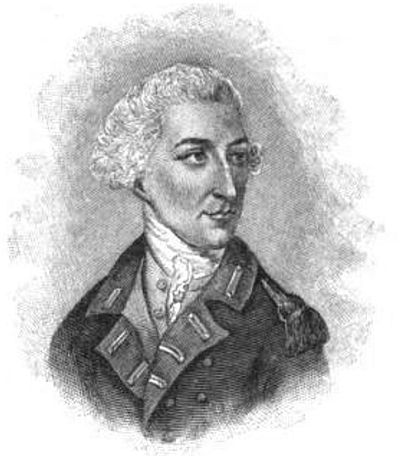
GENERAL HENRY CONWAY
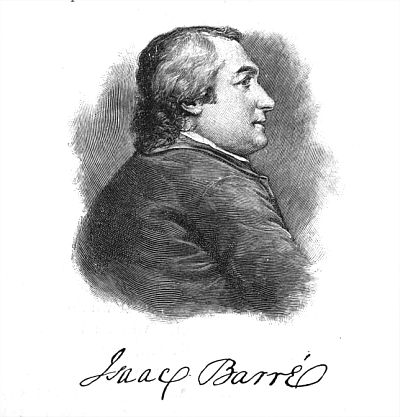
In Parliament, the proposal to extend the act of Henry VIII. to America was bitterly opposed by Burke, Barré, Pownall, and Dowdeswell, as well as by Grenville, who characterized it as sheer madness; but the measure was carried, nevertheless.Debate in Parliament Burke further maintained, in an eloquent speech, that the royal order requiring Massachusetts to rescind her circular letter was unconstitutional; and here again Grenville agreed with him. The attention of Parliament, during the spring of 1769, was occupied chiefly with American affairs. Pownall moved that the Townshend acts should be repealed, and in this he was earnestly seconded by a petition of the London merchants; for the non-importation policy of Americans had begun to bear hard upon business in London. After much debate, Lord North proposed a compromise, repealing all the Townshend acts except that which laid duty on tea. The more clear-headed members saw that such a compromise, which yielded nothing in the matter of principle, would do no good. Beckford pointed out the fact that the tea-duty did not bring in £300 to the government; and Lord Beauchamp pertinently asked whether it were worth while, for such a paltry revenue, to make enemies of three millions of people. Grafton, Camden, Conway, Burke, Barré, and Dowdeswell wished to have the tea-duty repealed also, and the whole principle of parliamentary taxation given up; and Lord North agreed with them in his secret heart, but could not bring himself to act contrary to the king’s wishes. “America must fear you before she can love you,” said Lord North.... “I am against repealing the last act of Parliament, securing to us a revenue out of America; I will never think of repealing it until I see America prostrate at my feet.” “To effect this,” said Barré, “is not so easy as some imagine; the Americans are a numerous, a respectable, a hardy, a free people.Colonel Barré’s speech But were it ever so easy, does any friend to his country really wish to see America thus humbled? In such a situation, she would serve only as a monument of your arrogance and your folly. For my part, the America I wish to see is America increasing and prosperous, raising her head in graceful dignity, with freedom and firmness asserting her rights at your bar, vindicating her liberties, pleading her services, and conscious of her merit. This is the America that will have spirit to fight your battles, to sustain you when hard pushed by some prevailing foe, and by her industry will be able to consume your manufactures, support your trade, and pour wealth and splendour into your towns and cities. If we do not change our conduct towards her, America will be torn from our side.... Unless you repeal this law, you run the risk of losing America.” But the ministers were deaf to Barré’s sweet reasonableness. “We shall grant nothing to the Americans,” said Lord Hillsborough, “except what they may ask with a halter round their necks.” “They are a race of convicted felons,” echoed poor old Dr. Johnson,—who had probably been reading Moll Flanders,—“and they ought to be thankful for anything we allow them short of hanging.”
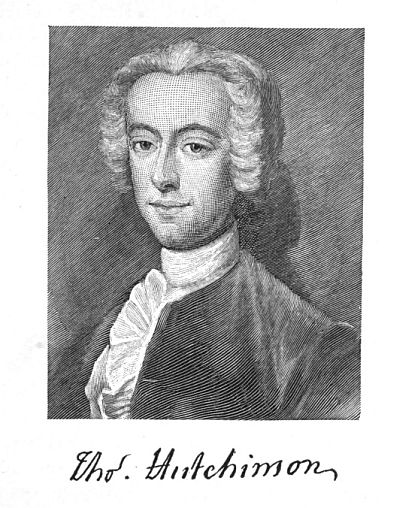
As the result of the discussion, Lord North’s so-called compromise was adopted, and a circular was sent to America, promising that all the obnoxious acts, except the tea duty, should be repealed. At the same time, Bernard was recalled from Massachusetts to appease the indignation of the people, and made a baronet to show that the ministry approved of his conduct as governor. Thomas HutchinsonHis place was filled by the lieutenant-governor, Thomas Hutchinson, a man of great learning and brilliant talent, whose “History of Massachusetts Bay” entitles him to a high rank among the worthies of early American literature. The next year Hutchinson was appointed governor. As a native of Massachusetts, it was supposed by Lord North that he would be less likely to irritate the people than his somewhat arrogant predecessor. But in this the government turned out to be mistaken. As to Hutchinson’s sincere patriotism there can now be no doubt whatever. There was something pathetic in the intensity of his love for New England, which to him was the goodliest of all lands, the paradise of this world. He had been greatly admired for his learning and accomplishments, and the people of Massachusetts had elected him to one office after another, and shown him every mark of esteem until the evil days of the Stamp Act. It then began to appear that he was a Tory on principle, and a thorough believer in the British doctrine of the absolute supremacy of Parliament, and popular feeling presently turned against him. He was called a turncoat and traitor, and a thankless dog withal, whose ruling passion was avarice. His conduct and his motives were alike misjudged. He had tried to dissuade the Grenville ministry from passing the Stamp Act; but when once the obnoxious measure had become law, he thought it his duty to enforce it like other laws. For this he was charged with being recreant to his own convictions, and in the shameful riot of August, 1765, he was the worst sufferer. No public man in America has ever been the object of more virulent hatred. None has been more grossly misrepresented by historians. His appointment as governor, however well meant, turned out to be anything but a wise measure.
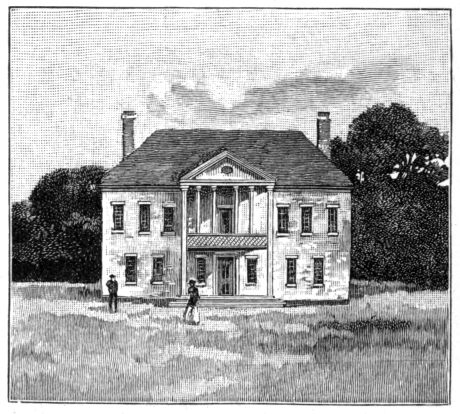
CAPITOL AT WILLIAMSBURGH, VIRGINIA
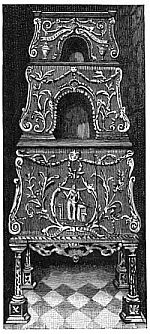
STOVE USED IN THE HOUSE OF BURGESSESWhile these things were going on, a strong word of sympathy came from
Virginia. When Hillsborough made up his mind to browbeat Boston, he
thought it worth while to cajole the Virginians, and try to win them
from the cause which Massachusetts was so boldly defending. So Lord
Botetourt, a genial and conciliatory man, was sent over to be governor
of Virginia, to beguile the people with his affable manner and sweet
discourse. But between a quarrelsome Bernard and a gracious Botetourt
the practical difference was little, where grave questions of
constitutional right were involved.Virginia resolutions, 1769 In May, 1769, the House of Burgesses
assembled at Williamsburgh. Among its members were Patrick Henry,
Washington, and Jefferson. The assembly condemned the Townshend acts,
asserted that the people of Virginia could be taxed only by their own
representatives, declared that it was both lawful and expedient for all
the colonies to join in a protest against any violation of the rights of
Americans, and especially warned the king of the dangers that might
ensue if any American citizen were to be carried beyond sea for trial.
Finally, it sent copies of these resolutions to all the other colonial
assemblies, inviting their concurrence. At this point Lord Botetourt
dissolved the assembly; but the members straightway met again in
convention at the famous Apollo room of the Raleigh tavern, and adopted
a series of resolutions prepared by Washington, in which they pledged
themselves to continue the policy of non-importation until all the
obnoxious acts of 1767 should be repealed. These resolutions were
adopted by all the southern colonies.
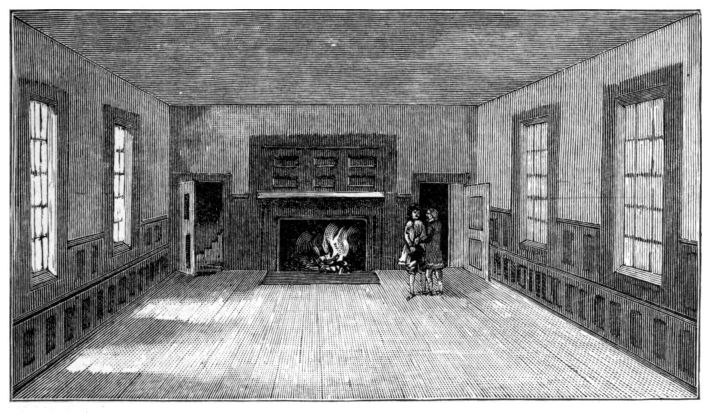
APOLLO ROOM IN THE RALEIGH TAVERN
All through the year 1769, the British troops remained quartered in Boston at the king’s expense. According to Samuel Adams, their principal employment seemed to be to parade in the streets, and by their merry-andrew tricks to excite the contempt of women and children. But the soldiers did much to annoy the people, to whom their very presence was an insult. They led brawling, riotous lives, and made the quiet streets hideous by night with their drunken shouts. Scores of loose women, who had followed the regiments across the ocean, came to scandalize the town for a while, and then to encumber the almshouse. On Sundays the soldiers would race horses on the Common, or play Yankee Doodle just outside the church-doors during the services. Now and then oaths, or fisticuffs, or blows with sticks, were exchanged between soldiers and citizens, and once or twice a more serious affair occurred. Assault on James OtisOne evening in September, a dastardly assault was made upon James Otis, in the British Coffee House, by one Robinson, a commissioner of customs, assisted by half a dozen army officers. It reminds one of the assault upon Charles Sumner by Brooks of South Carolina, shortly before the War of Secession. Otis was savagely beaten, and received a blow on the head with a sword, from the effects of which he never recovered, but finally lost his reason. The popular wrath at this outrage was intense, but there was no disturbance. Otis brought suit against Robinson, and recovered £2,000 in damages, but refused to accept a penny of it when Robinson confessed himself in the wrong, and humbly asked pardon for his irreparable offence.
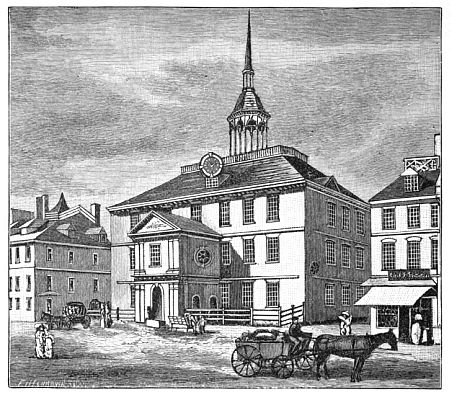
OLD BRICK MEETING-HOUSE
On the 22d of February, 1770, an informer named Richardson, being pelted by a party of schoolboys, withdrew into his house, opened a window, and fired at random into the crowd, killing one little boy and severely wounding another. He was found guilty of murder, but was pardoned. At last, on the 2d of March, an angry quarrel occurred between a party of soldiers and some of the workmen at a ropewalk, and for two or three days there was considerable excitement in the town, and people talked together, standing about the streets in groups; but Hutchinson did not even take the precaution of ordering the soldiers to be kept within their barracks, for he did not believe that the people intended a riot, nor that the troops would dare to fire on the citizens without express permission from himself. On the evening of March 5th, at about eight o’clock, a large crowd collected near the barracks, on Brattle Street, and from bandying abusive epithets with the soldiers began pelting them with snow-balls and striking at them with sticks, while the soldiers now and then dealt blows with their muskets.The “Boston Massacre” Presently Captain Goldfinch, coming along, ordered the men into their barracks for the night, and thus stopped the affray. But meanwhile some one had got into the Old Brick Meeting-House, opposite the head of King Street, and rung the bell; and this, being interpreted as an alarm of fire, brought out many people into the moonlit streets. It was now a little past nine. The sentinel who was pacing in front of the Custom House had a few minutes before knocked down a barber’s boy for calling names at the captain, as he went up to stop the affray on Brattle Street. The crowd in King Street now began to pelt the sentinel, and some shouted, “Kill him!” when Captain Preston and seven privates from the twenty-ninth regiment crossed the street to his aid: and thus the file of nine soldiers confronted an angry crowd of fifty or sixty unarmed men, who pressed up to the very muzzles of their guns, threw snow at their faces, and dared them to fire. All at once, but quite unexpectedly and probably without orders from Preston, seven of the levelled pieces were discharged, instantly killing four men and wounding seven others, of whom two afterwards died. Immediately the alarm was spread through the town, and it might have gone hard with the soldiery, had not Hutchinson presently arrived on the scene, and quieted the people by ordering the arrest of Preston and his men. Next morning the council advised the removal of one of the regiments, but in the afternoon an immense town meeting, called at Faneuil Hall, adjourned to the Old South Meeting-House; and as they passed by the Town House (or what we now call the Old State House), the lieutenant-governor, looking out upon their march, judged “their spirit to be as high as was the spirit of their ancestors when they imprisoned Andros, while they were four times as numerous.” All the way from the church to the Town House the street was crowded with the people, while a committee, headed by Samuel Adams, waited upon the governor, and received his assurance that one regiment should be removed. As the committee came out from the Town House, to carry the governor’s reply to the meeting in the church, the people pressed back on either side to let them pass; and Adams, leading the way with uncovered head through the lane thus formed, and bowing first to one side and then to the other, passed along the watchword, “Both regiments, or none!” When, in the church, the question was put to vote, three thousand voices shouted, “Both regiments, or none!” and armed with this ultimatum the committee returned to the Town House, where the governor was seated with Colonel Dalrymple and the members of the council. Then Adams, in quiet but earnest tones, stretching forth his arm and pointing his finger at Hutchinson, said that if as acting governor of the province he had the power to remove one regiment he had equally the power to remove both, that the voice of three thousand freemen demanded that all soldiery be forthwith removed from the town, and that if he failed to heed their just demand, he did so at his peril. “I observed his knees to tremble,” said the old hero afterward, “I saw his face grow pale,—and I enjoyed the sight!” That Hutchinson was agitated we may well believe; not from fear, but from a sudden sickening sense of the odium of his position as king’s representative at such a moment. He was a man of invincible courage, and surely would never have yielded to Adams, had he not known that the law was on the side of the people and that the soldiers were illegal trespassers in Boston. Before sundown the order had gone forth for the removal of both regiments to Castle William, and not until then did the meeting in the church break up. From that day forth the fourteenth and twenty-ninth regiments were known in Parliament as “the Sam Adams regiments.”
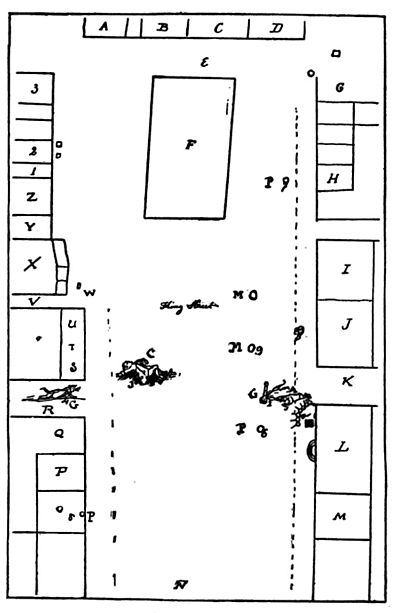
PAUL REVERE’S PLAN OF KING STREET IN 1770
(Used in the trial of the soldiers)
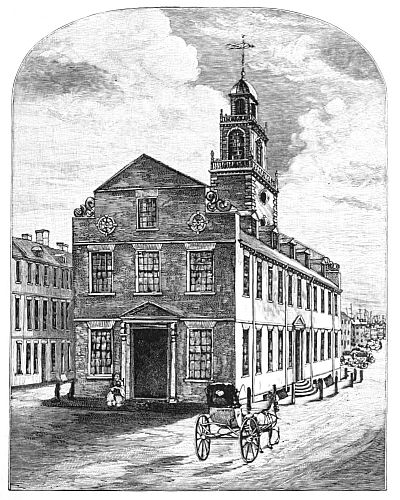
OLD STATE HOUSE, WEST FRONT
Such was the famous Boston Massacre. All the mildness of New England civilization is brought most strikingly before us in that truculent phrase. The careless shooting of half a dozen townsmen is described by a word which historians apply to such events as Cawnpore or the Sicilian Vespers. Lord Sherbrooke, better known as Robert Lowe, declared a few years ago, in a speech on the uses of a classical education, that the battle of Marathon was really of less account than a modern colliery explosion, because only one hundred and ninety-two of the Greek army lost their lives! From such a point of view, one might argue that the Boston Massacre was an event of far less importance than an ordinary free fight among Colorado gamblers. It is needless to say that this is not the historical point of view. Historical events are not to be measured with a foot-rule.Some lessons of the “Massacre” This story of the Boston Massacre is a very trite one, but it has its lessons. It furnishes an instructive illustration of the high state of civilization reached by the people among whom it happened,—by the oppressors as well as those whom it was sought to oppress. The quartering of troops in a peaceful town is something that has in most ages been regarded with horror. Under the senatorial government of Rome, it used to be said that the quartering of troops, even upon a friendly province and for the purpose of protecting it, was a visitation only less to be dreaded than an inroad of hostile barbarians. When we reflect that the British regiments were encamped in Boston during seventeen months, among a population to whom they were thoroughly odious, the fact that only half a dozen persons lost their lives, while otherwise no really grave crimes seem to have been committed, is a fact quite as creditable to the discipline of the soldiers as to the moderation of the people. In most ages and countries, the shooting of half a dozen citizens under such circumstances would either have produced but a slight impression, or, on the other hand, would perhaps have resulted on the spot in a wholesale slaughter of the offending soldiers. The fact that so profound an impression was made in Boston and throughout the country, while at the same time the guilty parties were left to be dealt with in the ordinary course of law, is a striking commentary upon the general peacefulness and decorum of American life, and it shows how high and severe was the standard by which our forefathers judged all lawless proceedings. And here it may not be irrelevant to add that, throughout the constitutional struggles which led to the Revolution, the American standard of political right and wrong was so high that contemporary European politicians found it sometimes difficult to understand it. And for a like reason, even the most fair-minded English historians sometimes fail to see why the Americans should have been so quick to take offence at acts of the British government which doubtless were not meant to be oppressive. If George III. had been a bloodthirsty despot, like Philip II. of Spain; if General Gage had been another Duke of Alva; if American citizens by the hundred had been burned alive or broken on the wheel in New York and Boston; if whole towns had been given up to the cruelty and lust of a beastly soldiery, then no one—not even Dr. Johnson—would have found it hard to understand why the Americans should have exhibited a rebellious temper. But it is one signal characteristic of the progress of political civilization that the part played by sheer brute force in a barbarous age is fully equalled by the part played by a mere covert threat of injustice in a more advanced age. The effect which a blow in the face would produce upon a barbarian will be wrought upon a civilized man by an assertion of some far-reaching legal principle, which only in a subtle and ultimate analysis includes the possibility of a blow in the face. From this point of view, the quickness with which such acts as those of Charles Townshend were comprehended in their remotest bearings is the must striking proof one could wish of the high grade of political culture which our forefathers had reached through their system of perpetual free discussion in town meeting. They had, moreover, reached a point where any manifestation of brute force in the course of a political dispute was exceedingly disgusting and shocking to them. To their minds, the careless slaughter of six citizens conveyed as much meaning as a St. Bartholomew massacre would have conveyed to the minds of men in a lower stage of political development. It was not strange, therefore, that Samuel Adams and his friends should have been ready to make the Boston Massacre the occasion of a moral lesson to their contemporaries. As far as the poor soldiers were concerned, the most significant fact is that there was no attempt to wreak a paltry vengeance on them. Brought to trial on a charge of murder, after a judicious delay of seven months, they were ably defended by John Adams and Josiah Quincy, and all were acquitted save two, who were convicted of manslaughter, and let off with slight punishment. There were some hotheads who grumbled at the verdict, but the people of Boston generally acquiesced in it, as they showed by immediately choosing John Adams for their representative in the assembly—a fact which Mr. Lecky calls very remarkable. Such an event as the Boston Massacre could not fail for a long time to point a moral among a people so unused to violence and bloodshed. One of the earliest of American engravers, Paul Revere, published a quaint coloured engraving of the scene in King Street, which for a long time was widely circulated, though it has now become very scarce. At the same time, it was decided that the fatal Fifth of March should be solemnly commemorated each year by an oration to be delivered in the Old South Meeting-House; and this custom was kept up until the recognition of American independence in 1783, when the day for the oration was changed to the Fourth of July.
Lord North’s ministry Five weeks before the Boston Massacre the Duke of Grafton had resigned, and Lord North had become prime minister of England. The colonies were kept under , and that great friend of arbitrary government, Lord Thurlow, as solicitor-general, became the king’s chief legal adviser. George III was now, to all intents and purposes, his own prime minister, and remained so until after the overthrow at Yorktown. The colonial policy of the government soon became more vexatious than ever. The promised repeal of all the Townshend acts, except the act imposing the tea-duty, was carried through Parliament in April, and its first effect in America, as Lord North had foreseen, was to weaken the spirit of opposition, and to divide the more complaisant colonies from those that were most staunch. The policy of non-importation had pressed with special severity upon the commerce of New York, and the merchants there complained that the fire-eating planters of Virginia and farmers of Massachusetts were growing rich at the expense of their neighbours. The merchants of New York In July, the New York merchants broke the non-importation agreement, and sent orders to England for all sorts of merchandise except tea. Such a measure, on the part of so great a seaport, virtually overthrew the non-importation policy, upon which the patriots mainly relied to force the repeal of the Tea Act. The wrath of the other colonies was intense. At the Boston town meeting the letter of the New York merchants was torn in pieces. In New Jersey, the students of Princeton College, James Madison being one of the number, assembled on the green in their black gowns and solemnly burned the letter, while the church-bells were tolled. The offending merchants were stigmatized as “Revolters,” and in Charleston their conduct was vehemently denounced. “You had better send us your old liberty-pole,” said Philadelphia to New York, with bitter sarcasm, “for you clearly have no further use for it.”
This breaking of the non-importation agreement by New York left no
general issue upon which the colonies could be sure to unite unless the
ministry should proceed to force an issue upon the Tea Act. For the
present, Lord North saw the advantage he had gained, and was not
inclined to take any such step. Nevertheless, as just observed, the
policy of the government soon became more vexatious than ever. Assemblies convened at strange placesIn the
summer of 1770, the king entered upon a series of local quarrels with
the different colonies, taking care not to raise any general issue.
Royal instructions were sent over to the different governments,
enjoining courses of action which were unconstitutional and sure to
offend the people. The assemblies were either dissolved, or convened at
strange places, as at Beaufort in South Carolina, more than seventy
miles from the capital, or at Cambridge in Massachusetts. The local
governments were as far as possible ignored, and local officers were
appointed, with salaries to be paid by the Crown. In Massachusetts,
these officers were illegally exempted from the payment of taxes.Taxes in Maryland In
Maryland, where the charter had expressly provided that no taxes could
ever be levied by the British Crown, the governor was ordered to levy
taxes indirectly by reviving a law regulating officers’ fees, which had
expired by lapse of time.The North Carolina “Regulators” In North Carolina, excessive fees were
extorted, and the sheriffs in many cases collected taxes of which they
rendered no account. The upper counties of both the Carolinas were
peopled by a hardy set of small farmers and herdsmen, Presbyterians, of
Scotch-Irish pedigree, who were known by the name of “Regulators,”
because, under the exigencies of their rough frontier life, they formed
voluntary associations for the regulation of their own police and the
condign punishment of horse-thieves and other criminals.  In 1771, the
North Carolina Regulators, goaded by repeated acts of extortion and of
unlawful imprisonment, rose in rebellion. A battle was fought at
Alamance, near the headwaters of the Cape Fear river, in which the
Regulators were totally defeated by Governor Tryon, leaving more than a
hundred of their number dead and wounded upon the field: and six of
their leaders, taken prisoners, were summarily hanged for treason. After
this achievement Tryon was promoted to the governorship of New York,
where he left his name for a time upon the vaguely defined wilderness
beyond Schenectady, known in the literature of the Revolutionary War as
Tryon County.
In 1771, the
North Carolina Regulators, goaded by repeated acts of extortion and of
unlawful imprisonment, rose in rebellion. A battle was fought at
Alamance, near the headwaters of the Cape Fear river, in which the
Regulators were totally defeated by Governor Tryon, leaving more than a
hundred of their number dead and wounded upon the field: and six of
their leaders, taken prisoners, were summarily hanged for treason. After
this achievement Tryon was promoted to the governorship of New York,
where he left his name for a time upon the vaguely defined wilderness
beyond Schenectady, known in the literature of the Revolutionary War as
Tryon County.
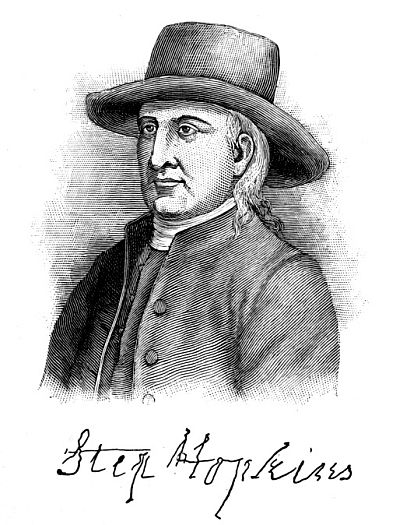
Affair of the Gaspee In Rhode Island, the eight-gun schooner Gaspee, commanded by Lieutenant Duddington, was commissioned to enforce the revenue acts along the coasts of Narragansett Bay, and she set about the work with reckless and indiscriminating zeal. “Thorough” was Duddington’s motto, as it was Lord Stafford’s. He not only stopped and searched every vessel that entered the bay, and seized whatever goods he pleased, whether there was any evidence of their being contraband or not, but, besides this, he stole the sheep and hogs of the farmers near the coast, cut down their trees, fired upon market-boats, and behaved in general with unbearable insolence. In March, 1772, the people of Rhode Island complained of these outrages. The matter was referred to Rear-Admiral Montagu, commanding the little fleet in Boston harbour. Montagu declared that the lieutenant was only doing his duty, and threatened the Rhode Island people in case they should presume to interfere. For three months longer the Gaspee kept up her irritating behaviour, until one evening in June, while chasing a swift American ship, she ran aground. The following night she was attacked by a party of men in eight boats, and captured after a short skirmish, in which Duddington was severely wounded. The crew was set on shore, and the schooner was burned to the water’s edge. This act of reprisal was not relished by the government, and large rewards were offered for the arrest of the men concerned in it; but although probably everybody knew who they were, it was impossible to obtain any evidence against them. By a royal order in council, the Rhode Island government was commanded to arrest the offenders and deliver them to Rear-Admiral Montagu, to be taken over to England for trial; but Stephen Hopkins, the venerable chief justice of Rhode Island, flatly refused to take cognizance of any such arrest if made within the colony.
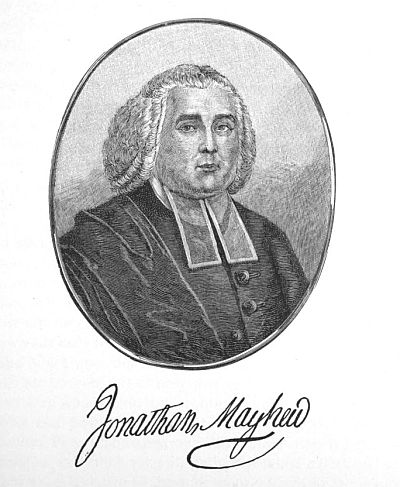
The black thunder clouds of war now gathered quickly. In August, 1772,
the king ventured upon an act which went further than anything that had
yet occurred toward hastening on the crisis.The salaries of the judgesIt was ordered that all the
Massachusetts judges, holding their places during the king’s pleasure,
should henceforth have their salaries paid by the Crown, and not by the
colony. This act, which aimed directly at the independence of the
judiciary, aroused intense indignation. The people of Massachusetts were
furious, and Samuel Adams now took a step which contributed more than
anything that had yet been done toward organizing the opposition to the
king throughout the whole country. The idea of establishing committees
of correspondence was not wholly new. Jonathan Mayhew’s suggestionThe great preacher Jonathan Mayhew
had recommended such a step to James Otis in 1766, and he was led to it
through his experience of church matters. Writing in haste, on a Sunday
morning, he said, “To a good man all time is holy enough; and none is
too holy to do good, or to think upon it. Cultivating a good
understanding and hearty friendship between these colonies appears to me
so necessary a part of prudence and good policy that no favourable
opportunity for that purpose should be omitted.... You have heard of the
communion of churches: ... while I was thinking of this in my bed, the
great use and importance of a communion of colonies appeared to me in
a strong light, which led me immediately to set down these hints to
transmit to you.” The plan which Mayhew had in mind was the
establishment of a regular system of correspondence whereby the colonies
could take combined action in defence of their liberties. In the grand
crisis of 1772, Samuel Adams saw how much might be effected through
committees of correspondence that could not well be effected through
the ordinary governmental machinery of the colonies. At the October town
meeting in Boston, a committee was appointed to ask the governor whether
the judges’ salaries were to be paid in conformity to the royal order;
and he was furthermore requested to convoke the assembly, in order that
the people might have a chance to express their views on so important a
matter. But Hutchinson told the committee to mind its own business: he
refused to say what would be done about the salaries, and denied the
right of the town to petition for a meeting of the assembly.
Massachusetts was thus virtually without a general government at a
moment when the public mind was agitated by a question of supreme
importance. The committees of correspondence in MassachusettsSamuel Adams thereupon in town meeting moved the appointment
of a committee of correspondence, “to consist of twenty-one persons, to
state the rights of the colonists and of this province in particular, as
men and Christians and as subjects; and to communicate and publish the
same to the several towns and to the world as the sense of this town,
with the infringements and violations thereof that have been, or from
time to time may be, made.” The adoption of this measure at first
excited the scorn of Hutchinson, who described the committee as composed
of “deacons,” “atheists,” and “black-hearted fellows,” whom one would
not care to meet in the dark. He predicted that they would only make
themselves ridiculous, but he soon found reason to change his mind. The
response to the statements of the Boston committee was prompt and
unanimous, and before the end of the year more than eighty towns had
already organized their committees of correspondence. Here was a new
legislative body, springing directly from the people, and competent, as
events soon showed, to manage great affairs. Its influence reached into
every remotest corner of Massachusetts, it was always virtually in
session, and no governor could dissolve or prorogue it. Though unknown
to the law, the creation of it involved no violation of law. The right
of the towns of Massachusetts to ask one another’s advice could no more
be disputed than the right of the freemen of any single town to hold a
town meeting. The power thus created was omnipresent, but intangible. “This,” said Daniel Leonard, the great Tory pamphleteer, two years
afterwards, “is the foulest, subtlest, and most venomous serpent ever
issued from the egg of sedition. It is the source of the rebellion. I
saw the small seed when it was planted: it was a grain of mustard. I
have watched the plant until it has become a great tree. The vilest
reptiles that crawl upon the earth are concealed at the root; the
foulest birds of the air rest upon its branches. I would now induce you
to go to work immediately with axes and hatchets and cut it down, for a
twofold reason,—because it is a pest to society, and lest it be felled
suddenly by a stronger arm, and crush its thousands in its fall.”
“This,” said Daniel Leonard, the great Tory pamphleteer, two years
afterwards, “is the foulest, subtlest, and most venomous serpent ever
issued from the egg of sedition. It is the source of the rebellion. I
saw the small seed when it was planted: it was a grain of mustard. I
have watched the plant until it has become a great tree. The vilest
reptiles that crawl upon the earth are concealed at the root; the
foulest birds of the air rest upon its branches. I would now induce you
to go to work immediately with axes and hatchets and cut it down, for a
twofold reason,—because it is a pest to society, and lest it be felled
suddenly by a stronger arm, and crush its thousands in its fall.”
Intercolonial committees of correspondenceThe system of committees of correspondence did indeed grow into a mighty tree; for it was nothing less than the beginning of the American Union. Adams himself by no means intended to confine his plan to Massachusetts, for in the following April he wrote to Richard Henry Lee of Virginia urging the establishment of similar committees in every colony. But Virginia had already acted in the matter. When its assembly met in March, 1773, the news of the refusal of Hopkins to obey the royal order, of the attack upon the Massachusetts judiciary, and of the organization of the committees of correspondence was the all-exciting subject of conversation. The motion to establish a system of intercolonial committees of correspondence was made by the youthful Dabney Carr, and eloquently supported by Patrick Henry and Richard Henry Lee. It was unanimously adopted, and very soon several other colonies elected committees, in response to the invitation from Virginia.
This was the most decided step toward revolution that had yet been taken by the Americans. It only remained for the various intercolonial committees to assemble together, and there would be a Congress speaking in the name of the continent. To bring about such an act of union, nothing more was needed than some fresh course of aggression on the part of the British government which should raise a general issue in all the colonies; and, with the rare genius for blundering which had possessed it ever since the accession of George III., the government now went on to provide such an issue. It was preëminently a moment when the question of taxation should have been let alone. Throughout the American world there was a strong feeling of irritation, which might still have been allayed had the ministry shown a yielding temper. The grounds of complaint had come to be different in the different colonies, and in some cases, in which we can clearly see the good sense of Lord North prevailing over the obstinacy of the king, the ministry had gained a point by yielding. In the Rhode Island case, they had seized a convenient opportunity and let the matter drop, to the manifest advantage of their position.The question of taxation revived In Massachusetts, the discontent had come to be alarming, and it was skilfully organized. The assembly had offered the judges their salaries in the usual form, and had threatened to impeach them if they should dare to accept a penny from the Crown. The recent action of Virginia had shown that these two most powerful of the colonies were in strong sympathy with one another. It was just this moment that George III. chose for reviving the question of taxation, upon which all the colonies would be sure to act as a unit, and sure to withstand him to his face. The duty on tea had been retained simply as a matter of principle. It did not bring three hundred pounds a year into the British exchequer. But the king thought this a favourable time for asserting the obnoxious principle which the tax involved.
Thus, as in Mrs. Gamp’s case, a teapot became the cause or occasion of a
division between friends. The measures now taken by the government
brought matters at once to a crisis. None of the colonies would take
tea on its terms.  Lord Hillsborough had lately been superseded as
colonial secretary by Lord Dartmouth, an amiable man like the prime
minister, but like him wholly under the influence of the king. Lord
Dartmouth’s appointment was made the occasion of introducing a series of
new measures. The affairs of the East India Company were in a bad
condition, and it was thought that the trouble was partly due to the
loss of the American trade in tea. The Americans would not buy tea
shipped from England, but they smuggled it freely from Holland, and the
smuggling could not be stopped by mere force. The best way to obviate
the difficulty, it was thought, would be to make English tea cheaper in
America than foreign tea, while still retaining the duty of threepence
on a pound. If this could be achieved, it was supposed that the
Americans would be sure to buy English tea by reason of its cheapness,
and would thus be ensnared into admitting the principle involved in the
duty. The king’s ingenious scheme
This ingenious scheme shows how unable the king and his ministers
were to imagine that the Americans could take a higher view of the
matter than that of pounds, shillings, and pence. In order to enable the
East India Company to sell its tea cheap in America, a drawback was
allowed of all the duties which such tea had been wont to pay on
entering England on its way from China. In this way, the Americans would
now find it actually cheaper to buy the English tea with the duty on it
than to smuggle their tea from Holland. To this scheme, Lord North said,
it was of no use for any one to offer objections, for the king would
have it so. “The king meant to try the question with America.” In
accordance with this policy, several ships loaded with tea set sail in
the autumn of 1773 for the four principal ports, Boston, New York,
Philadelphia, and Charleston. Agents or consignees of the East India
Company were appointed by letter to receive the tea in these four towns.
Lord Hillsborough had lately been superseded as
colonial secretary by Lord Dartmouth, an amiable man like the prime
minister, but like him wholly under the influence of the king. Lord
Dartmouth’s appointment was made the occasion of introducing a series of
new measures. The affairs of the East India Company were in a bad
condition, and it was thought that the trouble was partly due to the
loss of the American trade in tea. The Americans would not buy tea
shipped from England, but they smuggled it freely from Holland, and the
smuggling could not be stopped by mere force. The best way to obviate
the difficulty, it was thought, would be to make English tea cheaper in
America than foreign tea, while still retaining the duty of threepence
on a pound. If this could be achieved, it was supposed that the
Americans would be sure to buy English tea by reason of its cheapness,
and would thus be ensnared into admitting the principle involved in the
duty. The king’s ingenious scheme
This ingenious scheme shows how unable the king and his ministers
were to imagine that the Americans could take a higher view of the
matter than that of pounds, shillings, and pence. In order to enable the
East India Company to sell its tea cheap in America, a drawback was
allowed of all the duties which such tea had been wont to pay on
entering England on its way from China. In this way, the Americans would
now find it actually cheaper to buy the English tea with the duty on it
than to smuggle their tea from Holland. To this scheme, Lord North said,
it was of no use for any one to offer objections, for the king would
have it so. “The king meant to try the question with America.” In
accordance with this policy, several ships loaded with tea set sail in
the autumn of 1773 for the four principal ports, Boston, New York,
Philadelphia, and Charleston. Agents or consignees of the East India
Company were appointed by letter to receive the tea in these four towns.
As soon as the details of this scheme were known in America, the whole country was in a blaze, from Maine to Georgia. Nevertheless, only legal measures of resistance were contemplated. In Philadelphia, a great meeting was held in October at the State House, and it was voted that whosoever should lend countenance to the receiving or unloading of the tea would be regarded as an enemy to his country. The consignees were then requested to resign their commissions, and did so. How Boston became the battle-groundIn New York and Charleston, also, the consignees threw up their commissions. In Boston, a similar demand was made, but the consignees doggedly refused to resign; and thus the eyes of the whole country were directed toward Boston as the battlefield on which the great issue was to be tried.
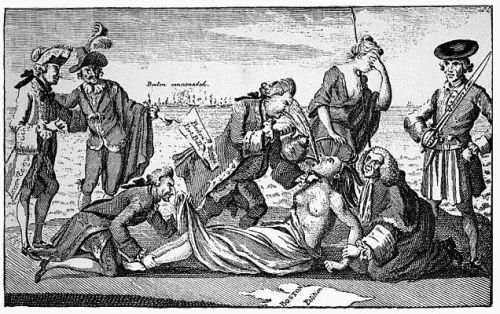
LORD NORTH POURING TEA DOWN COLUMBIA’S THROAT
During the month of November many town meetings were held in Faneuil Hall. On the 17th, authentic intelligence was brought that the tea-ships would soon arrive. The next day, a committee, headed by Samuel Adams, waited upon the consignees, and again asked them to resign. Upon their refusal, the town meeting instantly dissolved itself, without a word of comment or debate; and at this ominous silence the consignees and the governor were filled with a vague sense of alarm, as if some storm were brewing whereof none could foresee the results. The five towns ask adviceAll felt that the decision now rested with the committees of correspondence. Four days afterward, the committees of Cambridge, Brookline, Roxbury, and Dorchester met the Boston committee at Faneuil Hall, and it was unanimously resolved that on no account should the tea be landed. The five towns also sent a letter to all the other towns in the colony, saying, “Brethren, we are reduced to this dilemma: either to sit down quiet under this and every other burden that our enemies shall see fit to lay upon us, or to rise up and resist this and every plan laid for our destruction, as becomes wise freemen. In this extremity we earnestly request your advice.” There was nothing weak or doubtful in the response. From Petersham and Lenox perched on their lofty hilltops, from the valleys of the Connecticut and the Merrimack, from Chatham on the bleak peninsula of Cape Cod, there came but one message,—to give up life and all that makes life dear, rather than submit like slaves to this great wrong. Similar words of encouragement came from other colonies. In Philadelphia, at the news of the bold stand Massachusetts was about to take, the church-bells were rung, and there was general rejoicing about the streets. A letter from the men of Philadelphia to the men of Boston said, “Our only fear is lest you may shrink. May God give you virtue enough to save the liberties of your country.”
On Sunday, the 28th, the Dartmouth, first of the tea-ships, arrived in the harbour. The urgency of the business in hand overcame the sabbatarian scruples of the people. Arrival of the tea; meeting at the Old SouthThe committee of correspondence met at once, and obtained from Francis Rotch, the owner of the vessel, a promise that the ship should not be entered before Tuesday. Samuel Adams then invited the committees of the five towns, to which Charlestown was now added, to hold a mass-meeting the next morning at Faneuil Hall. More than five thousand people assembled, but as the Cradle of Liberty could not hold so many, the meeting was adjourned to the Old South Meeting-House. It was voted, without a single dissenting voice, that the tea should be sent back to England in the ship which had brought it. Rotch was forbidden to enter the ship at the Custom House, and Captain Hall, the ship’s master, was notified that “it was at his peril if he suffered any of the tea brought by him to be landed.” A night-watch of twenty-five citizens was set to guard the vessel, and so the meeting adjourned till next day, when it was understood that the consignees would be ready to make some proposals in the matter. Next day, the message was brought from the consignees that it was out of their power to send back the tea; but if it should be landed, they declared themselves willing to store it, and not expose any of it for sale until word could be had from England. Before action could be taken upon this message, the sheriff of Suffolk county entered the church and read a proclamation from the governor, warning the people to disperse and “surcease all further unlawful proceedings at their utmost peril.” A storm of hisses was the only reply, and the business of the meeting went on. The proposal of the consignees was rejected, and Rotch and Hall, being present, were made to promise that the tea should go back to England in the Dartmouth, without being landed or paying duty. Resolutions were then passed, forbidding all owners or masters of ships to bring any tea from Great Britain to any part of Massachusetts, so long as the act imposing a duty on it remained unrepealed. Whoever should disregard this injunction would be treated as an enemy to his country, his ships would be prevented from landing—by force, if necessary—and his tea would be sent back to the place whence it came. It was further voted that the citizens of Boston and the other towns here assembled would see that these resolutions were carried into effect, “at the risk of their lives and property.” Notice of these resolutions was sent to the owners of the other ships, now daily expected. And, to crown all, a committee, of which Adams was chairman, was appointed to send a printed copy of these proceedings to New York and Philadelphia, to every seaport in Massachusetts, and to the British government.
Two or three days after this meeting, the other two ships arrived, and, under orders from the committee of correspondence, were anchored by the side of the Dartmouth, at Griffin’s Wharf, near the foot of Pearl Street. The tea-ships placed under guard A military watch was kept at the wharf day and night, sentinels were placed in the church belfries, chosen post-riders, with horses saddled and bridled, were ready to alarm the neighbouring towns, beacon-fires were piled all ready for lighting upon every hilltop, and any attempt to land the tea forcibly would have been the signal for an instant uprising throughout at least four counties. Now, in accordance with the laws providing for the entry and clearance of shipping at custom houses, it was necessary that every ship should land its cargo within twenty days from its arrival. In case this was not done, the revenue officers were authorized to seize the ship and land its cargo themselves. In the case of the Dartmouth, the captain had promised to take her back to England without unloading; but still, before she could legally start, she must obtain a clearance from the collector of customs, or, in default of this, a pass from the governor. At sunrise of Friday, the 17th of December, the twenty days would have expired.
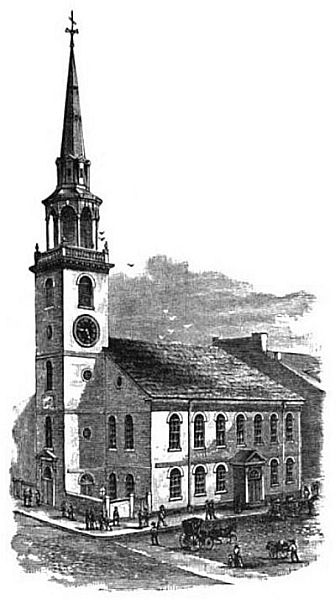
THE OLD SOUTH MEETING-HOUSE
On Saturday, the 11th, Rotch was summoned before the committee of correspondence, and Samuel Adams asked him why he had not kept his promise, and started his ship off for England. He sought to excuse himself on the ground that he had not the power to do so, whereupon he was told that he must apply to the collector for a clearance. Hearing of these things, the governor gave strict orders at the Castle to fire upon any vessel trying to get out to sea without a proper permit; and two ships from Montagu’s fleet, which had been laid up for the winter, were stationed at the entrance of the harbour, to make sure against the Dartmouth’s going out. Tuesday came, and Rotch, having done nothing, was summoned before the town meeting, and peremptorily ordered to apply for a clearance. Samuel Adams and nine other gentlemen accompanied him to the Custom House to witness the proceedings, but the collector refused to give an answer until the next day. The meeting then adjourned till Thursday, the last of the twenty days. On Wednesday morning, Rotch was again escorted to the Custom House, and the collector refused to give a clearance unless the tea should first be landed.
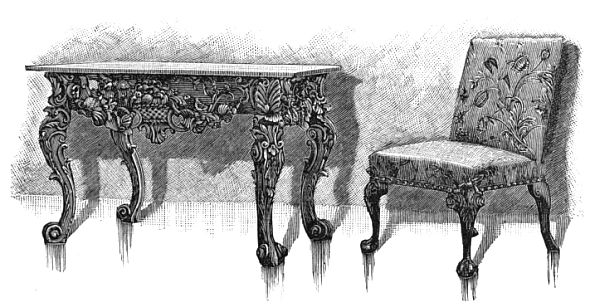
TABLE AND CHAIR FROM GOVERNOR HUTCHINSON’S HOUSE AT MILTON
Town meeting at the Old South On the morning of Thursday, December 16th, the assembly which was gathered in the Old South Meeting-House, and in the streets about it, numbered more than seven thousand people. It was to be one of the most momentous days in the history of the world. The clearance having been refused, nothing now remained but to order Rotch to request a pass for his ship from the governor. But the wary Hutchinson, well knowing what was about to be required of him, had gone out to his country house at Milton, so as to foil the proceedings by his absence. But the meeting was not to be so trifled with. Rotch was enjoined, on his peril, to repair to the governor at Milton, and ask for his pass; and while he was gone, the meeting considered what was to be done in case of a refusal. Without a pass it would be impossible for the ship to clear the harbour under the guns of the Castle; and by sunrise, next morning, the revenue officers would be empowered to seize the ship, and save by a violent assault upon them it would be impossible to prevent the landing of the tea. “Who knows,” said John Rowe, “how tea will mingle with salt water?” And great applause followed the suggestion. Yet the plan which was to serve as a last resort had unquestionably been adopted in secret committee long before this. It appears to have been worked out in detail in a little back room at the office of the “Boston Gazette,” and there is no doubt that Samuel Adams, with some others of the popular leaders, had a share in devising it. But among the thousands present at the town meeting, it is probable that very few knew just what it was designed to do. At five in the afternoon, it was unanimously voted that, come what would, the tea should not be landed. It had now grown dark, and the church was dimly lighted with candles. Determined not to act until the last legal method of relief should have been tried and found wanting, the great assembly was still waiting quietly in and about the church when, an hour after nightfall, Rotch returned from Milton with the governor’s refusal. Then, amid profound stillness, Samuel Adams arose and said, quietly but distinctly, “This meeting can do nothing more to save the country.” It was the declaration of war; the law had shown itself unequal to the occasion, and nothing now remained but a direct appeal to force.The tea thrown into the harbour Scarcely had the watchword left his mouth when a war-whoop answered from outside the door, and fifty men in the guise of Mohawk Indians passed quickly by the entrance, and hastened to Griffin’s Wharf. Before the nine o’clock bell rang, the three hundred and forty-two chests of tea laden upon the three ships had been cut open, and their contents emptied into the sea. Not a person was harmed; no other property was injured; and the vast crowd, looking upon the scene from the wharf in the clear frosty moonlight, was so still that the click of the hatchets could be distinctly heard. Next morning, the salted tea, as driven by wind and wave, lay in long rows on Dorchester beach, while Paul Revere, booted and spurred, was riding post-haste to Philadelphia, with the glorious news that Boston had at last thrown down the gauntlet for the king of England to pick up.
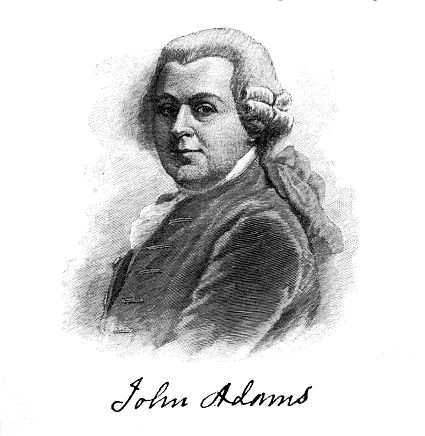
This heroic action of Boston was greeted with public rejoicing throughout all the thirteen colonies, and the other principal seaports were not slow to follow the example. A ship laden with two hundred and fifty-seven chests of tea had arrived at Charleston on the 2d of December; but the consignees had resigned, and after twenty days the ship’s cargo was seized and landed; and so, as there was no one to receive it, or pay the duty, it was thrown into a damp cellar, where it spoiled. In Philadelphia, on the 25th, a ship arrived with tea; but a meeting of five thousand men forced the consignees to resign, and the captain straightway set sail for England, the ship having been stopped before it had come within the jurisdiction of the custom house.
Grandeur of the Boston Tea Party In Massachusetts, the exultation knew no bounds. “This,” said John Adams, “is the most magnificent movement of all. There is a dignity, a majesty, a sublimity, in this last effort of the patriots that I greatly admire.” Indeed, often as it has been cited and described, the Boston Tea Party was an event so great that even American historians have generally failed to do it justice. This supreme assertion by a New England town meeting of the most fundamental principle of political freedom has been curiously misunderstood by British writers, of whatever party. The most recent Tory historian, Mr. Lecky,[2] speaks of “the Tea-riot at Boston,” and characterizes it as an “outrage.” The most recent Liberal historian, Mr. Green, alludes to it as “a trivial riot.” Such expressions betray most profound misapprehension alike of the significance of this noble scene and of the political conditions in which it originated. There is no difficulty in defining a riot. The pages of history teem with accounts of popular tumults, wherein passion breaks loose and wreaks its fell purpose, unguided and unrestrained by reason. No definition could be further from describing the colossal event which occurred in Boston on the 16th of December, 1773. Here passion was guided and curbed by sound reason at every step, down to the last moment, in the dim candle-light of the old church, when the noble Puritan statesman quietly told his hearers that the moment for using force had at last, and through no fault of theirs, arrived. They had reached a point where the written law had failed them; and in their effort to defend the eternal principles of natural justice, they were now most reluctantly compelled to fall back upon the paramount law of self-preservation. It was the one supreme moment in a controversy supremely important to mankind, and in which the common-sense of the world has since acknowledged that they were wholly in the right. It was the one moment of all that troubled time in which no compromise was possible. “Had the tea been landed,” says the contemporary historian, William Gordon, “the union of the colonies in opposing the ministerial scheme would have been dissolved; and it would have been extremely difficult ever after to have restored it.” In view of the stupendous issues at stake, the patience of the men of Boston was far more remarkable than their boldness. For the quiet sublimity of reasonable but dauntless moral purpose, the heroic annals of Greece and Rome can show us no greater scene than that which the Old South Meeting-House witnessed on the day when the tea was destroyed.
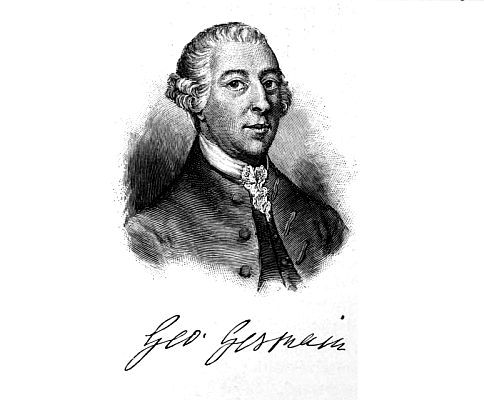
How Parliament received the news When the news of this affair reached England, it was quite naturally pronounced by Lord North a fitting culmination to years of riot and lawlessness. This, said Lord George Germain, is what comes of their wretched old town meetings. The Americans have really no government. These “are the proceedings of a tumultuous and riotous rabble, who ought, if they had the least prudence, to follow their mercantile employments, and not trouble themselves with politics and government, which they do not understand. Some gentlemen say, ‘Oh, don’t break their charter; don’t take away rights granted them by the predecessors of the Crown.’ Whoever wishes to preserve such charters, I wish him no worse than to govern such subjects.” “These remarks,” said Lord North, “are worthy of a great mind.” “If we take a determined stand now,” said Lord Mansfield, “Boston will submit, and all will end in victory without carnage.” “The town of Boston,” said Mr. Venn, “ought to be knocked about their ears and destroyed. You will never meet with proper obedience to the laws of this country until you have destroyed that nest of locusts.” General Gage, who had just come home on a visit, assured the king that the other colonies might speak fair words to Massachusetts, but would do nothing to help her; and he offered with four regiments to make a speedy end of the whole matter. “They will be lions,” said Gage, “while we are lambs; but if we take the resolute part, they will prove very meek, I promise you.” It was in this spirit and under the influence of these ideas that the ministry took up the business of dealing with the refractory colony of Massachusetts. Lord North proposed a series of five measures, which from the king’s point of view would serve, not only to heal the wounded pride of Great Britain, but also to prevent any more riotous outbreaks among this lawless American people. Just at this moment, the opposition ventured upon a bold stroke. Fox said truly that no plan for pacifying the colonies would be worth a rush unless the unconditional repeal of the Tea Act should form part of it. A bill for the repealing of the Tea Act was brought in by Fuller, and a lively debate ensued, in the course of which Edmund Burke made one of the weightiest speeches ever heard in the House of Commons; setting forth in all the wealth of his knowledge the extreme danger of the course upon which the ministry had entered, and showing how little good fruit was to be expected from a coercive policy, even if successful. Burke was ably supported by Fox, Conway, Barré, Savile, Dowdeswell, Pownall, and Dunning. But the current had set too strongly against conciliation. Lord North sounded the keynote of the whole British policy when he said, “To repeal the tea-duty would stamp us with timidity.” Come what might, it would never do for the Americans to get it into their heads that the government was not all-powerful. They must be humbled first, that they might be reasoned with afterwards. The tea-duty, accordingly, was not repealed, but Lord North’s five acts for the better regulation of American affairs were all passed by Parliament.
The Boston Port Bill By the first act, known as the Boston Port Bill, no ships were to be allowed to enter or clear the port of Boston until the rebellious town should have indemnified the East India Company for the loss of its tea, and should otherwise have made it appear to the king that it would hereafter show a spirit of submission. Marblehead was made a port of entry instead of Boston, and Salem was made the seat of government.
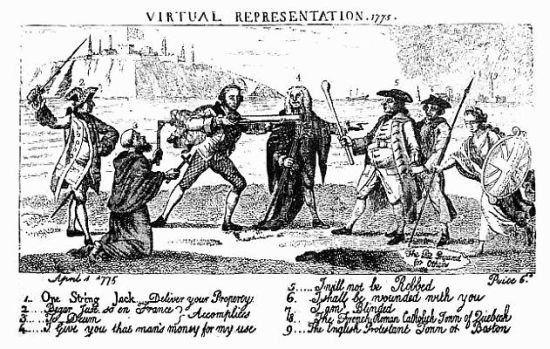
VIRTUAL REPRESENTATION. 1775.
The Regulating Act By the second act, known as the Regulating Act, the charter of Massachusetts was annulled without preliminary notice, and her free government was destroyed. Under the charter, the members of the council for each year were chosen in a convention consisting of the council of the preceding year and the assembly. Each councillor held office for a year, and was paid out of an appropriation made by the assembly. Now, hereafter, the members of the council were to be appointed by the governor on a royal writ of mandamus, their salaries were to be paid by the Crown, and they could be removed from office at the king’s pleasure. The governor was empowered to appoint all judges and officers of courts, and all such officers were to be paid by the king and to hold office during his pleasure. The governor and his dependent council could appoint sheriffs and remove them without assigning any reason, and these dependent sheriffs were to have the sole right of returning juries. But, worse than all, the town-meeting system of local self-government was ruthlessly swept away. Town meetings could indeed be held twice a year for the election of town officers, but no other business could be transacted in them. The effect of all these changes would, of course, be to concentrate all power in the hands of the governor, leaving no check whatever upon his arbitrary will. It would, in short, transform the commonwealth of Massachusetts into an absolute despotism, such as no Englishman had ever lived under in any age. And this tremendous act was to go into operation on the first day of the following June.
By the third act—a pet measure of George III., to which Lord North assented with great reluctance—it was provided that if any magistrate, soldier, or revenue officer in Massachusetts should be indicted for murder, he should be tried, not in Massachusetts, but in Great Britain.The shooting of citizens This measure—though doubtless unintentionally—served to encourage the soldiery in shooting down peaceful citizens, and it led by a natural sequence to the bloodshed on Lexington green. It was defended on the ground that in case of any chance affray between soldiers and citizens, it would not be possible for the soldiers to obtain a fair trial in Massachusetts. Less than four years had elapsed since Preston’s men had been so readily acquitted of murder after the shooting in King Street, but such facts were of no avail now. The momentous bill passed in the House of Commons by a vote of more than four to one, in spite of Colonel Barré’s ominous warnings.
By the fourth act all legal obstacles to the quartering of troops in Boston or any other town in Massachusetts were swept away.
The Quebec Act By the fifth act, known as the Quebec Act, the free exercise of the Catholic religion was sanctioned throughout Canada,—a very judicious measure of religious toleration, which concerned the other colonies but little, however it might in some cases offend their prejudices. But this act went on to extend the boundaries of Canada southward to the Ohio river, in defiance of the territorial claims of Massachusetts, Connecticut, New York, and Virginia. This extensive region, the part of North America which was next to be colonized by men of English race, was to be governed by a viceroy, with despotic powers; and such people as should come to live there were to have neither popular meetings, nor habeas corpus, nor freedom of the press. “This,” said Lord Thurlow, “is the only sort of constitution fit for a colony,"—and all the American colonies, he significantly added, had better be reduced to this condition as soon as possible.
Gage sent to Boston When all these acts had been passed, in April, 1774, General Gage was commissioned to supersede Hutchinson temporarily as governor of Massachusetts, and was sent over with as little delay as possible, together with the four regiments which were to scare the people into submission. On the first day of June, he was to close the port of Boston and begin starving the town into good behaviour; he was to arrest the leading patriots and send them to England for trial; and he was expressly authorized to use his own discretion as to allowing the soldiers to fire upon the people. All these measures for enslaving peaceful and law-abiding Englishmen the king of England now contemplated, as he himself declared, “with supreme satisfaction.”
In recounting such measures as these, the historian is tempted to pause for a moment, and ask whether it could really have been an English government that planned and decreed such things. From the autocratic mouth of an Artaxerxes or an Abderrahman one would naturally expect such edicts to issue. From the misguided cabinets of Spain and France, in evil times, measures in spirit like these had been known to proceed. But our dear mother-country had for ages stood before the world as the staunch defender of personal liberty and of local self-government; and through the mighty strength which this spirit of freedom, and nothing else, had given her, she had won the high privilege of spreading her noble and beneficent political ideas over the best part of the habitable globe. Yet in the five acts of this political tragedy of 1774 we find England arrayed in hostility to every principle of public justice which Englishmen had from time immemorial held sacred. Upon the great continent which she had so lately won from the French champions of despotism, we see her vainly seeking to establish a tyrannical régime no better than that which but yesterday it had been her glory to overthrow. Such was the strange, the humiliating, the self-contradictory attitude into which England had at length been brought by the selfish Tory policy of George III.!
But this policy was no less futile than it was unworthy of the noble, freedom-loving English people. For after that fated 1st of June, the sovereign authority of Great Britain, whether exerted through king or through Parliament, was never more to be recognized by the men of Massachusetts.
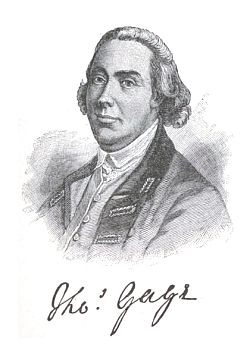 The unfortunate measures of April, 1774, were not carried through
Parliament without earnest opposition. Lord Rockingham and his friends
entered a protest on the journal of the House of Lords, on the grounds
that the people of Massachusetts had not been heard in their own
defence, and that the lives and liberties of the citizens were put
absolutely into the hands of the governor and council, who were thus
invested with greater powers than it had ever been thought wise to
entrust to the king and his privy council in Great Britain. They
concluded, therefore, that the acts were unconstitutional. The Duke of
Richmond could not restrain his burning indignation. “I wish,” said he
in the House of Lords,—"I wish from the bottom of my heart that the
Americans may resist, and get the better of the forces sent against
them.” But that the Americans really would resist, very few people in
England believed. The conduct of the ministry was based throughout upon
the absurd idea that the Americans could be frightened into submission.
Belief that the Americans would not fight
General Gage, as we have seen, thought that four regiments would be
enough to settle the whole business. Lord Sandwich said that the
Americans were a set of undisciplined cowards, who would take to their
heels at the first sound of a cannon. Even Hutchinson, who went over to
England about this time, and who ought to have known of what stuff the
men of Massachusetts were made, assured the king that they could hardly
be expected to resist a regular army. Such blunders, however, need not
surprise us when we recollect how, just before the war of secession, the
people of the southern and of the northern states made similar mistakes
with regard to each other. In 1860, it was commonly said by Southern
people that Northern people would submit to anything rather than fight;
and in support of this opinion, it was sometimes asked, “If the Northern
people are not arrant cowards, why do they never have duels?" On the
other hand, it was commonly said at the North that the Southern people,
however bravely they might bluster, would never enter upon a war of
secession, because it was really much more for their interest to remain
in the Federal Union than to secede from it,—an argument which lost
sight of one of the commonest facts in human life, that under the
influence of strong passion men are unable to take just views of what
concerns their own interests. Such examples show how hard it often is
for one group of men to understand another group, even when they are all
of the same blood and speech, and think alike about most matters that do
not touch the particular subject in dispute. Nothing could have been
surer, either in 1860, or in 1774, than that the one party to the
quarrel was as bold and brave as the other.
The unfortunate measures of April, 1774, were not carried through
Parliament without earnest opposition. Lord Rockingham and his friends
entered a protest on the journal of the House of Lords, on the grounds
that the people of Massachusetts had not been heard in their own
defence, and that the lives and liberties of the citizens were put
absolutely into the hands of the governor and council, who were thus
invested with greater powers than it had ever been thought wise to
entrust to the king and his privy council in Great Britain. They
concluded, therefore, that the acts were unconstitutional. The Duke of
Richmond could not restrain his burning indignation. “I wish,” said he
in the House of Lords,—"I wish from the bottom of my heart that the
Americans may resist, and get the better of the forces sent against
them.” But that the Americans really would resist, very few people in
England believed. The conduct of the ministry was based throughout upon
the absurd idea that the Americans could be frightened into submission.
Belief that the Americans would not fight
General Gage, as we have seen, thought that four regiments would be
enough to settle the whole business. Lord Sandwich said that the
Americans were a set of undisciplined cowards, who would take to their
heels at the first sound of a cannon. Even Hutchinson, who went over to
England about this time, and who ought to have known of what stuff the
men of Massachusetts were made, assured the king that they could hardly
be expected to resist a regular army. Such blunders, however, need not
surprise us when we recollect how, just before the war of secession, the
people of the southern and of the northern states made similar mistakes
with regard to each other. In 1860, it was commonly said by Southern
people that Northern people would submit to anything rather than fight;
and in support of this opinion, it was sometimes asked, “If the Northern
people are not arrant cowards, why do they never have duels?" On the
other hand, it was commonly said at the North that the Southern people,
however bravely they might bluster, would never enter upon a war of
secession, because it was really much more for their interest to remain
in the Federal Union than to secede from it,—an argument which lost
sight of one of the commonest facts in human life, that under the
influence of strong passion men are unable to take just views of what
concerns their own interests. Such examples show how hard it often is
for one group of men to understand another group, even when they are all
of the same blood and speech, and think alike about most matters that do
not touch the particular subject in dispute. Nothing could have been
surer, either in 1860, or in 1774, than that the one party to the
quarrel was as bold and brave as the other.
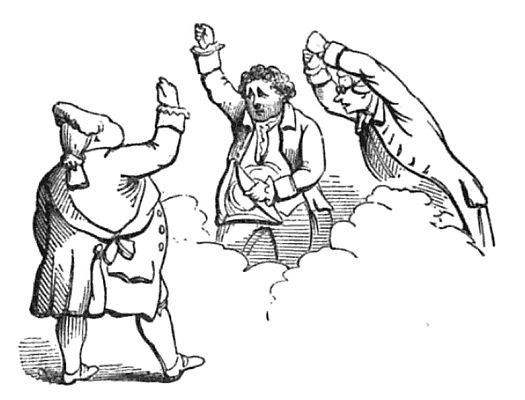
FOX AND BURKE DENOUNCING LORD NORTH
(A contemporary caricature)
Belief that Massachusetts would not be supported by the other coloniesAnother fatal error under which the ministry laboured was the belief that Massachusetts would not be supported by the other colonies. Their mistake was not unlike that which ruined the plans of Napoleon III., when he declared war upon Prussia in 1870. There was no denying the fact of strong jealousies among the American colonies in 1774, as there was no denying the fact of strong jealousies between the northern and southern German states in 1870. But the circumstances under which Napoleon III. made war on Prussia happened to be such as to enlist all the German states in the common cause with her. And so it was with the war of George III. against Massachusetts. As soon as the charter of that colony was annulled, all the other colonies felt that their liberties were in jeopardy; and thence, as Fox truly said, “all were taught to consider the town of Boston as suffering in the common cause.”
News of the Port Bill News of the Boston Port Bill was received in America on the 10th of May. On the 12th the committees of several Massachusetts towns held a convention at Faneuil Hall, and adopted a circular letter, prepared by Samuel Adams, to be sent to all the other colonies, asking for their sympathy and coöperation. The response was prompt and emphatic. In the course of the summer, conventions were held in nearly all the colonies, declaring that Boston should be regarded as “suffering in the common cause.” The obnoxious acts of Parliament were printed on paper with deep black borders, and in some towns were publicly burned by the common hangman. Droves of cattle and flocks of sheep, cartloads of wheat and maize, kitchen vegetables and fruit, barrels of sugar, quintals of dried fish, provisions of every sort, were sent overland as free gifts to the people of the devoted city, even the distant rice-swamps of South Carolina contributing their share. The over-cautious Franklin had written from London, suggesting that perhaps it might be best, after all, for Massachusetts to indemnify the East India Company; but Gadsden, with a sounder sense of the political position, sent word, “Don’t pay for an ounce of the damned tea.” Throughout the greater part of the country the 1st of June was kept as a day of fasting and prayer; bells were muffled and tolled in the principal churches; ships in the harbours put their flags at half-mast. Marblehead, which was appointed to supersede Boston as port of entry, immediately invited the merchants of Boston to use its wharfs and warehouses free of charge in shipping and unshipping their goods. A policy of absolute non-importation was advocated by many of the colonies, though Pennsylvania, under the influence of Dickinson, still vainly cherishing hopes of reconciliation, hung back, and advised that the tea should be paid for. As usual, the warmest sympathy with New England came from Virginia. “If need be,” said Washington, “I will raise one thousand men, subsist them at my own expense, and march myself at their head for the relief of Boston.”
To insure concerted action on the part of the whole country, something more was required than these general expressions and acts of sympathy. The proposal for a Continental Congress came first from the Sons of Liberty in New York; it was immediately taken up by the members of the Virginia House of Burgesses, sitting in convention at the Raleigh tavern, after the governor had dissolved them as a legislature; and Massachusetts was invited to appoint the time and place for the meeting of the Congress. On the 7th of June the Massachusetts assembly was convened at Salem by General Gage, in conformity with the provisions of the Port Bill.Samuel Adams at Salem Samuel Adams always preferred to use the ordinary means of transacting public business so long as they were of avail, and he naturally wished to have the act appointing a Continental Congress passed by the assembly. But this was not easy to bring about, for upon the first hint that any such business was to come up the governor would be sure to dissolve the assembly. In such case it would be necessary for the committees of correspondence throughout Massachusetts to hold a convention for the purpose of appointing the time and place for the Congress and of electing delegates to attend it. But Adams preferred to have these matters decided in regular legislative session, and he carried his point. Having talked privately with several of the members, at last on the 17th of June—a day which a twelvemonth hence was to become so famous—the favourable moment came. Having had the door locked, he introduced his resolves, appointing five delegates to confer with duly appointed delegates from the other colonies, in a Continental Congress at Philadelphia on the 1st of September next. Some of the members, astonished and frightened, sought to pass out; and as the doorkeeper seemed uneasy at assuming so much responsibility, Samuel Adams relieved him of it by taking the key from the door and putting it into his own pocket, whereupon the business of the assembly went on. Soon one of the Tory members pretended to be very sick, and being allowed to go out, made all haste to Governor Gage, who instantly drew up his writ dissolving the assembly, and sent his secretary with it. When the secretary got there, he found the door locked, and as nobody would let him in or pay any attention to him, he was obliged to content himself with reading the writ, in a loud voice, to the crowd which had assembled on the stairs. The assembly meanwhile passed the resolves by 117 to 12, elected Samuel and John Adams, Thomas Cushing, and Robert Treat Paine as delegates, assessed the towns in the commonwealth for the necessary expenses, passed measures for the relief of Boston, and adjourned sine die. All the other colonies except Georgia, in the course of the summer, accepted the invitation, and chose delegates, either through their assemblies or through special conventions. Georgia sent no delegates, but promised to adopt any course of action that should be determined upon.
Massachusetts nullifies the Regulating Act Before the time appointed for the Congress, Massachusetts had set the Regulating Act at defiance. On the 16th of August, when the court assembled at Great Barrington, a vast multitude of farmers surrounded the court house and forbade the judges to transact any business. Two or three of the councillors newly appointed on the king’s writ of mandamus yielded in advance to public opinion, and refused to take their places. Those who accepted were forced to resign. At Worcester 2,000 men assembled on the common, and compelled Timothy Paine to make his resignation in writing. The councillor appointed from Bridgewater was a deacon; when he read the psalm the congregation refused to sing. In Plymouth one of the most honoured citizens, George Watson, accepted a place on the council; as he took his seat in church on the following Sunday, the people got up and began to walk out of the house. Overcome with shame, for a moment his venerable gray head sank upon the pew before him; then he rose up and vowed that he would resign. In Boston the justices and barristers took their accustomed places in the court house, but no one could be found to serve as juror in a court that was illegally constituted. Gage issued a proclamation warning all persons against attending town meeting, but no one heeded him, and town meetings were more fully attended than ever. He threatened to send an armed force against Worcester, but the people there replied that he would do so at his peril, and forthwith began to collect powder and ball. At Salem the people walked to the town house under the governor’s nose and in the very presence of a line of soldiers. On the 1st of September a party of soldiers seized two hundred kegs of powder at Charlestown and two field-pieces at Cambridge, and carried them to Castle William. As the news spread about the country, rumour added that the troops had fired upon the people, and within forty-eight hours at least 20,000 men were marching on Boston; but they turned back to their homes on receiving word from the Boston committee that their aid was not yet needed.
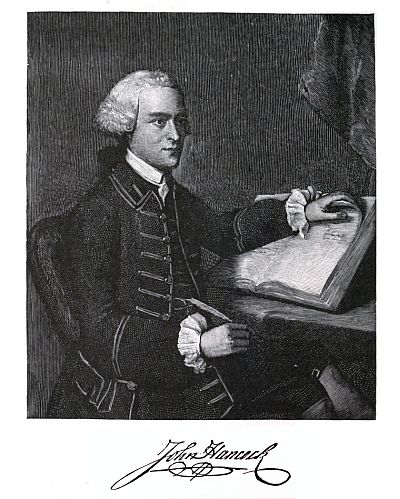
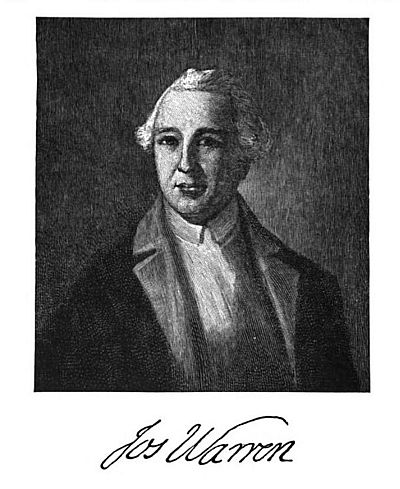
John Hancock and Joseph Warren During these stirring events, in the absence of Samuel Adams, who had gone to attend the Congress at Philadelphia, the most active part in the direction of affairs at Boston was taken by Dr. Joseph Warren. This gentleman—one of a family which has produced three very eminent physicians—was graduated at Harvard College in 1759. He had early attracted the attention of Samuel Adams, had come to be one of his dearest friends, and had been concerned with him in nearly all of his public acts of the past seven years. He was a man of knightly bravery and courtesy, and his energy and fertility of mind were equalled only by his rare sweetness and modesty. With Adams and Hancock, he made up the great Massachusetts triumvirate of Revolutionary leaders. The accession of Hancock to the Revolutionary cause at an early period had been of great help, by reason of his wealth and social influence. Hancock was graduated at Harvard College in 1754. He was a gentleman of refinement and grace, but neither for grasp of intelligence nor for strength of character can he be compared with Adams or with Warren. His chief weakness was personal vanity, but he was generous and loyal, and under the influence of the iron-willed Adams was capable of good things. Upon Warren, more than any one else, however, Adams relied as a lieutenant, who, under any circumstances whatever, would be sure to prove equal to the occasion.
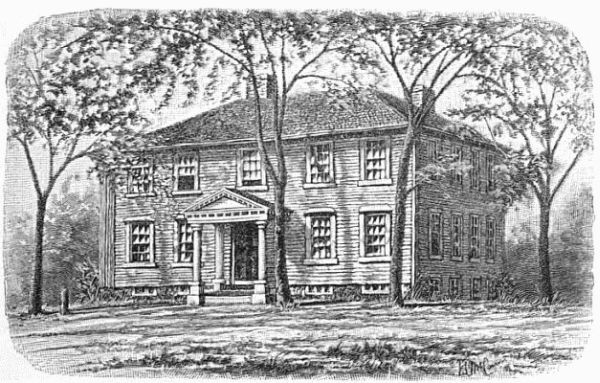
The Suffolk County Resolves, Sept. 6, 1774 On the 5th of September Gage began fortifying Boston Neck, so as to close the only approach to the city by land. Next day the county assize was to be held at Worcester; but 5,000 armed men, drawn up in regular military array, lined each side of the main street, and the unconstitutionally appointed judges were forbidden to take their seats. On the same day a convention of the towns of Suffolk county was held at Milton, and a series of resolutions, drawn up by Dr. Warren, were adopted unanimously. The resolutions declared that a king who violates the chartered rights of his people forfeits their allegiance; they declared the Regulating Act null and void and ordered all the officers appointed under it to resign their offices at once; they directed the collectors of taxes to refuse to pay over money to Gage’s treasurer; they advised the towns to choose their own militia officers; and they threatened the governor that, should he venture to arrest any one for political reasons, they would retaliate by seizing upon the Crown officers as hostages. A copy of these resolutions, which virtually placed Massachusetts in an attitude of rebellion, was forwarded to the Continental Congress, which enthusiastically indorsed them, and pledged the faith of all the other colonies that they would aid Massachusetts in case armed resistance should become inevitable, while at the same time they urged that a policy of moderation should be preserved, and that Great Britain should be left to fire the first shot.
On receiving these instructions from the Congress, the people of Massachusetts at once proceeded to organize a provisional government in accordance with the spirit of the Suffolk resolves. Gage had issued a writ convening the assembly at Salem for the 1st of October, but before the day arrived he changed his mind, and prorogued it. In disregard of this order, however, the representatives met at Salem a week later, organized themselves into a provincial congress, with John Hancock for president, and adjourned to Concord.Provincial Congress in Massachusetts On the 27th they chose a committee of safety, with Warren for chairman, and charged it with the duty of collecting military stores. In December this Congress dissolved itself, but a new one assembled at Cambridge on the 1st of February, and proceeded to organize the militia and appoint general officers. A special portion of the militia, known as “minute men,” were set apart, under orders to be ready to assemble at a moment’s warning; and the committee of safety were directed to call out this guard as soon as Gage should venture to enforce the Regulating Act. Under these instructions every village green in Massachusetts at once became the scene of active drill. Nor was it a population unused to arms that thus began to marshal itself into companies and regiments. During the French war one fifth of all the able-bodied men of Massachusetts had been in the field, and in 1757 the proportion had risen to one third. There were plenty of men who had learned how to stand under fire, and officers who had held command on hard-fought fields; and all were practised marksmen. It is quite incorrect to suppose that the men who first repulsed the British regulars in 1775 were a band of farmers, utterly unused to fighting. Their little army was indeed a militia, but it was made up of warlike material.
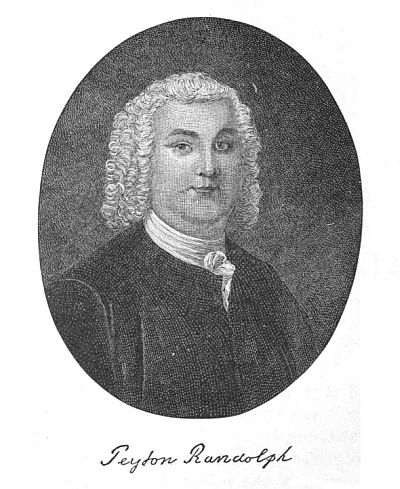
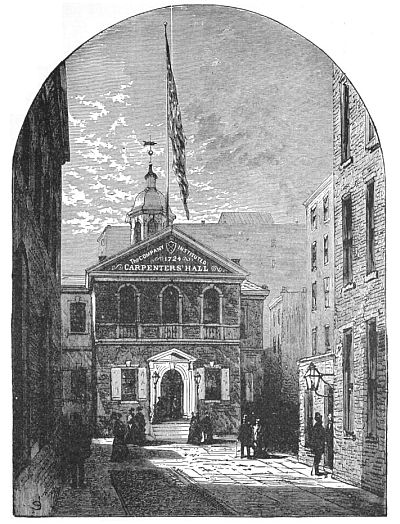
CARPENTERS’ HALL, PHILADELPHIA
Meeting of the Continental Congress, Sept. 5, 1774 While these preparations were going on in Massachusetts, the Continental Congress had assembled at the Hall of the Company of Carpenters, in Philadelphia, on the 5th of September. Peyton Randolph, of Virginia, was chosen president; and the Adamses, the Livingstons, the Rutledges, Dickinson, Chase, Pendleton, Lee, Henry, and Washington took part in the debates. One of their first acts was to dispatch Paul Revere to Boston with their formal approval of the action of the Suffolk Convention. After four weeks of deliberation they agreed upon a declaration of rights, claiming for the American people “a free and exclusive power of legislation in their provincial legislatures, where their rights of legislation could alone be preserved in all cases of taxation and internal polity." This paper also specified the rights of which they would not suffer themselves to be deprived, and called for the repeal of eleven acts of Parliament by which these rights had been infringed. Besides this, they formed an association for insuring commercial non-intercourse with Great Britain, and charged the committees of correspondence with the duty of inspecting the entries at all custom houses. Addresses were also prepared, to be sent to the king, to the people of Great Britain, and to the inhabitants of British America. The 10th of May was appointed for a second Congress, in which the Canadian colonies and the Floridas were invited to join; and on the 26th of October the Congress dissolved itself.
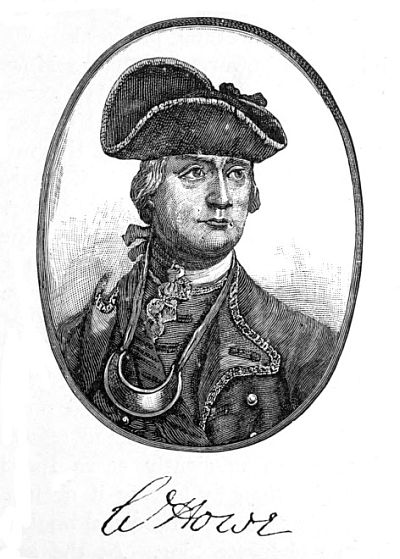
William Howe The ability of the papers prepared by the first Continental Congress has long been fully admitted in England as well as in America. Chatham declared them unsurpassed by any state papers ever composed in any age or country. But the king’s manipulation of rotten boroughs in the election of November, 1774, was only too successful, and the new Parliament was not in the mood for listening to reason. Chatham, Shelburne, and Camden urged in vain that the vindictive measures of the last April should be repealed and the troops withdrawn from Boston. On the 1st of February, Chatham introduced a bill which, could it have passed, would no doubt have averted war, even at the eleventh hour. Debates in ParliamentBesides repealing its vindictive measures, Parliament was to renounce forever the right of taxing the colonies, while retaining the right of regulating the commerce of the whole empire; and the Americans were to defray the expenses of their own governments by taxes voted in their colonial assemblies. A few weeks later, in the House of Commons, Burke argued that the abstract right of Parliament to tax the colonies was not worth contending for, and he urged that on large grounds of expediency it should be abandoned, and that the vindictive acts should be repealed. But both Houses, by large majorities, refused to adopt any measures of conciliation, and in a solemn joint address to the king declared themselves ready to support him to the end in the policy upon which he had entered. Massachusetts was declared to be in a state of rebellion, and acts were passed closing all the ports of New England, and prohibiting its fishermen from access to the Newfoundland fisheries. At the same time it was voted to increase the army at Boston to 10,000 men, and to supersede Gage, who had in all these months accomplished so little with his four regiments. As people in England had utterly failed to comprehend the magnitude of the task assigned to Gage, it was not strange that they should seek to account for his inaction by doubting his zeal and ability. No less a person than David Hume saw fit to speak of him as a “lukewarm coward.” William Howe, member of Parliament for the liberal constituency of Nottingham, was chosen to supersede him. In his speeches as candidate for election only four months ago, Howe had declared himself opposed to the king’s policy, had asserted that no army that England could raise would be able to subdue the Americans, and, in reply to a question, had promised that if offered a command in America he would refuse it. When he now consented to take Gage’s place as commander-in-chief, the people of Nottingham scolded him roundly for breaking his word.
It would be unfair, however, to charge Howe with conscious breach of faith in this matter. His appointment was itself a curious symptom of the element of vacillation that was apparent in the whole conduct of the ministry, even when its attitude professed to be most obstinate and determined. With all his obstinacy the king did not really wish for war,—much less did Lord North; and the reason for Howe’s appointment was simply that he was a brother to the Lord Howe who had fallen at Ticonderoga, and whose memory was idolized by the men of New England. Lord North announced that, in dealing with his misguided American brethren, his policy would be always to send the olive branch in company with the sword; and no doubt Howe really felt that, by accepting a command offered in such a spirit, he might more efficiently serve the interests of humanity and justice than by leaving it open for some one of cruel and despotic temper, whose zeal might outrun even the wishes of the obdurate king. Richard, Lord HoweAt the same time, his brother Richard, Lord Howe, a seaman of great ability, was appointed admiral of the fleet for America, and was expressly entrusted with the power of offering terms to the colonies. Sir Henry Clinton and John Burgoyne, both of them in sympathy with the king’s policy, were appointed to accompany Howe as lieutenant-generals.
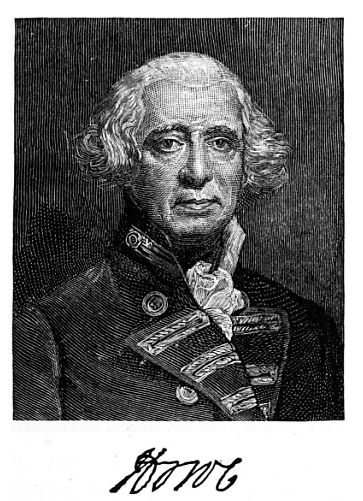
The conduct of the ministry, during this most critical and trying time, showed great uneasiness. When leave was asked for Franklin to present the case for the Continental Congress, and to defend it before the House of Commons, it was refused. Yet all through the winter the ministry were continually appealing to Franklin, unofficially and in private, in order to find out how the Americans might be appeased without making any such concessions as would hurt the pride of that Tory party which was now misgoverning England. Lord Howe was the most conspicuous agent in these fruitless negotiations. How to conciliate the Americans without giving up a single one of the false positions which the king had taken was the problem, and no wonder that Franklin soon perceived it to be insolvable, and made up his mind to go home. Franklin returns to AmericaHe had now stayed in England for several years, as agent for Pennsylvania and for Massachusetts. He had shown himself a consummate diplomatist, of that rare school which deceives by telling unwelcome truths, and he had some unpleasant encounters with the king and the king’s friends. Now in March, 1775, seeing clearly that he could be of no further use in averting an armed struggle, he returned to America. Franklin’s return was not, in form, like that customary withdrawal of an ambassador which heralds and proclaims a state of war. But practically it was the snapping of the last diplomatic link between the colonies and the mother-country.
Still the ministry, with all its uneasiness, did not believe that war was close at hand. It was thought that the middle colonies, and especially New York, might be persuaded to support the government, and that New England, thus isolated, would not venture upon armed resistance to the overwhelming power of Great Britain. The hope was not wholly unreasonable; for the great middle colonies, though conspicuous for material prosperity, were somewhat lacking in force of political ideas. In New York and Pennsylvania the non-English population was relatively far more considerable than in Virginia or the New England colonies. A considerable proportion of the population had come from the continent of Europe, and the principles of constitutional government were not so thoroughly inwrought into the innermost minds and hearts of the people, the pulse of liberty did not beat so quickly here, as in the purely English commonwealths of Virginia and Massachusetts. The middle coloniesIn Pennsylvania and New Jersey the Quakers were naturally opposed to a course of action that must end in war; and such very honourable motives certainly contributed to weaken the resistance of these colonies to the measures of the government. In New York there were further special reasons for the existence of a strong loyalist feeling. The city of New York had for many years been the headquarters of the army and the seat of the principal royal government in America. It was not a town, like Boston, governing itself in town meeting, but its municipal affairs were administered by a mayor, appointed by the king. Unlike Boston and Philadelphia, the interests of the city of New York were almost purely commercial, and there was nothing to prevent the little court circle there from giving the tone to public opinion. The Episcopal Church, too, was in the ascendant, and there was a not unreasonable prejudice against the Puritans of New England for their grim intolerance of Episcopalians and their alleged antipathy to Dutchmen. The province of New York, moreover, had a standing dispute with its eastern neighbours over the ownership of the Green Mountain region. This beautiful country had been settled by New England men, under grants from the royal governors of New Hampshire; but it was claimed by the people of New York, and the controversy sometimes waxed hot and gave rise to very hard feelings. Lord North’s mistaken hopes of securing New York Under these circumstances, the labours of the ministry to secure this central colony seemed at times likely to be crowned with success. The assembly of New York refused to adopt the non-importation policy enjoined by the Continental Congress, and it refused to choose delegates to the second Congress which was to be held in May. The ministry, in return, sought to corrupt New York by exempting it from the commercial restrictions placed upon the neighbouring colonies, and by promising to confirm its alleged title to the territory of Vermont. All these hopes proved fallacious, however. In spite of appearances, the majority of the people of New York were opposed to the king’s measures, and needed only an opportunity for organization. In April, under the powerful leadership of Philip Schuyler and the Livingstons, a convention was held, delegates were chosen to attend the Congress, and New York fell into line with the other colonies. As for Pennsylvania, in spite of its peaceful and moderate temper, it had never shown any signs of willingness to detach itself from the nascent union.
News travelled with slow pace in those days, and as late as the middle of May, Lord North, confident of the success of his schemes in New York, and unable to believe that the yeomanry of Massachusetts would fight against regular troops, declared cheerfully that this American business was not so alarming as it seemed, and everything would no doubt be speedily settled without bloodshed!
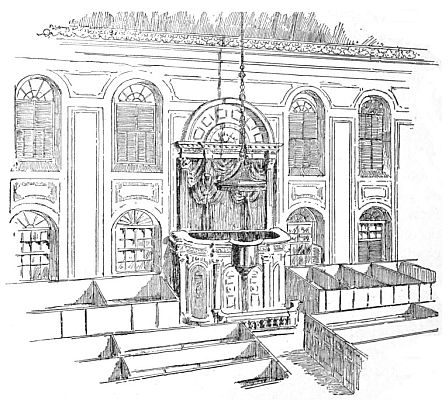
INTERIOR OF OLD SOUTH MEETING-HOUSE
Affairs in Massachusetts Great events had meanwhile happened in Massachusetts. All through the winter the resistance to General Gage had been passive, for the lesson had been thoroughly impressed upon the mind of every man, woman, and child in the province that, in order to make sure of the entire sympathy of the other colonies, Great Britain must be allowed to fire the first shot. The Regulating Act had none the less been silently defied, and neither councillors nor judges, neither sheriffs nor jurymen, could be found to serve under the royal commission. It is striking proof of the high state of civilization attained by this commonwealth, that although for nine months the ordinary functions of government had been suspended, yet the affairs of every-day life had gone on without friction or disturbance Not a drop of blood had been shed, nor had any one’s property been injured. The companies of yeomen meeting at eventide to drill on the village green, and now and then the cart laden with powder and ball that dragged slowly over the steep roads on its way to Concord, were the only outward signs of an unwonted state of things. Not so, however, in Boston. There the blockade of the harbour had wrought great hardship for the poorer people. Business was seriously interfered with, many persons were thrown out of employment, and in spite of the generous promptness with which provisions had been poured in from all parts of the country, there was great suffering through scarcity of fuel and food. Still there was but little complaint and no disorder. The leaders were as resolute as ever, and the people were as resolute as their leaders. As the 5th of March drew near, several British officers were heard to declare that any one who should dare to address the people in the Old South Church on this occasion would surely lose his life. Warren’s oration at the Old SouthAs soon as he heard of these threats, Joseph Warren solicited for himself the dangerous honour, and at the usual hour delivered a stirring oration upon “the baleful influence of standing armies in time of peace.” The concourse in the church was so great that when the orator arrived every approach to the pulpit was blocked up; and rather than elbow his way through the crowd, which might lead to some disturbance, he procured a ladder, and climbed in through a large window at the back of the pulpit. About forty British officers were present, some of whom sat on the pulpit steps, and sought to annoy the speaker with groans and hisses, but everything passed off quietly.
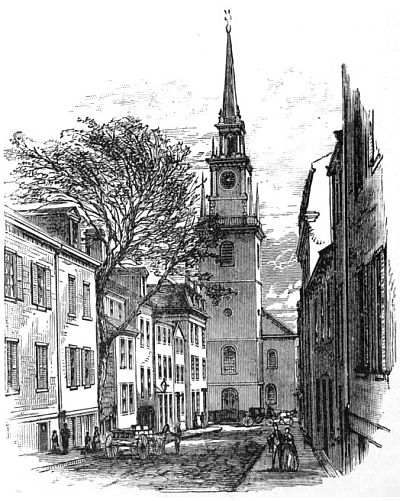
OLD NORTH CHURCH, IN WHICH SIGNAL WAS HUNG
Attempt to corrupt Samuel Adams. The boldness of Adams and Hancock in attending this meeting was hardly less admirable than that of Warren in delivering the address. It was no secret that Gage had been instructed to watch his opportunity to arrest Samuel Adams and “his willing and ready tool,” that “terrible desperado,” John Hancock, and send them over to England to be tried for treason. Here was an excellent opportunity for seizing all the patriot leaders at once; and the meeting itself, moreover, was a town meeting, such as Gage had come to Boston expressly to put down. Nothing more calmly defiant can be imagined than the conduct of people and leaders under these circumstances. But Gage had long since learned the temper of the people so well that he was afraid to proceed too violently. At first he had tried to corrupt Samuel Adams with offers of place or pelf; but he found, as Hutchinson had already declared, that such was “the obstinate and inflexible disposition of this man that he never would be conciliated by any office or gift whatsoever.” The dissolution of the assembly, of which Adams was clerk, had put a stop to his salary, and he had so little property laid by as hardly to be able to buy bread for his family. Under these circumstances, it occurred to Gage that perhaps a judicious mixture of threat with persuasion might prove effectual. So he sent Colonel Fenton with a confidential message to Adams. The officer, with great politeness, began by saying that “an adjustment of the existing disputes was very desirable; that he was authorized by Governor Gage to assure him that he had been empowered to confer upon him such benefits as would be satisfactory, upon the condition that he would engage to cease in his opposition to the measures of government, and that it was the advice of Governor Gage to him not to incur the further displeasure of his Majesty; that his conduct had been such as made him liable to the penalties of an act of Henry VIII., by which persons could be sent to England for trial, and, by changing his course, he would not only receive great personal advantages, but would thereby make his peace with the king.” Adams listened with apparent interest to this recital until the messenger had concluded. Then rising, he replied, glowing with indignation: “Sir, I trust I have long since made my peace with the King of kings. No personal consideration shall induce me to abandon the righteous cause of my country. Tell Governor Gage it is the advice of Samuel Adams to him no longer to insult the feelings of an exasperated people.”
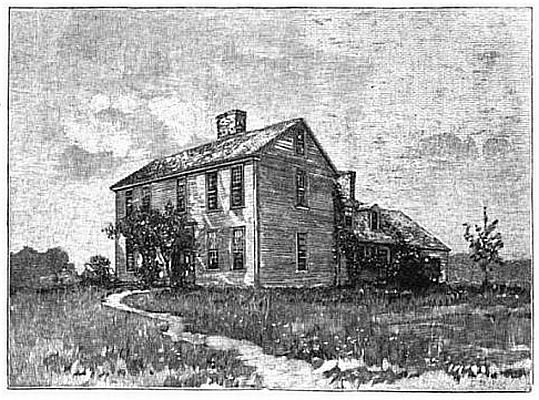
REV. JONAS CLARK’S HOUSE
Orders to arrest Adams and Hancock
Toward the end of the winter Gage received peremptory orders to arrest
Adams and Hancock, and send them to England for trial. One of the London
papers gayly observed that in all probability Temple Bar “will soon be
decorated with some of the patriotic noddles of the Boston saints.” The
provincial congress met at Concord on the 22d of March, and after its
adjournment, on the 15th of April, Adams and Hancock stayed a few days
at Lexington, at the house of their friend, the Rev. Jonas Clark.
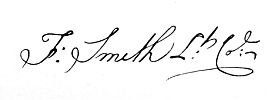 It
would doubtless be easier to seize them there than in Boston, and,
accordingly, on the night of the 18th Gage dispatched a force of 800
troops, under Lieutenant-Colonel Francis Smith, to march to Lexington,
and, after seizing the patriot leaders, to proceed to Concord, and
capture or destroy the military stores which had for some time been
collecting there. At ten in the evening the troops were rowed across
Charles river, and proceeded by a difficult and unfrequented route
through the marshes of East Cambridge, until, after four miles, they
struck into the highroad for Lexington. The greatest possible secrecy
was observed, and stringent orders were given that no one should be
allowed to leave Boston that night. Paul Revere’s ride. But Warren divined the purpose of
the movement, and sent out Paul Revere by way of Charlestown, and
William Dawes by way of Roxbury, to give the alarm. At that time there
was no bridge across Charles river lower than the one which now connects
Cambridge with Allston. Crossing the broad river in a little boat, under
the very guns of the Somerset man-of-war, and waiting on the farther
bank until he learned, from a lantern suspended in the belfry of the
North Church, which way the troops had gone, Revere took horse and
galloped over the Medford road to Lexington, shouting the news at the
door of every house that he passed. Reaching Mr. Clark’s a little after
midnight, he found the house guarded by eight minute-men, and the
sergeant warned him not to make a noise and disturb the inmates.
“Noise!” cried Revere. “You’ll soon have noise enough; the regulars are
coming!” Hancock, recognizing the voice, threw up the window, and
ordered the guard to let him in. On learning the news, Hancock’s first
impulse was to stay and take command of the militia; but it was
presently agreed that there was no good reason for his doing so, and
shortly before daybreak, in company with Adams, he left the village.
It
would doubtless be easier to seize them there than in Boston, and,
accordingly, on the night of the 18th Gage dispatched a force of 800
troops, under Lieutenant-Colonel Francis Smith, to march to Lexington,
and, after seizing the patriot leaders, to proceed to Concord, and
capture or destroy the military stores which had for some time been
collecting there. At ten in the evening the troops were rowed across
Charles river, and proceeded by a difficult and unfrequented route
through the marshes of East Cambridge, until, after four miles, they
struck into the highroad for Lexington. The greatest possible secrecy
was observed, and stringent orders were given that no one should be
allowed to leave Boston that night. Paul Revere’s ride. But Warren divined the purpose of
the movement, and sent out Paul Revere by way of Charlestown, and
William Dawes by way of Roxbury, to give the alarm. At that time there
was no bridge across Charles river lower than the one which now connects
Cambridge with Allston. Crossing the broad river in a little boat, under
the very guns of the Somerset man-of-war, and waiting on the farther
bank until he learned, from a lantern suspended in the belfry of the
North Church, which way the troops had gone, Revere took horse and
galloped over the Medford road to Lexington, shouting the news at the
door of every house that he passed. Reaching Mr. Clark’s a little after
midnight, he found the house guarded by eight minute-men, and the
sergeant warned him not to make a noise and disturb the inmates.
“Noise!” cried Revere. “You’ll soon have noise enough; the regulars are
coming!” Hancock, recognizing the voice, threw up the window, and
ordered the guard to let him in. On learning the news, Hancock’s first
impulse was to stay and take command of the militia; but it was
presently agreed that there was no good reason for his doing so, and
shortly before daybreak, in company with Adams, he left the village.
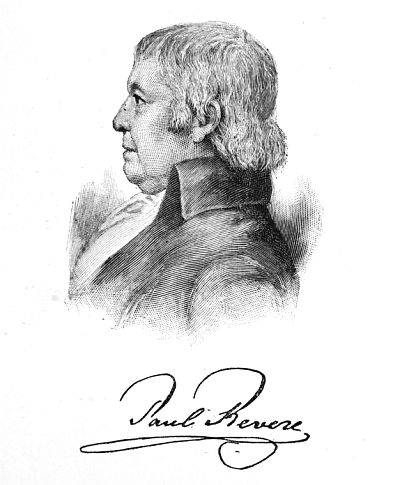
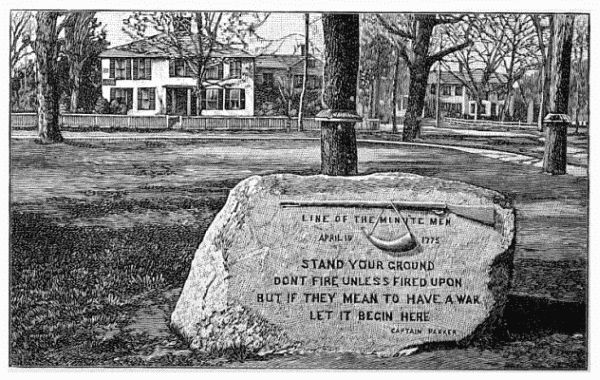
JONATHAN HARRINGTON’S HOUSE
Meanwhile, the troops were marching along the main road; but swift and
silent as was their advance, frequent alarm-bells and signal-guns, and
lights twinkling on distant hilltops, showed but too plainly that the
secret was out. Colonel Smith then sent Major Pitcairn forward with six
companies of light infantry to make all possible haste in securing the
bridges over Concord river, while at the same time he prudently sent
back to Boston for reinforcements.
 When Pitcairn reached Lexington, just
as the rising sun was casting long shadows across the village green, he
found himself confronted by some fifty minute-men under command of
Captain John Parker,—grandfather of Theodore Parker,—a hardy veteran,
who, fifteen years before, had climbed the heights of Abraham by the
side of Wolfe. Pitcairn fires upon the yeomanry, April 19, 1775“Stand your ground,” said Parker. “Don’t fire unless
fired upon; but if they mean to have a war, let it begin here.”
“Disperse, ye villains!” shouted Pitcairn. “Damn you, why don’t you
disperse?” And as they stood motionless he gave the order to fire.
When Pitcairn reached Lexington, just
as the rising sun was casting long shadows across the village green, he
found himself confronted by some fifty minute-men under command of
Captain John Parker,—grandfather of Theodore Parker,—a hardy veteran,
who, fifteen years before, had climbed the heights of Abraham by the
side of Wolfe. Pitcairn fires upon the yeomanry, April 19, 1775“Stand your ground,” said Parker. “Don’t fire unless
fired upon; but if they mean to have a war, let it begin here.”
“Disperse, ye villains!” shouted Pitcairn. “Damn you, why don’t you
disperse?” And as they stood motionless he gave the order to fire.
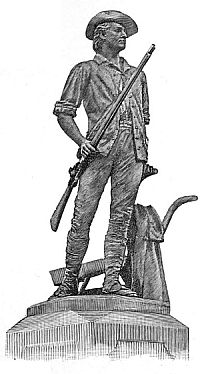
THE MINUTE-MAN[3]As
the soldiers hesitated to obey, he discharged his own pistol and
repeated the order, whereupon a deadly volley slew eight of the
minute-men and wounded ten. One of the victims, Jonathan Harrington, was
just able to stagger across the green to his own house (which is still
there), and to die in the arms of his wife, who was standing at the
door. At this moment the head of Smith’s own column seems to have come
into sight, far down the road. The minute-men had begun to return the
fire, when Parker, seeing the folly of resistance, ordered them to
retire. While this was going on, Adams and Hancock were walking across
the fields toward Woburn; and as the crackle of distant musketry reached
their ears, the eager Adams—his soul aglow with the prophecy of the
coming deliverance of his country—exclaimed, “Oh, what a glorious
morning is this!” From Woburn the two friends went on their way to
Philadelphia, where the second Continental Congress was about to
assemble.
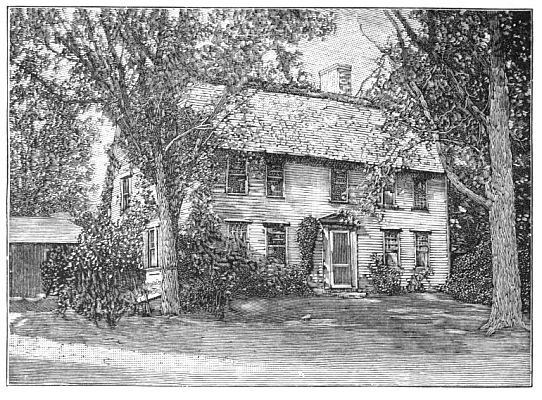
THE OLD MANSE AT CONCORD
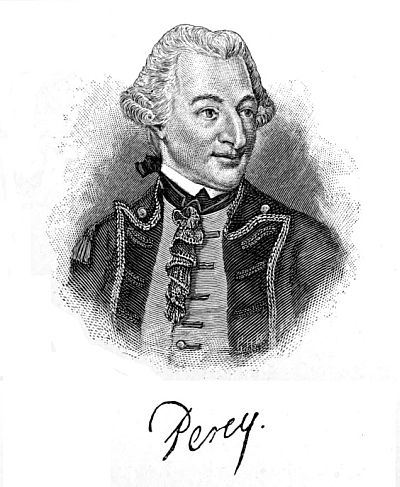
Some precious minutes had been lost by the British at Lexington, and it soon became clear that the day was to be one in which minutes could ill be spared. By the time they reached Concord, about seven o’clock, the greater part of the stores had been effectually hidden, and minute-men were rapidly gathering from all quarters. After posting small forces to guard the bridges, the troops set fire to the court-house, cut down the liberty-pole, disabled a few cannon, staved in a few barrels of flour, and hunted unsuccessfully for arms and ammunition, until an unexpected incident put a stop to their proceedings. The troops repulsed at Concord.When the force of minute-men, watching events from the hill beyond the river, had become increased to more than 400, they suddenly advanced upon the North Bridge, which was held by 200 regulars. After receiving and returning the British fire, the militia, led by Major Buttrick, charged across the narrow bridge, overcame the regulars by dint of weight and numbers, and drove them back past the Old Manse into the village. They did not follow up the attack, but rested on their arms, wondering, perhaps, at what they had already accomplished, while their numbers were from moment to moment increased by the minute-men from neighbouring villages. A little before noon, though none of the objects of the expedition had been accomplished, Colonel Smith began to realize the danger of his position, and started on his retreat to Boston. His men were in no mood for fight. They had marched eighteen miles, and had eaten little or nothing for fourteen hours. But now, while companies of militia hovered upon both their flanks, every clump of trees and every bit of rising ground by the roadside gave shelter to hostile yeomen, whose aim was true and deadly. Straggling combats ensued from time to time, and the retreating British left nothing undone which brave men could do; but the incessant, galling fire at length threw them into hopeless confusion. Retreating troops rescued by Lord PercyLeaving their wounded scattered along the road, they had already passed by the village green of Lexington in disorderly flight, when they were saved by Lord Percy, who had marched out over Boston Neck and through Cambridge to their assistance, with 1,200 men and two field-pieces. Forming his men in a hollow square, Percy inclosed the fugitives, who, in dire exhaustion, threw themselves upon the ground,—"their tongues hanging out of their mouths,” says Colonel Stedman, “like those of dogs after a chase.” Many had thrown away their muskets, and Pitcairn had lost his horse, with the elegant pistols which fired the first shots of the War of Independence, and which may be seen to-day, along with other trophies, in the town library of Lexington.
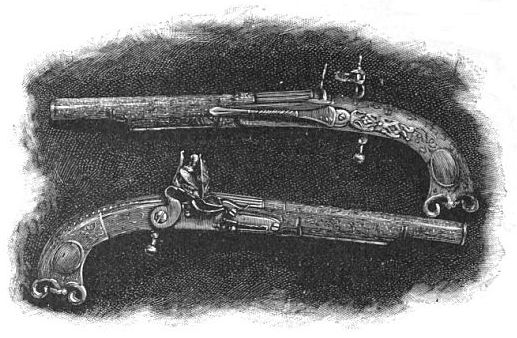
PITCAIRN’S PISTOLS
Percy’s timely arrival checked the pursuit for an hour, and gave the starved and weary men a chance for food and rest. A few houses were pillaged and set on fire, but at three o’clock General Heath and Dr. Warren arrived on the scene and took command of the militia, and the irregular fight was renewed. When Percy reached Menotomy (now Arlington), seven miles from Boston, his passage was disputed by a fresh force of militia, while pursuers pressed hard on his rear, and it was only after an obstinate fight that he succeeded in forcing his way. Retreat continued from Lexington to CharlestownThe roadside now fairly swarmed with marksmen, insomuch that, as one of the British officers observed, “they seemed to have dropped from the clouds.” It became impossible to keep order or to carry away the wounded; and when, at sunset, the troops entered Charlestown, under the welcome shelter of the fleet, it was upon the full run. They were not a moment too soon, for Colonel Timothy Pickering, with 700 Essex militia, on the way to intercept them, had already reached Winter Hill; and had their road been blocked by this fresh force they must in all probability have surrendered.
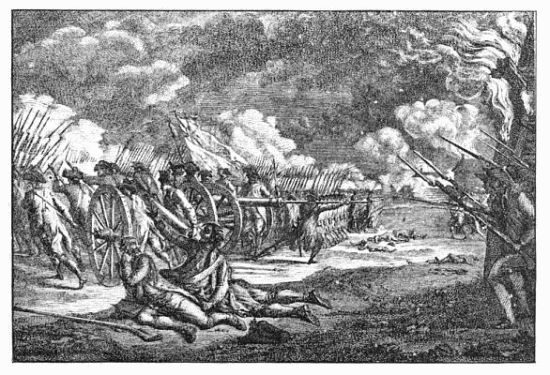
FANCIFUL PICTURE OF THE CONCORD-LEXINGTON FIGHT
(From a contemporary French print)
On this eventful day the British lost 273 of their number, while the Americans lost 93. The expedition had been a failure, the whole British force had barely escaped capture, and it had been shown that the people could not be frightened into submission. It had been shown, too, how efficient the town system of organized militia might prove on a sudden emergency. Rising of the country; the British besieged in Boston. The most interesting feature of the day is the rapidity and skill with which the different bodies of minute-men, marching from long distances, were massed at those points on the road where they might most effectually harass or impede the British retreat. The Danvers company marched sixteen miles in four hours to strike Lord Percy at Menotomy. The list of killed and wounded shows that contingents from at least twenty-three towns had joined in the fight before sundown. But though the pursuit was then ended, these men did not return to their homes, but hour by hour their numbers increased. At noon of that day the alarm had reached Worcester. Early next morning, Israel Putnam was ploughing a field at Pomfret, in Connecticut, when the news arrived. Leaving orders for the militia companies to follow, he jumped on his horse, and riding a hundred miles in eighteen hours, arrived in Cambridge on the morning of the 21st, just in time to meet John Stark with the first company from New Hampshire. At midday of the 20th the college green at New Haven swarmed with eager students and citizens, and Captain Benedict Arnold, gathering sixty volunteers from among them, placed himself at their head and marched for Cambridge, picking up recruits and allies at all the villages on the way. And thus, from every hill and valley in New England, on they came, till, by Saturday night, Gage found himself besieged in Boston by a rustic army of 16,000 men.
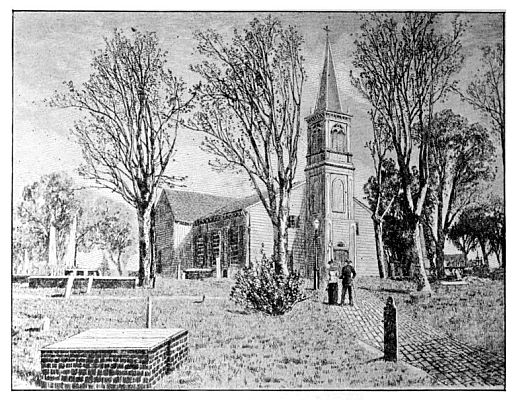
ST. JOHN’S CHURCH, RICHMOND[4]
Effects of the news When the news of this affair reached England, five weeks later, it was received at first with incredulity, then with astonishment and regret. Slight as the contest had been, it remained undeniable that British troops had been defeated by what in England was regarded as a crowd of “peasants;” and it was felt besides that the chances for conciliation had now been seriously diminished. Burke said that now that the Americans had once gone so far as this, they could hardly help going farther; and in spite of the condemnation that had been lavished upon Gage for his inactivity, many people were now inclined to find fault with him for having precipitated a conflict just at the time when it was hoped that, with the aid of the New York loyalists, some sort of accommodation might be effected. There is no doubt that the news from Lexington thoroughly disconcerted the loyalists of New York for the moment, and greatly strengthened the popular party there. In a manifesto addressed to the city of London, the New York committee of correspondence deplored the conduct of Gage as rash and violent, and declared that all the horrors of civil war would never bring the Americans to submit to the unjust acts of Parliament. When Hancock and Adams arrived, on their way to the Congress, they were escorted through the city with triumphal honours. In Pennsylvania steps were immediately taken for the enlistment and training of a colonial militia, and every colony to the south of it followed the example.
Mecklenburg County Resolves, May 31, 1775 The Scotch-Irish patriots of Mecklenburg county, in North Carolina, ventured upon a measure more decided than any that had yet been taken in any part of the country. On May 31st, the county committee of Mecklenburg affirmed that the joint address of the two Houses of Parliament to the king, in February, had virtually “annulled and vacated all civil and military commissions granted by the Crown, and suspended the constitutions of the colonies;” and that consequently “the provincial congress of each province, under the direction of the great Continental Congress, is invested with all the legislative and executive powers within their respective provinces, and that no other legislative or executive power does or can exist at this time in any of these colonies.” In accordance with this state of things, rules were adopted “for the choice of county officers, to exercise authority by virtue of this choice and independently of the British Crown, until Parliament should resign its arbitrary pretensions.” These bold resolves were entrusted to the North Carolina delegates to the Continental Congress, but were not formally brought before that body, as the delegates thought it best to wait for a while longer the course of events.
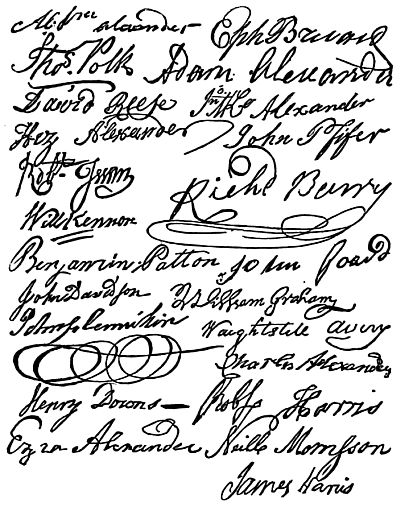
SIGNATURES OF MECKLENBURG COMMITTEE
Legend of the Mecklenburg “Declaration of Independence” Some twenty years later they gave rise to the legend of the Mecklenburg Declaration of Independence. The early writers of United States history passed over the proceedings of May 31st in silence, and presently the North Carolina patriots tried to supply an account of them from memory. Their traditional account was not published until 1819, when it was found to contain a spurious document, giving the substance of some of the foregoing resolves, decorated with phrases borrowed from the Declaration of Independence. This document purported to have been drawn up and signed at a county meeting on the 20th of May. A fierce controversy sprang up over the genuineness of the document, which was promptly called in question. For a long time many people believed in it, and were inclined to charge Jefferson with having plagiarized from it in writing the Declaration of Independence. But a minute investigation of all the newspapers of May, 1775, throughout the thirteen colonies, has revealed no trace of any such meeting on the 20th, and it is clear that no such document was made public. The story of the Mecklenburg Declaration is simply a legend based upon the distorted recollection of the real proceedings of May 31st.
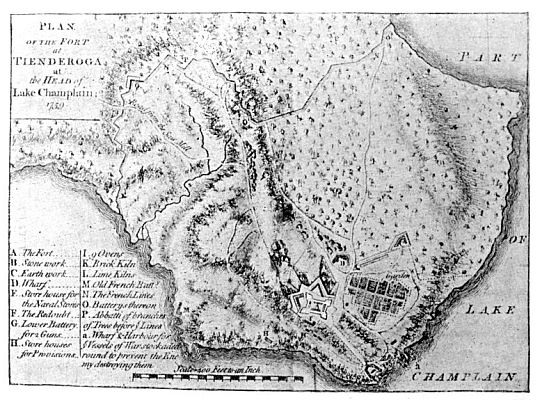
PLAN of the FORT at TICONDEROGA at the HEAD of Lake Champlain; 1759
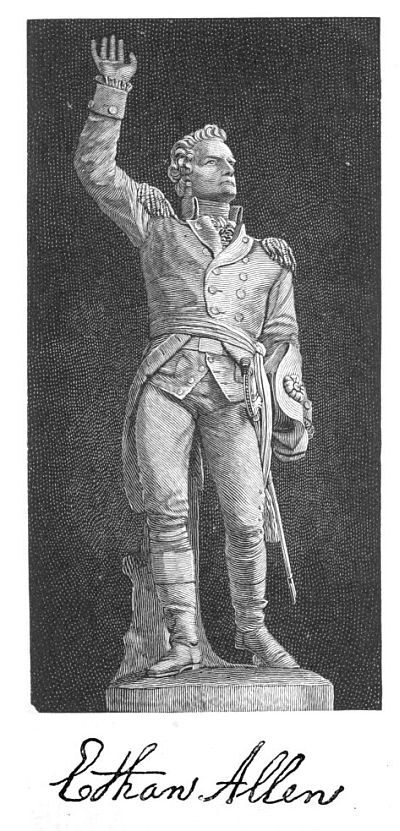
Meanwhile, in New England, the warlike feeling had become too strong to be contented merely with defensive measures. No sooner had Benedict Arnold reached Cambridge than he suggested to Dr. Warren that an expedition ought to be sent without delay to capture Ticonderoga and Crown Point. These fortresses commanded the northern approaches to the Hudson river, the strategic centre of the whole country, and would be of supreme importance either in preparing an invasion of Canada or in warding off an invasion of New York. Benedict Arnold and Ethan AllenBesides this, they contained a vast quantity of military stores, of which the newly gathered army stood in sore need. The idea found favour at once. Arnold received a colonel’s commission from the Massachusetts Congress, and was instructed to raise 400 men among the Berkshire Hills, capture the fortresses, and superintend the transfer of part of their armament to Cambridge. When Arnold reached the wild hillsides of the Hoosac range, he found that he had a rival in the enterprise. The capture of Ticonderoga had also been secretly planned in Connecticut, and was entrusted to Ethan Allen, the eccentric but sagacious author of that now-forgotten deistical book, “The Oracles of Reason.” Allen was a leading spirit among the “Green Mountain Boys,” an association of Vermont settlers formed for the purpose of resisting the jurisdiction of New York, and his personal popularity was great. On the 9th of May Arnold overtook Allen and his men on their march toward Lake Champlain, and claimed the command of the expedition on the strength of his commission from Massachusetts; but the Green Mountain Boys were acting partly on their own account, partly under the direction of Connecticut. They cared nothing for the authority of Massachusetts, and knew nothing of Arnold; they had come out to fight under their own trusted leader. But few of Arnold’s own men had as yet assembled, and his commission could not give him command of Vermonters, so he joined the expedition as a volunteer. On reaching the lake that night, they found there were not nearly enough row-boats to convey the men across. But delay was not to be thought of. The garrison must not be put on its guard. Accordingly, with only eighty-three men, Allen and Arnold crossed the lake at daybreak of the 10th, and entered Ticonderoga side by side. Capture of Ticonderoga and Crown Point, May 10, 1775 The little garrison, less than half as many in number, as it turned out, was completely surprised, and the stronghold was taken without a blow. As the commandant jumped out of bed, half awake, he confusedly inquired of Allen by whose authority he was acting. “In the name of the Great Jehovah and the Continental Congress!” roared the bellicose philosopher, and the commandant, seeing the fort already taken, was fain to acquiesce. At the same time Crown Point surrendered to another famous Green Mountain Boy, Seth Warner, and thus more than two hundred cannon, with a large supply of powder and ball, were obtained for the New England army. A few days later, as some of Arnold’s own men arrived from Berkshire, he sailed down Lake Champlain, and captured St. John’s with its garrison; but the British recovered it in the course of the summer, and planted such a force there that in the next autumn we shall see it able to sustain a siege of fifty days.
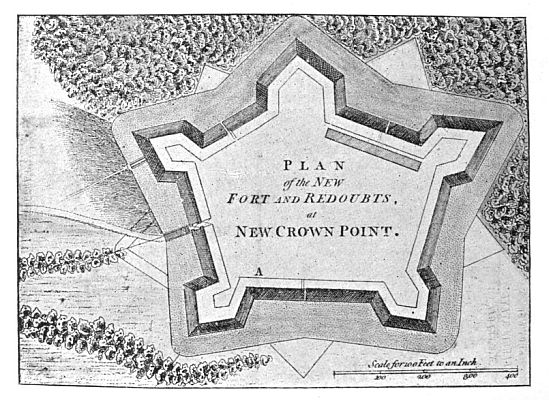 PLAN of the New FORT AND REDOUBTS at NEW CROWNE POINT
PLAN of the New FORT AND REDOUBTS at NEW CROWNE POINT
FACSIMILE OF ETHAN ALLEN’S LETTER ANNOUNCING THE CAPTURE OF TICONDEROGA
Neither Connecticut nor Massachusetts had any authority over these posts save through right of conquest. As it was Connecticut that had set Allen’s expedition on foot, Massachusetts yielded the point as to the disposal of the fortresses and their garrisons. Dr. Warren urged the Connecticut government to appoint Arnold to the command, so that his commission might be held of both colonies; but Connecticut preferred to retain Allen, and in July Arnold returned to Cambridge to mature his remarkable plan for invading Canada through the trackless wilderness of Maine. His slight disagreement with Allen bore evil fruit. As is often the case in such affairs, the men were more zealous than their commanders; there were those who denounced Arnold as an interloper, and he was destined to hear from them again and again.
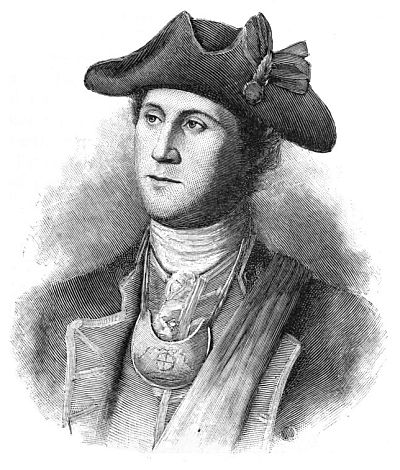
WASHINGTON AT THE AGE OF FORTY
Second meeting of the Continental Congress, May 10, 1775 On the same day[5] on which Ticonderoga surrendered, the Continental Congress met at Philadelphia. The Adamses and the Livingstons, Jay, Henry, Washington, and Lee were there, as also Franklin, just back from his long service in England. Of all the number, John Adams and Franklin had now, probably, come to agree with Samuel Adams that a political separation from Great Britain was inevitable; but all were fully agreed that any consideration of such a question was at present premature and uncalled for. The Congress was a body which wielded no technical legal authority; it was but a group of committees, assembled for the purpose of advising with each other regarding the public weal. Yet something very like a state of war existed in a part of the country, under conditions which intimately concerned the whole, and in the absence of any formally constituted government something must be done to provide for such a crisis. The spirit of the assembly was well shown in its choice of a president. Peyton Randolph being called back to Virginia to preside over the colonial assembly, Thomas Jefferson was sent to the Congress in his stead; and it also became necessary for Congress to choose a president to succeed him. The proscribed John Hancock was at once chosen, and Benjamin Harrison, in conducting him to the chair, said, “We will show Great Britain how much we value her proscriptions.” To the garrisoning of Ticonderoga and Crown Point by Connecticut, the Congress consented only after much hesitation, since the capture of these posts had been an act of offensive warfare. But without any serious opposition, in the name of the “United Colonies,” the Congress adopted the army of New England men besieging Boston as the “Continental Army,” and proceeded to appoint a commander-in-chief to direct its operations. Practically, this was the most important step taken in the whole course of the War of Independence. Appointment of Washington to command the Continental armyNothing less than the whole issue of the struggle, for ultimate defeat or for ultimate victory, turned upon the selection to be made at this crisis. For nothing can be clearer than that in any other hands than those of George Washington the military result of the war must have been speedily disastrous to the Americans. In appointing a Virginian to the command of a New England army, the Congress showed rare wisdom. It would well have accorded with local prejudices had a New England general been appointed. John Hancock greatly desired the appointment, and seems to have been chagrined at not receiving it. But it was wisely decided that the common interest of all Americans could in no way be more thoroughly engaged in the war than by putting the New England army in charge of a general who represented in his own person the greatest of the Southern colonies. Washington was now commander of the militia of Virginia, and sat in Congress in his colonel’s uniform. His services in saving the remnant of Braddock’s ill-fated army, and afterwards in the capture of Fort Duquesne, had won for him a military reputation greater than that of any other American. Besides this, there was that which, from his early youth, had made it seem right to entrust him with commissions of extraordinary importance. Nothing in Washington’s whole career is more remarkable than the fact that when a mere boy of twenty-one he should have been selected by the governor of Virginia to take charge of that most delicate and dangerous diplomatic mission to the Indian chiefs and the French commander at Venango. Consummate knowledge of human nature as well as of wood-craft, a courage that no threats could daunt and a clear intelligence that no treachery could hoodwink, were the qualities absolutely demanded by such an undertaking; yet the young man acquitted himself of his perilous task not merely with credit, but with splendour. As regards booklore, his education had been but meagre, yet he possessed in the very highest degree the rare faculty of always discerning the essential facts in every case, and interpreting them correctly. In the Continental Congress there sat many who were superior to him in learning and eloquence; but “if,” said Patrick Henry, “you speak of solid information and sound judgment, Colonel Washington is unquestionably the greatest man upon that floor.” Thus did that wonderful balance of mind—so great that in his whole career it would be hard to point out a single mistake—already impress his ablest contemporaries. Hand in hand with this rare soundness of judgment there went a completeness of moral self-control, which was all the more impressive inasmuch as Washington’s was by no means a tame or commonplace nature, such as ordinary power of will would suffice to guide. He was a man of intense and fiery passions. His anger, when once aroused, had in it something so terrible that strong men were cowed by it like frightened children. This prodigious animal nature was habitually curbed by a will of iron, and held in the service of a sweet and tender soul, into which no mean or unworthy thought had ever entered. Whole-souled devotion to public duty, an incorruptible integrity which no appeal to ambition or vanity could for a moment solicit,—these were attributes of Washington, as well marked as his clearness of mind and his strength of purpose. And it was in no unworthy temple that Nature had enshrined this great spirit. His lofty stature (exceeding six feet), his grave and handsome face, his noble bearing and courtly grace of manner, all proclaimed in Washington a king of men.
The choice of Washington for commander-in-chief was suggested and strongly urged by John Adams, and when, on the 15th of June, the nomination was formally made by Thomas Johnson of Maryland, it was unanimously confirmed. Then Washington, rising, said with great earnestness: “Since the Congress desire, I will enter upon the momentous duty, and exert every power I possess in their service and for the support of the glorious cause. But I beg it may be remembered by every gentleman in the room that I this day declare, with the utmost sincerity, I do not think myself equal to the command I am honoured with.” He refused to take any pay for his services, but said he would keep an accurate account of his personal expenses, which Congress might reimburse, should it see fit, after the close of the war.
While these things were going on at Philadelphia, the army of New
England men about Boston was busily pressing, to the best of its limited
ability, the siege of that town. Siege of BostonThe army extended in a great
semicircle of sixteen miles,—averaging about a thousand men to the
mile,—all the way from Jamaica Plain to Charlestown Neck.
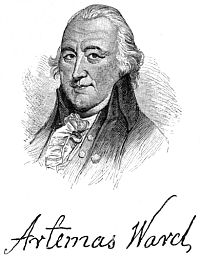 The
headquarters were at Cambridge, where some of the university buildings
were used for barracks, and the chief command had been entrusted to
General Artemas Ward, under the direction of the committee of safety.
Dr. Warren had succeeded Hancock as president of the provincial
congress, which was in session at Watertown. The army was excellent in
spirit, but poorly equipped and extremely deficient in discipline. Its
military object was to compel the British troops to evacuate Boston and
take to their ships, for as there was no American fleet, anything like
the destruction or capture of the British force was manifestly
impossible. The only way in which Boston could be made untenable for the
British was by seizing and fortifying some of the neighbouring hills
which commanded the town, of which the most important were those in
Charlestown on the north and in Dorchester on the southeast. To secure
these hills was indispensable to Gage, if he was to keep his foothold in
Boston; and as soon as Howe, Clinton, and Burgoyne arrived, on the 25th
of May, with reinforcements which raised the British force to 10,000
men, a plan was laid for extending the lines so as to cover both
Charlestown and Dorchester. Gage’s proclamationFeeling now confident of victory, Gage
issued a proclamation on June 12th, offering free pardon to all rebels
who should lay down their arms and return to their allegiance, saving
only those ring leaders, John Hancock and Samuel Adams, whose crimes
had been “too flagitious to be condoned.” At the same time, all who
should be taken in arms were threatened with the gallows. In reply to
this manifesto, the committee of safety, having received intelligence of
Gage’s scheme, ordered out a force of 1,200 men, to forestall the
governor, and take possession of Bunker Hill in Charlestown. At sunset
of the 16th this brigade was paraded on Cambridge Common, and after
prayer had been offered by Dr. Langdon, president of the university,
they set out on their enterprise,
The
headquarters were at Cambridge, where some of the university buildings
were used for barracks, and the chief command had been entrusted to
General Artemas Ward, under the direction of the committee of safety.
Dr. Warren had succeeded Hancock as president of the provincial
congress, which was in session at Watertown. The army was excellent in
spirit, but poorly equipped and extremely deficient in discipline. Its
military object was to compel the British troops to evacuate Boston and
take to their ships, for as there was no American fleet, anything like
the destruction or capture of the British force was manifestly
impossible. The only way in which Boston could be made untenable for the
British was by seizing and fortifying some of the neighbouring hills
which commanded the town, of which the most important were those in
Charlestown on the north and in Dorchester on the southeast. To secure
these hills was indispensable to Gage, if he was to keep his foothold in
Boston; and as soon as Howe, Clinton, and Burgoyne arrived, on the 25th
of May, with reinforcements which raised the British force to 10,000
men, a plan was laid for extending the lines so as to cover both
Charlestown and Dorchester. Gage’s proclamationFeeling now confident of victory, Gage
issued a proclamation on June 12th, offering free pardon to all rebels
who should lay down their arms and return to their allegiance, saving
only those ring leaders, John Hancock and Samuel Adams, whose crimes
had been “too flagitious to be condoned.” At the same time, all who
should be taken in arms were threatened with the gallows. In reply to
this manifesto, the committee of safety, having received intelligence of
Gage’s scheme, ordered out a force of 1,200 men, to forestall the
governor, and take possession of Bunker Hill in Charlestown. At sunset
of the 16th this brigade was paraded on Cambridge Common, and after
prayer had been offered by Dr. Langdon, president of the university,
they set out on their enterprise,
 under command of Colonel Prescott of
Pepperell, a veteran of the French war, grandfather of one of the most
eminent of American historians. On reaching the grounds, a consultation
was held, and it was decided, in accordance with the general purpose, if
not in strict conformity to the letter of the order, to push on farther
and fortify the eminence known as Breed’s Hill, which was connected by a
ridge with Bunker Hill, and might be regarded as part of the same
locality. Americans occupy Bunker HillThe position of Breed’s Hill was admirably fitted for annoying
the town and the ships in the harbour, and it was believed that, should
the Americans succeed in planting batteries there, the British would be
obliged to retire from Boston. There can be little doubt, however, that
in thus departing from the strict letter of his orders Prescott made a
mistake, which might have proved fatal, had not the enemy blundered
still more seriously. The advanced position on Breed’s Hill was not only
exposed to attacks in the rear from an enemy who commanded the water,
but the line of retreat was ill secured, and, by seizing upon
Charlestown Neck, it would have been easy for the British, with little
or no loss, to have compelled Prescott to surrender. From such a
disaster the Americans were saved by the stupid contempt which the enemy
felt for them.
under command of Colonel Prescott of
Pepperell, a veteran of the French war, grandfather of one of the most
eminent of American historians. On reaching the grounds, a consultation
was held, and it was decided, in accordance with the general purpose, if
not in strict conformity to the letter of the order, to push on farther
and fortify the eminence known as Breed’s Hill, which was connected by a
ridge with Bunker Hill, and might be regarded as part of the same
locality. Americans occupy Bunker HillThe position of Breed’s Hill was admirably fitted for annoying
the town and the ships in the harbour, and it was believed that, should
the Americans succeed in planting batteries there, the British would be
obliged to retire from Boston. There can be little doubt, however, that
in thus departing from the strict letter of his orders Prescott made a
mistake, which might have proved fatal, had not the enemy blundered
still more seriously. The advanced position on Breed’s Hill was not only
exposed to attacks in the rear from an enemy who commanded the water,
but the line of retreat was ill secured, and, by seizing upon
Charlestown Neck, it would have been easy for the British, with little
or no loss, to have compelled Prescott to surrender. From such a
disaster the Americans were saved by the stupid contempt which the enemy
felt for them.
Reaching Breed’s Hill about midnight, Colonel Prescott’s men began throwing up intrenchments. At daybreak they were discovered by the sailors in the harbour, and a lively cannonade was kept up through the forenoon by the enemy’s ships; but it produced little effect, and the strength of the American works increased visibly hour by hour. It was a beautiful summer day, bathed in brightest sunshine, and through the clear dry air every movement of the spadesmen on the hilltop and the sailors on their decks could be distinctly seen from a great distance.Arrival of Putnam, Stark, and Warren, June 17, 1775 The roar of the cannon had called out everybody, far and near, to see what was going on, and the windows and housetops in Boston were crowded with anxious spectators. During the night General Putnam had come upon the scene, and turned his attention to fortifying the crest of Bunker Hill, in order to secure the line of retreat across Charlestown Neck. In the course of the forenoon Colonel Stark arrived with reinforcements, which were posted behind the rail fence on the extreme left, to ward off any attempt of the British to turn their flank by a direct attack. At the same time, Dr. Warren, now chief executive officer of Massachusetts, and just appointed major-general, hastened to the battlefield; replying to the prudent and affectionate remonstrance of his friend Elbridge Gerry, “Dulce et decorum est pro patria mori.” Arriving at the redoubt, he refused the command expressly tendered him, saying that he should be only too glad to serve as volunteer aid, and learn his first lesson under so well tried a soldier as Prescott. This modest heroism was typical of that memorable day, to the events of which one may well apply the Frenchman’s dictum, “C’est magnifique, mais ce n’est pas la guerre!” A glorious day it was in history, but characterized, on both the British and the American sides, by heroism rather than by military skill or prudence.
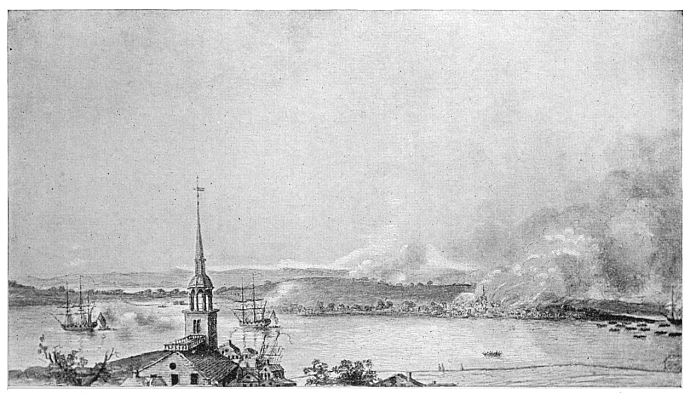
VIEW OF BATTLE OF BUNKER HILL, FROM BEACON HILL[6]
During the forenoon Gage was earnestly discussing with the three new generals the best means of ousting the Americans from their position on Breed’s Hill. There was one sure and obvious method,—to go around by sea and take possession of Charlestown Neck, thereby cutting off the Americans from the mainland and starving them out. But it was thought that time was too precious to admit of so slow a method. Should the Americans succeed, in the course of the afternoon, in planting a battery of siege guns on Breed’s Hill, the British position in Boston would be endangered. A direct assault was preferred, as likely to be more speedily effective. Gage decides to try an assaultIt was unanimously agreed that these “peasants” could not withstand the charge of 3,000 veteran soldiers, and it was gravely doubted if they would stay and fight at all. Gage accordingly watched the proceedings, buoyant with hope. In a few hours the disgrace of Lexington would be wiped out, and this wicked rebellion would be ended. At noonday the troops began crossing the river in boats, and at three o’clock they prepared to storm the intrenchments. They advanced in two parties, General Howe toward the rail-fence, and General Pigot toward the redoubt, and the same fate awaited both. The Americans reserved fire until the enemy had come within fifty yards, when all at once they poured forth such a deadly volley that the whole front rank of the British was mowed as if by the sudden sweep of a scythe. First assault repulsedFor a few minutes the gallant veterans held their ground and returned the fire; but presently an indescribable shudder ran through the line, and they gave way and retreated down the hillside in disorder, while the Americans raised an exultant shout, and were with difficulty restrained by their officers from leaping over the breastworks and pursuing.
A pause now ensued, during which the village of Charlestown was set on fire by shells from the fleet, and soon its four hundred wooden houses were in a roaring blaze, while charred timbers strewed the lawns and flower-beds, and the sky was blackened with huge clouds of smoke. Second assault repulsedIf the purpose of this wholesale destruction of property was, as some have thought, to screen the second British advance, the object was not attained, for a light breeze drove the smoke the wrong way. As the bright red coats, such excellent targets for trained marksmen, were seen the second time coming up the slope, the Americans, now cool and confident, withheld their fire until the distance was less than thirty yards. Then, with a quick succession of murderous discharges, such havoc was wrought in the British lines as soon to prove unendurable. After a short but obstinate struggle the lines were broken, and the gallant troops retreated hastily, leaving the hillside covered with their dead and wounded. All this time the Americans, in their sheltered position, had suffered but little.
So long a time now elapsed that many persons began to doubt if the British would renew the assault. Had the organization of the American army been better, such reinforcements of men and ammunition might by this time have arrived from Cambridge that any further attack upon the hill would be sure to prove fruitless. But all was confusion at headquarters. General Ward was ill furnished with staff officers, and wrong information was brought, while orders were misunderstood. And besides, in his ignorance of the extent of Gage’s plans, Prescott’s powder gives outGeneral Ward was nervously afraid of weakening his centre at Cambridge. Three regiments were sent over too late to be of any use, and meanwhile Prescott, to his dismay, found that his stock of powder was nearly exhausted. While he was making ready for a hand-to-hand fight, the British officers were holding a council of war, and many declared that to renew the attack would be simply useless butchery. On the other hand, General Howe observed, “to be forced to give up Boston would be very disagreeable to us all.” The case was not so desperate as this, for the alternative of an attack upon Charlestown Neck still remained open, and every consideration of sound generalship now prescribed that it should be tried. Third assault succeeds; the British take the hillBut Howe could not bear to acknowledge the defeat of his attempts to storm, and accordingly, at five o’clock, with genuine British persistency, a third attack was ordered. For a moment the advancing columns were again shaken by the American fire, but the last powder-horns were soon emptied, and by dint of bayonet charges the Americans were slowly driven from their works and forced to retreat over Charlestown Neck, while the whole disputed ground, including the summit of Bunker Hill, passed into the hands of the British.
In this battle, in which not more than one hour was spent in actual fighting, the British loss in killed and wounded was 1,054, or more than one third of the whole force engaged, including an unusually large proportion of officers. British and American lossesThe American loss, mainly incurred at the rail-fence and during the final hand-to-hand struggle at the redoubt, was 449, probably about one fourth of the whole force engaged. On the British side, one company of grenadiers came out of the battle with only five of its number left unhurt. Every officer on General Howe’s staff was cut down, and only one survived his wounds. The gallant Pitcairn, who had fired the first shot of the war, fell while entering the redoubt, and a few moments later the Americans met with an irreparable loss in the death of General Warren, who was shot in the forehead as he lingered with rash obstinacy on the scene, loath to join in the inevitable retreat. Another volunteer aid, not less illustrious than Warren, fought on Bunker Hill that day, and came away scatheless. Since the brutal beating which he had received at the coffee-house nearly six years before, the powerful mind of James Otis had suffered well-nigh total wreck. He was living, harmlessly insane, at the house of his sister, Mercy Warren, at Watertown, when he witnessed the excitement and listened to the rumour of battle on the morning of the 17th of June. With touching eagerness to strike a blow for the cause in which he had already suffered so dreadful a martyrdom, Otis stole away from home, borrowed a musket at some roadside farmhouse, and hastened to the battlefield, where he fought manfully, and after all was over made his way home, weary and faint, a little before midnight.
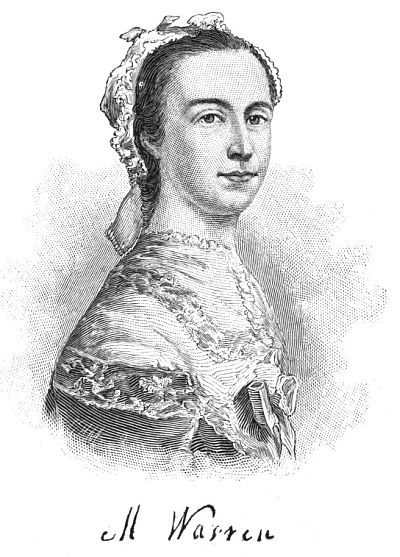
Though small in its dimensions, if compared with great European battles, or with the giant contests of our own civil war, the struggle at Bunker Hill is memorable and instructive, even from a purely military point of view. Excessive slaughter; significance of the battleConsidering the numbers engaged and the short duration of the fight, the destruction of life was enormous. Of all the hardest-fought fields of modern times, there have been very few indeed in which the number of killed and wounded has exceeded one fourth of the whole force engaged. In its bloodiness and in the physical conditions of the struggle, the battle of Bunker Hill resembles in miniature the tremendous battles of Fredericksburg and Cold Harbor. To ascend a rising ground and storm well-manned intrenchments has in all ages been a difficult task; at the present day, with the range and precision of our modern weapons, it has come to be almost impossible. It has become a maxim of modern warfare that only the most extraordinary necessity can justify a commander in resorting to so desperate a measure. He must manœuvre against such positions, cut them off by the rear, or deprive them of their value by some flanking march; but he must not, save as a forlorn hope, waste precious human lives in an effort to storm them that is almost sure to prove fruitless. For our means of destroying life have become so powerful and so accurate that, when skilfully wielded from commanding positions, no human gallantry can hope to withstand them. As civilization advances, warfare becomes less and less a question of mere personal bravery, and more and more a question of the application of resistless physical forces at the proper points; that is to say, it becomes more and more a purely scientific problem of dynamics. Now at Bunker Hill though the Americans had not our modern weapons of precision, yet a similar effect was wrought by the remarkable accuracy of their aim, due to the fact that they were all trained marksmen, who waited coolly till they could fire at short range, and then wasted no shots in random firing. Most of the British soldiers who fell in the two disastrous charges of that day were doubtless picked off as partridges are picked off by old sportsmen, and thus is explained the unprecedented slaughter of officers. Probably nothing quite like this had yet been seen in the history of war, though the principle had been similar in those wonderful trials of the long-bow in such mediæval battles as Crécy and Dupplin Moor. Against such odds even British pluck and endurance could not prevail. Had the Americans been properly supplied with powder, Howe could no more have taken Bunker Hill by storm than Burnside could take the heights of Fredericksburg.
Its moral effect The moral effect of the battle of Bunker Hill, both in America and Europe, was remarkable. It was for the British an important victory, inasmuch as they not only gained the ground for which the battle was fought, but by so doing they succeeded in keeping their hold upon Boston for nine months longer. Nevertheless, the moral advantage was felt to be quite on the side of the Americans. It was they who were elated by the day’s work, while it was the British who were dispirited. The belief that Americans could not fight was that day dispelled forever. British officers who remembered Fontenoy and Minden declared that the firing at Bunker Hill was the hottest they had ever known, and, with an exaggeration which was pardonable as a reaction from their former ill-judged contempt, it was asserted that the regulars of France were less formidable foes than the militia of New England. It was keenly felt that if a conquest of a single strategic position had encountered such stubborn resistance, the task of subjugating the United Colonies was likely to prove a hard one. “I wish we could sell them another hill at the same price,” said General Greene. Vergennes, the French minister of foreign affairs, exclaimed that with two more such victories England would have no army left in America. Washington said there could now be no doubt that the liberties of the people were secure. While Franklin, taking extreme ground, declared that England had lost her colonies forever.
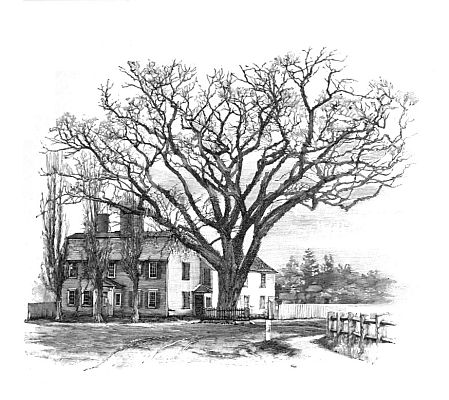
Washington arrives in Cambridge On the 2d of July, 1775, after a journey of eleven days, General Washington arrived in Cambridge from Philadelphia, and on the following day, under the shade of the great elm-tree which still stands hard by the Common, he took command of the Continental army, which as yet was composed entirely of New Englanders. Of the 16,000 men engaged in the siege of Boston, Massachusetts furnished 11,500, Connecticut 2,300, New Hampshire 1,200, Rhode Island 1,000. These contingents were arrayed under their local commanders, and under the local flags of their respective commonwealths, though Artemas Ward of Massachusetts had by courtesy exercised the chief command until the arrival of Washington. During the month of July, Congress gave a more continental complexion to the army by sending a reinforcement of 3,000 men from Pennsylvania, Maryland, and Virginia, including the famous Daniel Morgan, with his sturdy band of sharpshooters each man of whom, it was said, while marching at double-quick, could cleave with his rifle-ball a squirrel at a distance of three hundred yards. The summer of 1775 thus brought together in Cambridge many officers whose names were soon to become household words throughout the length and breadth of the land, and a moment may be fitly spent in introducing them before we proceed with the narrative of events.
Daniel Morgan Daniel Morgan, who had just arrived from Virginia with his riflemen, was a native of New Jersey, of Welsh descent. Moving to Virginia at an early age, he had won a great reputation for bravery and readiness of resource in the wild campaigns of the Seven Years’ War. He was a man of gigantic stature and strength, and incredible powers of endurance. In his youth, it is said, he had received five hundred lashes by order of a tyrannical British officer, and had come away alive and defiant. On another occasion, in a fierce woodland fight with the Indians, in which nearly all his comrades were slain, Morgan was shot through the neck by a musket-ball. Almost fainting from the wound, which he believed to be fatal, Morgan was resolved, nevertheless, not to leave his scalp in the hands of a dirty Indian; and falling forward, with his arms tightly clasped about the neck of his stalwart horse, though mists were gathering before his eyes, he spurred away through the forest paths, until his foremost Indian pursuer, unable to come up with him, hurled his tomahawk after him with a yell of baffled rage, and gave up the chase. With this unconquerable tenacity, Morgan was a man of gentle and unselfish nature; a genuine diamond, though a rough one; uneducated, but clear and strong in intelligence and faithful in every fibre. Benedict ArnoldAt Cambridge began his long comradeship with a very different character, Benedict Arnold, a young man of romantic and generous impulses, and for personal bravery unsurpassed, but vain and self-seeking, and lacking in moral robustness; in some respects a more polished man than Morgan, but of a nature at once coarser and weaker. We shall see these two men associated in some of the most brilliant achievements of the war; and we shall see them persecuted and insulted by political enemies, until the weaker nature sinks and is ruined, while the stronger endures to the end.
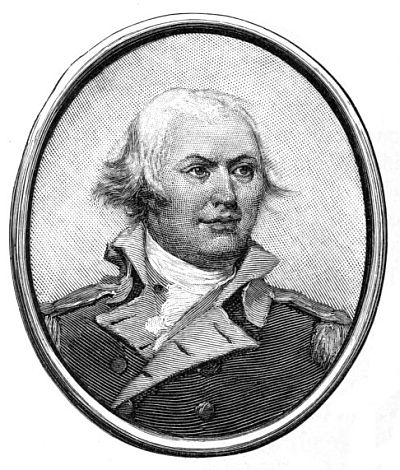
NATHANAEL GREENE
Along with Morgan and Arnold there might have been seen on Cambridge
Common a man who was destined to play no less conspicuous a part in the
great campaign which was to end in the first decisive overthrow of the
British. For native shrewdness, rough simplicity, and dauntless courage,
John Stark was much like Morgan. 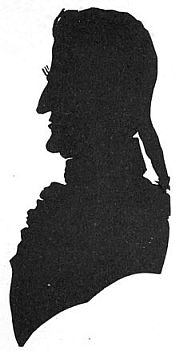
SILHOUETTE OF JOHN STARKWhat the one name was in the great
woods of the Virginia frontier, that was the other among the rugged
hills of northern New England,—a symbol of patriotism and a guarantee
of victory. Great as was Stark’s personal following in New Hampshire, he
had not, however, the chief command of the troops of that colony. John SullivanThe
commander of the New Hampshire contingent was John Sullivan, a wealthy
lawyer of Durham, who had sat in the first Continental Congress.
Sullivan was a gentleman of culture and fair ability as a statesman. As
a general, he was brave, intelligent, and faithful, but in no wise
brilliant. Nathanael GreeneClosely associated with Sullivan for the next three years we
shall find Nathanael Greene, now in command of the Rhode Island
contingent. For intellectual calibre all the other officers here
mentioned are dwarfed in comparison with Greene, who comes out at the
end of the war with a military reputation scarcely, if at all, inferior
to that of Washington. Nor was Greene less notable for the sweetness and
purity of his character than for the scope of his intelligence.[7] He
had that rare genius which readily assimilates all kinds of knowledge
through an inborn correctness of method. Henry KnoxWhatever he touched, it was
with a master hand, and his weight of sense soon won general
recognition. Such a man was not unnaturally an eager book-buyer, and in
this way he had some time ago been brought into pleasant relations with
the genial and intelligent Henry Knox, who from his bookshop in Boston
had come to join the army as a colonel of artillery, and soon became one
of Washington’s most trusty followers.
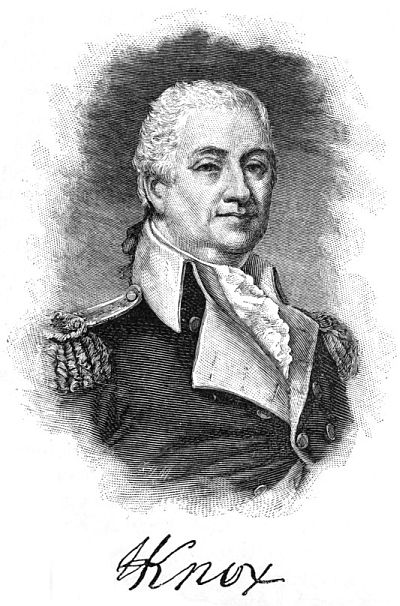
Older officersOf this group of officers, none have as yet reached very high rank in the Continental army. Sullivan and Greene stand at the end of the list of brigadier-generals; the rest are colonels. The senior major-general, Artemas Ward, and the senior brigadiers, Pomeroy Heath, Thomas, Wooster, and Spencer, will presently pass into the background, to make way for these younger or more vigorous men. Israel PutnamMajor-General Israel Putnam, the picturesque wolf-slayer, a brave and sterling patriot, but of slender military capacity, will remain in the foreground for another year, and will then become relegated mainly to garrison duty.
With the exception of Morgan, all the officers here noticed are New England men, as is natural, since the seat of war is in Massachusetts, and an army really continental in complexion is still to be formed. The Southern colonies have as yet contributed only Morgan and the commander-in-chief. New York is represented in the Continental army by two of the noblest of American heroes,—Major-General Philip Schuyler and Brigadier-General Richard Montgomery; but these able men are now watching over Ticonderoga and the Indian frontier of New York. Horatio Gates and Charles LeeBut among the group which in 1775 met for consultation on Cambridge Common, or in the noble Tory mansion now hallowed alike by memories of Washington and of Longfellow, there were yet two other generals, closely associated with each other for a time in ephemeral reputation won by false pretences, and afterwards in lasting ignominy. It is with pleasure that one recalls the fact that these men were not Americans, though both possessed estates in Virginia; it is with regret that one is forced to own them as Englishmen. Of Horatio Gates and his career of imbecility and intrigue, we shall by and by see more than enough. At this time he was present in Cambridge as adjutant-general of the army. But his friend, Charles Lee, was for the moment a far more conspicuous personage; and this eccentric creature, whose career was for a long time one of the difficult problems in American history, needs something more than a passing word of introduction.
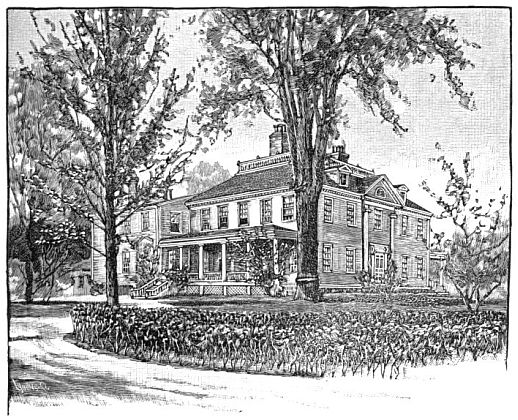
WASHINGTON’S HEADQUARTERS
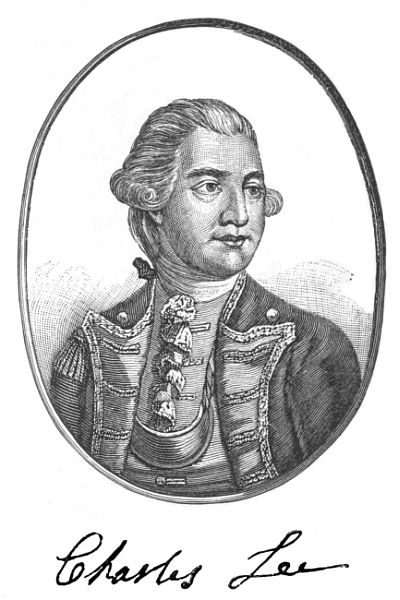
Although Major-General Charles Lee happened to have acquired an estate
in Virginia, he had nothing in common with the illustrious family of
Virginian Lees beyond the accidental identity of name. He was born in
England, and had risen in the British army to the rank of
lieutenant-colonel. He had served in America in the Seven Years’ War,
and afterward, as a soldier of fortune, he had wandered about Europe,
obtaining at one time a place on the staff of the king of Poland. Lee’s personal peculiaritiesA
restless adventurer, he had come over again to America as soon as he saw
that a war was brewing here. There is nothing to show that he cared a
rush for the Americans, or for the cause in which they were fighting,
but he sought the opportunity of making a name for himself. He was
received with enthusiasm by the Americans. His loud, pompous manner and
enormous self-confidence at first imposed upon everybody. He was tall,
lank, and hollow-cheeked, with a discontented expression of face. In
dress he was extremely slovenly. He was fond of dogs, and always had
three or four at his heels, but toward men and women his demeanour was
morose and insulting. He had a sharp, cynical wit, and was always making
severe remarks in a harsh, rough voice. But the trustful American
imagination endowed this unpleasant person with the qualities of a great
soldier. His reputation was part of the unconscious tribute which the
provincial mind of our countrymen was long wont to pay to the men and
things of Europe; and for some time his worst actions found a lenient
interpretation as the mere eccentricities of a wayward genius. He had
hoped to be made commander-in-chief of the army, and had already begun
to nourish a bitter grudge against Washington, by whom he regarded
himself as supplanted. In the following year we shall see him
endeavouring to thwart the plans of Washington at the most critical
moment of the war, but for the present he showed no signs of
insincerity, except perhaps in an undue readiness to parley with the
British commanders. As soon as it became clear that a war was beginning,
the hope of winning glory by effecting an accommodation with the enemy
offered a dangerous temptation to men of weak virtue in eminent
positions. Benjamin ChurchIn October, 1775, the American camp was thrown into great
consternation by the discovery that Dr. Benjamin Church, one of the
most conspicuous of the Boston leaders, had engaged in a secret
correspondence with the enemy.
 Dr. Church was thrown into jail, but as
the evidence of treasonable intent was not absolutely complete, he was
set free in the following spring, and allowed to visit the West Indies
for his health. The ship in which he sailed was never heard from again.
This kind of temptation, to which Church succumbed at the first outbreak
of the war, beset Lee with fatal effect after the Declaration of
Independence, and wrought the ruin of Arnold after the conclusion of the
French alliance.
Dr. Church was thrown into jail, but as
the evidence of treasonable intent was not absolutely complete, he was
set free in the following spring, and allowed to visit the West Indies
for his health. The ship in which he sailed was never heard from again.
This kind of temptation, to which Church succumbed at the first outbreak
of the war, beset Lee with fatal effect after the Declaration of
Independence, and wrought the ruin of Arnold after the conclusion of the
French alliance.
To such a man as Charles Lee, destitute of faith in the loftier human virtues or in the strength of political ideas, it might easily have seemed that more was to be hoped from negotiation than from an attempt to resist Great Britain with such an army as that of which he now came to command the left wing. It was fortunate that the British generals were ignorant of the real state of things. Among the moral effects of the battle of Bunker Hill there was one which proved for the moment to be of inestimable value. It impressed upon General Howe, who now succeeded to the chief command, the feeling that the Americans were more formidable than had been supposed, and that much care and forethought would be required for a successful attack upon them. In a man of his easy-going disposition, such a feeling was enough to prevent decisive action. It served to keep the British force idle in Boston for months, and was thus of great service to the American cause. For in spite of the zeal and valour it had shown, this army of New England minute-men was by no means in a fit condition for carrying on such an arduous enterprise as the siege of Boston. When Washington took command of the army on Cambridge Common, he found that the first and most trying task before him was out of this excellent but very raw material to create an army upon which he could depend. Difficult work for WashingtonThe battle of Bunker Hill had just been lost, under circumstances which were calculated to cheer the Americans and make them hopeful of the future; but it would not do to risk another battle, with an untrained staff and a scant supply of powder. All the work of organizing an army was still to be done, and the circumstances were not such as to make it an easy work. It was not merely that the men, who were much better trained in the discipline of the town meeting than in that of the camp, needed to be taught the all-important lesson of military subordination: it was at first a serious question how they were to be kept together at all. That the enthusiasm kindled on the day of Lexington should have sufficed to bring together 16,000 men, and to keep them for three months at their posts, was already remarkable; but no army, however patriotic and self-sacrificing, can be supported on enthusiasm alone. The army of which Washington took command was a motley crowd, clad in every variety of rustic attire, armed with trusty muskets and rifles, as their recent exploit had shown, but destitute of almost everything else that belongs to a soldier’s outfit. From the Common down to the river, their rude tents were dotted about here and there, some made of sail-cloth stretched over poles, some piled up of stones and turf, some oddly wrought of twisted green boughs; while the more fortunate ones found comparatively luxurious quarters in Massachusetts Hall, or in the little Episcopal church, or in the houses of patriotic citizens. These volunteers had enlisted for various periods, for the most part short, under various contracts with various town or provincial governments. It was not altogether clear how they were going to be paid, nor was it easy to see how they were going to be fed. That this army should have been already subsisted for three months, without any commissariat, was in itself an extraordinary fact. Day by day the heavy carts had rumbled into Cambridge, bringing from the highlands of Berkshire and Worcester, and from the Merrimac and Connecticut valleys, whatever could in any wise be spared of food, or clothing, or medicines, for the patriot army; and the pleasant fields of Cambridge were a busy scene of kindness and sympathy.
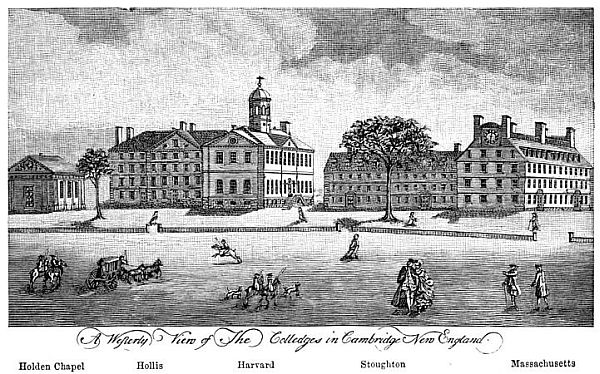
A Westerly View of the Colledges in Cambridge New England
Such means as these, however, could not long be efficient. If war was to be successfully conducted, there must be a commissariat, there must be ammunition, and there must be money. And here Washington found himself confronted with the difficulty which never ceased to vex his noble soul and disturb his best laid schemes until the day when he swooped down upon Cornwallis at Yorktown. Absence of governmental organizationHe had to keep making the army, with which he was often expected to fight battles ere it was half made; and in this arduous work he could get but little systematic help from any quarter. At present the difficulty was that there was nowhere any organized government competent to support an army. On Washington’s arrival, the force surrounding Boston owed allegiance, as we have seen, to four distinct commonwealths, of which two, indeed,—Connecticut and Rhode Island,—preserving their ancient charters, with governors elected by themselves, were still in their normal condition. In New Hampshire, on the other hand, the royal governor, John Wentworth, whose personal popularity was deservedly great, kept his place until August, while Stark and his men had gone to Cambridge in spite of him. In Massachusetts the revolutionary Provincial Congress still survived, but with uncertain power; even the Continental Congress which adopted the Cambridge army in the name of the United Colonies was simply an advisory body, without the power to raise taxes or to beat up recruits. New government of Massachusetts, July, 1775From this administrative chaos, through which all the colonies, save Connecticut and Rhode Island, were forced to pass in these trying times, Massachusetts was the first to emerge, in July, 1775, by reverting to the provisions of its old charter, and forming a government in which the king’s authority was virtually disallowed. A representative assembly was chosen by the people in their town meetings, according to time-honoured precedent; and this new legislature itself elected an annual council of twenty-eight members, to sit as an upper house. James Bowdoin, as president of the council, became chief executive officer of the commonwealth, and John Adams was made chief justice. Forty thousand pounds were raised by a direct tax on polls and on real estate, and bills of credit were issued for 1,000 more. The commonwealth adopted a new seal, and a proclamation, issued somewhat later by Chief Justice Adams, enjoining it upon all people to give loyal obedience to the new government, closed with the significant invocation “God save the people,” instead of the customary “God save the king.”
In taking this decisive step, Massachusetts was simply the first to act upon the general recommendation of the Continental Congress, that the several colonies should forthwith proceed to frame governments for themselves, based upon the suffrages of the people. From such a recommendation as this to a formal declaration of independence, the distance to be traversed was not great. Samuel Adams urged that in declaring the colonies independent Congress would be simply recognizing a fact which in reality already existed, and that by thus looking facts squarely in the face the inevitable war might be conducted with far greater efficiency. But he was earnestly and ably opposed by John Dickinson of Pennsylvania, whose arguments for the present prevailed in the Congress. It was felt that the Congress, as a mere advisory body, had no right to take a step of such supreme importance without first receiving explicit instructions from every one of the colonies. Besides this, the thought of separation was still a painful thought to most of the delegates, and it was deemed well worth while to try the effect of one more candid statement of grievances, to be set forth in a petition to his majesty. Congress sends a petition to the kingFor like reasons, the Congress did not venture to take measures to increase its own authority; and when Franklin, still thinking of union as he had been thinking for more than twenty years, now brought forward a new scheme, somewhat similar to the Articles of Confederation afterwards adopted, it was set aside as premature. The king was known to be fiercely opposed to any dealings with the colonies as a united body, and so considerate of his feelings were these honest and peace-loving delegates that, after much discussion, they signed their carefully worded petition severally, and not jointly. They signed it as individuals speaking for the people of the American colonies, not as members of an organic body representing the American people. To emphasize still further their conciliatory mood, the delivery of the petition was entrusted to Richard Penn, a descendant of the great Quaker and joint-proprietary in the government of Pennsylvania, an excellent man and an ardent loyalist. At the same time that this was done, an issue of paper money was made, to be severally guaranteed by the thirteen colonies, and half a million dollars were sent to Cambridge to be used for the army.
Military operations, however, came for the time to a stand-still. While Washington’s energies were fully occupied in organizing and drilling his troops, in providing them with powder and ball, in raising lines of fortification, in making good the troublesome vacancies due to short terms of enlistment, and above all in presenting unfailingly a bold front to the enemy; while the encampments about Boston were the daily scene of tedious works, without any immediate prospect of brilliant achievement, the Congress and the people were patiently waiting to hear the result of the last petition that was ever to be sent from these colonies to the king of Great Britain.
THE KING’S PROCLAMATION
Penn made all possible haste, and arrived in London on the 14th of August; but when he got there the king would neither see him nor receive the petition in any way, directly or indirectly. The Congress was an illegal assembly which had no business to send letters to him: if any one of the colonies wanted to make terms for itself separately, he might be willing to listen to it. But this idea of a united America was something unknown either to law or to reason, something that could not be too summarily frowned down. The king issues a proclamation, and tries to hire troops from RussiaSo while Penn waited about London, the king issued a proclamation; setting forth that many of his subjects in the colonies were in open and armed rebellion, and calling upon all loyal subjects of the realm to assist in bringing to condign punishment the authors and abettors of this foul treason. Having launched this thunderbolt, George sent at once to Russia to see if he could hire 20,000 men to aid in giving it effect, for the “loyal subjects of the realm” were slow in coming forward. A war against the Americans was not yet popular in England. Lord Chatham withdrew his eldest son, Lord Pitt, from the army, lest he should be called upon to serve against the men who were defending the common liberties of Englishmen. There was, moreover, in England as well as in America, a distrust of regular armies. Recruiting was difficult, and conscription was something that the people would not endure unless England should actually be threatened with invasion. The king had already been obliged to raise a force of his Hanoverian subjects to garrison Minorca and Gibraltar, thus setting free the British defenders of these strongholds for service in America. He had no further resource except in hiring troops from abroad. Catherine refusesBut his attempt in Russia was not successful, for the Empress Catherine, with all her faults, was not disposed to sell the blood of her subjects. She improved the occasion—as sovereigns and others will sometimes do—by asking George, sarcastically, if he thought it quite compatible with his dignity to employ foreign troops against his own subjects; as for Russian soldiers, she had none to spare for such a purpose. The king hires German troopsFoiled in this quarter, the king applied to the Duke of Brunswick, the Landgrave of Hesse-Cassel, the princes of Waldeck and Anhalt-Zerbst, the Margrave of Anspach-Bayreuth, and the Count of Hesse-Hanau, and succeeded in making a bargain for 20,000 of the finest infantry in Europe, with four good generals,—Riedesel of Brunswick, and Knyphausen, Von Heister, and Donop of Hesse. The hiring of these troops was bitterly condemned by Lord John Cavendish in the House of Commons, and by Lords Camden and Shelburne and the Duke of Richmond in the House of Lords; and Chatham’s indignant invectives at a somewhat later date are familiar to every one. It is proper, however, that in such an affair as this we should take care to affix our blame in the right place. The king might well argue that in carrying on a war for what the majority of Parliament regarded as a righteous object, it was no worse for him to hire men than to buy cannon and ships. The German troops, on their part, might justly complain of Lord Camden for stigmatizing them as “mercenaries,” inasmuch as they did not come to America for pay, but because there was no help for it. It was indeed with a heavy heart that these honest men took up their arms to go beyond sea and fight for a cause in which they felt no sort of interest, and great was the mourning over their departure. The persons who really deserved to bear the odium of this transaction were the mercenary princes who thus shamelessly sold their subjects into slavery. It was a striking instance of the demoralization which had been wrought among the petty courts of Germany in the last days of the old empire, and among the German people it excited profound indignation.Indignation in Germany The popular feeling was well expressed by Schiller, in his “Cabale und Liebe.” Frederick the Great, in a letter to Voltaire, declared himself beyond measure disgusted, and by way of thriftily expressing his contempt for the transaction he gave orders to his custom house officers that upon all such of these soldiers as should pass through Prussian territory a toll should be levied, as upon “cattle exported for foreign shambles.”
Burning of Portland, Oct 16, 1775 When the American question was brought up in the autumn session of Parliament, it was treated in the manner with which the Americans had by this time become familiar. A few far-sighted men still urged the reasonableness of the American claims, but there was now a great majority against them. In spite of grave warning voices, both houses decided to support the king; and in this they were upheld by the university of Oxford, which a century ago had burned the works of John Milton as “blasphemous,” and which now, with equal felicity, in a formal address to the king, described the Americans as “a people who had forfeited their lives and their fortunes to the justice of the state.” At the same time the department of American affairs was taken from the amiable Lord Dartmouth, and given to the truculent Lord George Germain. These things were done in November, 1775, and in the preceding month they had been heralded by an act of wanton barbarity on the part of a British naval officer, albeit an unwarranted act, which the British government as promptly as possible disowned. On the 16th of October, Captain Mowatt had sailed with four small vessels into the harbour of Portland (then called Falmouth), and with shells and grenades set fire to the little town. St. Paul’s Church, all the public buildings, and three fourths of all the dwellings were burned to the ground, and a thousand unoffending men, women, and children were thus turned out-of-doors just as the sharp Maine winter was coming on to starve and freeze them.
The news of the burning of Portland reached Philadelphia on the same day (October 31) with the news that George III. was about to send foreign mercenaries to fight against his American subjects; and now the wrath of Congress was thoroughly kindled, and the party which advised further temporizing was thrown into helpless minority.
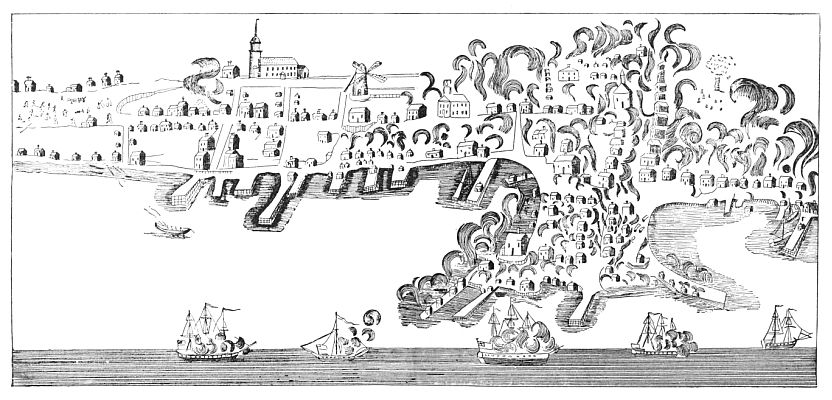
A CONTEMPORARY SKETCH OF THE BURNING OF FALMOUTH
Effects upon Congress “Well, brother rebel,” said a Southern member to Samuel Ward of Rhode Island, “we have now got a sufficient answer to our petition: I want nothing more, but am ready to declare ourselves independent.” Congress now advised New Hampshire, Virginia, and South Carolina to frame for themselves new republican governments, as Massachusetts had already done; it urged South Carolina to seize the British vessels in her waters; it appointed a committee to correspond with foreign powers; and above all, it adopted unreservedly the scheme, already partially carried into operation, for the expulsion of the British from Canada.
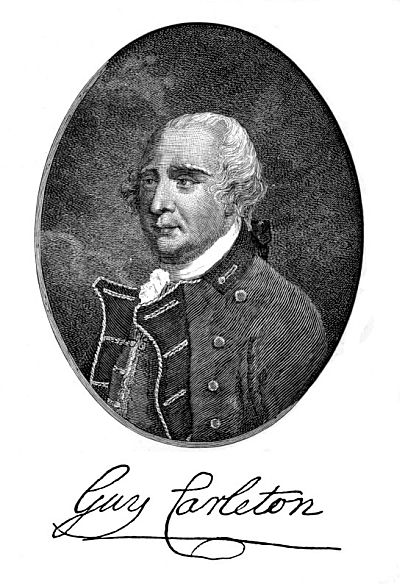
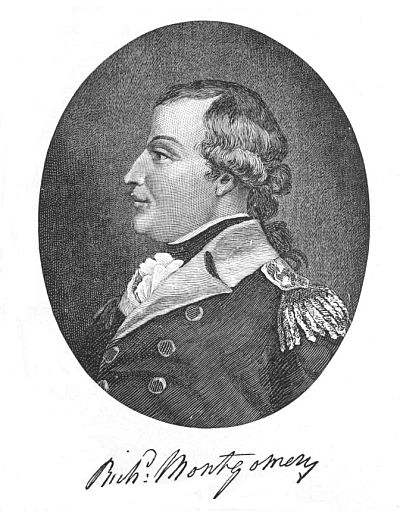
At once upon the outbreak of hostilities at Lexington, the conquest of Canada had been contemplated by the Northern leaders, who well remembered how, in days gone by, the valley of the St. Lawrence had furnished a base for attacks upon the province of New York, which was then the strategic centre of the American world. It was deemed an act of military prudence to secure this region at the outset. But so long as the least hope of conciliation remained, Congress was unwilling to adopt any measures save such as were purely defensive in character. The Americans invade Canada, Sept., 1775As we have seen, it was only with reluctance that it had sanctioned the garrisoning of Ticonderoga by the Connecticut troops. But in the course of the summer it was learned that the governor of Canada, Sir Guy Carleton, was about to take steps to recover Ticonderoga; and it was credibly reported that intrigues were going on with the Iroquois tribes, to induce them to harry the New England frontier and the pleasant farms on the Hudson: so that, under these circumstances, the invasion of Canada was now authorized by Congress as a measure of self-defence. An expedition down Lake Champlain, against Montreal, was at once set on foot. As Schuyler, the commander of the northern department, was disabled by ill health, the enterprise was confided to Richard Montgomery, an officer who had served with distinction under Wolfe. Late in August, Montgomery started from Ticonderoga, and on the 12th of September, with a force of two thousand men, he laid siege to the fortress of St. John’s, which commanded the approach to Montreal. Carleton, whose utmost exertions could bring together only some nine hundred men, made heroic but fruitless efforts to stop his progress. After a siege of fifty days, St. John’s surrendered on the 3d of November, and on the 12th Montgomery entered Montreal in triumph. The people of Canada had thus far seemed favourably disposed toward the American invaders, and Montgomery issued a proclamation urging them to lose no time in choosing delegates to attend the Continental Congress.
Meanwhile, in September, Washington had detached from the army at Cambridge one thousand New England infantry, with two companies of Pennsylvania riflemen and Morgan’s famous Virginia sharpshooters, and ordered them to advance upon Quebec through the forests of Maine and by way of the rivers Kennebec and Chaudière. Arnold’s march through the wilderness of MaineThe expedition was commanded by Colonel Benedict Arnold, who seems to have been one of the first, if not the first, to suggest it. Such plans of invading an enemy’s territory, involving the march of independent forces upon convergent lines from remote points, were much more in favour with military men a century ago than to-day. The vice of such methods was often illustrated during our Revolutionary War. The vast distances and total lack of communication made effective coöperation between Montgomery and Arnold impossible; while a surprise of Quebec by the latter, with force sufficient to capture it unaided, was almost equally out of the question. But the very difficulty of the scheme commended it to the romantic and buoyant temper of Benedict Arnold. The enterprise was one to call for all his persistent daring and fertile resource. It was an amphibious journey, as his men now rowed their boats with difficulty against the strong, swift current of the Kennebec, and now, carrying boats and oars on their shoulders, forced their way through the tangled undergrowth of the primeval forests. Often they had to wade across perilous bogs, and presently their shoes were cut to pieces by sharp stones, and their clothes torn to shreds by thorns and briers. Their food gave out, and though some small game was shot, their hunger became such that they devoured their dogs. When they reached the head of the Chaudière, after this terrible march of thirty-three days, two hundred of their number had succumbed to starvation, cold, and fatigue, while two hundred more had given out and returned to Massachusetts, carrying with them such of the sick and disabled as they could save. The descent of the Chaudière in their boats afforded some chance for rest, and presently they began to find cattle for food. At last, on the 13th of November, the next day after Montgomery’s capture of Montreal, they crossed the broad St. Lawrence, and climbed the Heights of Abraham at the very place where Wolfe had climbed to victory sixteen years ago. There was splendid bravado in Arnold’s advancing to the very gates with his little, worn-out army, now reduced to seven hundred men, and summoning the garrison either to come out and fight, or to surrender the town. But the garrison very properly would neither surrender nor fight. The town had been warned in time, and Arnold had no alternative but to wait for Montgomery to join him.
Six days afterward, Carleton, disguised as a farmer, and ferried down stream in a little boat, found his way into Quebec; and on the 3d of December, Montgomery made his appearance with a small force, which raised the number of the Americans to twelve hundred men. As Carleton persistently refused to come out of his defences, it was resolved to carry the works by storm,—a chivalrous, nay, one might almost say, a foolhardy decision, had it not been so nearly justified by the event. Assault upon Quebec, Dec. 31, 1775On the last day of 1775, England came within an ace of losing Quebec. At two o’clock in the morning, in a blinding snowstorm, Montgomery and Arnold began each a furious attack, at opposite sides of the town; and aided by the surprise, each came near carrying his point. Montgomery had almost forced his way in when he fell dead, pierced by three bullets; and this so chilled the enthusiasm of his men that they flagged, until reinforcements drove them back. Arnold, on his side, was severely wounded and carried from the field; but the indomitable Morgan took his place, and his Virginia company stormed the battery opposed to them, and fought their way far into the town. Had the attack on the other side been kept up with equal vigour, as it might have been but for Montgomery’s death, Quebec must have fallen. As it was, Morgan’s triumphant advance only served to isolate him, and presently he and his gallant company were surrounded and captured.
Total failure of the attempt upon Canada With the failure of this desperate attack passed away the golden opportunity for taking the citadel of Canada. Arnold remained throughout the winter in the neighbourhood of Quebec, and in the spring the enterprise was taken up by Wooster and Sullivan with fresh forces. But by this time many Hessians had come over, and Carleton, reinforced until his army numbered 13,000, was enabled to recapture Montreal and push back the Americans, until in June, after a hazardous retreat, well conducted by Sullivan, the remnant of their invading army found shelter at Crown Point. Such was the disastrous ending of a campaign which at the outset had promised a brilliant success, and which is deservedly famous for the heroism and skill with which it was conducted. The generalship of Montgomery received the warm approval of no less a critic than Frederick the Great; and the chivalrous bravery of Arnold, both in his march through the wilderness and in the military operations which followed, was such that if a kind fate could then and there have cut the thread of his life, he would have left behind him a sweet and shining memory. As for the attempt to bring Canada into the American union, it was one which had no hope of success save through a strong display of military force. The sixteen years which had elapsed since the victory of Wolfe had not transformed the Canadian of the old régime into a free-born Englishman. The question at present for him was only that of a choice of allegiance, and while at first the invaders were favourably received, it soon became apparent that between the Catholic and the Puritan there could be but little real sympathy. The Quebec Act, which legalized Catholic worship in Canada, had done much toward securing England’s hold upon this part of her American possessions. And although, in the colourless political condition of this northern province, the capture of Quebec might well have brought it into the American union, where it would gradually have taken on a fresh life, as surely as it has done under British guidance, yet nothing short of such a military occupation could have had any effect in determining its languid preferences.
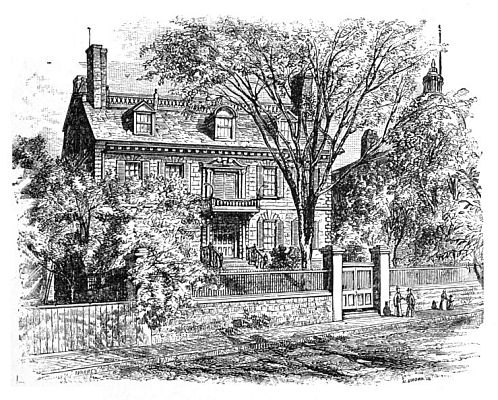
The siege of Boston While Canada was thus freed from the presence of the Continental troops, the British army, on the other hand, was driven from Boston, and New England was cleared of the enemy. During the autumn and winter, Washington had drawn his lines as closely as possible about the town, while engaged in the work of organizing and equipping his army. The hardest task was to collect a sufficient quantity of powder and ball, and to bring together siege-guns. As the season wore on, the country grew impatient, and Washington sometimes had to listen to criticisms like those that were directed against McClellan in Virginia, at the beginning of 1862, or against Grant before Vicksburg, in the spring of 1863. President Hancock, who owned a great deal of property in Boston, urged him to set fire to the town and destroy it, if by so doing he could drive the British to their ships. But Washington had planned much more wisely. By the 1st of March a great quantity of cannon had been brought in by Henry Knox, some of them dragged on sledges all the way from Ticonderoga, and so at last Washington felt himself prepared to seize upon Dorchester Heights. This position commanded the town and harbour even more effectually than Bunker Hill, and why in all these months General Howe had not occupied it one would find it hard to say. He was bitterly attacked for his remissness by the British newspapers, as was quite natural.
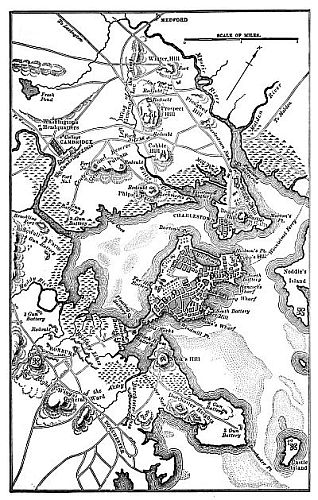
BOSTON, WITH ITS ENVIRONS, IN 1775 AND 1776
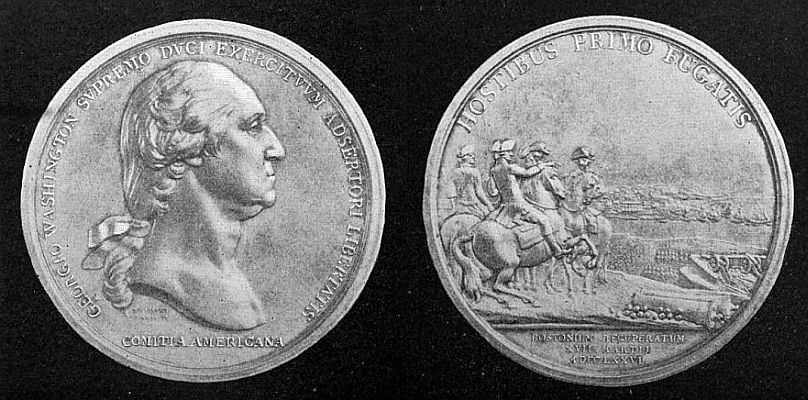
MEDAL GRANTED TO WASHINGTON FOR HIS CAPTURE OF BOSTON
Washington seizes Dorchester Heights March 4, 1776 Washington chose for his decisive movement the night of the 4th of March. Eight hundred men led the way, escorting the wagons laden with spades and crowbars, hatchets, hammers, and nails; and after them followed twelve hundred men, with three hundred ox-carts, carrying timbers and bales of hay; while the rear was brought up by the heavy siege-guns. From Somerville, East Cambridge, and Roxbury, a furious cannonade was begun soon after sunset and kept up through the night, completely absorbing the attention of the British, who kept up a lively fire in return. The roar of the cannon drowned every other sound for miles around, while all night long the two thousand Americans, having done their short march in perfect secrecy, were busily digging and building on Dorchester Heights, and dragging their siege-guns into position. Early next morning, Howe saw with astonishment what had been done, and began to realize his perilous situation. The commander of the fleet sent word that unless the Americans could be forthwith dislodged, he could not venture to keep his ships in the harbour. Most of the day was consumed in deciding what should be done, until at last Lord Percy was told to take three thousand men and storm the works. But the slaughter of Bunker Hill had taught its lesson so well that neither Percy nor his men had any stomach for such an enterprise. A violent storm, coming up toward nightfall, persuaded them to delay the attack till next day, and by that time it had become apparent to all that the American works, continually growing, had become impregnable. Percy’s orders were accordingly countermanded, and it was decided to abandon the town immediately. It was the sixth anniversary of the day on which Hutchinson had yielded to the demand of the town meeting and withdrawn the two British regiments from Boston. The work then begun was now consummated by Washington, and from that time forth the deliverance of Massachusetts was complete. Howe caused it at once to be known among the citizens that he was about to evacuate Boston, but he threatened to lay the town in ashes if his troops should be fired on. The British troops evacuate Boston March 17, 1776The selectmen conveyed due information of all this to Washington, who accordingly, secure in the achievement of his purpose, allowed the enemy to depart in peace. By the 17th, the eight thousand troops were all on board their ships, and, taking with them all the Tory citizens, some nine hundred in number, they sailed away for Halifax. Their space did not permit them to carry away their heavy arms, and their retreat, slow as it was, bore marks of hurry and confusion. In taking possession of the town, Washington captured more than two hundred serviceable cannon, ten times more powder and ball than his army had ever seen before, and an immense quantity of muskets, gun-carriages, and military stores of every sort. Thus was New England set free by a single brilliant stroke, with very slight injury to private property, and with a total loss of not more than twenty lives.
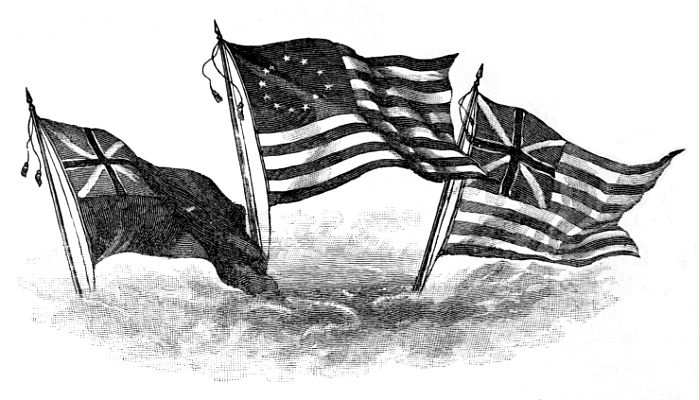
EVOLUTION OF THE UNITED STATES FLAG[8]
The time was now fairly ripe for the colonies to declare themselves independent of Great Britain. The idea of a separation from the mother-country, which in the autumn had found but few supporters, grew in favour day by day through the winter and spring. A provisional flagThe incongruousness of the present situation was typified by the flag that Washington flung to the breeze on New Year’s Day at Cambridge, which was made up of thirteen stripes, to represent the United Colonies, but retained the British crosses in the corner. Thus far, said Benjamin Harrison, they had contrived to “hobble along under a fatal attachment to Great Britain,” but the time had come when one must consider the welfare of one’s own country first of all. As Samuel Adams said, their petitions had not been heard, and yet had been answered by armies and fleets, and by myrmidons hired from abroad. Effect of the hiring of “myrmidons”Nothing had made a greater impression upon the American people than this hiring of German troops. It went farther than any other single cause to ripen their minds for the declaration of independence. Many now began to agree with the Massachusetts statesman; and while public opinion was in this malleable condition, there appeared a pamphlet which wrought a prodigious effect upon the people, mainly because it gave terse and vigorous expression to views which every one had already more than half formed for himself.
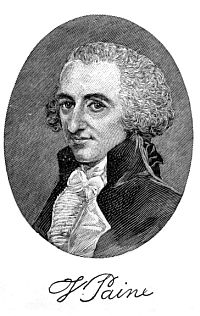
Thomas Paine had come over to America in December, 1774, and through the favour of Franklin had secured employment as editor of the “Pennsylvania Magazine.” He was by nature a dissenter and a revolutionist to the marrow of his bones. Full of the generous though often blind enthusiasm of the eighteenth century for the “rights of man,” he was no respecter of the established order, whether in church or state. To him the church and its doctrines meant slavish superstition, and the state meant tyranny. Of crude undisciplined mind, and little scholarship, yet endowed with native acuteness and sagacity, and with no mean power of expressing himself, Paine succeeded in making everybody read what he wrote, and achieved a popular reputation out of all proportion to his real merit. Among devout American families his name was for a long time a name of horror and opprobrium, and uneducated free thinkers still build lecture-halls in honour of his memory, and celebrate the anniversary of his birthday, with speeches full of harmless but rather dismal platitudes. The “Age of Reason,” which was the cause of all this blessing and banning, contains, amid much crude argument, some sound and sensible criticism, such as is often far exceeded in boldness in the books and sermons of Unitarian and Episcopalian divines of the present day; but its tone is coarse and dull, and with the improvement of popular education it is fast sinking into oblivion. There are times, however, when such caustic pamphleteers as Thomas Paine have their uses. There are times when they can bring about results which are not so easily achieved by men of finer mould and more subtle intelligence. “Common Sense”It was at just such a time, in January, 1776, that Paine published his pamphlet, “Common Sense,” on the suggestion of Benjamin Rush, and with the approval of Franklin and of Samuel Adams. The pamphlet contains some irrelevant abuse of the English people, and resorts to such arguments as the denial of the English origin of the Americans. Not one third of the people, even of Pennsylvania, are of English descent, argues Paine, as if Pennsylvania had been preëminent among the colonies for its English blood, and not, as in reality, one of the least English of all the thirteen. But along with all this there was a sensible and striking statement of the practical state of the case between Great Britain and the colonies. The reasons were shrewdly and vividly set forth for looking upon reconciliation as hopeless, and for seizing the present moment to declare to the world what the logic of events was already fast making an accomplished fact. Only thus, it was urged, could the States of America pursue a coherent and well-defined policy, and preserve their dignity in the eyes of the world.
A PAGE FROM “COMMON SENSE”
Fulminations and counter-fulminations It was difficult for the printers, with the clumsy presses of that day, to bring out copies of “Common Sense” fast enough to meet the demand for it. More than a hundred thousand copies were speedily sold, and it carried conviction wherever it went. At the same time, Parliament did its best to reinforce the argument by passing an act to close all American ports, and authorize the confiscation of all American ships and cargoes, as well as of such neutral vessels as might dare to trade with this proscribed people. And, as if this were not quite enough, a clause was added by which British commanders on the high seas were directed to impress the crews of such American ships as they might meet, and to compel them, under penalty of death, to enter the service against their fellow-countrymen. In reply to this edict, Congress, in March, ordered the ports of America to be thrown open to all nations; it issued letters of marque, and it advised all the colonies to disarm such Tories as should refuse to contribute to the common defence. These measures, as Franklin said, were virtually a declaration of war against Great Britain. But before taking the last irrevocable step, the prudent Congress waited for instructions from every one of the colonies.
The first colony to take decisive action in behalf of independence was North Carolina, a commonwealth in which the king had supposed the outlook to be especially favourable for the loyalist party. Recovered in some measure from the turbulence of its earlier days, North Carolina was fast becoming a prosperous community of small planters, and its population had increased so rapidly that it now ranked fourth among the colonies, immediately after Pennsylvania. The Scots in North CarolinaSince the overthrow of the Pretender at Culloden there had been a great immigration of sturdy Scots from the western Highlands, in which the clans of Macdonald and Macleod were especially represented. The celebrated Flora Macdonald herself, the romantic woman who saved Charles Edward in 1746, had lately come over here and settled at Kingsborough with Allan Macdonald, her husband. These Scottish immigrants also helped to colonize the upland regions of South Carolina and Georgia, and they have considerably affected the race composition of the Southern people, forming an ancestry of which their descendants may well be proud. Though these Highland clansmen had taken part in the Stuart insurrection, they had become loyal enough to the government of George III., and it was now hoped that with their aid the colony might be firmly secured, and its neighbours on either side overawed. Clinton sails for the CarolinasTo this end, in January, Sir Henry Clinton, taking with him 2,000 troops, left Boston and sailed for the Cape Fear river, while a force of seven regiments and ten ships-of-war, under Sir Peter Parker, was ordered from Ireland to coöperate with him. At the same time, Josiah Martin, the royal governor, who for safety had retired on board a British ship, carried on negotiations with the Highlanders, until a force of 1,600 men was raised, and, under command of Donald Macdonald, marched down toward the coast to welcome the arrival of Clinton. The fight at Moore’s Creek, Feb. 27, 1776But North Carolina had its minute-men as well as Massachusetts, and no sooner was this movement perceived than Colonel Richard Caswell, with 1,000 militia, took up a strong position at the bridge over Moore’s Creek, which Macdonald was about to pass on his way to the coast. After a sharp fight of a half hour’s duration the Scots were seized with panic, and were utterly routed. Nine hundred prisoners, 2,000 stand of arms, and £15,000 in gold were the trophies of Caswell’s victory. The Scottish commander and his kinsman, the husband of Flora Macdonald, were taken and lodged in jail, and thus ended the sway of George III. over North Carolina. The effect of the victory was as contagious as that of Lexington had been in New England. Within ten days 10,000 militia were ready to withstand the enemy, so that Clinton, on his arrival, decided not to land, and stayed cruising about Albemarle Sound, waiting for the fleet under Parker, which did not appear on the scene until May. North Carolina declares for independenceA provincial congress was forthwith assembled, and instructions were sent to the North Carolina delegates in the Continental Congress, empowering them “to concur with the delegates in the other colonies in declaring independency and forming foreign alliances, reserving to the colony the sole and exclusive right of forming a constitution and laws for it.”
Action of South Carolina and Georgia At the same time that these things were taking place, the colony of South Carolina was framing for itself a new government, and on the 23d of March, without directly alluding to independence, it empowered its delegates to concur in any measure which might be deemed essential to the welfare of America. In Georgia the provincial congress, in choosing a new set of delegates to Philadelphia, authorized them to “join in any measure which they might think calculated for the common good.”
In Virginia the party in favour of independence had been in the
minority, until, in November, 1775, Virginia: Lord Dunmore’s proclamationthe royal governor, Lord Dunmore,
had issued a proclamation, offering freedom to all such negroes and
indented white servants as might enlist for the purpose of “reducing the
colony to a proper sense of its duty.” This measure Lord Dunmore hoped
would “oblige the rebels to disperse, in order to take care of their
families and property.” But the object was not attained. The relations
between master and slave in Virginia were so pleasant that the offer of
freedom fell upon dull, uninterested ears.
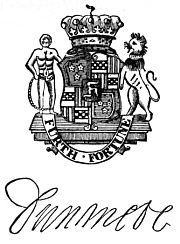 With light work and generous
fare, the condition of the Virginia negro was a happy one. The time had
not yet come when he was liable to be torn from wife and children, to
die of hardship in the cotton-fields and rice-swamps of the far South.
He was proud of his connection with his master’s estate and family, and
had nothing to gain by rebellion. As for the indented white servants,
the governor’s proposal to them was of about as much consequence as a
proclamation of Napoleon’s would have been if, in 1805, he had offered
to set free the prisoners in Newgate on condition of their helping him
to invade England. But, impotent as this measure of Lord Dunmore’s was,
it served to enrage the people of Virginia, setting their minds
irretrievably against the king and his cause. During the month of
November, hearing that a party of “rebels” were on their way from North
Carolina to take possession of Norfolk, Lord Dunmore built a rude fort
at the Great Bridge over Elizabeth river, which commanded the southern
approach to the town. At that time, Norfolk, with about 9,000
inhabitants, was the principal town in Virginia, and the commercial
centre of the colony. The loyalist party, represented chiefly by
Scottish merchants, was so strong there and so violent that many of the
native Virginia families, finding it uncomfortable to stay in their
homes, had gone away into the country. Skirmish at the Great Bridge; and burning of NorfolkThe patriots, roused to anger by
Dunmore’s proclamation, now resolved to capture Norfolk, and a party of
sharpshooters, with whom the illustrious John Marshall served as
lieutenant, occupied the bank of Elizabeth river, opposite Dunmore’s
fort. On the 9th of December, after a sharp fight of fifteen minutes, in
which Dunmore’s regulars lost sixty-one men, while not a single
Virginian was slain, the fort was hastily abandoned, and the road to
Norfolk was laid open for the patriots. A few days later the Virginians
took possession of their town, while Dunmore sought refuge in the
Liverpool, ship-of-the-line, which had just sailed into the harbour. On
New Year’s Day the governor vindictively set fire to the town, which he
had been unable to hold against its rightful owners. The conflagration,
kindled by shells from the harbour, raged for three days and nights,
until the whole town was laid in ashes, and the people were driven to
seek such sorry shelter as might save them from the frosts of midwinter.
With light work and generous
fare, the condition of the Virginia negro was a happy one. The time had
not yet come when he was liable to be torn from wife and children, to
die of hardship in the cotton-fields and rice-swamps of the far South.
He was proud of his connection with his master’s estate and family, and
had nothing to gain by rebellion. As for the indented white servants,
the governor’s proposal to them was of about as much consequence as a
proclamation of Napoleon’s would have been if, in 1805, he had offered
to set free the prisoners in Newgate on condition of their helping him
to invade England. But, impotent as this measure of Lord Dunmore’s was,
it served to enrage the people of Virginia, setting their minds
irretrievably against the king and his cause. During the month of
November, hearing that a party of “rebels” were on their way from North
Carolina to take possession of Norfolk, Lord Dunmore built a rude fort
at the Great Bridge over Elizabeth river, which commanded the southern
approach to the town. At that time, Norfolk, with about 9,000
inhabitants, was the principal town in Virginia, and the commercial
centre of the colony. The loyalist party, represented chiefly by
Scottish merchants, was so strong there and so violent that many of the
native Virginia families, finding it uncomfortable to stay in their
homes, had gone away into the country. Skirmish at the Great Bridge; and burning of NorfolkThe patriots, roused to anger by
Dunmore’s proclamation, now resolved to capture Norfolk, and a party of
sharpshooters, with whom the illustrious John Marshall served as
lieutenant, occupied the bank of Elizabeth river, opposite Dunmore’s
fort. On the 9th of December, after a sharp fight of fifteen minutes, in
which Dunmore’s regulars lost sixty-one men, while not a single
Virginian was slain, the fort was hastily abandoned, and the road to
Norfolk was laid open for the patriots. A few days later the Virginians
took possession of their town, while Dunmore sought refuge in the
Liverpool, ship-of-the-line, which had just sailed into the harbour. On
New Year’s Day the governor vindictively set fire to the town, which he
had been unable to hold against its rightful owners. The conflagration,
kindled by shells from the harbour, raged for three days and nights,
until the whole town was laid in ashes, and the people were driven to
seek such sorry shelter as might save them from the frosts of midwinter.
Virginia declares for independence This event went far toward determining the attitude of Virginia. In November the colony had not felt ready to comply with the recommendation of Congress, and frame for herself a new government. The people were not yet ready to sever the links which bound them to Great Britain. But bombardment of their principal town was an argument of which every one could appreciate the force and the meaning. During the winter and spring the revolutionary feeling waxed in strength daily. On the 6th of May, 1776, a convention was chosen to consider the question of independence. Mason, Henry, Pendleton, and the illustrious Madison took part in the discussion, and on the 14th it was unanimously voted to instruct the Virginia delegates in Congress “to propose to that respectable body to declare the United Colonies free and independent States,” and to “give the assent of the colony to measures to form foreign alliances and a confederation, provided the power of forming government for the internal regulations of each colony be left to the colonial legislatures.” At the same time, it was voted that the people of Virginia should establish a new government for their commonwealth. In the evening, when these decisions had been made known to the people of Williamsburgh, their exultation knew no bounds. While the air was musical with the ringing of church-bells, guns were fired, the British flag was hauled down at the State House, and the crosses and stripes hoisted in its place.
This decisive movement of the largest of the colonies was hailed throughout the country with eager delight; and from other colonies which had not yet committed themselves responses came quickly. Action of Rhode Island and MassachusettsRhode Island, which had never parted with its original charter, did not need to form a new government, but it had already, on the 4th of May, omitted the king’s name from its public documents and sheriff’s writs, and had agreed to concur with any measures which Congress might see fit to adopt regarding the relations between England and America. In the course of the month of May town meetings were held throughout Massachusetts and it was everywhere unanimously voted to uphold Congress in the declaration of independence which it was now expected to make.
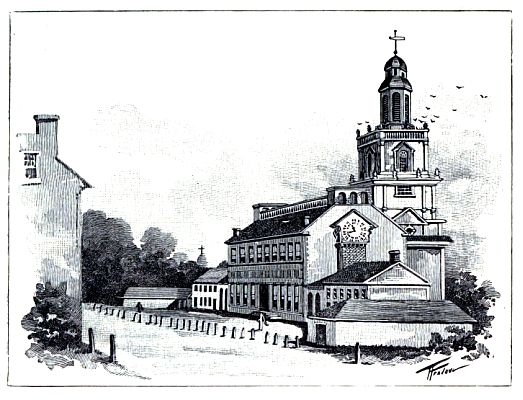
INDEPENDENCE HALL, PHILADELPHIA
Resolution of May 15 On the 15th of May, Congress adopted a resolution recommending to all the colonies to form for themselves independent governments, and in a preamble, written by John Adams, it was declared that the American people could no longer conscientiously take oath to support any government deriving its authority from the Crown; all such governments must now be suppressed, since the king had withdrawn his protection from the inhabitants of the United Colonies. Like the famous preamble to Townshend’s bill of 1767, this Adams preamble contained within itself the gist of the whole matter. To adopt it was virtually to cross the Rubicon, and it gave rise to a hot debate. James Duane of New York admitted that if the facts stated in the preamble should turn out to be true, there would not be a single voice against independence; but he could not yet believe that the American petitions were not destined to receive a favourable answer. “Why,” therefore, “all this haste? Why this urging? Why this driving?” James Wilson of Pennsylvania, one of the ablest of all the delegates in the revolutionary body, urged that Congress had not yet received sufficient authority from the people to justify it in taking so bold a step. The resolution was adopted, however, preamble and all; and now the affair came quickly to maturity. “The Gordian knot is cut at last!” exclaimed John Adams. In town meeting the people of Boston thus instructed their delegates: “The whole United Colonies are upon the verge of a glorious revolution. We have seen the petitions to the king rejected with disdain. For the prayer of peace he has tendered the sword; for liberty, chains; for safety, death. Loyalty to him is now treason to our country. Instructions from BostonWe think it absolutely impracticable for these colonies to be ever again subject to or dependent upon Great Britain, without endangering the very existence of the state. Placing, however, unbounded confidence in the supreme council of the Congress, we are determined to wait, most patiently wait, till their wisdom shall dictate the necessity of making a declaration of independence. In case the Congress should think it necessary for the safety of the United Colonies to declare them independent of Great Britain, the inhabitants, with their lives and the remnant of their fortunes, will most cheerfully support them in the measure.”
Lee’s motion in Congress This dignified and temperate expression of public opinion was published in a Philadelphia evening paper, on the 8th of June. On the preceding day in accordance with the instructions which had come from Virginia, the following motion had been submitted to Congress by Richard Henry Lee:—
“That these United Colonies are, and of right ought to be, free and independent States; that they are absolved from all allegiance to the British Crown; and that all political connection between them and the state of Great Britain is, and ought to be, totally dissolved.
“That it is expedient forthwith to take the most effectual measures for forming foreign alliances.
“That a plan of confederation be prepared and transmitted to the respective colonies, for their consideration and approbation.”
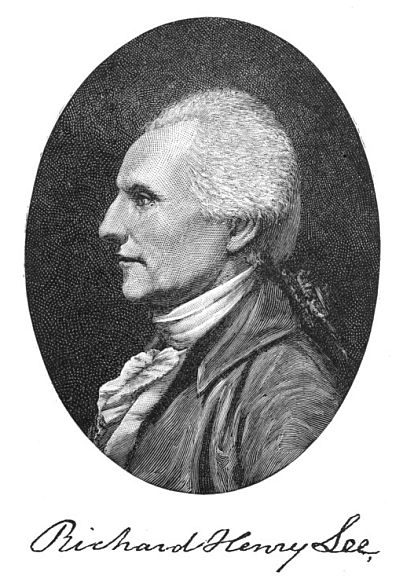
In these trying times the two greatest colonies, Virginia and Massachusetts, had been wont to go hand in hand; and the motion of Richard Henry Lee was now promptly seconded by John Adams. It was resisted by Dickinson and Wilson of Pennsylvania, and by Robert Livingston of New York, on the ground that public opinion in the middle colonies was not yet ripe for supporting such a measure; at the same time these cautious members freely acknowledged that the lingering hope of an amicable settlement with Great Britain had come to be quite chimerical. Debate on Lee’s motionThe prospect of securing European alliances was freely discussed. The supporters of the motion urged that a declaration of independence would be nothing more than the acknowledgment of a fact which existed already; and until this fact should be formally acknowledged, it was not to be supposed that diplomatic courtesy would allow such powers as France and Spain to treat with the Americans. On the other hand, the opponents of the motion argued that France and Spain were not likely to look with favour upon the rise of a great Protestant power in the western hemisphere, and that nothing would be easier than for these nations to make a bargain with England, whereby Canada might be restored to France and Florida to Spain, in return for military aid in putting down the rebellious colonies. The result of the whole discussion was decidedly in favour of a declaration of independence; but to avoid all appearance of undue haste, it was decided, on the motion of Edward Rutledge of South Carolina, to postpone the question for three weeks, and invite the judgment of those colonies which had not yet declared themselves.
Connecticut and New Hampshire Under these circumstances, the several colonies acted with a promptness that outstripped the expectations of Congress. Connecticut had no need of a new government, for, like Rhode Island, she had always kept the charter obtained from Lord Clarendon in 1662, she had always chosen her own governor, and had always been virtually independent of Great Britain. Nothing now was necessary but to omit the king’s name from legal documents and commercial papers, and to instruct her delegates in Congress to support Lee’s motion; and these things were done by the Connecticut legislature on the 14th of June. The very next day, New Hampshire, which had formed a new government as long ago as January, joined Connecticut in declaring for independence.
New Jersey In New Jersey there was a sharp dispute. The royal governor, William Franklin, had a strong party in the colony; the assembly had lately instructed its delegates to vote against independence, and had resolved to send a separate petition to the king. Against so rash and dangerous a step, Dickinson, Jay, and Wythe were sent by Congress to remonstrate; and as the result of their intercession, the assembly, which yielded, was summarily prorogued by the governor. A provincial congress was at once chosen in its stead. On the 16th of June, the governor was arrested and sent to Connecticut for safe-keeping; on the 21st, it was voted to frame a new government; and on the 22d, a new set of delegates were elected to Congress, with instructions to support the declaration of independence.
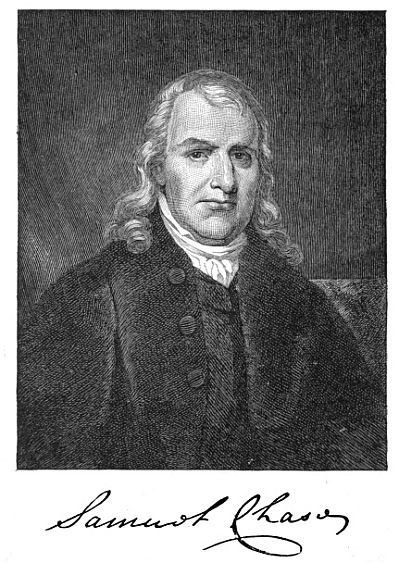
Pennsylvania and Delaware In Pennsylvania there was hot discussion, for the whole strength of the proprietary government was thrown into the scale against independence. Among the Quakers, too, there was a strong disposition to avoid an armed conflict on any terms. A little while before, they had held a convention, in which it was resolved that “the setting up and putting down kings and governments is God’s peculiar prerogative, for causes best known to himself, and that it is not our business to have any hand or contrivance therein; nor to be busybodies above our station, much less to plot and contrive the ruin or overturn of any of them, but to pray for the king and safety of our nation and good of all men; that we may lead a peaceable and quiet life in all goodness and honesty, under the government which God is pleased to set over us. May we, therefore, firmly unite in the abhorrence of all such writings and measures as evidence a desire and design to break off a happy connection we have hitherto enjoyed with the kingdom of Great Britain, and our just and necessary subordination to the king and those who are lawfully placed in authority under him.” This view of the case soon met with a pithy rejoinder from Samuel Adams, who, with a quaint use of historical examples, proved that, as the rise of kings and empires is part of God’s special prerogative, the time had now come, in the course of divine providence, for the setting up of an independent empire in the western hemisphere. Six months ago, the provincial assembly had instructed its delegates to oppose independence; but on the 20th of May a great meeting was held at the State House, at which more than seven thousand people were present, and it was unanimously resolved that this act of the assembly “had the dangerous tendency to withdraw this province from that happy union with the other colonies which we consider both our glory and our protection.” The effect of this resolution was so great that on the 18th of June a convention was held to decide on the question of independence; and after six days of discussion, it was voted that a separation from Great Britain was desirable, provided only that, under the new federal government, each state should be left to regulate its own internal affairs. On the 14th of June, a similar action had been taken by Delaware.
Maryland
In Maryland there was little reason why the people should wish for a
change of government, save through their honourable sympathy with the
general interests of the United Colonies. Not only was the proprietary
government deeply rooted in the affections of the people, but Robert
Eden, the governor holding office at this particular time, was greatly
loved and respected. Maryland had not been insulted by the presence of
troops.
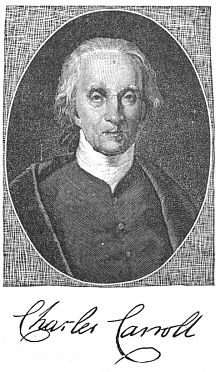 She had not seen her citizens shot down in cold blood like
Massachusetts, or her chief city laid in ashes like Virginia; nor had
she been threatened with invasion and forced to fight in her own defence
like North Carolina. Her direct grievances were few and light, and even
so late as the 21st of May, she had protested against any action which
might lead to the separation of the colonies from England. But when, in
June, her great leaders, Samuel Chase and Charles Carroll of Carrollton,
determined to “take the sense of the people,” a series of county
meetings were held, and it was unanimously voted that “the true
interests and substantial happiness of the United Colonies in general,
and this in particular, are inseparably interwoven and linked together.”
As soon as the colony had taken its stand upon this broad and generous
principle, the governor embarked on a British man-of-war before
Annapolis, bearing with him the kindly regrets and adieus of the people,
and on the 28th of June the delegates in Congress were duly authorized
to concur in a declaration of independence.
She had not seen her citizens shot down in cold blood like
Massachusetts, or her chief city laid in ashes like Virginia; nor had
she been threatened with invasion and forced to fight in her own defence
like North Carolina. Her direct grievances were few and light, and even
so late as the 21st of May, she had protested against any action which
might lead to the separation of the colonies from England. But when, in
June, her great leaders, Samuel Chase and Charles Carroll of Carrollton,
determined to “take the sense of the people,” a series of county
meetings were held, and it was unanimously voted that “the true
interests and substantial happiness of the United Colonies in general,
and this in particular, are inseparably interwoven and linked together.”
As soon as the colony had taken its stand upon this broad and generous
principle, the governor embarked on a British man-of-war before
Annapolis, bearing with him the kindly regrets and adieus of the people,
and on the 28th of June the delegates in Congress were duly authorized
to concur in a declaration of independence.
Peaceful Maryland was thus the twelfth colony which formally committed itself to the cause of independence, as turbulent North Carolina, under the stimulus of civil war and threatened invasion, had been the first. Accordingly on the 1st of July, the day when the motion of Richard Henry Lee was to be taken up in Congress, unanimous instructions in favour of independence had been received from every one of the colonies, except New York. The situation in New YorkIn approaching this momentous question New York was beset by peculiar difficulties. Not only was the Tory party unusually strong there, for reasons already stated, but the risks involved in a revolutionary policy were greater than anywhere else. From its commanding military position, it was clear that the British would direct their main efforts toward the conquest of this central colony; and while on the one hand the broad, deep waters about Manhattan Island afforded an easy entrance for their resistless fleet, on the other hand the failure of the Canadian expedition had laid the whole country open to invasion from the north, and the bloodthirsty warriors of the Long House were not likely to let slip so fair an opportunity for gathering scalps from the exposed settlements on the frontier. Not only was it probable, for these reasons, that New York would suffer more than any other colony from the worst horrors of war, but as a commercial state with only a single seaport, the very sources of her life would be threatened should the British once gain a foothold upon Manhattan Island. The fleet of Lord Howe was daily expected in the harbour, and it was known that the army which had been ousted from Boston, now largely reinforced, was on its way from Halifax to undertake the capture of the city of New York. To guard against this expected danger, Washington had some weeks since moved his army thither from Boston; but his whole effective force did not exceed eight thousand men, and with these he was obliged to garrison points so far apart as King’s Bridge, Paulus Hook, Governor’s Island, and Brooklyn Heights. The position was far less secure than it had been about Boston, for British ships could here come up the Hudson and East rivers, and interpose between these isolated detachments. As for Staten Island, Washington had not troops enough to occupy it at all, so that when General Howe arrived, on the 28th of June, he was allowed to land there without opposition. It was a bitter thing for Washington to be obliged to permit this, but there was no help for it. Not only in numbers, but in equipment, Washington’s force was utterly inadequate to the important task assigned it, and Congress had done nothing to increase its efficiency beyond ordering a levy of twenty-five thousand militia from New England and the middle colonies, to serve for six months only.
The Tryon plot, June, 1779 Under these circumstances, the military outlook, in case the war were to go on, was certainly not encouraging, and the people of New York might well be excused for some tardiness in committing themselves irrevocably on the question of independence, especially as it was generally understood that Lord Howe was coming armed with plenary authority to negotiate with the American people. To all the other dangers of the situation there was added that of treachery in the camp. Governor Tryon, like so many of the royal governors that year, had taken refuge on shipboard, whence he schemed and plotted with his friends on shore. A plan was devised for blowing up the magazines and seizing Washington, who was either to be murdered or carried on board ship to be tried for treason, according as the occasion might suggest. The conspiracy was discovered in good time; the mayor of New York, convicted of correspondence with Tryon, was thrown into jail, and one of Washington’s own guard, who had been bribed to aid the nefarious scheme, was summarily hanged in a field near the Bowery. Such a discovery as this served to throw discredit upon the Tory party. The patriots took a bolder stand than ever, but when the 1st of July came it found the discussion still going on, and the New York delegates in Congress were still without instructions.
Final debate on Lee’s motion On the 1st of July Congress resolved itself into a committee of the whole, to “take into consideration the resolution respecting independency.” As Richard Henry Lee was absent, John Adams, who had seconded the motion, was called upon to defend it, which he did in a powerful speech. He was ably opposed by John Dickinson, who urged that the country ought not to be rashly committed to a position, to recede from which would be infamous, while to persist in it might entail certain ruin. A declaration of independence would not strengthen the resources of the country by a single regiment or a single cask of powder, while it would shut the door upon all hope of accommodation with Great Britain. And as to the prospect of an alliance with France and Spain, would it not be well to obtain some definite assurances from these powers before proceeding to extremities? Besides all this, argued Dickinson, the terms of confederation among the colonies were still unsettled, and any declaration of independence, to have due weight with the world, ought to be preceded by the establishment of a federal government. The boundaries of the several colonies ought first to be fixed, and their respective rights mutually guaranteed; and the public lands ought also to be solemnly appropriated for the common benefit. Then, the orator concluded, “when things shall have been thus deliberately rendered firm at home and favourable abroad,—then let America, attollens humeris famam et fata nepotum, bearing up her glory and the destiny of her descendants, advance with majestic steps, and assume her station among the sovereigns of the world.”
That there was great weight in some of these considerations was shown only too plainly by subsequent events. But the argument as a whole was open to the fatal objection that if the American people were to wait for all these great questions to be settled before taking a decisive step, they would never be able to take a decisive step at all. The wise statesman regards half a loaf as better than no bread.
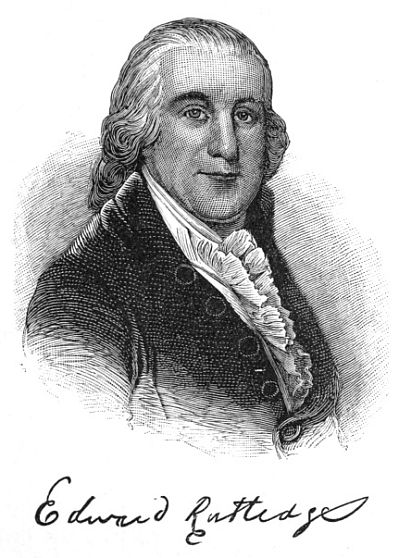
Vote on Lee’s motion Independent action on the part of all the colonies except New York had now become an accomplished fact. All were really in rebellion, and their cause could not fail to gain in dignity and strength by announcing itself to the world in its true character. Such was now the general feeling of the committee. When the question was put to vote, the New York delegates were excused, as they had no sufficient instructions. Of the three delegates from Delaware, one was absent, one voted yea, and one nay, so that the vote of the colony was lost. Pennsylvania declared in the negative by four votes against three. South Carolina also declared in the negative, but with the intimation from Edward Rutledge that it might not unlikely reverse its vote, in deference to the majority. The other nine colonies all voted in the affirmative, and the resolution was reported as agreed to by a two thirds vote. On the next day, when the vote was formally taken in regular session of Congress, the Delaware members were all present, and the affirmative vote of that colony was secured; Dickinson and Morris stayed away, thus reversing the vote of Pennsylvania; and the South Carolina members changed for the sake of unanimity.
Thus was the Declaration of Independence at last resolved upon, by the unanimous vote of twelve colonies, on the 2d of July, 1776; and this work having been done, Congress at once went into committee of the whole, to consider the form of declaration which should be adopted. That no time might be lost in disposing of this important matter, a committee had already been selected three weeks before, at the time of Lee’s motion, to draw up a paper which might be worthy of this great and solemn occasion. Thomas Jefferson, John Adams, Benjamin Franklin, Roger Sherman, and Robert Livingston were the members of the committee, and Jefferson, as representing the colony which had introduced the resolution of independence, was chosen to be the author of the Declaration. Thomas JeffersonJefferson, then but thirty-three years of age, was one of the youngest delegates in Congress; but of all the men of that time, there was, perhaps, none of wider culture or keener political instincts. Inheriting a comfortable fortune, he had chosen the law as his profession, but he had always been passionately fond of study for its own sake, and to a wide reading in history and in ancient and modern literature he added no mean proficiency in mathematics and in physical science. He was skilled in horsemanship and other manly exercises, and in the management of rural affairs; while at the same time he was sensitively and delicately organized, playing the violin like a master, and giving other evidences of rare musical talent. His temper was exceedingly placid, and his disposition was sweet and sympathetic. He was deeply interested in all the generous theories of the eighteenth century concerning the rights of man and the perfectibility of human nature; and, like most of the contemporary philosophers whom he admired, he was a sturdy foe to intolerance and priestcraft. He was in his way a much more profound thinker than Hamilton, though he had not such a constructive genius as the latter; as a political leader he was superior to any other man of his age; and his warm sympathies, his almost feminine tact, his mastery of the dominant political ideas of the time, and, above all, his unbounded faith in the common-sense of the people and in their essential rectitude of purpose served to give him one of the greatest and most commanding positions ever held by any personage in American history.
Independence declared, July 4, 1776On the evening of the 4th of July, 1776, the Declaration of Independence was unanimously adopted by twelve colonies, the delegation from New York still remaining unable to act. But the acquiescence of that colony was so generally counted upon that there was no drawback to the exultation of the people. All over the country the Declaration was received with bonfires, with the ringing of bells and the firing of guns, and with torchlight processions. Now that the great question was settled there was a general feeling of relief. “The people,” said Samuel Adams, “seem to recognize this resolution as though it were a decree promulgated from heaven.” On the 9th of July it was formally adopted by New York, and the soldiers there celebrated the occasion by throwing down the leaden statue of George III. on the Bowling Green, and casting it into bullets.
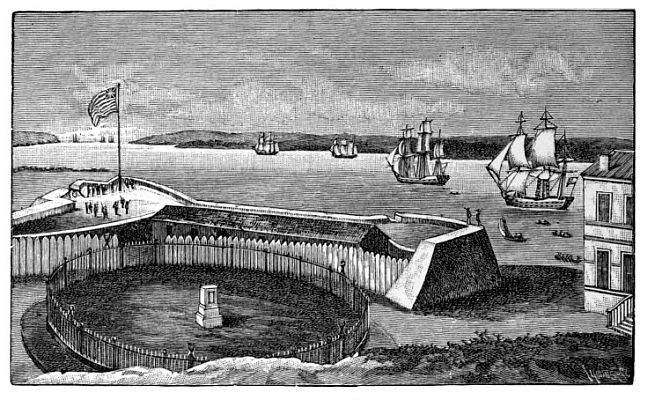
BATTERY AND BOWLING GREEN IN 1776
The Declaration was a deliberate expression of the sober thought of the American people Thus, after eleven years of irritation, and after such temperate discussion as befitted a free people, the Americans had at last entered upon the only course that could preserve their self-respect, and guarantee them in the great part which they had to play in the drama of civilization. For the dignity, patience, and moderation with which they had borne themselves throughout these trying times, history had as yet scarcely afforded a parallel. So extreme had been their forbearance, so great their unwillingness to appeal to brute force while there yet remained the slightest hope of a peaceful solution, that some British historians have gone quite astray in interpreting their conduct. Because statesmen like Dickinson and communities like Maryland were slow in believing that the right moment for a declaration of independence had come, the preposterous theory has been suggested that the American Revolution was the work of an unscrupulous and desperate minority, which, through intrigue mingled with violence, succeeded in forcing the reluctant majority to sanction its measures. Such a misconception has its root in an utter failure to comprehend the peculiar character of American political life, like the kindred misconception which ascribes the rebellion of the colonies to a sordid unwillingness to bear their due share of the expenses of the British Empire. It is like the misunderstanding which saw an angry mob in every town meeting of the people of Boston, and characterized as a “riot” every deliberate expression of public opinion. No one who is familiar with the essential features of American political life can for a moment suppose that the Declaration of Independence was brought about by any less weighty force than the settled conviction of the people that the priceless treasure of self-government could be preserved by no other means. It was but slowly that this unwelcome conviction grew upon the people; and owing to local differences of circumstances it grew more slowly in some places than in others. Prescient leaders, too, like the Adamses and Franklin and Lee, made up their minds sooner than other people. Even those conservatives who resisted to the last, even such men as John Dickinson and Robert Morris, were fully agreed with their opponents as to the principle at issue between Great Britain and America, and nothing would have satisfied them short of the total abandonment by Great Britain of her pretensions to impose taxes and revoke charters. Upon this fundamental point there was very little difference of opinion in America. As to the related question of independence, the decision, when once reached, was everywhere alike the reasonable result of free and open discussion; and the best possible illustration of this is the fact that not even in the darkest days of the war already begun did any state deliberately propose to reconsider its action in the matter. The hand once put to the plough, there was no turning back. As Judge Drayton of South Carolina said from the bench, “A decree is now gone forth not to be recalled, and thus has suddenly risen in the world a new empire, styled the United States of America.”
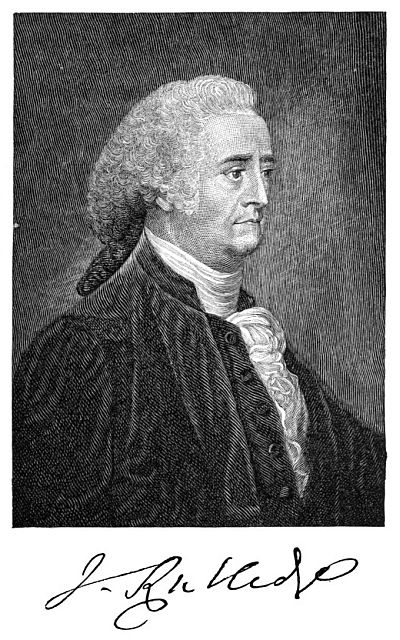
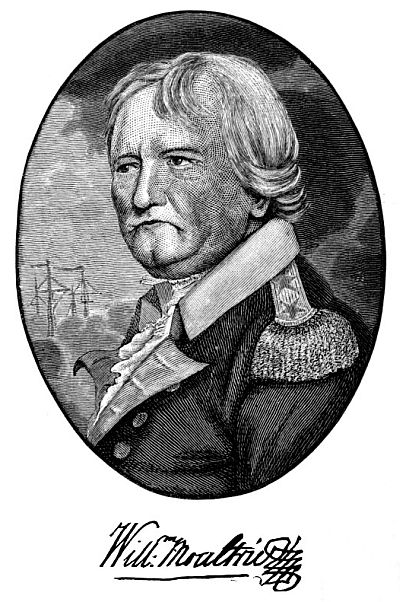
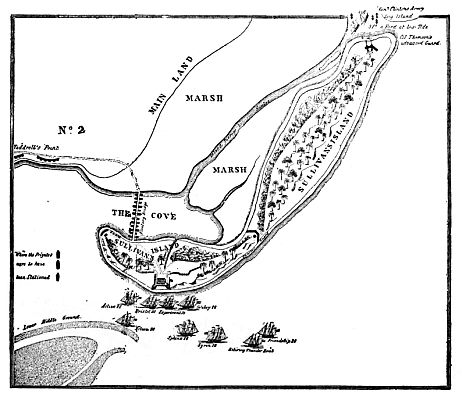
BATTLE OF FORT MOULTRIE, JUNE 28, 1776
Throughout a considerable portion of the country the news of the Declaration of Independence was accompanied by the news of a brilliant success at the South. After the defeat of Macdonald at Moore’s Creek, and the sudden arming of North Carolina, Clinton did not venture to land, but cruised about in the neighbourhood, awaiting the arrival of Sir Peter Parker’s squadron from Ireland. Lord Cornwallis arrives upon the sceneHarassed by violent and contrary winds, Parker was three months in making the voyage, and it was not until May that he arrived bringing with him Lord Cornwallis. As North Carolina had given such unmistakable evidence of its real temper, it was decided not to land upon that coast for the present, but to go south and capture Charleston and Savannah. Lord William Campbell, refugee governor of South Carolina, urged that there was a great loyalist party in that colony, which would declare itself as soon as the chief city should be in the hands of the king’s troops. That there would be any serious difficulty in taking Charleston occurred to no one. But Colonel Moultrie had thrown up on Sullivan’s Island, commanding the harbour, a fortress of palmetto logs strengthened by heavy banks of sand, and now held it with a force of twelve hundred men, while five thousand militia were gathered about the town, under command of General Charles Lee, who had been sent down to meet the emergency, but did little more than to meddle and hinder. In his character of trained European officer, Lee laughed to scorn Moultrie’s palmetto stronghold, and would have ordered him to abandon it, but that he was positively overruled by John Rutledge, president of the provincial congress, who knew Moultrie and relied upon his sound judgment. The British commanders, Clinton and Parker, wasted three weeks in discussing various plans of attack, while the Americans, with spade and hatchet, were rapidly barring every approach to Charleston, and fresh regiments came pouring in to man the new-built intrenchments. Battle of Fort Moultrie, June 28, 1776At last Clinton landed three thousand men on a naked sand-bank, divided from Sullivan’s Island by a short space of shallow sea, which he thought could be forded at low tide. At the proper time Sir Peter Parker was to open a lively fire from the fleet, which it was expected would knock down the fort in a few minutes, while Clinton, fording the shoals, would drive out the Americans at the point of the bayonet. The shoals, however, turned out to be seven feet deep at low water, and the task of the infantry was reduced to a desperate conflict with the swarms of mosquitoes, which nearly drove them frantic. The battle thus became a mere artillery duel between the fort and the fleet. The British fire was rapid and furious, but ineffective. Most of the shot passed harmlessly over the low fortress, and those which struck did no harm to its elastic structure. The American fire was very slow, and few shots were wasted. The cable of Parker’s flagship was cut by a well-aimed ball, and the ship, swinging around, received a raking fire which swept her deck with terrible slaughter. After the fight had lasted ten hours, the British retreated out of range. The palmetto fort had suffered no serious injury, and only one gun had been silenced. The American loss in killed and wounded was thirty-seven. On the other hand, Sir Peter’s flagship had lost her mainmast and mizzen-mast, and had some twenty shots in her hull, so that she was little better than a wreck. The British loss in killed and wounded was two hundred and five. Of their ten sail, only one frigate remained seaworthy at the close of the action. After waiting three weeks to refit, the whole expedition sailed away for New York to coöperate with the Howes. Charleston was saved, and for more than two years the southern states were freed from the invader. In commemoration of this brilliant victory, and of the novel stronghold which had so roused the mirth of the European soldier of fortune, the outpost on Sullivan’s Island has ever since been known by the name of Fort Moultrie.
It was with such tidings of good omen that the Declaration of Independence was sent forth to the world. But it was the last news of victory that for the next six months was to cheer the anxious statesmen assembled at Philadelphia. During the rest of the summer and the autumn, disaster followed upon disaster, until it might well seem as if fickle fortune had ceased to smile upon the cause of liberty. British plan for conquering the Hudson and cutting the United Colonies in twainThe issue of the contest was now centred in New York. By conquering and holding the line of the Hudson river, the British hoped to cut the United Colonies in two, after which it was thought that Virginia and New England, isolated from each Colonies other, might be induced to consider the error of their ways and repent. Accordingly, General Howe was to capture the city of New York, while General Carleton was to descend from Canada, recapture Ticonderoga, and take possession of the upper waters of the Hudson, together with the Mohawk valley. Great hopes were built upon the coöperation of the loyalists, of whom there was a greater number in New York than in any other state, except perhaps South Carolina. It was partly for this reason, as we shall hereafter see, that these two states suffered more actual misery from the war than all the others put together. The horrors of civil war were to be added to the attack of the invader. Throughout the Mohawk valley the influence of Sir John Johnson, the Tory son of the famous baronet of the Seven Years’ War, was thought to be supreme; and it turned out to be very powerful both with the white population and with the Indians. At the other end of the line, in New York city, the Tory element was strong, for reasons already set forth. On Long Island, the people of Kings and Queens counties, of Dutch descent, were Tories almost to a man, while the English population of Suffolk was solidly in favour of independence.
Before beginning his attack on New York, General Howe had to await the arrival of his brother; for the ministry had resolved to try the effect of what seemed to them a “conciliatory policy.” On the 12th of July Lord Howe arrived at Staten Island, bringing with him the “olive-branch” which Lord North had promised to send along with the sword. This curious specimen of political botany turned out to consist of a gracious declaration that all persons who should desist from rebellion and lend their “aid in restoring tranquillity” would receive full and free pardon from their sovereign lord the king. Lord Howe’s futile attempt to negotiate with Washington unofficiallyAs it would not do to recognize the existence of Congress, Lord Howe inclosed this declaration in a letter addressed to “George Washington, Esq.,” and sent it up the harbour with a flag of truce. But as George Washington, in his capacity of Virginian landholder and American citizen, had no authority for dealing with a royal commissioner, he refused to receive the letter. Colonel Reed informed Lord Howe’s messenger that there was no person in the army with that address. The British officer reluctantly rowed away, but suddenly, putting his barge about, he came back and inquired by what title Washington should be properly addressed. Colonel Reed replied, “You are aware, sir, of the rank of General Washington in our army?” “Yes, sir, we are,” answered the officer; “I am sure my Lord Howe will lament exceedingly this affair, as the letter is of a civil, and not of a military nature. He greatly laments that he was not here a little sooner.” This remark was understood by Colonel Reed to refer to the Declaration of Independence, which was then but eight days old. A week later Lord Howe sent Colonel Patterson, the British adjutant-general, with a document now addressed to “George Washington, Esq., etc., etc.” Colonel Patterson begged for a personal interview, which was granted. He was introduced to Washington, whom he describes as a gentleman of magnificent presence and very handsomely dressed. Somewhat overawed, and beginning his remarks with “May it please your Excellency,” Patterson explained that the etceteras on the letter meant everything. “Indeed,” said Washington, with a pleasant smile, “they might mean anything.” He declined to take the letter, but listened to Patterson’s explanations, and then replied that he was not authorized to deal with the matter, and could not give his lordship any encouragement, as he seemed empowered only to grant pardons, whereas those who had committed no fault needed no pardons. As Patterson got up to go, he asked if his Excellency had no message to send to Lord Howe. “Nothing,” answered Washington, “but my particular compliments.” Thus foiled in his attempt to negotiate with the American commander, Lord Howe next inclosed his declaration in a circular letter addressed to the royal governors of the middle and southern colonies; but as most of these dignitaries were either in jail or on board the British fleet, not much was to be expected from such a mode of publication. The precious document was captured and sent to Congress, which derisively published it for the amusement and instruction of the people. It was everywhere greeted with jeers. “No doubt we all need pardon from Heaven,” said Governor Trumbull of Connecticut, “for our manifold sins and transgressions; but the American who needs the pardon of his Britannic Majesty is yet to be found.” The only serious effect produced was the weakening of the loyalist party. Many who had thus far been held back by the hope that Lord Howe’s intercession might settle all the difficulties, now came forward as warm supporters of independence as soon as it became apparent that the king had really nothing to offer.
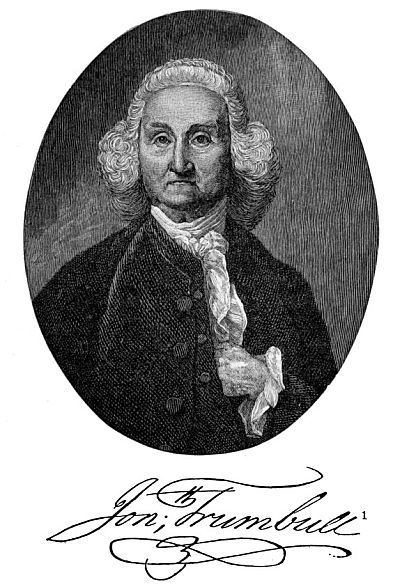
Jonathan Trumbull[9]
The military problem at New York The olive-branch having proved ineffectual, nothing was left but to unsheathe the sword, and an interesting campaign now began, of which the primary object was to capture the city of New York and compel Washington’s army to surrender. The British army was heavily reinforced by the return of Clinton’s expedition and the arrival of 11,000 fresh troops from England and Germany. General Howe had now more than 25,000 men at his disposal, fully equipped and disciplined; while to oppose him Washington had but 18,000, many of them raw levies which had just come in. If the American army had consisted of such veterans as Washington afterwards led at Monmouth, the disparity of numbers would still have told powerfully in favour of the British. As it was, in view of the crudeness of his material, Washington could hardly hope to do more with his army than to make it play the part of a detaining force. To keep the field in the face of overwhelming odds is one of the most arduous of military problems, and often calls for a higher order of intelligence than that which is displayed in the mere winning of battles. Upon this problem Washington was now to be employed for six months without respite, and it was not long before he gave evidence of military genius such as has seldom been surpassed in the history of modern warfare. At the outset the city of New York furnished the kernel of the problem. Without control of the water it would be well-nigh impossible to hold the city. Still there was a chance, and it was the part of a good general to take this chance, and cut out as much work as possible for the enemy. The shore of Manhattan Island was girded with small forts and redoubts, which Lee had erected in the spring before his departure for South Carolina. The lower end of the island, along the line of Wall Street, was then but little more than half its present width, as several lines of street have since been added upon both sides. From Cortlandt Street across to Paulus Hook, the width of the Hudson river was not less than two miles, while the East river near Fulton Ferry was nearly a mile in width. The city reached only from the Battery as far as Chatham Street, whence the Bowery Lane ran northwestwardly to Bloomingdale through a country smiling with orchards and gardens. Many of the streets were now barricaded, and a strong line of redoubts ran across from river to river below the side of Canal Street. At the upper end of the island, and on the Jersey shore, were other fortresses, with which we shall shortly have to deal, and out in the harbour, as a sort of watch-tower from which to inspect the enemy’s fleet, a redoubt had been raised on Governor’s Island, and was commanded by Colonel Prescott, with a party of the men of Bunker Hill.
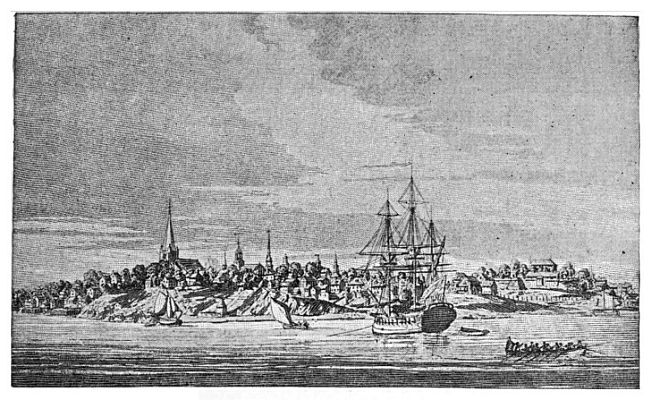
VIEW OF NEW YORK IN 1776[10]
In order to garrison such various positions, it was necessary for Washington to scatter his 18,000 men; and this added much to the difficulty of his task, for Howe could at any moment strike at almost any one of these points with his whole force. From the nature of the case the immense advantage of the initiative belonged entirely to Howe. But in one quarter, the most important of all, Washington had effected as much concentration of his troops as was possible. Importance of Brooklyn HeightsThe position on Brooklyn Heights was dangerously exposed, but it was absolutely necessary for the Americans to occupy it if they were to keep their hold upon New York. This eminence commanded New York exactly as Bunker Hill and Dorchester Heights commanded Boston. Greene had, accordingly, spent the summer in fortifying it, and there 9,000 men—one half of the army—were now concentrated under command of Putnam. Upon this exposed position General Howe determined to throw nearly the whole of his force. He felt confident that the capture or destruction of half the American army would so discourage the rebels as to make them lend a readier ear to the overtures of that excellent peacemaker, his brother. Accordingly, on the 22d of August, General Howe landed 20,000 men at Gravesend Bay. From this point the American position was approachable by four roads, two of which crossed a range of densely wooded hills, and continued through the villages of Bedford and Flatbush. To the left of these the Gowanus road followed the shore about the western base of the hills, while on the right the Jamaica road curved inland and turned their eastern base.
Battle of Long Island, Aug. 27, 1776 The elaborate caution with which the British commander now proceeded stands out in striking contrast with the temerity of his advance upon Bunker Hill in the preceding year. He spent four days in reconnoitring, and then he sent his brother, with part of the fleet, to make a feint upon New York, and occupy Washington’s attention. Before daybreak of the 27th, under the cover of this feint, the British advance had been nearly completed. General Grant, with the Highland regiments, advanced along the coast road, where the American outposts were held by William Alexander of New Jersey, commonly known as Lord Stirling, from a lapsed Scotch earldom to which he had claimed the title. The Hessians, under General von Heister, proceeded along the Bedford and Flatbush roads, which were defended by Sullivan; while more than half of the army, under Howe in person, accompanied by Clinton, Percy, and Cornwallis, accomplished a long night march by the Jamaica road, in order to take the Americans in flank. This long flanking march was completed in perfect secrecy because the people of the neighbourhood were in sympathy with the British, and it encountered no obstacles because the American force was simply incapable of covering so much territory. The divisions of Stirling and Sullivan contained the 5,000 men which were all that Putnam could afford to send forward from his works. A patrol which watched the Jamaica road was captured early in the morning, but it would not in any case have been possible to send any force there which could materially have hindered the British advance. Overwhelming superiority in numbers enabled the British to go where they pleased, and the battle was already virtually won when they appeared on the Jamaica road in the rear of the village of Bedford. Scarcely had the fight begun on the crest of the hill between Sullivan and the Hessians in his front when he found himself assaulted in the rear. Thrown into confusion, and driven back and forth through the woods between two galling fires, his division was quickly routed, and nearly all were taken prisoners, including the general himself. On the coast road the fight between Stirling and Grant was the first in which Americans had ever met British troops in open field and in regular line of battle. Against the sturdy Highland regiments Stirling held his ground gallantly for four hours, until he was in turn assaulted in the rear by Lord Cornwallis, after the rout of Sullivan. It now became, with Stirling, simply a question of saving his division from capture, and after a desperate fight this end was accomplished, and the men got back to Brooklyn Heights, though the brave Stirling himself was taken prisoner. In this noble struggle the highest honours were won by the brigade of Maryland men commanded by Smallwood, and throughout the war we shall find this honourable distinction of Maryland for the personal gallantry of her troops fully maintained, until in the last pitched battle, at Eutaw Springs, we see them driving the finest infantry of England at the point of the bayonet.
The defeat of Sullivan and Stirling enabled Howe to bring up his whole army in front of the works at Brooklyn Heights toward the close of the day. To complete the victory it would be necessary to storm these works, but Howe’s men were tired with marching, if not with fighting, and so the incident known as the battle of Long Island came to an end. A swift ship was at once dispatched to England with the news of the victory, which were somewhat highly coloured. It was for a while supposed that there had been a terrible slaughter, but careful research has shown that this was not the case. About 400 had been killed and wounded on each side, and this loss had been incurred mainly in the fight between Stirling and Grant. On other parts of the field the British triumph had consisted chiefly in the scooping up of prisoners, of whom at least 1,000 were taken. The stories of a wholesale butchery by the Hessians which once were current have been completely disproved. Washington gave a detailed account of the affair a few days afterward, and the most careful investigation has shown that he was correct in every particular. But to the American public the blow was none the less terrible, while in England the exultation served as an offset to the chagrin felt after the loss of Boston and the defeat at Fort Moultrie, and it was naturally long before facts could be seen in their true proportions.
Howe prepares to besiege the Heights; Heavy as was the blow, however, General Howe’s object was still but half attained. He had neither captured nor destroyed the American forces on Long Island, but had only driven them into their works. He was still confronted by 8,000 men on Brooklyn Heights, and the problem was how to dislodge them. In the evening Washington came over from New York, and made everything ready to resist a storm. To this end, on the next day, he brought over reinforcements, raising his total force within the works to 10,000 men. Under such circumstances, if the British had attempted a storm they would probably have been repulsed with great slaughter. But Howe had not forgotten Bunker Hill, and he thought it best to proceed by way of siege. As soon as Washington perceived this intention of his adversary, he saw that he must withdraw his army. He would have courted a storm, in which he was almost sure to be victorious, but he shrank from a siege, in which he was quite sure to lose his whole force. The British troops now invested him in a semicircle, and their ships might at any moment close in behind and cut off his only retreat. but Washington slips away with his armyAccordingly, sending trusty messengers across the river, Washington collected every sloop, yacht, fishing-smack, yawl, scow, or row-boat that could be found in either water from the Battery to King’s Bridge or Hell Gate; and after nightfall of the 29th, these craft were all assembled at the Brooklyn ferry, and wisely manned by the fishermen of Marblehead and Gloucester from Glover’s Essex regiment, experts, every one of them, whether at oar or sail. All through the night the American troops were ferried across the broad river, as quietly as possible and in excellent order, while Washington superintended the details of the embarkation, and was himself the last man to leave the ground. At seven o’clock in the morning the whole American army had landed on the New York side, and had brought with them all their cannon, small arms, ammunition, tools, and horses, and all their larder besides, so that when the bewildered British climbed into the empty works they did not find so much as a biscuit or a glass of rum wherewith to console themselves.
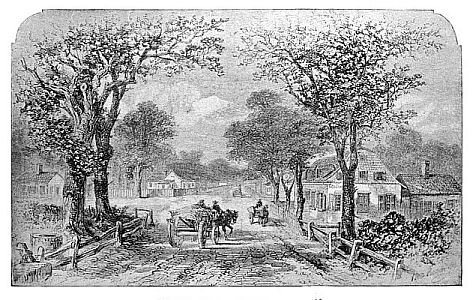
BEDFORD CORNERS, LONG ISLAND, IN 1776.[11]
His vigilance robbed the British of the most golden opportunity ever afforded them This retreat has always been regarded as one of the most brilliant incidents in Washington’s career, and it would certainly be hard to find a more striking example of vigilance. Had Washington allowed himself to be cooped up on Brooklyn Heights he would have been forced to surrender; and whatever was left of the war would have been a game played without queen, rook, or bishop. For this very reason it is hardly creditable to Howe that he should have let his adversary get away so easily. At daybreak, indeed, the Americans had been remarkably favoured by the sudden rise of a fog which covered the East river, but during the night the moon had shone brightly, and one can only wonder that the multitudinous plash of oars and the unavoidable murmur of ten thousand men embarking, with their heavy guns and stores, should not have attracted the attention of some wakeful sentinel, either on shore or on the fleet. A storming party of British, at the right moment, would at least have disturbed the proceedings. So rare a chance of ending the war at a blow was never again to be offered to the British commanders. Washington now stationed the bulk of his army along the line of the Harlem river, leaving a strong detachment in the city under Putnam; and presently, with the same extraordinary skill which he had just displayed in sending boats under the very eyes of the fleet, he withdrew Colonel Prescott and his troops from their exposed position on Governor’rsquo;s Island, which there was no longer any reason for holding.
The conference at Staten Island, Sept. 11 Hoping that the stroke just given by the British sword might have weakened the obstinacy of the Americans, Lord Howe again had recourse to the olive-branch. The captured General Sullivan was sent to Congress to hold out hopes that Lord Howe would use his influence to get all the obnoxious acts of Parliament repealed, only he would first like to confer with some of the members of Congress informally and as with mere private gentlemen. A lively debate ensued upon this proposal, in which some saw an insult to Congress, while all quite needlessly suspected treachery. John Adams, about whom there was so much less of the suaviter in modo than of the fortiter in re, alluded to Sullivan, quite unjustly, as a “decoy duck,” who had better have been shot in the battle than employed on such a business. It was finally voted that no proposals of peace from Great Britain should receive notice, unless they should be conveyed in writing, and should explicitly recognize Congress as the legal representative of the American States. For this once, however, out of personal regard for Lord Howe, and that nothing might be disdained which really looked toward a peaceful settlement, they would send a committee to Staten Island to confer with his lordship, who might regard this committee in whatever light he pleased. In this shrewd, half-humorous method of getting rid of the diplomatic difficulty, one is forcibly reminded of President Lincoln’s famous proclamation addressed “To whom it may concern.” The committee, consisting of Franklin, Rutledge, and John Adams, were hospitably entertained by Lord Howe, but their conference came to nothing, because the Americans now demanded a recognition of their independence as a condition which must precede all negotiation. There is no doubt that Lord Howe, who was a warm friend to the Americans and an energetic opponent of the king’s policy, was bitterly grieved at this result. As a last resort he published a proclamation announcing the intention of the British government to reconsider the various acts and instructions by which the Americans had been annoyed, and appealing to all right-minded people to decide for themselves whether it were not wise to rely on a solemn promise like this, rather than commit themselves to the dangerous chances of an unequal and unrighteous war.
Howe takes the city of New York, Sept. 15 Four days after this futile interview General Howe took possession of New York. After the loss of Brooklyn Heights, Washington and Greene were already aware that the city could not be held. Its capture was very easily effected. Several ships-of-the-line ascended the Hudson as far as Bloomingdale, and the East river as far as Blackwell’s Island; and while thus from either side these vessels swept the northern part of Manhattan with a searching fire, General Howe brought his army across from Brooklyn in boats and landed at Kipp’s Bay, near the present site of East Thirty-Fourth Street. Washington came promptly down, with two New England brigades, to reinforce the men whom he had stationed at that point, and to hinder the landing of the enemy until Putnam should have time to evacuate the city. To Washington’s wrath and disgust, these men were seized with panic, and suddenly turned and fled without firing a shot. Had Howe now thrown his men promptly forward across the line of Thirty-Fourth Street, he would have cut off Putnam’s retreat from the city. But what the New England brigades failed to do a bright woman succeeded in accomplishing. When Howe had reached the spot known as Murray Hill,—now the centre of much brownstone magnificence in Park and Madison and Fifth avenues, at that time a noble country farmstead,—Mrs. Lindley Murray, mother of the famous grammarian, well knowing the easy temper of the British commander, sent out a servant to invite him to stop and take luncheon. but Mrs. Lindley Murray saves the garrisonA general halt was ordered; and while Howe and his officers were gracefully entertained for more than two hours by their accomplished and subtle hostess, Putnam hastily marched his 4,000 men up the shore of the Hudson, until, passing Bloomingdale, he touched the right wing of the main army, and was safe, though his tents, blankets, and heavy guns had been left behind. Attack upon Harlem Heights Sept 16The American lines now extended from the mouth of Harlem river across the island, and on the following day the British attempted to break through their centre at Harlem Heights, but the attack was repulsed, with a loss of sixty Americans and three hundred British, and the lines just formed remained, with very little change, for nearly four weeks.
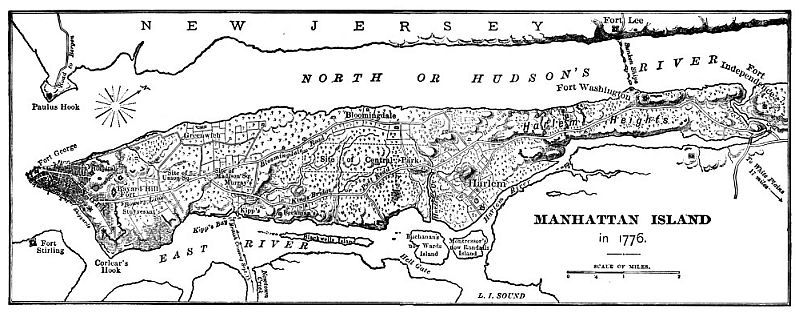
MANHATTAN ISLAND in 1776.
The new problem before Howe General Howe had thus got possession of the city of New York, but the conquest availed him little so long as the American army stood across the island, in the attitude of blockading him. If this campaign was to decide the war, as the ministry hoped, nothing short of the capture or dispersal of Washington’s army would suffice. But the problem was now much harder than it had been at Brooklyn. For as the land above Manhattan Island widens rapidly to the north and east, it would not be easy to hem Washington in by sending forces to his rear. As soon as he should find his position imperilled, he would possess the shorter line by which to draw his battalions, together and force an escape, and so the event proved. Still, with Howe’s superior force and with his fleet, if he could get up the Hudson to the rear of the American right, and at the same time land troops from the Sound in the rear of the American left, it was possible that Washington might be compelled to surrender. There was nothing to bar Howe’s passage up the East river to the Sound; but at the northern extremity of Manhattan Island the ascent of the Hudson was guarded on the east by Fort Washington, under command of Putnam, and on the west by Fort Lee, standing on the summit of the lofty cliffs known as the Palisades, and commanded by Greene. It was still doubtful, however, whether these two strongholds could effectually bar the ascent of so broad a river, and for further security Putnam undertook to place obstructions in the bed of the stream itself. Both the Continental Congress and the State Convention of New York were extremely unwilling that these two fortresses should in any event be given up, for in no case must the Hudson river be abandoned. Putnam and Greene thought that the forts could be held, but by the 9th of October it was proved that they could not bar the passage of the river, for on that day two frigates ran safely between them, and captured some small American craft a short distance above.
Howe moves upon Throg’s Neck, but Washington changes base This point having been ascertained, General Howe, on the 12th, leaving Percy in command before Harlem Heights, moved the greater part of his army nine miles up the East river to Throg’s Neck, a peninsula in the Sound, separated from the mainland by a narrow creek and a marsh that was overflowed at high tide. By landing here suddenly, Howe hoped to get in Washington’s rear and cut him off from his base of supply in Connecticut. But Washington had foreseen the move and forestalled it. When Howe arrived at Throg’s Neck, he found the bridge over the creek destroyed, and the main shore occupied by a force which it would be dangerous to try to dislodge by wading across the marsh. While Howe was thus detained six days on the peninsula Washington moved his base to White Plains, and concentrated his whole army at that point, abandoning everything on Manhattan Island except Fort Washington. Sullivan, Stirling, and Morgan who had just been exchanged, now rejoined the army, and Lee also arrived from South Carolina.
Baffled at White Plains, Howe tries a new plan By this movement to White Plains, Washington had foiled Howe’s attempt to get in his rear, and the British general decided to try the effect of an attack in front. On the 28th of October he succeeded in storming an outpost at Chatterton Hill, losing 229 lives, while the Americans lost 140. But this affair, which is sometimes known as the battle of White Plains, seems to have discouraged Howe. Before renewing the attack he waited three days, thinking perhaps of Bunker Hill; and on the last night of October, Washington fell back upon North Castle, where he took a position so strong that it was useless to think of assailing him. Howe then changed his plans entirely, and moved down the east bank of the Hudson to Dobb’s Ferry, whence he could either attack Fort Washington or cross into New Jersey and advance upon Philadelphia, the “rebel capital.” The purpose of this change was to entice Washington from his unassailable position.
Washington’s orders in view of the emergency To meet this new movement, Washington threw his advance of 5,000 men, under Putnam, into New Jersey, where they encamped near Hackensack; he sent Heath up to Peekskill, with 3,000 men, to guard the entrance to the Highlands; and he left Lee at North Castle, with 7,000 men, and ordered him to coöperate with him promptly in whatever direction, as soon as the nature of Howe’s plans should become apparent. As Forts Washington and Lee detained a large force in garrison, while they had shown themselves unable to prevent ships from passing up the river, there was no longer any use in holding them. Nay, they had now become dangerous, as traps in which the garrisons and stores might be suddenly surrounded and captured. Washington accordingly resolved to evacuate them both, while, to allay the fears of Congress in the event of a descent from Canada, he ordered Heath to fortify the much more important position at West Point.
Congress meddles with the situation and muddles it Had Washington’s orders been obeyed and his plans carried out, history might still have recorded a retreat through “the Jerseys,” but how different a retreat from that which was now about to take place! The officious interference of Congress, a venial error of judgment on the part of Greene, and gross insubordination on the part of Lee, occurring all together at this critical moment, brought about the greatest disaster of the war, and came within an ace of overwhelming the American cause in total and irretrievable ruin. Washington instructed Greene, who now commanded both fortresses, to withdraw the garrison and stores from Fort Washington, and to make arrangements for evacuating Fort Lee also. At the same time he did not give a positive order, but left the matter somewhat within Greene’s discretion, in case military circumstances of an unforeseen kind should arise. Then, while Washington had gone up to reconnoitre the site for the new fortress at West Point, there came a special order from Congress that Fort Washington should not be abandoned save under direst extremity. If Greene had thoroughly grasped Washington’s view of the case, he would have disregarded this conditional order, for there could hardly be a worse extremity than that which the sudden capture of the fortress would entail. But Greene’s mind was not quite clear; he believed that the fort could be held, and he did not like to take the responsibility of disregarding a message from Congress. In this dilemma he did the worst thing possible: he reinforced the doomed garrison, and awaited Washington’s return.
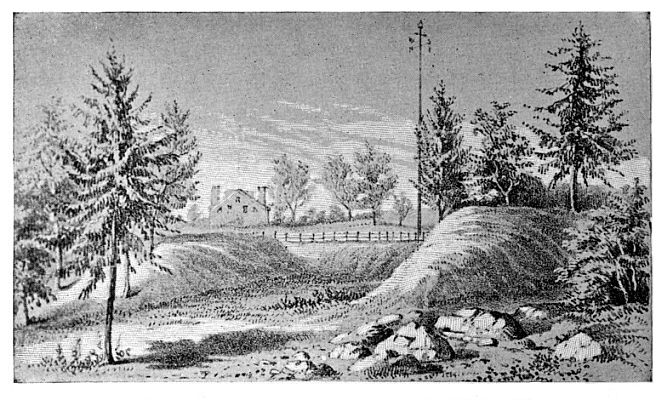
REMAINS OF FORT WASHINGTON, NEW YORK, 1856
Howe takes Fort Washington by storm, Nov. 16 When the commander-in-chief returned, on the 14th, he learned with dismay that nothing had been done. But it was now too late to mend matters, for that very night several British vessels passed up between the forts, and the next day Howe appeared before Fort Washington with an overwhelming force, and told Colonel Magaw, the officer in charge, that if he did not immediately surrender the whole garrison would be put to the sword. Magaw replied that if Howe wanted his fort he must come and take it. On the 16th, after a sharp struggle, in which the Americans fought with desperate gallantry though they were outnumbered more than five to one, the works were carried, and the whole garrison was captured. The victory cost the British more than 500 men in killed and wounded. The Americans, fighting behind their works, lost but 150; but they surrendered 3,000 of the best troops in their half-trained army, together with an immense quantity of artillery and small arms. It was not in General Howe’s kindly nature to carry out his savage threat of the day before; but some of the Hessians, maddened with the stubborn resistance they had encountered, began murdering their prisoners in cold blood, until they were sharply called to order. From Fort Lee, on the opposite bank of the river, Washington surveyed this woful surrender with his usual iron composure; but when it came to seeing his brave men thrown down and stabbed to death by the Hessian bayonets, his overwrought heart could bear it no longer, and he cried and sobbed like a child.
Washington and Greene This capture of the garrison of Fort Washington was one of the most crushing blows that befell the American arms during the whole course of the war. Washington’s campaign seemed now likely to be converted into a mere flight, and a terrible gloom overspread the whole country. The disaster was primarily due to the interference of Congress. It might have been averted by prompt and decisive action on the part of Greene. But Washington, whose clear judgment made due allowance for all the circumstances, never for a moment cast any blame upon his subordinate. The lesson was never forgotten by Greene, whose intelligence was of that high order which may indeed make a first mistake, but never makes a second. The friendship between the two generals became warmer than ever. Washington, by a sympathetic instinct, had divined from the outset the military genius that was by and by to prove scarcely inferior to his own.
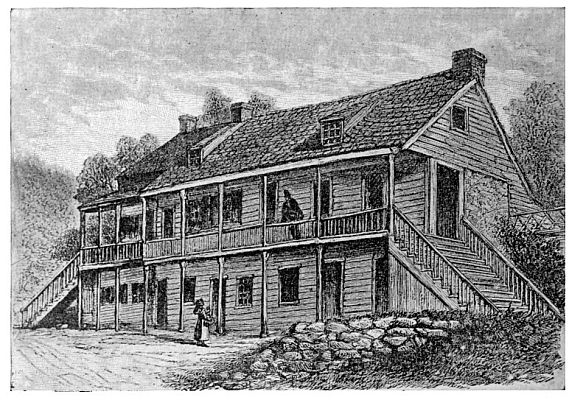
GENERAL GREENE’S HEADQUARTERS, FORT LEE, NEW JERSEY
Outrageous conduct of Charles Lee Yet worse remained behind. Washington had but 6,000 men on the Jersey side of the river, and it was now high time for Lee to come over from North Castle and join him, with the force of 7,000 that had been left under his command. On the 17th, Washington sent a positive order for him to cross the river at once; but Lee dissembled, pretended to regard the order in the light of mere advice, and stayed where he was. He occupied an impregnable position: why should he leave it, and imperil a force with which he might accomplish something memorable on his own account? By the resignation of General Ward, Lee had become the senior major-general of the Continental army, and in the event of disaster to Washington he would almost certainly become commander-in-chief. He had returned from South Carolina more arrogant and loud-voiced than ever. The northern people knew little of Moultrie, while they supposed Lee to be a great military light; and the charlatan accordingly got the whole credit of the victory, which, if his precious advice had been taken, would never have been won. Lee was called the hero of Charleston, and people began to contrast the victory of Sullivan’s Island with the recent defeats, and to draw conclusions very disparaging to Washington. From the beginning Lee had felt personally aggrieved at not being appointed to the chief command, and now he seemed to see a fair chance of ruining his hated rival. Should he come to the head of the army in a moment of dire disaster to the Americans, it would be so much the better, for it would be likely to open negotiations with Lord Howe, and Lee loved to chaffer and intrigue much better than to fight. So he spent his time in endeavouring, by insidious letters and lying whispers, to nourish the feeling of disaffection toward Washington, while he refused to send a single regiment to his assistance. Thus, through the villainy of this traitor in the camp, Washington actually lost more men, so far as their present use was concerned at this most critical moment, than he had been deprived of by all the blows which the enemy had dealt him since the beginning of the campaign.
Greene barely escapes from Fort Lee, Nov. 20
On the night of the 19th, Howe threw 5,000 men across the river, about
five miles above Fort Lee, and with this force Lord Cornwallis marched
rapidly down upon that stronghold. The place had become untenable, and
it was with some difficulty that a repetition of the catastrophe of Fort
Washington was avoided. Greene had barely time, with his 2,000 men, to
gain the bridge over the Hackensack and join the main army, leaving
behind all his cannon, tents, blankets, and eatables. The position now
occupied by the main army, between the Hackensack and Passaic rivers,
was an unsafe one, in view of the great superiority of the enemy in
numbers. A strong British force, coming down upon Washington from the
north, might compel him to surrender or to fight at a great
disadvantage.
 To avoid this danger, on the 21st he crossed the Passaic
and marched southwestward to Newark, where he stayed five days; and
every day he sent a messenger to Lee, urging him to make all possible
haste in bringing over his half of the army, that they might be able to
confront the enemy on something like equal terms. Nothing could have
been more explicit or more peremptory than Washington’s orders; but Lee
affected to misunderstand them, sent excuses, raised objections,
paltered, argued, prevaricated, and lied, and so contrived to stay where
he was until the first of December. Lee intrigues against WashingtonTo Washington he pretended that his
moving was beset by “obstacles,” the nature of which he would explain as
soon as they should meet. But to James Bowdoin, president of the
executive council of Massachusetts, he wrote at the same time declaring
that his own army and that under Washington “must rest each on its own
bottom.” He assumed command over Heath, who had been left to guard the
Highlands, and ordered him to send 2,000 troops to himself; but that
officer very properly refused to depart from the instructions which the
commander-in-chief had left with him. To various members of Congress Lee
told the falsehood that if his advice had only been heeded, Fort
Washington would have been evacuated ere it was too late; and he wrote
to Dr. Rush, wondering whether any of the members of Congress had ever
studied Roman history, and suggesting that he might do great things if
he could only be made Dictator for one week.
To avoid this danger, on the 21st he crossed the Passaic
and marched southwestward to Newark, where he stayed five days; and
every day he sent a messenger to Lee, urging him to make all possible
haste in bringing over his half of the army, that they might be able to
confront the enemy on something like equal terms. Nothing could have
been more explicit or more peremptory than Washington’s orders; but Lee
affected to misunderstand them, sent excuses, raised objections,
paltered, argued, prevaricated, and lied, and so contrived to stay where
he was until the first of December. Lee intrigues against WashingtonTo Washington he pretended that his
moving was beset by “obstacles,” the nature of which he would explain as
soon as they should meet. But to James Bowdoin, president of the
executive council of Massachusetts, he wrote at the same time declaring
that his own army and that under Washington “must rest each on its own
bottom.” He assumed command over Heath, who had been left to guard the
Highlands, and ordered him to send 2,000 troops to himself; but that
officer very properly refused to depart from the instructions which the
commander-in-chief had left with him. To various members of Congress Lee
told the falsehood that if his advice had only been heeded, Fort
Washington would have been evacuated ere it was too late; and he wrote
to Dr. Rush, wondering whether any of the members of Congress had ever
studied Roman history, and suggesting that he might do great things if
he could only be made Dictator for one week.
Washington retreats into Pennsylvania Meanwhile Washington, unable to risk a battle, was rapidly retreating through New Jersey. On the 28th of November Cornwallis advanced upon Newark, and Washington fell back upon New Brunswick. On the first of December, as Cornwallis reached the latter place, Washington broke down the bridge over the Raritan, and continued his retreat to Princeton. The terms of service for which his troops had been enlisted were now beginning to expire, and so great was the discouragement wrought by the accumulation of disasters which had befallen the army since the battle of Long Island that many of the soldiers lost heart in their work. Homesickness began to prevail, especially among the New England troops, and as their terms expired it was difficult to persuade them to reënlist. Under these circumstances the army dwindled fast, until, by the time he reached Princeton, Washington had but 3,000 men remaining at his disposal. The only thing to be done was to put the broad stream of the Delaware between himself and the enemy, and this he accomplished by the 8th, carrying over all his guns and stores, and seizing or destroying every boat that could be found on that great river for many miles in either direction. When the British arrived, on the evening of the same day, they found it impossible to cross. Cornwallis was eager to collect a flotilla of boats as soon as practicable, and push on to Philadelphia, but Howe, who had just joined him, thought it hardly worth while to take so much trouble, as the river would be sure to freeze over before many days. So the army was posted—with front somewhat too far extended—along the east bank, with its centre at Trenton, under Colonel Rahl; and while they waited for that “snap” of intensely cold weather, which in this climate seldom fails to come on within a few days of Christmas, Howe and Cornwallis both went back to New York.
Reinforcements come from Schuyler Meanwhile, on the 2d of December, Lee had at last crossed the Hudson with a force diminished to 4,000 men, and had proceeded by slow marches as far as Morristown. Further reinforcements were at hand. General Schuyler, in command of the army which had retreated the last summer from Canada, was guarding the forts on Lake Champlain; and as these appeared to be safe for the present, he detached seven regiments to go to the aid of Washington. As soon as Lee heard of the arrival of three of these regiments at Peekskill, he ordered them to join him at Morristown. As the other four, under General Gates, were making their way through northern New Jersey, doubts arose as to where they should find Washington in the course of his swift retreat. Gates sent his aid, Major Wilkinson, forward for instructions, and he, learning that Washington had withdrawn into Pennsylvania, reported to Lee at Morristown, as second in command.
OPERATIONS IN NEW YORK AND NEW JERSEY, 1776 AND 1777
Fortunately for the Americans, the British capture Charles Lee, Dec. 13 Lee had left his army in charge of Sullivan, and had foolishly taken up his quarters at an unguarded tavern about four miles from the town, where Wilkinson found him in bed on the morning of the 13th. After breakfast Lee wrote a confidential letter to Gates, as to a kindred spirit from whom he might expect to get sympathy. Terrible had been the consequences of the disaster at Fort Washington. “There never was so damned a stroke,” said the letter. “Entre nous, a certain great man is most damnably deficient. He has thrown me into a situation where I have my choice of difficulties. If I stay in this province I risk myself and army, and if I do not stay the province is lost forever.... Our counsels have been weak to the last degree. As to yourself, if you think you can be in time to aid the general, I would have you by all means go. You will at least save your army.... Adieu, my dear friend. God bless you.” Hardly had he signed his name to this scandalous document when Wilkinson, who was standing at the window, exclaimed that the British were upon them. Sure enough. A Tory in the neighbourhood, discerning the golden opportunity, had galloped eighteen miles to the British lines, and returned with a party of thirty dragoons, who surrounded the house and captured the vainglorious schemer before he had time to collect his senses. Bareheaded, and dressed only in a flannel gown and slippers, he was mounted on Wilkinson’s horse, which stood waiting at the door, and was carried off, amid much mirth and exultation, to the British camp. Crest-fallen and bewildered, he expressed a craven hope that his life might be spared, but was playfully reminded that he would very likely be summarily dealt with as a deserter from the British army; and with this scant comfort he was fain to content himself for some weeks to come.
The times that tried men’s souls The capture of General Lee was reckoned by the people as one more in the list of dire catastrophes which made the present season the darkest moment in the whole course of the war. Had they known all that we know now, they would have seen that the army was well rid of a worthless mischief-maker, while the history of the war had gained a curiously picturesque episode. Apart from this incident there was cause enough for the gloom which now overspread the whole country. Washington had been forced to seek shelter behind the Delaware with a handful of men, whose terms of service were soon to expire, and another fortnight might easily witness the utter dispersal of this poor little army. At Philadelphia, where Putnam was now in command, there was a general panic, and people began hiding their valuables and moving their wives and children out into the country. Congress took fright, and retired to Baltimore. At the beginning of December, Lord Howe and his brother had issued a proclamation offering pardon and protection to all citizens who within sixty days should take the oath of allegiance to the British Crown; and in the course of ten days nearly three thousand persons, many of them wealthy and of high standing in society, had availed themselves of this promise. The British soldiers and the Tories considered the contest virtually ended. General Howe was compared with Cæsar, who came, and saw, and conquered. For his brilliant successes he had been made a Knight Commander of the Bath, and New York was to become the scene of merry Christmas festivities on the occasion of his receiving the famous red ribbon. In his confidence that Washington’s strength was quite exhausted, he detached a considerable force from the army in New Jersey, and sent it, under Lord Percy, to take possession of Newport as a convenient station for British ships entering the Sound. Donop and Rahl with their Hessians and Grant with his hardy Scotchmen would now quite suffice to destroy the remnant of Washington’s army; and Cornwallis accordingly packed his portmanteaus and sent them aboard ship, intending to sail for England as soon as the fumes of the Christmas punch should be duly slept off.
Washington prepares to strike back Well might Thomas Paine declare, in the first of the series of pamphlets entitled “The Crisis,” which he now began to publish, that “these are the times that try men’s souls.” But in the midst of the general despondency there were a few brave hearts that had not yet begun to despair, and the bravest of these was Washington’s. At this awful moment the whole future of America, and of all that America signifies to the world, rested upon that single Titanic will. Cruel defeat and yet more cruel treachery, enough to have crushed the strongest, could not crush Washington. All the lion in him was aroused, and his powerful nature was aglow with passionate resolve. His keen eye already saw the elements of weakness in Howe’s too careless disposition of his forces on the east bank of the Delaware, and he had planned for his antagonist such a Christmas greeting as he little expected. Just at this moment Washington was opportunely reinforced by Sullivan and Gates, with the troops lately under Lee’s command; and with his little army thus raised to 6,000 men, he meditated such a stroke as might revive the drooping spirits of his countrymen, and confound the enemy in the very moment of his fancied triumph.
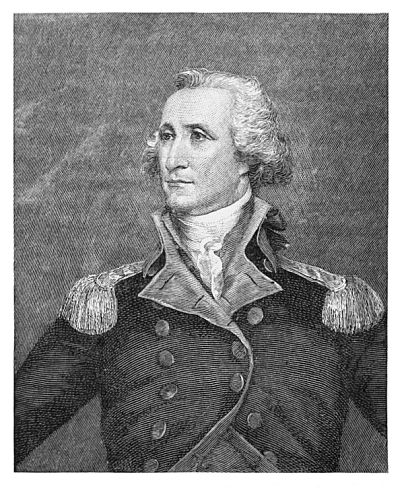
GEORGE WASHINGTON (BY TRUMBULL)
Washington’s plan was, by a sudden attack, to overwhelm the British centre at Trenton, and thus force the army to retreat upon New York. The Delaware was to be crossed in three divisions. The right wing, of 2,000 men, under Gates, was to attack Count Donop at Burlington; Ewing, with the centre, was to cross directly opposite Trenton; while Washington himself, with the left wing, was to cross nine miles above, and march down upon Trenton from the north. On Christmas Day all was ready, but the beginnings of the enterprise were not auspicious. Gates, who preferred to go and intrigue in Congress, succeeded in begging off, and started for Baltimore. Cadwalader, who took his place, tried hard to get his men and artillery across the river, but was baffled by the huge masses of floating ice, and reluctantly gave up the attempt. Ewing was so discouraged that he did not even try to cross, and both officers took it for granted that Washington must be foiled in like manner. He crosses the DelawareBut Washington was desperately in earnest; and although at sunset, just as he had reached his crossing-place, he was informed by special messenger of the failure of Ewing and Cadwalader, he determined to go on and make the attack with the 2,500 men whom he had with him. The great blocks of ice, borne swiftly along by the powerful current, made the passage extremely dangerous, but Glover, with his skilful fishermen of Marblehead, succeeded in ferrying the little army across without the loss of a man or a gun. More than ten hours were consumed in the passage, and then there was a march of nine miles to be made in a blinding storm of snow and sleet. and pierces the British centre at Trenton, Dec. 26They pushed rapidly on in two columns, led by Greene and Sullivan respectively, drove in the enemy’s pickets at the point of the bayonet, and entered the town by different roads soon after sunrise. Washington’s guns were at once planted so as to sweep the streets, and after Colonel Rahl and seventeen of his men had been slain, the whole body of Hessians, 1,000 in number, surrendered at discretion. Of the Americans, two were frozen to death on the march, and two were killed in the action. By noon of the next day Cadwalader had crossed the river to Burlington, but no sooner had Donop heard what had happened at Trenton than he retreated by a circuitous route to Princeton, leaving behind all his sick and wounded soldiers, and all his heavy arms and baggage. Washington recrossed into Pennsylvania with his prisoners, but again advanced, and occupied Trenton on the 29th.
Cornwallis comes up to retrieve the disaster When the news of the catastrophe reached New York, the holiday feasting was rudely disturbed. Instead of embarking for England, Cornwallis rode post-haste to Princeton, where he found Donop throwing up earthworks. On the morning of January 2d Cornwallis advanced, with 8,000 men, upon Trenton, but his march was slow and painful. He was exposed during most of the day to a galling fire from parties of riflemen hidden in the woods by the roadside, and Greene, with a force of 600 men and two field-pieces, contrived so to harass and delay him that he did not reach Trenton till late in the afternoon. By that time Washington had withdrawn his whole force beyond the Assunpink, a small river which flows into the Delaware just south of Trenton, and had guarded the bridge and the fords by batteries admirably placed. The British made several attempts to cross, but were repulsed with some slaughter; and as their day’s work had sorely fatigued them, Cornwallis thought best to wait until to-morrow, and thinks he has run down the “old fox”while he sent his messenger post-haste back to Princeton to bring up a force of nearly 2,000 men which he had left behind there. With this added strength he felt sure that he could force the passage of the stream above the American position, when by turning Washington’s right flank he could fold him back against the Delaware, and thus compel him to surrender. Cornwallis accordingly went to bed in high spirits. “At last we have run down the old fox,” said he, “and we will bag him in the morning.”
But Washington prepares a checkmate
The situation was indeed a very dangerous one; but when the British
general called his antagonist an old fox, he did him no more than
justice. In its union of slyness with audacity, the movement which
Washington now executed strongly reminds one of “Stonewall” Jackson. He
understood perfectly well what Cornwallis intended to do;
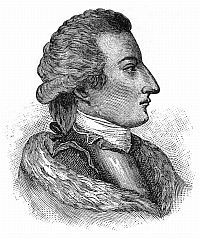
LORD CORNWALLISbut he knew
at the same time that detachments of the British army must have been
left behind at Princeton and New Brunswick to guard the stores. From the
size of the army before him he rightly judged that these rear
detachments must be too small to withstand his own force. By
overwhelming one or both of them, he could compel Cornwallis to retreat
upon New York, while he himself might take up an impregnable position on
the heights about Morristown, from which he might threaten the British
line and hold their whole army in check,—a most brilliant and daring
scheme for a commander to entertain while in such a perilous position as
Washington was that night! But the manner in which he began by
extricating himself was not the least brilliant part of the manœuvre.
All night long the American camp-fires were kept burning brightly, and
small parties were busily engaged in throwing up intrenchments so near
the Assunpink that the British sentinels could plainly hear the murmur
of their voices and the thud of the spade and pickaxe. While this was
going on, the whole American army marched swiftly up the south bank of
the little stream, passed around Cornwallis’s left wing to his rear, and
gained the road to Princeton. Toward sunrise, as the British detachment
was coming down the road from Princeton to Trenton, in obedience to
Cornwallis’s order, its van, under Colonel Mawhood, met the foremost
column of Americans approaching, under General Mercer. As he caught
sight of the Americans, Mawhood thought that they must be a party of
fugitives, and hastened to intercept them; but he was soon undeceived.
The Americans attacked with vigour, and a sharp fight was sustained,
with varying fortunes, until Mercer was pierced by a bayonet, and his
men began to fall back in some confusion. and again severs the British line at Princeton, Jan. 3Just at this critical moment
Washington came galloping upon the field and rallied the troops, and as
the entire forces on both sides had now come up the fight became
general. In a few minutes the British were routed and their line was cut
in two; one half fleeing toward Trenton, the other half toward New
Brunswick. There was little slaughter, as the whole fight did not occupy
more than twenty minutes. The British lost about 200 in killed and
wounded, with 300 prisoners and their cannon; the American loss was less
than 100.
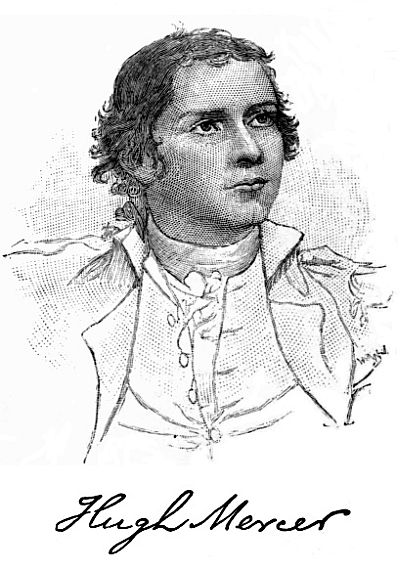
Shortly before sunrise, the men who had been left in the camp on the Assunpink to feed the fires and make a noise beat a hasty retreat, and found their way to Princeton by circuitous paths. When Cornwallis got up, he could hardly believe his eyes. Here was nothing before him but an empty camp: the American army had vanished, and whither it had gone he could not imagine. But his perplexity was soon relieved by the booming of distant cannon on the Princeton road, and the game which the “old fox” had played him all at once became apparent. General retreat of the British toward New YorkNothing was to be done but to retreat upon New Brunswick with all possible haste, and save the stores there. His road led back through Princeton, and from Mawhood’s fugitives he soon heard the story of the morning’s disaster. His march was hindered by various impediments. A thaw had set in, so that the little streams had swelled into roaring torrents, difficult to ford, and the American army, which had passed over the road before daybreak, had not forgotten to destroy the bridges. By the time that Cornwallis and his men reached Princeton, wet and weary, the Americans had already left it, but they had not gone on to New Brunswick. Washington had hoped to seize the stores there, but the distance was eighteen miles, his men were wretchedly shod and too tired to march rapidly, and it would not be prudent to risk a general engagement when his main purpose could be secured without one. For these reasons, Washington turned northward to the heights of Morristown, while Cornwallis continued his retreat to New Brunswick. A few days later, Putnam advanced from Philadelphia and occupied Princeton, thus forming the right wing of the American army, of which the main body lay at Morristown, while Heath’s division on the Hudson constituted the left wing. Various cantonments were established along this long line. On the 5th, George Clinton, coming down from Peekskill, drove the British out of Hackensack and occupied it, while on the same day a detachment of German mercenaries at Springfield was routed by a body of militia. Elizabethtown was then taken by General Maxwell, whereupon the British retired from Newark.
Thus in a brief campaign of three weeks Washington had rallied the fragments of a defeated and broken army, fought two successful battles, taken nearly 2,000 prisoners, and recovered the state of New Jersey. He had cancelled the disastrous effects of Lee’s treachery, and replaced things apparently in the condition in which the fall of Fort Washington had left them. The tables completely turnedReally he had done much more than this, for by assuming the offensive and winning victories through sheer force of genius, he had completely turned the tide of popular feeling. The British generals began to be afraid of him, while on the other hand his army began to grow by the accession of fresh recruits. In New Jersey, the enemy retained nothing but New Brunswick, Amboy, and Paulus Hook.
On the 25th of January Washington issued a proclamation declaring that all persons who had accepted Lord Howe’s offer of protection must either retire within the British lines or come forward and take the oath of allegiance to the United States. Many narrow-minded people, who did not look with favour upon a close federation of the states, commented severely upon the form of this proclamation: it was too national, they said. But it proved effective. However lukewarm may have been the interest which many of the Jersey people felt in the war when their soil was first invaded, the conduct of the British troops had been such that every one now looked upon them as enemies. They had foraged indiscriminately upon friend and foe; they had set fire to farmhouses, and in one or two instances murdered peaceful citizens. The wrath of the people had waxed so hot that it was not safe for the British to stir beyond their narrow lines except in considerable force. Their foraging parties were waylaid and cut off by bands of yeomanry, and so sorely were they harassed in their advanced position at New Brunswick that they often suffered from want of food. Many of the German mercenaries, caring nothing for the cause in which they had been forcibly enlisted, began deserting; and in this they were encouraged by Congress, which issued a manifesto in German, making a liberal offer of land to any foreign soldier who should leave the British service. This little document was inclosed in the wrappers in which packages of tobacco were sold, and every now and then some canny smoker accepted the offer.
Washington’s superb generalship Washington’s position at Morristown was so strong that there was no hope of dislodging him, and the snow-blocked roads made the difficulties of a winter campaign so great that Howe thought best to wait for warm weather before doing anything more. While the British arms were thus held in check, the friends of America, both in England and on the continent of Europe, were greatly encouraged. From this moment Washington was regarded in Europe as a first-rate general. Military critics who were capable of understanding his movements compared his brilliant achievements with his slender resources, and discovered in him genius of a high order. Men began to call him “the American Fabius;” and this epithet was so pleasing to his fellow-countrymen, in that pedantic age, that it clung to him for the rest of his life, and was repeated in newspapers and speeches and pamphlets with wearisome iteration. Yet there was something more than Fabian in Washington’s generalship. For wariness he has never been surpassed; yet, as Colonel Stedman observed, in his excellent contemporary history of the war, the most remarkable thing about Washington was his courage. It would be hard indeed to find more striking examples of audacity than he exhibited at Trenton and Princeton. Lord Cornwallis was no mean antagonist, and no one was a better judge of what a commander might be expected to do with a given stock of resources. His surprise at the Assunpink was so great that he never got over it. After the surrender at Yorktown, it is said that his lordship expressed to Washington his generous admiration for the wonderful skill which had suddenly hurled an army four hundred miles, from the Hudson river to the James, with such precision and such deadly effect. “But after all,” he added, “your excellency’s achievements in New Jersey were such that nothing could surpass them.” The man who had turned the tables on him at the Assunpink he could well believe to be capable of anything.
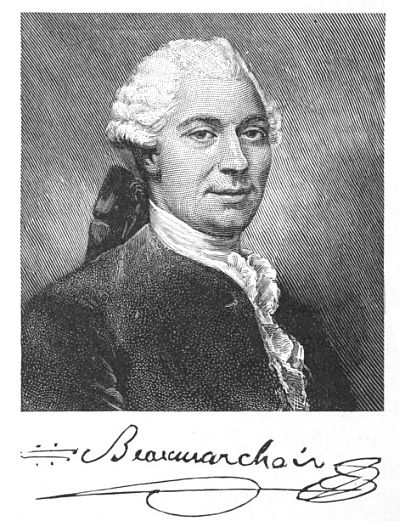
In England the effect of the campaign was very serious. Not long before, Edmund Burke had despondingly remarked that an army which was always obliged to refuse battle could never expel the invaders; but now the case wore a different aspect. Sir William Howe had not so much to show for his red ribbon, after all. He had taken New York, and dealt many heavy blows with his overwhelming force, unexpectedly aided by foul play on the American side; but as for crushing Washington and ending the war, he seemed farther from it than ever. It would take another campaign to do this,—perhaps many. Lord North, who had little heart for the war at any time, was discouraged, while the king and Lord George Germain were furious with disappointment. “It was that unhappy affair of Trenton,” observed the latter, “that blasted our hopes.”
In France the interest in American affairs grew rapidly. Louis XVI. had
no love for Americans or for rebels, but revenge for the awful disasters
of 1758 and 1759 was dear to the French heart. France felt toward
England then as she feels toward Germany now, and so long ago as the
time of the Stamp Act, Baron Kalb had been sent on a secret mission to
America, to find out how the people regarded the British government. The
policy of the French ministry was aided by the romantic sympathy for
America which was felt in polite society. Never perhaps have the
opinions current among fashionable ladies and gentlemen been so directly
controlled by philosophers and scholars as in France during the latter
half of the eighteenth century. Never perhaps have men of letters
exercised such mighty influence over their contemporaries as Voltaire,
with his noble enthusiasm for humanity, and Rousseau, with his startling
political paradoxes, and the writers of the “Encyclopédie,” with their
revelations of new points of view in science and in history. To such men
as these, and to such profound political thinkers as Montesquieu and
Turgot, the preservation of English liberty was the hope of the world;
but they took little interest in the British crown or in the imperial
supremacy of Parliament. All therefore sympathized with the Americans
and urged on the policy which the court for selfish reasons was inclined
to pursue. Vergennes, the astute minister of foreign affairs, had for
some time been waiting for a convenient opportunity to take part in the
struggle, but as yet he had contented himself with furnishing secret
assistance.
 For more than a year he had been intriguing, through
Beaumarchais, the famous author of “Figaro,” with Arthur Lee (a brother
of Richard Henry Lee), who had long served in London as agent for
Virginia. Just before the Declaration of Independence Vergennes sent
over a million dollars to aid the American cause. Soon afterwards
Congress sent Silas Deane to Paris, and presently ordered Arthur Lee to
join him there. In October Franklin was also sent over, and the three
were appointed commissioners for making a treaty of alliance with
France.
For more than a year he had been intriguing, through
Beaumarchais, the famous author of “Figaro,” with Arthur Lee (a brother
of Richard Henry Lee), who had long served in London as agent for
Virginia. Just before the Declaration of Independence Vergennes sent
over a million dollars to aid the American cause. Soon afterwards
Congress sent Silas Deane to Paris, and presently ordered Arthur Lee to
join him there. In October Franklin was also sent over, and the three
were appointed commissioners for making a treaty of alliance with
France.
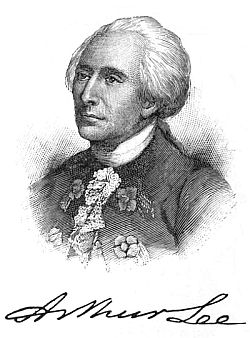
The arrival of Franklin was the occasion of great excitement in the fashionable world of Paris. By thinkers like Diderot and D’Alembert he was regarded as the embodiment of practical wisdom. To many he seemed to sum up in himself the excellences of the American cause,—justice, good sense, and moderation. Voltaire spoke quite unconsciously of the American army as “Franklin’s troops.” It was Turgot who said of him, in a line which is one of the finest modern specimens of epigrammatic Latin, “Eripuit cœlo fulmen, sceptrumque tyrannis.” As symbolizing the liberty for which all France was yearning, he was greeted with a popular enthusiasm such as perhaps no Frenchman except Voltaire has ever called forth. As he passed along the streets, the shopkeepers rushed to their doors to catch a glimpse of him, while curious idlers crowded the sidewalk. The charm of his majestic and venerable figure seemed heightened by the republican simplicity of his plain brown coat, over the shoulders of which his long gray hair fell carelessly, innocent of queue or powder. His portrait was hung in the shop-windows and painted in miniature on the covers of snuff-boxes. Gentlemen wore “Franklin” hats, ladies’ kid gloves were dyed of a “Franklin” hue, and cotelettes à la Franklin were served at fashionable dinners.
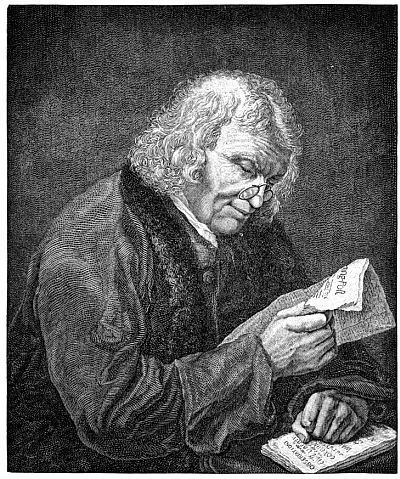
BENJAMIN FRANKLIN
As the first fruits of Franklin’s negotiations, the French government agreed to furnish two million livres a year, in quarterly instalments, to assist the American cause. Three ships, laden with military stores, were sent over to America: one was captured by a British cruiser, but the other two arrived safely. The Americans were allowed to fit out privateers in French ports, and even to bring in and sell their prizes there. Besides this a million livres were advanced to the commissioners on account of a quantity of tobacco which they agreed to send in exchange. Further than this France was not yet ready to go. The British ambassador had already begun to protest against the violation of neutrality involved in the departure of privateers, and France was not willing to run the risk of open war with England until it should become clear that the Americans would prove efficient allies. The king, moreover, sympathized with George III., and hated the philosophers whose opinions swayed the French people; and in order to accomplish anything in behalf of the Americans he had to be coaxed or bullied at every step.
But though the French government was not yet ready to send troops to America, volunteers were not wanting who cast in their lot with us through a purely disinterested enthusiasm. At a dinner party in Metz, the Marquis de Lafayette, then a boy of nineteen, heard the news from America, and instantly resolved to leave his pleasant home and offer his services to Washington. He fitted up a ship at his own expense, loaded it with military stores furnished by Beaumarchais, and set sail from Bordeaux on the 26th of April, taking with him Kalb and eleven other officers. While Marie Antoinette applauded his generous self-devotion, the king forbade him to go, but he disregarded the order. His young wife, whom he deemed it prudent to leave behind, he consoled with the thought that the future welfare of all mankind was at stake in the struggle for constitutional liberty which was going on in America, and that where he saw a chance to be useful it was his duty to go. The able Polish officers, Pulaski and Kosciuszko, had come some time before.
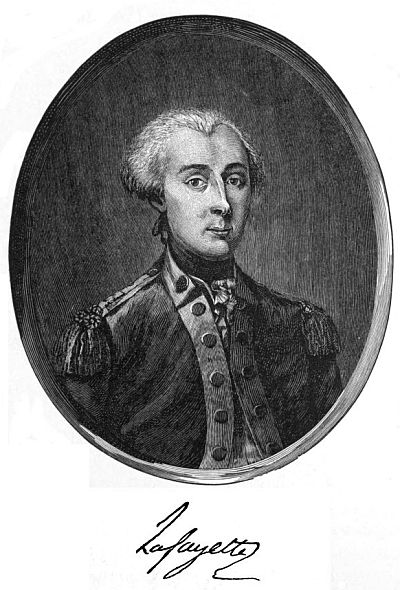
During the winter season at Morristown, Washington was busy in endeavouring to recruit and reorganize the army. Up to this time the military preparations of Congress had been made upon a ludicrously inadequate scale. There had been no serious attempt to create a regular army, but squads of militia had been enlisted for terms of three or six months, as if there were any likelihood of the war being ended within such a period. The rumour of Lord Howe’s olive-branch policy may at first have had something to do with this, and even after the Declaration of Independence had made further temporizing impossible, there were many who expected Washington to perform miracles and thought that by some crushing blow the invaders might soon be brought to terms. But the events of the autumn had shown that the struggle was likely to prove long and desperate, and there could be no doubt as to the imperative need of a regular army. To provide such an army was, however, no easy task. The Continental Congress was little more than an advisory body of delegates, and it was questionable how far it could exercise authority except as regarded the specific points which the constituents of these delegates had in view when they chose them. Congress could only recommend to the different states to raise their respective quotas of men, and each state gave heed to such a request according to its ability or its inclination. All over the country there was then, as always, a deep-rooted prejudice against standing armies. Even to-day, with our population of seventy millions, a proposal to increase our regular army to fifty thousand men, for the more efficient police of the Indian districts in Arizona and Montana, has been greeted by the press with tirades about military despotism. A century ago this feeling was naturally much stronger than it is to-day. The presence of standing armies in this country had done much toward bringing on the Revolution; and it was not until it had become evident that we must either endure the king’s regulars or have regulars of our own that the people could be made to adopt the latter alternative. Under the influence of these feelings, the state militias were enlisted for very short terms, each under its local officers, so that they resembled a group of little allied armies. Such methods were fatal to military discipline. Such soldiers as had remained in the army ever since it first gathered itself together on the day of Lexington had now begun to learn something of military discipline; but it was impossible to maintain it in the face of the much greater number who kept coming and going at intervals of three months. With such fluctuations in strength, moreover, it was difficult to carry out any series of military operations. The Christmas night when Washington crossed the Delaware was the most critical moment of his career; for the terms of service of the greater part of his little army expired on New Year’s Day, and but for the success at Trenton, they would almost certainly have disbanded. But in the exultant mood begotten of this victory, they were persuaded to remain for some weeks longer, thus enabling Washington to recover the state of New Jersey. So low had the public credit sunk, at this season of disaster, that Washington pledged his private fortune for the payment of these men, in case Congress should be found wanting; and his example was followed by the gallant John Stark and other officers. Except for the sums raised by Robert Morris of Philadelphia, even Washington could not have saved the country.
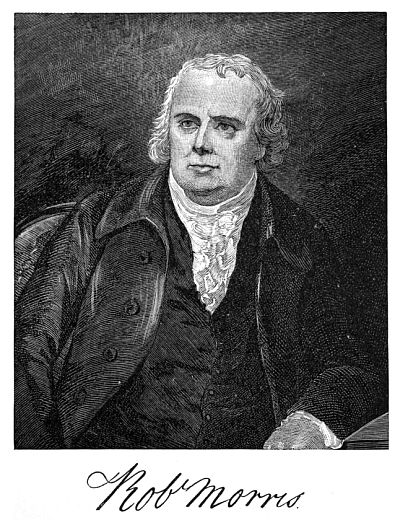
Another source of weakness was the intense dislike and jealousy with which the militia of the different states regarded each other. Their alliance against the common enemy had hitherto done little more toward awakening a cordial sympathy between the states than the alliance of Athenians with Lacedæmonians against the Great King accomplished toward ensuring peace and good-will throughout the Hellenic world. Politically the men of Virginia had thus far acted in remarkable harmony with the men of New England, but socially there was little fellowship between them. In those days of slow travel the plantations of Virginia were much more remote from Boston than they now are from London, and the generalizations which the one people used to make about the other were, if possible, even more crude than those which Englishmen and Americans are apt to make about each other at the present day. In the stately elegance of the Virginian country mansion it seemed right to sneer at New England merchants and farmers as “shopkeepers” and “peasants,” while many people in Boston regarded Virginian planters as mere Squire Westerns. Between the eastern and the middle states, too, there was much ill-will, because of theological differences and boundary disputes. The Puritan of New Hampshire had not yet made up his quarrel with the Churchman of New York concerning the ownership of the Green Mountains; and the wrath of the Pennsylvania Quaker waxed hot against the Puritan of Connecticut who dared claim jurisdiction over the valley of Wyoming. We shall find such animosities bearing bitter fruit in personal squabbles among soldiers and officers, as well as in removals and appointments of officers for reasons which had nothing to do with their military competence. Even in the highest ranks of the army and in Congress these local prejudices played their part and did no end of mischief.
From the outset Washington had laboured with Congress to take measures to obviate these alarming difficulties. In the midst of his retreat through the Jerseys he declared that “short enlistments and a mistaken dependence upon militia have been the origin of all our misfortunes,” and at the same time he recommended that a certain number of battalions should be raised directly by the United States, comprising volunteers drawn indiscriminately from the several states. These measures were adopted by Congress, and at the same time Washington was clothed with almost dictatorial powers. It was decided that the army of state troops should be increased to 66,000 men, divided into eighty-eight battalions, of which Massachusetts and Virginia were each to contribute fifteen, “Pennsylvania twelve, North Carolina nine, Connecticut eight, South Carolina six, New York and New Jersey four each, New Hampshire and Maryland three each, Rhode Island two, Delaware and Georgia each one.” The actual enlistments fell very far short of this number of men, and the proportions assigned by Congress, based upon the population of the several states, were never heeded. The men now enlisted were to serve during the war, and were to receive at the end a hundred acres of land each as bounty. Colonels were to have a bounty of five hundred acres, and inferior officers were to receive an intermediate quantity. Even with these offers it was found hard to persuade men to enlist for the war, so that it was judged best to allow the recruit his choice of serving for three years and going home empty-handed, or staying till the war should end in the hope of getting a new farm for one of his children. All this enlisting was to be done by the several states, which were also to clothe and arm their recruits, but the money for their equipments, as well as for the payment and support of the troops, was to be furnished by Congress. Officers were to be selected by the states, but formally commissioned by Congress. At the same time Washington was authorized to raise sixteen battalions of infantry, containing 12,000 men, three regiments of artillery, 3,000 light cavalry, and a corps of engineers. These forces were to be enlisted under Washington’s direction, in the name of the United States, and were to be taken indiscriminately from all parts of the country. Their officers were to be appointed by Washington, who was furthermore empowered to fill all vacancies and remove any officer below the rank of brigadier-general in any department of the army. Washington was also authorized to take whatever private property might anywhere be needed for the army, allowing a fair compensation to the owners; and he was instructed to arrest at his own discretion, and hold for trial by the civil courts, any person who should refuse to take the continental paper money, or otherwise manifest a want of sympathy with the American cause.
These extraordinary powers, which at the darkest moment of the war were conferred upon Washington for a period of six months, occasioned much grumbling, but it does not appear that any specific difficulty ever arose through the way in which they were exercised. It would be as hard, perhaps, to find any strictly legal justification for the creation of a Continental army as it would be to tell just where the central government of the United States was to be found at that time. Strictly speaking, no central government had as yet been formed. No articles of confederation had yet been adopted by the states, and the authority of the Continental Congress had been in nowise defined. It was generally felt, however, that the Congress now sitting had been chosen for the purpose of representing the states in their relations to the British crown. This Congress had been expressly empowered to declare the states independent of Great Britain, and to wage war for the purpose of making good its declaration. And it was accordingly felt that Congress was tacitly authorized to take such measures as were absolutely needful for the maintenance of the struggle. The enlistment of a Continental force was therefore an act done under an implied “war power,” something like the power invoked at a later day to justify the edict by which President Lincoln emancipated the slaves. The thoroughly English political genius of the American people teaches them when and how to tolerate such anomalies, and has more than once enabled them safely to cut the Gordian knot which mere logic could not untie if it were to fumble till doomsday. In the second year after Lexington the American commonwealths had already entered upon the path of their “manifest destiny,” and were becoming united into one political body faster than the people could distinctly realize.
Carleton invades New York Ever since the failure of the American invasion of Canada, it had been the intention of Sir Guy Carleton, in accordance with the wishes of the ministry, to invade New York by way of Lake Champlain, and to secure the Mohawk valley and the upper waters of the Hudson. The summer of 1776 had been employed by Carleton in getting together a fleet with which to obtain control of the lake. It was an arduous task. Three large vessels were sent over from England, and proceeded up the St. Lawrence as far as the rapids, where they were taken to pieces, carried overland to St. John’s, and there put together again. Twenty gunboats and more than two hundred flat-bottomed transports were built at Montreal, and manned with 700 picked seamen and gunners; and upon this flotilla Carleton embarked his army of 12,000 men.
Arnold’s preparations To oppose the threatened invasion, Benedict Arnold had been working all the summer with desperate energy. In June the materials for his navy were growing in the forests of Vermont, while his carpenters with their tools, his sail-makers with their canvas, and his gunners with their guns had mostly to be brought from the coast towns of Connecticut and Massachusetts. By the end of September he had built a little fleet of three schooners, two sloops, three galleys, and eight gondolas, and fitted it out with seventy guns and such seamen and gunners as he could get together. With this flotilla he could not hope to prevent the advance of such an overwhelming force as that of the enemy. The most he could do would be to worry and delay it, besides raising the spirits of the people by the example of an obstinate and furious resistance. To allow Carleton to reach Ticonderoga without opposition would be disheartening, whereas by delay and vexation he might hope to dampen the enthusiasm of the invader. With this end in view, Arnold proceeded down the lake far to the north of Crown Point, and taking up a strong position between Valcour Island and the western shore, so that both his wings were covered and he could be attacked only in front, he lay in wait for the enemy. James Wilkinson, who twenty years afterward became commander-in-chief of the American army, and survived the second war with England, was then at Ticonderoga, on Gates’s staff. Though personally hostile to Arnold, he calls attention in his Memoirs to the remarkable skill exhibited in the disposition of the little fleet at Valcour Island, which was the same in principle as that by which Macdonough won his brilliant victory, not far from the same spot, in 1814.
VIEW OF BATTLE OF VALCOUR ISLAND
Battle of Valcour Island, Oct. 11, 1776 On the 11th of October, Sir Guy Carleton’s squadron approached, and there ensued the first battle fought between an American and a British fleet. At sundown, after a desperate fight of seven hours’ duration, the British withdrew out of range, intending to renew the struggle in the morning. Both fleets had suffered severely, but the Americans were so badly cut up that Carleton expected to force them to surrender the next day. But Arnold during the hazy night contrived to slip through the British line with all that was left of his crippled flotilla, and made away for Crown Point with all possible speed. Though he once had to stop to mend leaks, and once to take off the men and guns from two gondolas which were sinking, he nevertheless, by dint of sailing and kedging, got such a start that the enemy did not overtake him until the next day but one, when he was nearing Crown Point. While the rest of the fleet, by Arnold’s orders, now crowded sail for their haven, he in his schooner sustained an ugly fight for four hours with the three largest British vessels, one of which mounted eighteen twelve-pounders. His vessel was wofully cut up, and her deck covered with dead and dying men, when, having sufficiently delayed the enemy, he succeeded in running her aground in a small creek, where he set her on fire, and she perished gloriously, with her flag flying till the flames brought it down. Then marching through woodland paths to Crown Point, where his other vessels had now disembarked their men, he brought away his whole force in safety to Ticonderoga. When Carleton appeared before that celebrated fortress, finding it strongly defended, and doubting his ability to reduce it before the setting in of cold weather, he decided to take his army back to Canada, satisfied for the present with having gained control of Lake Champlain. This sudden retreat of Carleton astonished both friend and foe. He was blamed for it by his generals, Burgoyne, Phillips, and Riedesel, as well as by the king; and when we see how easily the fortress was seized by Phillips in the following summer, we can hardly doubt that it was a grave mistake.
Congress promotes five junior brigadiers over Arnold, Feb. 19, 1777 Arnold had now won an enviable reputation as the “bravest of the brave.” In his terrible march through the wilderness of Maine, in the assault upon Quebec, and in the defence of Lake Champlain, he had shown rare heroism and skill. The whole country rang with his praises, and Washington regarded him as one of the ablest officers in the army. Yet when Congress now proceeded to appoint five new major-generals, they selected Stirling, Mifflin, St. Clair, Stephen, and Lincoln, passing over Arnold, who was the senior brigadier. None of the generals named could for a moment be compared with Arnold for ability, and this strange action of Congress, coming soon after such a brilliant exploit, naturally hurt his feelings and greatly incensed him. Arnold was proud and irascible in temper, but on this occasion he controlled himself manfully, and listened to Washington, who entreated him not to resign. So astonished was Washington at the action of Congress that at first he could not believe it. He thought either that Arnold must really have received a prior appointment, which for some reason had not yet been made public, or else that his name must have been omitted through some unaccountable oversight. It turned out, however, on further inquiry, that state jealousies had been the cause of the mischief. The reason assigned for ignoring Arnold’s services was that Connecticut had already two major-generals, and was not in fairness entitled to any more! But beneath this alleged reason there lurked a deeper reason, likewise founded in jealousies between the states. The intrigues which soon after disgraced the northern army and imperilled the safety of the country had already begun to bear bitter fruit. Philip SchuylerSince the beginning of the war, Major-General Philip Schuyler had been in command of the northern department, with his headquarters at Albany, whence his ancestors had a century before hurled defiance at Frontenac. His family was one of the most distinguished in New York, and an inherited zeal for the public service thrilled in every drop of his blood. No more upright or disinterested man could be found in America, and for bravery and generosity he was like the paladin of some mediæval romance. In spite of these fine qualities, he was bitterly hated by the New England men, who formed a considerable portion of his army. Beside the general stupid dislike which the people of New York and of New England then felt for each other, echoes of which are still sometimes heard nowadays, there was a special reason for the odium which was heaped upon Schuyler. The dispute over the possession of Vermont had now raged fiercely for thirteen years, and Schuyler, as a member of the New York legislature, had naturally been zealous in urging the claims of his own state. For this crime the men of New England were never able to forgive him, and he was pursued with vindictive hatred until his career as a general was ruined. His orders were obeyed with sullenness, the worst interpretation was put upon every one of his acts, and evil-minded busybodies were continually pouring into the ears of Congress a stream of tattle, which gradually wore out their trust in him.
Horatio Gates The evil was greatly enhanced by the fact that among the generals of the northern army there was one envious creature who was likely to take Schuyler’s place in case he should be ousted from it, and who for so desirable an object was ready to do any amount of intriguing. The part sustained by Charles Lee with reference to Washington was to some extent paralleled here by the part sustained toward Schuyler by Horatio Gates. There is indeed no reason for supposing that Gates was capable of such baseness as Lee exhibited in his willingness to play into the hands of the enemy; nor had he the nerve for such prodigious treason as that in which Arnold engaged after his sympathies had become alienated from the American cause. With all his faults, Gates never incurred the odium which belongs to a public traitor. But his nature was thoroughly weak and petty, and he never shrank from falsehood when it seemed to serve his purpose. Unlike Lee, he was comely in person, mild in disposition, and courteous in manner, except when roused to anger or influenced by spite, when he sometimes became very violent. He never gave evidence of either skill or bravery; and in taking part in the war his only solicitude seems to have been for his own personal advancement. In the course of his campaigning with the northern army, he seems never once to have been under fire, but he would incur no end of fatigue to get a private talk with a delegate in Congress. Like many others, he took a high position at the beginning of the struggle simply because he was a veteran of the Seven Years’ War, having been one of the officers who were brought off in safety from the wreck of Braddock’s army by the youthful skill and prowess of Washington. At present, and until after the end of the Saratoga campaign, such reputation as he had was won by appropriating the fame which was earned by his fellow-generals. He was in command at Ticonderoga when Arnold performed his venturesome feat on Lake Champlain, and when Carleton made his blunder in not attacking the stronghold; and all this story Gates told to Congress as the story of an advantage which he had somehow gained over Carleton, at the same time anxiously inquiring if Congress regarded him, in his remote position at Ticonderoga, as subject to the orders of Schuyler at Albany. Finding that he was thus regarded as subordinate, he became restive, and seized the earliest opportunity of making a visit to Congress. The retreat of Carleton enabled Schuyler to send seven regiments to the relief of Washington in New Jersey, and we have already seen how Gates, on arriving with this reinforcement, declined to assist personally in the Trenton campaign, and took the occasion to follow Congress in its retreat to Baltimore.
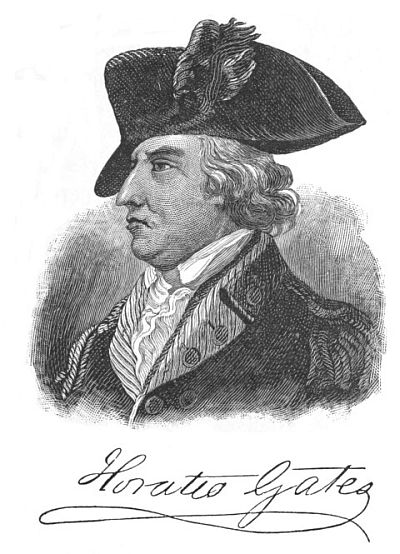
The winter seems to have been spent in intrigue. Knowing the chief source of Schuyler’s unpopularity, Gates made it a point to declare, as often and as loudly as possible, his belief that the state of New York had no title to the Green Mountain country. Gates intrigues against SchuylerIn this way he won golden opinions from the people of New England, and rose high in the good graces of such members of Congress as Samuel Adams, whose noble nature was slow to perceive his meanness and duplicity. The failure of the invasion of Canada had caused much chagrin in Congress, and it was sought to throw the whole blame of it upon Schuyler for having, as it was alleged, inadequately supported Montgomery and Arnold. The unjust charge served to arouse a prejudice in many minds, and during the winter some irritating letters passed between Schuyler and Congress, until late in March, 1777, he obtained permission to visit Philadelphia and vindicate himself. On the 22d of May, after a thorough investigation, Schuyler’s conduct received the full approval of Congress, and he was confirmed in his command of the northern department, which was expressly defined as including Lakes George and Champlain, as well as the valleys of the Hudson and the Mohawk.
Gates visits Congress The sensitive soul of Gates now took fresh offence. He had been sent back in March to his post at Ticonderoga, just as Schuyler was starting for Philadelphia, and he flattered himself with the hope that he would soon be chosen to supersede his gallant commander. Accordingly when he found that Schuyler had been reinstated in all his old command and honours, he flew into a rage, refused to serve in a subordinate capacity, wrote an impudent letter to Washington, and at last got permission to visit Congress again, while General St. Clair was appointed in his stead to the command of the great northern fortress. On the 19th of June, Gates obtained a hearing before Congress, and behaved with such unseemly violence that after being repeatedly called to order, he was turned out of the room, amid a scene of angry confusion. Such conduct should naturally have ruined his cause, but he had made so many powerful friends that by dint of more or less apologetic talk the offence was condoned.
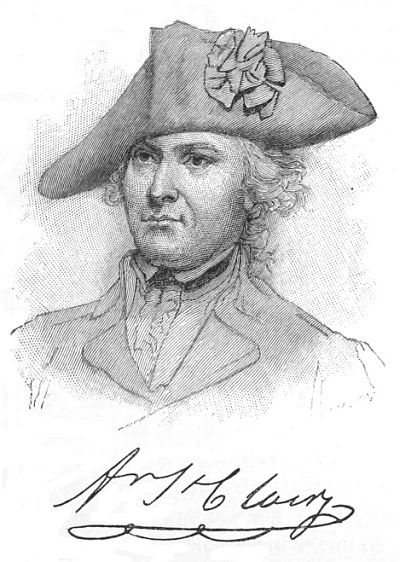
Charges against Arnold Throughout these bickerings Arnold had been the steadfast friend of Schuyler; and although his brilliant exploits had won general admiration, he did not fail to catch some of the odium so plentifully bestowed upon the New York commander. In the chaos of disappointment and wrath which ensued upon the disastrous retreat from Canada in 1776, when everybody was eager to punish somebody else for the ill fortune which was solely due to the superior resources of the enemy, Arnold came in for his share of blame. No one could find any fault with his military conduct, but charges were brought against him on the ground of some exactions of private property at Montreal which had been made for the support of the army. A thorough investigation of the case demonstrated Arnold’s entire uprightness in the matter, and the verdict of Congress, which declared the charges to be “cruel and unjust,” was indorsed by Washington. Nevertheless, in the manifold complications of feeling which surrounded the Schuyler trouble, these unjust charges succeeded in arousing a prejudice which may have had something to do with the slight cast upon Arnold in the appointment of the new major-generals. In the whole course of American history there are few sadder chapters than this. Among the scandals of this eventful winter we can trace the beginnings of the melancholy chain of events which by and by resulted in making the once heroic name of Benedict Arnold a name of opprobrium throughout the world. We already begin to see, too, originating in Lee’s intrigues of the preceding autumn, and nourished by the troubles growing out of the Vermont quarrel and the ambitious schemes of Gates, the earliest germs of that faction which erelong was to seek to compass the overthrow of Washington himself.
For the present the injustice suffered by Arnold had not wrought its darksome change in him. A long and complicated series of influences was required to produce that result. To the earnest appeal of Washington that he should not resign he responded cordially, declaring that no personal considerations should induce him to stay at home while the interests of his country were at stake. He would zealously serve under his juniors, who had lately been raised above him, so long as the common welfare was in danger. An opportunity for active service soon presented itself. Tryon’s expedition against DanburyAmong the preparations for the coming summer campaign, Sir William Howe thought it desirable to cripple the Americans by seizing a large quantity of military stores which had been accumulated at Danbury in Connecticut. An expedition was sent out, very much like that which at Lexington and Concord had ushered in the war, and it met with a similar reception. A force of 2,000 men, led by the royal governor, Tryon, of North Carolina fame, landed at Fairfield, and marched to Danbury, where they destroyed the stores and burned a large part of the town. The militia turned out, as on the day of Lexington, led by General Wooster, who was slain in the first skirmish. Arnold defeats Tryon at Ridgefield, April 27, 1777By this time Arnold, who happened to be visiting his children in New Haven, had heard of the affair, and came upon the scene with 600 men. At Ridgefield a desperate fight ensued, in which Arnold had two horses killed under him. The British were defeated. By the time they reached their ships, 200 of their number had been killed or wounded, and, with the yeomanry swarming on every side, they narrowly escaped capture. For his share in this action Arnold was made a major-general, and was presented by Congress with a fine horse; but nothing was done towards restoring him to his relative rank, nor was any explanation vouchsafed. Washington offered him the command of the Hudson at Peekskill, which was liable to prove one of the important points in the ensuing campaign; but Arnold for the moment declined to take any such position until he should have conferred with Congress, and fathomed the nature of the difficulties by which he had been beset; and so the command of this important position was given to the veteran Putnam.
The time for the summer campaign was now at hand. The first year of the independence of the United States was nearly completed, and up to this time the British had nothing to show for their work except the capture of the city of New York and the occupation of Newport. The army of Washington, which six months ago they had regarded as conquered and dispersed, still balked and threatened them from its inexpugnable position on the heights of Morristown. It was high time that something more solid should be accomplished, for every month of adverse possession added fresh weight to the American cause, and increased the probability that France would interfere.
The military centre of the United States was the state of New
York
A decisive blow was accordingly about to be struck. After careful study
by Lord George Germain, and much consultation with General Burgoyne, who
had returned to England for the winter, it was decided to adhere to the
plan of the preceding year, with slight modifications. The great object
was to secure firm possession of the entire valley of the Hudson,
together with that of the Mohawk. It must be borne in mind that at this
time the inhabited part of the state of New York consisted almost
entirely of the Mohawk and Hudson valleys. All the rest was unbroken
wilderness, save for an occasional fortified trading-post. With a total
population of about 170,000, New York ranked seventh among the thirteen
states; just after Maryland and Connecticut, just before South Carolina.
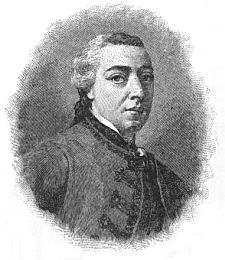
GENERAL BURGOYNE
At the same time, the geographical position of New York, whether from a
commercial or from a military point of view, was as commanding then as
it has ever been. It was thought that so small a population, among which
there were known to be many Tories, might easily be conquered and the
country firmly held. The people of New Jersey and Pennsylvania were
regarded as lukewarm supporters of the Declaration of Independence, and
it was supposed that the conquest of New York might soon be followed by
the subjection of these two provinces. With the British power thus
thrust, like a vast wedge, through the centre of the confederacy, it
would be impossible for New England to coöperate with the southern
states, and it was hoped that the union of the colonies against the
Crown would thus be effectually broken.
A second blow to be struck at the centre. The plan of
campaign
With this object of conquering New York, we have seen Carleton, in 1776,
approaching through Lake Champlain, while Howe was wresting Manhattan
Island from Washington. But the plan was imperfectly conceived, and the
coöperation was feeble. How feeble it was is well shown by the fact that
Carleton’s ill-judged retreat from Crown Point enabled Schuyler to send
reinforcements to Washington in time to take part in the great strokes
at Trenton and Princeton. Something, however, had been accomplished. In
spite of Arnold’s desperate resistance and Washington’s consummate
skill, the enemy had gained a hold upon both the northern and the
southern ends of the long line.
 But this obstinate resistance served to
some extent to awaken the enemy to the arduous character of the problem.
The plan was more carefully studied, and it was intended that this time
the coöperation should be more effectual. In order to take possession of
the whole state by one grand system of operations, it was decided that
the invasion should be conducted by three distinct armies operating upon
converging lines. A strong force from Canada was to take Ticonderoga,
and proceed down the line of the Hudson to Albany. This force was now to
be commanded by General Burgoyne, while his superior officer, General
Carleton, remained at Quebec. A second and much smaller force, under
Colonel St. Leger, was to go up the St. Lawrence to Lake Ontario, land
at Oswego, and, with the aid of Sir John Johnson and the Indians, reduce
Fort Stanwix; after which he was to come down the Mohawk valley and
unite his forces with those of Burgoyne. At the same time, Sir William
Howe was to ascend the Hudson with the main army, force the passes of
the Highlands at Peekskill, and effect a junction with Burgoyne at
Albany. The junction of the three armies was expected to complete the
conquest of New York, and to insure the overthrow of American
independence.
But this obstinate resistance served to
some extent to awaken the enemy to the arduous character of the problem.
The plan was more carefully studied, and it was intended that this time
the coöperation should be more effectual. In order to take possession of
the whole state by one grand system of operations, it was decided that
the invasion should be conducted by three distinct armies operating upon
converging lines. A strong force from Canada was to take Ticonderoga,
and proceed down the line of the Hudson to Albany. This force was now to
be commanded by General Burgoyne, while his superior officer, General
Carleton, remained at Quebec. A second and much smaller force, under
Colonel St. Leger, was to go up the St. Lawrence to Lake Ontario, land
at Oswego, and, with the aid of Sir John Johnson and the Indians, reduce
Fort Stanwix; after which he was to come down the Mohawk valley and
unite his forces with those of Burgoyne. At the same time, Sir William
Howe was to ascend the Hudson with the main army, force the passes of
the Highlands at Peekskill, and effect a junction with Burgoyne at
Albany. The junction of the three armies was expected to complete the
conquest of New York, and to insure the overthrow of American
independence.
The plan was unsound Such was the plan of campaign prepared by the ministry. There can be no doubt that it was carefully studied, or that, if successful, it would have proved very disastrous to the Americans. There is room for very grave doubt, however, as to whether it was the most judicious plan to adopt. The method of invading any country by distinct forces operating upon converging lines is open to the objection that either force is liable to be separately overwhelmed without the possibility of reinforcement from the other. Such a plan is prudent only when the invaded country has good roads, and when the invaders have a great superiority in force, as was the case when the allied armies advanced upon Paris in 1814. In northern and central New York, in 1777, the conditions were very unfavourable to such a plan. The distances to be traversed were long, and the roads were few and bad. Except in the immediate neighbourhood of Albany and Saratoga, the country was covered with the primeval forest, through which only the trapper and the savage could make their way with speed. The Americans, too, had the great advantage of operating upon interior lines. It was difficult for Burgoyne at Fort Edward, St. Leger before Fort Stanwix, and Howe in the city of New York to communicate with each other at all; it was impossible for them to do so promptly; whereas nothing could be easier than for Washington at Morristown to reach Putnam at Peekskill, or for Putnam to forward troops to Schuyler at Albany, or for Schuyler to send out a force to raise the siege of Fort Stanwix. In view of these considerations, it seems probable that Lord George Germain would have acted more wisely if he had sent Burgoyne with his army directly by sea to reinforce Sir William Howe. The army thus united, and numbering more than 30,000 men, would have been really formidable. If they had undertaken to go up the river to Albany, it would have been hard to prevent them. If their united presence at Albany was the great object of the campaign, there was no advantage in sending one commander to reach it by a difficult and dangerous overland march. The Hudson is navigable by large vessels all the way to Albany, and by advancing in this way the army might have preserved its connections; and whatever disaster might have befallen, it would have been difficult for the Americans to surround and capture so large a force. Once arrived at Albany, the expedition of St. Leger might have set out from that point as a matter of subsequent detail, and would have had a base within easy distance upon which to fall back in case of defeat.
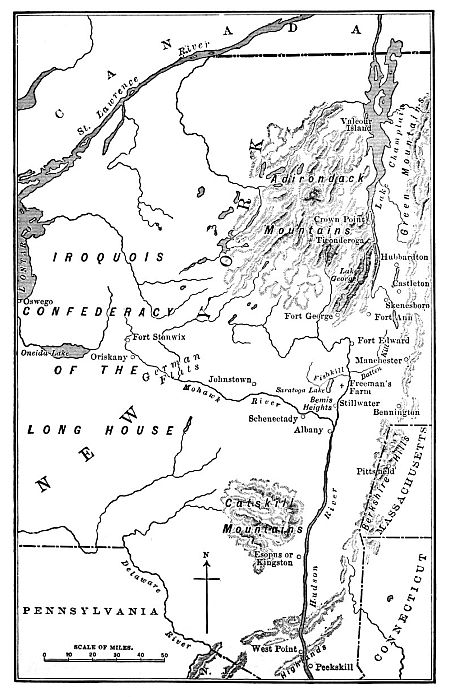
BURGOYNE’S INVASION OF NEW YORK, JULY-OCTOBER, 1777
Germain’s fatal error It does not appear, therefore, that there were any advantages to be gained by Burgoyne’s advance from the north which can be regarded as commensurate with the risk which he incurred. To have transferred the northern army from the St. Lawrence to the Hudson by sea would have been far easier and safer than to send it through a hundred miles of wilderness in northern New York; and whatever it could have effected in the interior of the state could have been done as well in the former case as in the latter. But these considerations do not seem to have occurred to Lord George Germain. In the wars with the French, the invading armies from Canada had always come by way of Lake Champlain, so that this route was accepted without question, as if consecrated by long usage. Through a similar association of ideas an exaggerated importance was attached to the possession of Ticonderoga. The risks of the enterprise, moreover, were greatly underestimated. In imagining that the routes of Burgoyne and St. Leger would lie through a friendly country, the ministry fatally misconceived the whole case. There was, indeed, a powerful Tory party in the country, just as in the days of Robert Bruce there was an English party in Scotland, just as in the days of Miltiades there was a Persian party in Attika. But no one has ever doubted that the victors at Marathon and at Bannockburn went forth with a hearty godspeed from their fellow-countrymen; and the obstinate resistance encountered by St. Leger, within a short distance of Johnson’s Tory stronghold, is an eloquent commentary upon the error of the ministry in their estimate of the actual significance of the loyalist element on the New York frontier.
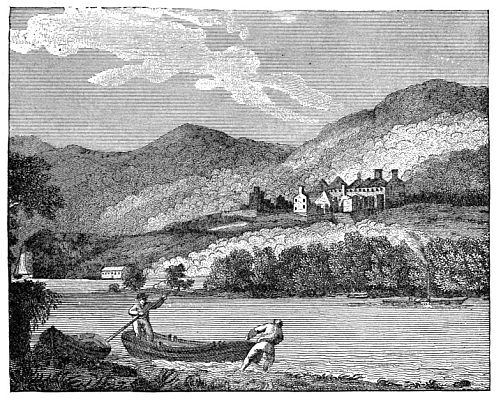
RUINS OF TICONDEROGA IN 1818
Too many unknown quantities It thus appears that in the plan of a triple invasion upon converging lines the ministry were dealing with too many unknown quantities. They were running a prodigious risk for the sake of an advantage which in itself was extremely open to question; for should it turn out that the strength of the Tory party was not sufficiently great to make the junction of the three armies at Albany at once equivalent to the complete conquest of the state, then the end for which the campaign was undertaken could not be secured without supplementary campaigns. Neither a successful march up and down the Hudson river nor the erection of a chain of British fortresses on that river could effectually cut off the southern communications of New England, unless all military resistance were finally crushed in the state of New York. The surest course for the British, therefore, would have been to concentrate all their available force at the mouth of the Hudson, and continue to make the destruction of Washington’s army the chief object of their exertions. In view of the subtle genius which he had shown during the last campaign, that would have been an arduous task; but, as events showed, they had to deal with his genius all the same on the plan which they adopted, and at a great disadvantage.
Danger from New England ignored Another point which the ministry overlooked was the effect of Burgoyne’s advance upon the people of New England. They could reasonably count upon alarming the yeomanry of New Hampshire and Massachusetts by a bold stroke upon the Hudson, but they failed to see that this alarm would naturally bring about a rising that would be very dangerous to the British cause. Difficult as it was at that time to keep the Continental army properly recruited, it was not at all difficult to arouse the yeomanry in the presence of an immediate danger. In the western parts of New England there were scarcely any Tories to complicate the matter; and the flank movement by the New England militia became one of the most formidable features in the case.
The dispatch that was never sent But whatever may be thought of the merits of Lord George’s plan, there can be no doubt that its success was absolutely dependent upon the harmonious coöperation of all the forces involved in it. The ascent of the Hudson by Sir William Howe, with the main army, was as essential a part of the scheme as the descent of Burgoyne from the north; and as the two commanders could not easily communicate with each other, it was necessary that both should be strictly bound by their instructions. At this point a fatal blunder was made. Burgoyne was expressly directed to follow the prescribed line down the Hudson, whatever might happen, until he should effect his junction with the main army. On the other hand, no such unconditional orders were received by Howe. He understood the plan of campaign, and knew that he was expected to ascend the river in force; but he was left with the usual discretionary power, and we shall presently see what an imprudent use he made of it. The reasons for this inconsistency on the part of the ministry were for a long time unintelligible; but a memorandum of Lord Shelburne, lately brought to light by Lord Edmund Fitzmaurice, has solved the mystery. It seems that a dispatch, containing positive and explicit orders for Howe to ascend the Hudson, was duly drafted, and, with many other papers, awaited the minister’s signature. Lord George Germain, being on his way to the country, called at his office to sign the dispatches; but when he came to the letter addressed to General Howe, he found it had not been “fair copied.” Lord George, like the old gentleman who killed himself in defence of the great principle that crumpets are wholesome, never would be put out of his way by anything. Unwilling to lose his holiday, he hurried off to the green meadows of Kent, intending to sign the letter on his return. But when he came back the matter had slipped from his mind. The document on which hung the fortunes of an army, and perhaps of a nation, got thrust unsigned into a pigeon-hole, where it was duly discovered some time after the disaster at Saratoga had become part of history.
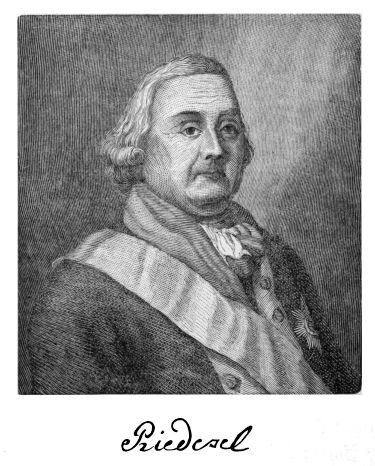
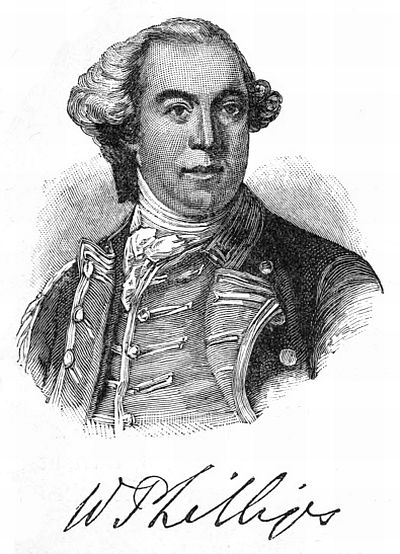
Happy in his ignorance of the risks he was assuming, Burgoyne took the field about the 1st of June, with an army of 7,902 men, of whom 4,135 were British regulars. His German troops from Brunswick, 3,116 in number, were commanded by Baron Riedesel, an able general, whose accomplished wife has left us such a picturesque and charming description of the scenes of this adventurous campaign. Of Canadian militia there were 148, and of Indians 503. The regular troops, both German and English, were superbly trained and equipped, and their officers were selected with especial care. Generals Phillips and Fraser were regarded as among the best officers in the British service. Burgoyne advances upon Ticonderoga On the second anniversary of Bunker Hill this army began crossing the lake to Crown Point; and on the 1st of July it appeared before Ticonderoga, where St. Clair was posted with a garrison of 3,000 men. Since its capture by Allen, the fortress had been carefully strengthened, until it was now believed to be impregnable. But while no end of time and expense had been devoted to the fortifications, a neighbouring point which commands the whole position had been strangely neglected. A little less than a mile south of Ticonderoga, the narrow mountain ridge between the two lakes ends abruptly in a bold crag, which rises 600 feet sheer over the blue water. Phillips seizes Mount DefiancePractised eyes in the American fort had already seen that a hostile battery Phillips planted on this eminence would render their stronghold untenable; but it was not believed that siege-guns could be dragged up the steep ascent, and so, in spite of due warning, the crag had not been secured when the British army arrived. General Phillips at once saw the value of the position, and, approaching it by a defile that was screened from the view of the fort, worked night and day in breaking out a pathway and dragging up cannon. “Where a goat can go, a man may go; and where a man can go, he can haul up a gun,” argued the gallant general. Great was the astonishment of the garrison when, on the morning of July 5th, they saw red coats swarming on the hill, which the British, rejoicing in their exploit, now named Mount Defiance. There were not only red coats there, but brass cannon, which by the next day would be ready for work. Ticonderoga had become a trap, from which the garrison could not escape too quickly. St. Clair abandons Ticonderoga, July 5, 1777A council of war was held, and under cover of night St. Clair took his little army across the lake and retreated upon Castleton in the Green Mountains. Such guns and stores as could be saved, with the women and wounded men, were embarked in 200 boats, and sent, under a strong escort, to the head of the lake, whence they continued their retreat to Fort Edward on the Hudson. About three o’clock in the morning a house accidentally took fire, and in the glare of the flames the British sentinels caught a glimpse of the American rear-guard just as it was vanishing in the sombre depths of the forest. Alarm guns were fired, and in less than an hour the British flag was hoisted over the empty fortress, while General Fraser, with 900 men, had started in hot pursuit of the retreating Americans. Riedesel was soon sent to support him, while Burgoyne, leaving nearly 1,000 men to garrison the fort, started up the lake with the main body of the army.Battle of Hubbardton, July 7 On the morning of the 7th, General Fraser overtook the American rear-guard of 1,000 men, under Colonels Warner and Francis, at the village of Hubbardton, about six miles behind the main army. A fierce fight ensued, in which Fraser was worsted, and had begun to fall back, with the loss of one fifth of his men, when Riedesel came up with his Germans, and the Americans were put to flight, leaving one third of their number killed or wounded. This obstinate resistance at Hubbardton served to check the pursuit, and five days later St. Clair succeeded, without further loss, in reaching Fort Edward, where he joined the main army under Schuyler.
TRUMBULL’S PLAN OF TICONDEROGA AND MOUNT DEFIANCE
One swallow does not make a summer Up to this moment, considering the amount of work done and the extent of country traversed, the loss of the British had been very small. They began to speak contemptuously of their antagonists, and the officers amused themselves by laying wagers as to the precise number of days it would take them to reach Albany. In commenting on the failure to occupy Mount Defiance, Burgoyne made a general statement on the strength of a single instance,—which is the besetting sin of human reasoning. “It convinces me,” said he, “that the Americans have no men of military science.” Yet General Howe at Boston, in neglecting to occupy Dorchester Heights, had made just the same blunder, and with less excuse; for no one had ever doubted that batteries might be placed there by somebody.
The king’s glee In England the fall of Ticonderoga was greeted with exultation, as the death-blow to the American cause. Horace Walpole tells how the king rushed into the queen’s apartment, clapping his hands and shouting, “I have beat them! I have beat all the Americans!” People began to discuss the best method of reëstablishing the royal governments in the “colonies.” In America there was general consternation. St. Clair was greeted with a storm of abuse. Wrath of John AdamsJohn Adams, then president of the Board of War, wrote, in the first white heat of indignation, “We shall never be able to defend a post till we shoot a general!” Schuyler, too, as commander of the department, was ignorantly and wildly blamed, and his political enemies seized upon the occasion to circulate fresh stories to his discredit. A court-martial in the following year vindicated St. Clair’s prudence in giving up an untenable position and saving his army from capture. The verdict was just, but there is no doubt that the failure to fortify Mount Defiance was a grave error of judgment, for which the historian may fairly apportion the blame between St. Clair and Gates. It was Gates who had been in command of Ticonderoga in the autumn of 1776, when an attack by Carleton was expected, and his attention had been called to this weak point by Colonel Trumbull, whom he laughed to scorn. Gates had again been in command from March to June. St. Clair had taken command about three weeks before Burgoyne’s approach; he had seriously considered the question of fortifying Mount Defiance, but had not been sufficiently prompt. Gates chiefly to blameIn no case could any blame attach to Schuyler. Gates was more at fault than any one else, but he did not happen to be at hand when the catastrophe occurred, and accordingly people did not associate him with it. On the contrary, amid the general wrath, the loss of the northern citadel was alleged as a reason for superseding Schuyler by Gates; for if he had been there, it was thought that the disaster would have been prevented.
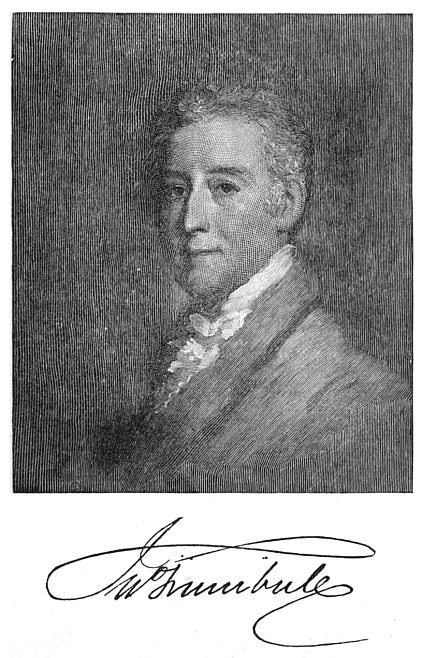
The irony of events, however, alike ignoring American consternation and British glee, showed that the capture of Ticonderoga was not to help the invaders in the least. On the contrary, it straightway became a burden, for it detained an eighth part of Burgoyne’s force in garrison at a time when he could ill spare it. Burgoyne’s difficulties beginIndeed, alarming as his swift advance had seemed at first, Burgoyne’s serious difficulties were now just beginning, and the harder he laboured to surmount them the more completely did he work himself into a position from which it was impossible either to advance or to recede. On the 10th of July his whole army had reached Skenesborough (now Whitehall), at the head of Lake Champlain. From this point to Fort Edward, where the American army was encamped, the distance was twenty miles as the crow flies; but Schuyler had been industriously at work with those humble weapons the axe and the crowbar, which in warfare sometimes prove mightier than the sword. The roads, bad enough at their best, were obstructed every few yards by huge trunks of fallen trees, that lay with their boughs interwoven. Wherever the little streams could serve as aids to the march, they were choked up with stumps and stones; wherever they served as obstacles which needed to be crossed, the bridges were broken down. The country was such an intricate labyrinth of creeks and swamps that more than forty bridges had to be rebuilt in the course of the march. Under these circumstances, Burgoyne’s advance must be regarded as a marvel of celerity. He accomplished a mile a day, and reached Fort Edward on the 30th of July.
Schuyler wisely evacuates Fort Edward In the mean time Schuyler had crossed the Hudson, and slowly fallen back to Stillwater. For this retrograde movement fresh blame was visited upon him by the general public, which at all times is apt to suppose that a war should mainly consist of bloody battles, and which can seldom be made to understand the strategic value of a retreat. The facts of the case were also misunderstood. Fort Edward was supposed to be an impregnable stronghold, whereas it was really commanded by highlands. The Marquis de Chastellux, who visited it somewhat later, declared that it could be taken at any time by 500 men with four siege-guns. Now for fighting purposes an open field is much better than an untenable fortress. If Schuyler had stayed in Fort Edward, he would probably have been forced to surrender; and his wisdom in retreating is further shown by the fact that every moment of delay counted in his favour. The militia of New York and New England were already beating to arms. Some of those yeomen who were with the army were allowed to go home for the harvest; but the loss was more than made good by the numerous levies which, at Schuyler’s suggestion and by Washington’s orders, were collecting under General Lincoln in Vermont, for the purpose of threatening Burgoyne in the rear. Enemies gathering in Burgoyne’s rearThe people whose territory was invaded grew daily more troublesome to the enemy. Burgoyne had supposed that it would be necessary only to show himself at the head of an army, when the people would rush by hundreds to offer support or seek protection. He now found that the people withdrew from his line of advance, driving their cattle before them, and seeking shelter, when possible, within the lines of the American army. In his reliance upon the aid of New York loyalists, he was utterly disappointed; very few Tories joined him, and these could offer neither sound advice nor personal influence wherewith to help him. When the yeomanry collected by hundreds, it was only to vex him and retard his progress.
Use of Indian auxiliaries Even had the loyalist feeling on the Vermont frontier of New York been far stronger than it really was, Burgoyne had done much to alienate or stifle it by his ill-advised employment of Indian auxiliaries. For this blunder the responsibility rests mainly with Lord North and Lord George Germain. Burgoyne had little choice in the matter except to carry out his instructions. Being a humane man, and sharing, perhaps, in that view of the “noble savage” which was fashionable in Europe in the eighteenth century, he fancied he could prevail upon his tawny allies to forego their cherished pastime of murdering and scalping. When, at the beginning of the campaign, he was joined by a party of Wyandots and Ottawas, under command of that same redoubtable Charles de Langlade who, twenty-two years before, had achieved the ruin of Braddock, he explained his policy to them in an elaborate speech, full of such sentimental phrases as the Indian mind was supposed to delight in. Burgoyne’s address to the chiefsThe slaughter of aged men, of women and children and unresisting prisoners, was absolutely prohibited; and “on no account, or pretense, or subtlety, or prevarication,” were scalps to be taken from wounded or dying men. An order more likely to prove efficient was one which provided a reward for every savage who should bring his prisoners to camp in safety. To these injunctions, which must have inspired them with pitying contempt, the chiefs laconically replied that they had “sharpened their hatchets upon their affections,” and were ready to follow their “great white father.”
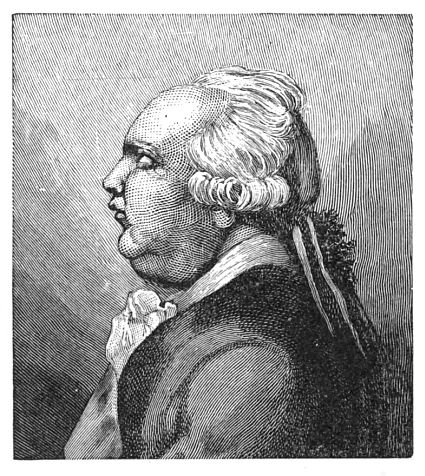
LORD NORTH
It is ridiculed by BurkeThe employment of Indian auxiliaries was indignantly denounced by the opposition in Parliament, and when the news of this speech of Burgoyne’s reached England it was angrily ridiculed by Burke, who took a sounder view of the natural instincts of the red man. “Suppose,” said Burke, “that there was a riot on Tower Hill. What would the keeper of his majesty’s lions do? Would he not fling open the dens of the wild beasts, and then address them thus? ‘My gentle lions, my humane bears, my tender-hearted hyenas, go forth! But I exhort you, as you are Christians and members of civilized society, to take care not to hurt any man, woman, or child.’” The House of Commons was convulsed over this grotesque picture; and Lord North, to whom it seemed irresistibly funny to hear an absent man thus denounced for measures which he himself had originated, sat choking with laughter, while tears rolled down his great fat cheeks.
It soon turned out, however, to be no laughing matter. The cruelties inflicted indiscriminately upon patriots and loyalists soon served to madden the yeomanry, and array against the invaders whatever wavering sentiment had hitherto remained in the country. The story of Jane McCreaOne sad incident in particular has been treasured up in the memory of the people, and celebrated in song and story. Jenny McCrea, the beautiful daughter of a Scotch clergyman of Paulus Hook, was at Fort Edward, visiting her friend Mrs. McNeil, who was a loyalist and a cousin of General Fraser. On the morning of July 27th, a marauding party of Indians burst into the house, and carried away the two ladies. They were soon pursued by some American soldiers, who exchanged a few shots with them. In the confusion which ensued the party was scattered, and Mrs. McNeil was taken alone into the camp of the approaching British army. Next day a savage of gigantic stature, a famous sachem, known as the Wyandot Panther, came into the camp with a scalp which Mrs. McNeil at once recognized as Jenny’s, from the silky black tresses, more than a yard in length. A search was made, and the body of the poor girl was found hard by a spring in the forest, pierced with three bullet wounds. How she came to her cruel death was never known. The Panther plausibly declared that she had been accidentally shot during the scuffle with the soldiers, but his veracity was open to question, and the few facts that were known left ample room for conjecture. The popular imagination soon framed its story with a romantic completeness that thrust aside even these few facts. Miss McCrea was betrothed to David Jones, a loyalist who was serving as lieutenant in Burgoyne’s army. In the legend which immediately sprang up, Mr. Jones was said to have sent a party of Indians, with a letter to his betrothed, entreating her to come to him within the British lines that they might be married. For bringing her to him in safety the Indians were to receive a barrel of rum. When she had entrusted herself to their care, and the party had proceeded as far as the spring, where the savages stopped to drink, a dispute arose as to who was to have the custody of the barrel of rum, and many high words ensued, until one of the party settled the question offhand by slaying the lady with his tomahawk. It would be hard to find a more interesting example of the mushroom-like growth and obstinate vitality of a romantic legend. The story seems to have had nothing in common with the observed facts, except the existence of the two lovers and the Indians and a spring in the forest.[12] Yet it took possession of the popular mind almost immediately after the event, and it has ever since been repeated, with endless variations in detail, by American historians. Mr. Jones himself—who lived, a broken-hearted man, for half a century after the tragedy—was never weary of pointing out its falsehood and absurdity; but all his testimony, together with that of Mrs. McNeil and other witnesses, to the facts that really happened was powerless to shake the hold upon the popular fancy which the legend had instantly gained. Such an instance, occurring in a community of shrewd and well-educated people, affords a suggestive commentary upon the origin and growth of popular tales in earlier and more ignorant ages.
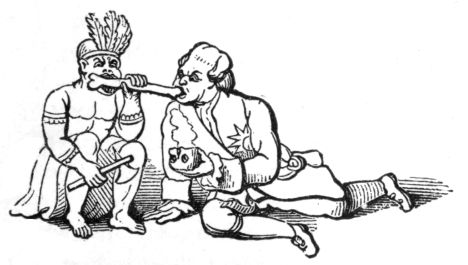
THE ALLIES—PAR NOBILE FRATRUM[13]
The Indians desert Burgoyne But in whatever way poor Jenny may have come to her death, there can be no doubt as to the mischief which it swiftly wrought for the invading army. In the first place, it led to the desertion of all the Indian allies. Burgoyne was a man of quick and tender sympathy, and the fate of this sweet young lady shocked him as it shocked the American people. He would have had the Panther promptly hanged, but that his guilt was not clearly proved, and many of the officers argued that the execution of a famous and popular sachem would enrage all the other Indians, and might endanger the lives of many of the soldiers. The Panther’s life was accordingly spared, but Burgoyne made it a rule that henceforth no party of Indians should be allowed to go marauding save under the lead of some British officer, who might watch and restrain them. When this rule was put in force, the tawny savages grunted and growled for two or three days, and then, with hoarse yells and hoots, all the five hundred broke loose from the camp, and scampered off to the Adirondack wilderness. From a military point of view, the loss was small, save in so far as it deprived the army of valuable scouts and guides. But the thirst for vengeance which was aroused among the yeomanry of northern New York, of Vermont, and of western Massachusetts, was a much more serious matter. The lamentable story was told at every village fireside, and no detail of pathos or of horror was forgotten. The name of Jenny McCrea became a watchword, and a fortnight had not passed before General Lincoln had gathered on the British flank an army of stout and resolute farmers, inflamed with such wrath as had not filled their bosoms since the day when all New England had rushed to besiege the enemy in Boston.
Importance of Bennington; Burgoyne sends a German force against it Such a force of untrained yeomanry is of little use in prolonged warfare, but on important occasions it is sometimes capable of dealing heavy blows. We have seen what it could do on the memorable day of Lexington. It was now about to strike, at a critical moment, with still more deadly effect. Burgoyne’s advance, laborious as it had been for the last three weeks, was now stopped for want of horses to drag the cannon and carry the provision bags; and the army, moreover, was already suffering from hunger. The little village of Bennington, at the foot of the Green Mountains, had been selected by the New England militia as a centre of supplies. Many hundred horses had been collected there, with ample stores of food and ammunition. To capture this village would give Burgoyne the warlike material he wanted, while at the same time it would paralyze the movements of Lincoln, and perhaps dispel the ominous cloud that was gathering over the rear of the British army. Accordingly, on the 13th of August, a strong detachment of 500 of Riedesel’s men, with 100 newly arrived Indians and a couple of cannon, was sent out to seize the stores at Bennington. Lieutenant-Colonel Baum commanded the expedition, and he was accompanied by Major Skene, an American loyalist, who assured Burgoyne on his honour that the Green Mountains were swarming with devoted subjects of King George, who would flock by hundreds to his standard as soon as it should be set up among them. That these loyal recruits might be organized as quickly as possible, Burgoyne sent along with the expedition a skeleton regiment of loyalists, all duly officered, into the ranks of which they might be mustered without delay. The loyal recruits, however, turned out to be the phantom of a distempered imagination: not one of them appeared in the flesh. On the contrary, the demeanour of the people was so threatening that Baum became convinced that hard work was before him, and next day he sent back for reinforcements. Lieutenant-Colonel Breymann was accordingly sent to support him, with another body of 500 Germans and two field-pieces.
Stark prepares to receive the Germans Meanwhile Colonel Stark was preparing a warm reception for the invaders. We have already seen John Stark, a gallant veteran of the Seven Years’ War, serving with distinction at Bunker Hill and at Trenton and Princeton. He was considered one of the ablest officers in the army; but he had lately gone home in disgust, for, like Arnold, had been passed over by Congress in the list of promotions. Tired of sulking in his tent, no sooner did this rustic Achilles hear of the invaders’ presence in New England than he forthwith sprang to arms, and in the twinkling of an eye 800 stout yeomen were marching under his orders. He refused to take instructions from any superior officer, but declared that he was acting under the sovereignty of New Hampshire alone, and would proceed upon his own responsibility in defending the common cause. At the same time he sent word to General Lincoln, at Manchester in the Green Mountains, asking him to lend him the services of Colonel Seth Warner, with the gallant regiment which had checked the advance of Fraser at Hubbardton. Lincoln sent the reinforcement without delay, and after marching all night in a drenching rain, the men reached Bennington in the morning, wet to the skin. Telling them to follow him as soon as they should have dried and rested themselves, Stark pushed on with his main body, and found the enemy about six miles distant. On meeting this large force, Baum hastily took up a strong position on some rising ground behind a small stream, everywhere fordable, known as the Walloomsac river. All day long the rain fell in torrents, and while the Germans began to throw up intrenchments, Stark laid his plans for storming their position on the morrow. During the night a company of Berkshire militia arrived, and with them the excellent Mr. Allen, the warlike parson of Pittsfield, who went up to Stark and said, “Colonel, our Berkshire people have been often called out to no purpose, and if you don’t let them fight now they will never turn out again.” “Well,” said Stark, “would you have us turn out now, while it is pitch dark and raining buckets?” “No, not just this minute,” replied the minister. “Then,” said the doughty Stark, “as soon as the Lord shall once more send us sunshine, if I don’t give you fighting enough, I’ll never ask you to come out again!”
Battle of Bennington, Aug. 16, 1777 Next morning the sun rose bright and clear, and a steam came up from the sodden fields. It was a true dog-day, sultry and scorching. The forenoon was taken up in preparing the attack, while Baum waited in his strong position. The New Englanders outnumbered the Germans two to one, but they were a militia, unfurnished with bayonets or cannon, while Baum’s soldiers were all regulars, picked from the bravest of the troops which Ferdinand of Brunswick had led to victory at Creveld and Minden. But the worthy German commander, in this strange country, was no match for the astute Yankee on his own ground. Stealthily and leisurely, during the whole forenoon, the New England farmers marched around into Baum’s rear. They did not march in military array, but in little squads, half a dozen at a time, dressed in their rustic blue frocks. There was nothing in their appearance which to a European veteran like Baum could seem at all soldier-like, and he thought that here at last were those blessed Tories, whom he had been taught to look out for, coming to place themselves behind him for protection. Early in the afternoon he was cruelly undeceived. For while 500 of these innocent creatures opened upon him a deadly fire in the rear and on both flanks, Stark, with 500 more, charged across the shallow stream and assailed him in front. The Indians instantly broke and fled screeching to the woods, while yet there was time for escape. The Germans stood their ground, and fought desperately; but thus attacked on all sides at once, they were soon thrown into disorder, and after a two hours’ struggle, in which Baum was mortally wounded, they were all captured. At this moment, as the New England men began to scatter to the plunder of the German camp, the relieving force of Breymann came upon the scene; and the fortunes of the day might have been changed, had not Warner also arrived with his 150 fresh men in excellent order. The invading force annihilatedA furious charge was made upon Breymann, who gave way, and retreated slowly from hill to hill, while parties of Americans kept pushing on to his rear to cut him off. By eight in the evening, when it had grown too dark to aim a gun, this second German force was entirely dispersed or captured. Breymann, with a mere corporal’s guard of sixty or seventy men, escaped under cover of darkness, and reached the British camp in safety. Of the whole German force of 1,000 men, 207 had been killed and wounded, and more than 700 had been captured. Among the spoils of victory were 1,000 stand of arms, 1,000 dragoon swords, and four field-pieces. Of the Americans 14 were killed and 42 wounded.
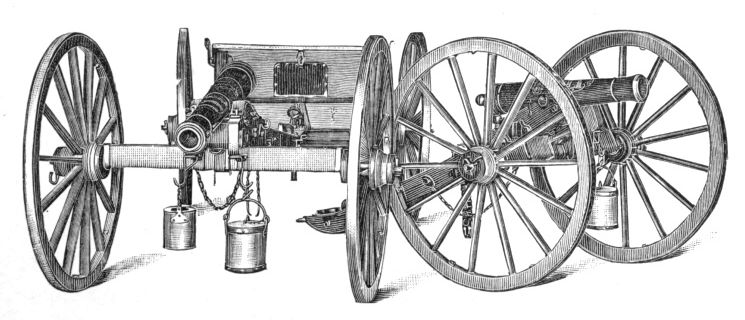
CANNON CAPTURED AT BENNINGTON
Effect of the news; Burgoyne’s enemies multiply The news of this brilliant victory spread joy and hope throughout the land. Insubordination which had been crowned with such splendid success could not but be overlooked, and the gallant Stark was at once taken back into the army, and made a brigadier-general. Not least among the grounds of exultation was the fact that an army of yeomanry had not merely defeated, but annihilated, an army of the Brunswick regulars, with whose European reputation for bravery and discipline every man in the country was familiar. The bolder spirits began to ask the question why that which had been done to Baum and Breymann might not be done to Burgoyne’s whole army; and in the excitement of this rising hope, reinforcements began to pour in faster and faster, both to Schuyler at Stillwater and to Lincoln at Manchester. On the other hand, Burgoyne at Fort Edward was fast losing heart, as dangers thickened around him. So far from securing his supplies of horses, wagons, and food by this stroke at Bennington, he had simply lost one seventh part of his available army, and he was now clearly in need of reinforcements as well as supplies. But no word had yet come from Sir William Howe, and the news from St. Leger was anything but encouraging. It is now time for us to turn westward and follow the wild fortunes of the second invading column.
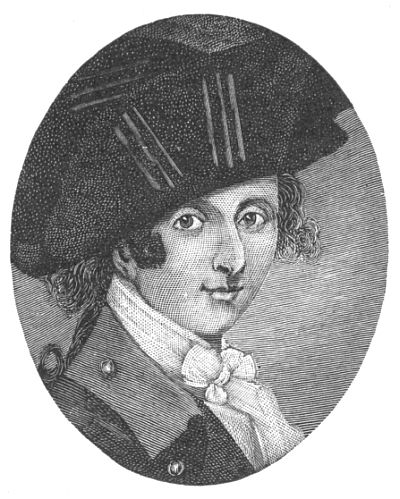
COLONEL BARRY ST. LEGER
Advance of St. Leger upon Fort Stanwix About the middle of July, St. Leger had landed at Oswego, where he was joined by Sir John Johnson with his famous Tory regiment known as the Royal Greens, and Colonel John Butler with his company of Tory rangers. Great efforts had been made by Johnson to secure the aid of the Iroquois tribes, but only with partial success. For once the Long House was fairly divided against itself, and the result of the present campaign did not redound to its future prosperity. The Mohawks, under their great chief Thayendanegea, better known as Joseph Brant, entered heartily into the British cause, and they were followed, though with less alacrity, by the Cayugas and Senecas; but the central tribe, the Onondagas, remained neutral. Under the influence of the missionary, Samuel Kirkland, the Oneidas and Tuscaroras actively aided the Americans, though they did not take the field. After duly arranging his motley force, which amounted to about 1,700 men, St. Leger advanced very cautiously through the woods, and sat down before Fort Stanwix on the 3d of August. This stronghold, which had been built in 1758, on the watershed between the Hudson and Lake Ontario, commanded the main line of traffic between New York and Upper Canada. The place was then on the very outskirts of civilization, and under the powerful influence of Johnson the Tory element was stronger here than in any other part of the state. Even here, however, the strength of the patriot party turned out to be much greater than had been supposed, and at the approach of the enemy the people began to rise in arms. In this part of New York there were many Germans, whose ancestors had come over to America in consequence of the devastation of the Palatinate by Louis XIV.; and among these there was one stout patriot whose name shines conspicuously in the picturesque annals of the Revolution. Herkimer marches against him General Nicholas Herkimer, commander of the militia of Tryon County, a veteran over sixty years of age, no sooner heard of St. Leger’s approach than he started out to the rescue of Fort Stanwix; and by the 5th of August he had reached Oriskany, about eight miles distant, at the head of 800 men. The garrison of the fort, 600 in number, under Colonel Peter Gansevoort, had already laughed to scorn St. Leger’s summons to surrender, when, on the morning of the 6th, they heard a distant firing to the eastward, which they could not account for. The mystery was explained when three friendly messengers floundered through a dangerous swamp into the fort, and told them of Herkimer’s approach and of his purpose. Herkimer’s planThe plan was to overwhelm St. Leger by a concerted attack in front and rear. The garrison was to make a furious sortie, while Herkimer, advancing through the forest, was to fall suddenly upon the enemy from behind; and thus it was hoped that his army might be crushed or captured at a single blow. To ensure completeness of coöperation, Colonel Gansevoort was to fire three guns immediately upon receiving the message, and upon hearing this signal Herkimer would begin his march from Oriskany. Gansevoort would then make such demonstrations as to keep the whole attention of the enemy concentrated upon the fort, and thus guard Herkimer against a surprise by the way, until, after the proper interval of time, the garrison should sally forth in full force.
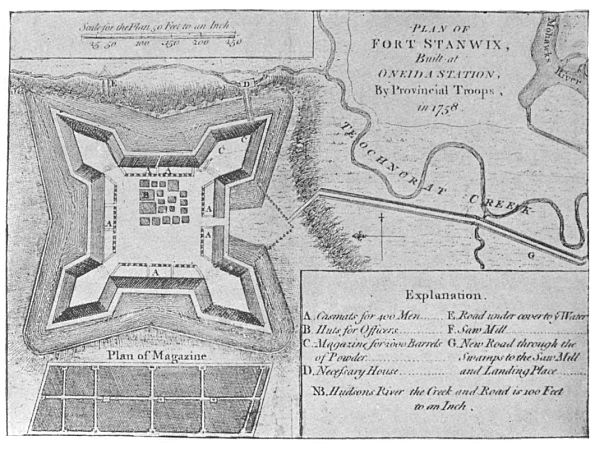
Plan of Fort Stanwix
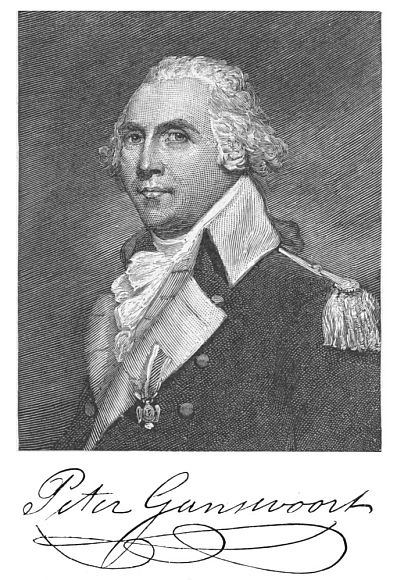
Failure of the plan In this bold scheme everything depended upon absolute coördination in time. Herkimer had dispatched his messengers so early on the evening of the 5th that they ought to have reached the fort by three o’clock the next morning, and at about that time he began listening for the signal-guns. But through some unexplained delay it was nearly eleven in the forenoon when the messengers reached the fort, as just described. Meanwhile, as hour after hour passed by, and no signal-guns were heard by Herkimer’s men, they grew impatient, and insisted upon going ahead, without regard to the preconcerted plan. Much unseemly wrangling ensued, in which Herkimer was called a coward and accused of being a Tory at heart, until, stung by these taunts, the brave old man at length gave way, and at about nine o’clock the forward march was resumed. At this time his tardy messengers still lacked two hours of reaching the fort, but St. Leger’s Indian scouts had already discovered and reported the approach of the American force, and a strong detachment of Johnson’s Greens under Major Watts, together with Brant and his Mohawks, had been sent out to intercept them.
Thayendanegea prepares an ambuscade About two miles west of Oriskany the road was crossed by a deep semicircular ravine, concave toward the east. The bottom of this ravine was a swamp, across which the road was carried by a causeway of logs, and the steep banks on either side were thickly covered with trees and underbrush. The practised eye of Thayendanegea at once perceived the rare advantage of such a position, and an ambuscade was soon prepared with a skill as deadly as that which once had wrecked the proud army of Braddock. But this time it was a meeting of Greek with Greek, and the wiles of the savage chief were foiled by a desperate valour which nothing could overcome. By ten o’clock the main body of Herkimer’s army had descended into the ravine, followed by the wagons, while the rear-guard was still on the rising ground behind. Battle of Oriskany, Aug. 6, 1777At this moment they were greeted by a murderous volley from either side, while Johnson’s Greens came charging down upon them in front, and the Indians, with frightful yells, swarmed in behind and cut off the rear-guard, which was thus obliged to retreat to save itself. For a moment the main body was thrown into confusion, but it soon rallied and formed itself in a circle, which neither bayonet charges nor musket fire could break or penetrate. The scene which ensued was one of the most infernal that the history of savage warfare has ever witnessed. The dark ravine was filled with a mass of fifteen hundred human beings, screaming and cursing, slipping in the mire, pushing and struggling, seizing each other’s throats, stabbing, shooting, and dashing out brains. Bodies of neighbours were afterwards found lying in the bog, where they had gone down in a death-grapple, their cold hands still grasping the knives plunged in each other’s hearts.
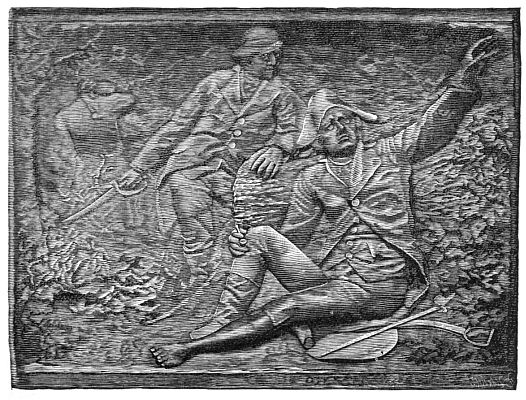
BAS-RELIEF ON THE HERKIMER MONUMENT AT ORISKANY
Early in the fight a musket-ball slew Herkimer’s horse, and shattered his own leg just below the knee; but the old hero, nothing daunted, and bating nothing of his coolness in the midst of the horrid struggle, had the saddle taken from his dead horse and placed at the foot of a great beech-tree where, taking his seat and lighting his pipe, he continued shouting his orders in a stentorian voice and directing the progress of the battle. Nature presently enhanced the lurid horror of the scene. The heat of the August morning had been intolerable, and black thunder-clouds, overhanging the deep ravine at the beginning of the action, had enveloped it in a darkness like that of night. Now the rain came pouring in torrents, while gusts of wind howled through the treetops, and sheets of lightning flashed in quick succession, with a continuous roar of thunder that drowned the noise of the fray. Retreat of the ToriesThe wet rifles could no longer be fired, but hatchet, knife, and bayonet carried on the work of butchery, until, after more than five hundred men had been killed or wounded, the Indians gave way and fled in all directions, and the Tory soldiers, disconcerted, began to retreat up the western road, while Herkimer’s little army, remaining in possession of the hard-won field, felt itself too weak to pursue them.
At this moment, as the storm cleared away and long rays of sunshine began flickering through the wet leaves, the sound of the three signal-guns came booming through the air, and presently a sharp crackling of musketry was heard from the direction of Fort Stanwix. Retreat of HerkimerStartled by this ominous sound, the Tories made all possible haste to join their own army, while Herkimer’s men, bearing their wounded on litters of green boughs, returned in sad procession to Oriskany. With their commander helpless and more than one third of their number slain or disabled, they were in no condition to engage in a fresh conflict, and unwillingly confessed that the garrison of Fort Stanwix must be left to do its part of the work alone. Upon the arrival of the messengers, Colonel Gansevoort had at once taken in the whole situation. He understood the mysterious firing in the forest, saw that Herkimer must have been prematurely attacked, and ordered his sortie instantly, to serve as a diversion. Colonel Willett’s sortieThe sortie was a brilliant success. Sir John Johnson, with his Tories and Indians, was completely routed and driven across the river. Colonel Marinus Willett took possession of his camp, and held it while seven wagons were three times loaded with spoil and sent to be unloaded in the fort. Among all this spoil, together with abundance of food and drink, blankets and clothes, tools and ammunition, the victors captured five British standards, and all Johnson’s papers, maps, and memoranda, containing full instructions for the projected campaign. First hoisting of the stars and stripesAfter this useful exploit, Colonel Willett returned to the fort and hoisted the captured British standards, while over them he raised an uncouth flag, intended to represent the American stars and stripes, which Congress had adopted in June as the national banner. This rude flag, hastily extemporized out of a white shirt, an old blue jacket, and some strips of red cloth from the petticoat of a soldier’s wife, was the first American flag with stars and stripes that was ever hoisted, and it was first flung to the breeze on the memorable day of Oriskany, August 6, 1777.
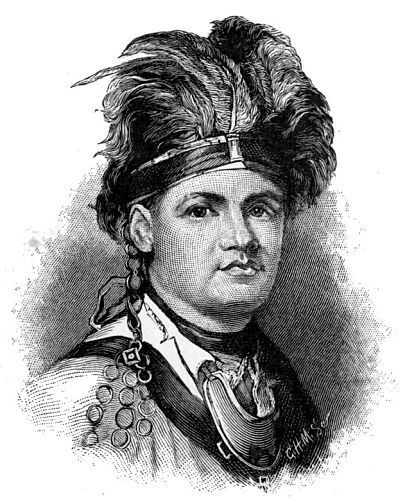
JOSEPH BRANT: THAYENDANEGEA
Death of Herkimer Of all the battles of the Revolution, this was perhaps the most obstinate and murderous. Each side seems to have lost not less than one third of its whole number; and of those lost, nearly all were killed, as it was largely a hand-to-hand struggle, like the battles of ancient times, and no quarter was given on either side. The number of surviving wounded, who were carried back to Oriskany, does not seem to have exceeded forty. Among these was the indomitable Herkimer, whose shattered leg was so unskilfully treated that he died a few days later, sitting in bed propped by pillows, calmly smoking his Dutch pipe and reading his Bible at the thirty-eighth Psalm.
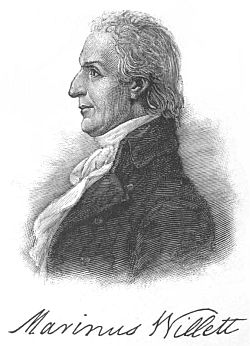
For some little time no one could tell exactly how the results of this fierce and disorderly day were to be regarded. Both sides claimed a victory, and St. Leger vainly tried to scare the garrison by the story that their comrades had been destroyed in the forest. But in its effects upon the campaign, Oriskany was for the Americans a success, though an incomplete one. St. Leger was not crushed, but he was badly crippled. The sacking of Johnson’s camp injured his prestige in the neighbourhood, and the Indian allies, who had lost more than a hundred of their best warriors on that fatal morning, grew daily more sullen and refractory, until their strange behaviour came to be a fresh source of anxiety to the British commander. While he was pushing on the siege as well as he could, a force of 1,200 troops, under Arnold, was marching up the Mohawk valley to complete his discomfiture.
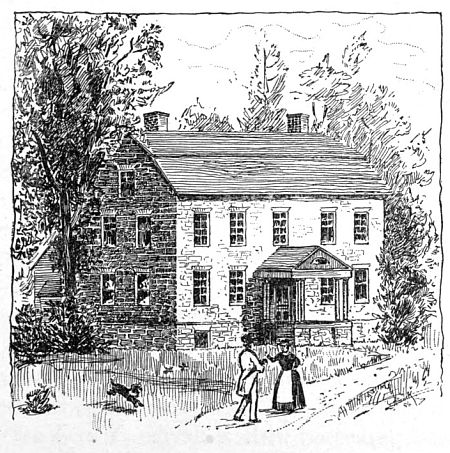
HERKIMER’S HOUSE AT LITTLE FALLS
Arnold arrives at Schuyler’s camp
As soon as he had heard the news of the fall of Ticonderoga, Washington
had dispatched Arnold to render such assistance as he could to the
northern army, and Arnold had accordingly arrived at Schuyler’s
headquarters about three weeks ago. Before leaving Philadelphia, he had
appealed to Congress to restore him to his former rank relatively to the
five junior officers who had been promoted over him, and he had just
learned that Congress had refused the request. At this moment, Colonel
Willett and another officer, after a perilous journey through the
wilderness, arrived at Schuyler’s headquarters, and bringing the news of
Oriskany, begged that a force might be sent to raise the siege of Fort
Stanwix. Schuyler understood the importance of rescuing the stronghold
and its brave garrison, and called a council of war; but he was bitterly
opposed by his officers, one of whom presently said to another, in an
audible whisper, “He only wants to weaken the army!” At this vile
insinuation, the indignant general set his teeth so hard as to bite
through the stem of the pipe he was smoking, which fell on the floor and
was smashed. “Enough!” he cried. “I assume the whole responsibility.
Where is the brigadier who will go?” and volunteers to relieve Fort StanwixThe brigadiers all sat in sullen
silence; but Arnold, who had been brooding over his private grievances,
suddenly jumped up. “Here!” said he. “Washington sent me here to make
myself useful: I will go.” The commander gratefully seized him by the
hand, and the drum beat for volunteers. Arnold’s unpopularity in New
England was mainly with the politicians. It did not extend to the
common soldiers, who admired his impulsive bravery and had unbounded
faith in his resources as a leader.
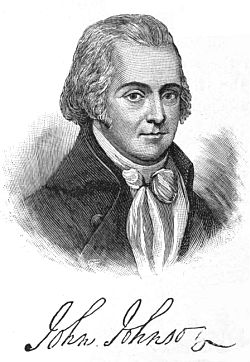 Accordingly, 1,200 Massachusetts men
were easily enlisted in the course of the next forenoon, and the
expedition started up the Mohawk valley. Arnold pushed on with
characteristic energy, but the natural difficulties of the road were
such that after a week of hard work he had only reached the German
Flats, where he was still more than twenty miles from Fort Stanwix.
Believing that no time should be lost, and that everything should be
done to encourage the garrison and dishearten the enemy, he had recourse
to a stratagem, which succeeded beyond his utmost anticipation. A party
of Tory spies had just been arrested in the neighbourhood, and among
them was a certain Yan Yost Cuyler, a queer, half-witted fellow, not
devoid of cunning, whom the Indians regarded with that mysterious awe
with which fools and lunatics are wont to inspire them, as creatures
possessed with a devil. Yan Yost was summarily condemned to death, and
his brother and gypsy-like mother, in wild alarm, hastened to the camp,
to plead for his life. Arnold for a while was inexorable, but presently
offered to pardon the culprit on condition that he should go and spread
a panic in the camp of St. Leger. Yan Yost CuylerYan Yost joyfully consented, and
started off forthwith, while his brother was detained as a hostage, to
be hanged in case of his failure. To make the matter still surer, some
friendly Oneidas were sent along to keep an eye upon him and act in
concert with him. Next day, St. Leger’s scouts, as they stole through
the forest, began to hear rumours that Burgoyne had been totally
defeated, and that a great American army was coming up the valley of the
Mohawk. They carried back these rumours to the camp, and toward evening,
while officers and soldiers were standing about in anxious consultation,
Yan Yost came running in, with a dozen bullet-holes in his coat and
terror in his face, and said that he had barely escaped with his life
from the resistless American host which was close at hand. As many knew
him for a Tory, his tale found ready belief, and when interrogated as to
the numbers of the advancing host he gave a warning frown, and pointed
significantly to the countless leaves that fluttered on the branches
overhead. Nothing more was needed to complete the panic. Flight of St. Leger, Aug. 22It was in vain
that Johnson and St. Leger exhorted and threatened the Indian allies.
Already disaffected, they now began to desert by scores, while some,
breaking open the camp chests, drank rum till they were drunk, and began
to assault the soldiers. All night long the camp was a perfect
Pandemonium. The riot extended to the Tories, and by noon of the next
day St. Leger took to flight and his whole army was dispersed. All the
tents, artillery, and stores fell into the hands of the Americans. The
garrison, sallying forth, pursued St. Leger for a while, but the
faithless Indians, enjoying his discomfiture, and willing to curry
favour with the stronger party, kept up the chase nearly all the way to
Oswego; laying ambushes every night, and diligently murdering the
stragglers, until hardly a remnant of an army was left to embark with
its crestfallen leader for Montreal.
Accordingly, 1,200 Massachusetts men
were easily enlisted in the course of the next forenoon, and the
expedition started up the Mohawk valley. Arnold pushed on with
characteristic energy, but the natural difficulties of the road were
such that after a week of hard work he had only reached the German
Flats, where he was still more than twenty miles from Fort Stanwix.
Believing that no time should be lost, and that everything should be
done to encourage the garrison and dishearten the enemy, he had recourse
to a stratagem, which succeeded beyond his utmost anticipation. A party
of Tory spies had just been arrested in the neighbourhood, and among
them was a certain Yan Yost Cuyler, a queer, half-witted fellow, not
devoid of cunning, whom the Indians regarded with that mysterious awe
with which fools and lunatics are wont to inspire them, as creatures
possessed with a devil. Yan Yost was summarily condemned to death, and
his brother and gypsy-like mother, in wild alarm, hastened to the camp,
to plead for his life. Arnold for a while was inexorable, but presently
offered to pardon the culprit on condition that he should go and spread
a panic in the camp of St. Leger. Yan Yost CuylerYan Yost joyfully consented, and
started off forthwith, while his brother was detained as a hostage, to
be hanged in case of his failure. To make the matter still surer, some
friendly Oneidas were sent along to keep an eye upon him and act in
concert with him. Next day, St. Leger’s scouts, as they stole through
the forest, began to hear rumours that Burgoyne had been totally
defeated, and that a great American army was coming up the valley of the
Mohawk. They carried back these rumours to the camp, and toward evening,
while officers and soldiers were standing about in anxious consultation,
Yan Yost came running in, with a dozen bullet-holes in his coat and
terror in his face, and said that he had barely escaped with his life
from the resistless American host which was close at hand. As many knew
him for a Tory, his tale found ready belief, and when interrogated as to
the numbers of the advancing host he gave a warning frown, and pointed
significantly to the countless leaves that fluttered on the branches
overhead. Nothing more was needed to complete the panic. Flight of St. Leger, Aug. 22It was in vain
that Johnson and St. Leger exhorted and threatened the Indian allies.
Already disaffected, they now began to desert by scores, while some,
breaking open the camp chests, drank rum till they were drunk, and began
to assault the soldiers. All night long the camp was a perfect
Pandemonium. The riot extended to the Tories, and by noon of the next
day St. Leger took to flight and his whole army was dispersed. All the
tents, artillery, and stores fell into the hands of the Americans. The
garrison, sallying forth, pursued St. Leger for a while, but the
faithless Indians, enjoying his discomfiture, and willing to curry
favour with the stronger party, kept up the chase nearly all the way to
Oswego; laying ambushes every night, and diligently murdering the
stragglers, until hardly a remnant of an army was left to embark with
its crestfallen leader for Montreal.
Burgoyne’s dangerous situation The news of this catastrophe reached Burgoyne before he had had time to recover from the news of the disaster at Bennington. Burgoyne’s situation was now becoming critical. Lincoln, with a strong force of militia, was hovering in his rear, while the main army before him was gaining in numbers day by day. Putnam had just sent up reinforcements from the Highlands; Washington had sent Morgan with 500 sharpshooters; and Arnold was hurrying back from Fort Stanwix. Not a word had come from Sir William Howe, and it daily grew more difficult to get provisions.
Schuyler superseded by Gates, Aug. 2. Just at this time, when everything was in readiness for the final catastrophe, General Gates arrived from Philadelphia, to take command of the northern army, and reap the glory earned by other men. On the first day of August, before the first alarm occasioned by Burgoyne’s advance had subsided, Congress had yielded to the pressure of Schuyler’s enemies, and removed him from his command; and on the following day Gates was appointed to take his place. Congress was led to take this step through the belief that the personal hatred felt toward Schuyler by many of the New England people would prevent the enlisting of militia to support him. The events of the next fortnight showed that in this fear Congress was quite mistaken. There can now be no doubt that the appointment of the incompetent Gates was a serious blunder, which might have ruined the campaign, and did in the end occasion much trouble, both for Congress and for Washington. Schuyler received the unwelcome news with the noble unselfishness which always characterized him. At no time did he show more zeal and diligence than during his last week of command; and on turning over the army to General Gates he cordially offered his aid, whether by counsel or action, in whatever capacity his successor might see fit to suggest. But so far from accepting this offer, Gates treated him with contumely, and would not even invite him to attend his first council of war. Such silly behaviour called forth sharp criticisms from discerning people. “The new commander-in-chief of the northern department,” said Gouverneur Morris, “may, if he please, neglect to ask or disdain to receive advice; but those who know him will, I am sure, be convinced that he needs it.”
Position of the two armies, Aug. 19-Sept. 12 When Gates thus took command of the northern army, it was stationed along the western bank of the Hudson, from Stillwater down to Halfmoon, at the mouth of the Mohawk, while Burgoyne’s troops were encamped along the eastern bank, some thirty miles higher up, from Fort Edward down to the Battenkill. For the next three weeks no movements were made on either side; and we must now leave the two armies confronting each other in these two positions, while we turn our attention southward, and see what Sir William Howe was doing, and how it happened that Burgoyne had as yet heard nothing from him.
OLD CITY HALL, WALL STREET, NEW YORK
Why Howe went to Chesapeake Bay We have seen how, owing to the gross negligence of Lord George Germain, discretionary power had been left to Howe, while entirely taken away from Burgoyne. The latter had no choice but to move down the Hudson. The former was instructed to move up the Hudson, but at the same time was left free to depart from the strict letter of his instructions, should there be any manifest advantage in so doing. Nevertheless, the movement up the Hudson was so clearly prescribed by all sound military considerations that everybody wondered why Howe did not attempt it. Why he should have left his brother general in the lurch, and gone sailing off to Chesapeake Bay, was a mystery which no one was able to unravel, until some thirty years ago a document was discovered which has thrown much light upon the question. Charles Lee in captivityHere there steps again upon the scene that miserable intriguer, whose presence in the American army had so nearly wrecked the fortunes of the patriot cause, and who now, in captivity, proceeded to act the part of a doubly-dyed traitor. A marplot and mischief-maker from beginning to end, Charles Lee never failed to work injury to whichever party his selfish vanity or craven fear inclined him for the moment to serve. We have seen how, on the day when he was captured and taken to the British camp, his first thought was for his personal safety, which he might well suppose to be in some jeopardy, since he had formerly held the rank of lieutenant-colonel in the British army. He was taken to New York and confined in the City Hall, where he was treated with ordinary courtesy; but there is no doubt that Sir William Howe looked upon him as a deserter, and was more than half inclined to hang him without ceremony. Fearing, however, as he said, that he might “fall into a law scrape,” should he act too hastily, Sir William wrote home for instructions, and in reply was directed by Lord George Germain to send his prisoner to England for trial. In pursuance of this order, Lee had already been carried on board ship, when a letter from Washington put a stop to these proceedings. The letter informed General Howe that Washington held five Hessian field-officers as hostages for Lee’s personal safety, and that all exchange of prisoners would be suspended until due assurance should be received that Lee was to be recognized as a prisoner of war. After reading this letter General Howe did not dare to send Lee to England for trial, for fear of possible evil consequences to the five Hessian officers, which might cause serious disaffection among the German troops. The king approved of this cautious behaviour, and so Lee was kept in New York, with his fate undecided, until it had become quite clear that neither arguments nor threats could avail one jot to shake Washington’s determination. When Lord George Germain had become convinced of this, he persuaded the reluctant king to yield the point; and Howe was accordingly instructed that Lee, although worthy of condign punishment, should be deemed a prisoner of war, and might be exchanged as such, whenever convenient.
FACSIMILE OF FIRST LINES OF LEE’S LETTER TO GATES, DEC. 13, 1776
FACSIMILE OF FIRST LINES OF “MR. LEE’S PLAN, MARCH 29, 1777”
All this discussion necessitated the exchange of several letters between London and New York, so that a whole year elapsed before the question was settled. It was not until December 12, 1777, that Howe received these final instructions. But Lee had not been idle all this time while his fate was in suspense. Hardly had the key been turned upon him in his rooms at the City Hall when he began his intrigues. First, he assured Lord Howe and his brother that he had always opposed the declaration of independence,[14]and even now cherished hopes that, by a judiciously arranged interview with a committee from Congress, he might persuade the misguided people of America to return to their old allegiance. Treason of Charles LeeLord Howe, who always kept one hand on the olive-branch, eagerly caught at the suggestion, and permitted Lee to send a letter to Congress, urging that a committee be sent to confer with him, as he had “important communications to make.” Could such a conference be brought about, he thought, his zeal for effecting a reconciliation would interest the Howes in his favour, and might save his precious neck. Congress, however, flatly refused to listen to the proposal, and then the wretch, without further ado, went over to the enemy, and began to counsel with the British commanders how they might best subdue the Americans in the summer campaign. He went so far as to write out for the brothers Howe a plan of operations, giving them the advantage of what was supposed to be his intimate knowledge of the conditions of the case. This document the Howes did not care to show after the disastrous event of the campaign, and it remained hidden for eighty years, until it was found among the domestic archives of the Strachey family, at Sutton Court, in Somerset. The first Sir Henry Strachey was secretary to the Howes from 1775 to 1778. The document is in Lee’s well-known handwriting, and is indorsed by Strachey as “Mr. Lee’s plan, March 29, 1777.” In this document Lee maintains that if the state of Maryland could be overawed, and the people of Virginia prevented from sending aid to Pennsylvania, then Philadelphia might be taken and held, and the operations of the “rebel government” paralyzed. The Tory party was known to be strong in Pennsylvania, and the circumstances under which Maryland had declared for independence, last of all the colonies save New York, were such as to make it seem probable that there also the loyalist feeling was very powerful. Lee did not hesitate to assert, as of his own personal knowledge, that the people of Maryland and Pennsylvania were nearly all loyalists, who only awaited the arrival of a British army in order to declare themselves. He therefore recommended that 14,000 men should drive Washington out of New Jersey and capture Philadelphia, while the remainder of Howe’s army, 4,000 in number, should go around by sea to Chesapeake Bay, and occupy Alexandria and Annapolis. From these points, if Lord Howe were to issue a proclamation of amnesty, the pacification of the “central colonies” might be effected in less than two months; and so confident of all this did the writer feel that he declared himself ready to “stake his life upon the issue,” a remark which betrays, perhaps, what was uppermost in his mind throughout the whole proceeding. At the same time, he argued that offensive operations toward the north could not “answer any sort of purpose,” since the northern provinces “are at present neither the seat of government, strength, nor politics; and the apprehensions from General Carleton’s army will, I am confident, keep the New Englanders at home, or at least confine ’em to the east side the [Hudson] river.”
Folly of moving upon Philadelphia, as the “rebel capital” It will be observed that this plan of Lee’s was similar to that of Lord George Germain, in so far as it aimed at thrusting the British power like a wedge into the centre of the confederacy, and thus cutting asunder New England and Virginia, the two chief centres of the rebellion. But instead of aiming his blow at the Hudson river, Lee aims it at Philadelphia, as the “rebel capital;” and his reason for doing this shows how little he understood American affairs, and how strictly he viewed them in the light of his military experience in Europe. In European warfare it is customary to strike at the enemy’s capital city, in order to get control of his whole system of administration; but that the possession of an enemy’s capital is not always decisive the wars of Napoleon have most abundantly proved. The battles of Austerlitz in 1805 and Wagram in 1809 were fought by Napoleon after he had entered Vienna; it was not his acquisition of Berlin in 1806, but his victory at Friedland in the following summer, that completed the overthrow of Prussia; and where he had to contend against a strong and united national feeling, as in Spain and Russia, the possession of the capital did not help him in the least. Nevertheless, in European countries, where the systems of administration are highly centralized, it is usually advisable to move upon the enemy’s capital. But to apply such a principle to Philadelphia in 1777 was the height of absurdity. Philadelphia had been selected for the meetings of the Continental Congress because of its geographical position. It was the most centrally situated of our large towns, but it was in no sense the centre of a vast administrative machinery. If taken by an enemy, it was only necessary for Congress to move to any other town, and everything would go on as before. As it was not an administrative, so neither was it a military centre. It commanded no great system of interior highways, and it was comparatively difficult to protect by the fleet. It might be argued, on the other hand, that because Philadelphia was the largest town in the United States, and possessed of a certain preëminence as the seat of Congress, the acquisition of it by the invaders would give them a certain moral advantage. It would help the Tory party, and discourage the patriots. Such a gain, however, would be trifling compared with the loss which might come from Howe’s failure to coöperate with Burgoyne; and so the event most signally proved.
Effect of Lee’s advice Just how far the Howes were persuaded by Lee’s arguments must be a matter of inference. The course which they ultimately pursued, in close conformity with the suggestions of this remarkable document, was so disastrous to the British cause that the author might almost seem to have been intentionally luring them off on a false scent. One would gladly take so charitable a view of the matter, were it not both inconsistent with what we have already seen of Lee, and utterly negatived by his scandalous behaviour the following year, after his restoration to his command in the American army. We cannot doubt that Lee gave his advice in sober earnest. That considerable weight was attached to it is shown by a secret letter from Sir William Howe to Lord George Germain, dated the 2d of April or four days after the date of Lee’s extraordinary document. In this letter, Howe, intimates for the first time that he has an expedition in mind which may modify the scheme for a joint campaign with the northern army along the line of the Hudson. To this suggestion Lord George replied on the 18th of May: “I trust that whatever you may meditate will be executed in time for you to coöperate with the army to proceed from Canada.” It was a few days after this that Lord George, perhaps feeling a little uneasy about the matter, wrote that imperative order which lay in its pigeon-hole in London until all the damage was done.
Washington’s masterly campaign in New Jersey, June, 1777 With these data at our command, it becomes easy to comprehend General Howe’s movements during the spring and summer. His first intention was to push across New Jersey with the great body of his army, and occupy Philadelphia; and since he had twice as many men as Washington, he might hope to do this in time to get back to the Hudson as soon as he was likely to be needed there. He began his march on the 12th of June, five days before Burgoyne’s flotilla started southward on Lake Champlain. The enterprise did not seem hazardous, but Howe was completely foiled by Washington’s superior strategy. Before the British commander had fairly begun to move, Washington, from various symptoms, divined his purpose, and coming down from his lair at Morristown, planted himself on the heights of Middlebrook, within ten miles of New Brunswick, close upon the flank of Howe’s line of march. Such a position, occupied by 8,000 men under such a general, was something which Howe could not pass by without sacrificing his communications and thus incurring destruction. But the position was so strong that to try to storm it would be to invite defeat. It remained to be seen what could be done by manœuvring. The British army of 18,000 men was concentrated at New Brunswick, with plenty of boats for crossing the Delaware river, when that obstacle should be reached. But the really insuperable obstacle was close at hand. A campaign of eighteen days ensued, consisting of wily marches and counter-marches, the result of which showed that Washington’s advantage of position could not be wrested from him. Howe could neither get by him nor outwit him, and was too prudent to attack him; and accordingly, on the last day of June, he abandoned his first plan, and evacuated New Jersey, taking his whole army over to Staten Island.
Uncertainty as to Howe’s next movements This campaign has attracted far less attention than it deserves, mainly, no doubt, because it contained no battles or other striking incidents. It was purely a series of strategic devices. But in point of military skill it was, perhaps, as remarkable as anything that Washington ever did, and it certainly occupies a cardinal position in the history of the overthrow of Burgoyne. For if Howe had been able to take Philadelphia early in the summer, it is difficult to see what could have prevented him from returning and ascending the Hudson, in accordance with the plan of the ministry. Now the month of June was gone, and Burgoyne was approaching Ticonderoga. Howe ought to have held himself in readiness to aid him, but he could not seem to get Philadelphia, the “rebel capital,” out of his mind. His next plan coincided remarkably with the other half of Lee’s scheme. He decided to go around to Philadelphia by sea, but he was slow in starting, and seems to have paused for a moment to watch the course of events at the north. He began early in July to put his men on board ship, but confided his plans to no one but Cornwallis and Grant; and his own army, as well as the Americans, believed that this show of going to sea was only a feint to disguise his real intention. Every one supposed that he would go up the Hudson. As soon as New Jersey was evacuated Washington moved back to Morristown, and threw his advance, under Sullivan, as far north as Pompton, so as to be ready to coöperate with Putnam in the Highlands, at a moment’s notice. As soon as it became known that Ticonderoga had fallen, Washington, supposing that his adversary would do what a good general ought to do, advanced into the Ramapo Clove, a rugged defile in the Highlands, near Haverstraw, and actually sent the divisions of Sullivan and Stirling across the river to Peekskill.
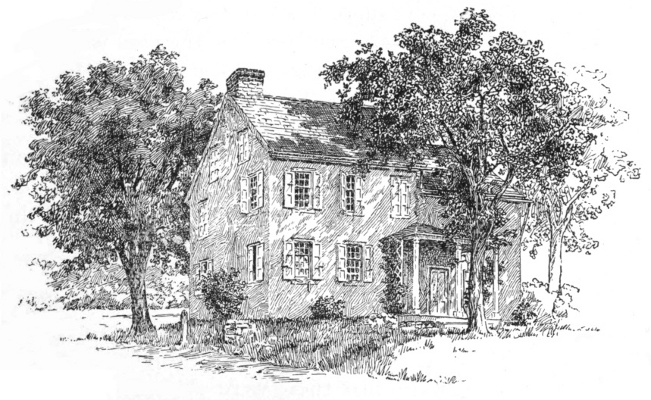
WASHINGTON’S HEADQUARTERS AT CHADD’S FORD
Howe’s letter to Burgoyne All this while Howe kept moving some of his ships, now up the Hudson, now into the Sound, now off from Sandy Hook, so that people might doubt whether his destination were the Highlands, or Boston, or Philadelphia. Probably his own mind was not fully made up until after the news from Ticonderoga. Then, amid the general exultation, he seems to have concluded that Burgoyne would be able to take care of himself, at least with such coöperation as he might get from Sir Henry Clinton. In this mood he wrote to Burgoyne as follows: “I have ... heard from the rebel army of your being in possession of Ticonderoga, which is a great event, carried without loss.... Washington is waiting our motions here, and has detached Sullivan with about 2,500 men, as I learn, to Albany. My intention is for Pennsylvania, where I expect to meet Washington; but if he goes to the northward, contrary to my expectations, and you can keep him at bay, be assured I shall soon be after him to relieve you. After your arrival at Albany, the movements of the enemy will guide yours; but my wishes are that the enemy be drove [sic] out of this province before any operation takes place in Connecticut. Sir Henry Clinton remains in the command here, and will act as occurrences may direct. Putnam is in the Highlands with about 4,000 men. Success be ever with you.” This letter, which was written on very narrow strips of thin paper, and conveyed in a quill, did not reach Burgoyne till the middle of September, when things wore a very different aspect from that which they wore in the middle of July. Nothing could better illustrate the rash, overconfident spirit in which Howe proceeded to carry out his southern scheme. A few days afterward he put to sea with the fleet of 228 sail, carrying an army of 18,000 men, while 7,000 were left in New York, under Sir Henry Clinton, to garrison the city and act according to circumstances. Just before sailing Howe wrote a letter to Burgoyne, stating that the destination of his fleet was Boston, and he artfully contrived that this letter should fall into Washington’s hands. But Washington was a difficult person to hoodwink. On reading the letter he rightly inferred that Howe had gone southward. Accordingly, recalling Sullivan and Stirling to the west side of the Hudson, he set out for the Delaware, but proceeded very cautiously, lest Howe should suddenly retrace his course, and dart up the Hudson. To guard against such an emergency, he let Sullivan advance no farther than Morristown, and kept everything in readiness for an instant counter-march. In a letter of July 30th he writes, “Howe’s in a manner abandoning Burgoyne is so unaccountable a matter that, till I am fully assured of it, I cannot help casting my eyes continually behind me.” Next day, learning that the fleet had arrived at the Capes of Delaware, he advanced to Germantown; but on the day after, when he heard that the fleet had put out to sea again, he suspected that the whole movement had been a feint.Comments of Washington and Greene He believed that Howe would at once return to the Hudson, and immediately ordered Sullivan to counter-march, while he held himself ready to follow at a moment’s notice. His best generals entertained the same opinion. “I cannot persuade myself,” said Greene, “that General Burgoyne would dare to push with such rapidity towards Albany if he did not expect support from General Howe.” A similar view of the military exigencies of the case was taken by the British officers, who, almost to a man, disapproved of the southward movement. They knew as well as Greene that, however fine a city Philadelphia might be, it was “an object of far less military importance than the Hudson river.”
Howe’s alleged reason trumped up and worthless No wonder that the American generals were wide of the mark in their conjectures, for the folly of Howe’s movements after reaching the mouth of the Delaware was quite beyond credence, and would be inexplicable to-day except as the result of the wild advice of the marplot Lee. Howe alleged as his reason for turning away from the Delaware, that there were obstructions in the river and forts to pass, and accordingly he thought it best to go around by way of Chesapeake Bay, and land his army at Elkton. Now he might easily have gone a little way up the Delaware river without encountering any obstructions whatever, and landed his troops at a point only thirteen miles east of Elkton. Instead of attempting this, he wasted twenty-four days in a voyage of four hundred miles, mostly against headwinds, in order to reach the same point! No sensible antagonist could be expected to understand such eccentric behaviour. No wonder that, after it had become clear that the fleet had gone southward, Washington should have supposed an attack on Charleston to be intended. A council of war on the 21st decided that this must be the case, and since an overland march of seven hundred miles could not be accomplished in time to prevent such an attack, it was decided to go back to New York, and operate against Sir Henry Clinton. But before this decision was acted on Howe appeared at the head of Chesapeake Bay, where he landed his forces at Elkton. It was now the 25th of August,—nine days after the battle of Bennington and three days after the flight of St. Leger. Burgoyne’s fate practically decidedSince entering Chesapeake Bay, Howe had received Lord George Germain’s letter of May 18th, telling him that whatever he had to do ought to be done in time for him to coöperate with Burgoyne. Now Burgoyne’s situation had become dangerous, and here was Howe at Elkton, fifty miles southwest of Philadelphia, with Washington’s army in front of him, and more than three hundred miles away from Burgoyne!
On hearing of Howe’s arrival at the head of Chesapeake Bay, Washington had advanced as far as Wilmington to meet him. The first proceeding of the British general, on landing at Elkton, was to issue his proclamation of amnesty; but it did not bring him many recruits. A counter-proclamation, drawn up by Luther Martin, sufficed to neutralize it. Though there were many people in the neighbourhood who cared little for the cause of independence, there were but few who sympathized with the invaders enough to render them any valuable assistance. It was through a country indifferent, perhaps, but not friendly in feeling, that the British army cautiously pushed its way northward for a fortnight, until it reached the village of Kennett Square, six miles west of the Brandywine Creek, behind which Washington had planted himself to oppose its progress.
Washington’s reasons for offering battle The time had arrived when Washington felt it necessary to offer battle, even though such a step might not be justified from purely military reasons. The people were weary of a Fabian policy which they did not comprehend, and Washington saw that, even if he were defeated, the moral effect upon the country would not be so bad as if he were to abandon Philadelphia without a blow. A victory he was hardly entitled to expect, since he had but 11,000 men against Howe’s 18,000, and since the British were still greatly superior in equipment and discipline. Under these circumstances, Washington chose his ground with his usual sagacity, and took possession of it by a swift and masterly movement. The Brandywine Creek ran directly athwart Howe’s line of march to Philadelphia. He chooses a very strong positionThough large enough to serve as a military obstacle,—in England it would be called a river,—it was crossed by numerous fords, of which the principal one, Chadd’s Ford, lay in Howe’s way. Washington placed the centre of his army just behind Chadd’s Ford and across the road. His centre was defended in front by a corps of artillery under Wayne, while Greene, on some high ground in the rear, was stationed as a reserve. Below Chadd’s Ford, the Brandywine becomes a roaring torrent, shut in between steep, high cliffs, so that the American left, resting upon these natural defences, was sufficiently guarded by the Pennsylvania militia under Armstrong. The right wing, stretching two miles up the stream, into an uneven and thickly wooded country, was commanded by Sullivan.
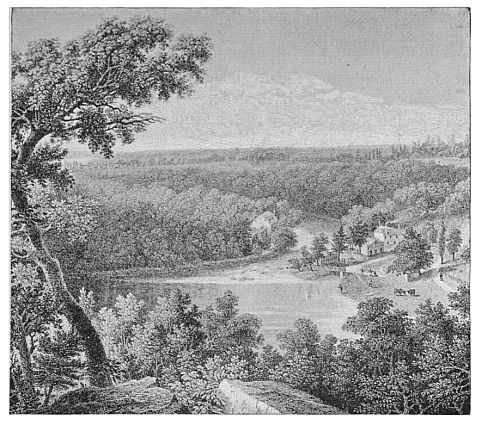
VIEW OF BRANDYWINE BATTLEFIELD
Battle of the Brandywine, Sept. 11, 1777 This was a very strong position. On the left it was practically inaccessible. To try storming it in front would be a doubtful experiment, sure to result in terrible loss of life. The only weak point was the right, which could be taken in flank by a long circuitous march through the woods. Accordingly, on the morning of the 11th of September, the British right wing, under Knyphausen, began skirmishing and occupying Washington’s attention at Chadd’s Ford; while the left column, under the energetic Cornwallis, marched up the Lancaster road, crossed the forks of the Brandywine, and turned southward toward Birmingham church, with the intention of striking the rear of the American right wing. It was similar to the flanking movement which had been tried so successfully at the battle of Long Island, a year before. It was quite like the splendid movement of Stonewall Jackson at Chancellorsville, eighty-five years afterward. In Howe’s time such flanking marches were eminently fashionable. It was in this way that the great Frederick had won some of his most astonishing victories. They were, nevertheless, then as always, dangerous expedients, as the stupendous overthrow of the Austro-Russian army at Austerlitz was by and by to show. There is always a serious chance that the tables may be turned. Such flanking movements are comparatively safe, however, when the attacking army greatly outnumbers the army attacked, as at the Brandywine. But in all cases the chief element in their success is secrecy; above all things, the party attacked must be kept in the dark.
These points are admirably illustrated in the battle of the Brandywine. The danger of a flank attack upon his right wing was well understood by Washington; and as soon as he heard that Cornwallis was marching up the Lancaster road, he considered the feasibleness of doing what Frederick would probably have done,—of crossing quickly at Chadd’s and Brinton’s fords, in full force, and crushing Knyphausen’s division. This he could doubtless have accomplished, had he been so fortunate as to have inherited an army trained by the father of Frederick the Great. But Washington’s army was not yet well trained, and its numerical inferiority was such that Knyphausen’s division might of itself be regarded as a fair match for it. The British movement was, therefore, well considered, and it was doubtless right that Washington did not return the offensive by crossing the creek. Moreover, the organization of his staff was far from complete. He was puzzled by conflicting reports as to the enemy’s movements. While considering the question of throwing his whole force against Knyphausen, he was stopped by a false report that Cornwallis was not moving upon his flank. So great was the delay in getting intelligence that Cornwallis had accomplished his long march of eighteen miles, and was approaching Birmingham church, before it was well known where he was. Nevertheless, his intention of dealing a death-blow to the American army was forestalled and partially checked. Before he had reached our right wing, Washington had ordered Sullivan to form a new front and advance toward Birmingham church. Owing to the imperfect discipline of the troops, Sullivan executed the movement rather clumsily, but enough was accomplished to save the army from rout. In the obstinate and murderous fight which ensued near Birmingham church between Cornwallis and Sullivan, the latter was at length slowly pushed back in the direction of Dilworth. To save the army from being broken in two, it was now necessary for the centre to retreat upon Chester by way of Dilworth, and this movement was accomplished by Greene with consummate skill. It was now possible for Knyphausen to advance across Chadd’s Ford against Wayne’s position; and he did so, aided by the right wing of Cornwallis’s division, which, instead of joining in the oblique pursuit toward Dilworth, kept straight onward, and came down upon Wayne’s rear. Nothing was left for Wayne and Armstrong but to retreat and join the rest of the army at Chester, and so the battle of the Brandywine came to an end.
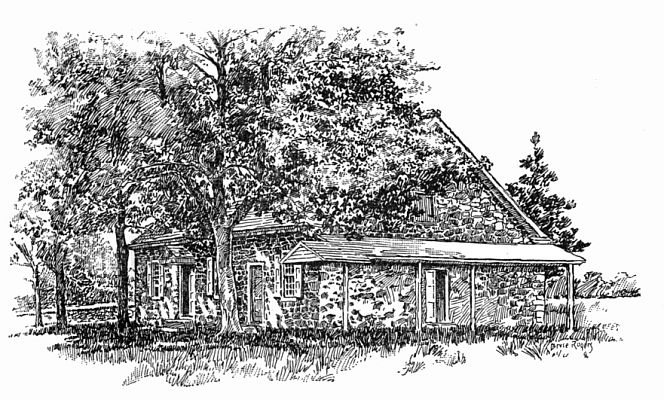
BIRMINGHAM MEETING-HOUSE
This famous battle was admirably conducted on both sides. The risk assumed in the long flanking march of Cornwallis was fully justified. The poor organization of the American army was of course well known to the British commanders, and they took advantage of the fact. Had they been dealing with an organization as efficient as their own, their course would have been foolhardy. On the other hand, when we consider the relative strength of the two armies, it is clear that the bold move of Cornwallis ought not simply to have won the field of battle. It ought to have annihilated the American army, had not its worst consequences been averted by Washington’s promptness, aided by Sullivan’s obstinate bravery and Greene’s masterly conduct of the retreat upon Dilworth. As it was, the American soldiers came out of the fight in good order. Nothing could be more absurd than the careless statement, so often made, that the Americans were “routed” at the Brandywine. Their organization was preserved, and at Chester, next day, they were as ready for fight as ever. They had exacted from the enemy a round price for the victory. The American loss was a little more than 1,000, incurred chiefly in Sullivan’s gallant struggle; rolls afterward captured at Germantown showed that the British loss considerably exceeded that figure.
Washington’s skill in detaining the enemy So far as the possession of Philadelphia was concerned, the British victory was decisive. When the news came, next morning, that the army had retreated upon Chester, there was great consternation in the “rebel capital.” Some timid people left their homes, and sought refuge in the mountains. Congress fled to Lancaster, first clothing Washington for sixty days with the same extraordinary powers which had been granted him the year before. Yet there was no need for unseemly haste, for Washington detained the victorious enemy a fortnight on the march of only twenty-six miles; a feat which not even Napoleon could have performed with an army that had just been “routed.” He had now heard of Stark’s victory and St. Leger’s flight, and his letters show how clearly he foresaw Burgoyne’s inevitable fate, provided Howe could be kept away from him. To keep Howe’s whole force employed near Philadelphia as long as possible was of the utmost importance. The British enter Philadelphia, Sept. 26Accordingly, during the fortnight following the battle of the Brandywine, every day saw manœuvres or skirmishes, in one of which General Wayne was defeated by Sir Charles Gray, with a loss of three hundred men. On the 26th, while Howe established his headquarters at Germantown, Cornwallis entered Philadelphia in triumph, marching with bands of music and flying colours, and all the troops decked out in their finest scarlet array.
Significance of Forts Mercer and Mifflin Having got possession of the “rebel capital,” the question now arose whether it would be possible to hold it through the winter. The Delaware river, below the city, had been carefully obstructed by chevaux-de-frise, which were guarded by two strong fortresses,—Fort Mifflin on an island in mid-stream, and Fort Mercer on the Jersey shore. The river was here about two miles in width, but it was impossible for ships to pass until the forts should have been reduced. About the first of October, after a rough return voyage of four hundred miles, Lord Howe’s fleet appeared at the mouth of the Delaware. It was absolutely necessary to gain control of the river, in order that the city might get supplies by sea; for so long as Washington’s army remained unbroken, the Americans were able to cut off all supplies by land. Sir William Howe, therefore, threw a portion of his forces across the river, to aid his brother in reducing the forts. The quick eye of Washington now saw an opportunity for attacking the main British army, while thus temporarily weakened; and he forthwith planned a brilliant battle, which was, however, fated to be lost by a singular accident.
The situation at Germantown The village of Germantown, by the bank of the Schuylkill river, was then separated from Philadelphia by about six miles of open country. The village consisted chiefly of a single street, about two miles in length, with stone houses on either side, standing about a hundred yards apart from each other, and surrounded by gardens and orchards. Near the upper end of the street, in the midst of ornamental shrubbery, vases, and statues, arranged in a French style of landscape gardening, stood the massively built house of Benjamin Chew, formerly Chief Justice of Pennsylvania. About a mile below, at the Market House, the main street was crossed at right angles by the Old School Lane. Beside the main street, running over Chestnut Hill, the village was approached from the northward by three roads. The Monatawny road ran down by the bank of the Schuylkill, and, crossing the Old School Lane, bore on toward Philadelphia. The Limekiln road, coming from the northeast, became continuous with the Old School Lane. The Old York road, still farther eastward, joined the main street at the Rising Sun tavern, about two miles below the Market House.
The British army lay encamped just behind the Old School Lane, in the lower part of the village: the left wing, under Knyphausen, to the west of the main street; the right, under Grant, to the east. A strong detachment of chasseurs, under Sir Charles Grey, covered the left wing. About a mile in advance of the army, Colonel Musgrave’s regiment lay in a field opposite Judge Chew’s house; and yet a mile farther forward a battalion of light infantry was stationed on the slight eminence known as Mount Airy, where a small battery commanded the road to the north.
Washington’s audacious plan Washington’s plan of attack seems to have contemplated nothing less than the destruction or capture of the British army. His forces were to advance from the north by all four roads at once, and converge upon the British at the Market House. The American right wing, under Sullivan, and consisting of Sullivan’s own brigade, with those of Conway, Wayne, Maxwell, and Nash, was to march down the main street, overwhelm the advanced parties of the British, and engage their left wing in front; while Armstrong, with the Pennsylvania militia, was to move down the Monatawny road, and take the same wing in flank. The American left wing, commanded by Greene, was also to proceed in two columns. Greene, with his own brigade, supported by Stephen and McDougal, was to march down the Limekiln road, and assail the British right wing in front and in flank; while Smallwood and Forman, coming down the Old York road, were to strike the same wing in the rear. The flank attack upon the British left, entrusted as it was to militia, was intended merely as a demonstration. The attack upon their right, conducted by more than half of the American army, including its best troops, was intended to crush that wing, and folding back the whole British army upon the Schuylkill river, compel it to surrender.
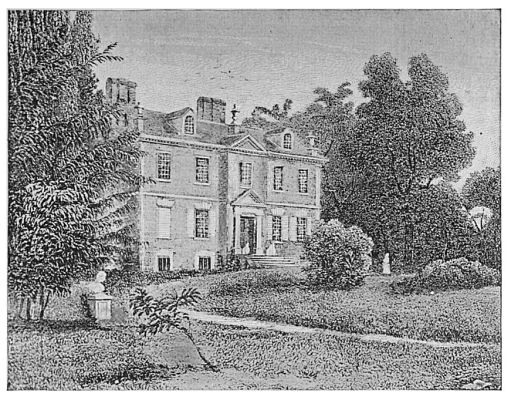
JUDGE CHEW’S HOUSE AT GERMANTOWN
Battle of Germantown, Oct. 4 Considering that the Americans had not even yet a superiority in numbers, this was a most audacious plan. No better instance could be given of the spirit of wild and venturous daring which was as conspicuous in Washington as his cautious vigilance, whenever any fit occasion arose for displaying it. The scheme came surprisingly near to success; so near as to redeem it from the imputation of fool-hardiness, and to show that here, as in all Washington’s military movements, cool judgment went along with fiery dash. At seven in the evening of the 3d of October, the night march upon Germantown began, Washington accompanying Sullivan’s column. At sunrise a heavy fog came up, and the darkness went on increasing. Soon after the hour of daybreak the light infantry upon Mount Airy were surprised and routed, and the battery was captured. Musgrave was next overwhelmed by the heavy American column; but he, with a small force, took refuge in Judge Chew’s house, and set up a brisk fire from the windows. The Americans opened an artillery-fire upon the house, but its stone walls were too solid to be beaten down by the three-pound and six-pound field-pieces of that day; and so Maxwell’s brigade was left behind to besiege the house, while the rest of the column rushed on down the street. The chief effect of this incident was to warn the enemy, while retarding and somewhat weakening the American charge. Nevertheless, the fury of the attack was such as to disconcert Knyphausen’s veterans, and the British left wing slowly gave way before Sullivan. At this moment, Greene, who had also been delayed, attacked the right wing with such vigour as presently to force it back toward the Market House. The British ranks were falling into confusion, and Smallwood’s column had already arrived upon their right flank, when the accident occurred which changed the fortunes of the day. From the beginning the dense fog had been a source of confusion to both armies, and had seriously interfered with the solidity of the American advance. Now, as Stephen’s brigade, on the right of Greene’s column, came into the village, the heavy firing at Judge Chew’s seems to have caused him to diverge more and more to the west, in the belief that there was the thick of the battle. At the same time, Wayne, in driving the enemy before him, had swayed somewhat to the east, so that his brigade stood almost directly in the line of Stephen’s progress. In this position he was attacked by Stephen, who mistook him for the enemy. This lamentable blunder instantly ruined the battle. Wayne’s men, thus fiercely attacked in the rear, and struggling to extricate themselves, were thrown upon the left flank of Sullivan’s brigade, and a panic suddenly ran through the army. The confusion grew worse and worse, till a general retreat began, and Grey, who had come up to support the crumbling right wing of the British, was now able to lead in the pursuit of the Americans. He was joined by Cornwallis, who had sprung from his bed in Philadelphia at the first sound of the cannon, and had brought up two battalions with him at double-quick. But the panic had subsided almost as soon as the golden moment of victory was lost, and the retreat was conducted in excellent order. One regiment in Greene’s column was surrounded and captured, but the army brought away all its cannon and wounded, with several cannon taken from the enemy. The loss of the Americans in killed and wounded was 673, and the loss of the British was 535.
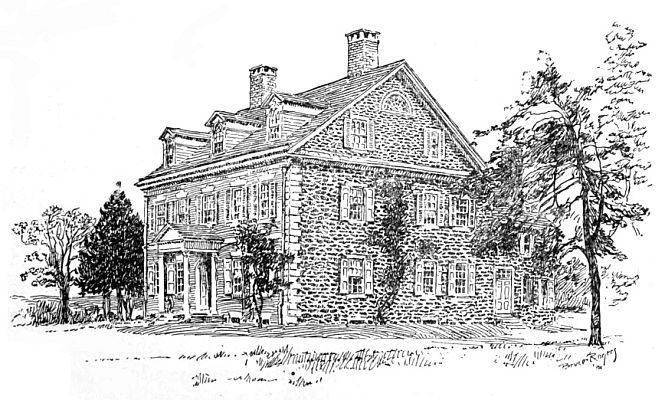
HOUSE AT GERMANTOWN OCCUPIED BY THE BRITISH
The fog which enshrouded the village of Germantown on that eventful morning has been hardly less confusing to historians than it was to the armies engaged. The reports of different observers conflicted in many details, and particularly as to the immediate occasion of the fatal panic. The best accounts agree, however, that the entanglement of Stephen with Wayne was chiefly responsible for the disaster. It was charged against Stephen that he had taken too many pulls at his canteen on the long, damp night march, and he was tried by court-martial, and dismissed from the service. The chagrin of the Americans at losing the prize so nearly grasped was profound. The total rout of Howe, coming at the same time with the surrender of Burgoyne, would probably have been too much for Lord North’s ministry to bear, and might have brought the war to a sudden close. As it was, the British took an undue amount of comfort in the acquisition of Philadelphia, though so long as Washington’s army remained defiant it was of small military value to them. On the other hand, the genius and audacity shown by Washington, in thus planning and so nearly accomplishing the ruin of the British army only three weeks after the defeat at the Brandywine, produced a profound impression upon military critics in Europe. Frederick of Prussia saw that presently, when American soldiers should come to be disciplined veterans, they would become a formidable instrument in the hands of their great commander; and the French court, in making up its mind that the Americans would prove efficient allies, is said to have been influenced almost as much by the battle of Germantown as by the surrender of Burgoyne.
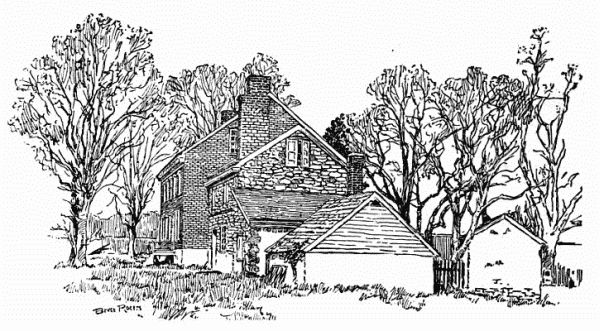
WHITHALL HOUSE AT FORT MERCER WHERE DONOP DIED
Howe captures Forts Mercer and Mifflin Having thus escaped the catastrophe which Washington had designed for him, the British commander was now able to put forth his utmost efforts for the capture of the forts on the Delaware. His utmost efforts were needed, for in the first attack on Fort Mercer, October 22, the Hessians were totally defeated, with the loss of Count Donop and 400 men, while the Americans lost but 37. But after a month of hard work, with the aid of 6,000 more men sent from New York by Clinton, both forts were reduced, and the command of the Delaware was wrested from the Americans. Another month of manœuvring and skirmishing followed, and then Washington took his army into winter-quarters at Valley Forge. The events which attended his sojourn in that natural stronghold belong to a later period of the war. We must now return to the upper waters of the Hudson, and show how the whole period, which may be most fitly described as a struggle for the control of the great central state of New York, was brought to an end by the complete and overwhelming victory of the Americans.
Burgoyne recognizes the fatal error of Germain We have seen how it became impossible for Howe to act upon Lord George Germain’s order, received in August, in Chesapeake Bay, and get back to the Hudson in time to be of any use to Burgoyne. We have also seen how critical was the situation in which the northern general was left, after the destruction of Baum and St. Leger, and the accumulation of New England yeomanry in his rear. Burgoyne now fully acknowledged the terrible mistake of the ministry in assuming that the resistance of the Americans was due to the machinations of a few wily demagogues, and that the people would hail the approach of the king’s troops as deliverers. “The great bulk of the country,” said he, “is undoubtedly with the Congress in principle and zeal, and their measures are executed with a secrecy and dispatch that are not to be equalled.... The Hampshire Grants, in particular, a country unpeopled and almost unknown last war, now abounds in the most active and most rebellious race on the continent, and hangs like a gathering storm upon my left.” The situation had, indeed, become so alarming that it is hard to say what Burgoyne ought to have done. A retreat upon Ticonderoga would have been fraught with peril, while to cross the Hudson and advance upon Albany would be doing like Cortes, when he scuttled his ships. But Burgoyne was a man of chivalrous nature. He did not think it right or prudent to abandon Sir William Howe, whom he still supposed to be coming up the river to meet him. In a letter to Lord George Germain, written three days after the surrender, he says, “The difficulty of a retreat upon Canada was clearly foreseen, as was the dilemma, should the retreat be effected, of leaving at liberty such an army as General Gates’s to operate against Sir William Howe. This consideration operated forcibly to determine me to abide events as long as possible, and I reasoned thus: the expedition which I commanded was at first evidently intended to be hazarded; circumstances might require it should be devoted.”
Nevertheless he crosses the Hudson Influenced by these views, which were supported by all his generals except Riedesel, Burgoyne threw a bridge of boats across the Hudson, and passed over with whole army on the 13th of September. The Americans had taken a strong position on Bemis Heights, where Kosciuszko had skilfully fortified their camp with batteries and redoubts. Burgoyne felt that the time for desperate fighting had now come, and it seemed to him that the American position might be turned and carried by an attack upon its left flank. On the morning of the 19th, he advanced through the woods, with the centre of his army, toward the point where the Quaker road passed Bemis Heights. The right wing, under Fraser, proceeded somewhat more circuitously toward the same point, the plan being that they should join forces and strike the rear of the American camp, while Riedesel and Phillips, with the left wing and the artillery, marching down the river road, should assail it in front. First battle at Freeman’s Farm, Sept. 19; indecisiveThree heavy guns, announcing to the left wing the junction of Burgoyne and Fraser, were to give the signal for a general assault. American scouts, lurking among the upper branches of tall trees that grew on steep hillsides, presently caught glimpses of bright scarlet flitting through the green depths of the forest, while the long sunbeams that found their way through the foliage sent back quick burning flashes from a thousand bayonets. By noon the course of the British march and their plan of attack had been fully deciphered, and the intelligence was carried to Arnold, who commanded the left wing of the American army. Gates appears to have been unwilling to let any of the forces descend from their strong position; but the fiery Arnold urged and implored, until he got permission to take Morgan’s riflemen and Dearborn’s infantry, and go forth to attack the enemy. Arnold’s advance, under Morgan, first fell upon Burgoyne’s advance, at Freeman’s Farm, and checked its progress. Fraser then, hearing the musketry, turned eastward to the rescue, while Arnold, moving upon Fraser’s left, sought to cut him asunder from Burgoyne. He seemed to be winning the day, when he was attacked in flank by Riedesel, who had hurried up from the river road. Arnold had already sent to Gates for reinforcements, which were refused him. Arnold maintained that this was a gross blunder on the part of the commanding general, and that with 2,000 more men he could now easily have crushed the British centre and defeated their army. In this opinion he was probably right, since even as it was he held his own, in a desperate fight, for two hours, until darkness put an end to the struggle. The losses on each side are variously estimated at from 600 to 1,000, or from one fifth to one fourth of the forces engaged, which indicates severe fighting. Arnold’s command had numbered about 3,000, and he had been engaged, in the course of the afternoon, with at least 4,000 of Burgoyne’s army; yet all this while some 11,000 Americans—most of the army in short—had been kept idle on Bemis Heights by the incompetent Gates. Burgoyne tried to console himself with the idea that he had won a victory, because his army slept that night at Freeman’s Farm; but in his testimony given afterward before the House of Commons, he rightly maintained that his plan of attack had been utterly defeated by the bold and skilful tactics of “Mr.” Arnold.
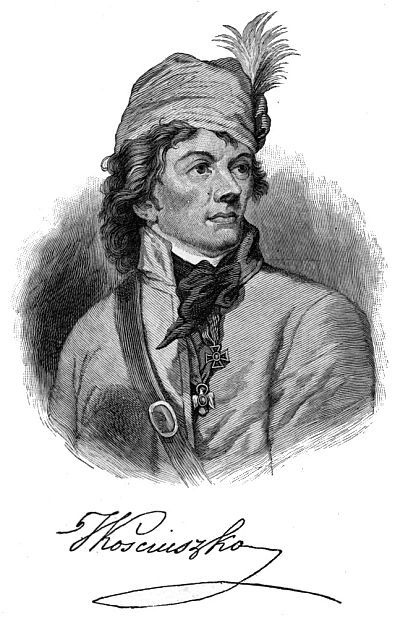
In the dispatches which he now sent to Congress, Gates took to himself all the credit of this affair, and did not even mention Arnold’s name. The army, however, rang with praise of the fighting general, until Gates, who never could bear to hear any one but himself well spoken of, waxed wroth and revengeful. Arnold, moreover, freely blamed Gates for not supporting him, and for refusing to renew the battle on the next morning, while the enemy were still disconcerted. Arnold’s warm friendship with Schuyler gave further offence to the commander; and three days after the battle he sought to wreak his spite by withdrawing Morgan’s riflemen and Dearborn’s light infantry from Arnold’s division. A fierce quarrel ensued, in the course of which Gates told Arnold that as soon as Lincoln should arrive he would have no further use for him, and he might go back to Washington’s camp as soon as he liked. Arnold, in a white rage, said he would go, and asked for a pass, which his enemy promptly gave him; but after receiving it, second thoughts prevented him from going. All the general officers except Lincoln—who seems to have refrained from unwillingness to give umbrage to a commander so high in the good graces of Massachusetts as Gates—united in signing a letter entreating Arnold to remain. He had been sent here by Washington to aid the northern army, and clearly it would be wrong to leave it now, on the eve of a decisive battle. So the proud, fiery soldier, smarting under an accumulation of injuries, made up his mind once more to swallow the affront, and wait for a chance to make himself useful. He stayed in his quarters, awaiting the day of battle, though it was not clear how far he was entitled, under the circumstances, to exercise command, and Gates took no more notice of him than if he had been a dog.
Burgoyne’s supplies cut off Nothing more was done for eighteen days. Just before the crossing of the Hudson by the northern army, Sir Henry Clinton, acting “as circumstances may direct,” had planned an expedition up the river in aid of it; and Burgoyne, hearing of this the day after the battle at Freeman’s Farm, thought it best to wait a while before undertaking another assault upon the American lines. But things were swiftly coming to such a pass that it would not do to wait. On the 21st, news came to the British camp that a detachment of Lincoln’s troops had laid siege to Ticonderoga, and, while holding the garrison in check, had captured several ships and taken 300 prisoners. A day or two later came the news that these New Englanders had embarked on Lake George in the ships they had captured, and were cutting off the last sources of supply. And now, while even on shortest rations there was barely three weeks’ food for the army, Lincoln’s main force appeared in front, thus swelling the numbers of the American army to more than 16,000. The case had become as desperate as that of the Athenians at Syracuse before their last dreadful battle in the harbour. So, after eighteen weary days, no word yet coming from Clinton, the gallant Burgoyne attempted, by a furious effort, to break through the lines of an army that now outnumbered him more than three to one.
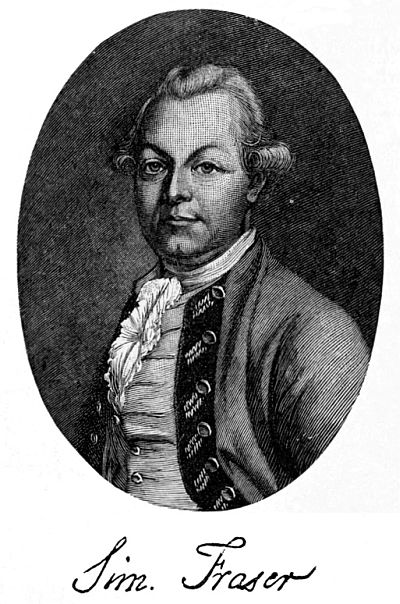
Second battle at Freeman’s Farm, Oct. 7; the British totally defeated by Arnold On the morning of October 7th, leaving the rest of his army in camp, Burgoyne advanced with 1,500 picked men to turn the American left. Small as the force was, its quality was superb, and with it were the best commanders,—Phillips, Riedesel, Fraser, Balcarras, and Ackland. Such a compact force, so ably led, might manœuvre quickly. If, on sounding the American position on the left, they should find it too strong to be forced, they might swiftly retreat. At all events, the movement would cover a foraging party which Burgoyne had sent out,—and this was no small matter. Arnold, too, the fighting general, it was reported, held no command; and Gates was known to be a sluggard. Such thoughts may have helped to shape the conduct of the British commander on this critical morning. But the scheme was swiftly overturned. As the British came on, their right was suddenly attacked by Morgan, while the New England regulars with 3,000 New York militia assailed them in front. After a short, sharp fight against overwhelming numbers, their whole line was broken, and Fraser sought to form a second line a little farther back, on the west border of Freeman’s Farm, though the ranks were badly disordered and all their cannon were lost. At this moment, Arnold, who had been watching from the heights, saw that a well-directed blow might not only ruin this retreating column, but also shatter the whole British army. Quick as thought he sprang upon his horse, and galloped to the scene of action. He was greeted with deafening hurrahs, and the men, leaping with exultation at sight of their beloved commander, rushed upon Fraser’s half-formed line. At the same moment, while Morgan was still pressing on the British right, one of his marksmen shot General Fraser, who fell, mortally wounded, just as Arnold charged with mad fury upon his line. The British, thus assailed in front and flank, were soon pushed off the field. Arnold next attacked Lord Balcarras, who had retired behind intrenchments at the north of Freeman’s Farm; but finding the resistance here too strong, he swept by, and charged upon the Canadian auxiliaries, who occupied a position just north of Balcarras, and covered the left wing of Breymann’s forces at the extreme right of the British camp. The Canadians soon fled, leaving Breymann uncovered; and Arnold forthwith rushed against Breymann on the left, just as Morgan, who had prolonged his flanking march, assailed him on the right. Breymann was slain and his force routed; the British right wing was crushed, and their whole position taken in reverse and made untenable. Just at this moment, a wounded German soldier, lying on the ground, took aim at Arnold, and slew his horse, while the ball passed through the general’s left leg, that had been wounded at Quebec, and fractured the bone a little above the knee. As Arnold fell, one of his men rushed up to bayonet the wounded soldier who had shot him, when the prostrate general cried, “For God’s sake, don’t hurt him; he’s a fine fellow!” The poor German was saved, and this was the hour when Benedict Arnold should have died. His fall and the gathering twilight stopped the progress of the battle, but the American victory was complete and decisive. Nothing was left for Burgoyne but to get the wreck of his army out of the way as quickly as possible, and the next day he did so, making a slow retreat upon Saratoga, in the course of which his soldiers burned General Schuyler’s princely country-house, with its barns and granaries.
As the British retreated, General Gates steadily closed in upon them with his overwhelming forces, which now numbered 20,000. Gates—to give him due credit—knew how to be active after the victory, although, when fighting was going on, he was a general of sedentary habits. When Arnold rushed down, at the critical moment, to complete the victory of Saratoga, Gates sent out Major Armstrong to stop him. “Call back that fellow,” said Gates, “or he will be doing something rash!” But the eager Arnold had out-galloped the messenger, and came back only when his leg was broken and the victory won. In the mean time Gates sat at his headquarters, forgetful of the battle that was raging below, while he argued the merits of the American Revolution with a wounded British officer, Sir Francis Clerke, who had been brought in and laid upon the commander’s bed to die. Losing his temper in the discussion, Gates called his adjutant, Wilkinson, out of the room, and asked him, “Did you ever hear so impudent a son of a b——h?” And this seems to have been all that the commanding general contributed to the crowning victory of Saratoga.
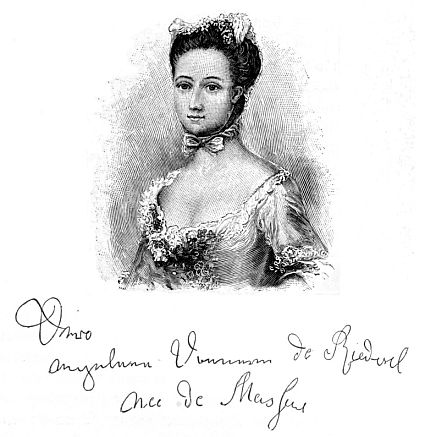
The British army is surrounded When Burgoyne reached the place where he had crossed the Hudson, he found a force of 3,000 Americans, with several batteries of cannon occupying the hills on the other side, so that it was now impossible to cross. A council of war decided to abandon all the artillery and baggage, push through the woods by night, and effect a crossing higher up, by Fort Edward, where the great river begins to be fordable. But no sooner had this plan been made than word was brought that the Americans were guarding all the fords, and had also planted detachments in a strong position to the northward, between Fort Edward and Fort George. The British army, in short, was surrounded. A brisk cannonade was opened upon it from the east and south, while Morgan’s sharpshooters kept up a galling fire in the rear. Some of the women and wounded men were sent for safety to a large house in the neighbourhood, where they took refuge in the cellar; and there the Baroness Riedesel tells us how she passed six dismal nights and days, crouching in a corner near the doorway, with her three little children clinging about her, while every now and then, with hideous crashing, a heavy cannon-ball passed through the room overhead. The cellar became crowded with crippled and dying men. But little food could be obtained, and the suffering from thirst was dreadful. It was only a few steps to the river, but every man who ventured out with a bucket was shot dead by Virginia rifles that never missed their aim. At last the brave wife of a British soldier volunteered to go; and thus the water was brought again and again, for the Americans would not fire at a woman.
Clinton comes up the Hudson, but it is too late And now, while Burgoyne’s last ray of hope was dying, and while the veteran Phillips declared himself heartbroken at the misery which he could not relieve, where was Sir Henry Clinton? He had not thought it prudent to leave New York until after the arrival of 3,000 soldiers whom he expected from England. These men arrived on the 29th of September, but six days more elapsed before Sir Henry had taken them up the river and landed them near Putnam’s headquarters at Peekskill. In a campaign of three days he outwitted that general, carried two of the forts after obstinate resistance, and compelled the Americans to abandon the others; and thus laid open the river so that British ships might go up to Albany. On the 8th of October, Sir Henry wrote to Burgoyne from Fort Montgomery: “Nous y voici, and nothing between us and Gates. I sincerely hope this little success of ours will facilitate your operations.” This dispatch was written on a scrap of very thin paper, and encased in an oval silver bullet, which opened with a tiny screw in the middle. Sir Henry then sent General Vaughan, with several frigates and the greater part of his force, to make all haste for Albany. As they passed up the river, the next day, they could not resist the temptation to land and set fire to the pretty village of Kingston, then the seat of the state legislature. George Clinton, governor of the state, just retreating from his able defence of the captured forts, hastened to protect the village, but came up only in time to see it in flames from one end to the other. Just then Sir Henry’s messenger, as he skulked by the roadside, was caught and taken to the governor. He had been seen swallowing something, so they gave him an emetic, and obtained the silver bullet. The dispatch was read; the bearer was hanged to an apple-tree; and Burgoyne, weary with waiting for the news that never came, at last sent a flag of truce to General Gates, inquiring what terms of surrender would be accepted.
Burgoyne surrenders, Oct. 17 Gates first demanded an unconditional surrender, but on Burgoyne’s indignant refusal he consented to make terms, and the more readily, no doubt, since he knew what had just happened in the Highlands, though his adversary did not. After three days of discussion the terms of surrender were agreed upon. Just as Burgoyne was about to sign the articles, a Tory made his way into camp with hearsay news that part of Clinton’s army was approaching Albany. The subject was then anxiously reconsidered by the British officers, and an interesting discussion ensued as to whether they had so far pledged their faith to the surrender that they could not in honour draw back. The majority of the council decided that their faith was irrevocably pledged, and Burgoyne yielded to this opinion, though he did not share it, for he did not feel quite clear that the rumoured advance of Clinton could now avail to save him in any case. In this he was undoubtedly right. The American army, with its daily accretions of militia, had now grown to more than 20,000, and armed yeomanry were still pouring in by the hundred. A diversion threatened by less than 3,000 men, who were still more than fifty miles distant, could hardly have averted the doom of the British army. The only effect which it did produce was, perhaps, to work upon the timid Gates, and induce him to offer easy terms in order to hasten the surrender. On the 17th of October, accordingly, the articles were signed, exchanged, and put in execution. It was agreed that the British army should march out of camp with the honours of war, and pile their arms at an appointed place; they should then march through Massachusetts to Boston, from which port they might sail for Europe, it being understood that none of them should serve again in America during the war; all the officers might retain their small arms, and no one’s private luggage should be searched or molested. At Burgoyne’s earnest solicitation the American general consented that these proceedings should be styled a “convention,” instead of a surrender, in imitation of the famous Convention of Kloster-Seven, by which the Duke of Cumberland, twenty years before, had sought to save his feelings while losing his army, beleaguered by the French in Hanover. The soothing phrase has been well remembered by British historians, who to this day continue to speak of Burgoyne’s surrender as the “Convention of Saratoga.”
In carrying out the terms of the convention, both Gates and his soldiers showed praiseworthy delicacy. As the British marched off to a meadow by the river side and laid down their arms, the Americans remained within their lines, refusing to add to the humiliation of a gallant enemy by standing and looking on. As the disarmed soldiers then passed by the American lines, says Lieutenant Anbury, one of the captured officers, “I did not observe the least disrespect or even a taunting look, but all was mute astonishment and pity.” Burgoyne stepped up and handed his sword to Gates, simply saying, “The fortune of war, General Gates, has made me your prisoner.” The American general instantly returned the sword, replying, “I shall always be ready to testify that it has not been through any fault of your excellency.” When Baron Riedesel had been presented to Gates and the other generals, he sent for his wife and children. Set free at last from the dreadful cellar, the baroness came with some trepidation into the enemy’s camp; but the only look she saw upon any face was one of sympathy. “As I approached the tents,” she says, “a noble-looking gentleman came toward me, and took the children out of the wagon; embraced and kissed them; and then, with tears in his eyes, helped me also to alight.... Presently he said, ‘It may be embarrassing to you to dine with so many gentlemen. If you will come with your children to my tent, I will give you a frugal meal, but one that will at least be seasoned with good wishes.’ ‘Oh, sir,’ I cried, ‘you must surely be a husband and a father, since you show me so much kindness!’ I then learned that it was General Schuyler.”
Schuyler’s magnanimity Schuyler had indeed come, with unruffled soul, to look on while the fruit which he had sown, with the gallant aid of Stark and Herkimer, Arnold and Morgan, was plucked by an unworthy rival. He now met Burgoyne, who was naturally pained and embarrassed at the recollection of the beautiful house which his men had burned a few days before. In a speech in the House of Commons, some months later, Burgoyne told how Schuyler received him. “I expressed to General Schuyler,” says Burgoyne, “my regret at the event which had happened, and the reasons which had occasioned it. He desired me to think no more of it, saying that the occasion justified it, according to the rules of war.... He did more: he sent an aide-de-camp to conduct me to Albany, in order, as he expressed it, to procure me better quarters than a stranger might be able to find. This gentleman conducted me to a very elegant house, and, to my great surprise, presented me to Mrs. Schuyler and her family; and in this general’s house I remained during my whole stay at Albany, with a table of more than twenty covers for me and my friends, and every other possible demonstration of hospitality.” Madame Riedesel was also invited to stay with the Schuylers; and when first she arrived in the house, one of her little girls exclaimed, “Oh, mamma! Is this the palace that papa was to have when he came to America?” As the Schuylers understood German, the baroness coloured, but all laughed pleasantly, and put her at ease.
Bad faith of Congress
With the generosity and delicacy shown alike by generals and soldiers,
it is painful, though instructive, to contrast the coarseness and bad
faith with which Congress proceeded to treat the captured army. The
presence of the troops in and about Boston was felt to be a hardship,
and General Heath, who commanded there, wrote to Washington, saying that
if they were to stay till cold weather he hardly knew how to find
shelter and fuel for them. Washington replied that they would not be
likely to stay long, since it was clearly for Howe’s interest to send
them back to England as soon as possible, in order that they might
replace other soldiers who would be sent over to America for the spring
campaign. Congress caught up this suggestion with avidity, and put it to
uses quite remote from Washington’s meaning. When Sir William Howe
proposed Newport as a point from which the soldiers might more speedily
be shipped, Washington, for sound and obvious reasons, urged that there
should be no departure from the strict letter of the convention.
Congress forthwith not only acted upon this suggestion so far as to
refuse Sir William Howe’s request, but it went on gratuitously and
absurdly to charge the British general with bad faith. It was hinted
that he secretly intended to bring the troops to New York for immediate
service, in defiance of the convention, and Congress proceeded to make
this imputed treachery the ground for really false dealing on its own
part. When Lord Howe’s transports reached Boston, it was not only
ordered that no troops should be allowed to embark until all the
accounts for their subsistence should have been settled, but it was also
required that these accounts should be liquidated in gold. In the
instructions given to General Washington a year before, a refusal on the
part of anybody to receive the Continental paper money was to be treated
as a high misdemeanour. Now Congress refused to take its own money,
which had depreciated till it was worth barely thirty cents on a dollar.
The captured army was supplied with provisions and fuel that were paid
for by General Heath with Continental paper, and now Congress insisted
that General Burgoyne should make his repayment dollar for dollar in
British gold, worth three times as much.
 In fairness to the delegates,
we may admit that in all probability they did not realize the baseness
of this conduct. They were no doubt misled by one of those wonderful
bits of financial sophistry by which the enacting mind of our countrymen
has so often been hopelessly confused. In an amusing letter to
Washington, honest General Heath naïvely exclaims, “What an opinion must
General Burgoyne have of the authority of these states, to suppose that
his money would be received at any higher rate than our own in public
payment! Such payment would at once be depreciating our currency with a
witness.” Washington was seriously annoyed and mortified by these
vagaries,—the more so that he was at this very time endeavouring to
arrange with Howe a general cartel for the exchange of prisoners; and he
knew that the attempt to make thirty cents equal to a dollar would, as
he said, “destroy the very idea of a cartel.”
In fairness to the delegates,
we may admit that in all probability they did not realize the baseness
of this conduct. They were no doubt misled by one of those wonderful
bits of financial sophistry by which the enacting mind of our countrymen
has so often been hopelessly confused. In an amusing letter to
Washington, honest General Heath naïvely exclaims, “What an opinion must
General Burgoyne have of the authority of these states, to suppose that
his money would be received at any higher rate than our own in public
payment! Such payment would at once be depreciating our currency with a
witness.” Washington was seriously annoyed and mortified by these
vagaries,—the more so that he was at this very time endeavouring to
arrange with Howe a general cartel for the exchange of prisoners; and he
knew that the attempt to make thirty cents equal to a dollar would, as
he said, “destroy the very idea of a cartel.”
While these discussions were going on, Congress, like the wicked king in the fairy tale, anxious to impose conditions unlikely to be fulfilled, demanded that General Burgoyne should make out a descriptive list of all the officers and soldiers in his army, in order that if any of them should thereafter be found serving against the United States they might be punished accordingly. As no such provision was contained in the convention, upon the faith of which Burgoyne had surrendered, he naturally regarded the demand as insulting, and at first refused to comply with it. He afterwards yielded the point, in his eagerness to liberate his soldiers; but meanwhile, in a letter to Gates, he had incautiously let fall the expression, “The publick faith is broke [sic];” and this remark, coming to the ears of Congress, was immediately laid hold of as a pretext for repudiating the convention altogether. It was argued that Burgoyne had charged the United States with bad faith, in order to have an excuse for repudiating the convention on his own part; and on the 8th of January, Congress accordingly resolved, “that the embarkation of Lieutenant-General Burgoyne and the troops under his command be suspended till a distinct and explicit ratification of the Convention of Saratoga shall be properly notified by the court of Great Britain to Congress.” Now as the British government could not give the required ratification without implicitly recognizing the independence of the United States, no further steps were taken in the matter, the “publick faith” was really broken, and the captured army was never sent home.
ENCAMPMENT OF THE CONVENTION TROOPS IN VIRGINIA
The behavior of Congress was simply inexcusable In this wretched affair, Congress deliberately sacrificed principle to policy. It refused, on paltry pretexts, to carry out a solemn engagement which had been made by its accredited agent; and it did so simply through the fear that the British army might indirectly gain a possible reinforcement. Its conduct can be justified upon no grounds save such as would equally justify firing upon flags of truce. Nor can it be palliated even upon the lowest grounds of expediency, for, as it has been well said, “to a people struggling for political life the moral support derivable from the maintenance of honour and good faith was worth a dozen material victories." This sacrifice of principle to policy has served only to call down the condemnation of impartial historians, and to dim the lustre of the magnificent victory which the valour of our soldiers and the self-devotion of our people had won in the field. It was one out of many instances which show that, under any form of government, the moral sense of the governing body is likely to fall far below the highest moral standard recognized in the community.
What became of the captured army The captured army was never sent home. The officers were treated as prisoners of war, and from time to time were exchanged. Burgoyne was allowed to go to England in the spring, and while still a prisoner on parole he took his seat in Parliament, and became conspicuous among the defenders of the American cause. The troops were detained in the neighbourhood of Boston until the autumn of 1778, when they were all transferred to Charlottesville in Virginia. Here a rude village was built on the brow of a pleasant ridge of hills, and gardens were laid out and planted. Much kind assistance was rendered in all this work by Thomas Jefferson, who was then living close by, on his estate at Monticello, and did everything in his power to make things comfortable for soldiers and officers. Two years afterward, when Virginia became the seat of war, some of them were removed to Winchester in the Shenandoah valley, to Frederick in Maryland, and to Lancaster in Pennsylvania. Those who wished to return to Europe were exchanged or allowed to escape. The greater number, especially of the Germans, preferred to stay in this country and become American citizens. Before the end of 1783 they had dispersed in all directions.
Such was the strange sequel of a campaign which, whether we consider the picturesqueness of its incidents or the magnitude of its results, was one of the most memorable in the history of mankind. Its varied scenes, framed in landscapes of grand and stirring beauty, had brought together such types of manhood as the feathered Mohawk sachem, the helmeted Brunswick dragoon, and the blue-frocked yeoman of New England,—types of ancient barbarism, of the militancy bequeathed from the Middle Ages, and of the industrial democracy that is to possess and control the future of the world. These men had mingled in a deadly struggle for the strategic centre of the Atlantic coast of North America, and now the fight had ended in the complete and overwhelming defeat of the forces of George III. Four years, indeed,—four years of sore distress and hope deferred,—were yet to pass before the fruits of this great victory could be gathered. The independence of the United States was not yet won; but the triumph at Saratoga set in motion a train of events from which the winning of independence was destined surely to follow.
| CHAPTER VIII THE FRENCH ALLIANCE | |
|---|---|
| PAGE | |
| The four periods of the Revolutionary war | 1-3 |
| Consequences of Saratoga; consternation in England | 4 |
| Views of the different parties | 5, 6 |
| Lord North’s political somersault | 6 |
| Strange scene in the House of Commons | 7, 8 |
| Treaty between France and the United States (February 6, 1778) | 8, 9 |
| Great Britain declares war against France (March 13) | 10 |
| Demand for Lord Chatham for prime minister | 11, 12 |
| The king’s rage | 12, 13 |
| What Chatham would have tried to do | 13, 14 |
| Death of Chatham | 14-16 |
| His prodigious greatness | 16-20 |
| Lord North remains in power | 20, 21 |
| His commissioners in America fail to accomplish anything | 22 |
| Germain’s new plan for conducting the war | 22, 23 |
| CHAPTER IX VALLEY FORGE | |
| Distress in America | 24 |
| Lack of organization | 25 |
| Vexatious meddling of Congress with the army | 26 |
| Sufferings at Valley Forge | 27 |
| Promoting officers for non-military reasons | 28 |
| Absurd talk of John Adams | 29 |
| Gates is puffed up with success | 30 |
| And shows symptoms of insubordination | 31 |
| The Conway cabal | 32, 33 |
| Attempts to injure Washington | 34, 35 |
| Conway’s letter to Gates | 36 |
| Gates’s letter to Washington | 37 |
| Washington’s reply | 38 |
| Gates tries, unsuccessfully, to save himself by lying | 39 |
| But is successful, as usual, in keeping from under fire | 40 |
| The forged letters | 40 |
| Scheme for invading Canada | 41 |
| The dinner at York, and Lafayette’s toast | 42 |
| Absurdity of the scheme | 43 |
| Downfall of the cabal | 43 |
| Decline of the Continental Congress | 44, 45 |
| Increasing influence of Washington | 45, 46 |
| CHAPTER X MONMOUTH AND NEWPORT | |
| Baron Friedrich von Steuben | 47-49 |
| He arrives in America and visits Congress at York | 50 |
| His work in training the army at Valley Forge | 51-53 |
| His manual of tactics | 54 |
| Sir William Howe resigns his command | 55 |
| The Mischianza | 56 |
| The British evacuate Philadelphia (June 18, 1778) | 56, 57 |
| Arnold takes command there | 57 |
| Charles Lee is exchanged, and returns to his command in the American army | 58 |
| His reasons for returning | 58, 59 |
| Washington pursues the British | 60 |
| His plan of attack | 61 |
| Battle of Monmouth (June 28) | 62-65 |
| Lee’s shameful retreat | 62 |
| Washington retrieves the situation | 63, 64 |
| It was a drawn battle | 65 |
| Washington’s letter to Lee | 66 |
| Trial and sentence of Lee | 67, 68 |
| Lee’s character and schemes | 68-70 |
| Lee’s expulsion from the army; his death | 71 |
| The situation at New York | 72 |
| The French fleet unable to enter the harbour | 73 |
| General Prescott at Newport | 74 |
| Attempt to capture the British garrison at Newport | 75 |
| Sullivan seizes Butts Hill | 76 |
| Naval battle prevented by storm | 77 |
| Estaing goes to Boston to refit his ships | 77, 78 |
| Yeomanry go home in disgust | 78 |
| Battle of Butts Hill (August 29) | 79 |
| The enterprise abandoned | 79 |
| Unpopularity of the French alliance | 80 |
| Stagnation of the war in the northern states | 81, 82 |
| CHAPTER XI WAR ON THE FRONTIER | |
| Joseph Brant, or Thayendanegea, missionary and war-chief | 83-86 |
| The Tories of western New York | 87, 88 |
| The valley of Wyoming and its settlers from Connecticut | 89, 90 |
| Massacre at Wyoming (July 3, 1778) | 91, 92 |
| Massacre at Cherry Valley (November 10) | 93, 94 |
| Sullivan’s expedition against the Iroquois | 94 |
| Battle of Newtown (August 29, 1779) | 95 |
| Devastation of the Iroquois country | 96 |
| Reign of terror in the Mohawk valley | 97, 98 |
| The wilderness beyond the Alleghanies | 99 |
| Rivalry between Pennsylvania and Virginia for the possession of Fort Pitt | 100 |
| Lord Dunmore’s war (1774) | 100-104 |
| Logan and Cresap | 102, 103 |
| Battle of Point Pleasant (October 10, 1774) and its consequences | 104 |
| Settlement of Kentucky | 105 |
| And of eastern Tennessee | 106 |
| Defeat of the Cherokees on the Watauga, and its consequences | 106-108 |
| George Rogers Clark | 108 |
| His conquest of the northwestern territory (1778) | 109 |
| Capture of Vincennes (February 23, 1779) | 110 |
| Settlement of middle Tennessee | 111 |
| Importance of Clark’s conquest | 112 |
| Tryon’s raids upon the coast of Connecticut | 113 |
| Sir Henry Clinton captures the fortress at Stony Point (May 31, 1779) | 114 |
| Wayne recaptures Stony Point by storm (July 16) | 115, 116 |
| Evacuation of Stony Point | 117 |
| Note on comparative humanity of Americans and British, in the Revolutionary war | 116-118 |
| Henry Lee’s exploit at Paulus Hook (August 18) | 119, 120 |
| CHAPTER XII WAR ON THE OCEAN | |
| Importance of the control of the water | 121 |
| Feeble action of Congress | 122, 123 |
| American and British cruisers | 124, 125 |
| Lambert Wickes and Gustavus Conyngham | 126 |
| John Paul Jones | 126 |
| Franklin’s supervision of maritime affairs | 127 |
| Jones’s squadron | 128, 129 |
| His cruise on the British coast | 130 |
| He meets a British fleet off Flamborough Head | 130, 131 |
| Terrific fight between the Serapis and the Bon Homme Richard (September 23, 1779) | 132-135 |
| Effect of Jones’s victory | 135 |
| Why Denmark and Russia were interested in it | 136, 137 |
| Relations of Spain to France and England | 138 |
| Intrigues of Spain | 139, 140 |
| Treaty between Spain and France (April, 1779) | 141 |
| French and Spanish fleets attempt an invasion of England (August, 1779) | 142 |
| Sir George Rodney | 143, 144 |
| Rights of neutrals upon the sea | 144-157 |
| The Consolato del Mare | 145, 146 |
| England’s conduct in the eighteenth century | 147 |
| Prussian doctrine that free ships make free goods | 148 |
| Influence of the French philosophers | 148, 149 |
| Great Britain wishes to secure an alliance with Russia | 149 |
| Importance of Minorca | 150 |
| France adopts the Prussian doctrine | 151, 152 |
| The affair of Fielding and Bylandt | 153 |
| Spanish cruisers capture Russian vessels | 154 |
| Catherine’s proclamation (March 8, 1780) | 154 |
| The Armed Neutrality | 155, 156 |
| Vast importance of the principles laid down by Catherine | 157 |
| Relations between Great Britain and Holland | 158, 159 |
| Holland joins the Armed Neutrality | 160 |
| Capture of Henry Laurens and his papers | 160 |
| Great Britain declares war against Holland (December 20, 1780) | 161 |
| Catherine decides not to interfere | 162 |
| Capture of St. Eustatius (February 3, 1781) | 163-165 |
| Shameful proceedings | 166 |
| Ignominious results of the politics of George III. | 167 |
| CHAPTER XIII A YEAR OF DISASTERS | |
| State of affairs in Georgia and South Carolina | 168, 169 |
| Georgia overrun by the British | 170, 171 |
| Arrival of General Lincoln (December, 1778) | 172 |
| Partisan warfare; barbarous reprisals | 172 |
| The Americans routed at Briar Creek (March 3, 1779) | 173 |
| Vandalism of General Prevost | 174 |
| Plan for arming negroes | 175 |
| Indignation in South Carolina | 176 |
| Action of the council | 176 |
| End of the campaign | 177, 178 |
| Attempt to recapture Savannah | 179 |
| Clinton and Cornwallis go to Georgia | 180 |
| The British advance upon Charleston | 181 |
| Surrender of Charleston (May 12, 1780) | 182 |
| South Carolina overrun by the British | 182-184 |
| Clinton returns to New York | 185 |
| An injudicious proclamation | 186 |
| Disorders in South Carolina | 186 |
| The strategic points | 187 |
| Partisan commanders | 187 |
| Francis Marion | 188 |
| Thomas Sumter | 189 |
| First appearance of Andrew Jackson in history | 189 |
| Advance of Kalb | 190 |
| Gates appointed to the chief command in the south | 190, 191 |
| Choice of roads to Camden | 192 |
| Gates chooses the wrong road | 193 |
| He loses the moment for striking | 193 |
| And weakens his army on the eve of battle | 194 |
| And is surprised by Cornwallis | 195 |
| Battle of Camden (August 16, 1780); total and ignominious defeat of Gates | 195-197 |
| His campaign was a series of blunders | 197 |
| Partisan operations | 198 |
| Weariness and depression of the people | 199 |
| Evils wrought by the paper currency | 200 |
| “Not worth a Continental” | 201, 202 |
| Taxes paid in the form of specific supplies | 203 |
| Difficulty of keeping the army together | 203, 204 |
| The French alliance | 205 |
| Lafayette’s visit to France (February, 1779) | 206, 207 |
| Arrival of part of the French auxiliary force under Count Rochambeau (July, 1780) | 208 |
| The remainder is detained in France by a British fleet | 209 |
| General despondency | 210 |
| CHAPTER XIV BENEDICT ARNOLD | |
| Arnold put in command of Philadelphia (June, 1778) | 211 |
| He gets into difficulties with the government of Pennsylvania | 212 |
| Miss Margaret Shippen | 212 |
| Views of the moderate Tories | 213 |
| Arnold’s drift toward Toryism | 214 |
| He makes up his mind to leave the army | 215 |
| Charges are brought against him (January, 1779) | 216 |
| He is acquitted by a committee of Congress (March) | 216 |
| The case is referred to a court-martial (April) | 217 |
| First correspondence with Sir Henry Clinton | 218 |
| The court-martial acquits Arnold of all serious charges, but directs Washington to reprimand him for two very trivial ones (January 26, 1780) | 219 |
| Arnold thirsts for revenge upon Congress | 220 |
| Significance of West Point | 221 |
| Arnold put in command of West Point (July, 1780) | 222 |
| Secret interview between Arnold and André (September 22) | 223 |
| The plot for surrendering West Point | 224-225 |
| André takes compromising documents | 226 |
| And is persuaded to return to New York by land | 227 |
| The roads infested by robbers | 228 |
| Arrest of André (September 23) | 229-232 |
| Colonel Jameson’s perplexity | 232 |
| Washington returns from Hartford sooner than expected | 233, 234 |
| Flight of Arnold (September 25) | 235 |
| Discovery of the treasonable plot | 236, 237 |
| André taken to Tappan (September 28) | 238 |
| André’s trial and sentence (September 29) | 238 |
| Clinton’s arguments and protests | 239 |
| Captain Ogden’s message | 240 |
| Execution of André (October 2) | 241 |
| Lord Stanhope’s unconscious impudence | 242 |
| There is no reason in the world why André’s life should have been spared | 243 |
| Captain Battersby’s story | 244 |
| Arnold’s terrible downfall | 244-246 |
| Arnold’s family | 247 |
| His remorse and death (June 14, 1801) | 248 |
| Reflections | 248-250 |
| Mutiny of Pennsylvania troops (January 1, 1781) | 251, 252 |
| Fate of Clinton’s emissaries | 253 |
| Further mutiny suppressed | 253, 254 |
| CHAPTER XV YORKTOWN | |
| Cornwallis invades North Carolina (September, 1780) | 255 |
| Ferguson’s expedition | 255 |
| Rising of the backwoodsmen | 256, 257 |
| Battle of King’s Mountain (October 7, 1780) | 258, 259 |
| Effect of the blow | 260 |
| Reinforcements from the North; arrival of Daniel Morgan | 261 |
| Greene appointed to the chief command at the South | 261 |
| Greene’s daring strategy; he threatens Cornwallis on both flanks | 262-264 |
| Cornwallis retorts by sending Tarleton against Morgan | 265 |
| Morgan’s position at the Cowpens | 265 |
| Battle of the Cowpens (January 17, 1781); nearly the whole British force captured on the field | 266 |
| Brilliant movements of Morgan and Greene; they lead Cornwallis a chase across North Carolina | 267-269 |
| Further manœuvres | 270 |
| Battle of Guilford (March 15) | 270, 271 |
| Retreat of Cornwallis | 272 |
| He abandons the Carolinas and marches into Virginia | 273 |
| Greene’s master-stroke; he returns to South Carolina (April 6-18) | 273 |
| And, by taking Fort Watson, cuts Lord Rawdon’s communications (April 23) | 274 |
| Rawdon defeats Greene at Hobkirk’s Hill (April 25); but is none the less obliged to give up Camden in order to save his army (May 10) | 275, 276 |
| All the inland posts taken from the British (May-June) | 276 |
| Rawdon goes to England, leaving Stuart in command | 277 |
| Greene marches against Stuart (August 22) | 277 |
| Battle of Eutaw Springs (September 8) | 278 |
| Greene’s superb generalship | 278, 279 |
| Lord Cornwallis arrives at Petersburg (May 20) | 279, 280 |
| His campaign against Lafayette | 281-283 |
| Cornwallis retreats to the coast, and occupies Yorktown | 284, 285 |
| Elements of the final catastrophe; arrival of the French fleet | 286, 287 |
| News from Grasse and Lafayette | 288 |
| Subtle and audacious scheme of Washington | 289 |
| He transfers his army to Virginia (August 19-September 18) | 290-292 |
| Movements of the fleets | 293 |
| Cornwallis surrounded at Yorktown | 294 |
| Clinton’s attempt at a counter-stroke; Arnold’s proceedings at New London (September 6) | 295, 296 |
| Surrender of Cornwallis | 297 |
| Importance of the aid rendered by the French fleet and army | 298, 299 |
| Effect of the news in England | 300, 301 |
| Difficult position of Great Britain | 302 |
| Rodney’s victory over Grasse (April 12, 1782) | 303 |
| Resignation of Lord North (March 20, 1782) | 304 |
| Defeat of the political schemes of George III. | 305 |
| The American Revolution was not a conflict between Englishmen and Americans, but between two antagonistic principles of government, each of which had its advocates and opponents in both countries; and Yorktown was an auspicious victory won by Washington for both countries | 306-310 |
The history of the Revolutionary War may be divided into four well-marked periods. The first period begins in 1761 with the resistance of James Otis to the general search-warrants, and it may be regarded as ending in June, 1774, when the acts for changing the government of Massachusetts were intended to take effect. This period of constitutional discussion culminated in the defiance of Great Britain by the people of Boston when they threw the tea into the harbour; and the acts of April, 1774, by which Parliament replied to the challenge, were virtually a declaration of war against the American colonies, though yet another year elapsed before the first bloodshed at Lexington.
The second period opens with June, 1774, when Massachusetts began to nullify the acts of Parliament, and it closes with the Declaration of Independence. During this period warfare was carried on only for the purpose of obtaining a redress of grievances, and without any design of bringing about a political separation of the English people in America from the English people in Britain. The theatre of war was mainly confined to New England and Canada; and while the Americans failed in the attempt to conquer Canada, their defensive warfare was crowned with success. The fighting of this period began with the victory of Lexington: it ended with the victory of Fort Moultrie. New England, except the island of Newport, was finally freed from the presence of the British, and no further attack was made upon the southern states for more than two years.
The essential feature of the third period, comprising the years 1776 and 1777, was the struggle for the state of New York and the great natural strategic line of the Mohawk and Hudson rivers. Independence having been declared, the United States and Great Britain were now fighting each other single-handed, like two separate and foreign powers. It was the object of Great Britain to conquer the United States, and accordingly she struck at the commercial and military centre of the confederation. If she could have thoroughly conquered the state of New York and secured the line of the Hudson, she would have broken the confederation in two, and might perhaps have proceeded to overcome its different parts in detail. Hence in this period of the war everything centres about New York, such an outlying expedition as that of Howe against Philadelphia having no decisive military value except in its bearings upon the issue of the great central conflict. The strategy of the Americans was mainly defensive, though with regard to certain operations they assumed the offensive with brilliant success. The period began with the disasters of Long Island and Fort Washington; it ended with the triumph of Saratoga. As the net result of the two years’ work, the British had taken and held the cities of New York and Philadelphia and the town of Newport. The fortress of Ticonderoga, which they had likewise taken, they abandoned after the overthrow of Burgoyne; and in like manner they retired from the highlands of the Hudson, which the Americans now proceeded to occupy with a stronger force than before. In short, while the British had lost an army, they had conquered nothing but the ground on which they were actually encamped. Their attempt to break through the centre of the American position had ended in a total defeat, and it now began to seem clear to discerning minds that there was small chance of their being able to conquer the United States.
The fourth period, upon which we are now entering, begins with the immediate consequences of the victory of Saratoga, and extends to the treaty of 1783, whereby Great Britain acknowledged the independence of the United States. The military history of this period ends with the surrender of Cornwallis at Yorktown, in October, 1781, just four years after the surrender of Burgoyne. Except as regards the ultimate triumph of the American arms, the history of these four years presents striking contrasts to the history of the two years we have just passed in review. The struggle is no longer confined to the arms of Great Britain and the United States, but it extends in some measure over the whole civilized world, though it is only France, with its army and more especially its navy, that comes into direct relation with the final result in America. Moreover, instead of a well-aimed and concentrated blow at the centre of the American position, the last period of the war consisted partly of a straggling and disorderly series of movements, designed simply to harass the Americans and wear out their patience, and partly of an attempt to conquer the southern states and detach them from the Union. There is, accordingly, less dramatic unity in this last stage of the war than in the period which ended at Saratoga, and it is less susceptible of close and consecutive treatment; but, on the other hand, in richness of incidents and in variety of human interest it is in no wise inferior to the earlier periods.
Consternation in England The first consequence of Saratoga was the retreat of the British government from every one of the positions for the sake of which it had begun the war. The news of Burgoyne’s surrender reached England just before Parliament adjourned for Christmas, and Lord North immediately gave notice that as soon as the holidays were over he should bring in measures for conciliating the Americans. The general feeling in England was one of amazement and consternation. In these days, when we are accustomed to contemplate military phenomena of enormous magnitude, when we have lately carried on a war in which more than two million men were under arms, and more than two million dollars were expended every day, we must not forget how different was the historic background upon which events were projected a century ago. Those were not the days of submarine telegraphs and Cunard steamships, and in trying to carry on warfare across three thousand miles of ocean the problem before George III. was far more arduous than that which the great Frederick had solved, when, acting on interior lines and supported by British gold, he overcame the combined assaults of France and Austria and Russia. The loss which Great Britain had now suffered could not easily be made good. At the same time it was generally believed, both in England and on the continent of Europe, that the loss of the American colonies would entail the ruin of the British Empire. Only a few wise political economists, “literary men,” like Adam Smith and Josiah Tucker, were far-seeing enough to escape this prodigious fallacy; even Chatham was misled by it. It was not understood that English America and English Britain were bound together by commercial and social ties so strong that no question of political union or severance could permanently affect them. It was not foreseen that within a century the dealings of Great Britain with the independent United States would far exceed her dealings with the rest of the world. On the contrary, it was believed that if political independence were conceded to the Americans, the whole stream of transatlantic commerce would somehow be diverted to other parts of Europe, that the British naval power would forthwith decay, and that England would sink from her imperial position into such a mere insular nation as that over which Henry VIII. had ruled. So greatly did men overrate political conditions; so far were they from appreciating those economic conditions which are so much more deep-seated and essential.
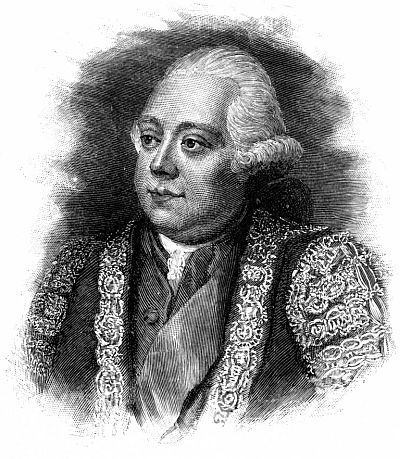
LORD NORTH
Views of the different parties Under these circumstances, the only people in England who were willing to concede the independence of the United States were the Rockingham Whigs, and these were now in a small minority. Lord Rockingham and his friends, with Burke as their leader, had always condemned the harsh and stupid policy of the government toward America, and they were now ready to concede independence because they were convinced that conciliation was no longer practicable. Lord Chatham, on the other hand, with his section of the Whig party, while even more emphatically condemning the policy of the government, still clung to the hope of conciliation, and could not bear to think of the disruption of the empire. But with the Tory party, which had all along supported the government, the war was still popular, and no calamity seemed so great as the loss of the American colonies. Most of the country squires believed in crushing out rebellion, no matter where it occurred or for what reason, and this view was almost unanimously taken by the clergy. In the House of Lords none were so bloodthirsty as the bishops, and country parsons preached from all the texts of the Old Testament which refer to smiting Jehovah’s enemies hip and thigh. The trading classes in the large towns, and the few manufacturers who had come upon the scene, were so afraid of losing the American market that they were ready to vote men and money without stint. The town of Manchester even raised and equipped two regiments at its own expense. Thus while the great majority of the British nation believed that America must be retained at whatever cost, a majority of this majority believed that it must be conquered before it could be conciliated or reasoned with; and this was the opinion which had thus far found favour with Lord North and controlled the policy of the government.
Lord North’s political somersault We may imagine, then, the unspeakable amazement of the House of Commons, on the 17th of February, 1778, when Lord North arose in his place and moved that every one of the points for which Samuel Adams and his friends had zealously contended, from the passage of the Stamp Act to the breaking out of war, should at once be conceded forever and without further parley. By the bill which he now proceeded to read, the famous Tea Act and the act for changing the constitution of Massachusetts were unconditionally repealed. It was furthermore declared that Parliament would renounce forever the right of raising a revenue in America; and it was provided that commissioners should be sent over to treat with Congress, armed with full powers for negotiating a peace. Pending the negotiations the commissioners might proclaim a truce, and might suspend the operation of any act of Parliament relating to America which had been passed since 1763. They might also proclaim complete amnesty for all political offences.
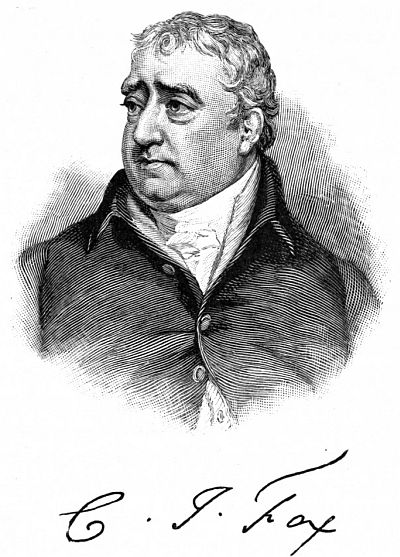
Strange scene in the House of Commons So complete a political somersault has seldom been turned by an English minister, and the speech in which Lord North defended himself was worthy of the occasion. Instead of resigning when he saw that his policy had proved a failure, as an English minister would naturally do, he suddenly shifted his ground, and adopted the policy which the opposition had urged in vain against him three years before, and which, if then adopted, would unquestionably have prevented bloodshed. Not only did he thus shift his ground, but he declared that this policy of conciliation was really the one which he had favoured from the beginning. There was more truth in this than appeared at the moment, for in more than one instance Lord North had, with culpable weakness, carried out the king’s policy in defiance of his own convictions. It was in vain, however, that he sought to clear himself of responsibility for the Tea Act, the oppressive edicts of 1774, and the recent events in America generally. The House received his bill and his speech in profound silence. Disgust and dejection filled every bosom, yet no one could very well help voting for the measures. The Tories, already chagrined by the bitter news from Saratoga, were enraged at being thus required to abandon all the ground for which they had been fighting, yet no way seemed open for them but to follow their leader. The Whigs were vexed at seeing the wind taken out of their sails, but they could not in honour oppose a policy which they had always earnestly supported. All sat for some moments in grim, melancholy silence, till Charles Fox, arising, sarcastically began his speech by congratulating his Whig friends on having gained such a powerful and unexpected ally in the prime minister. Taunts and innuendoes flew back and forth across the House. From the Tory side came sullen cries that the country was betrayed, while from among the Whigs the premier was asked if he supposed himself armed with the spear of Achilles, which could heal the wounds that itself had made. It was very pointedly hinted that the proposed measures would not be likely to produce much effect upon the Americans unless accompanied by Lord North’s resignation, since, coming from him, they would come as from a tainted spring. But in spite of all this ill-feeling the bill was passed, and the same reasons which had operated here carried it also through the House of Lords. On the 11th of March it received the royal signature, and three commissioners were immediately appointed to convey information of this action to Congress, and make arrangements for a treaty of peace.
Treaty between France and the United States, Feb. 6, 1778 The conciliatory policy of Lord North had come at least two years too late. The American leaders were now unwilling to consider the question of reunion with the mother-country upon any terms, and even before the extraordinary scene in Parliament which we have just witnessed a treaty had been made with France, by which the Americans solemnly agreed, in consideration of armed support to be furnished by that power, never to entertain proposals of peace from Great Britain until their independence should be acknowledged, and never to conclude a treaty of peace except with the concurrence of their new ally. The French government had secretly assisted the Americans as early as the summer of 1776 by occasional loans of money, and by receiving American privateers in French ports. The longer Great Britain and her colonies could be kept weakening each other by warfare, the greater the hope that France might at some time be enabled to step in and regain her lost maritime empire. But it was no part of French policy to take an active share in the struggle until the proper moment should come for reaping some decisive material advantage. At the beginning of the year 1778 that moment seemed to have arrived. The capture of Burgoyne and the masterly strategy which Washington had shown, in spite of his ill-success on the field, had furnished convincing proof that the American alliance was worth having. At the same time, the announcement that Lord North was about to bring in conciliatory measures indicated that the British government was weakening in its purpose. Should such measures succeed in conciliating the Americans and in bringing about a firm reunion with the mother-country, the schemes of France would be irretrievably ruined. Now, therefore, was the golden opportunity, and France was not slow to seize it. On the 6th of February the treaty with the United States was signed at Paris. By a special article it was stipulated that Spain might enter into the alliance at her earliest convenience. Just now, too, Frederick the Great publicly opened the port of Dantzic to American cruisers and prohibited Hessian soldiers from passing through his dominions to the seaboard, while he wrote to Franklin at Paris that he should probably soon follow the king of France in recognizing the independence of the United States.
Great Britain declares war against France, March 13 Rumours of all these things kept coming to England while the conciliatory measures were passing through Parliament, and on the 13th of March, two days after those measures had become law, the action of France was formally communicated to the British government, and war was instantly declared.
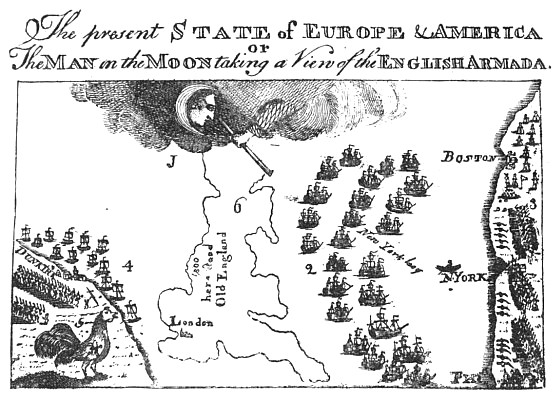
The situation of England seemed desperate. With one army lost in America, with the recruiting ground in Germany barred against her, with a debt piling up at the rate of a million dollars a week, and with a very inadequate force of troops at home in case of sudden invasion, she was now called upon to contend with the whole maritime power of France, to which that of Spain was certain soon to be added, and, to crown all, the government had just written its own condemnation by confessing before the world that its policy toward America, which had been the cause of all this mischief, was impracticable as well as unrighteous.[15]
The Earl of Chatham At this terrible moment the eyes of all England were turned upon one great man, old now and wasted by disease, but the fire of whose genius still burned bright and clear. The government must be changed, and in the Earl of Chatham the country had still a leader whose very name was synonymous with victory. Not thus had matters gone in the glorious days of Quiberon and Minden and Quebec, when his skilful hand was at the helm, and every heart in England and America beat high with the consciousness of worthy ends achieved by well-directed valour. To whom but Chatham should appeal be made to repair the drooping fortunes of the empire? It was in his hands alone that a conciliatory policy could have any chance of success. From the first he had been the consistent advocate of the constitutional rights of the Americans; and throughout America he was the object of veneration no less hearty and enthusiastic than that which was accorded to Washington himself. Overtures that would be laughed at as coming from North would at least find respectful hearing if urged by Chatham. On the other hand, should the day for conciliation have irrevocably passed by, the magic of his name was of itself sufficient to create a panic in France, while in England it would kindle that popular enthusiasm which is of itself the best guarantee of success. In Germany, too, the remembrance of the priceless services he had rendered could not but dispel the hostile feeling with which Frederick had regarded England since the accession of George III. Moved by such thoughts as these, statesmen of all parties, beginning with Lord North himself, implored the king to form a new ministry under Chatham. Lord Mansfield, his bitterest enemy, for once declared that without Chatham at the helm the ship of state must founder, and his words were echoed by Bute and the young George Grenville. At the opposite extreme of politics, the Duke of Richmond, who had long since made up his mind that the colonies must be allowed to go, declared, nevertheless, that if it were to be Chatham who should see fit to make another attempt to retain them, he would aid him in every possible way. The press teemed with expressions of the popular faith in Chatham, and every one impatiently wondered that the king should lose a day in calling to the head of affairs the only man who could save the country. But all this unanimity of public opinion went for nothing with the selfish and obdurate king. All the old reasons for keeping Chatham out of office had now vanished, so far as the American question was concerned; for by consenting to North’s conciliatory measures the king had virtually come over to Chatham’s position, and as regarded the separation of the colonies from the mother-country, Chatham was no less unwilling than the king to admit the necessity of such a step. The king’s rageIndeed, the policy upon which the king had now been obliged to enter absolutely demanded Chatham as its exponent instead of North. Everybody saw this, and no doubt the king saw it himself, but it had no weight with him in the presence of personal considerations. He hated Chatham with all the ferocity of hatred that a mean and rancorous spirit can feel toward one that is generous and noble; and he well knew besides that, with that statesman at the head of affairs, his own share in the government would be reduced to nullity. To see the government administered in accordance with the policy of a responsible minister, and in disregard of his own irresponsible whims, was a humiliation to which he was not yet ready to submit. For eight years now, by coaxing and bullying the frivolous North, he had contrived to keep the reins in his own hands; and having so long tasted the sweets of power, he was resolved in future to have none but milksops for his ministers. In face of these personal considerations the welfare of the nation was of little account to him.[16] He flew into a rage. No power in heaven or earth, he said, should ever make him stoop to treat with “Lord Chatham and his crew;” he refused to be “shackled by those desperate men” and “made a slave for the remainder of his days.” Rather than yield to the wishes of his people at this solemn crisis, he would submit to lose his crown. Better thus, he added, than to wear it in bondage and disgrace.
What Chatham would have tried to do In spite of the royal wrath, however, the popular demand for a change of government was too strong to be resisted. But for Lord Chatham’s sudden death, a few weeks later, he would doubtless have been called upon to fill the position which North was so anxious to relinquish. The king would have had to swallow his resentment, as he was afterwards obliged to do in 1782. Had Chatham now become prime minister, it was his design to follow up the repeal of all obnoxious legislation concerning America by withdrawing every British soldier from our soil, and attacking France with might and main, as in the Seven Years’ War, on the ocean and through Germany, where the invincible Ferdinand of Brunswick was again to lead the armies of Great Britain. In America such a policy could hardly have failed to strengthen not only the loyalists and waverers, but also the Whigs of conciliatory mould, such as Dickinson and Robert Morris. Nor was the moment an inopportune one. Many Americans, who were earnest in withstanding the legislative encroachments of Parliament, had formerly been alienated from the popular cause by what they deemed the needlessly radical step of the Declaration of Independence. Many others were now alienated by the French alliance. In New England, the chief stronghold of the revolutionary party, many people were disgusted at an alliance with the Catholic and despotic power which in days gone by had so often let loose the Indian hell-hounds upon their frontier. The treaty with France was indeed a marriage of convenience rather than of affection. The American leaders, even while arranging it, dreaded the revulsion of feeling that might ensue in the country at large; and their dread was the legitimate hope of Chatham. To return to the state of things which had existed previous to 1765 would no doubt be impossible. Independence of some sort must be conceded, and in this Lord Rockingham and the Duke of Richmond were unquestionably right. But Chatham was in no wise foolish in hoping that some sort of federal bond might be established which should maintain Americans and British in perpetual alliance, and, while granting full legislative autonomy to the colonies singly or combined, should prevent the people of either country from ever forgetting that the Americans were English. There was at least a chance that this noble policy might succeed, and until the trial should have been made he would not willingly consent to a step that seemed certain to wreck the empire his genius had won for England. But death now stepped in to simplify the situation in the old ruthless way.
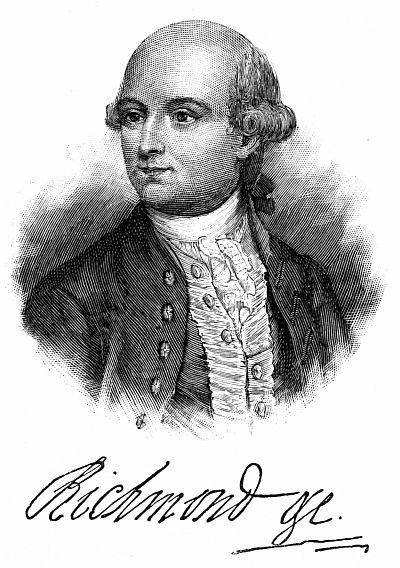
Death of Chatham The Duke of Richmond, anxious to bring matters to an issue, gave notice that on the 7th of April he should move that the royal fleets and armies should be instantly withdrawn from America, and peace be made on whatever terms Congress might see fit to accept. Such at least was the practical purport of the motion. For such an unconditional surrender Chatham was not yet ready, and on the appointed day he got up from his sick-bed and came into the House of Lords to argue against the motion. Wrapped in flannel bandages and leaning upon crutches, his dark eyes in their brilliancy enhancing the pallor of his careworn face, as he entered the House, supported on the one side by his son-in-law, Lord Mahon, on the other by that younger son who was so soon to add fresh glory to the name of William Pitt, the peers all started to their feet, and remained standing until he had taken his place. In broken sentences, with strange flashes of the eloquence that had once held captive ear and heart, he protested against the hasty adoption of a measure which simply prostrated the dignity of England before its ancient enemy, the House of Bourbon. The Duke of Richmond’s answer, reverently and delicately worded, urged that while the magic of Chatham’s name could work anything short of miracles, yet only a miracle could now relieve them from the dire necessity of abandoning America. The earl rose to reply, but his overwrought frame gave way, and he sank in a swoon upon the floor. All business was at once adjourned. The peers, with eager sympathy, came crowding up to offer assistance, and the unconscious statesman was carried in the arms of his friends to a house near by, whence in a few days he was removed to his home at Hayes. There, after lingering between life and death for several weeks, on the 11th of May, and in the seventieth year of his age, Lord Chatham breathed his last.
His prodigious greatness The man thus struck down, like a soldier at his post, was one whom Americans no less than Englishmen have delighted to honour. The personal fascination which he exerted in his lifetime is something we can no longer know; but as the field of modern history expands till it covers the globe, we find ourselves better able than his contemporaries to comprehend the part which he played at one of the most critical moments of the career of mankind. For simple magnitude, the preponderance of the English race in the world has come now to be the most striking fact in human history; and when we consider all that is implied in this growing preponderance of an industrial civilization over other civilizations of relatively archaic and militant type, we find reason to believe that among historic events it is the most teeming with mighty consequences to be witnessed by a distant future. With no other historic personage are the beginnings of this supremacy of the English race so closely associated as with the elder William Pitt. It was he who planned the victories which gave England the dominion of the sea, and which, rescuing India from the anarchy of centuries, prepared it to become the seat of a new civilization, at once the apt pupil and the suggestive teacher of modern Europe. It was he who, by driving the French from America, cleared the way for the peaceful overflow of our industrial civilization through the valley of the Mississippi; saving us from the political dangers which chronic warfare might otherwise have entailed, and insuring us the ultimate control of the fairest part of this continent. To his valiant and skilful lieutenants by sea and land, to such great men as Hawke, and Clive, and Wolfe, belongs the credit of executing the details; it was the genius of Pitt that conceived and superintended the prodigious scheme as a connected whole. Alone among the Englishmen of his time, Pitt looked with prophetic gaze into the mysterious future of colonial history, and saw the meaning of the creation of a new and greater Europe in the outlying regions of the earth; and through his triumphs it was decided that this new and greater Europe should become for the most part a new and greater England,—a world of self-government, and of freedom of thought and speech. While his political vision thus embraced the uttermost parts of the globe, his action in the centre of Europe helped to bring about results the importance of which we are now beginning to appreciate. From the wreck of all Germany in that horrible war of religion which filled one third of the seventeenth century, a new Protestant power had slowly emerged and grown apace, till in Pitt’s time—for various reasons, dynastic, personal, and political—it had drawn down upon itself the vengeance of all the reactionary countries of Europe. Had the coalition succeeded, the only considerable Protestant power on the continent would have been destroyed, and the anarchy which had followed the Thirty Years’ War might have been renewed. The stupid George II., who could see in Prussia nothing but a rival of Hanover, was already preparing to join the alliance against Frederick, when Pitt overruled him, and threw the weight of England into the other side of the scale. The same act which thus averted the destruction of Prussia secured to England a most efficient ally in her struggle with France. Of this wise policy we now see the fruits in that renovated German Empire which has come to be the strongest power on the continent of Europe, which is daily establishing fresh bonds of sympathy with the people of the United States, and whose political interests are daily growing more and more visibly identical with those of Great Britain. As in days to come the solidarity of the Teutonic race in its three great nationalities—America, England, and Germany—becomes more and more clearly manifest, the more will the student of history be impressed with the wonderful fact that the founding of modern Germany, the maritime supremacy of England, and the winning of the Mississippi valley for English-speaking America, were but the different phases of one historic event, coherent parts of the one vast conception which marks its author as the grandest of modern statesmen. As the lapse of time carries us far enough from the eighteenth century to study it in its true proportions, the figure of Chatham in the annals of the Teutonic race will appear no less great and commanding than the figure of Charlemagne a thousand years before.
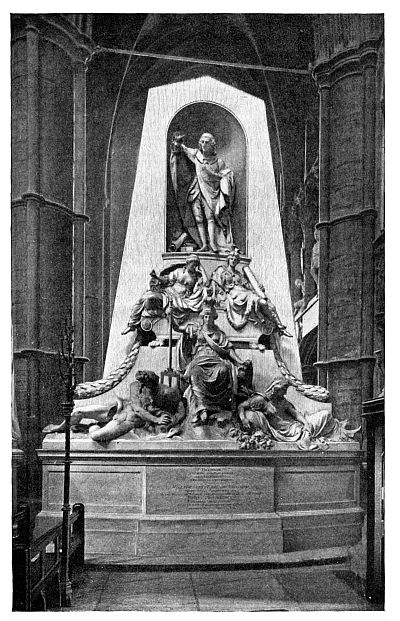
CHATHAM’S TOMB IN WESTMINSTER ABBEY
But Chatham is interesting to Americans not only as the eloquent defender in our revolutionary struggle, not only as standing in the forefront of that vast future in which we are to play so important a part, but also as the first British statesman whose political thinking was of a truly American type. Pitt was above all things the man of the people, and it has been well said that his title of the “Great Commoner” marks in itself a political revolution. When the king and the Old Whig lords sought to withstand him in the cabinet, he could say with truth, “It is the people who have sent me here.” He was the first to discover the fact that the development of trade and manufactures, due chiefly to the colonial expansion of England, had brought into existence an important class of society, for which neither the Tory nor the Old Whig schemes of government had made provision. He was the first to see the absurdity of such towns as Leeds and Manchester going without representation, and he began in 1745 the agitation for parliamentary reform which was first successful in 1832. In the celebrated case of Wilkes, while openly expressing his detestation of the man, he successfully defended the rights of constituencies against the tyranny of the House of Commons. Against the fierce opposition of Lord Mansfield, he maintained inviolate the liberty of every Englishman to publish his opinions. He overthrew the abuse of arbitrary imprisonment by general warrants. He ended the chronic troubles of Scotland by taking the Highlanders into his confidence and raising regiments from them for the regular army. In this intense devotion to liberty and to the rights of man, Pitt was actuated as much by his earnest, sympathetic nature as by the clearness and breadth of his intelligence. In his austere purity of character, as in his intensity of conviction, he was an enigma to sceptical and frivolous people in his own time. Cromwell or Milton would have understood him much better than did Horace Walpole, to whom his haughty mien and soaring language seemed like theatrical affectation. But this grandiose bearing was nothing but the natural expression of that elevation of soul which, lighted by a rich poetic imagination and fired by the glow of passion beneath, made his eloquence the most impressive that has ever been heard in England. He was soaring in outward demeanour only as his mind habitually dwelt with strong emotion upon great thoughts and noble deeds. He was the incarnation of all that is lofty and aspiring in human nature, and his sublime figure, raised above the grave in the northern transept of Westminster Abbey, with its eager outstretched arm, still seems to be urging on his countrymen in the path of duty and of glory.
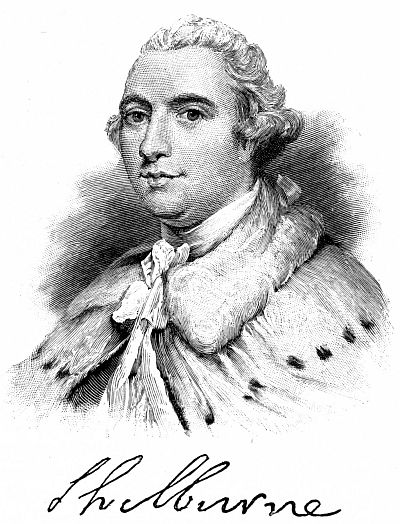
Lord North remains in power By the death of Chatham the obstacles which had beset the king were suddenly removed. On the morning after the pathetic scene in the House of Lords, he wrote with ill-concealed glee to North, “May not the political exit of Lord Chatham incline you to continue at the head of my affairs?” North was very unwilling to remain, but it was difficult to find any one who could form a government in his place. Among the New Whigs, now that Chatham was gone, Lord Shelburne was the most prominent; but he was a man who, in spite of great virtues and talents, never succeeded in winning the confidence either of the politicians or of the people. He was a warm friend to the American cause, but no one supposed him equal to the difficult task which Chatham would have undertaken, of pacifying the American people. The Old Whigs, under Lord Rockingham, had committed themselves to the full independence of the United States, and for this the people of England were not yet prepared. Under the circumstances, there seemed to be nothing for Lord North to do but remain in office. The king was delighted, and his party appeared to have gained strength from the indignation aroused by the alliance of the Americans with France. It was strengthened still more by the positive refusal of Congress to treat with the commissioners sent over by Lord North. The commissioners arrived in America in June, and remained until October, without effecting anything. Congress refused to entertain any propositions whatever from Great Britain until the independence of the United States should first be acknowledged. His commissioners in America fail to accomplish anythingCopies of Lord North’s conciliatory bills were published by order of Congress, and scattered broadcast over the country. They were everywhere greeted with derision; at one town in Rhode Island they were publicly burned under a gallows which had been erected for the occasion. After fruitlessly trying all the devices of flattery and intrigue, the commissioners lost their temper; and just before sailing for England they issued a farewell manifesto, in which they threatened the American people with exemplary punishment for their contumacy. The conduct of the war, they said, was now to be changed; these obstinate rebels were to be made to suffer the extremes of distress, and no mercy was to be shown them. Congress instantly published this document, and it was received with somewhat more derision than the conciliatory bills had been. Under the circumstances of that day, the threat could have but one meaning. It meant arson along the coasts at the hands of the British fleet, and murder on the frontiers at the hands of Indian auxiliaries. The commissioners sought to justify their manifesto before Parliament, and one of them vehemently declared that if all hell could be let loose against these rebels, he should approve of the measure. “The proclamation,” said he, “certainly does mean a war of desolation: it can mean nothing else.” Lord Rockingham denounced the policy of the manifesto, and few were found in Parliament willing to support it openly. This barbarous policy, however, was neither more nor less than that which Lord George Germain had deliberately made up his mind to pursue for the remainder of the war. Giving up the problem of conquering the Americans by systematic warfare, he thought it worth while to do as much damage and inflict as much suffering as possible, in the hope that by and by the spirit of the people might be broken and their patience worn out. No policy could be more repugnant to the amiable soul of Lord North, but his false position obliged him passively to sanction much that he did not like. Besides this plan for tiring out the people, it was designed to conduct a systematic expedition against Virginia and the Carolinas, in order to detach these states from the rest of the confederacy. Should it be found necessary, after all, to acknowledge the independence of the United States, it seemed worth while at least to cut down their territory as much as possible, and save to the British Crown these rich countries of rice, and indigo, and tobacco. Such was the plan now proposed by Germain, and adopted by the ministry of which he was a member.
Distress in America Lord George Germain’s scheme for tiring out the Americans could not seem altogether hopeless. Though from a military point of view the honours of the war thus far remained with them, yet the losses and suffering had been very great. The disturbance of trade was felt even more severely in America than in England, and it was further exacerbated by the evils of a depreciated currency. The country had entered into the war heavily handicapped by the voluntary stoppage of importation which had prevailed for several years. The war had cut off New England from the Newfoundland fisheries and the trade with the West Indies, and the coasting trade had been nearly annihilated by British cruisers. The problem of managing the expenses of a great war was something quite new to the Americans, and the consequent waste and extravagance were complicated and enhanced by the curse of paper money. Congress, as a mere advisory body, could only recommend to the various states the measures of taxation which were deemed necessary for the support of the army. It had no authority to raise taxes in any state, nor had it any power to constrain the government of a state to raise taxes. The states were accordingly all delinquent, and there was no resource left for Congress but to issue its promissory notes. Congress already owed more than forty million dollars, and during the first half of the year 1778 the issues of paper money amounted to twenty-three millions. The depreciation had already become alarming, and the most zealous law-making was of course powerless to stop it.
Lack of organization Until toward the close of the Revolutionary War, indeed, the United States had no regularly organized government. At the time of the Declaration of Independence a committee had been appointed by Congress to prepare articles of confederation, to be submitted to the states for their approval. These articles were ready by the summer of 1778, but it was not until the spring of 1781, that all the states had signed them. While the thirteen distinct sovereignties in the United States were visible in clear outline, the central government was something very shadowy and ill-defined. Under these circumstances, the military efficiency of the people was reduced to a minimum. The country never put forth more than a small fraction of its available strength. Everything suffered from the want of organization. In spite of the popular ardour, which never seems to have been deficient when opportunities came for testing it, there was almost as much difficulty in keeping up the numbers of the army by enlistment as in providing equipment, sustenance, and pay for the soldiers when once enlisted. The army of 80,000 men, which Congress had devised in the preceding year, had never existed except on paper. The action of Congress had not, indeed, been barren of results, but it had fallen far short of the end proposed. During the campaigns of 1777 the army of Washington had never exceeded 11,000 men; while of the 20,000 or more who witnessed the surrender of Burgoyne, at least half were local militia, assembled merely to meet the exigencies of the moment. The whole country, indeed, cherished such a horror of armies that it was unjust even to the necessary instrument by which its independence was to be won; and it sympathized with Congress in the niggardly policy which, by discouraging pensions, endangered the future of brave and skilful officers who were devoting the best years of their lives to the public service. Washington’s earnest efforts to secure for retired officers the promise of half pay for life succeeded only in obtaining it for the term of seven years. The excessive dread of a standing army made it difficult to procure long enlistments, and the frequent changes in the militia, besides being ruinous to discipline, entailed a sad waste of equipments and an interruption of agriculture which added much to the burdens of the people.
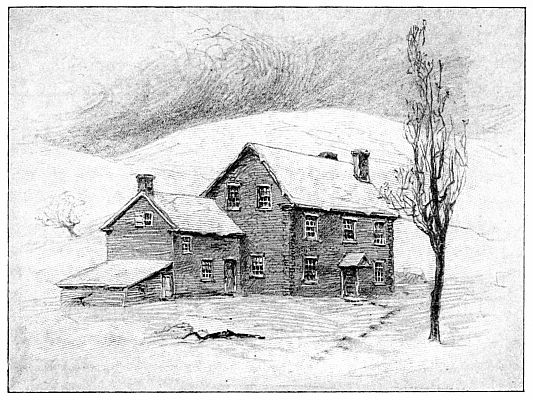
WASHINGTON’S HEADQUARTERS AT VALLEY FORGE
Vexatious meddling of Congress Besides these evils, for which no one in particular was to blame, since they resulted so directly from the general state of the country, the army suffered under other drawbacks, which were immediately traceable to the incapacity of Congress. Just as afterwards, in the War of Secession, the soldiers had often to pay the penalty for the sins of the politicians. A single specimen of the ill-timed meddling of Congress may serve as an example. At one of the most critical moments of the year 1777, Congress made a complete change in the commissariat, which had hitherto been efficiently managed by a single officer, Colonel Joseph Trumbull. Two commissary-generals were now appointed, one of whom was to superintend the purchase and the other the issue of supplies; and the subordinate officers of the department were to be accountable, not to their superiors, but directly to Congress. This was done in spite of the earnest opposition of Washington, and the immediate result was just what he expected. Colonel Trumbull, who had been retained as commissary-general for purchases, being unable to do his work properly without controlling his subordinate officers, soon resigned his place. The department was filled up with men selected without reference to fitness, and straightway fell into hopeless confusion, whereby the movements of the armies were grievously crippled for the rest of the season. On the 22d of December Washington was actually prevented from executing a most promising movement against General Howe, because two brigades had become mutinous for want of food. Sufferings at Valley ForgeFor three days they had gone without bread, and for two days without meat. The quartermaster’s department was in no better condition. The dreadful sufferings of Washington’s army at Valley Forge have called forth the pity and the admiration of historians; but the point of the story is lost unless we realize that this misery resulted from gross mismanagement rather than from the poverty of the country. As the poor soldiers marched on the 17th of December to their winter quarters, their route could be traced on the snow by the blood that oozed from bare, frost-bitten feet; yet at the same moment, says Gordon, “hogsheads of shoes, stockings, and clothing were lying at different places on the roads and in the woods, perishing for want of teams, or of money to pay the teamsters.” On the 23d, Washington informed Congress that he had in camp 2,898 men “unfit for duty, because they are barefoot, and otherwise naked.” For want of blankets, many were fain “to sit up all night by fires, instead of taking comfortable rest in a natural and common way.” Cold and hunger daily added many to the sick-list; and in the crowded hospitals, which were for the most part mere log-huts or frail wigwams woven of twisted boughs, men sometimes died for want of straw to put between themselves and the frozen ground on which they lay. In the deficiency of oxen and draft-horses, gallant men volunteered to serve as beasts of burden, and, yoking themselves to wagons, dragged into camp such meagre supplies as they could obtain for their sick and exhausted comrades. So great was the distress that there were times when, in case of an attack by the enemy, scarcely two thousand men could have been got under arms. When one thinks of these sad consequences wrought by a negligent quartermaster and a deranged commissariat, one is strongly reminded of the remark once made by the eccentric Charles Lee, when with caustic alliteration he described Congress as “a stable of stupid cattle that stumbled at every step.”
Promoting officers for non-military reasons The mischief did not end, however, with the demoralization of the departments that were charged with supplying the army. In the appointment and promotion of general officers, Congress often acted upon principles which, if consistently carried out, would have ruined the efficiency of any army that ever existed. For absurdly irrelevant political reasons, brave and well-tried officers were passed by, and juniors, comparatively little known, were promoted over their heads. The case of Benedict Arnold was the most conspicuous and flagrant example of this. After his good name had been destroyed by his treason, it became customary for historians to cite the restiveness of Arnold under such treatment as one more proof of his innate wickedness. But Arnold was not the only officer who was sensitive about his rank. In June, 1777, it was rumoured about Washington’s camp that a Frenchman named Ducoudray was about to be appointed to the chief command of the artillery, with the rank of major-general. Congress was continually beset with applications from vagrant foreign officers in quest of adventure; and such appointments as this were sometimes made, no doubt, in that provincial spirit which it has taken Americans so long to outgrow, and which sees all things European in rose-colour. As soon as the report concerning Ducoudray reached the camp, Generals Greene, Sullivan, and Knox each wrote a letter to Congress, proffering their resignations in case the report were true; and the three letters were dated on the same day. Congress was very angry at this, and the three generals were abused without stint. The affair, however, was more serious than Congress had supposed, and the contemplated appointment of Ducoudray was not made. Absurd talk of John AdamsThe language of John Adams with reference to matters of this sort was more pungent than wise, and it gave clear expression to the principles upon which Congress too often acted. This “delicate point of honour” he stigmatized as “one of the most putrid corruptions of absolute monarchy.” He would be glad to see Congress elect all the general officers annually; and if some great men should be obliged to go home in consequence of this, he did not believe the country would be ruined! The jealousy with which the several states insisted upon “a share of the general officers” in proportion to their respective quotas of troops, he characterized as a just and sound policy. It was upon this principle, he confessed, that many promotions had been made; and if the generals were so unreasonable as not to like it, they must “abide the consequences of their discontent.” Such expressions of feeling, in which John Adams found many sympathizers, bear curious testimony to the intense distrust with which our poor little army was regarded on account of the monarchical tendencies supposed to be necessarily inherent in a military organization. This policy, which seemed so “sound” to John Adams, was simply an attempt to apply to the regimen of the army a set of principles fit only for the organization of political assemblies; and if it had been consistently adopted, it is probable that Lord George Germain’s scheme of tiring the Americans out would have succeeded beyond his most sanguine expectations.
But the most dangerous ground upon which Congress ventured during the whole course of the war was connected with the dark intrigues of those officers who wished to have Washington removed from the chief command that Gates might be put in his place. We have seen how successful Gates had been in supplanting Schuyler on the eve of victory. Gates is puffed up with successWithout having been under fire or directing any important operation, Gates had carried off the laurels of the northern campaign. From many persons, no doubt, he got credit even for what had happened before he joined the army, on the 19th of August. His appointment dated from the 2d, before either the victory of Stark or the discomfiture of St. Leger; and it was easy for people to put dates together uncritically, and say that before the 2d of August Burgoyne had continued to advance into the country, and nothing could check him until after Gates had been appointed to command. The very air rang with the praises of Gates, and his weak head was not unnaturally turned with so much applause. In his dispatches announcing the surrender of Burgoyne, he not only forgot to mention the names of Arnold and Morgan, who had won for him the decisive victory, but he even seemed to forget that he was serving under a commander-in-chief, for he sent his dispatches directly to Congress, leaving Washington to learn of the event through hearsay. Thirteen days after the surrender, Washington wrote to Gates, congratulating him upon his success. “At the same time,” said the letter, “I cannot but regret that a matter of such magnitude, and so interesting to our general operations, should have reached me by report only, or through the channels of letters not bearing that authenticity which the importance of it required, and which it would have received by a line over your signature stating the simple fact.”
But, worse than this, Gates kept his victorious army idle at Saratoga after the whole line of the Hudson was cleared of the enemy, and would not send reinforcements to Washington. and shows symptoms of insubordinationCongress so far upheld him in this as to order that Washington should not detach more than 2,500 men from the northern army without consulting Gates and Governor Clinton. It was only with difficulty that Washington, by sending Colonel Hamilton with a special message, succeeded in getting back Morgan with his riflemen. When reinforcements finally did arrive, it was too late. Had they come more promptly, Howe would probably have been unable to take the forts on the Delaware, without control of which he could not have stayed in Philadelphia. But the blame for the loss of the forts was by many people thrown upon Washington, whose recent defeats at Brandywine and Germantown were now commonly contrasted with the victories at the North.
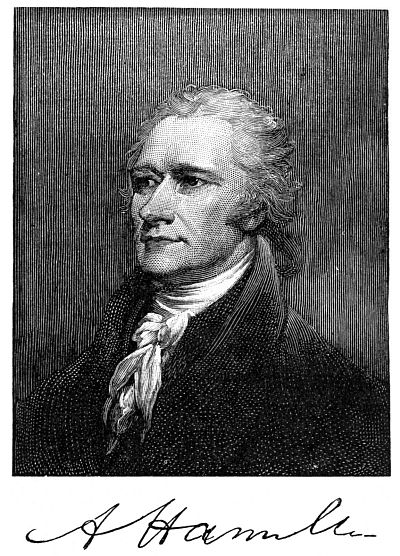
The Conway Cabal
The moment seemed propitious for Gates to try his peculiar strategy once
more, and displace Washington as he had already displaced Schuyler.
Assistants were not wanting for this dirty work. Among the foreign
adventurers then with the army was one Thomas Conway, an Irishman, who
had been for a long time in the French service, and, coming over to
America, had taken part in the Pennsylvania campaign. Washington had
opposed Conway’s claims for undue promotion, and the latter at once
threw himself with such energy into the faction then forming against the
commander-in-chief that it soon came to be known as the “Conway Cabal.”
The other principal members of the cabal were Thomas Mifflin, the
quartermaster-general, and James Lovell, a delegate from Massachusetts,
who had been Schuyler’s bitterest enemy in Congress.
 It was at one time
reported that Samuel Adams was in sympathy with the cabal, and the
charge has been repeated by many historians, but it seems to have
originated in a malicious story set on foot by some of the friends of
John Hancock. At the beginning of the war, Hancock, whose overweening
vanity often marred his usefulness, had hoped to be made
commander-in-chief, and he never forgave Samuel Adams for preferring
Washington for that position. In the autumn of 1777, Hancock resigned
his position as president of Congress, and was succeeded by Henry
Laurens, of South Carolina. On the day when Hancock took leave of
Congress, a motion was made to present him with the thanks of that body
in acknowledgment of his admirable discharge of his duty; but the New
England delegates, who had not been altogether satisfied with him,
defeated the motion on general grounds, and established the principle
that it was injudicious to pass such complimentary votes in the case of
any president. This action threw Hancock into a rage, which was chiefly
directed against Samuel Adams as the most prominent member of the
delegation; and after his return to Boston it soon became evident that
he had resolved to break with his old friend and patron. Artful stories,
designed to injure Adams, were in many instances traced to persons who
were in close relation with Hancock. After the fall of the cabal, no
more deadly stab could be dealt to the reputation of any man than to
insinuate that he had given it aid or sympathy; and there is good
ground for believing that such reports concerning Adams were
industriously circulated by unscrupulous partisans of the angry Hancock.
The story was revived at a later date by the friends of Hamilton, on the
occasion of the schism between Hamilton and John Adams, but it has not
been well sustained. The most plausible falsehoods, however, are those
which are based upon misconstrued facts; and it is certain that Samuel
Adams had not only favoured the appointment of Gates in the North, but
he had sometimes spoken with impatience of the so-called Fabian policy
of Washington. In this he was like many other ardent patriots whose
military knowledge was far from commensurate with their zeal. His
cousin, John Adams, was even more outspoken. He declared himself “sick
of Fabian systems.” “My toast,” he said, “is a short and violent war;”
and he complained of the reverent affection which the people felt for
Washington as an “idolatry” dangerous to American liberty. It was by
working upon such impatient moods as these, in which high-minded men
like the Adamses sometimes indulged, that unscrupulous men like Gates
hoped to attain their ends.
It was at one time
reported that Samuel Adams was in sympathy with the cabal, and the
charge has been repeated by many historians, but it seems to have
originated in a malicious story set on foot by some of the friends of
John Hancock. At the beginning of the war, Hancock, whose overweening
vanity often marred his usefulness, had hoped to be made
commander-in-chief, and he never forgave Samuel Adams for preferring
Washington for that position. In the autumn of 1777, Hancock resigned
his position as president of Congress, and was succeeded by Henry
Laurens, of South Carolina. On the day when Hancock took leave of
Congress, a motion was made to present him with the thanks of that body
in acknowledgment of his admirable discharge of his duty; but the New
England delegates, who had not been altogether satisfied with him,
defeated the motion on general grounds, and established the principle
that it was injudicious to pass such complimentary votes in the case of
any president. This action threw Hancock into a rage, which was chiefly
directed against Samuel Adams as the most prominent member of the
delegation; and after his return to Boston it soon became evident that
he had resolved to break with his old friend and patron. Artful stories,
designed to injure Adams, were in many instances traced to persons who
were in close relation with Hancock. After the fall of the cabal, no
more deadly stab could be dealt to the reputation of any man than to
insinuate that he had given it aid or sympathy; and there is good
ground for believing that such reports concerning Adams were
industriously circulated by unscrupulous partisans of the angry Hancock.
The story was revived at a later date by the friends of Hamilton, on the
occasion of the schism between Hamilton and John Adams, but it has not
been well sustained. The most plausible falsehoods, however, are those
which are based upon misconstrued facts; and it is certain that Samuel
Adams had not only favoured the appointment of Gates in the North, but
he had sometimes spoken with impatience of the so-called Fabian policy
of Washington. In this he was like many other ardent patriots whose
military knowledge was far from commensurate with their zeal. His
cousin, John Adams, was even more outspoken. He declared himself “sick
of Fabian systems.” “My toast,” he said, “is a short and violent war;”
and he complained of the reverent affection which the people felt for
Washington as an “idolatry” dangerous to American liberty. It was by
working upon such impatient moods as these, in which high-minded men
like the Adamses sometimes indulged, that unscrupulous men like Gates
hoped to attain their ends.
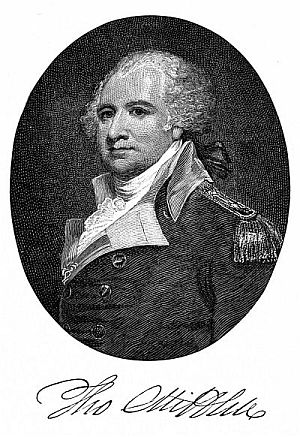
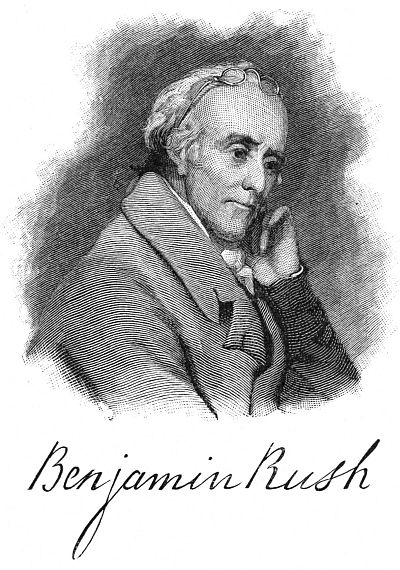
Attempts to injure Washington The first fruits of the cabal in Congress were seen in the reorganization of the Board of War in November, 1777. Mifflin was chosen a member of the board, and Gates was made its president, with permission to serve in the field should occasion require it. Gates was thus, in a certain sense, placed over Washington’s head; and soon afterward Conway was made inspector-general of the army, with the rank of major-general. In view of Washington’s well-known opinions, the appointments of Mifflin and Conway might be regarded as an open declaration of hostility on the part of Congress. Some weeks before, in regard to the rumour that Conway was to be promoted, Washington had written, “It will be impossible for me to be of any further service, if such insuperable difficulties are thrown in my way.” Such language might easily be understood as a conditional threat of resignation, and Conway’s appointment was probably urged by the conspirators with the express intention of forcing Washington to resign. Should this affront prove ineffectual, they hoped, by dint of anonymous letters and base innuendoes, to make the commander’s place too hot for him. It was asserted that Washington’s army had all through the year outnumbered Howe’s more than three to one. The distress of the soldiers was laid at his door; the sole result, if not the sole object, of his many marches, according to James Lovell, was to wear out their shoes and stockings. An anonymous letter to Patrick Henry, then governor of Virginia, dated from York, where Congress was sitting, observed: “We have wisdom, virtue, and strength enough to save us, if they could be called into action. The northern army has shown us what Americans are capable of doing with a general at their head. The spirit of the southern army is no way inferior to the spirit of the northern. A Gates, a Lee, or a Conway would in a few weeks render them an irresistible body of men. Some of the contents of this letter ought to be made public, in order to awaken, enlighten, and alarm our country.” Henry sent this letter to Washington, who instantly recognized the well-known handwriting of Dr. Benjamin Rush. Another anonymous letter, sent to President Laurens, was still more emphatic: “It is a very great reproach to America to say there is only one general in it. The great success to the northward was owing to a change of commanders; and the southern army would have been alike successful if a similar change had taken place. The people of America have been guilty of idolatry by making a man their God, and the God of heaven and earth will convince them by woful experience that he is only a man; for no good can be expected from our army until Baal and his worshippers are banished from camp.” This mischievous letter was addressed to Congress, but, instead of laying it before that body, the high-minded Laurens sent it directly to Washington. But the commander-in-chief was forewarned, and neither treacherous missives like these, nor the direct affronts of Congress, were allowed to disturb his equanimity. Conway’s letter to GatesJust before leaving Saratoga, Gates received from Conway a letter containing an allusion to Washington so terse and pointed as to be easily remembered and quoted, and Gates showed this letter to his young confidant and aid-de-camp, Wilkinson. A few days afterward, when Wilkinson had reached York with the dispatches relating to Burgoyne’s surrender, he fell in with a member of Lord Stirling’s staff, and under the genial stimulus of Monongahela whiskey repeated the malicious sentence. Thus it came to Stirling’s ears, and he straightway communicated it to Washington by letter, saying that he should always deem it his duty to expose such wicked duplicity. Thus armed, Washington simply sent to Conway the following brief note:—
“Sir,—A letter which I received last night contained the following paragraph: ‘In a letter from General Conway to General Gates, he says, Heaven has determined to save your country, or a weak General and bad counsellors would have ruined it.’ I am, sir, your humble servant.
George Washington.”
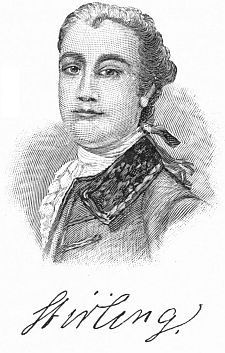
Gates’s letter to Washington Conway knew not what sort of answer to make to this startling note. When Mifflin heard of it, he wrote at once to Gates, telling him that an extract from one of Conway’s letters had fallen into Washington’s hands, and advising him to take better care of his papers in future. All the plotters were seriously alarmed; for their scheme was one which would not bear the light for a moment, and Washington’s curt letter left them quite in the dark as to the extent of his knowledge. “There is scarcely a man living,” protested Gates, “who takes greater care of his papers than I do. I never fail to lock them up, and keep the key in my pocket.” One thing was clear: there must be no delay in ascertaining how much Washington knew and where he got his knowledge. After four anxious days it occurred to Gates that it must have been Washington’s aid-de-camp, Hamilton, who had stealthily gained access to his papers during his short visit to the northern camp. Filled with this idea, Gates chuckled as he thought he saw a way of diverting attention from the subject matter of the letters to the mode in which Washington had got possession of their contents. He sat down and wrote to the commander-in-chief, saying he had learned that some of Conway’s confidential letters to himself had come into his excellency’s hands: such letters must have been copied by stealth, and he hoped his excellency would assist him in unearthing the wretch who prowled about and did such wicked things, for obviously it was unsafe to have such creatures in the camp; they might disclose precious secrets to the enemy. And so important did the matter seem that he sent a duplicate of the present letter to Congress, in order that every imaginable means might be adopted for detecting the culprit without a moment’s delay. The purpose of this elaborate artifice was to create in Congress, which as yet knew nothing of the matter, an impression unfavourable to Washington, by making it appear that he encouraged his aids-de-camp in prying into the portfolios of other generals. For, thought Gates, it is as clear as day that Hamilton was the man; nobody else could have done it.
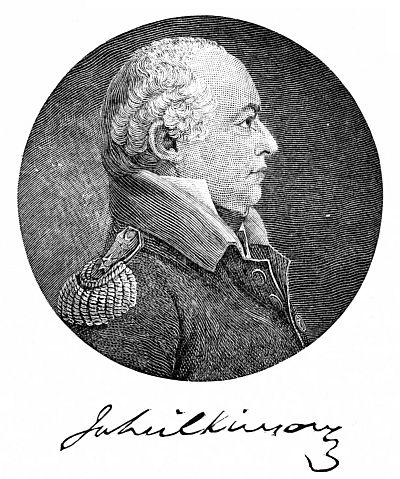
Washington’s reply But Gates’s silly glee was short-lived. Washington discerned at a glance the treacherous purpose of the letter, and foiled it by the simple expedient of telling the plain truth. “Your letter,” he replied, “came to my hand a few days ago, and, to my great surprise, informed me that a copy of it had been sent to Congress, for what reason I find myself unable to account; but as some end was doubtless intended to be answered by it, I am laid under the disagreeable necessity of returning my answer through the same channel, lest any member of that honourable body should harbour an unfavourable suspicion of my having practised some indirect means to come at the contents of the confidential letters between you and General Conway.” After this ominous prelude, Washington went on to relate how Wilkinson had babbled over his cups, and a certain sentence from one of Conway’s letters had thereupon been transmitted to him by Lord Stirling. He had communicated this discovery to Conway, to let that officer know that his intriguing disposition was observed and watched. He had mentioned this to no one else but Lafayette, for he thought it indiscreet to let scandals arise in the army, and thereby “afford a gleam of hope to the enemy.” He had not known that Conway was in correspondence with Gates, and had even supposed that Wilkinson’s information was given with Gates’s sanction, and with friendly intent to forearm him against a secret enemy. “But in this,” he disdainfully adds, “as in other matters of late, I have found myself mistaken.”
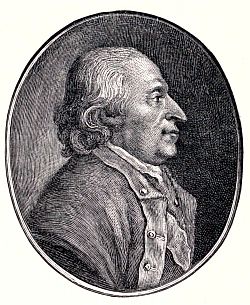
HORATIO GATES
Gates tries, unsuccessfully, to save himself by lying So the schemer had overreached himself. It was not Washington’s aid-de-camp who had pried, but it was Gates’s own aid who had blabbed. But for Gates’s treacherous letter, Washington would not even have suspected him; and, to crown all, he had only himself to thank for rashly blazoning before Congress a matter so little to his credit, and which Washington, in his generous discretion, would forever have kept secret. Amid this discomfiture, however, a single ray of hope could be discerned. It appeared that Washington had known nothing beyond the one sentence which had come to him as quoted in conversation by Wilkinson. A downright falsehood might now clear up the whole affair, and make Wilkinson the scapegoat for all the others. Gates accordingly wrote again to Washington, denying his intimacy with Conway, declaring that he had never received but a single letter from him, and solemnly protesting that this letter contained no such paragraph as that of which Washington had been informed. The information received through Wilkinson he denounced as a villainous slander. But these lies were too transparent to deceive any one, for in his first letter Gates had implicitly admitted the existence of several letters between himself and Conway, and his manifest perturbation of spirit had shown that these letters contained remarks that he would not for the world have had Washington see. A cold and contemptuous reply from Washington made all this clear, and put Gates in a very uncomfortable position, from which there was no retreat.
but is successful, as usual, in keeping from under fire When the matter came to the ears of Wilkinson, who had just been appointed secretary of the Board of War, and was on his way to Congress, his youthful blood boiled at once. He wrote bombastic letters to everybody, and challenged Gates to deadly combat. A meeting was arranged for sunrise, behind the Episcopal church at York, with pistols. At the appointed hour, when all had arrived on the ground, the old general requested, through his second, an interview with his young antagonist, walked up a back street with him, burst into tears, called him his dear boy, and denied that he had ever made any injurious remarks about him. Wilkinson’s wrath was thus assuaged for a moment, only to blaze forth presently with fresh violence, when he made inquiries of Washington, and was allowed to read the very letter in which his general had slandered him. He instantly wrote a letter to Congress, accusing Gates of treachery and falsehood, and resigned his position on the Board of War.
The forged letters These revelations strengthened Washington in proportion as they showed the malice and duplicity of his enemies. About this time a pamphlet was published in London, and republished in New York, containing letters which purported to have been written by Washington to members of his family, and to have been found in the possession of a mulatto servant taken prisoner at Fort Lee. The letters, if genuine, would have proved their author to be a traitor to the American cause; but they were so bunglingly concocted that every one knew them to be a forgery, and their only effect was to strengthen Washington still more, while throwing further discredit upon the cabal, with which many persons were inclined to connect them.
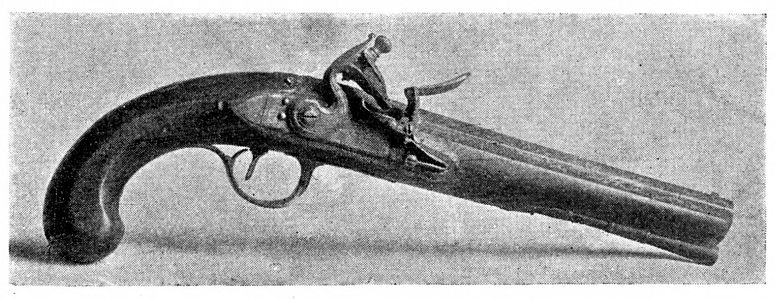
PISTOL GIVEN TO WASHINGTON BY LAFAYETTE
Scheme for invading Canada The army and the people were now becoming incensed at the plotters, and the press began to ridicule them, while the reputation of Gates suffered greatly in Congress as the indications of his real character were brought to light. All that was needed to complete the discomfiture of the cabal was a military fiasco, and this was soon forthcoming. In order to detach Lafayette from Washington, a winter expedition against Canada was devised by the Board of War. Lafayette, a mere boy, scarcely twenty years old, was invited to take the command, with Conway for his chief lieutenant. It was said that the French population of Canada would be sure to welcome the high-born Frenchman as their deliverer from the British yoke; and it was further thought that the veteran Irish schemer might persuade his young commander to join the cabal, and bring to it such support as might be gained from the French alliance, then about to be completed. Congress was persuaded to authorize the expedition, and Washington was not consulted in the matter.
The dinner at York
But Lafayette knew his own mind better than was supposed. He would not
accept the command until he had obtained Washington’s consent, and then
he made it an indispensable condition that Baron de Kalb, who outranked
Conway, should accompany the expedition. These preliminaries having been
arranged, the young general went to York for his instructions.

SEALS GIVEN TO WASHINGTON
BY LAFAYETTEThere he
found Gates, surrounded by schemers and sycophants, seated at a very
different kind of dinner from that to which Lafayette had lately been
used at Valley Forge. Hilarious with wine, the company welcomed the new
guest with acclamations. He was duly flattered and toasted, and a
glorious campaign was predicted. Gates assured him that on reaching
Albany he would find 3,000 regulars ready to march, while powerful
assistance was to be expected from the valiant Stark with his
redoubtable Green Mountain Boys. The marquis listened with placid
composure till his papers were brought him, and he felt it to be time to
go. Then rising as if for a speech, while all eyes were turned upon him
and breathless silence filled the room, he reminded the company that
there was one toast which, in the generous excitement of the occasion,
they had forgotten to drink, and he begged leave to propose the health
of the commander-in-chief of the armies of the United States. Lafayette’s toastThe deep
silence became still deeper. None dared refuse the toast, “but some
merely raised their glasses to their lips, while others cautiously put
them down untasted.” With the politest of bows and a scarcely
perceptible shrug of the shoulder, the new commander of the northern
army left the room, and mounted his horse to start for his headquarters
at Albany.
Absurdity of the scheme When he got there, he found neither troops, supplies, nor equipments in readiness. Of the army to which Burgoyne had surrendered, the militia had long since gone home, while most of the regulars had been withdrawn to Valley Forge or the highlands of the Hudson. Instead of 3,000 regulars which Gates had promised, barely 1,200 could be found, and these were in no wise clothed or equipped for a winter march through the wilderness. Between carousing and backbiting, the new Board of War had no time left to attend to its duties. Not an inch of the country but was known to Schuyler, Lincoln, and Arnold, and they assured Lafayette that an invasion of Canada, under the circumstances, would be worthy of Don Quixote. In view of the French alliance, moreover, the conquest of Canada had even ceased to seem desirable to the Americans; for when peace should be concluded the French might insist upon retaining it, in compensation for their services. The men of New England greatly preferred Great Britain to France as a neighbour, and accordingly Stark, with his formidable Green Mountain Boys, felt no interest whatever in the enterprise, and not a dozen volunteers could be got together for love or money.
Downfall of the cabal The fiasco was so complete, and the scheme itself so emphatically condemned by public opinion, that Congress awoke from its infatuation. Lafayette and Kalb were glad to return to Valley Forge. Conway, who stayed behind, became indignant with Congress over some fancied slight, and sent a conditional threat of resignation, which, to his unspeakable amazement, was accepted unconditionally. In vain he urged that he had not meant exactly what he said, having lost the nice use of English during his long stay in France. His entreaties and objurgations fell upon deaf ears. In Congress the day of the cabal was over. Mifflin and Gates were removed from the Board of War. The latter was sent to take charge of the forts on the Hudson, and cautioned against forgetting that he was to report to the commander-in-chief. The cabal and its deeds having become the subject of common gossip, such friends as it had mustered now began stoutly to deny their connection with it. Conway himself was dangerously wounded a few months afterward in a duel with General Cadwallader, and, believing himself to be on his deathbed, he wrote a very humble letter to Washington, expressing his sincere grief for having ever done or said anything with intent to injure so great and good a man. His wound proved not to be mortal, but on his recovery, finding himself generally despised and shunned, he returned to France, and American history knew him no more.
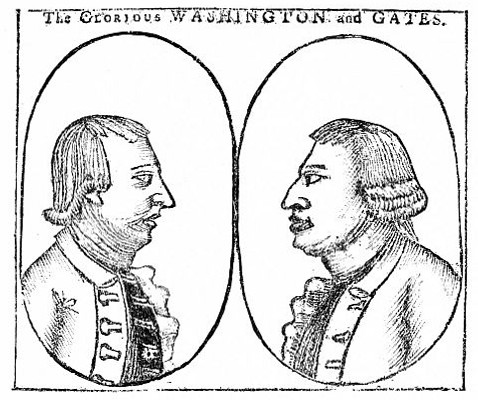
POPULAR PORTRAITS FROM BICKERSTAFF’S ALMANAC, 1778
Decline of the Continental Congress Had Lord George Germain been privy to the secrets of the Conway cabal, his hope of wearing out the American cause would have been sensibly strengthened. There was really more danger in such intrigues than in an exhausted treasury, a half-starved army, and defeat on the field. The people felt it to be so, and the events of the winter left a stain upon the reputation of the Continental Congress from which it never fully recovered. Congress had already lost the high personal consideration to which it was entitled at the outset. Such men as Franklin, Washington, Jefferson, Henry, Jay, and Rutledge were now serving in other capacities. The legislatures of the several states afforded a more promising career for able men than the Continental Congress, which had neither courts nor magistrates, nor any recognized position of sovereignty. The meetings of Congress were often attended by no more than ten or twelve members. Curious symptoms were visible which seemed to show that the sentiment of union between the states was weaker than it had been two years before. Instead of the phrase “people of the United States,” one begins, in 1778, to hear of “inhabitants of these Confederated States.” In the absence of any central sovereignty which could serve as the symbol of union, it began to be feared that the new nation might after all be conquered through its lack of political cohesion. Such fears came to cloud the rejoicings over the victory of Saratoga, as, at the end of 1777, the Continental Congress began visibly to lose its place in public esteem, and sink, step by step, into the utter degradation and impotence which was to overwhelm it before another ten years should have expired.
Increasing influence of Washington As the defeat of the Conway cabal marked the beginning of the decline of Congress, it marked at the same time the rise of Washington to a higher place in the hearts of the people than he had ever held before. As the silly intrigues against him recoiled upon their authors, men began to realize that it was far more upon his consummate sagacity and unselfish patriotism than upon anything that Congress could do that the country rested its hopes of success in the great enterprise which it had undertaken. As the nullity of Congress made it ever more apparent that the country as a whole was without a government, Washington stood forth more and more conspicuously as the living symbol of the union of the states. In him and his work were centred the common hopes and the common interests of all the American people. There was no need of clothing him with extraordinary powers. During the last years of the war he came, through sheer weight of personal character, to wield an influence like that which Perikles had wielded over the Athenians. He was all-powerful because he was “first in the hearts of his countrymen.” Few men, since history began, had ever occupied so lofty a position; none ever made a more disinterested use of power. His arduous labours taught him to appreciate, better than any one else, the weakness entailed upon the country by the want of a stable central government. But when the war was over, and the political problem came into the foreground, instead of using this knowledge to make himself personally indispensable to the country, he bent all the weight of his character and experience toward securing the adoption of such a federal constitution as should make anything like a dictatorship forever unnecessary and impossible.
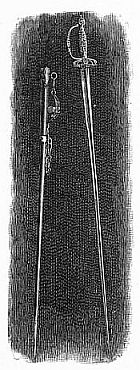
Baron Friedrich von Steuben During the dreary winter at Valley Forge, Washington busied himself in improving the organization of his army. The fall of the Conway cabal removed many obstacles. Greene was persuaded, somewhat against his wishes, to serve as quartermaster-general, and forthwith the duties of that important office were discharged with zeal and promptness. Conway’s resignation opened the way for a most auspicious change in the inspectorship of the army. Of all the foreign officers who served under Washington during the War for Independence, the Baron von Steuben was in many respects the most important. Member of a noble family which for five centuries had been distinguished in the local annals of Magdeburg, Steuben was one of the best educated and most experienced soldiers of Germany. His grandfather, an able theologian, was well known as the author of a critical treatise on the New Testament. His uncle, an eminent mathematician, had been the inventor of a new system of fortification. His father had seen half a century of honourable service in the corps of engineers. He had himself held the rank of first lieutenant at the beginning of the Seven Years’ War, and after excellent service in the battles of Prague, Rossbach, and Kunersdorf he was raised to a position on the staff of Frederick the Great. At the end of the war, when the thrifty king reduced his army, and Blücher with other officers afterward famous left the service, Steuben retired to private life, with the honorary rank of General of the Circle of Swabia. For more than ten years he was grand marshal to the Prince of Hohenzollern-Hechingen. Then he went travelling about Europe, until in the spring of 1777 he arrived in Paris, and became acquainted with Franklin and Beaumarchais.
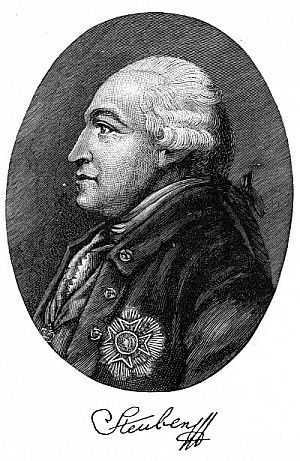
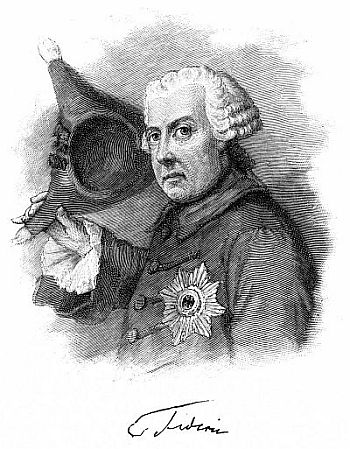
The American alliance was already secretly contemplated by the French ministry, and the astute Vergennes, knowing that the chief defect of our armies lay in their want of organization and discipline, saw in the scientific German soldier an efficient instrument for remedying the evil. After much hesitation Steuben was persuaded to undertake the task. That his arrival upon the scene might excite no heart-burning among the American officers, the honorary rank which he held in Germany was translated by Vergennes into the rank of lieutenant-general, which the Americans would at once recognize as more eminent than any position existing in their own army except that of the commander-in-chief.
Steuben arrives in America Knowing no English, Steuben took with him as secretary and interpreter the youthful Pierre Duponceau, afterward famous as a lawyer, and still more famous as a philologist. One day, on shipboard, this gay young Frenchman laid a wager that he would kiss the first Yankee girl he should meet on landing. So as they came ashore at Portsmouth on a frosty December day, he gravely stepped up to a pretty New Hampshire maiden who was passing by, and told her that before leaving his native land to fight for American freedom he had taken a vow to ask, in earnest of victory, a kiss from the first lady he should meet. The prayer of chivalry found favour in the eyes of the fair Puritan, and the token of success was granted.
At Boston John Hancock furnished the party with sleighs, drivers, and saddle-horses for the inland journey of more than four hundred miles to York. During this cheerful journey, which it took three weeks to perform, Steuben’s heart was warmed toward his new country by the reminiscences of the Seven Years’ War which he frequently encountered. The name of Frederick was deservedly popular in America, and his familiar features decorated the sign-board of many a wayside inn, while on the coffee-room walls hung quaint prints with doggerel verses commemorating Rossbach and Leuthen along with Louisburg and Quebec. and visits Congress at YorkOn arriving at York, the German general was received by Congress with distinguished honours; and this time the confidence given to a trained European soldier turned out to be well deserved. Throughout the war Steuben proved no less faithful than capable. He came to feel a genuine love for his adopted country, and after the war was over, retiring to the romantic woodland near Oriskany, where so many families of German lineage were already settled, and where the state of New York presented him with a farm of sixteen thousand acres in acknowledgment of his services, he lived the quiet life of a country gentleman until his death in 1794. A little village some twelve miles north of the site of old Fort Stanwix still bears his name and marks the position of his estate.
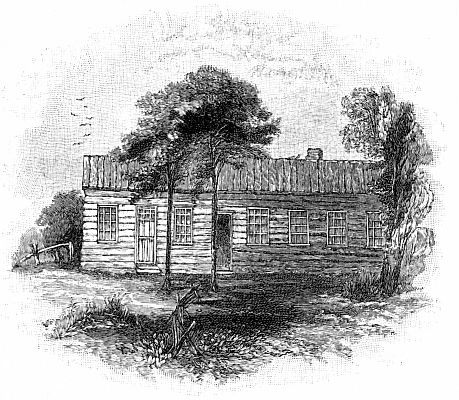
STEUBEN’S RUSTIC HOUSE AT ORISKANY
Steuben at Valley Forge After his interview with Congress, Steuben repaired at once to Valley Forge, where Washington was not slow in recognizing his ability; nor was Steuben, on the other hand, at a loss to perceive, in the ragged and motley army which he passed in review, the existence of soldierly qualities which needed nothing so much as training. Disregarding the English prejudice which looked upon the drilling of soldiers as work fit only for sergeants, he took musket in hand and showed what was to be done. Alert and untiring, he worked from morning till night in showing the men how to advance, retreat, or change front without falling into disorder,—how to perform, in short, all the rapid and accurate movements for which the Prussian army had become so famous. It was a revelation to the American troops. Generals, colonels, and captains were fired by the contagion of his example and his tremendous enthusiasm, and for several months the camp was converted into a training-school, in which masters and pupils worked with incessant and furious energy. Steuben was struck with the quickness with which the common soldiers learned their lessons. He had a harmlessly choleric temper, which was part of his overflowing vigour, and sometimes, when drilling an awkward squad, he would exhaust his stock of French and German oaths, and shout for his aid to come and curse the blockheads in English. “Viens, mon ami Walker,” he would cry,—"viens, mon bon ami. Sacre-bleu! Gott-vertamn de gaucherie of dese badauts. Je ne puis plus; I can curse dem no more!” Yet in an incredibly short time, as he afterward wrote, these awkward fellows had acquired a military air, had learned how to carry their arms, and knew how to form into column, deploy, and execute manœuvres with precision. In May, 1778, after three months of such work, Steuben was appointed inspector-general of the army, with the rank and pay of major-general. The reforms which he introduced were so far-reaching that after a year they were said to have saved more than 800,000 French livres to the United States. No accounts had been kept of arms and accoutrements, and owing to the careless good-nature which allowed every recruit to carry home his musket as a keepsake, there had been a loss of from five to eight thousand muskets annually. During the first year of Steuben’s inspectorship less than twenty muskets were lost. Half of the arms at Valley Forge were found by Steuben without bayonets. The American soldier had no faith in this weapon, because he did not know how to use it; when he did not throw it away, he adapted it to culinary purposes, holding on its point the beef which he roasted before his camp-fire. Yet in little more than a year after Steuben’s arrival we shall see an American column, without firing a gun, storm the works at Stony Point in one of the most spirited bayonet charges known to history.
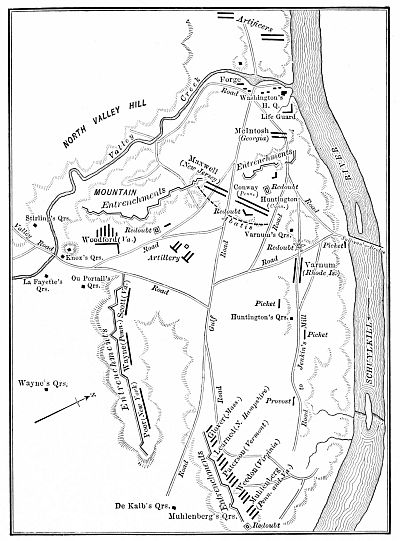
ENCAMPMENT AT VALLEY FORGE, 1777-1778
Steuben’s manual of tactics Besides all this, it was Steuben who first taught the American army to understand the value of an efficient staff. The want of such a staff had been severely felt at the battle of Brandywine; but before the end of the war Washington had become provided with a staff that Frederick need not have despised. While busy with all these laborious reforms, the good baron found time to prepare a new code of discipline and tactics, based on Prussian experience, but adapted to the peculiar conditions of American warfare; and this excellent manual held its place, long after the death of its author, as the Blue Book of our army. In this adaptation of means to ends, Steuben proved himself to be no martinet, but a thorough military scholar; he was able not only to teach, but to learn. And in the art of warfare there was one lesson which Europe now learned from America. In woodland fights with the Indians, it had been found desirable to act in loose columns, which could easily separate to fall behind trees and reunite at brief notice; and in this way there had been developed a kind of light infantry peculiar to America, and especially adapted for skirmishing. It was light infantry of this sort that, in the hands of Arnold and Morgan, had twice won the day in the Saratoga campaign. Reduced to scientific shape by Steuben, and absorbed, with all the other military knowledge of the age, by Napoleon, these light-infantry tactics have come to play a great part on the European battlefields of the nineteenth century.
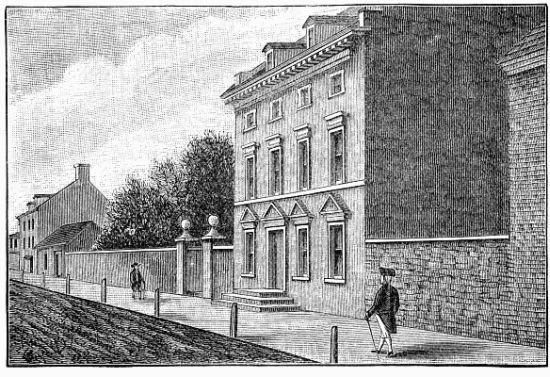
HOWE’S HEADQUARTERS IN PHILADELPHIA
Sir William Howe resigns his command
Thus from the terrible winter at Valley Forge, in which the accumulated
evils of congressional mismanagement had done their best to destroy the
army, it came forth, nevertheless, stronger in organization and bolder
in spirit than ever before. On the part of the enemy nothing had been
done to molest it. The position at Valley Forge was a strong one, and
Sir William Howe found it easier to loiter in Philadelphia than to play
a strategic game against Washington in the depths of an American winter.
When Franklin at Paris first heard the news that Howe had taken
Philadelphia, knowing well how slight was the military value of the
conquest, he observed that it would be more correct to say that
Philadelphia had taken General Howe. And so it turned out, in more ways
than one; for his conduct in going there at all was roundly blamed by
the opposition in Parliament, and not a word was said in his behalf by
Lord George Germain. The campaign of 1777 had been such a bungling piece
of work that none of the chief actors, save Burgoyne, was willing
frankly to assume his share of responsibility for it. Sir William Howe
did not wish to disclose the secret of his peculiar obligations to the
traitor Lee; and it would have ruined Lord George Germain to have told
the story of the dispatch that never was sent. Lord George, who was
never noted for generosity, sought to screen himself by throwing the
blame for everything indiscriminately upon the two generals. Burgoyne,
who sat in Parliament, defended himself ably and candidly; and when Howe
heard what was going on, he sent in his resignation, in order that he
too might go home and defend himself. Besides this, he had grown sick of
the war, and was more than ever convinced that it must end in failure.The Mischianza
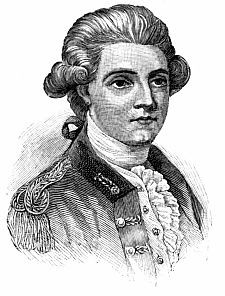
MAJOR ANDRÉ
On the 18th of May, Philadelphia was the scene of a grand farewell
banquet, called the Mischianza,—a strange medley combining the modern
parade with the mediæval tournament, wherein seven silk-clad knights of
the Blended Rose and seven more of the Burning Mountain did amicably
break lances in honour of fourteen blooming damsels dressed in Turkish
costume, while triumphal arches, surmounted by effigies of Fame,
displayed inscriptions commemorating in fulsome Latin and French the
glories of the departing general. In these curious festivities,
savouring more strongly of Bruges in the fifteenth century than of
Philadelphia in the eighteenth, it was long after remembered that the
most prominent parts were taken by the ill-starred Major André and the
charming Miss Margaret Shippen, who was soon to become the wife of
Benedict Arnold. With such farewell ceremonies Sir William Howe set sail
for England, and Sir Henry Clinton took his place as commander-in-chief
of the British armies in America.
The British evacuate Philadelphia, June 18, 1778
Washington’s position at Valley Forge had held the British in check
through the winter. They had derived no advantage from the possession of
the “rebel capital,” for such poor work as Congress could do was as well
done from York as from Philadelphia, and the political life of the
United States was diffused from one end of the country to the other. The
place was worthless as a basis for military operations. It was harder to
defend and harder to supply with food than the insular city of New York;
and, moreover, a powerful French fleet, under Count d’Estaing, was
approaching the American coast. With the control of the Delaware
imperilled, Philadelphia would soon become untenable, and, in accordance
with instructions received from the ministry, Sir Henry Clinton prepared
to evacuate the place and concentrate his forces at New York. His first
intention was to go by water; but finding that he had not transports
enough for his whole army, together with the Tory refugees who had put
themselves under his protection, he changed his plan. 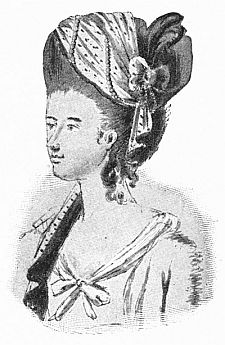
MISCHIANZA HEADDRESSThe Tories, to the
number of 3,000, with their personal effects, were sent on in the fleet,
while the army, encumbered with twelve miles of baggage wagons, began
its retreat across New Jersey. On the morning of the 18th of June, 1778,
the rear-guard of the British marched out of Philadelphia, and before
sunset the American advance marched in and took possession of the city.Arnold takes command at Philadelphia
General Arnold, whose crippled leg did not allow him to take the field,
was put in command, and after a fortnight both Congress and the state
government returned. Of the Tories who remained behind, twenty-five were
indicted, under the laws of Pennsylvania, for the crime of offering aid
to the enemy. Two Quakers, who had actually conducted a party of British
to a midnight attack upon an American outpost, were found guilty of
treason and hanged. The other twenty-three were either acquitted or
pardoned. Across the river, seventeen Tories, convicted of treason under
the laws of New Jersey, all received pardon from the governor.
Return of Charles Lee The British retreat from Philadelphia was regarded by the Americans as equivalent to a victory, and Washington was anxious to enhance the moral effect of it by a sudden blow which should cripple Sir Henry Clinton’s army. In force he was about equal to the enemy, both armies now numbering about 15,000, while in equipment and discipline his men were better off than ever before. Unfortunately, the American army had just received one addition which went far to neutralize these advantages. The mischief-maker Lee had returned. In the preceding summer the British Major-general Prescott had been captured in Rhode Island, and after a tedious negotiation of nine months Lee was exchanged for him. He arrived at Valley Forge in May, and as Washington had found a lenient interpretation for his outrageous conduct before his capture, while nothing whatever was known of his treasonable plot with the Howes, he naturally came back unquestioned to his old position as senior major-general of the army. What a frightful situation for the Americans; to have for the second officer in their army the man whom the chances of war might at any moment invest with the chief command, such a villain as this who had so lately been plotting their destruction! What would Washington, what would Congress have thought, had the truth in its blackness been so much as dreamed of? But why, we may ask, did the intriguer come back? Why did he think it worth his while to pose once more in the attitude of an American? Could it have been with the intention of playing into the hands of the enemy? and could Sir Henry Clinton have been aware of this purpose?
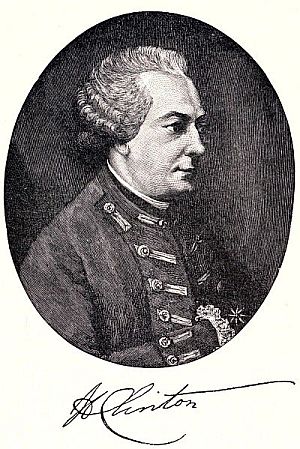
Lee’s reasons for returning Such a hypothesis, implying direct collusion between Lee and the British commander, is highly improbable. We must remember that Sir William Howe, the Whig general, had just gone home to defend his military conduct against the fierce attacks of the King’s party; and his successor, Sir Henry Clinton, was not only a Tory, but the personal relations between the two men were not altogether friendly. It is therefore hardly credible that Clinton could have known anything about Lee’s coöperation with Howe. If he had known it, we may be sure that the secret would not have lain buried for eighty years. It is much more likely that since the disastrous failure of Lee’s military advice he was reduced to painful insignificance in the British camp, and was thus prepared to welcome an opportunity for trying his fortune once more with the Americans. Indeed, the circumstances were such as hardly to leave him any choice in the matter. As a prisoner of war, he must submit to exchange. The only way to avoid it was to make a public avowal of having abandoned the American service and cast in his lot with the British. But such an avowal would at once withdraw from him General Washington’s protection, and thus leave him liable to be tried as a deserter and shot for the gratification of George III. On the whole, as the event proved, there was more safety for Lee in following Fortune’s lead back into the American camp. He came with the renewed hope of supplanting Washington uppermost in his breast. As for Clinton, there is nothing to indicate collusion between him and the traitor, but he had probably seen and heard enough to confirm the declared opinion of Sir Joseph Yorke, that such a man as Charles Lee was “the worst present the Americans could receive.”
Washington pursues the British When Philadelphia was evacuated, Lee first tried to throw Washington off on a false scent by alleging reasons for believing that Clinton did not intend to retreat across New Jersey. Failing in this, he found reasons as plentiful as blackberries why the British army should not be followed up and harassed on its retreat. Then when Washington decided that an attack must be made, he grew sulky and refused to conduct it. Washington was marching more rapidly than Clinton, on a line nearly parallel with him, to the northward, so that by the time the British general reached Allentown he found his adversary getting in front of him upon his line of retreat. Clinton had nothing to gain by fighting, if he could possibly avoid it, and accordingly he turned to the right, following the road which ran through Monmouth and Middletown to Sandy Hook. Washington now detached a force of about 5,000 men to advance swiftly and cut off the enemy’s rear, while he designed to come up and support the operation with the rest of his army. To Lee, as second in rank, the command of this advanced party properly belonged; but he declined to take it, on the ground that it was sure to be defeated, and Washington entrusted the movement to the youthful Lafayette, of the soundness of whose judgment he had already seen many proofs. But in the course of the night it occurred to Lee, whatever his miserable purpose may have been, that perhaps he might best accomplish it, after all, by taking the field. So he told Washington, next morning, that he had changed his mind, and was anxious to take the command which he had just declined. With extraordinary forbearance Washington granted his request, and arranged the affair with such tact as not to wound the feelings of Lafayette, who thus, unfortunately, lost the direction of the movement.
His plan of attack On the night of June 27th the left wing of the British army, 8,000 strong, commanded by Lord Cornwallis, encamped near Monmouth Court House, on the road from Allentown. The right wing, of about equal strength, and composed chiefly of Hessians under Knyphausen, lay just beyond the Court House on the road to Middletown. In order of march the right wing took the lead, convoying the immense baggage train. The left wing, following in the rear, was the part exposed to danger, and with it stayed Sir Henry Clinton. The American advance under Lee, 6,000 strong, lay about five miles northeast of the British line, and Washington, with the main body, was only three miles behind. Lee’s orders from Washington were positive and explicit. He was to gain the flank of the British left wing and attack it vigorously, until Washington should come up and complete its discomfiture. Lee’s force was ample, in quantity and quality, for the task assigned it, and there was fair ground for hope that the flower of the British army might thus be cut off and captured or destroyed. Since the war began there had hardly been such a golden opportunity.
Battle of Monmouth, June 28, 1778 Sunday, the 28th of June, was a day of fiery heat, the thermometer showing 96° in the shade. Early in the morning Clinton moved cautiously. Knyphausen made all haste forward on the Middletown road, and the left wing followed till it had passed more than a mile beyond Monmouth Court House, when it found itself outflanked on the north by the American columns. Lee had advanced from Freehold church by the main road, crossing two deep ravines upon causeways; and now, while his left wing was folding about Cornwallis on the north, occupying superior ground, his centre, under Wayne, was close behind, and his right, under Lafayette, had already passed the Court House, and was threatening the other end of the British line on the south. Cornwallis instantly changed front to meet the danger on the north, and a detachment was thrown down the road toward the Court House to check Lafayette. The British position was one of peril, but the behaviour of the American commander now became very extraordinary. When Wayne was beginning his attack, he was ordered by Lee to hold back and simply make a feint, as the main attack was to be made in another quarter. While Wayne was wondering at this, the British troops coming down the road were seen directing their march so as to come between Wayne and Lafayette. It would be easy to check them, but the marquis had no sooner started than Lee ordered him back, murmuring about its being impossible to stand against British soldiers.Lee’s shameful retreat Lafayette’s suspicions were now aroused, and he sent a dispatch in all haste to Washington, saying that his presence in the field was sorely needed. The army was bewildered. Fighting had hardly begun, but their position was obviously so good that the failure to make prompt use of it suggested some unknown danger. One of the divisions on the left was now ordered back by Lee, and the others, seeing this retrograde movement, and understanding it as the prelude to a general retreat, began likewise to fall back. All thus retreated, though without flurry or disorder, to the high ground just east of the second ravine which they had crossed in their advance. All the advantage of their offensive movement was thus thrown away without a struggle, but the position they had now reached was excellent for a defensive fight. To the amazement of everybody, Lee ordered the retreat to be continued across the marshy ravine. As they crowded upon the causeway the ranks began to fall into some disorder. Many sank exhausted from the heat. No one could tell from what they were fleeing, and the exultant ardour with which they had begun to enfold the British line gave place to bitter disappointment, which vented itself in passionate curses. So they hurried on, with increasing disorder, till they approached the brink of the westerly ravine, where their craven commander met Washington riding up.
Washington retrieves the situation The men who then beheld Washington’s face and listened to his outburst of wrath could never forget it for the rest of their lives. It was one of those moments that live in tradition. People of to-day, who know nothing else about Charles Lee, think of him vaguely as the man whom Washington upbraided at Monmouth. People who know nothing else about the battle of Monmouth still dimly associate the name with the disgrace of a General Lee. Not many words were wasted.[17] Leaving the traitor cowering and trembling in his stirrups, Washington hurried on to rally the troops and form a new front. There was not a moment to lose, for the British were within a mile of them, and their fire began before the line of battle could be formed. To throw a mass of disorderly fugitives in the face of advancing reinforcements, as Lee had been on the point of doing, was to endanger the organization of the whole force. It was now that the admirable results of Steuben’s teaching were to be seen. The retreating soldiers immediately wheeled and formed under fire with as much coolness and precision as they could have shown on parade, and while they stopped the enemy’s progress, Washington rode back and brought up the main body of his army. On some heights to the left of the enemy Greene placed a battery which enfiladed their lines with deadly effect, while Wayne attacked them vigorously in front. After a brave resistance, the British were driven back upon the second ravine which Lee had crossed in the morning’s advance. Washington now sent word to Steuben, who was a couple of miles in the rear, telling him to bring up three brigades and press the retreating enemy. Some time before this he had again met Lee and ordered him to the rear, for his suspicion was now thoroughly aroused. As the traitor rode away from the field, baffled and full of spite, he met Steuben advancing, and tried to work one final piece of mischief. He tried to persuade Steuben to halt, alleging that he must have misunderstood Washington’s orders; but the worthy baron was not to be trifled with, and doggedly kept on his way.[18] The British were driven in some confusion across the ravine, and were just making a fresh stand on the high ground east of it when night put an end to the strife. Washington sent out parties to attack them on both flanks as soon as day should dawn; but Clinton withdrew in the night, taking with him many of his wounded men, and by daybreak had joined Knyphausen on the heights of Middletown, whither it was useless to follow him.
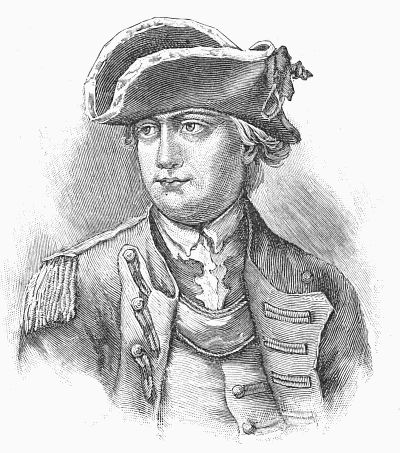
CHARLES LEE
It was a drawn battle The total American loss in the battle of Monmouth was 362. The British loss is commonly given as 416, but must have been much greater. According to Washington’s own account, the Americans buried on the battlefield 245 British dead, but could not count the wounded, as so many had been carried away; from the ordinary proportion of four or five wounded to one man killed, he estimates the number at from 1,000 to 1,200.[19] More than 100 of the British were taken prisoners. On both sides there were many deaths from sunstroke. The battle has usually been claimed as a victory for the Americans; and so it was in a certain sense, as they drove the enemy from the field. Strategically considered, however, Lord Stanhope is quite right in calling it a drawn battle. The purpose for which Washington undertook it was foiled by the treachery of Lee. Nevertheless, in view of the promptness with which Washington turned defeat into victory, and of the greatly increased efficiency which it showed in the soldiers, the moral advantage was doubtless with the Americans. It deepened the impression produced by the recovery of Philadelphia, it silenced the cavillers against Washington,[20] and its effect upon Clinton’s army was disheartening. More than 2,000 of his men, chiefly Hessians, deserted in the course of the following week.
During the night after the battle, the behaviour of Lee was the theme of excited discussion among the American officers. By the next day, having recovered his self-possession, he wrote a petulant letter to Washington, demanding an apology for his language on the battlefield. Washington’s reply was as follows:—
Washington’s letter to Lee.“Sir,—I received your letter, expressed, as I conceive, in terms highly improper. I am not conscious of making use of any very singular expressions at the time of meeting you, as you intimate. What I recollect to have said was dictated by duty and warranted by the occasion. As soon as circumstances will permit, you shall have an opportunity of justifying yourself to the army, to Congress, to America, and to the world in general; or of convincing them that you were guilty of a breach of orders, and of misbehaviour before the enemy on the 28th instant, in not attacking them as you had been directed, and in making an unnecessary, disorderly, and shameful retreat.”
Trial and sentence of Lee To this terrible letter Lee sent the following impudent answer: “You cannot afford me greater pleasure than in giving me the opportunity of showing to America the sufficiency of her respective servants. I trust that temporary power of office and the tinsel dignity attending it will not be able, by all the mists they can raise, to obfuscate the bright rays of truth.” Washington replied by putting Lee under arrest. A court-martial was at once convened, before which he was charged with disobedience of orders in not attacking the enemy, with misbehaviour on the field in making an unnecessary and shameful retreat, and, lastly, with gross disrespect to the commander-in-chief. After a painstaking trial, which lasted more than a month, he was found guilty on all three charges, and suspended from command in the army for the term of one year.
This absurdly inadequate sentence is an example of the extreme and sometimes ill-judged humanity which has been wont to characterize judicial proceedings in America. Many a European soldier has been ruthlessly shot for less serious misconduct. A commander can be guilty of no blacker crime than knowingly to betray his trust on the field of battle. But in Lee’s case, the very enormity of his crime went far to screen him from the punishment which it deserved. People are usually slow to believe in criminality that goes far beyond the ordinary wickedness of the society in which they live. If a candidate for Congress is accused of bribery or embezzlement, we unfortunately find it easy to believe the charge; but if he were to be accused of attempting to poison his rival, we should find it very hard indeed to believe it. In the France of Catherine de’ Medici or the Italy of Cæsar Borgia, the one accusation would have been as credible as the other, but we have gone far toward outgrowing some of the grosser forms of crime. In American history, as in modern English history, instances of downright treason have been very rare; and in proportion as we are impressed with their ineffable wickedness are we slow to admit the possibility of their occurrence. In ancient Greece and in mediæval Italy there were many Benedict Arnolds; in the United States a single plot for surrendering a stronghold to the enemy has consigned its author to a solitary immortality of infamy. But unless the proof of Arnold’s treason had been absolutely irrefragable, many persons would have refused to believe it. In like manner, people were slow to believe that Lee could have been so deliberately wicked as to plan the defeat of the army in which he held so high a command, and some historians have preferred to regard his conduct as wholly unintelligible, rather than adopt the only clue by which it can be explained. He might have been bewildered, he might have been afraid, he might have been crazy, it was suggested; and to the latter hypothesis his well-known eccentricity gave some countenance. It was perhaps well for the court-martial to give him the benefit of the doubt, but in any case it should have been obvious that he had proved himself permanently unfit for a command.
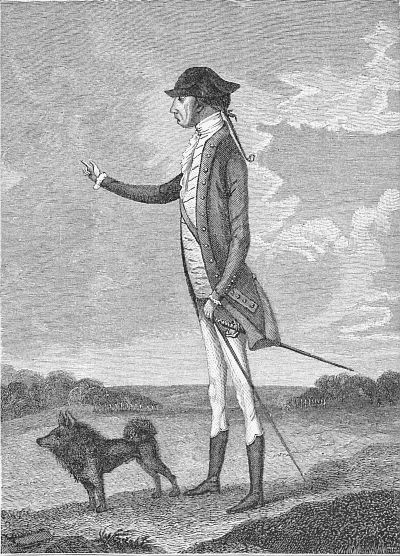
CARICATURE OF CHARLES LEE
Lee’s character and schemes Historians for a long time imitated the clemency of the court-martial by speaking of the “waywardness” of General Lee. Nearly eighty years elapsed before the discovery of that document which justifies us in putting the worst interpretation upon his acts, while it enables us clearly to understand the motives which prompted them. Lee was nothing but a selfish adventurer. He had no faith in the principles for which the Americans were fighting, or indeed in any principles. He came here to advance his own fortunes, and hoped to be made commander-in-chief. Disappointed in this, he began at once to look with hatred and envy upon Washington, and sought to thwart his purposes, while at the same time he intrigued with the enemy. He became infatuated with the idea of playing some such part in the American Revolution as Monk had played in the Restoration of Charles II. This explains his conduct in the autumn of 1776, when he refused to march to the support of Washington. Should Washington be defeated and captured, then Lee, as next in command and at the head of a separate army, might negotiate for peace. His conduct as prisoner in New York, first in soliciting an interview with Congress, then in giving aid and counsel to the enemy, is all to be explained in the same way. And his behaviour in the Monmouth campaign was part and parcel of the same crooked policy. Lord North’s commissioners had just arrived from England to offer terms to the Americans, but in the exultation over Saratoga and the French alliance, now increased by the recovery of Philadelphia, there was little hope of their effecting anything. The spirits of these Yankees, thought Lee, must not be suffered to rise too high, else they will never listen to reason. So he wished to build a bridge of gold for Clinton to retreat by; and when he found it impossible to prevent an attack, his second thoughts led him to take command, in order to keep the game in his own hands. Should Washington now incur defeat by adopting a course which Lee had emphatically condemned as impracticable, the impatient prejudices upon which the cabal had played might be revived. The downfall of Washington would perhaps be easy to compass; and the schemer would thus not only enjoy the humiliation of the man whom he so bitterly hated, but he might fairly hope to succeed him in the chief command, and thus have an opportunity of bringing the war to a “glorious” end through a negotiation with Lord North’s commissioners. Such thoughts as these were, in all probability, at the bottom of Lee’s extraordinary behaviour at Monmouth. They were the impracticable schemes of a vain, egotistical dreamer. That Washington and Chatham, had that great statesman been still alive, might have brought the war to an honourable close through open and frank negotiation was perhaps not impossible. That such a man as Lee, by paltering with agents of Lord North, should effect anything but mischief and confusion was inconceivable. But selfishness is always incompatible with sound judgment, and Lee’s wild schemes were quite in keeping with his character. The method he adopted for carrying them out was equally so. It would have been impossible for a man of strong military instincts to have relaxed his clutch upon an enemy in the field, as Lee did at the battle of Monmouth. If Arnold had been there that day, with his head never so full of treason, an irresistible impulse would doubtless have led him to attack the enemy tooth and nail, and the treason would have waited till the morrow.
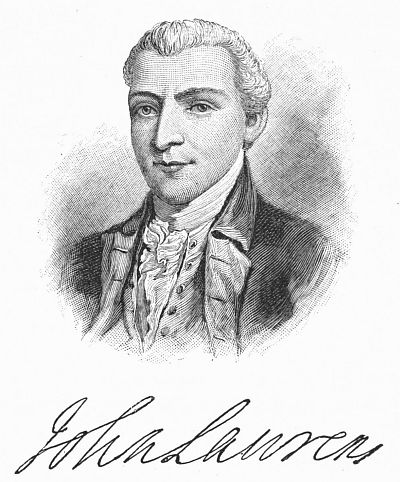
Lee’s expulsion from the army As usually happens in such cases, the selfish schemer overreached himself. Washington won a victory, after all; the treachery was detected, and the traitor disgraced. Maddened by the destruction of his air-castles, Lee now began writing scurrilous articles in the newspapers. He could not hear Washington’s name mentioned without losing his temper, and his venomous tongue at length got him into a duel with Colonel Laurens, one of Washington’s aids and son of the president of Congress. He came out of the affair with nothing worse than a wound in the side; but when, a little later, he wrote an angry letter to Congress, he was summarily expelled from the army. “Ah, I see,” he said, aiming a Parthian shot at Washington, “if you wish to become a great general in America, you must learn to grow tobacco;” and so he retired to a plantation which he had in the Shenandoah valley. His deathHe lived to behold the triumph of the cause which he had done so much to injure, and in October, 1782, he died in a mean public-house in Philadelphia, friendless and alone. His last wish was that he might not be buried in consecrated ground, or within a mile of any church or meeting-house, because he had kept so much bad company in this world that he did not choose to continue it in the next. But in this he was not allowed to have his way. He was buried in the cemetery of Christ Church in Philadelphia, and many worthy citizens came to the funeral.
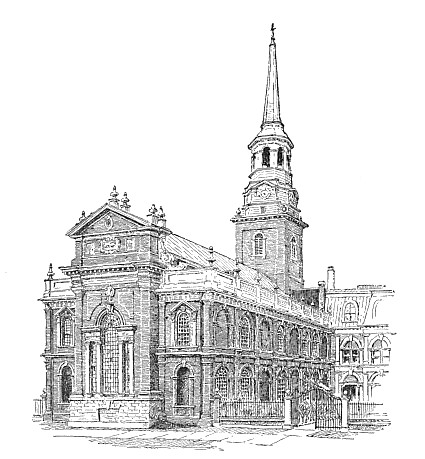
CHRIST CHURCH, PHILADELPHIA
The situation at New York When Washington, after the battle of Monmouth, saw that it was useless further to molest Clinton’s retreat, he marched straight for the Hudson river, and on the 20th of July he encamped at White Plains, while his adversary took refuge in New York. The opposing armies occupied the same ground as in the autumn of 1776; but the Americans were now the aggressive party. Howe’s object in 1776 was the capture of Washington’s army; Clinton’s object in 1778 was limited to keeping possession of New York. There was now a chance for testing the worth of the French alliance. With the aid of a powerful French fleet, it might be possible to capture Clinton’s army, and thus end the war at a blow. But this was not to be. The French fleet of twelve ships-of-the-line and six frigates, commanded by the Count d’Estaing, sailed from Toulon on the 13th of April, and after a tedious struggle with head-winds arrived at the mouth of the Delaware on the 8th of July, just too late to intercept Lord Howe’s squadron. The fleet contained a land force of 4,000 men, and brought over M. Gérard, the first minister from France to the United States. Finding nothing to do on the Delaware, the count proceeded to Sandy Hook, where he was boarded by Washington’s aids, Laurens and Hamilton, and a council of war was held. As the British fleet in the harbour consisted of only six ships-of-the-line, with several frigates and gunboats, it seemed obvious that it might be destroyed or captured by Estaing’s superior force, and then Clinton would be entrapped in the island city. But this plan was defeated by a strange obstacle. The French fleet unable to enter the harbourThough the harbour of New York is one of the finest in the world, it has, like most harbours situated at the mouths of great rivers, a bar at the entrance, which in 1778 was far more troublesome than it is to-day. Since that time the bar has shifted its position and been partially worn away, so that the largest ships can now freely enter, except at low tide. But when the American pilots examined Estaing’s two largest ships, which carried eighty and ninety guns respectively, they declared it unsafe, even at high tide, for them to venture upon the bar. The enterprise was accordingly abandoned, but in its stead another one was undertaken, which, if successful, might prove hardly less decisive than the capture of New York.
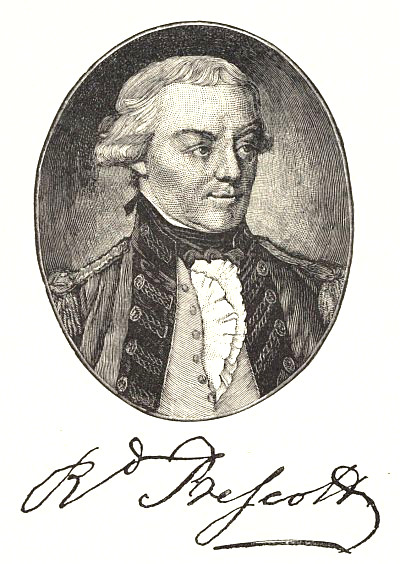
General Prescott at Newport
After their expulsion from Boston in the first year of the war, the
British never regained their foothold upon the mainland of New England.
But in December, 1776, the island which gives its name to the state of
Rhode Island had been seized by Lord Percy, and the enemy had occupied
it ever since. From its commanding position at the entrance to the
Sound, it assisted them in threatening the Connecticut coast; and, on
the other hand, should occasion require, it might even enable them to
threaten Boston with an overland attack. After Lord Percy’s departure
for England in the spring of 1777, the command devolved upon
Major-general Richard Prescott, an unmitigated brute. Under his rule no
citizen of Newport was safe in his own house. He not only arrested
people and threw them into jail without assigning any reason, but he
encouraged his soldiers in plundering houses and offering gross insults
to ladies, as well as in cutting down shade-trees and wantonly defacing
the beautiful lawns. A great loud-voiced, irascible fellow, swelling
with the sense of his own importance, if he chanced to meet with a
Quaker who failed to take off his hat, he would seize him by the collar
and knock his head against the wall, or strike him over the shoulders
with the big gnarled stick which he usually carried. One night in July,
as this petty tyrant was sleeping at a country house about five miles
from Newport, a party of soldiers rowed over from the mainland in boats,
under the guns of three British frigates, and, taking the general out of
bed, carried him off in his night-gown. He was sent to Washington’s
headquarters on the Hudson. As he passed through the village of Lebanon,
in Connecticut, he stopped to dine at an old inn kept by one Captain
Alden. He was politely received, and in the course of the meal Mrs.
Alden set upon the table a dish of succotash, whereupon Prescott, not
knowing the delicious dish, roared, “What do you mean by offering me
this hog’s food?” and threw it all upon the floor.
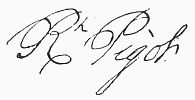 The good woman
retreated in tears to the kitchen, and presently her husband, coming in
with a stout horsewhip, dealt with the boor as he deserved. When
Prescott was exchanged for General Lee, in April, 1778, he resumed the
command at Newport, but was soon superseded by the amiable and
accomplished Sir Robert Pigot, under whom the garrison was increased to
6,000 men.
The good woman
retreated in tears to the kitchen, and presently her husband, coming in
with a stout horsewhip, dealt with the boor as he deserved. When
Prescott was exchanged for General Lee, in April, 1778, he resumed the
command at Newport, but was soon superseded by the amiable and
accomplished Sir Robert Pigot, under whom the garrison was increased to
6,000 men.
Attempt to capture the British garrison at Newport New York and Newport were now the only places held by the enemy in the United States, and the capture of either, with its army of occupation, would be an event of prime importance. As soon as the enterprise was suggested, the New England militia began to muster in force, Massachusetts sending a strong contingent under John Hancock. General Sullivan had been in command at Providence since April. Washington now sent him 1,500 picked men of his Continental troops, with Greene, who was born hard by and knew every inch of the island; with Glover, of amphibious renown; and Lafayette, who was a kinsman of the Count d’Estaing. The New England yeomanry soon swelled this force to about 9,000, and with the 4,000 French regulars and the fleet, it might well be hoped that General Pigot would quickly be brought to surrender.
The expedition failed through the inefficient coöperation of the French and the insubordination of the yeomanry. Estaing arrived off the harbour of Newport on the 29th of July, and had a conference with Sullivan. It was agreed that the Americans should land upon the east side of the island while the French were landing upon the west side, thus intervening between the main garrison at Newport and a strong detachment which was stationed on Butts Hill, at the northern end of the island. By such a movement this detachment might be isolated and captured, to begin with. But General Pigot, divining the purpose of the allies, withdrew the detachment, and concentrated all his forces in and around the city. At this moment the French troops were landing upon Conanicut island, intending to cross to the north of Newport on the morrow, according to the agreement. Sullivan seizes Butts HillSullivan did not wait for them, but seeing the commanding position on Butts Hill evacuated, he rightly pushed across the channel and seized it, while at the same time he informed Estaing of his reasons for doing so. The count, not understanding the situation, was somewhat offended at what he deemed undue haste on the part of Sullivan, but thus far nothing had happened to disturb the execution of their scheme. He had only to continue landing his troops and blockade the southern end of the island with his fleet, and Sir Robert Pigot was doomed. But the next day Lord Howe appeared off Point Judith, with thirteen ships-of-the line, seven frigates, and several small vessels, and Estaing, reëmbarking the troops he had landed on Conanicut, straightway put out to sea to engage him. For two days the hostile fleets manœuvred for the weather-gage, and just as they were getting ready for action there came up a terrific storm, which scattered them far and wide. Instead of trying to destroy one another, each had to bend all his energies to saving himself. Naval battle prevented by stormSo fierce was the storm that it was remembered in local tradition as lately as 1850 as “the Great Storm.” Windows in the town were incrusted with salt blown up in the ocean spray. Great trees were torn up by the roots, and much shipping was destroyed along the coast.
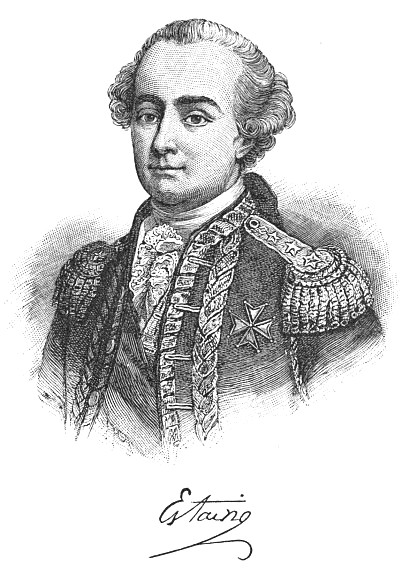
Estaing goes to Boston, to refit his ships It was not until the 20th of August that Estaing brought in his squadron, somewhat damaged from the storm. He now insisted upon going to Boston to refit, in accordance with general instructions received from the ministry before leaving home. It was urged in vain by Greene and Lafayette that the vessels could be repaired as easily in Narragansett Bay as in Boston harbour; that by the voyage around Cape Cod, in his crippled condition, he would only incur additional risk; that by staying he would strictly fulfil the spirit of his instructions; that an army had been brought here, and stores collected, in reliance upon his aid; that if the expedition were to be ruined through his failure to coöperate, it would sully the honour of France and give rise to hard feelings in America; and finally, that even if he felt constrained, in spite of sound arguments, to go and refit at Boston, there was no earthly reason for his taking the 4,000 French soldiers with him. The count was quite disposed to yield to these sensible remonstrances, but on calling a council of war he found himself overruled by his officers. Estaing was not himself a naval officer, but a lieutenant-general in the army, and it has been said that the officers of his fleet, vexed at having a land-lubber put over them, were glad of a chance to thwart him in his plans. However this may have been, it was voted that the letter of the royal instructions must be blindly adhered to, and so on the 23d Estaing weighed anchor for Boston, taking the land forces with him, and leaving General Sullivan in the lurch.
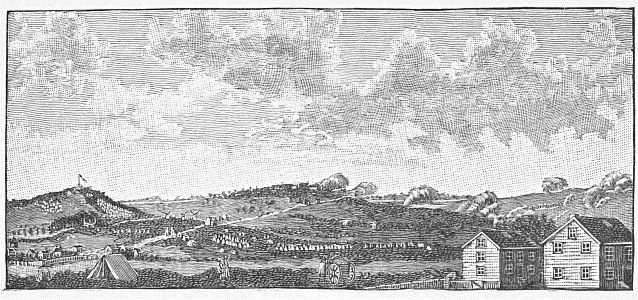
BATTLE OF BUTTS HILL
Yeomanry go home in disgust Great was the exasperation in the American camp. Sullivan’s vexation found indiscreet expression in a general order, in which he hoped the event would prove America “able to procure that by her own arms which her allies refuse to assist in obtaining.” But the insubordination of the volunteers now came in to complicate the matter. Some 3,000 of them, despairing of success and impatient at being kept from home in harvest time, marched away in disgust and went about their business, thus reducing Sullivan’s army to the same size as that of the enemy. The investment of Newport, by land, had already been completed, but the speedy success of the enterprise depended upon a superiority of force, and in case of British reinforcements arriving from New York the American situation would become dangerous. Upon these grounds, Sullivan, on the 28th, decided to retreat to the strong position at Butts Hill, and await events. Lafayette mounted his horse and rode the seventy miles to Boston in seven hours, to beg his kinsman to return as soon as possible. Estaing despaired of getting his ships ready for many days, but, catching a spark of the young man’s enthusiasm, he offered to bring up his troops by land. Fired with fresh hope, the young marquis spurred back as fast as he had come, but when he arrived on the scene of action all was over. As soon as Sullivan’s retreat was perceived the whole British army gave chase. Battle of Butts Hill, Aug. 29, 1778After the Americans had retired to their lines on Butts Hill, Sir Robert Pigot tried to carry their position by storm, and there ensued an obstinate fight, in which the conditions were in many respects similar to those of Bunker Hill; but this time the Americans had powder enough, and the British were totally defeated. This slaughter of their brave men was useless. The next day Sullivan received a dispatch from Washington, with the news that Clinton had started from New York with 5,000 men to reinforce Sir Robert Pigot. Under these circumstances, it was rightly thought best to abandon the island. The enterprise abandonedThe services of General Glover, who had taken Washington’s army across the East River after the defeat of Long Island, and across the Delaware before the victory of Trenton, were called into requisition, and all the men and stores were ferried safely to the mainland; Lafayette arriving from Boston just in time to bring off the pickets and covering-parties. The next day Clinton arrived with his 5,000 men, and the siege of Newport was over.
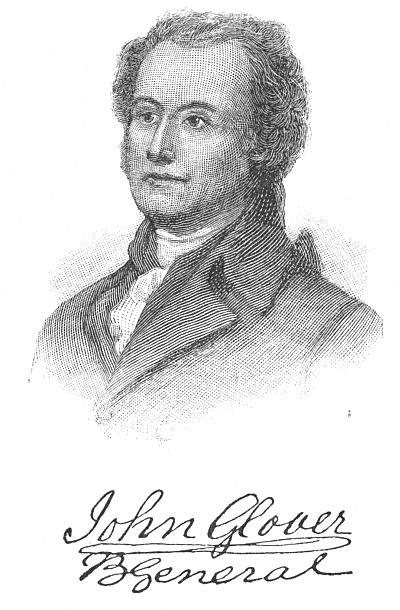
Unpopularity of the French alliance The failure of this enterprise excited much indignation, and seemed to justify the distrust with which so many people regarded the French alliance. In Boston the ill-feeling found vent in a riot on the wharves between French and American sailors, and throughout New England there was loud discontent. It required all Washington’s tact to keep peace between the ill-yoked allies. When Congress passed a politic resolution approving the course of the French commander, it met with no cordial assent from the people. When, in November, Estaing took his fleet to the West Indies, for purposes solely French, the feeling was one of lively disgust, which was heightened by an indiscreet proclamation of the count inviting the people of Canada to return to their old allegiance. For the American people regarded the work of Pitt as final, and at no time during the war did their feeling against Great Britain rise to such a point as to make them willing to see the French restored to their old position on this continent. The sagacious Vergennes understood this so well that Estaing’s proclamation found little favour in his eyes. But it served none the less to irritate the Americans, and especially the people of New England.
Stagnation of the war in the northern states So far as the departure of the fleet for the West Indies was concerned, the American complaints were not wholly reasonable; for the operations of the French in that quarter helped materially to diminish the force which Great Britain could spare for the war in the United States. On the very day of Estaing’s departure, Sir Henry Clinton was obliged to send 5,000 men from New York to take part in the West India campaign. This new pressure put upon England by the necessity of warding off French attack went on increasing. In 1779 England had 314,000 men under arms in various parts of the world, but she had so many points to defend that it was difficult for her to maintain a sufficient force in America. In the autumn of that year, Sir Henry Clinton did not regard his position in New York as secure enough to justify him any longer in sparing troops for the occupation of Newport, and the island was accordingly evacuated. From this time till the end of the war, the only point which the British succeeded in holding, north of Virginia, was the city of New York. After the Rhode Island campaign of 1778, no further operations occurred at the North between the two principal armies which could properly be said to constitute a campaign. Clinton’s resources were too slender for him to do anything but hold New York. Washington’s resources were too slender for him to do anything but sit and watch Clinton. While the two commanders-in-chief thus held each other at bay, the rapid and violent work of the war was going on in the southern states, conducted by subordinate officers. During much of this time Washington’s army formed a cordon about Manhattan Island, from Danbury in Connecticut to Elizabethtown in New Jersey, and thus blockaded the enemy. But while there were no decisive military operations in the northern states during this period, many interesting and important events occurred which demand consideration before we go on to treat of the great southern campaigns which ended the war.
The barbarous border fighting of the Revolutionary War was largely due to the fact that powerful tribes of wild Indians still confronted us on every part of our steadily advancing frontier. They would have tortured and scalped our backwoodsmen even if we had had no quarrel with George III., and there could be no lasting peace until they were crushed completely. When the war broke out, their alliance with the British was natural, but the truculent spirit which sought to put that savage alliance to the worst uses was something which it would not be fair to ascribe to the British commanders in general; it must be charged to the account of Lord George Germain and a few unworthy men who were willing to be his tools.
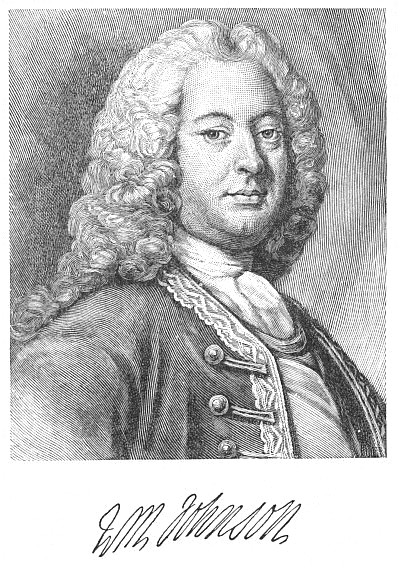
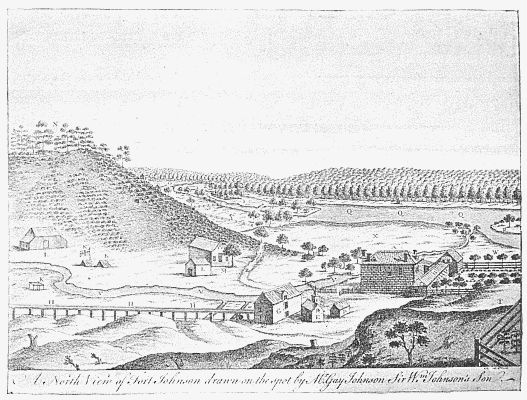
A North View of Fort Johnson drawn on the spot by Mr. Guy Johnson, Sir Wm. Johnson’s Son.
Joseph Brant, missionary and war-chief In the summer of 1778 this horrible border warfare became the most conspicuous feature of the struggle, and has afforded themes for poetry and romance, in which the figures of the principal actors are seen in a lurid light. One of these figures is of such importance as to deserve especial mention. Joseph Brant, or Thayendanegea, was perhaps the greatest Indian of whom we have any knowlege; certainly the history of the red men presents no more many-sided and interesting character. A pure-blooded Mohawk, descended from a line of distinguished chiefs,[21] in early boyhood he became a favourite with Sir William Johnson, and the laughing black eyes of his handsome sister, Molly Brant, so fascinated the rough baronet that he took her to Johnson Hall as his wife, after the Indian fashion. Sir William believed that Indians could be tamed and taught the arts of civilized life, and he laboured with great energy, and not without some success, in this difficult task. The young Thayendanegea was sent to be educated at the school in Lebanon, Connecticut, which was afterwards transferred to New Hampshire and developed into Dartmouth College. At this school he not only became expert in the use of the English language, in which he learned to write with elegance and force, but he also acquired some inkling of general literature and history. He became a member of the Episcopal Church, and after leaving school he was for some time engaged in missionary work among the Mohawks, and translated the Prayer-Book and parts of the New Testament into his native language. He was a man of earnest and serious character, and his devotion to the church endured throughout his life. Some years after the peace of 1783, the first Episcopal church ever built in Upper Canada was erected by Joseph Brant, from funds which he had collected for the purpose while on a visit to England. But with this character of devout missionary and earnest student Thayendanegea combined, in curious contrast, the attributes of an Iroquois war-chief developed to the highest degree of efficiency. There was no accomplishment prized by Indian braves in which he did not outshine all his fellows. He was early called to take the war-path. In the fierce struggle with Pontiac he fought with great distinction on the English side, and at the beginning of the War of Independence he was one of the most conspicuous of Iroquois war-chiefs.
It was the most trying time that had ever come to these haughty lords of the wilderness, and called for all the valour and diplomacy which they could summon. Brant was equal to the occasion, and no chieftain ever fought a losing cause with greater spirit than he. We have seen how at Oriskany he came near turning the scale against us in one of the critical moments of a great campaign. From the St. Lawrence to the Susquehanna his name became a name of terror. Equally skilful and zealous, now in planning the silent night march and deadly ambush, now in preaching the gospel of peace, he reminds one of some newly reclaimed Frisian or Norman warrior of the Carolingian age. But in the eighteenth century the incongruity is more striking than in the tenth, in so far as the traits of the barbarian are more vividly projected against the background of a higher civilization. It is odd to think of Thayendanegea, who could outyell any of his tribe on the battlefield, sitting at table with Burke and Sheridan, and behaving with the modest grace of an English gentleman. The tincture of civilization he had acquired, moreover, was by no means superficial. Though engaged in many a murderous attack, his conduct was not marked by the ferocity so characteristic of the Iroquois. Though he sometimes approved the slaying of prisoners on grounds of public policy, he was flatly opposed to torture, and never would allow it. He often went out of his way to rescue women and children from the tomahawk, and the instances of his magnanimity toward suppliant enemies were very numerous.
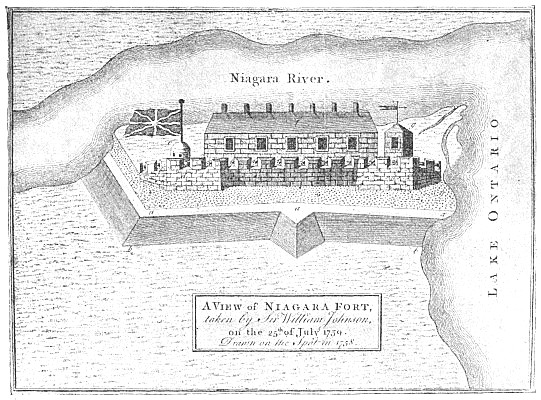
A View of Niagara Fort
The Tories of western New York At the beginning of the war the influence of the Johnsons had kept all the Six Nations on the side of the Crown, except the Oneidas and Tuscaroras, who were prevailed upon by New England missionaries to maintain an attitude of neutrality. The Indians in general were quite incapable of understanding the issue involved in the contest, but Brant had some comprehension of it, and looked at the matter with Tory eyes. The loyalists in central New York were numerous, but the patriot party was the stronger, and such fierce enmities were aroused in this frontier society that most of the Tories were obliged to abandon their homes and flee to the wilds of western New York and Upper Canada, where they made the beginnings of the first English settlement in that country. There, under their leaders, the Johnsons, with Colonel John Butler and his son Walter, they had their headquarters at Fort Niagara, where they were joined by Brant with his Mohawks. Secure in the possession of that remote stronghold, they made it the starting-point of their frequent and terrible excursions against the communities which had cast them forth. These rough frontiersmen, many of them Scotch Highlanders of the old stripe, whose raiding and reaving propensities had been little changed by their life in an American wilderness, were in every way fit comrades for their dusky allies. Clothed in blankets and moccasins, decked with beads and feathers, and hideous in war-paint, it was not easy to distinguish them from the stalwart barbarians whose fiendish cruelties they often imitated and sometimes surpassed. Border tradition tells of an Indian who, after murdering a young mother with her three children, as they sat by the evening fireside, was moved to pity by the sight of a little infant sweetly smiling at him from its cradle; but his Tory comrade picked up the babe with the point of his bayonet, and, as he held it writhing in mid-air, exclaimed, “Is not this also a d—d rebel?” There are many tales of like import, and whether always true or not they seem to show the reputation which these wretched men had won. The Tory leaders took less pains than Thayendanegea to prevent useless slaughter, and some of the atrocities permitted by Walter Butler have never been outdone in the history of savage warfare.
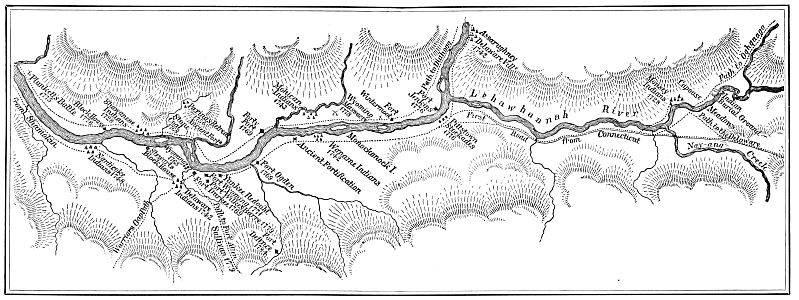
EARLY MAP OF WYOMING AND LACKAWANNA VALLEYS.
The valley of Wyoming and its settlers from Connecticut During the year 1778 the frontier became the scene of misery such as had not been witnessed since the time of Pontiac. Early in July there came a blow at which the whole country stood aghast. The valley of Wyoming, situated in northeastern Pennsylvania, where the Susquehanna makes its way through a huge cleft in the mountains, had become celebrated for the unrivalled fertility and beauty which, like the fatal gift of some unfriendly power, served only to make it an occasion of strife. The lovely spot lay within the limits of the charter of Connecticut, granted in 1662, according to which that colony or plantation was to extend westward to the Pacific Ocean. It also lay within the limits of the charter of 1681, by which the proprietary colony of Pennsylvania had been founded. About one hundred people from Connecticut had settled in Wyoming in 1762, but within a year this little settlement was wiped out in blood and fire by the Indians. In 1768 some Pennsylvanians began to settle in the valley, but they were soon ousted by a second detachment of Yankees, and for three years a miniature war was kept up, with varying fortunes, until at last the Connecticut men, under Zebulon Butler and Lazarus Stewart, were victorious. In 1771 the question was referred to the law-officers of the Crown, and the claim of Connecticut was sustained. Settlers now began to come rapidly,—the forerunners of that great New England migration which in these latter days has founded so many thriving states in the West. By the year 1778 the population of the valley exceeded 3,000, distributed in several pleasant hamlets, with town-meetings, schools and churches, and all the characteristics of New England orderliness and thrift. Most of the people were from Connecticut, and were enthusiastic and devoted patriots, but in 1776 a few settlers from the Hudson valley had come in, and, exhibiting Tory sympathies, were soon after expelled. Here was an excellent opportunity for the loyalist border ruffians to wreak summary vengeance upon their enemies. Here was a settlement peculiarly exposed in position, regarded with no friendly eyes by its Pennsylvania neighbours, and, moreover, ill provided with defenders, for it had sent the best part of its trained militia to serve in Washington’s army.
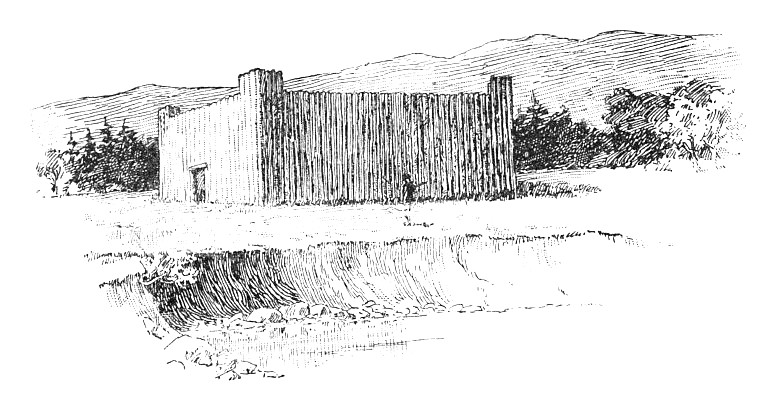
FORTY FORT, WYOMING
Massacre at Wyoming, July 3, 1778 These circumstances did not escape the keen eye of Colonel John Butler, and in June, 1778, he took the war-path from Niagara, with a company of his own rangers, a regiment of Johnson’s Greens, and a band of Senecas under their chief Sayenqueraghta, commonly called Old King; in all about 1,200 men. Reaching the Susquehanna, they glided down the swift stream in bark canoes, landed a little above the doomed settlement, and began their work of murder and pillage. Consternation filled the valley. The women and children were huddled in a blockhouse called Forty Fort, and Colonel Zebulon Butler, with 300 men, went out to meet the enemy. There seemed to be no choice but to fight, though the odds were so desperate. As the enemy came in sight, late in the afternoon of July 3d, the patriots charged upon them, and for about an hour there was a fierce struggle, till, overwhelmed by weight of numbers, the little band of defenders broke and fled. Some made their way to the fort, and a few escaped to the mountains, but nearly all were overtaken and slain, save such as were reserved for the horrors of the night. The second anniversary of independence was ushered in with dreadful orgies in the valley of Wyoming. Some of the prisoners were burned at the stake, some were laid upon hot embers and held down with pitchforks till they died, some were hacked with knives. Sixteen poor fellows were arranged in a circle, while an old half-breed hag, known as Queen Esther, and supposed to be a granddaughter of the famous Frontenac, danced slowly around the ring, shrieking a death-song as she slew them one after the other with her tomahawk.
The next day, when Forty Fort surrendered, no more lives were taken, but the Indians plundered and burned all the houses, while the inhabitants fled to the woods or to the nearest settlements on the Lehigh and Delaware, and the vale of Wyoming was for a time abandoned. Dreadful sufferings attended the flight. A hundred women and children perished of fatigue and starvation in trying to cross the swamp, which has since been known to this day as the “Shades of Death." Several children were born in that fearful spot, only to die there with their unhappy mothers. Such horrors needed no exaggeration in the telling, yet from the confused reports of the fugitives, magnified by popular rumour, a tale of wholesale slaughter went abroad which was even worse than the reality, but which careful research has long since completely disproved.
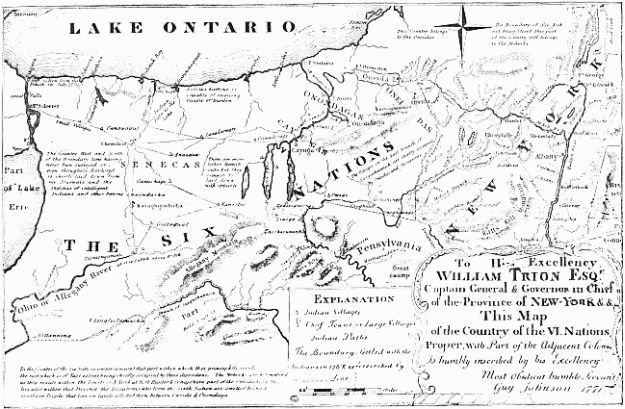
The Six Nations
Massacre at Cherry Valley, Nov. 10 The popular reputation of Brant as an incarnate demon rests largely upon the part which he was formerly supposed to have taken in the devastation of Wyoming. But the “monster Brant,” who figures so conspicuously in Campbell’s celebrated poem, was not even present on this occasion. Thayendanegea was at that time at Niagara. It was not long, however, before he was concerned in a bloody affair in which Walter Butler was principal. The village of Cherry Valley, in central New York, was destroyed on the 10th of November by a party of 700 Tories and Indians. All the houses were burned, and about fifty of the inhabitants murdered, without regard to age or sex.[22] Many other atrocious things were done in the course of this year; but the affairs of Wyoming and Cherry Valley made a deeper impression than any of the others. Among the victims there were many refined gentlemen and ladies, well known in the northern states, and this was especially the case of Cherry Valley.
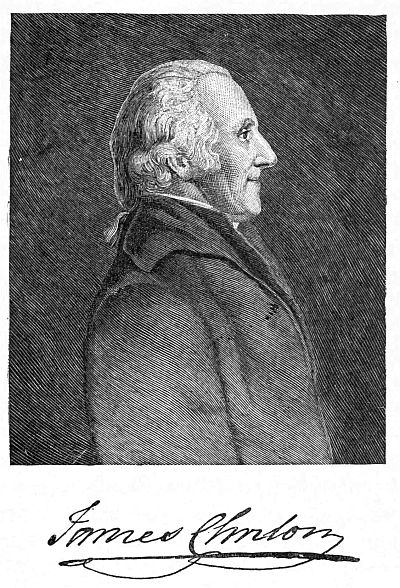
Sullivan’s expedition Washington made up his mind that exemplary vengeance must be taken, and the source of the evil extinguished as far as possible. An army of 5,000 men was sent out in the summer of 1779, with instructions to lay waste the country of the hostile Iroquois and capture the nest of Tory miscreants at Fort Niagara. The command of the expedition was offered to Gates, and when he testily declined it, as requiring too much hard work from a man of his years, it was given to Sullivan. To prepare such an army for penetrating to a depth of four hundred miles through the forest was no light task; and before they had reached the Iroquois country, Brant had sacked the town of Minisink and annihilated a force of militia sent to oppose him. Yet the expedition was well timed for the purpose of destroying the growing crops of the enemy. The army advanced in two divisions. The right wing, under General James Clinton, proceeded up the valley of the Mohawk as far as Canajoharie, and then turned to the southwest; while the left wing, under Sullivan himself, ascended the Susquehanna. On the 22d of August the two columns met at Tioga, and one week later they found the enemy at Newtown, on the site of the present town of Elmira,—1,500 Tories and Indians, led by Sir John Johnson in person, with both the Butlers and Thayendanegea. Battle of Newtown, Aug 29, 1779In the battle which ensued, the enemy was routed with great slaughter, while the American loss was less than fifty. No further resistance was made, but the army was annoyed in every possible way, and stragglers were now and then caught and tortured to death. On one occasion, a young lieutenant, named Boyd, was captured while leading a scouting party, and fell into the hands of one of the Butlers, who threatened to give him up to torture unless he should disclose whatever he knew of General Sullivan’s plans. On his refusal, he was given into the hands of a Seneca demon, named Little Beard; and after being hacked and plucked to pieces with a refinement of cruelty which the pen refuses to describe, his torments were ended by disembowelling.
Devastation of the Iroquois country Such horrors served only to exasperate the American troops, and while they do not seem to have taken life unnecessarily, they certainly carried out their orders with great zeal and thoroughness. The Iroquois tribes were so far advanced in the agricultural stage of development that they were much more dependent upon their crops than upon the chase for subsistence; and they had besides learned some of the arts of civilization from their white neighbours. Their long wigwams were beginning to give place to framed houses with chimneys; their extensive fields were planted with corn and beans; and their orchards yielded apples, pears, and peaches in immense profusion. All this prosperity was now brought to an end. From Tioga the American army marched through the entire country of the Cayugas and Senecas, laying waste the cornfields, burning the houses, and cutting down all the fruit-trees. More than forty villages, the largest containing 128 houses, were razed to the ground. So terrible a vengeance had not overtaken the Long House since the days of Frontenac. The region thus devastated had come to be the most important domain of the Confederacy, which never recovered from the blow thus inflicted. The winter of 1779-80 was one of the coldest ever known in America, so cold that the harbour of New York was frozen solid enough to bear troops and artillery,[23] while the British in the city, deprived of the aid of their fleet, spent the winter in daily dread of attack. During this extreme season the houseless Cayugas and Senecas were overtaken by famine and pestilence, and the diminution in their numbers was never afterwards made good. The stronghold at Niagara, however, was not wrested from Thayendanegea. That part of Sullivan’s expedition was a failure. From increasing sickness among the soldiers and want of proper food, he deemed it impracticable to take his large force beyond the Genesee river, and accordingly he turned back toward the seaboard, arriving in New Jersey at the end of October, after a total march of more than seven hundred miles.
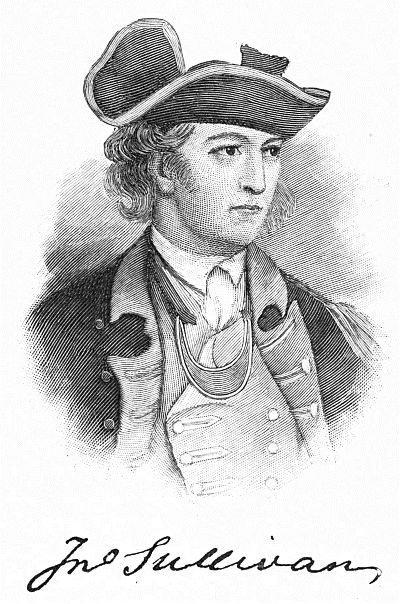
Reign of terror in the Mohawk valley Though so much harrying had been done, the snake was only scotched, after all. Nothing short of the complete annihilation of the savage enemy would have put a stop to his inroads. Before winter was over dire vengeance fell upon the Oneidas, who were now regarded by their brethren as traitors to the Confederacy; they were utterly crushed by Thayendanegea. For two years more the tomahawk and firebrand were busy in the Mohawk valley. It was a reign of terror. Blockhouses were erected in every neighbourhood, into which forty or fifty families could crowd together at the first note of alarm. The farmers ploughed and harvested in companies, keeping their rifles within easy reach, while pickets and scouts peered in every direction for signs of the stealthy foe. In battles with the militia, of which there were several, the enemy, with his greatly weakened force, was now generally worsted; but nothing could exceed the boldness of his raids. On one or two occasions he came within a few miles of Albany. Once a small party of Tories actually found their way into the city, with intent to assassinate General Schuyler, and came very near succeeding. In no other part of the United States did the war entail so much suffering as on the New York border. During the five years ending with 1781, the population of Tryon county was reduced by two thirds of its amount, and in the remaining third there were more than three hundred widows and two thousand orphan children.
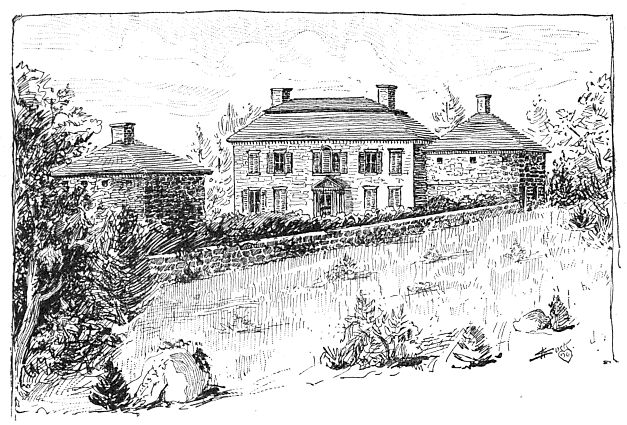
JOHNSON HALL
The wilderness beyond the Alleghanies This cruel warfare, so damaging to the New York frontier settlements and so fatal to the Six Nations, was really part of a desultory conflict which raged at intervals from north to south along our whole western border, and resulted in the total overthrow of British authority beyond the Alleghanies. The vast region between these mountains and the Mississippi river—a territory more than twice as large as the German Empire—was at that time an almost unbroken wilderness. A few French towns garrisoned by British troops, as at Natchez, Kaskaskia, and Cahokia on the Mississippi river, at Vincennes, on the Wabash, and at Detroit, sufficed to represent the sovereignty of George III., and to exercise a very dubious control over the wild tribes that roamed through these primeval solitudes. When the thirteen colonies declared themselves independent of the British Crown, the ownership of this western territory was for the moment left undecided. Portions of it were claimed by Massachusetts, Connecticut, New York, Virginia, North Carolina, and Georgia, on the strength of their old charters or of their relations with the Indian tribes. Little respect, however, was paid to the quaint terminology of charters framed in an age when almost nothing was known of American geography; and it was virtually left for circumstances to determine to whom the western country should belong. It was now very fortunate for the United States that the policy of Pitt had wrested this all-important territory from the French. For to conquer from the British enemy so remote a region was feasible; but to have sought to obtain it from a power with which we were forming an alliance would have been difficult indeed.
Rivalry between Pennsylvania and Virginia for the possession of Fort Pitt The commanding approach to this territory was by the town and fortress of Pittsburgh, the “Gateway of the West,” from which, through the Ohio river and its tributary streams, an army might penetrate with comparative ease to any part of the vast Mississippi valley. The possession of this gateway had for some years been a subject of dispute between Pennsylvania and Virginia. Though the question was ultimately settled in favour of Pennsylvania, yet for the present Virginia, which had the longest arm, kept her hold upon the commanding citadel. To Virginia its possession was then a matter of peculiar importance, for her population had already begun to overflow its mountain barriers, and, pressing down the Ohio valley, had made the beginnings of the state of Kentucky. Virginia and North Carolina, lying farther westward than any of the other old states, were naturally the first to send colonies across the Alleghanies. It was not long before the beginning of the war that Daniel Boone had explored the Kentucky river, and that Virginia surveyors had gone down the Ohio as far as the present site of Louisville. Conflicts ensued with the Indians, so fierce and deadly that this region was long known as the “Dark and Bloody Ground.”
During this troubled period, the hostile feeling between Pennsylvania and Virginia was nourished by the conflicting interests of the people of those two colonies in respect to the western country and its wild inhabitants. The Virginians entered the country as settlers, with intent to take possession of the soil and keep the Indians at a distance; but there were many people in Pennsylvania who reaped large profits from trade with the barbarians, and therefore did not wish to see them dispossessed of their border forests and driven westward. The Virginia frontiersmen were angry with the Pennsylvania traders for selling rifles and powder to the redskins, and buying from them horses stolen from white men. This, they alleged, was practically inciting the Indians to deeds of plunder and outrage. In the spring of 1774, there seemed to be serious danger of an outbreak of hostilities at Fort Pitt, when the attention of Virginia was all at once absorbed in a brief but hard-fought war, which had a most important bearing upon the issue of the American struggle for independence.
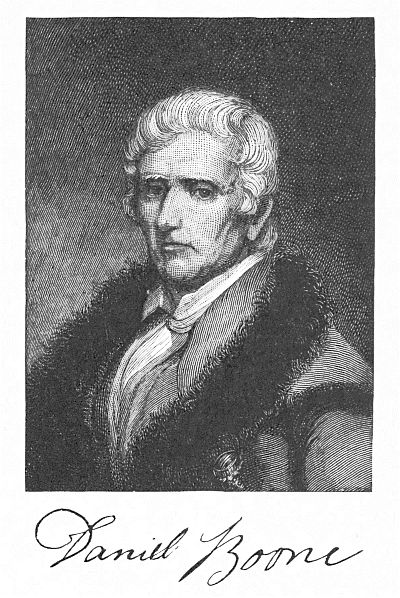
Lord Dunmore’s War, 1774
This border war of 1774 has sometimes been known as “Cresap’s War,” but
more recently, and with less impropriety, as “Lord Dunmore’s War.” It
was conducted under the general direction of the Earl of Dunmore, last
royal governor of Virginia; and in the political excitement of the time
there were some who believed that he actually contrived to stir up the
war out of malice aforethought, in order to hamper the Virginians in
their impending struggle with the mother-country. Dunmore’s agent, or
lieutenant, in western Virginia, Dr. John Connolly, was a violent and
unscrupulous man, whose arrogance was as likely to be directed against
friendly as against hostile Indians, and it was supposed that he acted
under the earl’s secret orders with intent to bring on a war. But the
charge is ill-supported and quite improbable. According to some writers,
the true cause of the war was the slaying of the whole family of the
friendly chief Logan, and doubtless this event furnished the occasion
for the outbreak of hostilities. It was conspicuous in a series of
outrages that had been going on for years, such as are always apt to
occur on the frontier between advancing civilization and resisting
barbarism. John Logan, or Tagahjutè, was of Cayuga descent, a chief of
the Mingos, a brave and honest man, of fine and stately presence. He had
always been kind and hospitable to the English settlers, perhaps in
accordance with the traditional policy of his Iroquois forefathers,—a
tradition which by 1774 had lost much of its strength. In April of that
year some Indian depredations occurred on the upper Ohio, which led Dr.
Connolly to issue instructions, warning the settlers to be on their
guard, as an attack from the Shawnees was to be apprehended. Logan and CresapCaptain
Michael Cresap was a pioneer from Maryland, a brave man and sterling
patriot; but as for the Indians, his feelings toward them were like
those of most backwoodsmen. Cresap not unnaturally interpreted the
instructions from Dunmore’s lieutenant as equivalent to a declaration of
war, and he proceeded forthwith to slay and scalp some friendly
Shawnees. As is apt to be the case with reprisals and other unreasoning
forms of popular vengeance, the blow fell in the wrong quarter, and
innocent people were made scapegoats for the guilty. Cresap’s party next
started off to attack Logan’s camp at Yellow Creek; but presently
bethinking themselves of Logan’s well-known friendliness toward the
whites, as they argued with one another, they repented of their purpose,
and turned their steps in another direction. But hard by the Mingo
encampment a wretch named Greathouse had set up a whiskey shop, and
thither, on the last day of April, repaired Logan’s family, nine thirsty
barbarians, male and female, old and young. When they had become dead
drunk, Greathouse and two or three of his cronies illustrated their
peculiar view of the purport of Connolly’s instructions by butchering
them all in cold blood. The Indians of the border needed no stronger
provocation for rushing to arms. Within a few days Logan’s men had taken
a dozen scalps, half of them from young children. Mingos and Shawnees
were joined by Wyandots, Delawares, and Senecas, and the dismal tale of
blazing cabins and murdered women was renewed all along the frontier.
It was in vain that Lord Dunmore and his lieutenant disclaimed
responsibility for the massacre at Yellow Creek. The blame was by all
the Indians and many of the whites laid upon Cresap, whose name has been
handed down to posterity as that of the arch-villain in this rough
border romance. The pathetic speech of the bereaved Logan to Dunmore’s
envoy, John Gibson, was preserved and immortalized by Jefferson in his
“Notes on Virginia,” and has been declaimed by thousands of American
schoolboys.
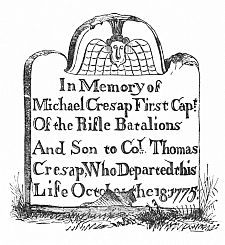 In his comments Jefferson spoke of Cresap as “a man infamous
for the many murders he had committed upon these injured people.”
Jefferson here simply gave voice to the tradition which had started into
full life as early as June, 1774, when Sir William Johnson wrote that “a
certain Mr. Cressop had trepanned and murdered forty Indians on the
Ohio, ... and that the unworthy author of this wanton act is fled.” The
charge made by Jefferson was answered at the time, but continued to live
on in tradition, until finally disposed of in 1851 by Brantz Mayer.[24]
The origin of the misconception is doubtless to be traced to the
insignificance of Greathouse. In trying to shield himself, Connolly
deposed Cresap from command, but he was presently reinstated by Lord
Dunmore.
In his comments Jefferson spoke of Cresap as “a man infamous
for the many murders he had committed upon these injured people.”
Jefferson here simply gave voice to the tradition which had started into
full life as early as June, 1774, when Sir William Johnson wrote that “a
certain Mr. Cressop had trepanned and murdered forty Indians on the
Ohio, ... and that the unworthy author of this wanton act is fled.” The
charge made by Jefferson was answered at the time, but continued to live
on in tradition, until finally disposed of in 1851 by Brantz Mayer.[24]
The origin of the misconception is doubtless to be traced to the
insignificance of Greathouse. In trying to shield himself, Connolly
deposed Cresap from command, but he was presently reinstated by Lord
Dunmore.
In June of the next year, Captain Cresap marched to Cambridge at the head of 130 Maryland riflemen; but during the early autumn he was seized with illness, and while making his way homeward died at New York, at the age of thirty-three. His grave is still to be seen in Trinity churchyard, near the door of the north transept. The Indian chief with whose name his has so long been associated was some time afterwards tomahawked by a brother Indian, in the course of a drunken affray.
Battle of Point Pleasant and its consequences The war thus ushered in by the Yellow Creek massacre was an event of cardinal importance in the history of our western frontier. It was ended by the decisive battle at Point Pleasant, on the Great Kanawha (October 10, 1774), in which the Indians, under the famous Shawnee chief Cornstalk, were totally defeated by the backwoodsmen under Andrew Lewis. This defeat so cowed the Indians that they were fain to purchase peace by surrendering all their claims upon the hunting-grounds south of the Ohio. It kept the northwestern tribes comparatively quiet during the first two years of the Revolutionary War, and thus opened the way for white settlers to rush into Kentucky. The four years following the battle of Point Pleasant saw remarkable and portentous changes on the frontier. It was just at the beginning of Lord Dunmore’s war that Parliament passed the Quebec Act, of which the practical effect, had it ever been enforced, would have been the extension of Canada southward to the Ohio river. In contravention of old charters, it would have deprived the American colonies of the great northwestern territory. But the events that followed upon Lord Dunmore’s war soon rendered this part of the Quebec Act a nullity.
Settlement of Kentucky
In 1775, Richard Henderson of North Carolina purchased from the
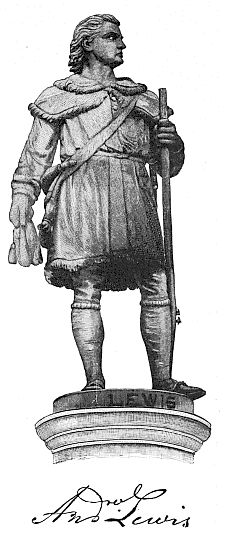 Cherokees the tract between the Kentucky and Cumberland rivers, and at
the same time Boonesborough and Harrodsburg were founded by Daniel
Boone and James Harrod. As a party of these bold backwoodsmen were
encamping near the sources of the southern fork of the Licking, they
heard the news of the victory which ushered in the War of Independence,
and forthwith gave the name of Lexington to the place of their
encampment, on which a thriving city now stands. These new settlements
were not long in organizing themselves into a state, which they called
Transylvania. Courts were instituted, laws enacted, and a militia
enrolled, and a delegate was sent to the Continental Congress; but
finding that Virginia still claimed their allegiance, they yielded their
pretensions to autonomy, and were organized for the present as a county
of the mother state. The so-called “county” of Kentucky, comprising the
whole of the present state of that name, with an area one fourth larger
than that of Scotland, was indeed of formidable dimensions for a county.
Cherokees the tract between the Kentucky and Cumberland rivers, and at
the same time Boonesborough and Harrodsburg were founded by Daniel
Boone and James Harrod. As a party of these bold backwoodsmen were
encamping near the sources of the southern fork of the Licking, they
heard the news of the victory which ushered in the War of Independence,
and forthwith gave the name of Lexington to the place of their
encampment, on which a thriving city now stands. These new settlements
were not long in organizing themselves into a state, which they called
Transylvania. Courts were instituted, laws enacted, and a militia
enrolled, and a delegate was sent to the Continental Congress; but
finding that Virginia still claimed their allegiance, they yielded their
pretensions to autonomy, and were organized for the present as a county
of the mother state. The so-called “county” of Kentucky, comprising the
whole of the present state of that name, with an area one fourth larger
than that of Scotland, was indeed of formidable dimensions for a county.
and of eastern Tennessee The settlement of Tennessee was going on at the same time. The movement of population for some time had a southwestward trend along the great valleys inclosed by the Appalachian ranges, so that frontiersmen from Pennsylvania found their way down the Shenandoah, and thence the stream of Virginian migration reached the Watauga, the Holston, and the French Broad, in the midst of the most magnificent scenery east of the Rocky Mountains. At the same time there was a westward movement from North Carolina across the Great Smoky range, and the defeat of the Regulators by Governor Tryon at the battle of the Alamance in 1771 no doubt did much to give strength and volume to this movement. The way was prepared in 1770 by James Robertson, who penetrated the wilderness as far as the banks of the Watauga. Forts were soon erected there and on the Nolichucky. The settlement grew apace, and soon came into conflict with the most warlike and powerful of the southern tribes of Indians. The Cherokees, like their kinsmen the Iroquois at the North, had fought on the English side in the Seven Years’ War, and had rendered some service, though of small value, at the capture of Fort Duquesne. Early in the Revolutionary War fierce feuds with the encroaching settlers led them to take sides with the British, and in company with Tory guerrillas they ravaged the frontier. Defeat of the Cherokees on the WataugaIn 1776, the Watauga settlement was attacked, and invasions were made into Georgia and South Carolina. But the blow recoiled upon the Cherokees. Their country was laid waste by troops from the Carolinas, under Andrew Williamson and Griffith Rutherford; their attack upon the Watauga settlement was defeated by James Robertson and John Sevier; and in 1777 they were forced to make treaties renouncing for the most part their claims upon the territory between the Tennessee and the Cumberland rivers.
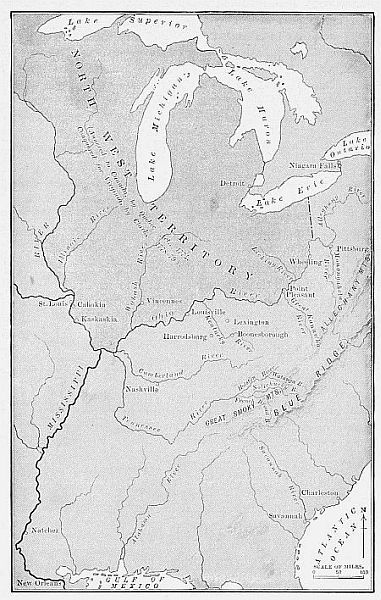
THE COUNTRY BEHIND THE MOUNTAINS, 1770-80.
Its consequencesRobertson and Sevier were the most commanding and picturesque figures in Tennessee history until Andrew Jackson came upon the scene; and their military successes, moreover, like those of “Old Hickory,” were of the utmost importance to the whole country. This was especially true of their victory at the Watauga; for had the settlement there been swept away by the barbarians, it would have uncovered the great Wilderness Road to Lexington and Harrodsburg, and the Kentucky settlement, thus fatally isolated, would very likely have had to be abandoned. The Watauga victory thus helped to secure in 1776 the ground won two years before at the Great Kanawha.[25]
George Rogers Clark Such were the beginnings of Kentucky and Tennessee, and such was the progress already made to the west of the mountains, when the next and longest step was taken by George Rogers Clark. During the years 1776 and 1777, Colonel Henry Hamilton, the British commander at Detroit, was busily engaged in preparing a general attack of Indian tribes upon the northwestern frontier. Such concerted action among these barbarians was difficult to organize, and the moral effect of Lord Dunmore’s war doubtless served to postpone it. There were isolated assaults, however, upon Boonesborough and Wheeling and in the neighbourhood of Pittsburgh. While Hamilton was thus scheming, a gallant young Virginian was preparing an effective counter-stroke. In the late autumn of 1777, George Rogers Clark, then just twenty-five years old, was making his way back from Kentucky along the Wilderness Road, and heard with exultation the news of Burgoyne’s surrender. Clark was a man of bold originality. He had been well educated by that excellent Scotch schoolmaster, Donald Robertson, among whose pupils was James Madison. In 1772, Clark was practising the profession of a land surveyor upon the upper Ohio, and he rendered valuable service as a scout in the campaign of the Great Kanawha. For skill in woodcraft, as for indomitable perseverance and courage, he had few equals. He was a man of picturesque and stately presence, like an old Norse viking, tall and massive, with ruddy cheeks, auburn hair, and piercing blue eyes sunk deep under thick yellow brows.
Clark’s conquest of the northwestern territory, 1778 When he heard of the “convention” of Saratoga, Clark was meditating a stroke as momentous in the annals of the Mississippi valley as Burgoyne’s overthrow in the annals of the Hudson. He had sent spies through the Illinois country, without giving them any inkling of his purpose, and from what he could gather from their reports he had made up his mind that by a bold and sudden movement the whole region could be secured and the British commander checkmated. On arriving in Virginia, he laid his scheme before Governor Patrick Henry; and Jefferson, Wythe, and Madison were also taken into his confidence. The plan met with warm approval; but as secrecy and dispatch were indispensable, it would not do to consult the legislature, and little could be done beyond authorizing the adventurous young man to raise a force of 350 men and collect material of war at Pittsburgh. People supposed that his object was merely to defend the Kentucky settlements. Clark had a hard winter’s work in enlisting men, but at length, in May, 1778, having collected a flotilla of boats and a few pieces of light artillery, he started from Pittsburgh with 180 picked riflemen, and rowed swiftly down the Ohio river a thousand miles to its junction with the Mississippi. The British garrison at Kaskaskia had been removed, to strengthen the posts at Detroit and Niagara, and the town was an easy prey. Hiding his boats in a creek, Clark marched across the prairie, and seized the place without resistance. The French inhabitants were not ill-disposed toward the change, especially when they heard of the new alliance between the United States and Louis XVI., and Clark showed consummate skill in playing upon their feelings. Cahokia and two other neighbouring villages were easily persuaded to submit, and the Catholic priest Gibault volunteered to carry Clark’s proposals to Vincennes, on the Wabash; upon receiving the message this important post likewise submitted. As Clark had secured the friendship of the Spanish commandant at St. Louis, he felt secure from molestation for the present, and sent a party home to Virginia with the news of his bloodless conquest. The territory north of the Ohio was thus annexed to Virginia as the “county” of Illinois, and a force of 500 men was raised for its defence.
Capture of Vincennes, Feb. 23, 1779 When these proceedings came to the ears of Colonel Hamilton, at Detroit, he started out with a little army of about 500 men, regulars, Tories, and Indians, and after a march of seventy days through the primeval forest reached Vincennes, and took possession of it. He spent the winter intriguing with the Indian tribes, and threatened the Spanish governor at St. Louis with dire vengeance if he should lend aid or countenance to the nefarious proceedings of the American rebels. Meanwhile, the crafty Virginian was busily at work. Sending a few boats, with light artillery and provisions, to ascend the Ohio and Wabash, Clark started overland from Kaskaskia with 130 men; and after an arduous winter march of sixteen days across the drowned lands in what is now the state of Illinois, he appeared before Vincennes in time to pick up his boats and cannon. In the evening of February 23d the town surrendered, and the townspeople willingly assisted in the assault upon the fort. After a brisk cannonade and musket-fire for twenty hours, Hamilton surrendered at discretion, and British authority in this region was forever at an end. An expedition descending from Pittsburgh in boats had already captured Natchez and ousted the British from the lower Mississippi. Shortly after, the Cherokees and other Indians whom Hamilton had incited to take the war-path were overwhelmed by Colonel Shelby, and on the upper Ohio and Alleghany the Indian country was so thoroughly devastated by Colonel Brodhead that all along the frontier there reigned a profound peace, instead of the intended carnival of burning and scalping.
Settlement of middle Tennessee The stream of immigration now began to flow steadily. Fort Jefferson was established on the Mississippi river to guard the mouth of the Ohio. Another fortress, higher up on the beautiful river which La Salle had discovered and Clark had conquered became the site of Louisville, so named in honour of our ally, the French king. James Robertson again appeared on the scene, and became the foremost pioneer in middle Tennessee, as he had already led the colonization of the eastern part of that great state. On a bold bluff on the southern bank of the Cumberland river, Robertson founded a city, which took its name from the General Nash who fell in the battle of Germantown; and among the cities of the fair South there is to-day none more thriving than Nashville. Thus by degrees was our grasp firmly fastened upon the western country, and year by year it grew stronger.
CLARK’S FINAL SUMMONS TO HAMILTON
Importance of Clark’s conquest In the gallery of our national heroes, George Rogers Clark deserves a conspicuous and honourable place. It was due to his boldness and sagacity that when our commissioners at Paris, in 1782, were engaged in their difficult and delicate work of thwarting our not too friendly French ally, while arranging terms of peace with the British enemy, the fortified posts on the Mississippi and the Wabash were held by American garrisons. Possession is said to be nine points in the law, and while Spain and France were intriguing to keep us out of the Mississippi valley, we were in possession of it. The military enterprise of Clark was crowned by the diplomacy of Jay.[26] The four cardinal events in the history of our western frontier during the Revolution are: (1) the defeat of the Shawnees and their allies at Point Pleasant in 1774; (2) the defeat of the Cherokees on the Watauga in 1776; (3) Clark’s conquest of the Illinois country in 1778-79; (4) the detection and thwarting of the French diplomacy in 1782 by Jay. When Washington took command of the Continental army at Cambridge, in 1775, the population and jurisdiction of the thirteen united commonwealths scarcely reached beyond the Alleghanies; it was due to the series of events here briefly recounted that when he laid down his command at Annapolis, in 1783, the domain of the independent United States was bounded on the west by the Mississippi river.
Clark’s last years were spent in poverty and obscurity at his sister’s home, near Louisville, where he died in 1818. It was his younger brother, William Clark, who in company with Meriwether Lewis made the famous expedition to the Columbia river in 1804, thus giving the United States a hold upon Oregon.
Marauding expeditionsTo return to our story,—Lord George Germain’s plan for breaking the spirit of the Americans, in so far as it depended upon the barbarous aid which his Indian allies could render, had not thus far proved very successful. Terrible damage had been wrought on the frontier, especially in Pennsylvania and New York, but the net result had been to weaken the Indians and loosen the hold of the British upon the continent, while the American position was on the whole strengthened. The warfare which the British themselves conducted in the north after the Newport campaign degenerated into a series of marauding expeditions unworthy of civilized soldiers. They seem to have learned a bad lesson from their savage allies. While Sir Henry Clinton’s force was beleaguered in New York, he now and then found opportunities for detaching some small force by sea, to burn and plunder defenceless villages on the coast, in accordance with Lord George’s instructions. During the autumn of 1778 the pretty island of Martha’s Vineyard was plundered from end to end, the towns of New Bedford and Fair Haven, with all the shipping in their harbours, were burned, and similar havoc was wrought on the coast of New Jersey. At Old Tappan some American dragoons, asleep in a barn, were captured by Sir Charles Grey’s troops,—and thirty-seven of them were bayoneted in cold blood. Fifty-five light infantry belonging to Pulaski’s legion were similarly surprised at night by Captain Ferguson and all but five were massacred. In May, 1779, General Mathew was sent with 2,500 men to Virginia, where he sacked the towns of Portsmouth and Norfolk, with cruelties worthy of a mediæval freebooter. Tryon’s proceedings, July, 1779In July the enterprising Tryon conducted a raiding expedition along the coast of Connecticut. At New Haven he burned the ships in the harbour and two or three streets of warehouses, and slew several citizens; his intention was to burn the whole town, but the neighbouring yeomanry quickly swarmed in and drove the British to their ships. Next day the British landed at Fairfield and utterly destroyed it. Next they burned Green Farms and then Norwalk. After this, just as they were about to proceed against New London, they were suddenly recalled to New York by bad news.
In so far as these barbarous raids had any assignable military purpose, it was hoped that they might induce Washington to weaken his force at the Highlands by sending troops into Connecticut to protect the private property and chastise the marauders. After the destruction of the Highland forts in October, 1777, the defence of this most important position had been entrusted to the powerful fortifications lately erected at West Point. Clinton captures the fortress at Stony Point, May 31, 1779A little lower down the river two small but very strong forts, at Stony Point on the right bank and at Verplanck’s Point on the left, guarded the entrance to the Highlands. While the fort at Stony Point was building, Sir Henry Clinton came up the river and captured it, and then, with the aid of its batteries, subdued the opposite citadel also. Stony Point was a rocky promontory washed on three sides by the waters of the Hudson. It was separated from the mainland by a deep morass, over which ran a narrow causeway that was covered at high tide, but might be crossed when the water was low. This natural stronghold was armed with heavy batteries which commanded the morass, with its causeway, and the river; and the British garrisoned it with six hundred men, and built two additional lines of fortification, rendering it well-nigh impregnable.
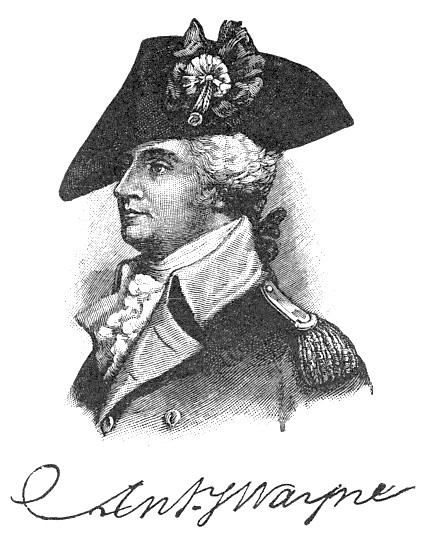
The storming of Stony Point, July 16, 1779 The acquisition of this spot seemed like the auspicious beginning of a summer campaign for Clinton’s army, which had been cooped up in New York ever since the battle of Monmouth. To have kept on and captured West Point would have gone a long way toward retrieving the disaster of Saratoga, but Washington’s force was so well disposed that Clinton did not venture to attempt so much as this. Such hopes, moreover, as he may have based upon the Connecticut raids proved entirely delusive. Washington’s method of relieving Connecticut and destroying Clinton’s scheme was different from what was expected. Among his generals was one whom the soldiers called “Mad Anthony” for his desperate bravery, but there was much more method than madness about Anthony Wayne. For the union of impetuous valour with a quick eye and a cool head, he was second to none. Twelve hundred light infantry were put at his disposal. Every dog within three miles was slaughtered, that no indiscreet bark might alarm the garrison. Not a gun was loaded, lest some untimely shot betray the approaching column. The bayonet was now to be put to more warlike use than the roasting of meat before a camp-fire. At midnight of the 15th of July the Americans crossed the causeway at low tide, and were close upon the outworks before their advance was discovered. The garrison sprang to arms, and a heavy fire was opened from the batteries, but Wayne’s rush was rapid and sure. In two solid columns the Americans came up the slope so swiftly that the grape-shot made few victims. Shoulder to shoulder, in resistless mass, like the Theban phalanx of Epaminondas, they pressed over the works, heedless of obstacles, and within a few minutes the garrison surrendered at discretion. In this assault the Americans lost fifteen killed and eighty-three wounded, and the British sixty-three killed. The rest of the garrison, 553 in number, including the wounded, were made prisoners, and not a man was killed in cold blood, though the shameful scenes in Virginia were fresh in men’s memories, and the embers of Fairfield and Norwalk still smouldered. The contemporary British historian Stedman praises Wayne for his humanity, and thinks that he “would have been fully justified in putting the garrison to the sword;” but certainly no laws or usages of war that have ever obtained among the people of the United States would have justified such a barbarous proceeding.[27]
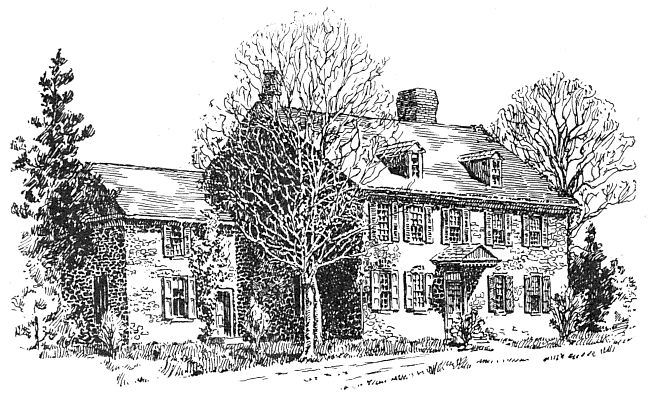
HOME OF ANTHONY WAYNE
Evacuation of Stony Point The capture of Stony Point served the desired purpose of relieving Connecticut, but the Americans held it but three days. Clinton at once drew his forces together and came up the Hudson, hoping to entice Washington into risking a battle for the sake of keeping his hold upon Stony Point. But Washington knew better than to do so. In case of defeat he would run risk of losing the far more important position at West Point. He was not the man to hazard his main citadel for the sake of an outpost. Finding that it would take more men than he could spare to defend Stony Point against a combined attack by land and water, he ordered it to be evacuated. The works were all destroyed, and the garrison, with the cannon and stores, withdrawn into the Highlands. Sir Henry took possession of the place and held it for some time, but did not venture to advance against Washington.
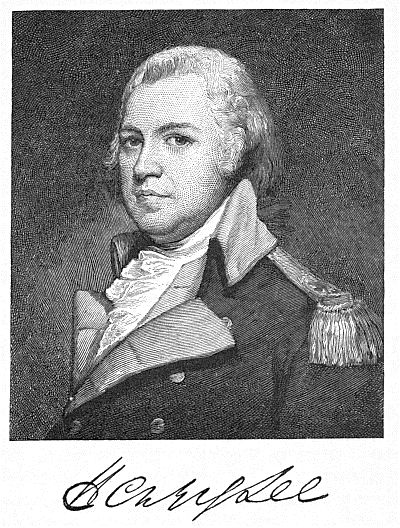
Henry Lee’s exploit at Paulus Hook. To give the British general a wholesome sense of his adversary’s vigilance, a blow was struck in an unexpected quarter. At Paulus Hook, on the site of the present Jersey City, the British had a very strong fort. The “Hook” was a long low neck of land reaching out into the Hudson. A sandy isthmus, severed by a barely fordable creek, connected it with the mainland. Within the line of the creek, a deep ditch had been dug across the whole isthmus, and this could only be crossed by means of a drawbridge. Within the ditch were two lines of intrenchments. The place was garrisoned by 500 men, but, relying on the strength of their works and their distance from the American lines, the garrison had grown somewhat careless. This fact was made known to Washington by Major Henry Lee, who volunteered to surprise the fort. On the night of the 18th of August, at the head of 300 picked men, Lee crossed the creek which divided Paulus Hook from the mainland. A foraging expedition had been sent out in the course of the day, and as the Americans approached they were at first mistaken by the sentinels for the foragers returning. Favoured by this mistake, they surmounted all the obstacles and got possession of the fort in a twinkling. Alarm guns, quickly answered by the ships in the river and the forts on the New York side, warned them to retreat as fast as they had come, but not until Lee had secured 159 prisoners, whom he carried off safely to the Highlands, losing of his own men only two killed and three wounded. This exploit, worthy of the good Lord James Douglas, has no military significance save for its example of skill and boldness; but it deserves mention for the personal interest which must ever attach to its author. In the youthful correspondence of Washington, mention is made of a “Lowland Beauty” for whom he entertained an unrequited passion. This lady married a member of the illustrious Virginian family to which Richard Henry Lee belonged. Her son, the hero of Paulus Hook, was always a favourite with Washington, and for his dashing exploits in the later years of the revolutionary war became endeared to the American people as “Light Horse Harry.” His noble son, Robert Edward Lee, has taken rank among the foremost generals of modern times.
Importance of the control of the water Until the war of independence the Americans had no navy of their own, such maritime expeditions as that against Louisburg having been undertaken with the aid of British ships. When the war broke out, one of the chief advantages possessed by the British, in their offensive operations, was their entire control of the American waters. Not only were all the coast towns exposed to their sudden attack, but on the broad deep rivers they were sometimes able to penetrate to a considerable distance inland, and by means of their ships they could safely transport men and stores from point to point. Their armies always rested upon the fleets as bases of operations, and soon lost their efficiency when severed from these bases. General Howe was not safe in Philadelphia until his brother had gained control of the Delaware river, and Burgoyne’s army invited capture as soon as its connection with the lakes was cut off. From first to last, the events of the war illustrated this dependence of the army upon the fleet. On the retreat from Lexington, it was only the ships that finally saved Lord Percy’s weary troops from capture; at Yorktown, it was only the momentary loss of naval superiority that made escape impossible for Cornwallis. For want of a navy, General Washington could not hold the island of New York in 1776; and for a like reason, in 1778, after the enemy had been reduced to the defensive, he could not prudently undertake its recapture. It was through lack of effective naval aid that the Newport expedition failed; and the events of 1779, in Virginia and Connecticut, bore sad testimony to the defenceless condition of our coasts.
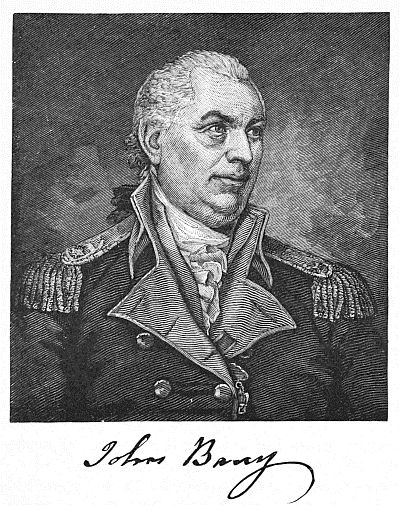
Feeble action of Congress Early in the war this crying want was earnestly considered by Congress, and efforts were made to repair it by the construction of a navy and the equipment of private cruisers. But the construction of a regular navy, which alone could serve the purpose, was beset with even greater difficulties than those which attended the organization of a permanent army. There was, indeed, no lack of good material, whether for ships or for seamen. New England, in particular, with its great length of seacoast and its extensive fisheries, had always possessed a considerable merchant marine, and nourished a hardy race of seafaring people. How formidable they could become in naval warfare, Great Britain was destined, nearly forty years afterward, to find out, to her astonishment and chagrin. But the absence of a central government was even more seriously felt in naval than in military affairs. The action of Congress was feeble, unintelligent, and vacillating. The “marine committees,” “navy boards,” and “boards of admiralty,” to which the work of creating a navy was entrusted, were so often changed in their composition and in their functions that it was difficult for any piece of work to be carried out in accordance with its original design. As there was a total absence of system in the department of admiralty, so there was utter looseness of discipline in the service. There were the same wranglings about rank as in the army, and the consequences were even more pernicious. It was difficult to enlist good crews, because of the uncertainty arising from the general want of system. The risks encountered were excessive, because of the overwhelming preponderance of the enemy from the outset. Of thirteen new cruisers laid down in the autumn of 1775, only six ever succeeded in getting out to sea. During the war one ship-of-the-line was built,—the America 74, first commanded by Captain John Barry;[28] but she was launched too late for active service. Between 1775 and 1783, there were twenty small frigates and twenty-one sloops-of-war in the service. Most of these were either captured by the enemy, or destroyed to prevent their falling into the enemy’s hands.[29] The armaments of these ships were very light; the largest of them, the Bon Homme Richard, was constructed for a thirty-eight, but her heaviest guns were only twelve-pounders.
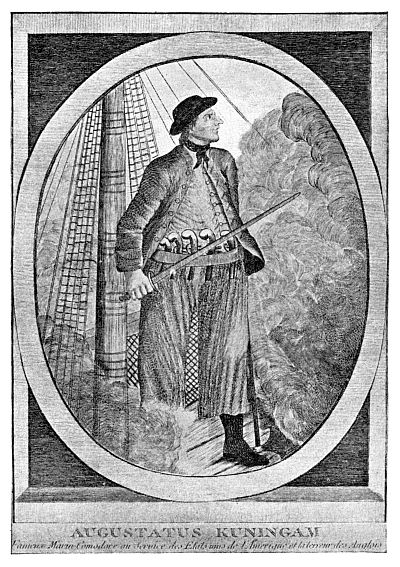
AUGUSTATUS KUNINGAM
American and British cruisers Yet in spite of this light force, weak discipline, and unsteady management, the little American navy did some very good work in the course of the war, and it was efficiently helped by a multitude of private cruisers, just as the Continental army often got valuable aid from the militia. Before the French alliance more than six hundred British vessels had fallen prey to the American cruisers, and so venturesome were these swift little craft that they even hovered around the coast of England, and merchant vessels going from one British port to another needed the protection of a convoy. During the same period, about nine hundred American vessels were taken by British cruisers; so that the damaging power of the American marine seems to have amounted to about two thirds that of such part of the British marine as could be devoted to the injury of American shipping. The damage inflicted upon the Americans was the more serious, for it well-nigh ruined the New England fisheries and the coasting trade. On the other hand, the American cruisers caused marine insurance in England to rise to a far higher point than had ever before been known; and we learn from a letter of Silas Deane to Robert Morris that, shortly before the alliance between France and the United States, the docks on the Thames were crowded with French vessels loading with British goods that sought the shelter of a neutral flag.
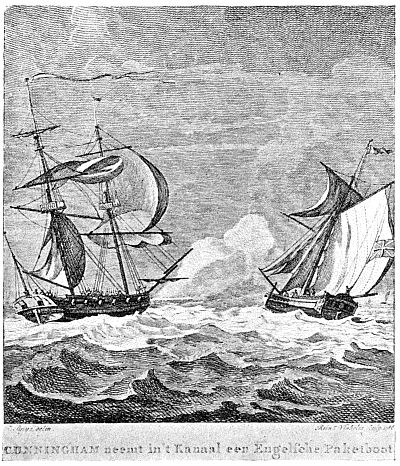
In one respect the value of this work of the American cruisers was incalculable. It familiarized Europe with the sight of the American flag in European waters. It was of great importance that Europe should think of the new republic not as merely the theme of distant rumours, but as a maritime power, able to defend itself within sight of the British coasts; and in this respect it would be difficult to overrate the services rendered by the heroic captains who first carried the flag of the United States across the ocean, and bearded the lion in his native lair. Wickes and ConynghamOf these gallant fellows, Lambert Wickes was the first, and his ship, the Reprisal 16, which carried Benjamin Franklin to France in the autumn of 1776, was the first American war vessel to visit the eastern shores of the Atlantic. After a brilliant cruise in the summer of 1777, she foundered off the banks of Newfoundland, with the loss of all on board. Next came Gustavus Conyngham, with the Surprise and the Revenge, which in the same summer took so many prizes in the North Sea and the British Channel that insurance rose as high as twenty-five per cent., and in some instances ten per cent. was demanded for the short passage between Dover and Calais. Paul JonesBut the fame of both these captains was soon eclipsed by that of John Paul Jones, a Scotch sailor, who from boyhood had been engaged in the Virginia trade, and in 1773 had gone to Virginia to live. When war broke out Jones offered his services to Congress, and in October, 1776, his name appears as eighteenth in the list of captains in the new navy. From the outset he was distinguished for skill and bravery, and in 1778, being then thirty years old, he was sent, with the Ranger 18, to prowl about the British coasts. In this little ship he made a successful cruise in the Irish Channel, burned some of the shipping in the port of Whitehaven, in Cumberland, and in a fierce fight off Carrickfergus captured the British sloop-of-war Drake 20; losing only eight men in killed and wounded, while the Drake lost forty-two. With the Drake and several merchant prizes, Jones made his way to Brest, and sent the Ranger home to America, while he remained to take command of a more considerable expedition that was fitting out for the following year. Franklin’s supervision of maritime affairsAlong with the other duties of Franklin, as minister of the United States at the French court, was joined a general superintendence of maritime affairs. He was a sort of agent plenipotentiary of Congress in all matters relating to the navy. He had authority from Congress to issue letters of marque, and exercised it freely, while imposing restrictions that were characteristic of his magnanimous spirit. In 1779, he issued instructions to all American cruisers that, in whatsoever part of the sea they might happen to meet the great discoverer Captain Cook, they were to forget the temporary quarrel in which they were fighting, and not merely suffer him to pass unmolested, but offer him every aid and service in their power; since it would ill beseem Americans to lift their hands against one who had earned the reverence and gratitude of all mankind. So in the instructions given to Paul Jones, he ordered him not to burn defenceless towns on the British coast except in case of military necessity, and in such case he was to give notice, so that the women and children, with the sick and aged inhabitants, might be removed betimes.
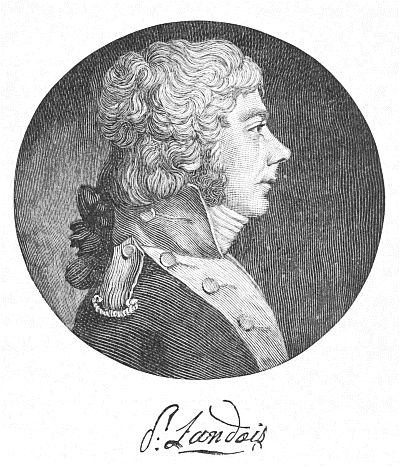
Jones’s squadron The expedition of which Paul Jones took command in the summer of 1779 was designed for a signal “demonstration” upon the coasts of Great Britain. The object of the British raids in Virginia and Connecticut was partly to terrify the Americans by a bold and savage assertion of the ubiquity of British power. The expedition of Paul Jones was to serve as a sort of counter-irritant. The confused and indefinite character of the American naval service at that time could not have a better illustration than is to be found in the details of the little squadron with which he was called upon to undertake his perilous task. The flagship was an old Indiaman named the Duras, purchased by the French government and fitted up for the occasion. In compliment to the author of Poor Richard’s maxims, her name was changed to “Bon Homme Richard.” She was an exceedingly clumsy affair, with swelling bows and a tower-like poop such as characterized the ships of the seventeenth century. She was now pierced for a thirty-eight-gun frigate, but as there was delay in procuring the eighteen-pounders suited for such a craft, her main deck was armed with twelve-pounders instead. In the gun-room below, Captain Jones had twelve portholes cut, in which he mounted six old eighteens, that could be shifted from side to side as occasion required. Leaving these eighteens out of the account, the force of the Bon Homme Richard was about equal to that of a thirty-two-gun frigate. This singular vessel was manned by a crew as nondescript as herself,—a motley gang of sailors and marines from nearly every country in Europe, with half a dozen Malays into the bargain. To these a hundred New England men were afterwards added, bringing up the whole number to 380. For this flagship three consorts were supplied, under the direction of the French government. The Pallas, a merchant vessel pierced for the occasion, was thus transformed into a thirty-two-gun frigate; the Vengeance and Cerf were of smaller calibre. All these ships were French built. To these Franklin added the Alliance 32, which happened to be in a French port at the time. The Alliance, lately built at Salisbury, in Massachusetts, and named in honour of the treaty between France and the United States, was a swift and beautiful ship, one of the finest in the American navy. Unfortunately, it was thought desirable to pay a further compliment to our new allies by appointing a French captain to command her, and this step gave rise to so much discontent and insubordination as well-nigh to destroy her efficiency. Nor had Captain Landais done anything to merit such distinction; he was simply an adventurer, seeking notoriety in the American service.
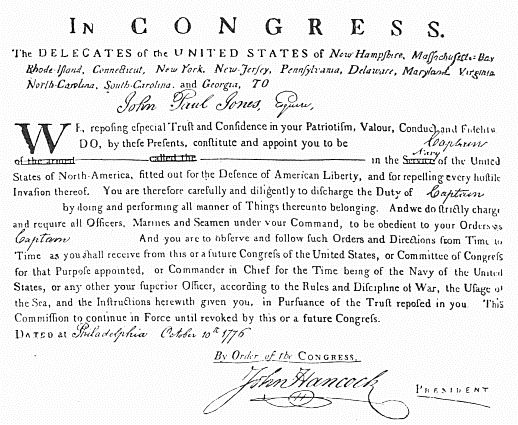
PAUL JONES’S COMMISSION
Jones’s cruise on the British coast The ships in this motley squadron were not privateers. The Alliance was a regular member of our navy. The French-built ships were regarded as loaned to the United States, and were to resume their French nationality after the termination of the cruise; but they were all duly commissioned by Franklin, under the powers delegated to him by Congress. For the time being, they were part of the American navy and subject to its regulations. Their commodore, Paul Jones, has often been spoken of as a privateer, sometimes as a pirate, but he was as much a regular captain in our navy as Greene was a regular general in our army. Though, however, there could be no doubt as to the legitimate naval character of the expedition, a more ill-assorted or disorderly squadron was perhaps never sent to sea. The summer was spent in cruising about the British coasts, and many prizes were taken; but the insubordination of the French commanders was so gross that during a large part of the time the ships were scattered in all directions, and Jones was left to cruise alone. On the 17th of September, having got his fleet together, he entered the Frith of Forth, and came within gunshot of Leith, which he intended to attack and capture. Sir Walter Scott, then a schoolboy at Edinburgh, has given, in the introduction to “Waverley,” a graphic description of the excitement which was felt upon that occasion. But, as Scott says, “a steady and powerful west wind settled the matter by sweeping Paul Jones and his vessels out of the Frith of Forth.” Four days later, the Bon Homme Richard and the Vengeance entered the river Humber, and destroyed several vessels. On the 23d, the Alliance and Pallas having come up, a British fleet of forty sail was descried off Flamborough Head.He meets a British fleet off Flamborough Head They were merchant vessels bound for the Baltic, under convoy of the Serapis 44, Captain Richard Pearson, and the Countess of Scarborough 20, Captain Piercy. Jones instantly gave chase, ordering his consorts to follow and form in line of battle; but the Alliance disobeyed and ran off to some distance, for a time disconcerting the Pallas, which could not understand the discrepancy between the signals and the movements. The British merchant ships crowded all sail to get out of the way, but the two frigates accepted Jones’s challenge, and came up to fight. The Countess of Scarborough was very inferior in size and armament to the Pallas, while on the other hand the Serapis was much more powerful than the Bon Homme Richard. She was a two-decker, mounting twenty eighteen-pounders below, and twenty nine-pounders above, with ten six-pounders on her quarter-deck and forecastle; so that she could throw 300 pounds of metal on a broadside. The Bon Homme Richard, with her six eighteens, could indeed throw 312 pounds on a broadside, but her weight of metal was very badly distributed among light guns. Without her eighteens, she could throw only 204 pounds on a broadside, being thus inferior to her opponent by one third. The Serapis had a crew of 320 well-trained British sailors, and she was a new and fast ship, perfect in all her appointments.
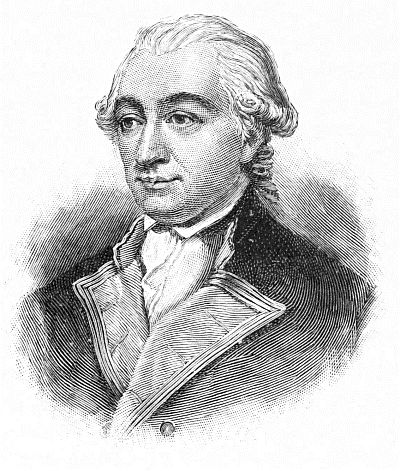
CAPTAIN PEARSON
Terrific fight between the Serapis and the Bon Homme Richard, Sept. 23, 1779 The fight began at half past seven o’clock, a little before moonrise, on a cloudy evening, in smooth water. The two principal opponents delivered their entire broadsides at the same moment. At this first fire, two of the old eighteens in the American frigate burst, killing a dozen men. After this disaster, no one had confidence enough in such guns to fire them again, so that the Bon Homme Richard was at once reduced to two thirds the force of her antagonist, and in ordinary fight must soon have been overcome. A brisk cannonade was kept up for an hour, while the two ships manœuvred for a raking position. The Serapis, being much the better sailer, was passing across her adversary’s bows, with very little elbow-room, when Jones succeeded in running his vessel into her just aft of her weather beam. For a moment all firing ceased on both ships, and Captain Pearson called out, “Have you struck your colours?” “I have not yet begun to fight,” replied Captain Jones. For a moment the ships separated, the Serapis running ahead almost in a line with the Bon Homme Richard. The Serapis now put her helm hard down and was boxhauled, in order to luff up athwart her adversary’s bow, and thus regain her raking position; but the Bon Homme Richard changed her tack, and presently, in a dense cloud of smoke, the two ships came together again, the British bowsprit passing over the high old-fashioned poop of the American vessel. This was just what Jones desired, and as he stood there on his quarter-deck he seized a stout rope, and lashed the enemy’s jib-boom to his mizzen-mast. Thus tied fast, the pressure of the light wind brought the ships alongside, the head of the one lying opposite the stern of the other. Grappling-hooks were now thrown into the quarter of the Serapis, and with repeated lashings fore and aft the two monsters were held together in deadly embrace. So close did they lie that their yards were interlocked, and some of the guns of the Serapis became useless for want of room to use the rammers. The advantage of her superior armament was thus in some measure lost, while her advantage in quickness of movement was entirely neutralized. Still her heavy guns at this short range did frightful execution, and the main deck of the Bon Homme Richard was soon covered with mangled and dying men, while her timbers were badly shivered and many cannon were knocked from their carriages. Unable to bear this terrible fire, the Americans crowded upon the upper deck in such numbers as easily to defeat the British attempts to board. Parties of marksmen, climbing into the rigging, cleared the enemy’s tops, and shot down every man upon the Serapis who ventured from under cover. Hand-grenades were thrown into her portholes to slay the gunners; and presently one bold fellow, crawling out to the very end of the Bon Homme Richard’s main-yard, just over the main hatchway of the Serapis, dropped one of these mischievous missiles through the hatchway, where it ignited a row of cartridges that were lying upon the main deck. The explosion ran swiftly along the line, as through a pack of gigantic fire-crackers. More than twenty men were blown into fragments, their heads, arms, and legs flying in every direction, while forty others were disabled. With the havoc already wrought by the guns, the Serapis had now lost two fifths of her crew, and her fire perceptibly slackened; so that the Americans were able to go below and work their guns again, pouring into the British portholes a storm of grape and canister which made an awful carnage.
It was now ten o’clock. All this time the Alliance had kept out of the fight, but the Pallas had attacked the Countess of Scarborough, and after a brisk cannonade compelled her to surrender. The Alliance now came down, and stupidly poured a raking volley along the decks of the two chief combatants, doing impartial damage to friend and foe. Warning shouts went up from the Bon Homme Richard, and her commander called out to Captain Landais to fall upon the farther side of the Serapis and board her. The Frenchman replied that he would do so, but instead he ran his ship off a couple of miles to leeward, and comfortably awaited the end of the battle. By this time the Serapis was on fire in several places, so that part of her crew had to leave their guns, and bend all their energies to extinguishing the flames. The American ship was in still worse plight; she had not only been burning for half an hour, but so many holes had been shot in her hull that she began to sink. She had more than a hundred British prisoners below decks, and these men were now set free and marshalled at the pumps. Few guns were worked on either ship, and the rest of the fight between the two exhausted combatants was a mere question of dogged tenacity. At last Captain Jones, with his own hands, directed a couple of guns against the enemy’s mainmast, and just as it was threatening to fall she surrendered. The gallant British commander stood almost alone on the main deck of his ship, in the midst of an awful scene of death; while of his few men who remained unhurt, most had sunk down, panting and overcome with fatigue. No sooner were the ships cut asunder than the tottering mainmast of the Serapis went overboard, carrying with it the mizzen topmast and all the mizzen rigging.[30] The Bon Homme Richard was with difficulty kept afloat till morning, and all night long fresh men from her consorts were hard at work fighting the flames, while the wounded were being carried off. At ten o’clock next morning she sank.
Effect of Jones’s victory Thus ended one of the most obstinate and murderous struggles recorded in naval history. Of the men engaged, more than half were killed or badly wounded, and few got off without some scar or bruise to carry as a memento of that dreadful night. From a merely military point of view, this first considerable fight between British and American frigates had perhaps no great significance. But the moral effect, in Europe, of such a victory within sight of the British coast was prodigious. The King #Page_vi_2 France made Paul Jones a knight of the order of merit, and from the Empress of Russia he received the ribbon of St. Anne. The King of Denmark settled a pension on him, while throughout Europe his exploit was told and told again in the gazettes, and at the drinking-tables on street corners. On his arrival in Holland, whither he went with his prizes a fortnight after the battle, the British government peremptorily demanded that he should be given up, to be hanged as a pirate. The sympathies of the Dutch were decidedly with the Americans; but as they were not quite ready to go to war with England, a tardy notice was given to Jones, after ten weeks, that he had better quit the country. Though chased by a British fleet, he got safely to France in December, and after various adventures, lasting through the ensuing year, he reached Philadelphia early in 1781. On inquiry into the extraordinary behaviour of Captain Landais some doubt as to his sanity arose, so that he was not shot for disobedience of orders, but simply discharged from the navy. Paul Jones was put in command of the America 74, but the war was so nearly ended that he did not get to sea again, and Congress presented his ship to the King of France. In 1788, he passed into the Russian service with the rank of rear-admiral. He died in Paris, in 1792, in the forty-fifth year of his age.
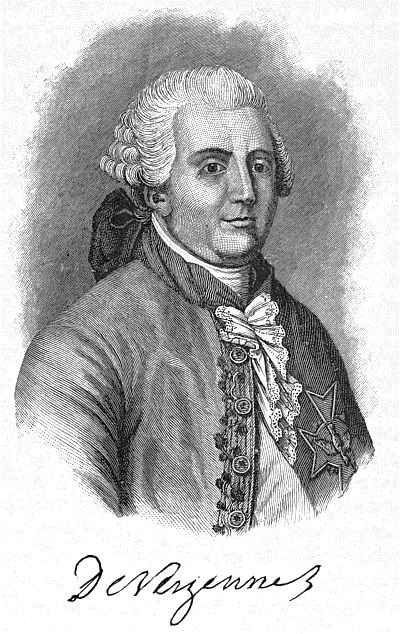
Here the question naturally arises, Why should the King of Denmark and the Empress of Russia have felt so much interest in the victory of Paul Jones as to confer distinguished honours upon him for winning it? The answer, at which we shall presently arrive, will forcibly disclose to us the extent to which, by the end of the year 1779, the whole civilized world had become involved in the quarrel between England and her revolted colonies. As at the bridge of Concord the embattled farmers of Massachusetts had once fired a shot heard round the world, so those last guns aimed by Paul Jones against the mainmast of the Serapis aroused an echo of which the reverberations were not to cease until it should be shown that henceforth nobler principles of international law must prevail upon the high seas than had ever yet been acknowledged. We have now to trace the origin and progress of the remarkable complication of affairs which at length, during the year 1780, brought all the other maritime powers of Europe into an attitude of hostility toward Great Britain. For not until we have duly comprehended this can we understand the world-wide significance of our Revolutionary War, or estimate aright the bearings of the events which led to that grand twofold consummation,—the recognition of the independence of the United States, and the overthrow of the personal government of George III. in England.
Relations of Spain to France and England Paul Jones was not the only enemy who hovered about the British coast in the summer of 1779. In June of that year, Spain declared war against England, but without recognizing the independence of the United States, or entering into an alliance with us. From the beginning, Count Vergennes had sought Spanish aid in his plans for supporting the Americans, but anything like cordial coöperation between Spain and France in such an undertaking was impossible, for their interests were in many respects directly opposite. So far as mere hatred toward England was concerned, Spain doubtless went even farther than France. Spain had not forgotten that she had once been mistress of the seas, or that it was England which had ousted her from this supremacy in the days of Queen Elizabeth. Of England, as the greatest of Protestant and constitutional powers, as the chief defender of political and religious liberty, priest-ridden and king-ridden Spain was the natural enemy. She had also, like France, the recollection of injuries lately suffered in the Seven Years’ War to urge her to a policy of revenge. And to crown all, in the event of a successful war, she might hope to regain Jamaica, or the Floridas, or Minorca, or, above all, Gibraltar, that impregnable stronghold, the possession of which by England had for more than sixty years made Spaniards blush for shame. On the other hand, Spain regarded the Americans with a hatred probably not less rancorous than that which she felt toward the British. The mere existence of these English colonies in North America was a perpetual reminder of the days when the papal edict granting this continent to Spain had been set at naught by heretical cruisers and explorers. The obnoxious principles of civil and religious liberty were represented here with even greater emphasis than in England. In Mexico and South America the Spanish crown had still a vast colonial empire; and it was rightly foreseen that a successful revolt of the English colonies would furnish a dangerous precedent for the Spanish colonies to follow. Spain was, moreover, the chief upholder of the old system of commercial monopoly; and here her interests were directly opposed to those of France, which, since it had been deprived of its colonial empire, saw in the general overthrow of commercial monopoly the surest way of regaining its share in the trade of the world.
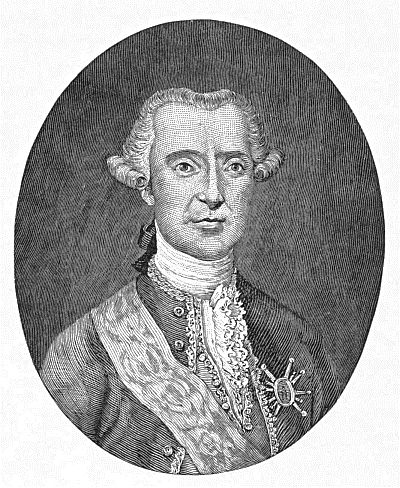
COUNT FLORIDA BLANCA
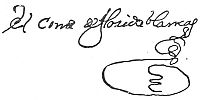
Intrigues of Spain Under the influence of these conflicting motives, the conduct of Spain was marked for a time by hesitation and double-dealing. Between his various wishes and fears, the Spanish prime minister, Florida Blanca, knew not what course to pursue. When he heard of the alliance between France and the United States, which was undertaken against his advice to Vergennes, his wrath knew no bounds. It was a treaty, he said, “worthy of Don Quixote.” At first he intrigued with the British government, offering his services as mediator between England and France. Lord Weymouth, the British minister for foreign affairs, refused to enter into any negotiation so long as France should extend aid to the rebel colonies. To the covert threat of the wily Spaniard, that if the war were to continue his royal master would doubtless feel compelled to take part with one side or the other, Lord Weymouth replied that the independence of the United States would prove fatal to the continuance of Spanish control over Mexico and South America; and he suggested, accordingly, that the true interest of Spain lay in forming an alliance with Great Britain. While this secret discussion was going on, Florida Blanca also sounded Vergennes, proposing that peace should be made on such terms as to allow the British to retain possession of Rhode Island and New York. This, he thought, would prevent the formation of an American Union, and would sow the seeds of everlasting dissension between Great Britain and the American States, whereby the energies of the English race would be frittered away in internecine conflict, leaving room for Spain to expand itself. But Vergennes would not hear of this. France had recognized the independence of the thirteen States, and had explicitly and publicly agreed to carry on the war until that independence should be acknowledged by England; and from that position she could not easily retreat. At the same time Vergennes intimated that France was in no way bound to protect the American claim to the Ohio valley, and was far from desiring that the people of the United States should control the whole of North America. Treaty between Spain and France, April, 1779Upon this suggestion the Spanish court finally acted. After six months more of diplomatic fencing, a treaty was concluded in April, 1779, between France and Spain, whereby it was agreed that these two powers should undertake a concerted invasion of England. For this undertaking, France was to furnish the land force, while both powers were to raise as great a naval armament as possible. France was to assist Spain in recovering Minorca and the Floridas, and if Newfoundland could be conquered, its fisheries were to be monopolized by the two parties to this treaty. Neither power was to make peace on any terms until England should have surrendered Gibraltar to Spain.
This convention brought Spain into the lists against England without bringing her directly into alliance with the United States. She was left free to negotiate with Congress at her own good pleasure, and might ask for the whole Mississippi valley, if she chose, in return for her assistance. Gerard, the French minister at Philadelphia, sought to persuade Congress to give up the fisheries and relinquish all claim to the territory west of the Alleghanies. There were hot debates on this subject in 1779, and indeed the situation of affairs was sufficiently complicated to call for the exercise of skilful diplomacy. As the treaty between France and Spain became known in America, it was felt to be in some respects inconsistent with the prior convention between France and the United States. In that convention it had been stipulated that neither party should make peace with Great Britain without the consent of the other. In the convention between France and Spain it was agreed that neither party should make peace until Great Britain should surrender Gibraltar. But the Americans rightly felt that, should Great Britain be found willing to concede their independence, they were in no wise bound to keep up the war for the sole purpose of helping France to conquer Gibraltar for a power which had never owed them any good will, and was at this very moment hoping to cut down their territory. The proposal to exclude America as well as Great Britain from the fisheries excited loud indignation in New England.
French and Spanish fleets attempt an invasion of England, Aug., 1779 Meanwhile, the new allies had gone energetically to work. Early in 1779, a French fleet had captured the British settlements in Senegambia, and made a vigorous though unsuccessful assault upon the island of Jersey. In June, war was declared by Spain so suddenly that England was quite taken by surprise. Florida Blanca had lied with so grave a face that Lord North had not been looking out for such a step. In August, the allied French and Spanish fleets, numbering more than sixty ships-of-the-line, with a full complement of frigates, entered the English Channel, with intent to repeat the experiment of the Invincible Armada; while a French army lay at Havre, ready to cross at the first opportunity. To oppose this formidable force, Admiral Hardy was able to get together only thirty-eight ships-of-the-line, with the ordinary proportion of frigates. There was a panic in England, and the militia were called out. But owing to dissensions between the French and Spanish admirals and serious illness in the crews, nothing whatever was accomplished, and the great fleet retired crestfallen from the channel. Everybody blamed everybody else, while an immense sum of money had been spent upon a wretched fiasco. In America, however, the allies were more successful. Galvez, the Spanish governor of Louisiana, captured Baton Rouge and Mobile, with their British garrisons, and preparations were made for the siege of Pensacola, to complete the conquest of West Florida. In the West Indies, the islands of Grenada and St. Vincent were captured by Estaing. The moment that war was declared by Spain, there was begun that siege of Gibraltar which, for the heroic defence, as well as for its long duration of nearly four years, has had no parallel in the annals of modern warfare.
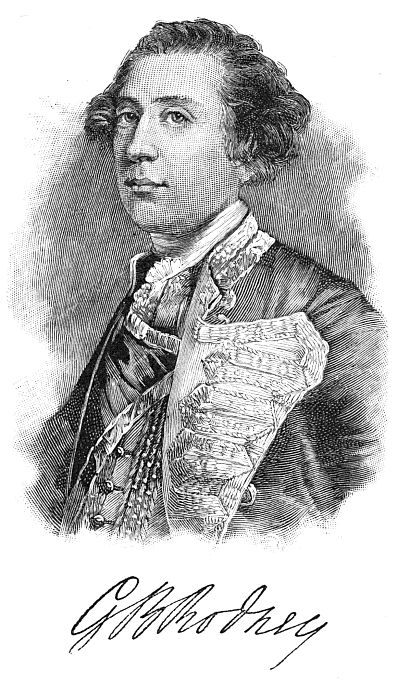
Sir George Rodney It was only through maritime expeditions that the two new allies could directly assail England with any hope of success; but here on the sea her natural superiority was not long in asserting itself. Great efforts were made to increase the strength of the navy, and in December, 1779, the command of the fleet in the West Indies was given to a man who among English sailors ranks with Blake and Hawke, on a plane inferior only to that occupied by Nelson. The brilliant career of Sir George Rodney began in the Seven Years’ War, in the course of which he bombarded Havre, thus warding off a projected invasion of England, and moreover captured several islands in the West Indies. It was Pitt who first discerned his genius, and put him into a position in which he could win victories. After the peace of 1763 he became a member of Parliament, but lost all he had in gambling, and fled to France to get rid of his creditors. When war broke out between France and England in 1778, the venerable Marshal de Biron lent him enough money to save him from the Marshalsea or the Fleet, and he returned to England to be appointed to the chief command in the West Indies. A vain and unscrupulous man, as many called him, he was none the less a most skilful and indomitable captain. He was ordered, on his way to the West Indies, to relieve Gibraltar, which was beginning to suffer the horrors of famine, and never was such a task more brilliantly performed. First, he had the good fortune to fall in with fifteen Spanish ships, loaded with provisions and under the convoy of seven war vessels, and all this fleet he captured. Then, at Cape St. Vincent, on a dark and stormy night, he gave chase to a Spanish fleet of eleven ships-of-the-line and two frigates, and in a sharp fight captured or destroyed all but four of them without losing one of his own ships. He thus reached Gibraltar, and after passing up to the fortress the welcome cargoes of the fifteen merchant prizes went on to the West Indies, where his presence turned the scale against the allies. A powerful French fleet under Count de Guichen was cruising in those waters; and it was hoped that this fleet would soon be able to come to New York and coöperate with Washington in an attempt to regain that city. But the arrival of Rodney changed all this, and the Count de Guichen, after being worsted in battle, sailed away for France, while Rodney proceeded to New York, to relieve Sir Henry Clinton and foil the projects of Washington.
Rights of neutrals upon the sea That very supremacy upon the sea, however, which enabled England to defy the combined fleets of France and Spain served, in its immediate consequences, only to involve her in fresh difficulties. By the arrogant and indiscriminate manner in which she exercised the right of search, she soon succeeded in uniting against her all the neutral nations of Europe; and a principle of international law was laid down which in our own time has become fully established, and must in future essentially limit the areas over which wars are likely to extend. This new principle of international law related to the rights of merchant vessels belonging to neutral powers in time of war. In early times it was held that if one country went to war with another, its right to prey upon its enemy’s commerce was virtually unlimited. If it found its enemy’s goods carried in a ship belonging to some neutral power, it had a right to seize and confiscate them; and in days when hostility was the rule and peace the exception, when warfare was deemed honourable and commerce ignoble, and when the usages of war were rough and unscrupulous, the neutral ship itself, which carried the goods, was very likely to be confiscated also. As the neutral power whose ship was seized would be sure to resent such behaviour, it followed that any war between two maritime powers was likely to spread until it involved every other power which possessed any merchant shipping or did any business upon the high seas. The Consolato del MareWith a view to confining such evils within as narrow a limit as possible, the maritime code known as the Consolato del Mare, which represented the commercial interests of the Middle Ages, and was generally accepted as of the highest authority in maritime affairs, recognized the right of confiscating an enemy’s goods found in a neutral ship, but did not recognize the right of confiscating the neutral ship. In the Middle Ages maritime warfare played a subordinate part; but after colonies had been planted in America and the East Indies by the great maritime nations of Western Europe, the demand for fixed rules, whereby the usages of such warfare should be regulated, soon came to be of transcendent importance. England and the Netherlands, as powers with whom industrial considerations were of the first consequence and military considerations only secondary, adhered firmly to the rule of the Consolato del Mare as the most liberal rule then in existence. France and Spain, as preëminently militant powers, caring more for the means of annoying an enemy than for the interests of commerce in general, asserted the principle that neutral ships detected in carrying an enemy’s goods were themselves lawful subjects for seizure. France, however, did not hold this doctrine so firmly as Spain. Here, as in so many other respects, France showed herself more advanced in civilization than Spain, while less advanced than England and the Netherlands. In 1655, by a treaty between Cromwell and Mazarin, France accepted the English rule; in 1681, under the retrograde government of Louis XIV., she went back to her ancient practice; in 1744, she again adopted the English rule, while Spain kept on with her old custom, until sharply called to account by Russia in 1780.
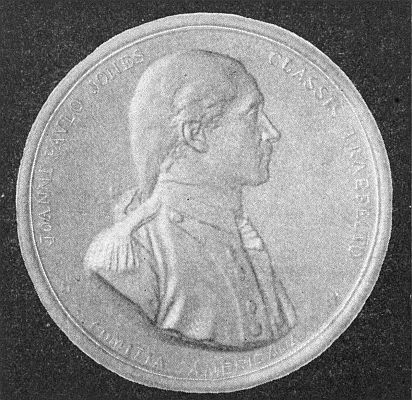
MEDAL GIVEN PAUL JONES BY CONGRESS (OBVERSE)
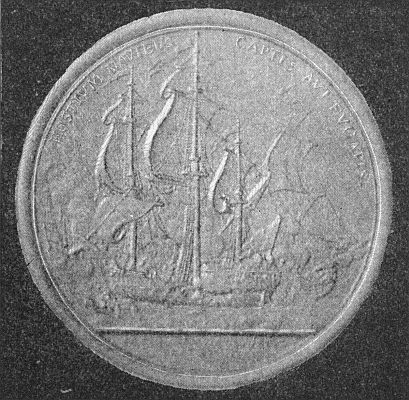
MEDAL GIVEN PAUL JONES BY CONGRESS (REVERSE)
Until the middle of the eighteenth century, the most liberal doctrines respecting maritime warfare had concerned themselves only with the protection of neutral ships. It had never occurred to anybody to maintain that the goods of an enemy should be guaranteed against scrutiny and seizure by the mere fact of their being carried on a neutral ship. That any belligerent could seize its antagonist’s property, if found on a neutral ship, was the doctrine laid down alike by Vattel and Bynkershoek, the chief French and Dutch authorities on maritime law. In acting upon this principle, therefore, at the time of our Revolutionary War, England acted strictly in accordance with the recognized maritime law of Europe. She was not, as some American writers seem to have supposed, introducing a new principle of aggression, in virtue of her position as chief among maritime powers. In stopping the defenceless merchant vessels of neutral or friendly powers, compelling them to show their bills of lading, searching their holds if need be, subjecting them to a hateful inquisition and vexatious delays, she did no more than every maritime nation had been in the habit of doing, and even less than Spain claimed the right to do. It was quite natural, too, that England should insist upon retaining this privilege, as something which no great naval power could afford to dispense with; for obviously, if in time of war your enemy can go on trading with everybody but yourself, and can even receive timber and provisions from people not concerned in the struggle, your means of crippling him are very materially diminished.
Prussian doctrine: free ships make free goods Such reasoning seemed conclusive everywhere in Europe until after the middle of the eighteenth century. At that time, however, the unexampled naval preponderance of England began to lead other nations to take a new view of the case. By the maintenance of the old rule, England could damage other nations much more than they could damage her. Other nations, accordingly, began to feel that it would be a good thing if the flag of a neutral ship might be held to protect any merchandise whatsoever that she might happen to have on board. This modern doctrine, that free ships make free goods, was first suggested by Prussia in 1752. Such a view naturally commended itself to a nation which had a considerable number of merchantmen afloat, without any navy fit to protect them; and it was accordingly likely to find favour in the eyes of such nations as Denmark, Sweden, Russia, and the United States. But, more than this, it was a view entirely in accordance with the philosophic tendencies of the age. The great humanitarian movement, which in our time has borne rich and ample fruit, and which has tended in every practicable way to diminish the occasions for warfare and to restrict its scope, had its first brilliant literary representatives among the clear-sighted and enthusiastic French philosophers of the eighteenth century. The liberal tendencies in politics, which hitherto England alone had represented practically, were caught up in France, as soon as the dismal and protracted tyranny of Louis XIV. had come to an end, with an eagerness that partook of fanaticism. Influence of the French philosophersEnglish political ideas, without being thoroughly comprehended in their practical bearings, were seized and generalized by Montesquieu and Turgot, and a host of lesser writers, until they acquired a width of scope and a genial interest which exercised a prodigious influence upon the thought of Continental Europe. Never in any age, perhaps, since the days when Sokrates talked to enchanted crowds upon street corners in Athens, did men of broad philosophic ideas come so closely into contact with men absorbed in the pursuit of life’s immediate ends as at the time when all Paris rushed to kiss the hand of Voltaire, and when ladies of the court went to sleep with the last brochure of Diderot or Helvetius under their pillows. The generous “enthusiasm of humanity,” which revealed itself in every line of the writings of these great men, played an important part in the political history of the eighteenth century. It was an age of crowned philosophers and benevolent despots. Joseph of Austria, Frederick of Prussia, and Catherine of Russia, in their several ways, furnished illustrations of this tendency. Catherine, who wrote letters to Voltaire, and admired Fox above all other English statesmen, set almost as much store by free thought as by free love, and her interest in the amelioration of mankind in general was second only to her particular interest in the humiliation of the Turk. The idea of taking the lead in a general movement for the liberation of maritime commerce was sure to prove congenial to her enlightened mind, and her action would have great weight with England, which at that time, isolated from all European sympathy, was especially desirous of an alliance with Russia, and especially anxious to avoid offending her.
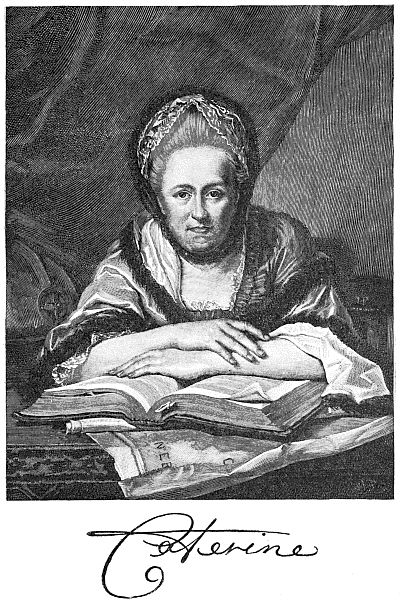
Great Britain wishes to secure an alliance with Russia At the beginning of 1778, Sir James Harris, afterward Earl of Malmesbury, was sent as ambassador to St. Petersburg, with instructions to leave no stone unturned to secure an offensive and defensive alliance between Russia and Great Britain, in order to offset and neutralize the alliance between France and the United States. Negotiations to this end were kept up as long as the war lasted, but they proved fruitless. While Catherine coquetted and temporized, the Prussian ambassador had her ear, and his advice was unfavourable to such an alliance. For the England of Pitt the great Frederick felt sympathy and gratitude; for the England of George III. he had nothing but hatred, and his counsels went far to steady Catherine, if ever she showed signs of wavering. The weight of France was of course thrown into the same scale, and for four years the Russian court was the scene of brisk and multifarious intrigues. Harris said that his very valets were offered bribes by busybodies who wished to get a look at his papers; and when he went out, leaving his secretary writing, he used to lock him up, not through doubts of his fidelity, but lest he should thoughtlessly leave the door ajar. From Prince Potemkin, one of Catherine’s lovers whose favour Harris courted, he learned that nothing short of the cession of Minorca would induce the empress to enter into the desired alliance. Russia was already taking advantage of the situation to overrun and annex the Crimea, and the maritime outlook thus acquired made her eager to secure some naval station on the Mediterranean. Minorca was England’s to give. She had won it in the war of the Spanish Succession, and for seventy years it had been one of the brightest jewels in her imperial crown. Together with Gibraltar it had given her that firm grasp upon the Mediterranean which—strengthened in later times by the acquisition of Malta, Cyprus, and the isthmus of Suez—has gone far toward making that vast inland sea an English lake.Importance of Minorca So great a value did England set upon Minorca, that when, in the Seven Years’ War, it was lost for a moment, through an error of judgment on the part of Admiral Byng, the British people were seized with a bloodthirsty frenzy, and one of the foulest judicial murders known to history was committed when that gallant commander was shot on his own quarter-deck. Yet even this island, by which England set such store, she was now ready to surrender in exchange for the help of Russia against her revolted colonies and the House of Bourbon. It was not, however, until 1781 that the offer of Minorca was made, and then Catherine had so far acceded to the general combination against England that she could not help refusing it. That such an offer should ever have been made shows how important an alliance with Russia seemed to England at the moment when France and Spain were leagued against her, and all the neutral powers looked on her with hostile eyes. We can thus the better appreciate the significance of the step which Russia was now to take with reference to the great question of maritime law that was beginning to agitate the civilized world.
France adopts the Prussian doctrine In the summer of 1778, the French government, with intent to curb the depredations of British cruisers, issued a proclamation adopting the Prussian doctrine of 1752, that free ships make free goods, and Vergennes took occasion to suggest that Catherine should put herself at the head of a league of neutral powers for the purpose of protecting neutral commerce all over the world. For the moment no decided action was taken, but the idea was one of those broad ideas in which the empress delighted. Count Panin, her principal minister, who was strongly in sympathy with the King of Prussia, insisted upon the necessity of protecting the commerce of minor powers against England, which since 1763 had become the great naval bully of the world. England was doubtless acting in strict accordance with time-honoured custom, but circumstances had changed, and the law must be changed to meet them. The first great war since 1763 was now showing that England could destroy the commerce of all the rest of the world, without any fear of retaliation except through a universal war. During the summers of 1778 and 1779, Prussian, Swedish, Danish, and Dutch ships were continually overhauled by British cruisers, and robbed of cargoes which they were carrying to France. Such gross outrages upon private property, however sanctioned by laws of war that had grown up in a barbarous age, awakened general indignation throughout Europe; and from whatever quarter complaints poured in, Vergennes and Frederick took good care that they should be laid before the Empress of Russia, until presently she came to look upon herself as the champion of little states and oppressed tradesmen.
Affair of Fielding and Bylandt The British depredations were, moreover, apt to be characterized by an arrogance which, while it rendered them all the more exasperating, sometimes transcended the limits of aggression prescribed by the rude maritime law of that day. Upon Netherland commerce England was especially severe, for the Dutch had more merchant shipping than any other people on the Continent, with a weak navy to protect it. England forbade the Dutch to send timber to France, as it would probably be used in building ships of war. On the 30th of December, 1779, seventeen Dutch vessels, laden with tar and hemp, and other materials useful in shipyards, were sailing through the English Channel, escorted by five ships-of-the-line under Count Bylandt, when toward nightfall they were overtaken and hailed by a British squadron of sixteen ships-of-the-line under Admiral Fielding. A lively parley ensued. Bylandt swore that his ships should not be searched, and Fielding threatened violence. While this was going on, twelve of the Dutch ships got away under cover of darkness, and reached in safety the French ports to which they were bound. Early in the morning, Bylandt fired upon the boat which was bringing a party of British officers to search the merchantmen that remained. Upon this, three British ships instantly poured their broadsides into the Dutch flagship, which returned the compliment, and then hauled down its flag, as resistance was useless. Nobody was killed, but Fielding seized the five merchantmen, and took them in to Portsmouth. The States-General of the Netherlands complained of the outrage to Lord Stormont, the new foreign secretary, and demanded the restitution of the prizes. The matter was referred to the British court of admiralty, and the singular doctrine was there laid down that the Dutch vessels were virtually blockade-runners, and as such were lawfully captured! “Great Britain,” said the judge, “by her insular position, blocks naturally all the ports of Spain and France, and she has a right to avail herself of this position as a gift of Providence.” But the States-General did not accept this interpretation of the law and theology of the matter, and they appealed to the Empress of Russia.
Spanish cruisers capture Russian vessels Just at this moment events occurred which compelled Catherine to take some decided stand on the question of neutral rights. Through fear of adding her to the list of their enemies, the British ministry had issued the most stringent orders that no Russian vessels should be searched or molested, under any circumstances. The Dutch and Danish flags might be insulted at pleasure, but that of Russia must be respected; and so well were these orders obeyed that Catherine had no grounds for complaint against England on this score. Spain, on the other hand, was less cautious. In the winter of 1779-80, her cruisers captured two Russian vessels laden with wheat, in the mistaken belief that their cargoes were destined for Gibraltar. The ships were taken into Cadiz, their cargoes were sold at auction, while their penniless crews were outrageously treated by the people, and came little short of starving. Hereupon Catherine without delay ordered out fifteen ships-of-the-line and five frigates for the protection of Russian commerce. For a moment war between Spain and Russia seemed imminent. But Panin moved with cautious shrewdness, and consulted the King of Prussia, who persuaded Florida Blanca to restore the captured ships, with compensation to the owners of the cargoes, and an ample apology for the blunder. The empress was satisfied, and Panin assured her that now the time had come for her to act with magnanimity and power, laying down an impartial code for the protection of maritime commerce, and thus establishing a claim to the gratitude of mankind through all future ages. Catherine’s proclamation, March 8, 1780On the 8th of March, 1780, Catherine issued a proclamation, setting forth the principles of maritime law which she was henceforth resolved to defend by force, if necessary. Henceforth neutral ships were to sail unmolested from port to port, even on the coasts of countries at war. They were to be free to carry into such ports any goods or merchandise whatsoever, except arms and ammunition, and the right of search was to be tolerated as regarded such contraband articles, and for no other purpose. Hereafter no port was to be considered blockaded unless the enemy’s ships of war should be near enough to make it dangerous to enter.
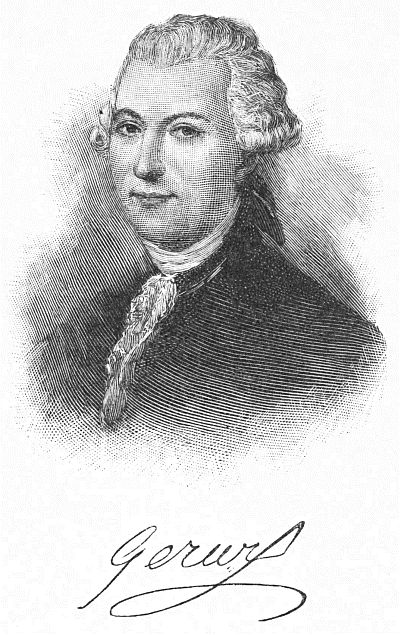
The Armed Neutrality These principles were immediately adopted by Spain, France, and the United States, the three powers actually at war with England. At the same time, Denmark and Sweden entered into an arrangement with Russia for the mutual protection of their commerce. It was announced that for every Danish, Swedish, or Russian ship searched or seized by the cruisers of any belligerent power, a strict retaliation would be made by the allied navies of these three countries. This covenant, known as the Armed Neutrality, was practically a threat aimed at England, and through her unwillingness to alienate Russia it proved a very effective threat. We can now understand the interest shown by Denmark and Russia in the victory of Paul Jones, and we can also appreciate the prodigious moral effect of that victory. So overwhelming was England’s naval superiority that the capture of a single one of her warships was a memorable event. To the lesser maritime powers it seemed to bring the United States at once into the front rank of belligerents. The British ministry was too well instructed to be brought under this spell; but in view of the great hostile combination now formed against it, for the moment it was at its wits’ end. “An ambiguous and trimming answer was given,” says Sir James Harris; “we seemed equally afraid to accept or dismiss the new-fangled doctrines. I was instructed secretly to oppose, but avowedly to acquiesce in them.” In England, the wrath and disgust extended to all parties. Shelburne and Camden joined with North and Thurlow in denouncing Catherine’s proclamation as an impudent attempt, on the part of an upstart power, hardly known on the sea till quite lately, to dictate maritime law to the greatest maritime power the world had ever seen. It was contended that the right to search neutral vessels and take an enemy’s goods from them was a cardinal principle of international law; and jurists, of course, found the whole body of precedents on the side of this opinion. But in spite of all protests these “new-fangled doctrines,” subversive of all precedent, were almost immediately adopted throughout Europe. In December, 1780, the Netherlands joined the Armed Neutrality, under circumstances presently to be related. In May, 1781, it was joined by Prussia; in October, 1781, by the Empire; in July, 1782, by Portugal; in September, 1782, by the Turk; in February, 1783, by the Kingdom of Naples. Though England’s maritime strength exceeded that of all the members of the league taken together, she could not afford to run the risk of war with all the world at once; and thus the doctrine that free ships make free goods acquired a firm foothold. In the chaos of the Napoleonic wars, indeed, paper blockades and illegal seizures abounded, and it fared ill with neutral commerce on the high seas. But the principles laid down by Catherine survived that terrible crisis, and at last they were formally adopted by England at the close of the Crimean War, in 1856.
Vast Importance of the principles laid down by Catherine This successful assertion of the rights of neutrals was one of the greatest and most beneficent revolutions in the whole history of human warfare. It was the most emphatic declaration that had ever been made of the principle that the interests of peace are paramount and permanent, while those of war are subordinate and temporary. In the interest of commerce it put a mighty curb upon warfare, and announced that for the future the business of the producer is entitled to higher consideration than that of the destroyer. Few things have ever done so much to confine the area of warfare and limit its destructive power. If the old doctrine were in force at the present day, when commerce has expanded to such enormous dimensions, and every sea is populous with merchant ships, it would be well-nigh impossible for any two maritime powers to go to war without dragging all the rest of the world into the struggle. For the speedy accomplishment of this great reform we have chiefly to thank the Empress Catherine, whose action at the critical moment was so prompt and decisive. It is curious to consider that an act which so distinctly subordinated military to industrial interests should have emanated from that country of Europe which had least outgrown the militant stage of civilization, and should have been chiefly opposed by that country which had advanced the farthest into the industrial stage. It is a brilliant instance of what may be achieved by an enlightened despot when circumstances are entirely favourable. Among the many acts of Catherine which, in spite of her horrible vices, have won the admiration of mankind, this is doubtless the most memorable; and as time goes on we shall realize its importance more and more.
Relations between Great Britain and Holland The immediate effect of the Armed Neutrality was to deprive England of one of her principal weapons of offence. To add to her embarrassment, there now came war with Holland. While there was strong sympathy between the British and Dutch governments, there was great jealousy between the peoples which had so long been rivals in the colonial world. Hence there were two parties in the Netherlands,—the party of the Stadtholder, which was subservient to the policy of the British government, and the popular party, which looked with favour upon the American cause. The popular party was far the more numerous, including all the merchants of the most mercantile of countries, and it was especially strong in the city of Amsterdam. A brisk trade—illicit from the British point of view—was carried on between Holland and the United States, chiefly through the little Dutch island of St. Eustatius, in the West Indies. An equally lively trade went on between Holland and France, and against this England felt that she had an especial right to make complaint. Her relations with Holland were regulated not simply by the ordinary law of nations, but by careful and elaborate treaties, made in the days when the two peoples were leagued in sympathy against the aggressive policy of Louis XIV. In 1678, it had been agreed that if either England or Holland should be attacked by France, both powers should make common cause against their common enemy; and in 1716 this agreement had been renewed in such wise as to include the contingency of an attack by Spain, since a younger branch of the House of Bourbon had succeeded to the Spanish throne. When, in 1779, Spain declared war against England, the latter power accordingly called upon the Netherlands for aid; but no aid was given, for the Dutch felt that they had an especial right to complain of the conduct of England. By that same treaty which in 1674 had finally given New York to the English, it had been provided that in case either England or Holland should ever go to war with any other country, the ordinary rules of maritime law should not be enforced as between these two friendly commercial powers. It was agreed that either power might freely trade with the enemies of the other; and such a treaty was at that time greatly to the credit of both nations. It was made in a moment when an honourable spirit of commercial equity prevailed. But it was one of the chief symptoms of the utter demoralization of the British government in 1778, after the untimely death of Lord Chatham, that these treaty obligations were completely ignored; and in the general plunder of merchant shipping which went on at that time, no nation suffered like the Dutch. George III. now felt that he had got everything into his own hands, and when the Dutch complained he gave them to understand that, treaty or no treaty, he should do as he pleased. Under such circumstances, it was rather cool for England to ask aid against Spain, and the Dutch quite naturally turned a deaf ear to the demand.
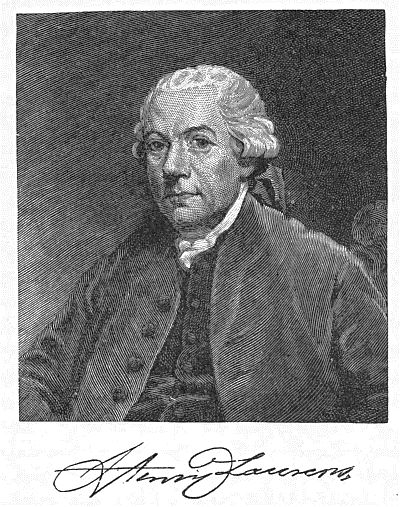
Holland joins the Armed Neutrality It was thus a very pretty quarrel as it stood at the end of 1779, when Fielding fired upon the flagship of Count Bylandt, and Paul Jones was allowed to stay with his prizes ten weeks in a Dutch harbour. Each party was thus furnished with an “outrage.” The righteous anger of the Dutch over the high-handed conduct of Fielding was matched by the British chagrin over the victory of Jones. The Stadtholder’s weak efforts to keep the peace were quite overwhelmed in the storm of wrath that arose. After much altercation, England notified Holland that all treaties between the two countries must be considered as abrogated, owing to the faithless behaviour of the Dutch in refusing aid against Spain, in trading with France and America, in resisting the right of search, and in sheltering Paul Jones. Having thus got rid of the treaties, England proceeded to act as if there were no such thing as international law where Dutchmen were concerned. During the summer of 1780, the wholesale robbery on the high seas grew worse than ever, and, with a baseness that seems almost incredible, the British ambassador at the Hague was instructed to act as a spy, and gather information concerning the voyages of Dutch merchants, so that British cruisers might know just where to pounce upon the richest prizes. Thus goaded beyond human endurance, Holland at last joined the Armed Neutrality, hoping thereby to enlist in her behalf the formidable power of Russia.
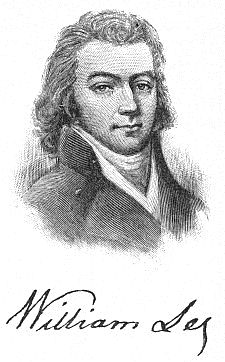
Capture of Henry Laurens and his papers But the policy of England, though bold in the extreme, was so far well considered as to have provided against such an emergency. She was determined to make war on Holland, to punish her for joining the Armed Neutrality; but if she were to avow this reason, it would at once entail war with Russia also, so that it was necessary to find some other reason. The requisite bone of contention was furnished by a curiously opportune accident. In October, 1780, an American packet was captured off the banks of Newfoundland, and among the prisoners was Henry Laurens, lately president of Congress, now on his way to the Hague to negotiate a loan. He threw his papers overboard, but a quick-witted tar jumped after them, and caught them in the water. Among them was found a project for a future treaty of commerce between the Netherlands and the United States which had been secretly concerted two years before between Jean de Neufville, an Amsterdam merchant, and William Lee, an American commissioner to Berlin. It was signed also by Van Berckel, the chief magistrate of Amsterdam; but as it had been neither authorized nor sanctioned by the States-General or by Congress, it had no validity whatever. Quite naturally, however, the discovery of such a document caused much irritation in England, and it furnished just the sort of excuse for going to war which the ministry wanted. To impose upon the imagination of the common people, Laurens was escorted through the streets of London by a regiment of soldiers, and shut up in the Tower, where he was denied pen and paper, and no one was allowed to enter his room. A demand was made upon Holland to disavow the act of Van Berckel, and to inflict condign punishment upon him and his accomplices, “as disturbers of the public peace and violators of the rights of nations.” In making this demand, it was foreseen that the States-General would disavow the act of Van Berckel, but would nevertheless decline to regard him as a fit subject for punishment. Great Britain declares war against Holland, Dec. 20, 1780The message was sent to the British ambassador at the Hague on the 3d of November. It was then known in England that Holland contemplated joining the Northern league, but the decisive step had not yet been actually taken by the States-General. The ambassador was secretly instructed by Lord Stormont not to present the demand for the disavowal and punishment of Van Berckel unless it should become absolutely certain that Holland had joined the league. At their meeting in November, the States-General voted to join the league, and the demand was accordingly presented. Everything happened according to the programme. The States-General freely condemned and disavowed the Amsterdam affair, and offered to make reparation; but with regard to the punishment of Van Berckel, they decided that an inquiry must first be made as to the precise nature of his offence and the court most fit for trying him. England replied by a peremptory demand for the immediate punishment of Van Berckel, and, without waiting for an answer, proceeded to declare war against Holland on the 20th of December. Four days before this, the swiftest ship that could be found was sent to Admiral Rodney, who was then at Barbadoes, ordering him to seize upon St. Eustatius without a moment’s delay.
Catherine decides not to interfere Whatever other qualities may have been lacking in the British ministry at this time, they certainly were not wanting in pluck. England had now to fight single-handed against four nations, three of which were, after herself, the chief naval powers of the world. According to the Malmesbury Diaries, “this bold conduct made a great and useful impression upon the Empress” of Russia. It was partly with a view to this moral effect that the ministry were so ready to declare war. It was just at this time that they were proposing, by the offer of Minorca, to tempt Catherine into an alliance with England; and they did not wish to have her interpret their eagerness to secure her aid as a confession of weakness or discouragement. By making war on Holland, they sought to show themselves as full of the spirit of fight as ever. To strengthen the impression, Harris blustered and bragged. The Dutch, said he, “are ungrateful, dirty, senseless boors, and, since they will be ruined, must submit to their fate.” But in all this the British government was sailing very near the wind. Prince Galitzin, the Russian ambassador at the Hague, correctly reported that the accession of Holland to the Armed Neutrality was the real cause of the war, and that the Amsterdam affair was only a pretext. Upon this ground, the Dutch requested armed assistance from Catherine, as chief of the league. The empress hesitated; she knew the true state of the case as well as any one, but it was open to her to accept the British story or not, as might seem best. Dispatches from Berlin announced that Frederick was very angry. When he first heard the news, he exclaimed, “Well! since the English want a war with the whole world, they shall have it.” Catherine then sat down and wrote with her own hand a secret letter to Frederick, asking him if he would join her in making war upon England. On second thoughts, the King of Prussia concluded there was no good reason for taking part in the affair, and he advised Catherine also to keep her hands free. This decided the empress. She did not care to make war upon England, except with such overwhelming force as to be sure of extorting some important concessions. She accordingly chose to believe the British story, and she refused to aid the Dutch, on the ground that their quarrel with England grew out of a matter with which the Armed Neutrality had nothing to do. At the same time, after dallying for a while with the offer of Minorca, she refused that also, and decided to preserve to the end the impartial attitude which she had maintained from the beginning.
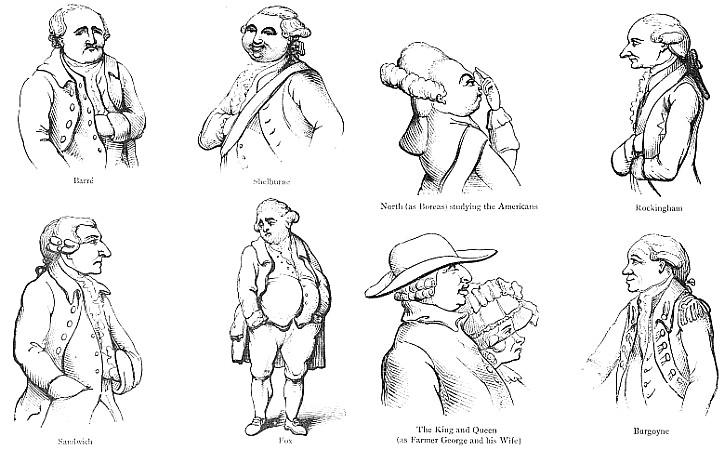
TYPES OF BRITISH CARICATURE
Capture of St. Eustatius, Feb. 3, 1781 Meanwhile, on the 3d of February, 1781, a powerful fleet under Rodney, with the force of 5,000 men which had been detached in November, 1779, from Clinton’s army in New York, appeared before the island of St. Eustatius, and summoned it to surrender. The Dutch governor, ignorant of the fact that war had begun, had only fifty-five soldiers on the island. He had no choice but to surrender, and the place was given up without a blow. The British had an especial spleen against this wealthy little island, which had come to be the centre of an enormous trade between France and Holland and the United States. Rodney called it a nest of thieves, and declared that “this rock, only six miles in length and three in breadth, had done England more harm than all the arms of her most potent enemies, and alone supported the infamous American rebellion.” His colleague, General Vaughan, who commanded the land force, regarded it as a feeder for the American “colonies,” of which the summary extinction would go far toward ending the war. With such feelings, they made up their minds to do their work thoroughly; and accordingly they confiscated to the Crown not only all the public stores, but all the private property of the inhabitants. Their orders were carried out with great brutality. The goods in the warehouses were seized and laden upon ships, to be carried away and sold at auction in the neighbouring islands. Every kind of private and personal property was laid hold of, and the beggared inhabitants were turned out of doors and ordered to quit the island. The total value of the booty amounted to more than twenty million dollars. Shameful proceedingsAmong the victims of this robbery were many British merchants, who were no better treated than the rest. Rodney tore up their remonstrance without reading it, and exclaimed, “This island is Dutch, and everything in it is Dutch, and as Dutch you shall all be treated.” The proceedings were fitly crowned by an act of treachery. The Dutch flag was kept flying as a decoy, and in the course of the next seven weeks more than fifty American ships, ignorant of the fate of the island, were captured by the aid of this dirty stratagem.
The conduct of the government in declaring war against Holland was denounced by the Whigs as criminal, and the true character of the shameful affair of St. Eustatius was shown up by Burke in two powerful speeches. But the government capped the climax when it deliberately approved the conduct of Rodney, and praised him for it. Many of the British victims, however, brought their cases before the courts, and obtained judgments which condemned as illegal the seizure of private property so far as they were concerned. On the continent of Europe, the outrage awakened general indignation, as an infraction of the laws and usages of civilized warfare, the like of which had not been seen for many years; and it served to alienate from Great Britain the little sympathy that remained for her.
To the historian who appreciates the glorious part which England has played in history, the proceedings here recorded are painful to contemplate; and to no one should they be more painful than to the American, whose forefathers climbed with Wolfe the rugged bank of the St. Lawrence; or a century earlier, from their homes in New England forests, heard with delight of Naseby and Marston Moor; or back yet another hundred years, in Lincolnshire villages defied the tyranny of Gardiner and Bonner; or at yet a more remote period did yeoman’s service in the army of glorious Earl Simon, or stood, perhaps, beside great Edward on the hallowed fields of Palestine. The pride with which one recalls such memories as these explains and justifies the sorrow and disgust with which one contemplates the spectacle of a truculent George Germain, an unscrupulous Stormont, or a frivolous North; or hears the dismal stories of Indian massacres, of defenceless villages laid in ashes, of legalized robbery on the ocean highway, or of colossal buccaneering, such as that which was witnessed at St. Eustatius. The earlier part of the reign of George III. is that period of English history of which an enlightened Englishman must feel most ashamed, as an enlightened Frenchman must feel ashamed of the reigns of Louis XIV. and the two Bonapartes. All these were periods of wholesale political corruption, of oppression at home and unrighteous warfare abroad, and all invited swift retribution in the shape of diminished empire and temporary lowering of the national prestige. It was not until after the downfall of the personal government of George III. that England began to resume her natural place in the foremost rank of liberal and progressive powers. Toward that happy result, the renewal and purification of English political life, the sturdy fight sustained by the Americans in defence of their liberties did much to contribute. The winning of independence by the Americans was the winning of a higher political standpoint for England and for the world.
After the surrender of Burgoyne, the military attitude of the British in the northern states became, as we have seen, purely defensive. Their efforts were almost exclusively directed toward maintaining their foothold, at first in the islands of New York and Rhode Island, afterward in New York alone, whence their ships could ascend the Hudson as far as the frowning crags which sentinel the entrance of the Highlands. Their offensive operations were restricted to a few plundering expeditions along the coast, well calculated to remind the worthy Connecticut farmers of the ubiquitousness of British power, and the vanity of hopes that might have been built upon the expectation of naval aid from France. But while the war thus languished at the centre, while at the same time it sent forth waves of disturbance that reverberated all the way from the Mississippi river to the Baltic sea, on the other hand the southernmost American states were the scene of continuous and vigorous fighting. Upon the reduction of the Carolinas and Georgia the king and Lord George Germain had set their hearts. If the rebellion could not be broken at the centre, it was hoped that it might at least be frayed away at the edges; and should fortune so far smile upon the royal armies as to give them Virginia also, perhaps the campaigns against the wearied North might be renewed at some later time and under better auspices.
State of things in the Far South In this view there was much that was plausible. Events had shown that the ministry had clearly erred in striking the rebellion at its strongest point; it now seemed worth while to aim a blow where it was weakest. The people of New England were almost unanimous in their opposition to the king, and up to this time the states of Massachusetts and Connecticut in particular had done more to sustain the war than all the others put together. Georgia and the Carolinas, a thousand miles distant, might be regarded as almost beyond the reach of reinforcements from New England; and it might be doubted whether they possessed the ability to defend themselves against a well-planned attack. Georgia, the weakest of the thirteen states, bordered upon the British territory of Florida. In South Carolina the character of the population made it difficult to organize resistance. The citizens of Charleston, and the rich planters of English or Huguenot descent inhabiting the lowlands, belonged mostly to the revolutionary party, but they were outnumbered by their negro slaves; and the peculiar features of slavery in South Carolina made this a very embarrassing circumstance. The relations between master and slave were not friendly there, as they were in Virginia; and while the state had kept up a militia during the whole colonial period, this militia found plenty of employment in patrolling the slave quarters, in searching for hidden weapons, and in hunting fugitives. It was now correctly surmised that on the approach of an invading army the dread of negro insurrection, with all its nameless horrors, would paralyze the arm of the state militia. While the patriotic South Carolinians were thus handicapped in entering upon the contest, there were in the white population many discordant elements. It was commonly said that the Quakers and men of German ancestry took little interest in politics, and were only too ready to submit to any authority that would protect them in their ordinary pursuits. A strong contrast to the political apathy of these worthy men was to be found in the rugged population of the upland counties. Here the small farmers of Scotch-Irish descent were, every man of them, Whigs, burning with a fanatical hatred of England; while, on the other hand, the Scotchmen who had come over since Culloden were mostly Tories, and had by no means as yet cast off that half-savage type of Highland character which we find so vividly portrayed in the Waverley novels. It was not strange that the firebrands of war, thrown among such combustible material, should have flamed forth with a glare of unwonted cruelty; nor was it strange that a commonwealth containing such incongruous elements, so imperfectly blended, should have been speedily, though but for a moment, overcome. The fit ground for wonder is that, in spite of such adverse circumstances, the state of South Carolina should have shown as much elastic strength as she did under the severest military stress which any American state was called upon to withstand during the Revolutionary War.
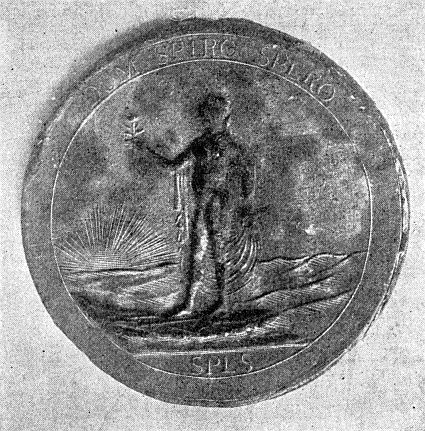
SEAL OF SOUTH CAROLINA (OBVERSE)
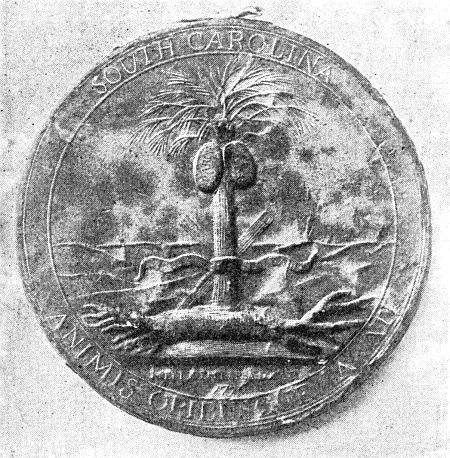
SEAL OF SOUTH CAROLINA (REVERSE)
Georgia overrun by the British Since the defeat of the British fleet before Charleston, in June 1776, the southern states had been left unmolested until the autumn of 1778, when there was more or less frontier skirmishing between Georgia and Florida,—a slight premonitory symptom of the storm that was coming. The American forces in the southern department were then commanded by General Robert Howe, who was one of the most distinguished patriots of North Carolina, but whose military capacity seems to have been slender. In the autumn of 1778 he had his headquarters at Savannah, for there was war on the frontier. Guerrilla parties, made up chiefly of vindictive loyalist refugees, but aided by a few British regulars from General Augustine Prevost’s force in Florida, invaded the rice plantations of Georgia, burning and murdering, and carrying off negroes,—not to set them free, but to sell them for their own benefit. As a counter-irritant, General Howe planned an expedition against St. Augustine, and advanced as far as St. Mary’s river; but so many men were swept away by fever that he was obliged to retreat to Savannah. He had scarcely arrived there when 3,500 British regulars from New York, under Colonel Campbell, landed in the neighbourhood, and offered him battle. Though his own force numbered only 1,200, of whom half were militia, Howe accepted the challenge, relying upon the protection of a great swamp which covered his flanks. But a path through the swamp was pointed out to the enemy by a negro, and the Americans, attacked in front and behind, were instantly routed. Some 500 prisoners were taken, and Savannah surrendered, with all its guns and stores; and this achievement cost the British but 24 men. A few days afterward, General Prevost advanced from Florida and captured Sunbury, with all its garrison, while Colonel Campbell captured Augusta. A proclamation was issued, offering protection to such of the inhabitants as would take up arms in behalf of the king’s government, while all others were by implication outlawed. The ugly temper of Lord George Germain was plainly visible in this proclamation and in the proceedings that followed. A shameless and promiscuous plunder was begun. The captive soldiers were packed into prison-ships and treated with barbarity. The more timid people sought to save their property by taking sides with the enemy, while the bolder spirits took refuge in the mountains; and thus General Prevost was enabled to write home that the state of Georgia was conquered.
Arrival of General Lincoln At the request of the southern delegates in Congress, General Howe had already been superseded by General Benjamin Lincoln, who had won distinction through his management of the New England militia in the Saratoga campaign. When Lincoln arrived at Charleston, in December, 1778, an attempt was made to call out the lowland militia of South Carolina, but the dread of the slaves kept them from obeying the summons. North Carolina, however, sent 2,000 men under John Ashe, one of the most eminent of the southern patriots; and with this force and 600 Continentals the new general watched the Savannah river and waited his chances. But North Carolina sent foes as well as friends to take part in the contest. A party of 700 loyalists from that state were marching across South Carolina to join the British garrison at Augusta, when they were suddenly attacked by Colonel Andrew Pickens with a small force of upland militia. In a sharp fight the Tories were routed, and half their number were taken prisoners. Indictments for treason were brought against many of these prisoners, and, after trial before a civil court, some seventy were found guilty, and five of them were hanged. The rashness of this step soon became apparent. Barbarous reprisalsThe British had put in command of Augusta one Colonel Thomas Browne, a Tory, who had been tarred and feathered by his neighbours at the beginning of the war. As soon as Browne heard of these executions for treason, he forthwith hanged some of his Whig prisoners; and thus was begun a long series of stupid and cruel reprisals, which, as time went on, bore bitter fruit.
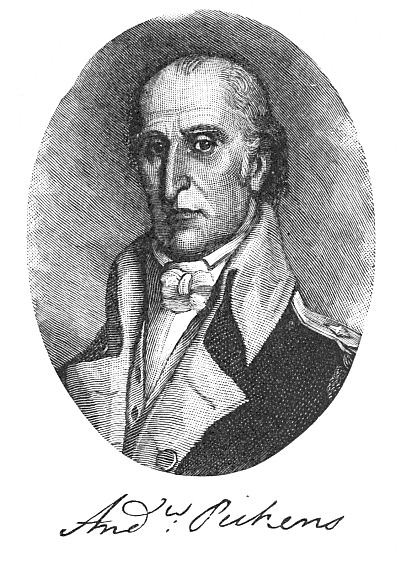
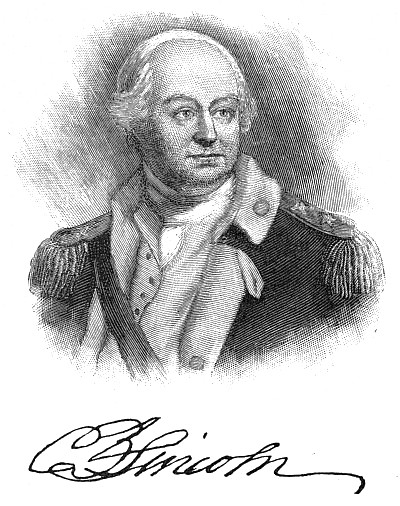
Americans routed at Briar Creek, March 3, 1779 While these things were going on in the back country, the British on the coast attempted to capture Port Royal, but were defeated, with heavy loss, by General Moultrie. Lincoln now felt able to assume the offensive, and he sent General Ashe with 1,500 men to threaten Augusta. At his approach the British abandoned the town, and retreated toward Savannah. Ashe pursued closely, but at Briar Creek, on the 3d of March, 1779, the British turned upon him and routed him. The Americans lost 400 in killed and wounded, besides seven pieces of artillery and more than 1,000 stand of arms. Less than 500 succeeded in making their way back to Lincoln’s camp; and this victory cost the British but five men killed and eleven wounded. Augusta was at once retaken; the royal governor, Sir James Wright, was reinstated in office; and, in general, the machinery of government which had been in operation previous to 1776 was restored. Lincoln, however, was far from accepting the defeat as final. With the energetic coöperation of Governor Rutledge, to whom extraordinary powers were granted for the occasion, enough militia were got together to repair the losses suffered at Briar Creek; and in April, leaving Moultrie with 1,000 men to guard the lower Savannah, Lincoln marched upon Augusta with the rest of his army, hoping to capture it, and give the legislature of Georgia a chance to assemble there, and destroy the moral effect of this apparent restoration of the royal government. But as soon as Lincoln had got out of the way, General Prevost crossed the Savannah with 3,000 men and advanced upon Charleston, laying waste the country and driving Moultrie before him. It was a moment of terror and confusion. Provost’s vandalismIn General Prevost there was at last found a man after Lord George Germain’s own heart. His march was a scene of wanton vandalism. The houses of the wealthy planters were mercilessly sacked; their treasures of silver plate were loaded on carts and carried off; their mirrors and china were smashed, their family portraits cut to pieces, their gardens trampled out, their shade-trees girdled and ruined; and as Prevost had a band of Cherokees with him, the horrors of the tomahawk and scalping-knife in some instances crowned the shameful work. The cabins of the slaves were burned. Cattle, horses, dogs, and poultry, when not carried away, were slaughtered wholesale, and the destruction of food was so great that something like famine set in. More than a thousand negroes are said to have died of starvation.
Plan for arming negroes In such wise did Prevost leisurely make his way toward Charleston; and reaching it on the 11th of May, he sent in a summons to surrender. A strangely interesting scene ensued. Events had occurred which had sorely perturbed the minds of the members of the state council. Pondering upon the best means of making the state militia available, Henry Laurens had hit upon the bold expedient of arming the most stalwart and courageous negroes, and marching them off to camp under the lead of white officers. Such a policy might be expected to improve the relations between whites and blacks by uniting them against a common danger, while the plantations would be to some extent relieved of an abiding source of dread. The plan was warmly approved by Laurens’s son, who was an officer on Washington’s staff, as well as by Alexander Hamilton, who further suggested that the blacks thus enrolled as militia should at the same time be given their freedom. Washington, on the other hand, feared that if the South Carolinians were to adopt such a policy the British would forestall them by offering better arms and equipments to the negroes, and thus muster them against their masters. It was a game, he felt, at which two could play. The matter was earnestly discussed, and at last was brought before Congress, which approved of Laurens’s plan, and recommended it to the consideration of the people of South Carolina; and it was just before the arrival of Prevost and his army that the younger Laurens reached Charleston with this message from Congress.
Indignation in South Carolina The advice was received in anything but a grateful spirit. For a century the state had maintained an armed patrol to go about among the negro quarters and confiscate every pistol, gun, or knife that could be found, and now it was proposed that three or four thousand slaves should actually be furnished with muskets by the state! People were startled at the thought, and there might well be a great diversity of opinion as to the feasibleness of so bold a measure at so critical a moment. To most persons it seemed like jumping out of the frying-pan into the fire. Coming, too, at a moment when the state was in such desperate need of armed assistance from Congress, this advice was very irritating. The people naturally could not make due allowance for the difficulties under which Congress laboured, and their wrath waxed hot. South Carolina seemed to be left in the lurch. Was it to join such a league as this that she had cast off allegiance to Great Britain? She had joined in the Declaration of Independence reluctantly, and from an honourable feeling of the desirableness of united action among the states. On that momentous day, of which it was not yet clear whether the result was to be the salvation or the ruin of America, her delegates had, with wise courtesy, changed their vote in deference to the opinions of the other states, in order that the American people might behave as a unit in so solemn a matter. Action of the councilAnd now that the state was invaded, her people robbed and insulted, and her chief city threatened, she was virtually bidden to shift for herself! Under the influence of such feelings as these, after a hot debate, the council, by a bare majority, decided to send a flag of truce to General Prevost, and to suggest that South Carolina should remain neutral until the end of the war, when it should be decided by treaty whether she should cast in her lot with Great Britain or with the United States. What might have come of this singular suggestion had it been seriously discussed we shall never know, for Prevost took no notice of it whatever. To neutralize South Carolina would not accord with the British plan which involved the conquest and occupation of that state as a base from which to proceed to the subjugation of its neighbours to the north. Prevost refused to exchange question and answer with a branch of the rebel government of South Carolina, but to Moultrie, as military commandant, he announced that his only terms were unconditional surrender. We can imagine how the gallant heart of Moultrie must have sunk within him at what he could not but call the dastardly action of the council, and how it must have leaped with honest joy at the British general’s ultimatum. “Very good,” said he simply; “we’ll fight it out, then.”
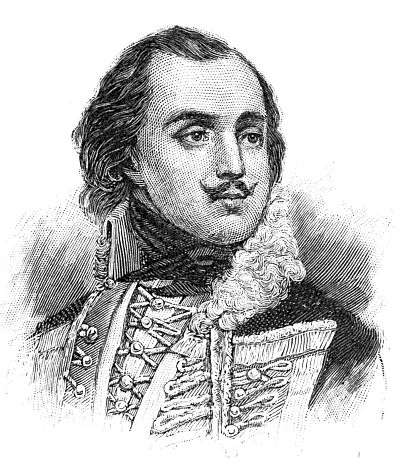
COUNT PULASKI
In citing this incident for its real historic interest, we must avoid the error of making too much of it. At this moment of sudden peril, indignation at the fancied neglect of Congress was joined to the natural unwillingness, on the part of the council, to incur the risk of giving up the property of their fellow-citizens to the tender mercies of such a buccaneer as Prevost had shown himself to be. But there is no sufficient reason for supposing that, had the matter gone farther, the suggestion of the council would have been adopted by the legislature or acquiesced in by the people of South Carolina.
End of the campaign On this occasion the danger vanished as suddenly as it came. Count Pulaski, with his legion, arrived from the northern army, and Lincoln, as soon as he learned what was going on, retraced his steps, and presently attacked General Prevost. After an indecisive skirmish, the latter, judging his force inadequate for the work he had undertaken, retreated into Georgia, and nothing more was done till autumn. The military honours of the campaign, however, remained with the British; for by his march upon Charleston Prevost had prevented Lincoln from disturbing the British supremacy in Georgia, and besides this he had gained a foothold in South Carolina; when he retreated he left a garrison in Beaufort which Lincoln was unable to dislodge.
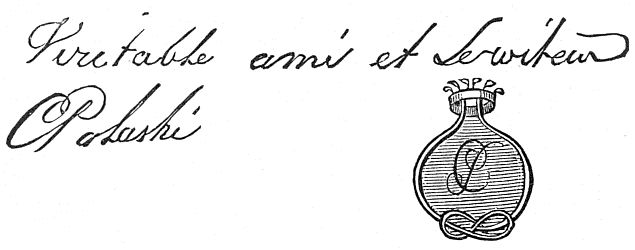
Attempt to recapture Savannah The French alliance, which thus far had been of so little direct military value, now appears again upon the scene. During the year which had elapsed since the futile Rhode Island campaign, the French fleet had been busy in the West Indies. Honours were easy, on the whole, between the two great maritime antagonists, but the French had so far the advantage that in August, 1779, Estaing was able once more to give some attention to his American friends. On the first day of September he appeared off the coast of Georgia with a powerful fleet of twenty-two ships-of-the-line and eleven frigates. Great hopes were now conceived by the Americans, and a plan was laid for the recapture of Savannah. By the 23d of the month the place was invested by the combined forces of Lincoln and Estaing, and for three weeks the siege was vigorously carried on by a regular system of approaches, while the works were diligently bombarded by the fleet. At length Estaing grew impatient. There was not sufficient harbourage for his great ships, and the captains feared that they might be overtaken by the dangerous autumnal gales for which that coast is noted. To reduce the town by a regular siege would perhaps take several weeks more, and it was accordingly thought best to try to carry it by storm. On the 9th of October a terrific assault was made in full force. Some of the outworks were carried, and for a moment the stars and stripes and the fleurs-de-lis were planted on the redoubts; but British endurance and the strength of the position at last prevailed. The assailants were totally defeated, losing more than 1,000 men, while the British, in their sheltered position, lost but 55. The gallant Pulaski was among the slain, and Estaing received two severe wounds. The French, who had borne the brunt of the fight, now embarked and stood out to sea, but not in time to escape the October gale which they had been dreading. After weathering with difficulty a terrible storm, their fleet was divided; and while part returned to the West Indies, Estaing himself, with the remainder, crossed to France. Thus the second attempt at concerted action between French and Americans had met with even more lamentable failure than the first.
Sir Henry Clinton and Lord Cornwallis go to Georgia While these things were going on, Washington had hoped, and Clinton had feared, that Estaing might presently reach New York in such force as to turn the scale there against the British. As soon as he learned that the French fleet was out of the way, Sir Henry Clinton proceeded to carry out a plan which he had long had in contemplation. A year had now elapsed since the beginning of active operations in the south, and, although the British arms had been crowned with success, it was desirable to strike a still heavier blow. The capture of the chief southern city was not only the next step in the plan of the campaign, but it was an object of especial desire to Sir Henry Clinton personally, for he had not forgotten the humiliating defeat at Fort Moultrie in 1776. He accordingly made things as snug as possible at the north, by finally withdrawing the garrisons from Rhode Island and the advanced posts on the Hudson. In this way, while leaving Knyphausen with a strong force in command of New York, he was enabled to embark 8,000 men on transports, under convoy of five ships-of-the-line; and on the day after Christmas, 1779, he set sail for Savannah, taking Lord Cornwallis with him.
The voyage was a rough one. Some of the transports foundered, and some were captured by American privateers. Yet when Clinton arrived in Georgia, and united his forces to those of Prevost, the total amounted to more than 10,000 men. He ventured, however, to weaken the garrison of New York still more, and sent back at once for 3,000 men under command of the young Lord Rawdon, of the famous family of Hastings,—better known in after-years as Earl of Moira and Marquis of Hastings, and destined, like Cornwallis, to serve with great distinction as governor-general of India. The event fully justified Clinton’s sagacity in taking this step. New York was quite safe for the present; for so urgent was the need for troops in South Carolina, and so great the difficulty of raising them, that Washington was obliged to detach from his army all the Virginia and North Carolina troops, and sent them down to aid General Lincoln. With his army thus weakened, it was out of the question for Washington to attack New York.
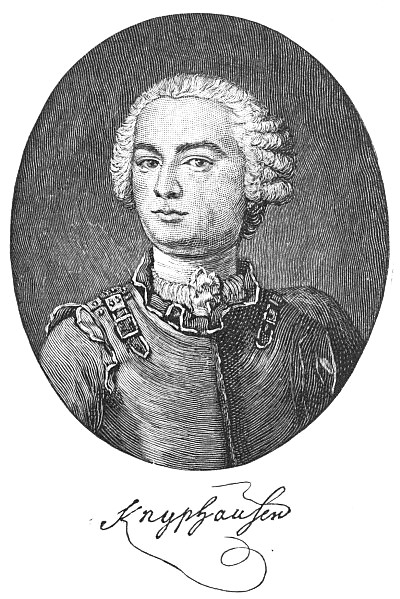
The British advance upon Charleston Lincoln, on the other hand, after his reinforcements arrived, had an army of 7,000 men with which to defend the threatened state of South Carolina. It was an inadequate force, and its commander, a thoroughly brave and estimable man, was far from possessing the rare sagacity which Washington displayed in baffling the schemes of the enemy. The government of South Carolina deemed the preservation of Charleston to be of the first importance, just as, in 1776, Congress had insisted upon the importance of keeping the city of New York. But we have seen how Washington, in that trying time, though he could not keep the city, never allowed himself to get his army into a position from which he could not withdraw it, and at last, through his sleepless vigilance, won all the honours of the campaign. In the defence of Charleston no such high sagacity was shown. Clinton advanced slowly overland, until on the 26th of February, 1780, he came in sight of the town. It had by that time become so apparent that his overwhelming superiority of force would enable him to encompass it on every side, that Lincoln should have evacuated the place without a moment’s delay; and such was Washington’s opinion as soon as he learned the facts. The loss of Charleston, however serious a blow, could in no case be so disastrous as the loss of the army. But Lincoln went on strengthening the fortifications, and gathering into the trap all the men and all the military resources he could find. For some weeks the connections with the country north of the Cooper river were kept open by two regiments of cavalry; but on the 14th of April these regiments were cut to pieces by Colonel Banastre Tarleton, the cavalry commander, who now first appeared on the scene upon which he was soon to become so famous. Five days later, the reinforcement under Lord Rawdon, arriving from New York, completed the investment of the doomed city. The ships entering the harbour did not attempt to batter down Fort Moultrie, but ran past it; and on the 6th of May this fortress, menaced by troops in the rear, surrendered.
Surrender of Charleston, May 12, 1780 The British army now held Charleston engirdled with a cordon of works on every side, and were ready to begin an assault which, with the disparity of forces in the case, could have but one possible issue. On the 12th of May, to avoid a wanton waste of life, the city was surrendered, and Lincoln and his whole army became prisoners of war. The Continental troops, some 3,000 in number, were to be held as prisoners till regularly exchanged. The militia were allowed to return home on parole, and all the male citizens were reckoned as militia, and paroled likewise. The victorious Clinton at once sent expeditions to take possession of Camden and other strategic points in the interior of the state. One regiment of the Virginia line, under Colonel Buford, had not reached Charleston, and on hearing of the great catastrophe it retreated northward with all possible speed. But Tarleton gave chase as far as Waxhaws, near the North Carolina border, and there, overtaking Buford, cut his force to pieces, slaying 113 and capturing the rest. Not a vestige of an American army was left in all South Carolina.
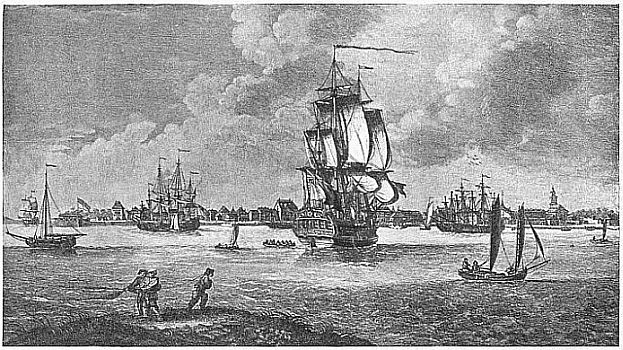
A VIEW OF CHARLESTON BEFORE THE REVOLUTION
South Carolina overrun by the British “We look on America as at our feet,” said Horace Walpole; and doubtless, after the capture of Fort Washington, this capture of Lincoln’s army at Charleston was the most considerable disaster which befell the American arms during the whole course of the war. It was of less critical importance than the affair of Fort Washington, as it occurred at what every one must admit to have been a less critical moment. The loss of Fort Washington, taken in connection with the misconduct of Charles Lee, came within a hair’s-breadth of wrecking the cause of American independence at the outset; and it put matters into so bad a shape that nothing short of Washington’s genius could have wrought victory out of them. The loss of South Carolina, in May, 1780, serious as it was, did not so obviously imperil the whole American cause. The blow did not come at quite so critical a time, or in quite so critical a place. The loss of South Carolina would not have dismembered the confederacy of states, and in course of time, with the American cause elsewhere successful, she might have been recovered. The blow was nevertheless very serious indeed, and, if all the consequences which Clinton contemplated had been achieved, it might have proved fatal. To crush a limb may sometimes be as dangerous as to stab the heart. For its temporary completeness, the overthrow may well have seemed greater than that of Fort Washington. The detachments which Clinton sent into the interior met with no resistance. Many of the inhabitants took the oath of allegiance to the Crown; others gave their parole not to serve against the British during the remainder of the war. Clinton issued a circular, inviting all well-disposed people to assemble and organize a loyal militia for the purpose of suppressing any future attempts at rebellion. All who should again venture to take up arms against the king were to be dealt with as traitors, and their estates were to be confiscated; but to all who should now return to their allegiance a free pardon was offered for past offences, except in the case of such people as had taken part in the hanging of Tories. Having struck this great blow, Sir Henry Clinton returned, in June, to New York, taking back with him the larger part of his force, but leaving Cornwallis with 5,000 men to maintain and extend the conquests already made.
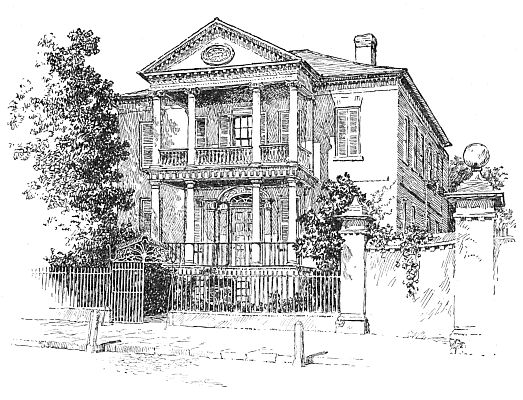
MILES BREWTON HOUSE IN CHARLESTON
An injudicious proclamation Just before starting, however, Sir Henry, in a too hopeful moment, issued another proclamation, which went far toward destroying the effect of his previous measures. This new proclamation required all the people of South Carolina to take an active part in reëstablishing the royal government, under penalty of being dealt with as rebels and traitors. At the same time, all paroles were discharged except in the case of prisoners captured in ordinary warfare, and thus everybody was compelled to declare himself as favourable or hostile to the cause of the invaders. The British commander could hardly have taken a more injudicious step. Under the first proclamation, many of the people were led to comply with the British demands because they wished to avoid fighting altogether; under the second, a neutral attitude became impossible, and these lovers of peace and quiet, when they found themselves constrained to take an active part on one side or the other, naturally preferred to help their friends rather than their enemies. Thus the country soon showed itself restless under British rule, and this feeling was strengthened by the cruelties which, after Clinton’s departure, Cornwallis found himself quite unable to prevent. Officers endowed with civil and military powers combined were sent about the country in all directions, to make full lists of the inhabitants for the purpose of enrolling a loyalist militia. In the course of these unwelcome circuits many affrays occurred, and instances were not rare in which people were murdered in cold blood. Disorders in South CarolinaDebtors took occasion to accuse their creditors of want of loyalty, and the creditor was obliged to take the oath of allegiance before he could collect his dues. Many estates were confiscated, and the houses of such patriots as had sought refuge in the mountains were burned. Bands of armed men, whose aim was revenge or plunder, volunteered their services in preserving order, and, getting commissions, went about making disorder more hideous, and wreaking their evil will without let or hindrance. The loyalists, indeed, asserted that they behaved no worse than the Whigs when the latter got the upper hand, and in this there was much truth. Cornwallis, who was the most conscientious of men and very careful in his statements of fact, speaks, somewhat later, of “the shocking tortures and inhuman murders which are every day committed by the enemy, not only on those who have taken part with us, but on many who refuse to join them.” There can be no doubt that Whigs and Tories were alike guilty of cruelty and injustice. But on the present occasion all this disorder served to throw discredit on the British, as the party which controlled the country, and must be held responsible accordingly.
The strategic points Organized resistance was impossible. The chief strategic points on the coast were Charleston, Beaufort, and Savannah; in the interior, Augusta was the gateway of Georgia, and the communications between this point and the wild mountains of North Carolina were dominated by a village known as “Ninety-Six,” because it was just that number of miles distant from Keowee, the principal town of the Cherokees. Eighty miles to the northeast of Ninety-Six lay the still more important post of Camden, in which centred all the principal inland roads by which South Carolina could be reached from the north. All these strategic points were held in force by the British, and save by help from without there seemed to be no hope of releasing the state from their iron grasp. Partisan commandersAmong the patriotic Whigs, however, there were still some stout hearts that did not despair. Retiring to the dense woods, the tangled swamps, or the steep mountain defiles, these sagacious and resolute men kept up a romantic partisan warfare, full of midnight marches, sudden surprises, and desperate hand-to-hand combats. Foremost among these partisan commanders, for enterprise and skill, were James Williams, Andrew Pickens, Thomas Sumter, and Francis Marion.
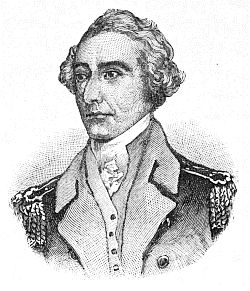
FRANCIS MARION
Francis Marion
Of all the picturesque characters of our Revolutionary period, there is
perhaps no one who, in the memory of the people, is so closely
associated with romantic adventure as Francis Marion. He belonged to
that gallant race of men of whose services France had been forever
deprived when Louis XIV. revoked the edict of Nantes. His father had
been a planter near Georgetown, on the coast, and the son, while
following the same occupation, had been called off to the western
frontier by the Cherokee war of 1759, in the course of which he had made
himself an adept in woodland strategy. He was now forty-seven years
old, a man of few words and modest demeanour, small in stature and
slight in frame, delicately organized, but endowed with wonderful
nervous energy and sleepless intelligence. Like a woman in quickness of
sympathy, he was a knight in courtesy, truthfulness, and courage. The
brightness of his fame was never sullied by an act of cruelty. “Never
shall a house be burned by one of my people,” said he; “to distress poor
women and children is what I detest.” To distress the enemy in
legitimate warfare was, on the other hand, a business in which few
partisan commanders have excelled him. For swiftness and secrecy he was
unequalled, and the boldness of his exploits seemed almost incredible,
when compared with the meagreness of his resources. His force sometimes
consisted of less than twenty men, and seldom exceeded seventy.
 To arm
them, he was obliged to take the saws from sawmills and have them
wrought into rude swords at the country forge, while pewter mugs and
spoons were cast into bullets. With such equipment he would attack and
overwhelm parties of more than two hundred Tories; or he would even
swoop upon a column of British regulars on their march, throw them into
disorder, set free their prisoners, slay and disarm a score or two, and
plunge out of sight in the darkling forest as swiftly and mysteriously
as he had come.
To arm
them, he was obliged to take the saws from sawmills and have them
wrought into rude swords at the country forge, while pewter mugs and
spoons were cast into bullets. With such equipment he would attack and
overwhelm parties of more than two hundred Tories; or he would even
swoop upon a column of British regulars on their march, throw them into
disorder, set free their prisoners, slay and disarm a score or two, and
plunge out of sight in the darkling forest as swiftly and mysteriously
as he had come.
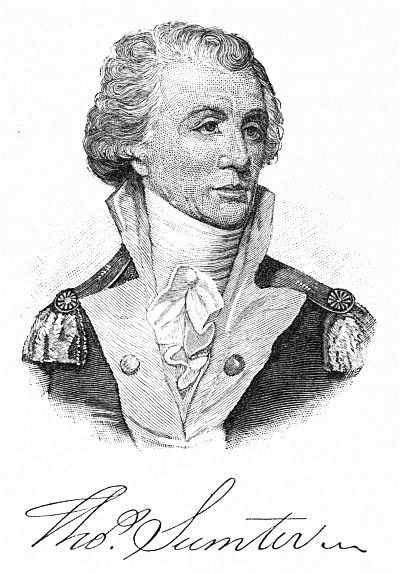
Thomas Sumter Second to Marion alone in this wild warfare was Thomas Sumter, a tall and powerful man, stern in countenance and haughty in demeanour. Born in Virginia in 1734, he was present at Braddock’s defeat in 1755, and after prolonged military service on the frontier found his way to South Carolina before the beginning of the Revolutionary War. He lived nearly a hundred years; sat in the Senate of the United States during the War of 1812, served as minister to Brazil, and witnessed the nullification acts of his adopted state under the stormy presidency of Jackson. During the summer of 1780, he kept up so brisk a guerrilla warfare in the upland regions north of Ninety-Six that Cornwallis called him “the greatest plague in the country.” “But for Sumter and Marion,” said the British commander, “South Carolina would be at peace.” The first advantage of any sort gained over the enemy since Clinton’s landing was the destruction of a company of dragoons by Sumter, on the 12th of July. Three weeks later, he made a desperate attack on the British at Rocky Mount, but was repulsed. First appearance of Andrew JacksonOn the 6th of August, he surprised the enemy’s post at Hanging Rock, and destroyed a whole regiment. It was on this occasion that Andrew Jackson made his first appearance in history, an orphan boy of thirteen, staunch in the fight as any of his comrades.
But South Carolina was too important to be left dependent upon the skill and bravery of its partisan commanders alone. Already, before the fall of Charleston, it had been felt that further reinforcements were needed there, and Washington had sent down some 2,000 Maryland and Delaware troops under Baron Kalb, an excellent officer. Advance of KalbIt was a long march, and the 20th of June had arrived when Kalb halted at Hillsborough, in North Carolina, to rest his men and seek the coöperation of General Caswell, who commanded the militia of that state. By this time the news of the capture of Lincoln’s army had reached the north, and the emergency was felt to be a desperate one. Fresh calls for militia were made upon all the states south of Pennsylvania. That resources obtained with such difficulty should not be wasted, it was above all desirable that a competent general should be chosen to succeed the unfortunate Lincoln. The opinions of the commander-in-chief with reference to this matter were well known. Washington wished to have Greene appointed, as the ablest general in the army. But the glamour which enveloped the circumstances of the great victory at Saratoga was not yet dispelled. Since the downfall of the Conway cabal, Gates had never recovered the extraordinary place which he had held in public esteem at the beginning of 1778, but there were few as yet who seriously questioned the reputation he had so lightly won for generalship. Many people now called for Gates, who had for the moment retired from active service and was living on his plantation in Virginia, and the suggestion found favour with Congress. Gates appointed to the chief command in the SouthOn the 13th of June Gates was appointed to the chief command of the southern department, and eagerly accepted the position. The good wishes of the people went with him. Richard Peters, secretary of the Board of War, wrote him a very cordial letter, saying, “Our affairs to the southward look blue: so they did when you took command before the Burgoynade. I can only now say, Go and do likewise—God bless you.” Charles Lee, who was then living in disgrace on his Virginia estate, sent a very different sort of greeting. Lee and Gates had always been friends,—linked together, perhaps, by pettiness of spirit and a common hatred for the commander-in-chief, whose virtues were a perpetual rebuke to them. But the cynical Lee knew his friend too well to share in the prevailing delusion as to his military capacity, and he bade him good-by with the ominous warning, “Take care that your northern laurels do not change to southern willows!”
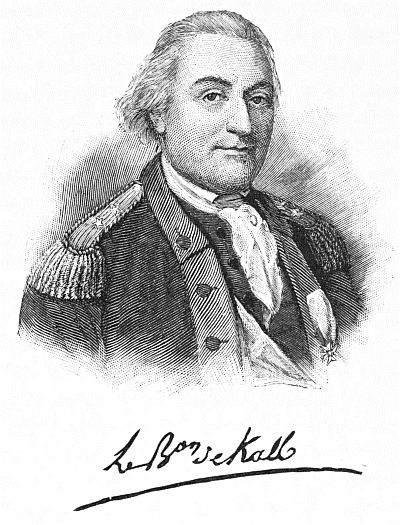
Choice of roads to Camden With this word of ill omen, which doubtless he little heeded, the “hero of Saratoga” made his way to Hillsborough, where he arrived on the 19th of July, and relieved Kalb of the burden of anxiety that had been thrust upon him. Gates found things in a most deplorable state: lack of arms, lack of tents, lack of food, lack of medicines, and, above all, lack of money. The all-pervading neediness which in those days beset the American people, through their want of an efficient government, was never more thoroughly exemplified. It required a very different man from Gates to mend matters. Want of judgment and want of decision were faults which he had not outgrown, and all his movements were marked by weakness and rashness. He was adventurous where caution was needed, and timid when he should have been bold. The objective point of his campaign was the town of Camden. Once in possession of this important point, he could force the British from their other inland positions and throw them upon the defensive at Charleston. It was not likely that so great an object would be attained without a battle, but there was a choice of ways by which the strategic point might be approached. Two roads led from Hillsborough to Camden. The westerly route passed through Salisbury and Charlotte, in a long arc of a circle, coming down upon Camden from the northwest. The country through which it passed was fertile, and the inhabitants were mostly Scotch-Irish Whigs. By following this road, the danger of a sudden attack by the enemy would be slight, wholesome food would be obtained in abundance, and in case of defeat it afforded a safe line of retreat. The easterly route formed the chord of this long arc, passing from Hillsborough to Camden almost in a straight line 160 miles in length. It was 50 miles shorter than the other route, but it lay through a desolate region of pine barrens, where farmhouses and cultivated fields were very few and far between, and owned by Tories. This line of march was subject to flank attacks, it would yield no food for the army, and a retreat through it, on the morrow of an unsuccessful battle, would simply mean destruction. The only advantage of this route was its directness. The British forces were more or less scattered about the country. Lord Rawdon held Camden with a comparatively small force, and Gates was anxious to attack and overwhelm him before Cornwallis could come up from Charleston.
Gates chooses the wrong road Gates accordingly chose the shorter route, with all its disadvantages, in spite of the warnings of Kalb and other officers, and on the 27th of July he put his army in motion. On the 3d of August, having entered South Carolina and crossed the Pedee river, he was joined by Colonel Porterfield with a small force of Virginia regulars, which had been hovering on the border since the fall of Charleston. On the 7th he effected a junction with General Caswell and his North Carolina militia, and on the 10th his army, thus reinforced, reached Little Lynch’s Creek, about fifteen miles northeast of Camden, and confronted the greatly inferior force of Lord Rawdon. The two weeks’ march had been accomplished at the rate of about eleven miles a day, with no end of fatigue and suffering. Distress of the troopsThe few lean kine slaughtered by the roadside had proved quite insufficient to feed the army, and for want of any better diet the half-starved men had eaten voraciously of unripe corn, green apples, and peaches. All were enfeebled, and many were dying of dysentery and cholera morbus, so that the American camp presented a truly distressing scene.
Gates loses the moment for striking Rawdon’s force stood across the road, blocking the way to Camden, and the chance was offered for Gates to strike the sudden blow for the sake of which he had chosen to come by this bad road. There was still, however, a choice of methods. The two roads, converging toward their point of intersection at Camden, were now very near together. Gates might either cross the creek in front, and trust to his superior numbers to overwhelm the enemy, or, by a forced march of ten miles to the right, he might turn Rawdon’s flank and gain Camden before him. A good general would have done either the one of these things or the other, and Kalb recommended the immediate attack. But now at the supreme moment Gates was as irresolute as he had been impatient when 160 miles away. He let the opportunity slip, waited two days where he was, and on the 13th marched slowly to the right and took up his position at Clermont, on the westerly road; thus abandoning the whole purpose for the sake of which he had refused to advance by that road in the first place. On the 14th he was joined by General Stevens with 700 Virginia militia; but on the same day Lord Cornwallis reached Camden with his regulars, and the golden moment for crushing the British in detachments was gone forever.
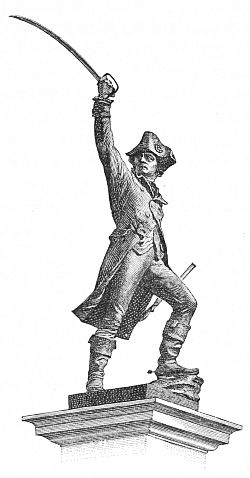
The American army now numbered 3,052 men, of whom 1,400 were regulars, chiefly of the Maryland line. The rest were mostly raw militia. The united force under Cornwallis amounted to only 2,000 men, but they were all thoroughly trained soldiers. It was rash for the Americans to hazard an attack under such circumstances, especially in their forlorn condition, faint as they were with hunger and illness, and many of them hardly fit to march or take the field. and weakens his army on the eve of battleBut, strange as it may seem, a day and a night passed by, and Gates had not yet learned that Cornwallis had arrived, but still supposed he had only Rawdon to deal with. It was no time for him to detach troops on distant expeditions, but on the 14th he sent 400 of his best Maryland regulars on a long march southward, to coöperate with Sumter in cutting off the enemy’s supplies on the road between Charleston and Camden. At ten o’clock on the night of the 15th, Gates moved his army down the road from Clermont to Camden, intending to surprise Lord Rawdon before daybreak. The distance was ten miles through the woods, by a rough road, hemmed in on either side, now by hills, and now by impassable swamps. At the very same hour, Cornwallis started up the road, with the similar purpose of surprising General Gates. A little before three in the morning, the British and American advance guards of light infantry encountered each other on the road, five miles north of Camden, and a brisk skirmish ensued, in which the Americans were routed and the gallant Colonel Porterfield was slain. Both armies, however, having failed in their scheme of surprising each other, lay on their arms and waited for daylight. Some prisoners who fell into the hands of the Americans now brought the news that the army opposed to them was commanded by Cornwallis himself, and they overstated its numbers at 3,000 men. and is surprised by CornwallisThe astonished Gates called together his officers, and asked what was to be done. No one spoke for a few moments, until General Stevens exclaimed, “Well, gentlemen, is it not too late now to do anything but fight?” Kalb’s opinion was in favour of retreating to Clermont and taking a strong position there; but his advice had so often passed unheeded that he no longer urged it, and it was decided to open the battle by an attack on the British right.
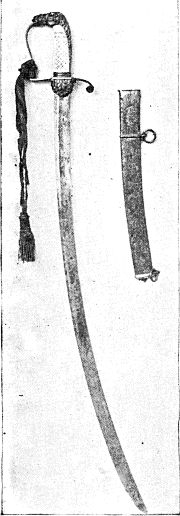
Battle of Camden, Aug. 16, 1780 The rising sun presently showed the two armies close together. Huge swamps, at a short distance from the road, on either side, covered both flanks of both armies. On the west side of the road the British left was commanded by Lord Rawdon, on the east side their right was led by Colonel James Webster, while Tarleton and his cavalry hovered a little in the rear. The American right wing, opposed to Rawdon, was commanded by Kalb, and consisted of the Delaware regiment and the second Maryland brigade in front, supported by the first Maryland brigade at some distance in the rear. The American left wing, opposed to Webster, consisted of the militia from Virginia and North Carolina, under Generals Stevens and Caswell. Such an arrangement of troops invited disaster. The battle was to begin with an attack on the British right, an attack upon disciplined soldiers; and the lead in this attack was entrusted to raw militia who had hardly ever been under fire, and did not even understand the use of the bayonet! This work should have been given to those splendid Maryland troops that had gone to help Sumter. The militia, skilled in woodcraft, should have been sent on that expedition, and the regulars should have been retained for the battle. The militia did not even know how to advance properly, but became tangled up; and while they were straightening their lines, Colonel Webster came down upon them in a furious charge. The shock of the British column was resistless. The Virginia militia threw down their guns and fled without firing a shot. The North Carolina militia did likewise, and within fifteen minutes the whole American left became a mob of struggling men, smitten with mortal panic, and huddling like sheep in their wild flight, while Tarleton’s cavalry gave chase and cut them down by scores. Leaving Tarleton to deal with them, Webster turned upon the first Maryland brigade, and slowly pushed it off the field, after an obstinate resistance. The second Maryland brigade, on the other hand, after twice repelling the assault of Lord Rawdon, broke through his left with a spirited bayonet charge, and remained victorious upon that part of the field, until the rest of the fight was ended; when being attacked in flank by Webster, these stalwart troops retreated westerly by a narrow road between swamp and hillside, and made their escape in good order. Long after the battle was lost in every other quarter, the gigantic form of Kalb, unhorsed and fighting on foot, was seen directing the movements of his brave Maryland and Delaware troops, till he fell dying from eleven wounds, Gates, caught in the throng of fugitives at the beginning of the action, was borne in headlong flight as far as Clermont, where, taking a fresh horse, he made the distance of nearly two hundred miles to Hillsborough in less than four days. The laurels of Saratoga had indeed changed into willows. Total and ignominious defeat of GatesIt was the most disastrous defeat ever inflicted upon an American army, and ignominious withal, since it was incurred through a series of the grossest blunders. The Maryland troops lost half their number, the Delaware regiment was almost entirely destroyed, and all the rest of the army was dispersed. The number of killed and wounded has never been fully ascertained, but it can hardly have been less than 1,000, while more than 1,000 prisoners were taken, with seven pieces of artillery and 2,000 muskets. The British loss in killed and wounded was 324.
His campaign was a series of blunders The reputation of General Gates never recovered from this sudden overthrow, and his swift flight to Hillsborough was made the theme of unsparing ridicule. Yet, if duly considered, that was the one part of his conduct for which he cannot fairly be blamed. The best of generals may be caught in a rush of panic-stricken fugitives and hurried off the battlefield: the flight of Frederick the Great at Mollwitz was even more ignominious than that of Gates at Camden. When once, moreover, the full extent of the disaster had become apparent, it was certainly desirable that Gates should reach Hillsborough as soon as possible, since it was the point from which the state organization of North Carolina was controlled, and accordingly the point at which a new army might soonest be collected. Gates’s flight was a singularly dramatic and appropriate end to his silly career, but our censure should be directed to the wretched generalship by which the catastrophe was prepared: to the wrong choice of roads, the fatal hesitation at the critical moment, the weakening of the army on the eve of battle; and, above all, to the rashness in fighting at all after the true state of affairs had become known. The campaign was an epitome of the kind of errors which Washington always avoided; and it admirably illustrated the inanity of John Adams’s toast, “A short and violent war,” against an enemy of superior strength.
Partisan operations If the 400 Maryland regulars who had been sent to help General Sumter had remained with the main army and been entrusted with the assault on the British right, the result of this battle would doubtless have been very different. It might not have been a victory, but it surely would not have been a rout. On the day before the battle, Sumter had attacked the British supply train on its way from Charleston, and captured all the stores, with more than 100 prisoners. But the defeat at Camden deprived this exploit of its value. Sumter retreated up the Wateree river to Fishing creek, but on the 18th Tarleton for once caught him napping, and routed him; taking 300 prisoners, setting free the captured British, and recovering all the booty. The same day witnessed an American success in another quarter. At Musgrove’s Mills, in the western part of the state, Colonel James Williams defeated a force of 500 British and Tories, killing and wounding nearly one third of their number. Two days later, Marion performed one of his characteristic exploits. A detachment of the British army was approaching Nelson’s Ferry, where the Santee river crosses the road from Camden to Charleston, when Marion, with a handful of men, suddenly darting upon these troops, captured 26 of their number, set free 150 Maryland prisoners whom they were taking down to the coast, and got away without losing a man.
Such deeds showed that the life of South Carolina was not quite extinct, but they could not go far toward relieving the gloom which overspread the country after the defeat of Camden. For a second time within three months the American army in the south had been swept out of existence. Gates could barely get together 1,000 men at Hillsborough, and Washington could not well spare any more from his already depleted force. To muster and train a fresh army of regulars would be slow and difficult work, and it was as certain as anything could be that Cornwallis would immediately proceed to attempt the conquest of North Carolina.
Weariness and depression of the people Never was the adage that the darkest time comes just before day more aptly illustrated than in the general aspect of American affairs during the summer and fall of 1780. The popular feeling had not so much the character of panic as in those “times which tried men’s souls,” when the broad Delaware river screened Washington’s fast dwindling army from destruction. It was not now a feeling of quick alarm so much as of utter weariness and depression. More than four years had passed since the Declaration of Independence, and although the enemy had as yet gained no firm foothold in the northern states except in the city of New York, it still seemed impossible to dislodge them from that point, while Cornwallis, flushed with victory, boasted that he would soon conquer all the country south of the Susquehanna. For the moment it began to look as if Lord George Germain’s policy of tiring the Americans out might prove successful, after all. The country was still without anything fit to be called a general government. After three years’ discussion, the Articles of Confederation, establishing a “league of friendship” between the thirteen states, had not yet been adopted. The Continental Congress had continued to decline in reputation and capacity. From this state of things, rather than from any real poverty of the country, there had ensued a general administrative paralysis, which went on increasing even after the war was ended, until it was brought to a close by the adoption of the Federal Constitution. It was not because the thirteen states were lacking in material resources or in patriotism that the conduct of the war languished as it did. The resources were sufficient, had there been any means of concentrating and utilizing them. The relations of the states to each other were not defined; and while there were thirteen powers which could plan and criticise, there was no single power which could act efficiently. Hence the energies of the people were frittered away.
Evils wrought by the paper currency The disease was most plainly visible in those money matters which form the basis of all human activity. The Scondition of American finance in 1780 was simply horrible. The “greenback” delusion possessed people’s minds even more strongly then than in the days following our Civil War. Pelatiah Webster, the ablest political economist in America at that time, a thinker far in advance of his age, was almost alone in insisting upon taxation. The popular feeling was expressed by a delegate in Congress who asked, with unspeakable scorn, why he should vote to tax the people, when a Philadelphia printing-press could turn out money by the bushel.[31] But indeed, without an amendment, Congress had no power to lay any tax, save through requisitions upon the state governments. There seemed to be no alternative but to go on issuing this money, which many people glorified as the “safest possible currency,” because “nobody could take it out of the country.” As Webster truly said, the country had suffered more from this cause than from the arms of the enemy. “The people of the states at that time,” said he, “had been worried and fretted, disappointed and put out of humour, by so many tender acts, limitations of prices, and other compulsory methods to force value into paper money, and compel the circulation of it, and by so many vain funding schemes and declarations and promises, all which issued from Congress, but died under the most zealous efforts to put them into operation, that their patience was exhausted. These irritations and disappointments had so destroyed the courage and confidence of the people that they appeared heartless and almost stupid when their attention was called to any new proposal.” During the summer of 1780 this wretched “Continental” currency fell into contempt. As Washington said, it took a wagon-load of money to buy a wagon-load of provisions. At the end of the year 1778, the paper dollar was worth sixteen cents in the northern states and twelve cents in the south. Early in 1780 its value had fallen to two cents, and before the end of the year it took ten paper dollars to make a cent. In October, Indian corn sold wholesale in Boston for $150 a bushel, butter was $12 a pound, tea $90, sugar $10, beef $8, coffee $12, and a barrel of flour cost $1,575. Samuel Adams paid $2,000 for a hat and suit of clothes. The money soon ceased to circulate, debts could not be collected, and there was a general prostration of credit. “Not worth a Continental”To say that a thing was “not worth a Continental” became the strongest possible expression of contempt. A barber in Philadelphia papered his shop with bills, and a dog was led up and down the streets, smeared with tar, with this unhappy “money” sticking all over him,—a sorry substitute for the golden-fleeced sheep of the old Norse legend. Save for the scanty pittance of gold which came in from the French alliance, from the little foreign commerce that was left, and from trade with the British army itself, the country was without any circulating medium. In making its requisitions upon the states, Congress resorted to a measure which reminds one of the barbaric ages of barter. Instead of asking for money, it requested the states to send in their “specific supplies” of beef and pork, flour and rice, salt and hay, tobacco and rum. The finances of what was so soon to become one of the richest of nations were thus managed on the principle whereby the meagre salaries of country clergymen in New England used to be eked out. It might have been called a continental system of “donation parties.”
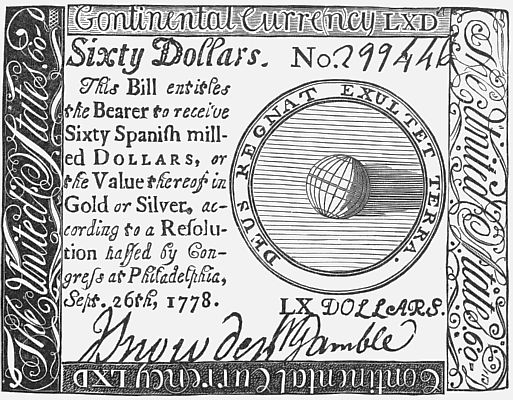
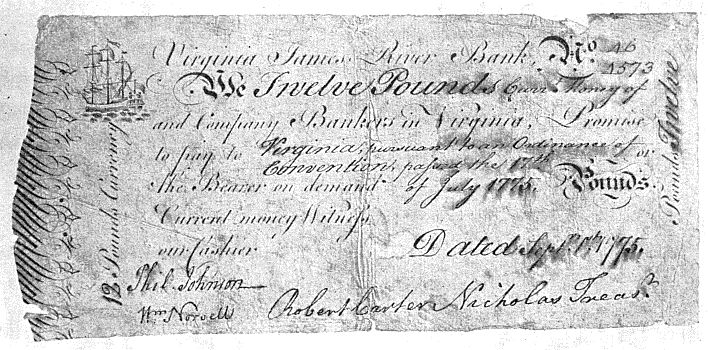
VIRGINIA COLONIAL CURRENCY
Difficulty of keeping the army together
Under these circumstances, it became almost impossible to feed and
clothe the army. The commissaries, without either money or credit, could
do but little; and Washington, sorely against his will, was obliged to
levy contributions on the country surrounding his camp. It was done as
gently as possible. The county magistrates were called on for a
specified quantity of flour and meat; the supplies brought in were duly
appraised, and certificates were given in exchange for them by the
commissaries. Such certificates were received at their nominal value in
payment of taxes. But this measure, which simply introduced a new kind
of paper money, served only to add to the general confusion. These
difficulties, enhanced by the feeling that the war was dragged out to an
interminable length, made it impossible to keep the army properly
recruited.
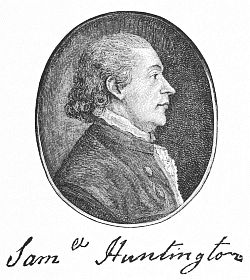 When four months’ pay of a private soldier would not buy a
single bushel of wheat for his family, and when he could not collect
even this pittance, while most of the time he went barefoot and
half-famished, it was not strange that he should sometimes feel
mutinous. The desertions to the British lines at this time averaged more
than a hundred a month. Ternay, the French admiral, wrote to Vergennes
that the fate of North America was as yet very uncertain, and the
Revolution by no means so far advanced as people in Europe supposed. The
accumulated evils of the time had greatly increased the number of
persons who, to save the remnant of their fortunes, were ready to see
peace purchased at any price. In August, before he had heard of the
disaster at Camden, Washington wrote to President Huntington, reminding
him that the term of service of half the army would expire at the end of
the year. “The shadow of an army that will remain,” said Washington,
“will have every motive except mere patriotism to abandon the service,
without the hope, which has hitherto supported them, of a change for the
better. This is almost extinguished now, and certainly will not outlive
the campaign unless it finds something more substantial to rest upon. To
me it will appear miraculous if our affairs can maintain themselves much
longer in their present train. If either the temper or the resources of
the country will not admit of an alteration, we may expect soon to be
reduced to the humiliating condition of seeing the cause of America in
America upheld by foreign arms.”
When four months’ pay of a private soldier would not buy a
single bushel of wheat for his family, and when he could not collect
even this pittance, while most of the time he went barefoot and
half-famished, it was not strange that he should sometimes feel
mutinous. The desertions to the British lines at this time averaged more
than a hundred a month. Ternay, the French admiral, wrote to Vergennes
that the fate of North America was as yet very uncertain, and the
Revolution by no means so far advanced as people in Europe supposed. The
accumulated evils of the time had greatly increased the number of
persons who, to save the remnant of their fortunes, were ready to see
peace purchased at any price. In August, before he had heard of the
disaster at Camden, Washington wrote to President Huntington, reminding
him that the term of service of half the army would expire at the end of
the year. “The shadow of an army that will remain,” said Washington,
“will have every motive except mere patriotism to abandon the service,
without the hope, which has hitherto supported them, of a change for the
better. This is almost extinguished now, and certainly will not outlive
the campaign unless it finds something more substantial to rest upon. To
me it will appear miraculous if our affairs can maintain themselves much
longer in their present train. If either the temper or the resources of
the country will not admit of an alteration, we may expect soon to be
reduced to the humiliating condition of seeing the cause of America in
America upheld by foreign arms.”
The French alliance
To appreciate the full force of this, we must remember that, except in
South Carolina, there had been no fighting worthy of mention during the
year.
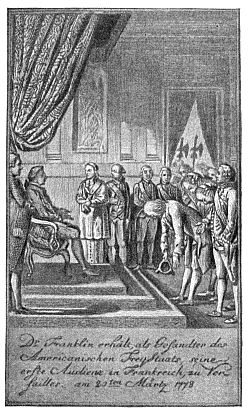
FRANKLIN BEFORE LOUIS XVI.The southern campaign absorbed the energies of the British to such
an extent that they did nothing whatever in the north but make an
unsuccessful attempt at invading New Jersey in June. While this fact
shows how severely the strength of England was taxed by the coalition
that had been formed against her, it shows even more forcibly how the
vitality of America had been sapped by causes that lay deeper down than
the mere presence of war. It was, indeed, becoming painfully apparent
that little was to be hoped save through the aid of France. The alliance
had thus far achieved but little that was immediately obvious to the
American people, but it had really been of enormous indirect benefit to
us. Both in itself and in the European complications to which it had
led, the action of France had very seriously crippled the efficient
military power of England. It locked up and neutralized much British
energy that would otherwise have been directed against the Americans.
The French government had also furnished Congress with large sums of
money. But as for any direct share in military enterprises on American
soil or in American waters, France had as yet done almost nothing. An
evil star had presided over both the joint expeditions for the recovery
of Newport and Savannah, and no French army had yet been landed on our
shores to cast in its lot with Washington’s brave Continentals in a
great and decisive campaign.
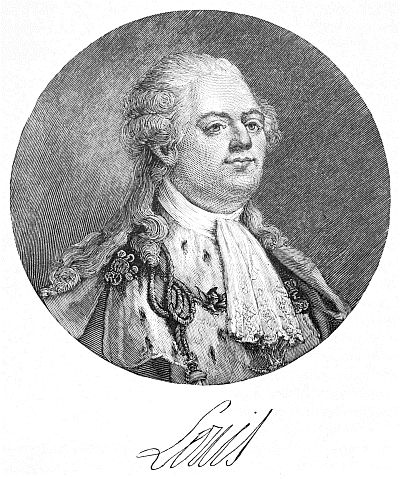
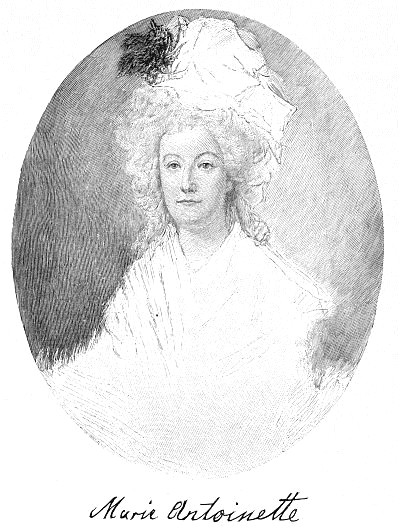
It had long been clear that France could in no way more effectively further the interests which she shared with the United States than by sending a strong force of trained soldiers to act under Washington’s command. Nothing could be more obvious than the inference that such a general, once provided with an adequate force, might drive the British from New York, and thus deal a blow which would go far toward ending the war. Lafayette’s visit to FranceThis had long been Washington’s most cherished scheme. In February, 1779, Lafayette had returned to France to visit his family, and to urge that aid of this sort might be granted. To chide him for his naughtiness in running away to America in defiance of the royal mandate, the king ordered him to be confined for a week at his father-in-law’s house in Paris. Then he received him quite graciously at court, while the queen begged him to “tell us good news of our dearly beloved Americans.” The good Lafayette, to whom, in the dreadful years that were to come, this dull king and his bright, unhappy queen were to look for compassionate protection, now ventured to give them some sensible words of advice. “The money that you spend on one of your old court balls,” he said, “would go far toward sending a serviceable army to America, and dealing England a blow where she would most feel it.” For several months he persisted in urging Vergennes to send over at least 12,000 men, with a good general, and to put them distinctly under Washington’s command, so that there might be no disastrous wrangling about precedence, and no repetition of such misunderstandings as had ruined the Newport campaign. When Estaing arrived at Paris, early in 1780, after his defeat at Savannah, he gave similar advice. The idea commended itself to Vergennes, and when, in April, 1780, Lafayette returned to the United States, he was authorized to inform Washington that France would soon send the desired reinforcement.
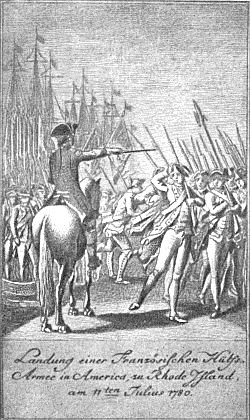
Arrival of part of the French auxiliary force under Rochambeau On the 10th of July, Admiral Ternay, with seven ships-of-the-line and three frigates, arrived at Newport, bringing with him a force of 6,000 men, commanded by a good general, Count Rochambeau. This was the first instalment of an army of which the remainder was to be sent as soon as adequate means of transport could be furnished. On the important question of military etiquette, Lafayette’s advice had been strictly heeded. Rochambeau was told to put himself under Washington’s command, and to consider his troops as part of the American army, while American officers were to take precedence of French officers of equal rank. This French army was excellent in discipline and equipment, and among its officers were some, such as the Duke de Lauzun-Biron and the Marquis de Chastellux, who had won high distinction. Rochambeau wrote to Vergennes that on his arrival he found the people of Rhode Island sad and discouraged. Everybody thought the country was going to the dogs. But when it was understood that this was but the advance guard of a considerable army and that France was this time in deadly earnest, their spirits rose, and the streets of Newport were noisy with hurrahs and brilliant with fireworks.
The hearts of the people, however, were still further to be sickened with hope deferred. Several British ships-of-the-line, arriving at New York, gave the enemy such a preponderance upon the water that Clinton resolved to take the offensive, and started down the Sound with 6,000 men to attack the French at Newport. Washington foiled this scheme by a sudden movement against New York, which obliged the British commander to fall back hastily for its defence; but the French fleet was nevertheless blockaded in Narragansett Bay by a powerful British squadron, and Rochambeau felt it necessary to keep his troops in Rhode Island to aid the admiral in case of such contingencies as might arise. The second instalment of the French army, on which their hopes had been built, never came, for a British fleet of thirty-two sail held it blockaded in the harbour of Brest.
General despondency The maritime supremacy of England thus continued to stand in the way of any great enterprise; and for a whole year the gallant army of Rochambeau was kept idle in Rhode Island, impatient and chafing under the restraint. The splendid work it was destined to perform under Washington’s leadership lay hidden in the darkness of the future, and for the moment the gloom which had overspread the country was only deepened. Three years had passed since the victory of Saratoga, but the vast consequences which were already flowing from that event had not yet disclosed their meaning. Looking only at the surface of things, it might well be asked—and many did ask—whether that great victory had really done anything more than to prolong a struggle which was essentially vain and hopeless. Such themes formed the burden of discourse at gentlemen’s dinner-tables and in the back parlours of country inns, where stout yeomen reviewed the situation of affairs through clouds of tobacco smoke; and never, perhaps, were the Tories more jubilant or the Whigs more crestfallen than at the close of this doleful summer.
It was just at this moment that the country was startled by the sudden disclosure of a scheme of blackest treason. For the proper explanation of this affair, a whole chapter will be required.
Arnold put in command of Philadelphia June 18, 1778 To understand the proximate causes of Arnold’s treason, we must start from the summer of 1778, when Philadelphia was evacuated by the British. On that occasion, as General Arnold was incapacitated for active service by the wound he had received at Saratoga, Washington placed him in command of Philadelphia. This step brought Arnold into direct contact with Congress, toward which he bore a fierce grudge for the slights it had put upon him; and, moreover, the command was in itself a difficult one. The authority vested in the commandant was not clearly demarcated from that which belonged to the state government, so that occasions for dispute were sure to be forthcoming. While the British had held the city many of the inhabitants had given them active aid and encouragement, and there was now more or less property to be confiscated. By a resolve of Congress, all public stores belonging to the enemy were to be appropriated for the use of the army, and the commander-in-chief was directed to suspend the sale or transfer of goods until the general question of ownership should have been determined by a joint committee of Congress and of the Executive Council of Pennsylvania. It became Arnold’s duty to carry out this order, which not only wrought serious disturbance to business, but made the city a hornet’s nest of bickerings and complaints. The qualities needed for dealing successfully with such an affair as this were very different from the qualities which had distinguished Arnold in the field. The utmost delicacy of tact was required, and Arnold was blunt and self-willed, and deficient in tact. He was accordingly soon at loggerheads with the state government, and lost, besides, much of the personal popularity with which he started. Stories were whispered about to his discredit. It was charged against Arnold that the extravagance of his style of living was an offence against republican simplicity, and a scandal in view of the distressed condition of the country; that in order to obtain the means of meeting his heavy expenses he resorted to peculation and extortion; and that he showed too much favour to the Tories. These charges were doubtless not without some foundation. This era of paper money and failing credit was an era of ostentatious expenditure, not altogether unlike that which, in later days, preceded the financial break-down of 1873. People in the towns lived extravagantly, and in no other town was this more conspicuous than in Philadelphia; while perhaps no one in Philadelphia kept a finer stable of horses or gave more costly dinners than General Arnold. He ran in debt, and engaged in commercial speculations to remedy the evil; and, in view of the light afterward thrown upon his character, it is not unlikely that he may have sometimes availed himself of his high position to aid these speculations.
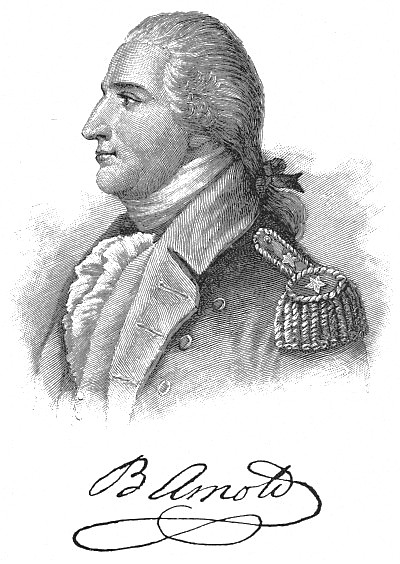
Miss Margaret Shippen The charge of favouring the Tories may find its explanation in a circumstance which possibly throws a side-light upon his lavish use of money. Miss Margaret Shippen, daughter of a gentleman of moderate Tory sympathies, who some years afterward became chief justice of Pennsylvania, was at that time the reigning belle of Philadelphia; and no sooner had the new commandant arrived at his post than he was taken captive by her piquant face and charming manner. The lady was scarcely twenty years old, while Arnold was a widower of thirty-five, with three sons; but his handsome face, his gallant bearing, and his splendid career outweighed these disadvantages, and in the autumn of 1778 he was betrothed to Miss Shippen, and thus entered into close relations with a prominent Tory family. In the moderate section of the Tory party, to which the Shippens belonged, there were many people who, while strongly opposed to the Declaration of Independence, would nevertheless have deemed it dishonourable to lend active aid to the enemy. Views of the moderate ToriesIn 1778, such people thought that Congress did wrong in making an alliance with France instead of accepting the liberal proposals of Lord North. The Declaration of Independence, they argued, would never have been made had it been supposed that the constitutional liberties of the American people could any otherwise be securely protected. Even Samuel Adams admitted this. In the war which had been undertaken in defence of these liberties, the affair of Saratoga had driven the British government to pledge itself to concede them once and forever. Then why not be magnanimous in the hour of triumph? Why not consider the victory of Saratoga as final, instead of subjecting the resources of the country to a terrible strain in the doubtful attempt to secure a result which, only three years before, even Washington himself had regarded as undesirable? Was it not unwise and unpatriotic to reject the overtures of our kinsmen, and cast in our lot with that Catholic and despotic power which had ever been our deadliest foe?
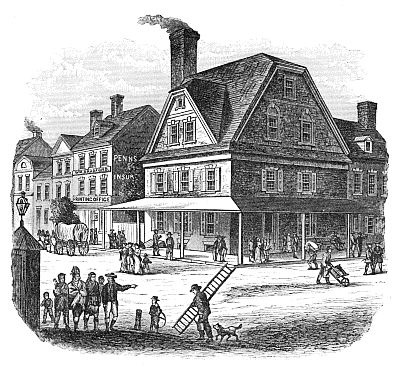
OLD LONDON COFFEE HOUSE, PHILADELPHIA
Arnold’s drift toward Toryism Such were the arguments to which Arnold must have listened again and again, during the summer and autumn of 1778. How far he may have been predisposed toward such views it would be impossible to say. He always declared himself disgusted with the French alliance,[32] and in this there is nothing improbable. But that, under the circumstances, he should gradually have drifted into the Tory position was, in a man of his temperament, almost inevitable. His nature was warm, impulsive, and easily impressible, while he was deficient in breadth of intelligence in rigorous moral conviction; and his opinions on public matters took their hue largely from his personal feelings. It was not surprising that such a man, in giving splendid entertainments, should invite to them the Tory friends of the lady whose favour he was courting. His course excited the wrath of the Whigs. General Reed wrote indignantly to General Greene that Arnold had actually given a party at which “not only common Tory ladies, but the wives and daughters of persons proscribed by the state, and now with the enemy at New York,” were present in considerable numbers. When twitted with such things, Arnold used to reply that it was the part of a true soldier to fight his enemies in the open field, but not to proscribe or persecute their wives and daughters in private life. But such an explanation naturally satisfied no one. His quarrels with the Executive Council, sharpened by such incidents as these, grew more and more violent, until when, in December, his most active enemy, Joseph Reed, became president of the Council, he suddenly made up his mind to resign his post and leave the army altogether. He makes up his mind to leave the armyHe would quit the turmoil of public affairs, obtain a grant of land in western New York, settle it with his old soldiers, with whom he had always been a favourite, and lead henceforth a life of Arcadian simplicity. In this mood he wrote to Schuyler, in words which to-day seem strange and sad, that his ambition was not so much to “shine in history” as to be “a good citizen;” and about the 1st of January, 1779, he set out for Albany to consult with the New York legislature about the desired land.
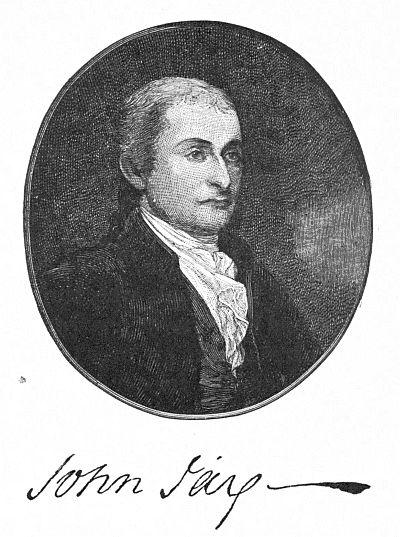
Arnold’s scheme was approved by John Jay, who was then president of the Continental Congress, as well as by several other men of influence, and in all likelihood it would have succeeded; but as he stopped for a day at Morristown, to visit Washington, a letter overtook him, with the information that as soon as his back had been turned upon Philadelphia he had been publicly attacked by President Reed and the Council. Charges are brought against him Jan., 1779Formal charges were brought against him: 1, of having improperly granted a pass for a ship to come into port; 2, of having once used some public wagons for the transportation of private property; 3, of having usurped the privilege of the Council in allowing people to enter the enemy’s lines; 4, of having illegally bought up a lawsuit over a prize vessel; 5, of having “imposed menial offices upon the sons of freemen” serving in the militia; and 6, of having made purchases for his private benefit at the time when, by his own order, all shops were shut. These charges were promulgated in a most extraordinary fashion. Not only were they laid before Congress, but copies of them were sent to the governors of all the states, accompanied by a circular letter from President Reed requesting the governors to communicate them to their respective legislatures. Arnold was naturally enraged at such an elaborate attempt to prepossess the public mind against him, but his first concern was for the possible effect it might have upon Miss Shippen. He instantly returned to Philadelphia, and demanded an investigation. He is acquitted by a committee of Congress in MarchHe had obtained Washington’s permission to resign his command, but deferred acting upon it till the inquiry should have ended. The charges were investigated by a committee of Congress, and about the middle of March this committee brought in a report stating that all the accusations were groundless, save the two which related to the use of the wagons and the irregular granting of a pass; and since in these instances there was no evidence of wrong intent, the committee recommended an unqualified verdict of acquittal. Arnold thereupon, considering himself vindicated, resigned his command. But Reed now represented to Congress that further testimony was forthcoming, and urged that the case should be reconsidered. Accordingly, instead of acting upon the report of its committee, Congress referred the matter anew to a joint committee of Congress and the Assembly and Council of Pennsylvania. The case is referred to a court-martial, April 3, 1779This joint committee shirked the matter by recommending that the case be referred to a court-martial, and this recommendation was adopted by Congress on the 3d of April. The vials of Arnold’s wrath were now full to overflowing; but he had no cause to complain of Miss Shippen, for their marriage took place in less than a week after this action of Congress. Washington, who sympathized with Arnold’s impatience, appointed the court-martial for the 1st of May, but the Council of Pennsylvania begged for more time to collect evidence. And thus, in one way and another, the summer and autumn were frittered away, so that the trial did not begin until the 19th of December. All this time Arnold kept clamouring for a speedy trial, and Washington did his best to soothe him while paying due heed to the representations of the Council.
First correspondence with Clinton In the excitement of this fierce controversy the Arcadian project seems to have been forgotten. Up to this point Arnold’s anger had been chiefly directed toward the authorities of Pennsylvania; but when Congress refused to act upon the report of its committee exonerating him from blame, he became incensed against the whole party which, as he said, had so ill requited his services. It is supposed to have been about that time, in April, 1779, that he wrote a letter to Sir Henry Clinton, in disguised handwriting and under the signature of “Gustavus,” describing himself as an American officer of high rank, who, through disgust at the French alliance and other recent proceedings of Congress, might perhaps be persuaded to go over to the British, provided he could be indemnified for any losses he might incur by so doing. The beginning of this correspondence—if this was really the time—coincided curiously with the date of Arnold’s marriage, but it is in the highest degree probable that down to the final catastrophe Mrs. Arnold knew nothing whatever of what was going on.[33] The correspondence was kept up at intervals, Sir Henry’s replies being written by Major John André, his adjutant-general, over the signature of “John Anderson.” Nothing seems to have been thought of at first beyond the personal desertion of Arnold to the enemy; the betrayal of a fortress was a later development of infamy. For the present, too, we may suppose that Arnold was merely playing with fire, while he awaited the result of the court-martial.
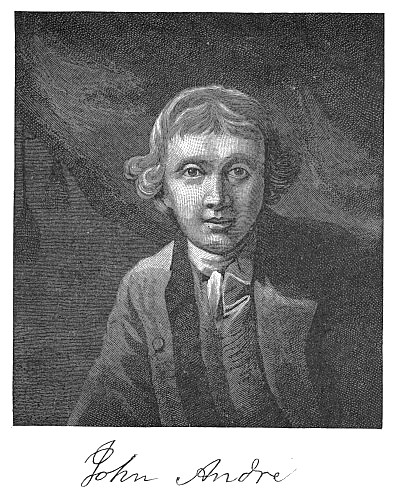
The court-martial acquits Arnold of all serious charges, but directs Washington to reprimand him for two very trivial ones, Jan. 26, 1780 The summer was not a happy one. His debts went on increasing, while his accounts with Congress remained unsettled, and he found it impossible to collect large sums that were due him. At last the court-martial met, and sat for five weeks. On the 26th of January, 1780, the verdict was rendered, and in substance it agreed exactly with that of the committee of Congress ten months before. Arnold was fully acquitted of all the charges which alleged dishonourable dealings. The pass which he had granted was irregular, and public wagons, which were standing idle, had once been used to remove private property that was in imminent danger from the enemy. The court exonerated Arnold of all intentional wrong, even in these venial matters, which it characterized as “imprudent;” but, as a sort of lame concession to the Council of Pennsylvania, it directed that he should receive a public reprimand from the commander-in-chief for his imprudence in the use of wagons, and for hurriedly giving a pass in which all due forms were not attended to. The decision of the court-martial was promptly confirmed by Congress, and Washington had no alternative but to issue the reprimand, which he couched in words as delicate and gracious as possible.[34]
Arnold thirsts for revenge upon Congress It was too late, however. The damage was done. Arnold had long felt persecuted and insulted. He had already dallied with temptation, and the poison was now working in his veins. His sense of public duty was utterly distorted by the keener sense of his private injuries. We may imagine him brooding over some memorable incidents in the careers of Monk, of the great Montrose and the greater Marlborough, until he persuaded himself that to change sides in a civil war was not so heinous a crime after all. Especially the example of Monk, which had already led Charles Lee to disgrace, seems to have riveted the attention of Arnold, although only the most shallow scrutiny could discover any resemblance between what the great English general had done and what Arnold purposed to do. There was not a more scrupulously honourable soldier in his day than George Monk. Arnold’s thoughts may have run somewhat as follows. He would not become an ordinary deserter, a villain on a small scale. He would not sell himself cheaply to the devil; but he would play as signal a part in his new career as he had played in the old one. He would overwhelm this blundering Congress, and triumphantly carry the country back to its old allegiance. To play such a part, however, would require the blackest treachery. Fancy George Monk, “honest old George,” asking for the command of a fortress in order to betray it to the enemy!
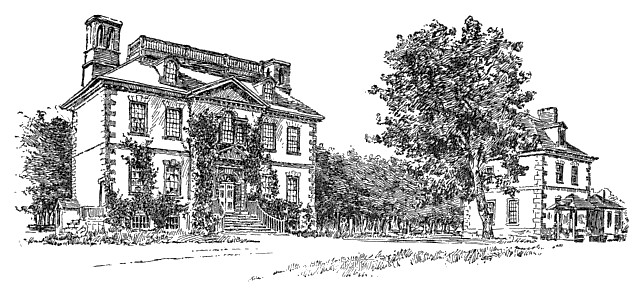
BENEDICT ARNOLD’S HOUSE AT PHILADELPHIA
When once Arnold had committed himself to this evil course, his story becomes a sickening one, lacking no element of horror, whether in its foul beginnings or in its wretched end. To play his new part properly, he must obtain an important command, and the place which obviously suggested itself was West Point.
Significance of West Point Since Burgoyne’s overthrow, Washington had built a chain of strong fortresses there, for he did not intend that the possession of the Hudson river should ever again be put in question, so far as fortifications could go. Could this cardinal position be delivered up to Clinton, the prize would be worth tenfold the recent triumphs at Charleston and Camden. It would be giving the British what Burgoyne had tried in vain to get; and now it was the hero of Saratoga who plotted to undo his own good work at the dictates of perverted ambition and unhallowed revenge.
Arnold put in command of West Point, July, 1780 To get possession of this stronghold, it was necessary to take advantage of the confidence with which his great commander had always honoured him. From Washington, in July, 1780, Arnold sought the command of West Point, alleging that his wounded leg still kept him unfit for service in the field; and Washington immediately put him in charge of this all-important post, thus giving him the strongest proof of unabated confidence and esteem which it was in his power to give; and among all the dark shades in Arnold’s treason, perhaps none seems darker than this personal treachery toward the man who had always trusted and defended him. What must the traitor’s feelings have been when he read the affectionate letters which Schuyler wrote him at this very time? In better days he had shown much generosity of nature. Can it be that this is the same man who on the field of Saratoga saved the life of the poor soldier who in honest fight had shot him and broken his leg? Such are the strange contrasts that we sometimes see in characters that are governed by impulse, and not by principle. Their virtue may be real enough while it lasts, but it does not weather the storm; and when once wrecked, the very same emotional nature by which alone it was supported often prompts to deeds of incredible wickedness.
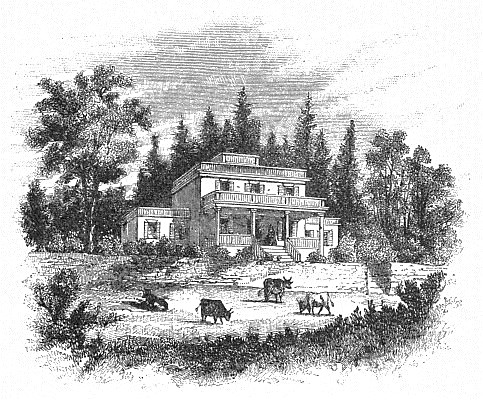
JOSHUA SMITH’S HOUSE, ON TREASON HILL
After taking command of West Point, the correspondence with André, carefully couched in such terms as to make it seem to refer to some commercial enterprise, was briskly kept up; and hints were let drop which convinced Sir Henry Clinton that the writer was Arnold, and the betrayal of the highland stronghold his purpose. Troops were accordingly embarked on the Hudson, and the flotilla was put in command of Admiral Rodney, who had looked in at New York on his way to the West Indies. To disguise the purpose of the embarkation, a rumour was industriously circulated that a force was to be sent southward to the Chesapeake. Secret interview between Arnold and André, Sept. 22To arrange some important details of the affair it seemed desirable that the two correspondents “Gustavus” and “John Anderson,” should meet, and talk over matters which could not safely be committed to paper. On the 18th of September, Washington, accompanied by Lafayette and Hamilton, set out for Hartford, for an interview with Rochambeau; and advantage was taken of his absence to arrange a meeting between the plotters. On the 20th André was taken up the river on the Vulture, sloop-of-war, and on the night of the 21st Arnold sent out a boat which brought him ashore about four miles below Stony Point. There in a thicket of fir-trees, under the veil of blackest midnight, the scheme was matured; but as gray dawn came on before all the details had been arranged, the boatmen became alarmed, and refused to take André back to the ship, and he was accordingly persuaded, though against his will, to accompany Arnold within the American lines. The two conspirators walked up the bank a couple of miles to the house of one Joshua Smith, a man of doubtful allegiance, who does not seem to have understood the nature and extent of the plot, or to have known who Arnold’s visitor was. It was thought that they might spend the day discussing the enterprise, and when it should have grown dark André could be rowed back to the Vulture.
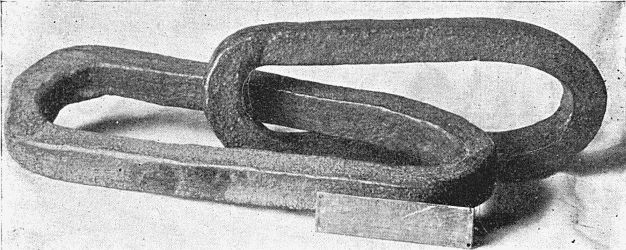
LINKS OF WEST POINT CHAIN
SCENE OF ARNOLD’S TREASON, 1780
The plot for surrendering West Point But now a quite unforeseen accident occurred. Colonel Livingston, commanding the works on the opposite side of the river, was provoked by the sight of a British ship standing so near; and he opened such a lively fire upon the Vulture that she was obliged to withdraw from the scene. As the conspirators were waiting in Smith’s house for breakfast to be served, they heard the booming of the guns, and André, rushing to the window, beheld with dismay the ship on whose presence so much depended dropping out of sight down the stream. On second thoughts, however, it was clear that she would not go far, as her commander had orders not to return to New York without André, and it was still thought that he might regain her. After breakfast he went to an upper chamber with Arnold, and several hours were spent in perfecting their plans. Immediately upon André’s return to New York, the force under Clinton and Rodney was to ascend the river. To obstruct the approach of a hostile flotilla, a massive chain lay stretched across the river, guarded by water batteries. Under pretence of repairs, one link was to be taken out for a few days, and supplied by a rope which a slight blow would tear away. The approach of the British was to be announced by a concerted system of signals, and the American forces were to be so distributed that they could be surrounded and captured in detail, until at the proper moment Arnold, taking advantage of the apparent defeat, was to surrender the works, with all the troops—3,000 in number—under his command. It was not unreasonably supposed that such a catastrophe, coming on the heels of Charleston and Camden and general bankruptcy, would put a stop to the war and lead to negotiations, in which Arnold, in view of such decisive service, might hope to play a leading part.
André takes compromising documentsWhen André set out on this perilous undertaking, Sir Henry Clinton specially warned him not to adopt any disguise or to carry any papers which might compromise his safety. But André disregarded the advice, and took from Arnold six papers, all but one of them in the traitor’s own handwriting, containing descriptions of the fortresses and information as to the disposition of the troops. Much risk might have been avoided by putting this information into cipher, or into a memorandum which would have been meaningless save to the parties concerned. But André may perhaps have doubted Arnold’s fidelity, and feared lest under a false pretence of treason he might be drawing the British away into a snare. The documents which he took, being in Arnold’s handwriting and unmistakable in their purport, were such as to put him in Clinton’s power, and compel him, for the sake of his own safety, to perform his part of the contract. André intended, before getting into the boat, to tie up these papers in a bundle loaded with a stone, to be dropped into the water in case of a sudden challenge; but in the mean time he put them where they could not so easily be got rid of, between his stockings and the soles of his feet. Arnold furnished the requisite passes for Smith and André to go either by boat or by land, and, having thus apparently provided for all contingencies, took leave before noon, and returned in his barge to his headquarters, ten miles up the stream. As evening approached, Smith, who seems to have been a man of unsteady nerves, refused to take André out to the Vulture. and is reluctantly persuaded to return to New York by land, Sept. 22He had been alarmed by the firing in the morning, and feared there would be more risk in trying to reach the ship than in travelling down to the British lines by land, and he promised to ride all night with André if he would go that way. The young officer reluctantly consented, and partially disguised himself in some of Smith’s clothes. At sundown the two crossed the river at King’s Ferry, and pursued their journey on horseback toward White Plains.
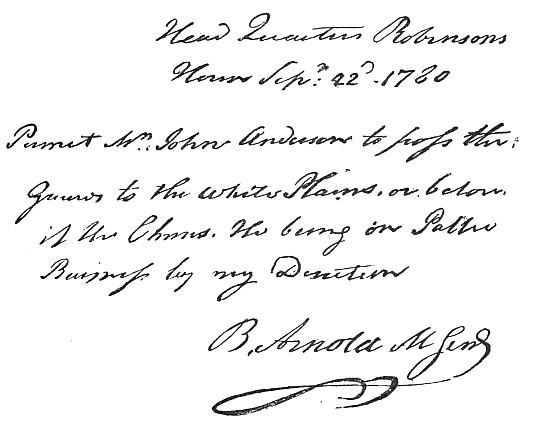
FACSIMILE OF ARNOLD’S PASS TO ANDRÉ
The roads infested by robbers The roads east of the Hudson, between the British and the American lines, were at this time infested by robbers, who committed their depredations under pretence of keeping up a partisan warfare. There were two sets of these scapegraces,—the “Cowboys,” or cattle-thieves, and the “Skinners,” who took everything they could find. These epithets, however, referred to the political complexion they chose to assume, rather than to any difference in their evil practices. The Skinners professed to be Whigs, and the Cowboys called themselves Tories; but in point of fact the two parties were alike political enemies to any farmer or wayfarer whose unprotected situation offered a prospect of booty; and though murder was not often committed, nobody’s property was safe. It was a striking instance of the demoralization wrought in a highly civilized part of the country through its having so long continued to be the actual seat of war. Rumours that the Cowboys were out in force made Smith afraid to continue the journey by night, and the impatient André was thus obliged to stop at a farmhouse with his timid companion. Rising before dawn, they kept on until they reached the Croton river, which marked the upper boundary of the neutral ground between the British and the American lines. Smith’s instructions had been, in case of adopting the land route, not to leave his charge before reaching White Plains; but he now became uneasy to return, and André, who was beginning to consider himself out of danger, was perhaps not unwilling to part with a comrade who annoyed him by his loquacious and inquisitive disposition. So Smith made his way back to headquarters, and informed Arnold that he had escorted “Mr. Anderson” within a few miles of the British lines, which he must doubtless by this time have reached in safety.
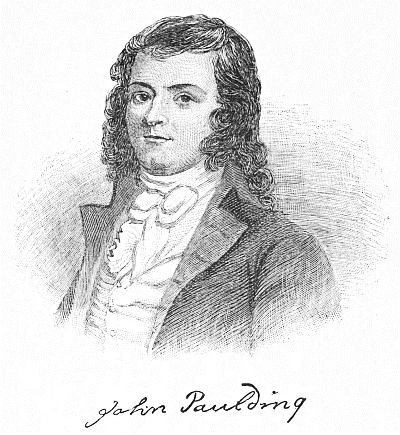
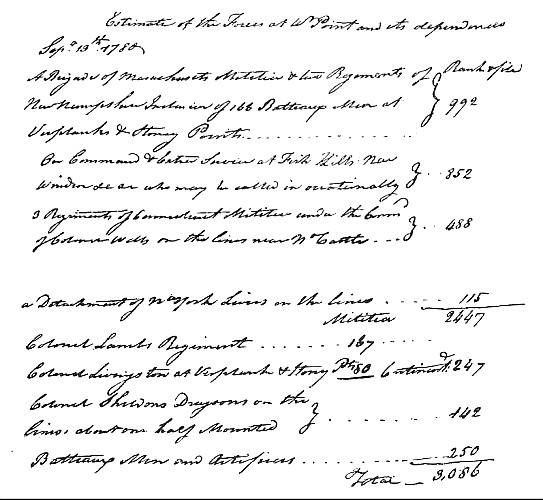
FACSIMILE OF ONE OF THE PAPERS FOUND IN ANDRÉ’S STOCKINGS
Arrest of André, Sept. 23 Meanwhile, André, left to himself, struck into the road which led through Tarrytown, expecting to meet no worse enemies than Cowboys, who would either respect a British officer, or, if bent on plunder, might be satisfied by his money and watch. But it happened that morning that a party of seven young men had come out to intercept some Cowboys who were expected up the road; and about nine o’clock, as André was approaching the creek above Tarrytown, a short distance from the far-famed Sleepy Hollow, he was suddenly confronted by three of this party, who sprang from the bushes and, with levelled muskets, ordered him to halt. These men had let several persons, with whose faces they were familiar, pass unquestioned; and if Smith, who was known to almost every one in that neighbourhood, had been with André, they too would doubtless have been allowed to pass. André was stopped because he was a stranger. One of these men happened to have on the coat of a Hessian soldier. Held by the belief that they must be Cowboys, or members of what was sometimes euphemistically termed the “lower party,” André expressed a hope that such was the case; and on being assured that it was so, his caution deserted him, and, with that sudden sense of relief which is apt to come after unwonted and prolonged constraint, he avowed himself a British officer, travelling on business of great importance. To his dismay, he now learned his mistake. John Paulding, the man in the Hessian coat, informed him that they were Americans, and ordered him to dismount. When he now showed them Arnold’s pass they disregarded it, and insisted upon searching him, until presently the six papers were discovered where he had hidden them. “By God, he is a spy!” exclaimed Paulding, as he looked over the papers. Threats and promises were of no avail. The young men, who were not to be bought or cajoled, took their prisoner twelve miles up the river, and delivered him into the hands of Colonel John Jameson, a Virginian officer, who commanded a cavalry outpost at North Castle. When Jameson looked over the papers, they seemed to him very extraordinary documents to be travelling toward New York in the stockings of a stranger who could give no satisfactory account of himself. Colonel Jameson’s perplexityBut so far from his suspecting Arnold of any complicity in the matter, he could think of nothing better than to send the prisoner straightway to Arnold himself, together with a brief letter in which he related what had happened. To the honest Jameson it seemed that this must be some foul ruse of the enemy, some device for stirring up suspicion in the camp,—something, at any rate, which could not too quickly be brought to his general’s notice. But the documents themselves he prudently sent by an express-rider to Washington, accompanying them with a similar letter of explanation. André, in charge of a military guard, had already proceeded some distance toward West Point when Jameson’s second in command, Major Benjamin Tallmadge, came in from some errand on which he had been engaged. On hearing what had happened, Tallmadge suspected that all was not right with Arnold, and insisted that André and the letter should be recalled. After a hurried discussion, Jameson sent out a party which brought André back; but he still thought it his duty to inform Arnold, and so the letter which saved the traitor’s life was allowed to proceed on its way.
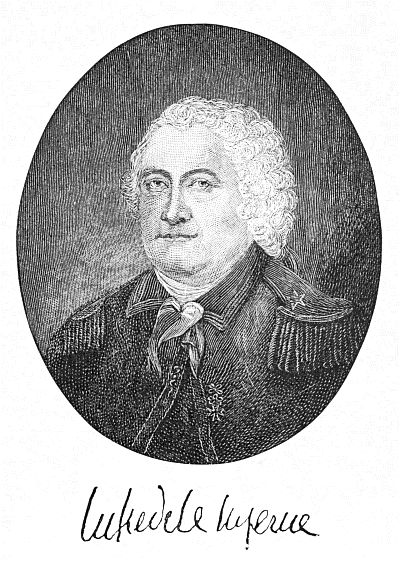
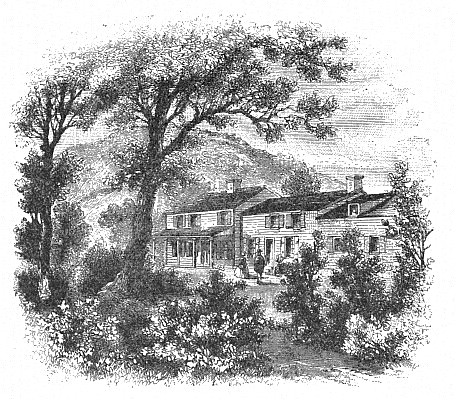
BEVERLY ROBINSON’S HOUSE
Washington returns from Hartford sooner than expected Now, if Washington had returned from Hartford by the route which it was supposed he would take, through Danbury and Peekskill, Arnold would not even thus have been saved. For some reason Washington returned two or three days sooner than had been expected; and, moreover, he chose a more northerly route, through Farmington and Litchfield, so that the messenger failed to meet him. It was on the evening of Saturday, the 23d, that Jameson’s two letters started. On Sunday afternoon Washington arrived at Fishkill, eighteen miles above West Point, and was just starting down the river road when he met Luzerne, the French minister, who was on his way to consult with Rochambeau. Wishing to have a talk with this gentleman, Washington turned back to the nearest inn, where they sat down to supper and chatted, all unconsciously, with the very Joshua Smith from whom André had parted at the Croton river on the morning of the day before. Word was sent to Arnold to expect the commander-in-chief and his suite to breakfast the next morning, and before daybreak of Monday they were galloping down the wooded road. As they approached the confiscated country house of the loyalist Beverly Robinson, where Arnold had his headquarters, opposite West Point, Washington turned his horse down toward the river, whereat Lafayette reminded him that they were late already, and ought not to keep Mrs. Arnold waiting. “Ah, marquis,” said Washington, laughing, “I know you young men are all in love with Mrs. Arnold: go and get your breakfast, and tell her not to wait for me.” Lafayette did not adopt the suggestion. He accompanied Washington and Knox while they rode down to examine some redoubts. Hamilton and the rest of the party kept on to the house, and sat down to breakfast in its cheerful wainscoted dining-room, with Arnold and his wife and several of his officers.
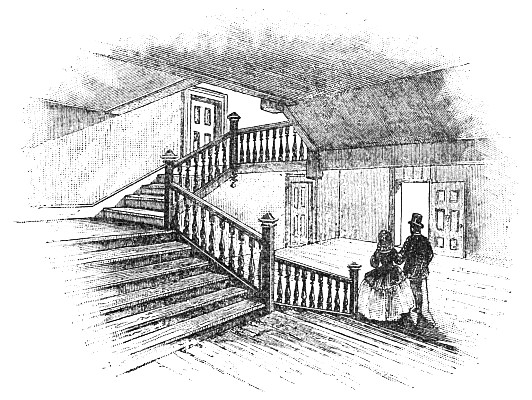
STAIRCASE IN ROBINSON’S HOUSE
Flight of Arnold, Sept. 25 As they sat at table, a courier entered, and handed to Arnold the letter in which Colonel Jameson informed him that one John Anderson had been taken with compromising documents in his possession, which had been forwarded to the commander-in-chief. With astonishing presence of mind, Arnold folded the letter and put it in his pocket, finished the remark which had been on his lips when the courier entered, and then, rising, said that he was suddenly called across the river to West Point, but would return to meet Washington without delay; and he ordered his barge to be manned. None of the officers observed anything unusual in his manner, but the quick eye of his wife detected something wrong, and as he left the room she excused herself and hurried after him. Going up to their bedroom, he told her that he was a ruined man and must fly for his life; and as she screamed and fainted in his arms, he laid her upon the bed, called in the maid to attend her, stooped to kiss his baby boy who was sleeping in the cradle, rushed down to the yard, leaped on a horse that was standing there, and galloped down a by-path to his barge. It had promptly occurred to his quick mind that the Vulture would still be waiting for André some miles down stream, and he told the oarsmen to row him thither without delay, as he must get back soon to meet Washington. A brisk row of eighteen miles brought them to the Vulture, whose commander was still wondering why André did not come back. From the cabin of the Vulture Arnold sent a letter to Washington, assuring him of Mrs. Arnold’s innocence, and begging that she might be allowed to return to her family in Philadelphia, or come to her husband, as she might choose. Then the ill-omened ship weighed anchor, and reached New York next morning.
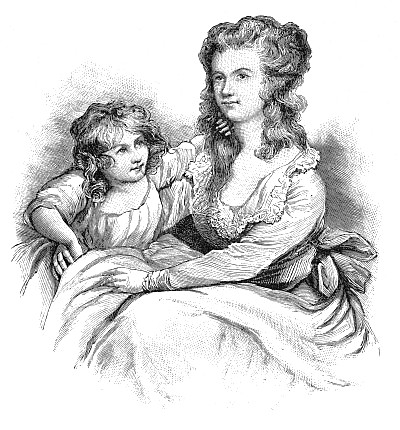
MRS. BENEDICT ARNOLD AND CHILD
Discovery of the treasonable plot Meanwhile, about noonday Washington came in for his breakfast, and, hearing that Arnold had crossed the river to West Point, soon hurried off to meet him there, followed by all his suite except Hamilton. As they were ferried across, no salute of cannon greeted them, and on landing they learned with astonishment that Arnold had not been there that morning; but no one as yet had a glimmer of suspicion. When they returned to Robinson’s house, about two o’clock, they found Hamilton walking up and down before the door in great excitement. Jameson’s courier had arrived, with the letters for Washington, which Hamilton had just opened and read. The commander and his aide went into the house, and together examined the papers, which, taken in connection with the traitor’s flight, but too plainly told the story. From Mrs. Arnold, who was in hysterics, Washington could learn nothing. He privately sent Hamilton and another aide in pursuit of the fugitive; and coming out to meet Lafayette and Knox, his voice choking and tears rolling down his cheeks, he exclaimed, “Arnold is a traitor, and has fled to the British! Whom can we trust now?” In a moment, however, he had regained his wonted composure. It was no time for giving way to emotion. It was as yet impossible to tell how far the scheme might have extended. Even now the enemy’s fleet might be ascending the river (as but for André’s capture it doubtless would have been doing that day), and an attack might be made before the morrow. Riding anxiously about the works, Washington soon detected the treacherous arrangements that had been made, and by seven in the evening he had done much to correct them and to make ready for an attack. As he was taking supper in the room which Arnold had so hastily quitted in the morning, the traitor’s letter from the Vulture was handed him. “Go to Mrs. Arnold,” said he quietly to one of his officers, “and tell her that though my duty required no means should be neglected to arrest General Arnold, I have great pleasure in acquainting her that he is now safe on board a British vessel.”
André taken to Tappan, Sept. 28 But while the principal criminal was safe it was far otherwise with the agent who had been employed in this perilous business. On Sunday, from his room in Jameson’s quarters, André had written a letter to Washington, pathetic in its frank simplicity, declaring his position in the British army, and telling his story without any attempt at evasion. From the first there could be no doubt as to the nature of his case, yet André for the moment did not fully comprehend it. On Thursday, the 28th, he was taken across the river to Tappan, where the main army was encamped. His escort, Major Tallmadge, was a graduate of Yale College and a classmate of Nathan Hale, whom General Howe had hanged as a spy four years before. Tallmadge had begun to feel a warm interest in André, and as they rode their horses side by side into Tappan, when his prisoner asked how his case would probably be regarded, Tallmadge’s countenance fell, and it was not until the question had been twice repeated that he replied by a gentle allusion to the fate of his lamented classmate. “But surely,” said poor André, “you do not consider his case and mine alike!” “They are precisely similar,” answered Tallmadge gravely, “and similar will be your fate.”
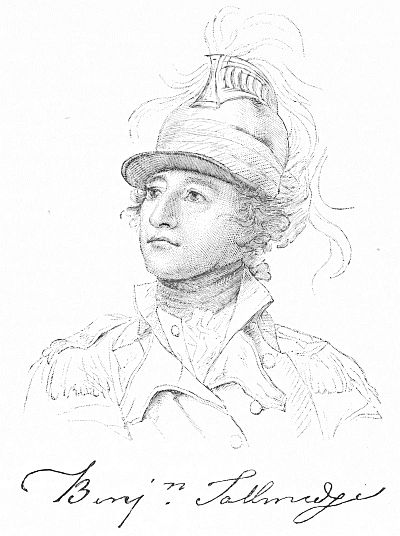
André’s trial and sentence, Sept. 29 Next day a military commission of fourteen generals was assembled, with Greene presiding, to sit in judgment on the unfortunate young officer. “It is impossible to save him,” said the kindly Steuben, who was one of the judges. “Would to God the wretch who has drawn him to his death might be made to suffer in his stead!” The opinion of the court was unanimous that André had acted as a spy, and incurred the penalty of death. Washington allowed a brief respite, that Sir Henry Clinton’s views might be considered. The British commander, in his sore distress over the danger of his young friend, could find no better grounds to allege in his defence than that he had, presumably, gone ashore under a flag of truce, and that when taken he certainly was travelling under the protection of a pass which Arnold, in the ordinary exercise of his authority, had a right to grant. But clearly these safeguards were vitiated by the treasonable purpose of the commander who granted them, and in availing himself of them André, who was privy to this treasonable purpose, took his life in his hands as completely as any ordinary spy would do. André himself had already candidly admitted before the court “that it was impossible for him to suppose that he came ashore under the sanction of a flag;” and Washington struck to the root of the matter, as he invariably did, in his letter to Clinton, where he said that André “was employed in the execution of measures very foreign to the objects of flags of truce, and such as they were never meant to authorize or countenance in the most distant degree.” The argument was conclusive, but it was not strange that the British general should have been slow to admit its force. He begged that the question might be submitted to an impartial committee, consisting of Knyphausen from the one army and Rochambeau from the other; but as no question had arisen which the military commission was not thoroughly competent to decide, Washington very properly refused to permit such an unusual proceeding. Lastly, Clinton asked that André might be exchanged for Christopher Gadsden, who had been taken in the capture of Charleston, and was then imprisoned at St. Augustine. At the same time, a letter from Arnold to Washington, with characteristic want of tact, hinting at retaliation upon the persons of sundry South Carolinian prisoners, was received with silent contempt.
Captain Ogden’s message, Sept. 30 There was a general feeling in the American army that if Arnold himself could be surrendered to justice, it might perhaps be well to set free the less guilty victim by an act of executive clemency; and Greene gave expression to this feeling in an interview with Lieutenant-General Robertson, whom Clinton sent up on Sunday, the 1st of October, to plead for André’s life. No such suggestion could be made in the form of an official proposal. Under no circumstances could Clinton be expected to betray the man from whose crime he had sought to profit, and who had now thrown himself upon him for protection. Nevertheless, in a roundabout way the suggestion was made. On Saturday, Captain Ogden, with an escort of twenty-five men and a flag of truce, was sent down to Paulus Hook with letters for Clinton, and he contrived to whisper to the commandant there that if in any way Arnold might be suffered to slip into the hands of the Americans André would be set free. It was Lafayette who had authorized Ogden to offer the suggestion, and so, apparently Washington must have connived at it; but Clinton of course refused to entertain the idea for a moment.[35] The conference between Greene and Robertson led to nothing. Execution of André, Oct. 2A petition from André, in which he begged to be shot rather than hanged, was duly considered and rejected; and, accordingly, on Monday, the 2d of October, the ninth day after his capture by the yeomen at Tarrytown, the adjutant-general of the British army was led to the gallows. His remains were buried near the spot where he suffered, but in 1821 they were disinterred and removed to Westminster Abbey.
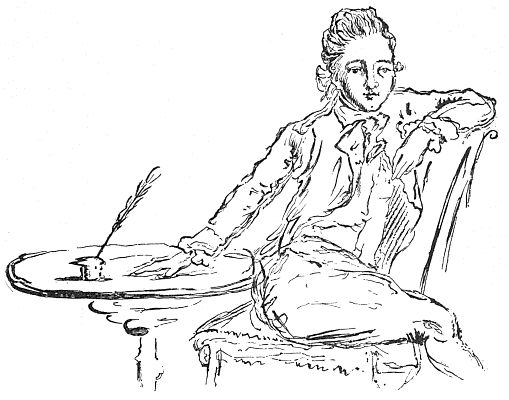
FACSIMILE OF SKETCH OF ANDRÉ BY HIMSELF
The fate of this gallant young officer has always called forth tender commiseration, due partly to his high position and his engaging personal qualities, but chiefly, no doubt, to the fact that, while he suffered the penalty of the law, the chief conspirator escaped. One does not easily get rid of a vague sense of injustice in this, but the injustice was not of man’s contriving. But for the remarkable series of accidents—if it be philosophical to call them so—resulting in André’s capture, the treason would very likely have been successful, and the cause of American independence might have been for the moment ruined. But for an equally remarkable series of accidents Arnold would not have received warning in time to escape. If both had been captured, both would probably have been hanged. Certainly both alike had incurred the penalty of death. It was not the fault of Washington or of the military commission that the chief offender went unpunished, and in no wise was André made a scapegoat for Arnold.
Lord Stanhope’s unconscious impudence It is right that we should feel pity for the fate of André; but it is unfortunate that pity should be permitted to cloud the judgment of the historian, as in the case of Lord Stanhope, who stands almost alone among competent writers in impugning the justice of André’s sentence. One remark of Lord Stanhope’s I am tempted to quote, as an amusing instance of that certain air of “condescension” which James Russell Lowell once observed in our British cousins. He seeks to throw discredit upon the military commission by gravely assuming that the American generals must, of course, have been ignorant men, “who had probably never so much as heard the names of Vattel or Puffendorf,” and, accordingly, “could be no fit judges on any nice or doubtful point” of military law. Now, of the twelve American generals who sat in judgment on André, at least seven were men of excellent education. Two of them had taken degrees at Harvard, and two at English universities. Greene, the president, a self-educated man, who used, in leisure moments, to read Latin poets by the light of his camp-fire, had paid especial attention to military law, and had carefully read and copiously annotated his copy of Vattel. The judgment of these twelve men agreed with that of the two educated Europeans, Steuben and Lafayette, who sat with them on the commission; and, moreover, no nice or intricate questions were raised.
There is no reason in the world why André should have been spared It was natural enough that André’s friends should make the most of the fact that when captured he was travelling under a pass granted by the commander of West Point; but to ask the court to accept such a plea was not introducing any nice or doubtful question; it was simply contending that “the wilful abuse of a privilege is entitled to the same respect as its legitimate exercise.” Accordingly, historians on both sides of the Atlantic have generally admitted the justice of Andre’s sentence, though sometimes its rigorous execution has been censured as an act of unnecessary severity. Yet if we withdraw our attention for a moment from the irrelevant fact that the British adjutant-general was an amiable and interesting young man, and concentrate it upon the essential fact that he had come within our lines to aid a treacherous commander in betraying his post, we cannot fail to see that there is no principle of military policy upon which ordinary spies are rigorously put to death which does not apply with redoubled force to the case of André. Moreover, while it is an undoubted fact that military morality permits, and sometimes applauds, such enterprises as that in which André lost his life, I cannot but feel that the flavour of treachery which clings about it must somewhat weaken the sympathy we should otherwise freely accord; and I find myself agreeing with the British historian, Mr. Massey, when he doubts “whether services of this character entitle his memory to the honours of Westminster Abbey.”
Captain Battersby’s story As for Arnold, his fall had been as terrible as that of Milton’s rebellious archangel, and we may well believe his state of mind to have been desperate. It was said that on hearing of Captain Ogden’s suggestion as to the only possible means of saving André, Arnold went to Clinton and offered to surrender himself as a ransom for his fellow-conspirator. This story was published in the London “Morning Herald” in February, 1782, by Captain Battersby, of the 29th regiment,—one of the “Sam Adams” regiments. Battersby was in New York in September, 1780, and was on terms of intimacy with members of Clinton’s staff. In the absence of further evidence, one must beware of attaching too much weight to such a story. Yet it is not inconsistent with what we know of Arnold’s impulsive nature. In the agony of his sudden overthrow it may well have seemed that there was nothing left to live for, and a death thus savouring of romantic self-sacrifice might serve to lighten the burden of his shame as nothing else could. Like many men of weak integrity, Arnold was over-sensitive to public opinion, and his treason, as he had planned it, though equally indefensible in point of morality, was something very different from what it seemed now that it was frustrated. It was not for this that he had bartered his soul to Satan. Arnold’s terrible downfallHe had aimed at an end so vast that, when once attained, it might be hoped that the nefarious means employed would be overlooked, and that in Arnold, the brilliant general who had restored America to her old allegiance, posterity would see the counterpart of that other general who, for bringing back Charles Stuart to his father’s throne, was rewarded with the dukedom of Albemarle. Now he had lost everything, and got nothing in exchange but £6,000 sterling and a brigadiership in the British army.[36] He had sold himself cheap, after all, and incurred such hatred and contempt that for a long time, by a righteous retribution, even his past services were forgotten. Even such weak creatures as Gates could now point the finger of scorn at him, while Washington, his steadfast friend, could never speak of him again without a shudder. From men less reticent than Washington strong words were heard. “What do you think of the damnable doings of that diabolical dog?” wrote Colonel Otho Williams with sturdy alliteration to Arnold’s old friend and fellow in the victory of Saratoga, Daniel Morgan. “Curse on his folly and perfidy,” said Greene, “how mortifying to think that he is a New Englander!” These were the men who could best appreciate the hard treatment Arnold had received from Congress. But in the frightful abyss of his crime all such considerations were instantly swallowed up and lost. No amount of personal wrong could for a moment excuse or even palliate such a false step as he had taken.
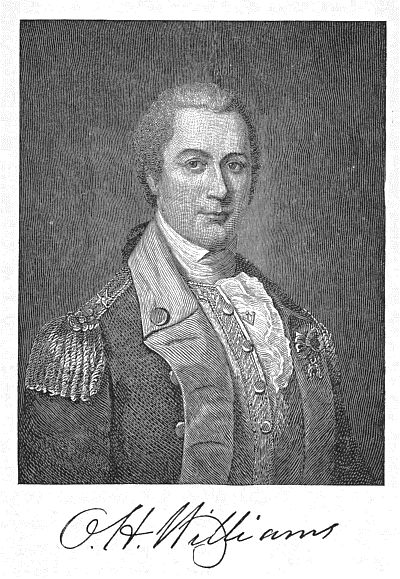
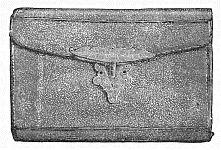
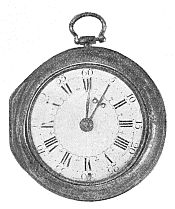
Within three months from the time when his treason was discovered, Arnold was sent by Sir Henry Clinton on a marauding expedition into Virginia, and in the course of one of his raids an American captain was taken prisoner. “What do you suppose my fate would be,” Arnold is said to have inquired, “if my misguided countrymen were to take me prisoner?” The captain’s reply was prompt and frank: “They would cut off the leg that was wounded at Quebec and Saratoga and bury it with the honours of war, and the rest of you they would hang on a gibbet.” After the close of the war, when Arnold, accompanied by his wife, made England his home, it is said that he sometimes had to encounter similar expressions of contempt. The Earl of Surrey once, seeing him in the gallery of the House of Commons, asked the Speaker to have him put out, that the House might not be contaminated by the presence of such a traitor. The story is not well authenticated; but it is certain that in 1792 the Earl of Lauderdale used such language about him in the House of Lords as to lead to a bloodless duel between Arnold and the noble earl. It does not appear, however, that Arnold was universally despised in England. Influenced by the political passions of the day, many persons were ready to judge him leniently; and his generous and affectionate nature won him many friends. It is said that so high-minded a man as Lord Cornwallis became attached to him, and always treated him with respect.
Arnold’s family Mrs. Arnold proved herself a devoted wife and mother;[37] and the record of her four sons, during long years of service in the British army, was highly honourable. The second son, Lieutenant-General Sir James Robertson Arnold, served with distinction in the wars against Napoleon. A grandson who was killed in the Crimean war was especially mentioned by Lord Raglan for valour and skill. Another grandson, the Rev. Edward Arnold, who died in 1887, was rector of Great Massingham, in Norfolk. The family has intermarried with the peerage, and has secured for itself an honourable place among the landed gentry of England. But the disgrace of their ancestor has always been keenly felt by them. At Surinam, in 1804, James Robertson Arnold, then a lieutenant, begged the privilege of leading a desperate forlorn hope, that he might redeem the family name from the odium which attached to it; and he acquitted himself in a way that was worthy of his father in the days of Quebec and Saratoga. All the family tradition goes to show that the last years of Benedict Arnold in London were years of bitter remorse and self-reproach. The great name which he had so gallantly won and so wretchedly lost left him no repose by night or day. The iron frame, which had withstood the fatigue of so many trying battlefields and still more trying marches through the wilderness, broke down at last under the slow torture of lost friendships and merited disgrace. His remorse and death, June 14, 1801In the last sad days in London, in June, 1801, the family tradition says that Arnold’s mind kept reverting to his old friendship with Washington. He had always carefully preserved the American uniform which he wore on the day when he made his escape to the Vulture; and now as, broken in spirit and weary of life, he felt the last moments coming, he called for this uniform and put it on, and decorated himself with the epaulettes and sword-knot which Washington had given him after the victory of Saratoga. “Let me die,” said he, “in this old uniform in which I fought my battles. May God forgive me for ever putting on any other!”
As we thus reach the end of one of the saddest episodes in American history, our sympathy cannot fail for the moment to go out toward the sufferer, nor can we help contrasting these passionate dying words with the last cynical scoff of that other traitor, Charles Lee, when he begged that he might not be buried within a mile of any church, as he did not wish to keep bad company after death. From beginning to end the story of Lee is little more than a vulgar melodrama; but into the story of Arnold there enters that element of awe and pity which, as Aristotle pointed out, is an essential part of real tragedy. That Arnold had been very shabbily treated, long before any thought of treason entered his mind, is not to be denied. That he may honestly have come to consider the American cause hopeless, that he may really have lost his interest in it because of the French alliance,—all this is quite possible. Such considerations might have justified him in resigning his commission; or even, had he openly and frankly gone over to the enemy, much as we should have deplored such a step, some persons would always have been found to judge him charitably, and accord him the credit of acting upon principle. But the dark and crooked course which he did choose left open no alternative but that of unqualified condemnation. If we feel less of contempt and more of sorrow in the case of Arnold than in the case of such a weakling as Charles Lee, our verdict is not the less unmitigated.[38] Arnold’s fall was by far the more terrible, as he fell from a greater height, and into a depth than which none could be lower. It is only fair that we should recall his services to the cause of American independence, which were unquestionably greater than those of any other man in the Continental army except Washington and Greene. But it is part of the natural penalty that attaches to backsliding such as his, that when we hear the name of Benedict Arnold these are not the things which it suggests to our minds, but the name stands, and will always stand, as a symbol of unfaithfulness to trust.
The enormity of Arnold’s conduct stands out in all the stronger relief when we contrast with it the behaviour of the common soldiers whose mutiny furnished the next serious obstacle with which Washington had to contend at this period of the war.
Mutiny of Pennsylvania troops, Jan. 1, 1781 In the autumn of 1780, owing to the financial and administrative chaos which had overtaken the country, the army was in a truly pitiable condition. The soldiers were clothed in rags and nearly starved, and many of them had not seen a dollar of pay since the beginning of the year. As the winter frosts came on there was much discontent, and the irritation was greatest among the soldiers of the Pennsylvania line who were encamped on the heights of Morristown. Many of these men had enlisted at the beginning of 1778, to serve “for three years or during the war;” but at that bright and hopeful period, just after the victory of Saratoga, nobody supposed that the war could last for three years more, and the alternative was inserted only to insure them against being kept in service for the full term of three years in spite of the cessation of hostilities. Now the three years had passed, the war was not ended, and the prospect seemed less hopeful than in 1778. The men felt that their contract was fulfilled and asked to be discharged. But the officers, unwilling to lose such disciplined troops, the veterans of Monmouth and Stony Point, insisted that the contract provided for three years’ service or more, in case the war should last longer; and they refused the requested discharge. On New Year’s Day, 1781, after an extra ration of grog, 1,300 Pennsylvania troops marched out of camp, in excellent order, under command of their sergeants, and seizing six field-pieces, set out for Philadelphia, with declared intent to frighten Congress and obtain redress for their wrongs. Their commander, General Wayne, for whom they entertained great respect and affection, was unable to stop them, and after an affray in which one man was killed and a dozen were wounded, they were perforce allowed to go on their way. Alarm guns were fired, couriers were sent to forewarn Congress and to notify Washington; and Wayne, attended by two colonels, galloped after the mutineers, to keep an eye upon them, and restrain their passions so far as possible. Washington could not come to attend to the affair in person, for the Hudson was not yet frozen and the enemy’s fleet was in readiness to ascend to West Point the instant he should leave his post. Congress sent out a committee from Philadelphia, accompanied by President Reed, to parley with the insurgents, who had halted at Princeton and were behaving themselves decorously, doing no harm to the people in person or property. They allowed Wayne and his colonels to come into their camp, but gave them to understand that they would take no orders from them. A sergeant-major acted as chief-commander, and his orders were implicitly obeyed. When Lafayette, with St. Clair and Laurens, came to them from Washington’s headquarters, they were politely but firmly told to go about their business. And so matters went on for a week. President Reed came as far as Trenton, and wrote to Wayne requesting an interview outside of Princeton, as he did not wish to come to the camp himself and run the risk of such indignity as that with which Washington’s officers had just been treated. As the troops assembled on parade Wayne read them this letter. Such a rebuke from the president of their native state touched these poor fellows in a sensitive point. Tears rolled down many a bronzed and haggard cheek. They stood about in little groups, talking and pondering and not half liking the business which they had undertaken.
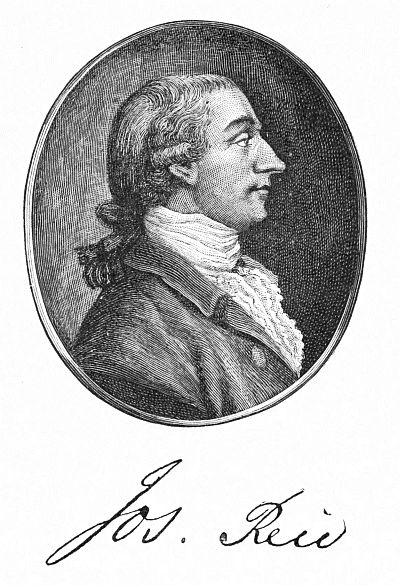
Fate of Clinton’s emissaries At this moment it was discovered that two emissaries from Sir Henry Clinton were in the camp, seeking to tamper with the sergeant-major, and promising high pay, with bounties and pensions, if they would come over to Paulus Hook or Staten Island and cast in their lot with the British. In a fury of wrath the tempters were seized and carried to Wayne to be dealt with as spies. “We will have General Clinton understand,” said the men, “that we are not Benedict Arnolds!” Encouraged by this incident, President Reed came to the camp next day, and was received with all due respect. He proposed at once to discharge all those who had enlisted for three years or the war, to furnish them at once with such clothing as they most needed, and to give paper certificates for the arrears of their pay, to be redeemed as soon as possible. These terms, which granted unconditionally all the demands of the insurgents, were instantly accepted. All those not included in the terms received six weeks’ furlough, and thus the whole force was dissolved. The two spies were tried by court-martial and promptly hanged.
Further mutiny suppressed The quickness with which the demands of these men were granted was an index to the alarm which their defection had excited; and Washington feared that their example would be followed by the soldiers of other states. On the 20th of January, indeed, a part of the New Jersey troops mutinied at Pompton, and declared their intention to do like the men of Pennsylvania. The case was becoming serious; it threatened the very existence of the army; and a sudden blow was needed. Washington sent from West Point a brigade of Massachusetts troops, which marched quickly to Pompton, surprised the mutineers before daybreak, and compelled them to lay down their arms without a struggle. Two of the ringleaders were summarily shot, and so the insurrection was quelled.
Thus the disastrous year which had begun when Clinton sailed against Charleston, the year which had witnessed the annihilation of two American armies and the bankruptcy of Congress, came at length to an end amid treason and mutiny. It had been the most dismal year of the war, and it was not strange that many Americans despaired of their country. Yet, as we have already seen, the resources of Great Britain, attacked as she was by the united fleets of France, Spain, and Holland, were scarcely less exhausted than those of the United States. The moment had come when a decided military success must turn the scale irrevocably the one way or the other; and events had already occurred at the South which were soon to show that all the disasters of 1780 were but the darkness that heralds the dawn.
In the invasion of the South by Cornwallis, as in the invasion of the North by Burgoyne, the first serious blow which the enemy received was dealt by the militia. After his great victory over Gates, Cornwallis remained nearly a month at Camden resting his troops, who found the August heat intolerable.
Cornwallis invades North Carolina, Sept., 1780 By the middle of September, 1780, he had started on his march to North Carolina, of which he expected to make an easy conquest. But his reception in that state was anything but hospitable. Advancing as far as Charlotte, he found himself in the midst of that famous Mecklenburg County which had issued its bold revolutionary resolves immediately on receiving the news of the battle of Lexington. These rebels, he said, were the most obstinate he had found in America, and he called their country a “hornet’s nest.” Bands of yeomanry lurking about every woodland road cut off his foraging parties, slew his couriers, and captured his dispatches. It was difficult for him to get any information; but bad news proverbially travels fast, and it was not long before he received intelligence of dire disaster.
Ferguson’s expedition Before leaving South Carolina Cornwallis had detached Major Patrick Ferguson—whom, next to Tarleton, he considered his best partisan officer—to scour the highlands and enlist as large a force of Tory auxiliaries as possible, after which he was to join the main army at Charlotte. Ferguson took with him 200 British light infantry and 1,000 Tories, whom he had drilled until they had become excellent troops. It was not supposed that he would meet with serious opposition, but in case of any unforeseen danger he was to retreat with all possible speed and join the main army. Now the enterprising Ferguson undertook to entrap and capture a small force of American partisans; and while pursuing this bait, he pushed into the wilderness as far as Gilbert Town, in the heart of what is now the county of Rutherford, when all at once he became aware that enemies were swarming about him on every side.Rising of the backwoodsmen The approach of a hostile force and the rumour of Indian war had aroused the hardy backwoodsmen who dwelt in these wild and romantic glens. Accustomed to Indian raids, these quick and resolute men were always ready to assemble at a moment’s warning; and now they came pouring from all directions, through the defiles of the Alleghanies, a picturesque and motley crowd, in fringed and tasselled hunting-shirts, with sprigs of hemlock in their hats, and armed with long knives and rifles that seldom missed their aim. From the south came James Williams, of Ninety-Six, with his 400 men; from the north, William Campbell, of Virginia, Benjamin Cleveland and Charles McDowell, of North Carolina, with 560 followers; from the west, Isaac Shelby and John Sevier, whose names were to become so famous in the early history of Kentucky and Tennessee. By the 30th of September 3,000 of these “dirty mongrels,” as Ferguson called them,—men in whose veins flowed the blood of Scottish Covenanters and French Huguenots and English sea rovers,[39]—had gathered in such threatening proximity that the British commander started in all haste on his retreat toward the main army at Charlotte, sending messengers ahead, who were duly waylaid and shot down before they could reach Cornwallis and inform him of the danger. The pursuit was vigorously pressed, and on the night of the 6th of October, finding escape impossible without a fight, Ferguson planted himself on the top of King’s Mountain, a ridge about half a mile in length and 1,700 feet above sea level, situated just on the border line between the two Carolinas. The crest is approached on three sides by rising ground, above which the steep summit towers for a hundred feet; on the north side it is an unbroken precipice. The mountain was covered with tall pine-trees, beneath which the ground, though little cumbered with underbrush, was obstructed on every side by huge moss-grown boulders. Perched with 1,125 staunch men on this natural stronghold, as the bright autumn sun came up on the morning of the 7th, Ferguson looked about him exultingly, and cried, “Well, boys, here is a place from which all the rebels outside of hell cannot drive us!”
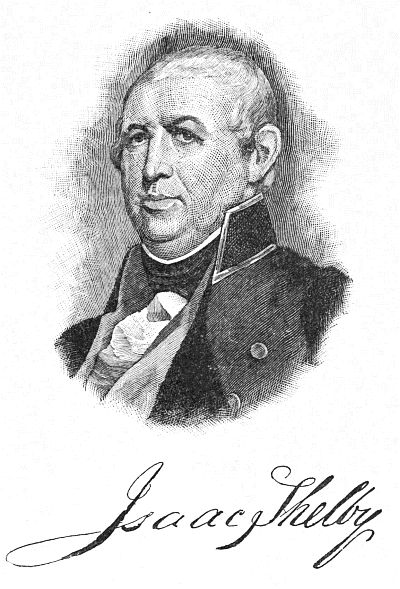
Battle of King’s Mountain, Oct. 7, 1780 He was dealing, however, with men who were used to climbing hills. About three o’clock in the afternoon, the advanced party of Americans, 1,000 picked men, arrived in the ravine below the mountain, and, tying their horses to the trees, prepared to storm the position. The precipice on the north was too steep for the enemy to descend, and thus effectually cut off their retreat. Divided into three equal parties, the Americans ascended the other three sides simultaneously. Campbell and Shelby pushed up in front until near the crest, when Ferguson opened fire on them. They then fell apart behind trees, returning the fire most effectively, but suffering little themselves, while slowly they crept up nearer the crest. As the British then charged down upon them with bayonets, they fell back, until the British ranks were suddenly shaken by a deadly flank fire from the division of Sevier and McDowell on the right. Turning furiously to meet these new assailants, the British received a volley in their backs from the left division, under Cleveland and Williams, while the centre division promptly rallied, and attacked them on what was now their flank. Thus dreadfully entrapped, the British fired wildly and with little effect, while the trees and boulders prevented the compactness needful for a bayonet charge. The Americans, on the other hand, sure of their prey, crept on steadily toward the summit, losing scarcely a man, and firing with great deliberateness and precision, while hardly a word was spoken. As they closed in upon the ridge, a rifleball pierced the brave Ferguson’s heart, and he fell from his white horse, which sprang wildly down the mountain side. All further resistance being hopeless, a white flag was raised, and the firing was stopped. Of Ferguson’s 1,125 men, 389 were killed or wounded, 20 were missing, and the remaining 716 now surrendered themselves prisoners of war, with 1,500 stand of arms. The total American loss was 28 killed and 60 wounded; but among the killed was the famous partisan commander, James Williams, whose loss might be regarded as offsetting that of Major Ferguson.
VIEW OF KING’S MOUNTAIN
Effect of the blow This brilliant victory at King’s Mountain resembled the victory at Bennington in its suddenness and completeness, as well as in having been gained by militia. It was also the harbinger of greater victories at the South, as Bennington had been the harbinger of greater victories at the North. The backwoodsmen who had dealt such a blow did not, indeed, follow it up, and hover about the flanks of Cornwallis, as the Green Mountain boys had hovered about the flanks of Burgoyne. Had there been an organized army opposed to Cornwallis, to serve as a nucleus for them, perhaps they might have done so. As it was, they soon dispersed and returned to their homes, after having sullied their triumph by hanging a dozen prisoners, in revenge for some of their own party who had been massacred at Augusta. They had, nevertheless, warded off for the moment the threatened invasion of North Carolina. Thoroughly alarmed by this blow, Cornwallis lost no time in falling back upon Winnsborough, there to wait for reinforcements, for he was in no condition to afford the loss of 1,100 men. General Leslie had been sent by Sir Henry Clinton to Virginia with 3,000 men, and Cornwallis ordered this force to join him without delay.
Arrival of Daniel Morgan Hope began now to return to the patriots of South Carolina, and during the months of October and November their activity was greatly increased. Marion in the northeastern part of the state, and Sumter in the northwest, redoubled their energies, and it was more than even Tarleton could do to look after them both. On the 20th of November Tarleton was defeated by Sumter in a sharp action at Blackstock Hill, and the disgrace of the 18th of August was thus wiped out. On the retreat of Cornwallis, the remnants of the American regular army, which Gates had been slowly collecting at Hillsborough, advanced and occupied Charlotte. There were scarcely 1,400 of them, all told, and their condition was forlorn enough. But reinforcements from the North were at hand; and first of all came Daniel Morgan, always a host in himself. Morgan, like Arnold, had been ill treated by Congress. His services at Quebec and Saratoga had been inferior only to Arnold’s, yet, in 1779, he had seen junior officers promoted over his head, and had resigned his commission and retired to his home in Virginia. When Gates took command of the southern army, Morgan was urged to enter the service again; but, as it was not proposed to restore him to his relative rank, he refused. After Camden, however, declaring that it was no time to let personal considerations have any weight, he straightway came down and joined Gates at Hillsborough in September. At last, on the 13th of October, Congress had the good sense to give him the rank to which he was entitled; and it was not long, as we shall see, before it had reason to congratulate itself upon this act of justice.
Greene appointed to the chief command at the South But, more than anything else, the army which it was now sought to restore needed a new commander-in-chief. It was well known that Washington had wished to have Greene appointed to that position, in the first place. Congress had persisted in appointing its own favourite instead, and had lost an army in consequence. It could now hardly do better, though late in the day, than take Washington’s advice. It would not do to run the risk of another Camden. In every campaign since the beginning of the war Greene had been Washington’s right arm; and for indefatigable industry, for strength and breadth of intelligence, and for unselfish devotion to the public service, he was scarcely inferior to the commander-in-chief. Yet he too had been repeatedly insulted and abused by men who liked to strike at Washington through his favourite officers. As quartermaster-general, since the spring of 1778, Greene had been malevolently persecuted by a party in Congress, until, in July, 1780, his patience gave way, and he resigned in disgust. His enemies seized the occasion to urge his dismissal from the army, and but for his own keen sense of public duty and Washington’s unfailing tact his services might have been lost to the country at a most critical moment. On the 5th of October Congress called upon Washington to name a successor to Gates, and he immediately appointed Greene, who arrived at Charlotte and took command on the 2d of December. Steuben accompanied Greene as far as Virginia, and was placed in command in that state, charged with the duty of collecting and forwarding supplies and reinforcements to Greene, and of warding off the forces which Sir Henry Clinton sent to the Chesapeake to make diversions in aid of Cornwallis. The first force of this sort, under General Leslie, had just been obliged to proceed by sea to South Carolina, to make good the loss inflicted upon Cornwallis by the battle of King’s Mountain; and to replace Leslie in Virginia, Sir Henry Clinton, in December, sent the traitor Arnold, fresh from the scene of his treason, with 1,600 men, mostly New York loyalists. Steuben’s duty was to guard Virginia against Arnold, and to keep open Greene’s communication with the North. At the same time, Washington sent down with Greene the engineer Kosciuszko and Henry Lee with his admirable legion of cavalry. Another superb cavalry commander now appears for the first time upon the scene in the person of Lieutenant-Colonel William Washington, of Virginia, a distant cousin of the commander-in-chief.
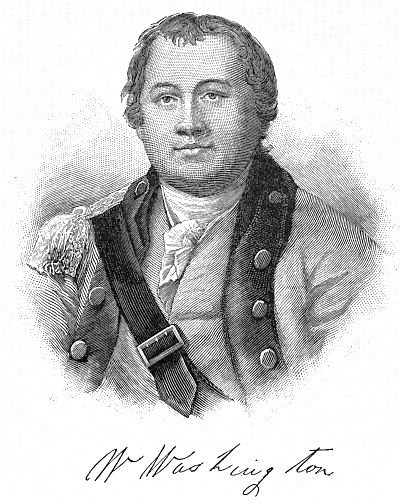
Greene’s daring strategy; he threatens Cornwallis on both flanks The southern army, though weak in numbers, was thus extraordinarily strong in the talent of its officers. They were men who knew how to accomplish great results with small means, and Greene understood how far he might rely upon them. No sooner had he taken command than he began a series of movements which, though daring in the extreme, were as far as possible from partaking of the unreasoned rashness which had characterized the advance of Gates. That unintelligent commander had sneered at cavalry as useless, but Greene largely based his plan of operations upon what could be done by such swift blows as Washington and Lee knew how to deal. Gates had despised the aid of partisan chiefs, but Greene saw at once the importance of utilizing such men as Sumter and Marion. His army as a solid whole was too weak to cope with that of Cornwallis. By a bold and happy thought, he divided it, for the moment, into two great partisan bodies. The larger body, 1,100 strong, he led in person to Cheraw Hill, on the Pedee river, where he coöperated with Marion. From this point Marion and Lee kept up a series of rapid movements which threatened Cornwallis’s communications with the coast. On one occasion, they actually galloped into Georgetown and captured the commander of that post. Cornwallis was thus gravely annoyed, but he was unable to advance upon these provoking antagonists without risking the loss of Augusta and Ninety-Six; for Greene had thrown the other part of his little army, 900 strong, under Morgan, to the westward, so as to threaten those important inland posts and to coöperate with the mountain militia. With Morgan’s force went William Washington, who accomplished a brilliant raid, penetrating the enemy’s lines, and destroying a party of 250 men at a single blow.
![Portrait: Banastre Tarleton [illegible]](images/page2265.jpg)
Cornwallis retorts by sending Tarleton to deal with Morgan Thus worried and menaced upon both his flanks, Cornwallis hardly knew which way to turn. He did not underrate his adversaries. He had himself seen what sort of man Greene was, at Princeton and Brandywine and Germantown, while Morgan’s abilities were equally well known. He could not leave Morgan and attack Greene without losing his hold upon the interior; but if he were to advance in full force upon Morgan, the wily Greene would be sure to pounce upon Charleston and cut him off from the coast. In this dilemma, Cornwallis at last decided to divide his own forces. With his main body, 2,000 strong, he advanced into North Carolina, hoping to draw Greene after him; while he sent Tarleton with the rest of his army, 1,100 strong, to take care of Morgan. By this division the superiority of the British force was to some extent neutralized. Both commanders were playing a skilful but hazardous game, in which much depended on the sagacity of their lieutenants; and now the brave but over-confident Tarleton was outmarched and outfought. On his approach, Morgan retreated to a grazing ground known as the Cowpens, a few miles from King’s Mountain, where he could fight on ground of his own choosing. His choice was indeed a peculiar one, for he had a broad river in his rear, which cut off retreat; but this, he said, was just what he wanted, for his militia would know that there was no use in running away. Morgan’s position at the CowpensIt was cheaper than stationing regulars in the rear, to shoot down the cowards. Morgan’s daring was justified by the result. The ground, a long rising slope, commanded the enemy’s approach for a great distance. On the morning of January 17, 1781, as Tarleton’s advance was descried, Morgan formed his men in order of battle. First he arranged his Carolinian and Georgian militia in a line about three hundred yards in length, and exhorted them not to give way until they should have delivered at least two volleys “at killing distance.” One hundred and fifty yards in the rear of this line, and along the brow of the gentle hill, he stationed the splendid Maryland brigade which Kalb had led at Camden, and supported it by some excellent Virginia troops. Still one hundred and fifty yards farther back, upon a second rising ground, he placed Colonel Washington with his cavalry. Arranged in this wise, the army awaited the British attack.
Battle of the Cowpens, Jan. 17, 1781 Tarleton’s men had been toiling half the night over muddy roads and wading through swollen brooks, but nothing could restrain his eagerness to strike a sudden blow, and just about sunrise he charged upon the first American line. The militia, who were commanded by the redoubtable Pickens, behaved very well, and delivered, not two, but many deadly volleys at close range, causing the British lines to waver for a moment. As the British recovered themselves and pressed on, the militia retired behind the line of Continentals; while the British line, in pursuing, became so extended as to threaten the flanks of the Continental line. To avoid being overlapped, the Continentals refused their right wing and fell back a little. The British followed them hastily and in some confusion, having become too confident of victory. At this moment, Colonel Washington, having swept down from his hill in a semicircle, charged the British right flank with fatal effect; Pickens’s militia, who had reformed in the rear and marched around the hill, advanced upon their left flank; while the Continentals, in front, broke their ranks with a deadly fire at thirty yards, and instantly rushed upon them with the bayonet. Destruction of Tarleton’s forceThe greater part of the British army thereupon threw down their arms and surrendered, while the rest were scattered in flight. It was a complete rout. The British lost 230 in killed and wounded, 600 prisoners, two field-pieces, and 1,000 stand of arms. Their loss was about equal to the whole American force engaged. Only 270 escaped from the field, among them Tarleton, who barely saved himself in a furious single combat with Washington. The American loss, in this astonishing little battle, was 12 killed and 61 wounded. In point of tactics, it was the most brilliant battle of the war. Morgan had in him the divine spark of genius.
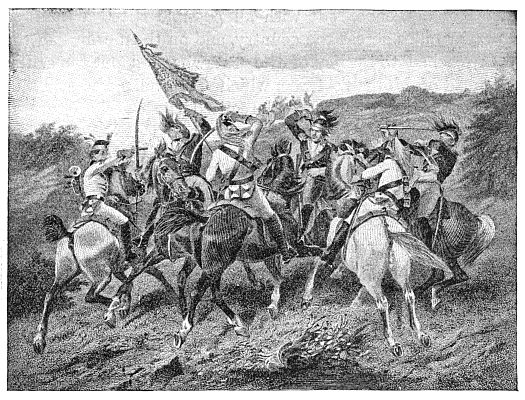
BATTLE OF COWPENS: COMBAT BETWEEN COLS. WASHINGTON AND TARLETON
Brilliant movements of Morgan and Greene Having struck this crushing blow, which deprived Cornwallis of one third of his force, the victor did not rest for a moment. The only direct road by which he could rejoin Greene lay to the northward, across the fords of the Catawba river, and Cornwallis was at this instant nearer than himself to these fords. By a superb march, Morgan reached the river first, and, crossing it, kept on northeastward into North Carolina, with Cornwallis following closely upon his heels. On the 24th of January, one week after the battle of the Cowpens, the news of it reached Greene in his camp on the Pedee, and he learned the nature of Morgan’s movements after the battle. Now was the time for putting into execution a hopeful scheme. If he could draw the British general far enough to the northward, he might compel him to join battle under disadvantageous circumstances and at a great distance from his base of operations. Accordingly, Greene put his main army in motion under General Huger, telling him to push steadily to the northward; while he himself, taking only a sergeant’s guard of dragoons, rode with all possible speed a hundred and fifty miles across the country, and on the morning of the 30th reached the valley of the Catawba, and put himself at the head of Morgan’s force, which Cornwallis was still pursuing. Now the gallant earl realized the deadly nature of the blows which at King’s Mountain and the Cowpens had swept away nearly all his light troops. Greene leads Cornwallis a chase across North CarolinaIn his eagerness and mortification, he was led to destroy the heavy baggage which encumbered his headlong march. He was falling into the trap. A most exciting game of strategy was kept up for the next ten days; Greene steadily pushing northeastward on a line converging toward that taken by his main army, Cornwallis vainly trying to get near enough to compel him to fight. The weather had been rainy, and an interesting feature of the retreat was the swelling of the rivers, which rendered them unfordable. Greene took advantage of this circumstance, having with admirable forethought provided himself with boats, which were dragged overland on light wheels and speedily launched as they came to a river; carrying as part of their freight the wheels upon which they were again to be mounted so soon as they should have crossed. On the 9th of February Greene reached Guilford Court House, in the northern part of North Carolina, only thirty miles from the Virginia border; and there he effected a junction with the main army, which Huger had brought up from the camp on the Pedee. On the next day, the gallant Morgan, broken down by illness, was obliged to give up his command.
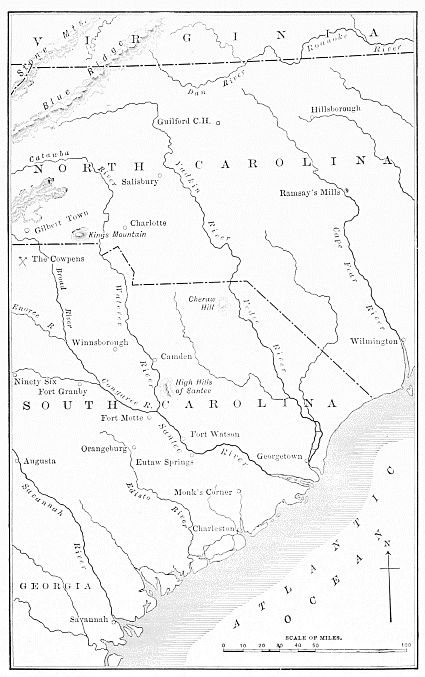
OPERATIONS IN THE CAROLINAS, JANUARY TO SEPTEMBER, 1781.
Further manœuvres It had not been a part of Greene’s plan to retreat any farther. He had intended to offer battle at this point, and had sent word to Steuben to forward reinforcements from Virginia for this purpose. But Arnold’s invasion of Virginia had so far taxed the good baron’s resources that he had not yet been able to send on the reinforcements; and as Greene’s force was still inferior to the enemy’s, he decided to continue his retreat. After five days of fencing, he placed his army on the north side of the Dan, a broad and rapid stream, which Cornwallis had no means of crossing. Thus baulked of his prey, the earl proceeded to Hillsborough, and issued a proclamation announcing that he had conquered North Carolina, and inviting the loyalists to rally around his standard. A few Tories came out and enlisted, but these proceedings were soon checked by the news that the American general had recrossed the river, and was advancing in a threatening manner. Greene had intended to await his reinforcements on the Virginia side of the river, but he soon saw that it would not do to encourage the Tories by the belief that he had abandoned North Carolina. On the 23d he recrossed the Dan, and led Cornwallis a will-o’-the-wisp chase, marching and countermarching, and foiling every attempt to bring him to bay, until, on the 14th of March, having at last been reinforced till his army numbered about 1,500 Continentals and 1,800 militia, he suddenly pulled up at Guilford Court House, and offered his adversary the long-coveted battle. Cornwallis’s veterans numbered scarcely 2,200, but a battle had come to be for him an absolute military necessity. He had risked everything in this long march, and could not maintain himself in an exposed position, so far from support, without inflicting a crushing defeat upon his opponent. To Greene a battle was now almost equally desirable, but it need not necessarily be an out-and-out victory: it was enough that he should seriously weaken and damage the enemy.
Battle of Guilford, March 15 On the morning of March 15th Greene drew up his army in three lines. The first, consisting of North Carolina militia, was placed in front of an open cornfield. It was expected that these men would give way before the onset of the British regulars; but it was thought that they could be depended upon to fire two or three volleys first, and, as they were excellent marksmen, this would make gaps in the British line. In a wood three hundred yards behind stood the second line, consisting of Virginia militia, whose fire was expected still further to impede the enemy’s advance. On a hill four hundred yards in the rear of these were stationed the regulars of Maryland and Virginia. The flanks were guarded by Campbell’s riflemen and the cavalry under Washington and Lee. Early in the afternoon the British opened the battle by a charge upon the North Carolina militia, who were soon driven from the field in confusion. The Virginia line, however, stood its ground bravely, and it was only after a desperate struggle that the enemy slowly pushed it back. The attack upon the third American line met with varied fortunes. On the right the Maryland troops prevailed, and drove the British at the point of the bayonet; but on the left the other Maryland brigade was overpowered and forced back, with the loss of two cannon. A charge by Colonel Washington’s cavalry restored the day, the cannon were retaken, and for a while the victory seemed secured for the Americans. Cornwallis was thrown upon the defensive, but after two hours of hard fighting he succeeded in restoring order among his men and concentrating them upon the hill near the court house, where all attempts to break their line proved futile. As evening came on, Greene retired, with a loss of more than 600 men, leaving the enemy in possession of the field, but too badly crippled to move. The British fighting was magnificent,—worthy to be compared with that of Thomas and his men at Chickamauga.[40] In the course of five hours they had lost at least 600 men, more than one fourth of their number. This damage was irretrievable. The little army, thus cut down to a total of scarcely 1,600 men, although victorious, could not afford to risk another battle. Greene’s audacious scheme was thus crowned with success. He had lured Cornwallis far into a hostile country, more than two hundred miles distant from his base of operations. Retreat of CornwallisThe earl now saw too late that he had been outgeneralled. To march back to South Carolina was more than he dared to venture, and he could not stay where he was. Accordingly, on the third day after the battle of Guilford, abandoning his wounded, Cornwallis started in all haste for Wilmington, the nearest point on the coast at which he could look for aid from the fleet.[41]
He abandons the Carolinas, and marches into Virginia By this movement Lord Cornwallis virtually gave up the game. The battle of Guilford, though tactically a defeat for the Americans, was strategically a decisive victory, and the most important one since the capture of Burgoyne. Its full significance was soon made apparent. When Cornwallis, on the 7th of April, arrived at Wilmington, what was he to do next? To transport his army by sea to Charleston, and thus begin his work over again, would be an open confession of defeat. The most practicable course appeared to be to shift the scene altogether, and march into Virginia, where a fresh opportunity seemed to present itself. Sir Henry Clinton had just sent General Phillips down to Virginia, with a force which, if combined with that of Cornwallis, would amount to more than 5,000 men; and with this army it might prove possible to strike a heavy blow in Virginia, and afterward invade the Carolinas from the north. Influenced by such considerations, Cornwallis started from Wilmington on the 25th of April, and arrived on the 20th of May at Petersburg, in Virginia, where he effected a junction with the forces of Arnold and Phillips. This important movement was made by Cornwallis on his own responsibility. It was never sanctioned by Sir Henry Clinton, and in after years it became the occasion of a bitter controversy between the two generals; but the earl was at this time a favourite with Lord George Germain, and the commander-in-chief was obliged to modify his own plans in order to support a movement of which he disapproved.
Greene’s master-stroke; he returns to South Carolina, April 6-18 But while Cornwallis was carrying out this extensive change of programme, what was his adversary doing? Greene pursued the retreating enemy about fifty miles, from Guilford Court House to Ramsay’s Mills, a little above the fork of the Cape Fear river, and then suddenly left him to himself, and faced about for South Carolina. Should Cornwallis decide to follow him, at least the state of North Carolina would be relieved; but Greene had builded even better than he knew. He had really eliminated Cornwallis from the game, had thrown him out on the margin of the chessboard; and now he could go to work with his hands free and redeem South Carolina. The strategic points there were still held by the enemy; Camden, Ninety-Six, and Augusta were still in their possession. Camden, the most important of all, was held by Lord Rawdon with 900 men; and toward Camden, a hundred and sixty miles distant, Greene turned on the 6th of April, leaving Cornwallis to make his way unmolested to the seaboard. Greene kept his counsel so well that his own officers often failed to understand the drift of his profound and daring strategy. The movement which he now made had not been taken into account by Cornwallis, who had expected by his own movements at least to detain his adversary. That Greene should actually ignore him was an idea which he had not yet taken in, and by the time he fully comprehended the situation he was already on his way to Virginia, and committed to his new programme. The patriots in South Carolina had also failed to understand Greene’s sweeping movements, and his long absence had cast down their hopes; but on his return without Cornwallis, there was a revulsion of feeling. People began to look for victory.
and, by taking Fort Watson, cuts Lord Rawdon’s communications, April 23 On the 18th of April the American army approached Camden, while Lee was detached to coöperate with Marion in reducing Fort Watson. This stronghold, standing midway between Camden and Charleston, commanded Lord Rawdon’s line of communications with the coast. The execution of this cardinal movement was marked by a picturesque incident. Fort Watson was built on an Indian mound, rising forty feet sheer above the champaign country in which it stood, and had no doubt witnessed many a wild siege before ever the white man came to Carolina. It was garrisoned by 120 good soldiers, but neither they nor the besiegers had any cannon. It was to be an affair of rifles. Lee looked with disgust on the low land about him. Oh for a hill which might command this fortress even as Ticonderoga was overlooked on that memorable day when Phillips dragged his guns up Mount Defiance! A happy thought now flashed upon Major Mayham, one of Marion’s officers. Why not make a hill? There grew near by a forest of superb yellow pine, heavy and hard as stone. For five days and nights the men worked like beavers in the depths of the wood, quite screened from the sight of the garrison. Forest trees were felled, and saws, chisels, and adzes worked them into shape. Great beams were fitted with mortise and tenon; and at last, in a single night, they were dragged out before the fortress and put together, as in an old-fashioned New England “house-raising.” At daybreak of April 23, the British found themselves overlooked by an enormous wooden tower, surmounted by a platform crowded with marksmen, ready to pick off the garrison at their leisure; while its base was protected by a breastwork of logs, behind which lurked a hundred deadly rifles. Before the sun was an hour high, a white flag was hung out, and Fort Watson was surrendered at discretion.
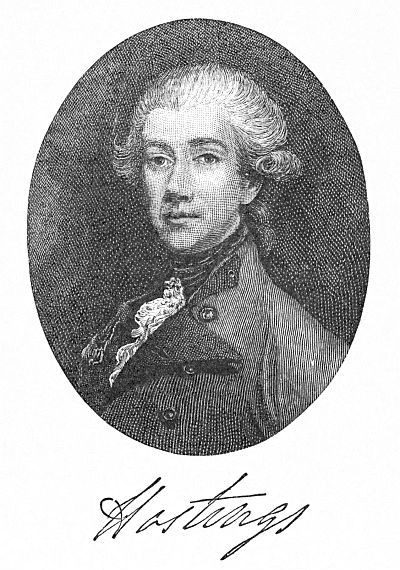
LORD RAWDON, AFTERWARD MARQUIS OF HASTINGS
Rawdon defeats Greene at Hobkirk’s Hill, April 25 While these things were going on, Greene reached Camden, and, finding his force insufficient either to assault or to invest it, took up a strong position at Hobkirk’s Hill, about two miles to the north. On the 25th of April Lord Rawdon advanced, to drive him from this position, and a battle ensued, in which the victory, nearly won, slipped through Greene’s fingers. The famous Maryland brigade, which in all these southern campaigns had stood forth preëminent, like Cæsar’s tenth legion,—which had been the last to leave the disastrous field of Camden, which had overwhelmed Tarleton at the Cowpens, and had so nearly won the day at Guilford,—now behaved badly, and, falling into confusion through a misunderstanding of orders, deranged Greene’s masterly plan of battle. but is none the less obliged to give up Camden and save his army, May 10He was driven from his position, and three days later retreated ten miles to Clermont; but, just as at Guilford, his plan of campaign was so good that he proceeded forthwith to reap all the fruits of victory. The fall of Fort Watson, breaking Rawdon’s communication with the coast, made it impossible for him to stay where he was. On the 10th of May the British general retreated rapidly, until he reached Monk’s Corner, within thirty miles of Charleston; and the all-important post of Camden, the first great prize of the campaign, fell into Greene’s hands.
All the inland posts taken from the British, May-June Victories followed now in quick succession. Within three weeks Lee and Marion had taken Fort Motte and Fort Granby, Sumter had taken Orangeburg, and on the 5th of June, after an obstinate defence, Augusta surrendered to Lee, thus throwing open the state of Georgia. Nothing was left to the British but Ninety-Six, which was strongly garrisoned, and now withstood a vigorous siege of twenty-eight days. Determined not to lose this last hold upon the interior, and anxious to crush his adversary in battle, if possible, Lord Rawdon collected all the force he could, well-nigh stripping Charleston of its defenders, and thus, with 2,000 men, came up in all haste to raise the siege of Ninety-Six. His bold movement was successful for the moment. Greene, too prudent to risk a battle, withdrew, and the frontier fortress was relieved. It was impossible, however, for Rawdon to hold it and keep his army there, so far from the seaboard, after all the other inland posts had fallen, and on the 29th of June he evacuated the place, and retreated upon Orangeburg; while Greene, following him, took up a strong position on the High Hills of Santee. Thus, within three months after Greene’s return from Guilford, the upper country of South Carolina had been completely reconquered, and only one successful battle was now needed to drive the enemy back upon Charleston. But first it was necessary to take some rest and recruit the little army which had toiled so incessantly since the last December. The enemy, too, felt the need of rest, and the heat was intolerable. Both armies, accordingly, lay and watched each other until after the middle of August.
Rawdon goes to England During this vacation, Lord Rawdon, worn out and ill from his rough campaigning, embarked for England, leaving Colonel Stuart in command of the forces in South Carolina. Greene busied himself in recruiting his army until it numbered 2,600 men, though 1,000 of these were militia. His position on the High Hills of Santee was, by an air line, distant only sixteen miles from the British army. The intervening space was filled by meadows, through which the Wateree and Congaree rivers flowed to meet each other; and often, as now, when the swift waters, swollen by rain, overflowed the lowlands, it seemed like a vast lake, save for the tops of tall pine-trees that here and there showed themselves in deepest green, protruding from the mirror-like surface. Greene understood the value of this meadow land as a barrier, when he chose the site for his summer camp. Greene marches against the British, Aug. 22The enemy could reach him only by a circuitous march of seventy miles. On the 22d of August Greene broke up his camp very quietly, and started out on the last of his sagacious campaigns. The noonday heat was so intense that he marched only in the morning and evening, in order to keep his men fresh and active; while by vigilant scouting parties he so completely cut off the enemy’s means of information that Stuart remained ignorant of his approach until he was close at hand. The British commander then fell back upon Eutaw Springs, about fifty miles from Charleston, where he waited in a strong position.
Battle of Eutaw Springs, Sept. 8 The battle of Eutaw Springs may be resolved into two brief actions between sunrise and noon of the 8th of September, 1781. In the first action the British line was broken and driven from the field. In the second Stuart succeeded in forming a new line, supported by a brick house and palisaded garden, and from this position Greene was unable to drive him. It has therefore been set down as a British victory. If so, it was a victory followed the next evening by the hasty retreat of the victors, who were hotly pursued for thirty miles by Marion and Lee. Strategically considered, it was a decisive victory for the Americans. The state government was restored to supremacy, and, though partisan scrimmages were kept up for another year, these were but the dying embers of the fire. The British were cooped up in Charleston till the end of the war, protected by their ships. Less than thirteen months had elapsed since the disaster of Camden had seemed to destroy all hope of saving the state. All this change had been wrought by Greene’s magnificent generalship. Coming upon the scene under almost every imaginable disadvantage, he had reorganized the remnant of Gates’s broken and dispirited army, he had taken the initiative from the first, and he had held the game in his own hands till the last blow was struck.Greene’s superb generalship So consummate had been his strategy that whether victorious or defeated on the field, he had, in every instance, gained the object for which the campaign was made. Under one disadvantage, indeed, he had not laboured: he had excellent officers. Seldom has a more brilliant group been seen than that which comprised Morgan, Campbell, Marion, Sumter, Pickens, Otho Williams, William Washington, and the father of Robert Edward Lee. It is only an able general, however, who knows how to use such admirable instruments. Men of narrow intelligence do not like to have able men about them, and do not know how to deal with them. Gates had Kalb and Otho Williams, and put them in places where their talent was unavailable and one of them was uselessly sacrificed, while he was too dull to detect the extraordinary value of Marion. But genius is quick to see genius, and knows what to do with it. Greene knew what each one of his officers could do, and took it into the account in planning his sweeping movements. Unless he had known that he could depend upon Morgan as certainly as Napoleon, in after years, relied upon Davoust on the day of Jena and Auerstadt, it would have been foolhardy for him to divide his force in the beginning of the campaign,—a move which, though made in apparent violation of military rules, nevertheless gave him the initiative in his long and triumphant game. What Greene might have accomplished on a wider field and with more ample resources can never be known. But the intellectual qualities which he showed in his southern campaign were those which have characterized some of the foremost strategists of modern times.
Lord Cornwallis arrives at Petersburg, May 20, 1781 When Lord Cornwallis heard, from time to time, what was going on in South Carolina, he was not cheered by the news. But he was too far away to interfere, and it was on the very day of Eutaw Springs that the toils were drawn about him which were to compass his downfall. When he reached Petersburg, on the 20th of May, the youthful Lafayette, whom Washington had sent down to watch and check the movements of the traitor Arnold, was stationed at Richmond, with a little army of 3,000 men, two thirds of them raw militia. To oppose this small force Cornwallis had now 5,000 veterans, comprising the men whom he had brought away from Guilford, together with the forces lately under Arnold and Phillips. Arnold, after some useless burning and plundering, had been recalled to New York. Phillips had died of a fever just before Cornwallis arrived. The earl entertained great hopes. His failure in North Carolina rankled in his soul, and he was eager to make a grand stroke and retrieve his reputation. Could the powerful state of Virginia be conquered, it seemed as if everything south of the Susquehanna must fall, in spite of Greene’s successes. With his soul thus full of chivalrous enterprise, Cornwallis for the moment saw things in rose colour, and drew wrong conclusions. He expected to find half the people Tories, and he also expected to find a state of chronic hostility between the slaves and their masters. On both points he was quite mistaken.
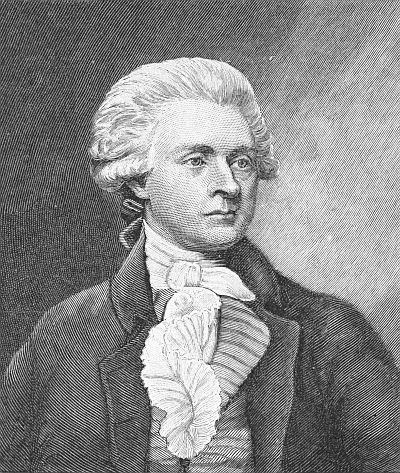
THOMAS JEFFERSON
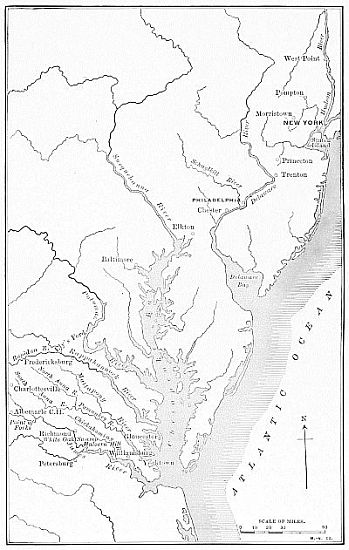
OPERATIONS IN VIRGINIA, MAY TO OCTOBER, 1781
His campaign against Lafayette
But while Cornwallis underrated the difficulty of the task, he knew,
nevertheless, that 5,000 men were not enough to conquer so strong a
state, and he tried to persuade Clinton to abandon New York, if
necessary, so that all the available British force might be concentrated
upon Virginia. Clinton wisely refused.
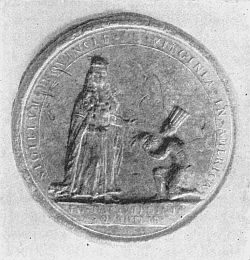
GREAT SEAL OF VIRGINIA (OBVERSE)A state like Virginia, which, for
the want of a loyalist party, could be held only by sheer conquest, was
not fit for a basis of operations against the other states; while the
abandoning of New York, the recognized strategic centre of the Atlantic
coast, would be interpreted by the whole world, not as a change of base,
but as a confession of defeat. Clinton’s opinion was thus founded upon a
truer and clearer view of the whole situation than Cornwallis’s; nor is
it likely that the latter would ever have urged such a scheme had he not
been, in such a singular and unexpected way, elbowed out of North
Carolina. Being now in Virginia, it was incumbent on him to do
something, and, with the force at his disposal, it seemed as if he might
easily begin by crushing Lafayette. “The boy cannot escape me,” said
Cornwallis; but the young Frenchman turned out to be quite capable of
taking care of himself. Although not a man of original genius, Lafayette
had much good sense and was quick at learning. He was now twenty-three
years old, buoyant and kind, full of wholesome enthusiasm, and endowed
with no mean sagacity. A Fabian policy was all that could be adopted for
the moment. When Cornwallis advanced from Petersburg to Richmond,
Lafayette began the skilful retreat which proved him an apt learner in
the school of Washington and Greene.
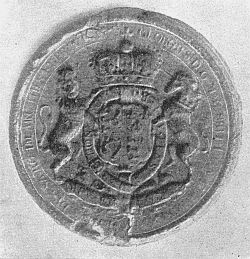
GREAT SEAL OF VIRGINIA (REVERSE)From Richmond toward
Fredericksburg—over the ground made doubly famous by the movements of
Lee and Grant—the youthful general kept up his retreat, never giving
the eager earl a chance to deal him a blow; for, as with naïve humour he
wrote to Washington, “I am not strong enough even to be beaten.” On the
4th of June Lafayette crossed the Rapidan at Ely’s Ford and placed
himself in a secure position; while Cornwallis, refraining from the
pursuit, sent Tarleton on a raid westward to Charlottesville, to break
up the legislature, which was in session there, and to capture the
governor, Thomas Jefferson. The raid, though conducted with Tarleton’s
usual vigour, failed of its principal prey; for Jefferson, forewarned in
the nick of time, got off to the mountains about twenty minutes before
the cavalry surrounded his house at Monticello. It remained for Tarleton
to seize the military stores collected at Albemarle; but on the 10th of
June Lafayette effected a junction with 1,000 Pennsylvania regulars
under Wayne, and thereupon succeeded in placing his whole force between
Tarleton and the prize he was striving to reach. Unable to break through
this barrier, Tarleton had nothing left him but to rejoin Cornwallis;
and as Lafayette’s army was reinforced from various sources until it
amounted to more than 4,000 men, he became capable of annoying the earl
in such wise as to make him think it worth while to get nearer to the
sea. Cornwallis, turning southwestward from the North Anna river, had
proceeded as far inland as Point of Forks when Tarleton joined him. On
the 15th of June, the British commander, finding that he could not
catch “the boy,” and was accomplishing nothing by his marches and
countermarches in the interior, retreated down the James river to
Richmond. Cornwallis retreats to the coast
In so doing he did not yet put himself upon the defensive.
Lafayette was still too weak to risk a battle, or to prevent his going
wherever he liked. But Cornwallis was too prudent a general to remain at
a long distance from his base of operations, among a people whom he had
found, to his great disappointment, thoroughly hostile. By retreating to
the seaboard, he could make sure of supplies and reinforcements, and
might presently resume the work of invasion. Accordingly, on the 20th he
continued his retreat from Richmond, crossing the Chickahominy a little
above White Oak Swamp, and marching down the York peninsula as far as
Williamsburg. Lafayette, having been further reinforced by Steuben, so
that his army numbered more than 5,000, pressed closely on the rear of
the British all the way down the peninsula; and on the 6th of July an
action was fought between parts of the two armies, at Green Spring, near
Williamsburg, in which the Americans were repulsed with a loss of 145
men.[42]and occupies Yorktown
The campaign was ended by the first week in August, when
Cornwallis occupied Yorktown, adding the garrison of Portsmouth to his
army, so that it numbered 7,000 men, while Lafayette planted himself on
Malvern Hill, and awaited further developments. Throughout this game of
strategy, Lafayette had shown commendable skill, proving himself a
worthy antagonist for the ablest of the British generals. But a far
greater commander than either the Frenchman or the Englishman was now to
enter most unexpectedly upon the scene. The elements of the catastrophe
were prepared, and it only remained for a master hand to strike the
blow.
Elements of the final catastrophe; arrival of the French fleet As early as the 22d of May, just two days before the beginning of this Virginia campaign, Washington had held a conference with Rochambeau, at Wethersfield, in Connecticut, and it was there decided that a combined attack should be made upon New York by the French and American armies. If they should succeed in taking the city, it would ruin the British cause; and, at all events, it was hoped that if New York was seriously threatened Sir Henry Clinton would take reinforcements from Cornwallis, and thus relieve the pressure upon the southern states. In order to undertake the capture of New York, it would be necessary to have the aid of a powerful French fleet; and the time had at last arrived when such assistance was confidently to be expected. The naval war between France and England in the West Indies had now raged for two years, with varying fortunes. The French government had exerted itself to the utmost, and early in the spring of this year had sent out a magnificent fleet of twenty-eight ships-of-the-line and six frigates, carrying 1,700 guns and 20,000 men, commanded by Count de Grasse, one of the ablest of the French admirals. It was designed to take from England the great island of Jamaica; but as the need for naval coöperation upon the North American coast had been strongly urged upon the French ministry, Grasse was ordered to communicate with Washington and Rochambeau, and to seize the earliest opportunity of acting in concert with them.
The arrival of this fleet would introduce a feature into the war such as had not existed at any time since hostilities had begun. It would interrupt the British control over the water. The utmost force the British were ready to oppose to it amounted only to nineteen ships-of-the-line, carrying 1,400 guns and 13,000 men, and this disparity was too great to be surmounted by anything short of the genius of a Nelson. The conditions of the struggle were thus about to be suddenly and decisively altered. The retreat of Cornwallis upon Yorktown had been based entirely upon the assumption of that British naval supremacy which had hitherto been uninterrupted. The safety of his position depended wholly upon the ability of the British fleet to control the Virginia waters. Once let the French get the upper hand there, and the earl, if assailed in front by an overwhelming land force, would be literally “between the devil and the deep sea.” He would be no better off than Burgoyne in the forests of northern New York.
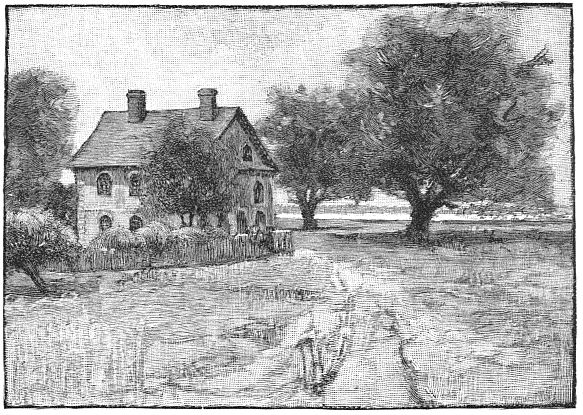
CORNWALLIS’S HEADQUARTERS AT YORKTOWN
News from Grasse and Lafayette It was not yet certain, however, where Grasse would find it best to strike the coast. The elements of the situation disclosed themselves but slowly, and it required the master mind of Washington to combine them. Intelligence travelled at snail’s pace in those days, and operations so vast in extent were not within the compass of anything but the highest military genius. It took ten days for Washington to hear from Lafayette, and it took a month for him to hear from Greene, while there was no telling just when definite information would arrive from Grasse. But so soon as Washington heard from Greene, in April, how he had manœuvred Cornwallis up into Virginia, he began secretly to consider the possibility of leaving a small force to guard the Hudson, while taking the bulk of his army southward to overwhelm Cornwallis. At the Wethersfield conference, he spoke of this to Rochambeau, but to no one else; and a dispatch to Grasse gave him the choice of sailing either for the Hudson or for Chesapeake bay. So matters stood till the middle of August, while Washington, grasping all the elements of the problem, vigilantly watched the whole field, holding himself in readiness for either alternative,—to strike New York close at hand, or to hurl his army to a distance of four hundred miles. On the 14th of August a message came from Grasse that he was just starting from the West Indies for Chesapeake bay, with his whole fleet, and hoped that whatever the armies had to do might be done quickly, as he should be obliged to return to the West Indies by the middle of October. Washington could now couple with this the information, just received from Lafayette, that Cornwallis had established himself at Yorktown, where he had deep water on three sides of him, and a narrow neck in front.
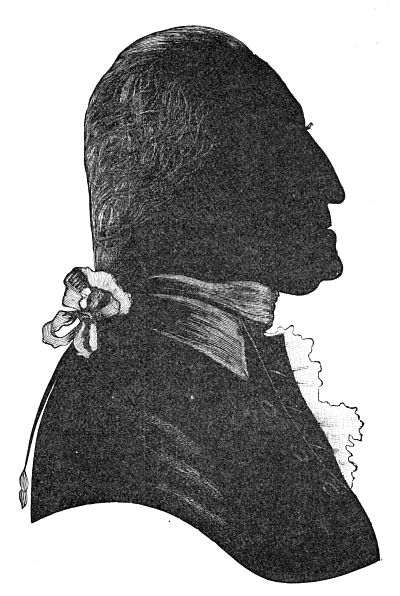
WASHINGTON SILHOUETTE BY FOLWELL
Subtle and audacious scheme of Washington The supreme moment of Washington’s military career had come,—the moment for realizing a conception which had nothing of a Fabian character about it, for it was a conception of the same order as those in which Cæsar and Napoleon dealt. He decided at once to transfer his army to Virginia and overwhelm Cornwallis. He had everything in readiness. The army of Rochambeau had marched through Connecticut, and joined him on the Hudson in July. He could afford to leave West Point with a comparatively small force, for that strong fortress could be taken only by a regular siege, and he had planned his march so as to blind Sir Henry Clinton completely. This was one of the finest points in Washington’s scheme, in which the perfection of the details matched the audacious grandeur of the whole. Sir Henry was profoundly unconscious of any such movement as Washington was about to execute; but he was anxiously looking out for an attack upon New York. Now, from the American headquarters near West Point, Washington could take his army more than half way through New Jersey without arousing any suspicion at all; for the enemy would be sure to interpret such a movement as preliminary to an occupation of Staten Island, as a point from which to assail New York. Sir Henry knew that the French fleet might be expected at any moment; but he had not the clue which Washington held, and his anxious thoughts were concerned with New York harbour, not with Chesapeake Bay. Besides all this, the sheer audacity of the movement served still further to conceal its true meaning. It would take some time for the enemy to comprehend so huge a sweep as that from New York to Virginia, and doubtless Washington could reach Philadelphia before his purpose could be fathomed.
He transfers his army to Virginia, Aug. 19-Sept. 18 The events justified his foresight. On the 19th of August, five days after receiving the dispatch from Grasse, Washington’s army crossed the Hudson at King’s Ferry, and began its march. Lord Stirling was left with a small force at Saratoga, and General Heath, with 4,000 men, remained at West Point. Washington took with him southward 2,000 Continentals and 4,000 Frenchmen. It was the only time during the war that French and American land forces marched together, save on the occasion of the disastrous attack upon Savannah. None save Washington and Rochambeau knew whither they were going. So precious was the secret that even the general officers supposed, until New Brunswick was passed, that their destination was Staten Island. So rapid was the movement that, however much the men might have begun to wonder, they had reached Philadelphia before the purpose of the expedition was distinctly understood.
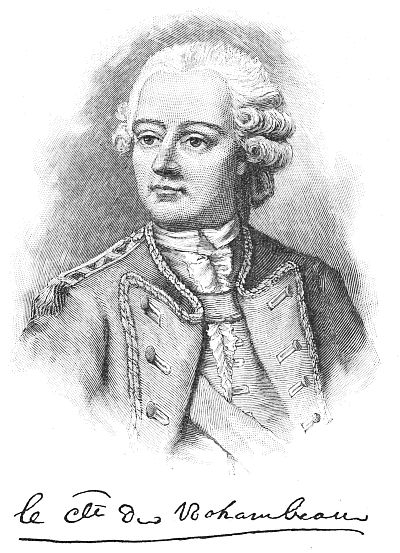
As the army marched through the streets of Philadelphia, there was an outburst of exulting hope. The plan could no longer be hidden. Congress was informed of it, and a fresh light shone upon the people, already elated by the news of Greene’s career of triumph. The windows were thronged with fair ladies, who threw sweet flowers on the dusty soldiers as they passed, while the welkin rang with shouts, anticipating the great deliverance that was so soon to come. The column of soldiers, in the loose order adapted to its rapid march, was nearly two miles in length. First came the war-worn Americans, clad in rough toggery, which eloquently told the story of the meagre resources of a country without a government. Then followed the gallant Frenchmen, clothed in gorgeous trappings, such as could be provided by a government which at that time took three fourths of the earnings of its people in unrighteous taxation. There was some parading of these soldiers before the president of Congress, but time was precious. Washington, in his eagerness galloping on to Chester, received and sent back the joyful intelligence that Grasse had arrived in Chesapeake bay, and then the glee of the people knew no bounds. Bands of music played in the streets, every house hoisted its stars-and-stripes, and all the roadside taverns shouted success to the bold general. “Long live Washington!” was the toast of the day. “He has gone to catch Cornwallis in his mousetrap!”
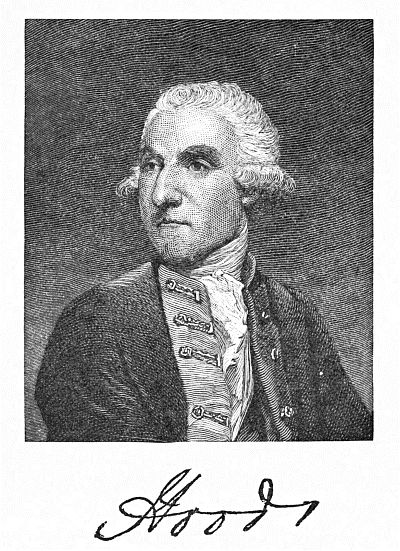
But these things did not stop for a moment the swift advance of the army. It was on the 1st of September that they left Trenton behind them, and by the 5th they had reached the head of Chesapeake bay, whence they were conveyed in ships, and reached the scene of action, near Yorktown, by the 18th.
Movements of the fleets
Meanwhile, all things had been working together most auspiciously. On
the 31st of August the great French squadron had arrived on the scene,
and the only Englishman capable of defeating it, under the existing
odds, was far away. Admiral Rodney’s fleet had followed close upon its
heels from the West Indies, but Rodney himself was not in command. He
had been taken ill suddenly, and had sailed for England, and Sir Samuel
Hood commanded the fleet. Hood outsailed Grasse, passed him on the ocean
without knowing it, looked in at the Chesapeake on the 25th of August,
and, finding no enemy there, sailed on to New York to get instructions
from Admiral Graves, who commanded the naval force in the North, This
was the first that Graves or Clinton knew of the threatened danger. Not
a moment was to be lost. The winds were favourable, and Graves, now
chief in command, crowded sail for the Chesapeake, and arrived on the
5th of September, the very day on which Washington’s army was embarking
at the head of the great bay. Graves found the French fleet blocking the
entrance to the bay, and instantly attacked it. A decisive naval victory
for the British would at this moment have ruined everything. But after a
sharp fight of two hours’ duration, in which some 700 men were killed
and wounded on the two fleets, Admiral Graves withdrew.
 Three of his
ships were badly damaged, and after manœuvering for four days he
returned, baffled and despondent, to New York, leaving Grasse in full
possession of the Virginia waters. The toils were thus fast closing
around Lord Cornwallis. He knew nothing as yet of Washington’s approach,
but there was just a chance that he might realize his danger, and,
crossing the James river, seek safety in a retreat upon North Carolina.
Lafayette forestalled this solitary chance. Immediately upon the arrival
of the French squadron, the troops of the Marquis de Saint-Simon, 3,000
in number, had been set on shore and added to Lafayette’s army; and with
this increased force, now amounting to more than 8,000 men, “the boy”
came down on the 7th of September, and took his stand across the neck of
the peninsula at Williamsburg, cutting off Cornwallis’s retreat.
Three of his
ships were badly damaged, and after manœuvering for four days he
returned, baffled and despondent, to New York, leaving Grasse in full
possession of the Virginia waters. The toils were thus fast closing
around Lord Cornwallis. He knew nothing as yet of Washington’s approach,
but there was just a chance that he might realize his danger, and,
crossing the James river, seek safety in a retreat upon North Carolina.
Lafayette forestalled this solitary chance. Immediately upon the arrival
of the French squadron, the troops of the Marquis de Saint-Simon, 3,000
in number, had been set on shore and added to Lafayette’s army; and with
this increased force, now amounting to more than 8,000 men, “the boy”
came down on the 7th of September, and took his stand across the neck of
the peninsula at Williamsburg, cutting off Cornwallis’s retreat.
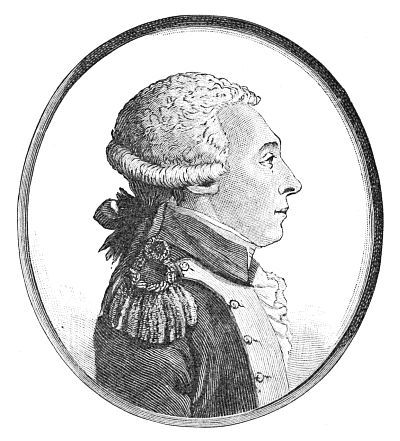
MARQUIS DE LAFAYETTE
Cornwallis surrounded at Yorktown Thus, on the morning of the 8th, the very day on which Greene, in South Carolina, was fighting his last battle at Eutaw Springs, Lord Cornwallis, in Virginia, found himself surrounded. The door of the mousetrap was shut. Still, but for the arrival of Washington, the plan would probably have failed. It was still in Cornwallis’s power to burst the door open. His force was nearly equal to Lafayette’s in numbers, and better in quality, for Lafayette’s contained 3,000 militia. Cornwallis carefully reconnoitred the American lines, and seriously thought of breaking through; but the risk was considerable, and heavy loss was inevitable. He had not the slightest inkling of Washington’s movements, and he believed that Graves would soon return with force enough to drive away Grasse’s blockading squadron. So he decided to wait before striking a hazardous blow. It was losing his last chance. On the 14th Washington reached Lafayette’s headquarters, and took command. On the 18th the northern army began arriving in detachments, and by the 26th it was all concentrated at Williamsburg, more than 16,000 strong. The problem was solved. The surrender of Cornwallis was only a question of time. It was the great military surprise of the Revolutionary War. Had any one predicted, eight months before, that Washington on the Hudson and Cornwallis on the Catawba, eight hundred miles apart, would so soon come together and terminate the war on the coast of Virginia, he would have been thought a wild prophet indeed. For thoroughness of elaboration and promptness of execution, the movement, on Washington’s part, was as remarkable as the march of Napoleon in the autumn of 1805, when he swooped from the shore of the English Channel into Bavaria, and captured the Austrian army at Ulm.
Clinton’s attempt at a counterstroke By the 2d of September, Sir Henry Clinton, learning that the American army had reached the Delaware, and coupling with this the information he had got from Admiral Hood, began to suspect the true nature of Washington’s movement, and was at his wit’s end. The only thing he could think of was to make a counterstroke on the coast of Connecticut, and he accordingly detached Benedict Arnold with 2,000 men to attack New London.
Arnold’s proceedings at New London, Sept. 6It was the boast of this sturdy little state that no hostile force had ever slept a night upon her soil. Such blows as her coast towns had received had been dealt by an enemy who retreated as quickly as he had come; and such was again to be the case. The approach to New London was guarded by two forts on opposite banks of the river Thames, but Arnold’s force soon swept up the west bank, bearing down all opposition and capturing the city. In Fort Griswold, on the east bank, 157 militia were gathered and made a desperate resistance. The fort was attacked by 600 regulars, and after losing 192 men, or 35 more than the entire number of the garrison, they carried it by storm. No quarter was given, and of the little garrison only 26 escaped unhurt.[43] The town of New London was laid in ashes; minute-men came swarming by hundreds; the enemy reëmbarked before sunset and returned up the Sound. And thus, on the 6th of September, 1781, with this wanton assault upon the peaceful neighbourhood where the earliest years of his life had been spent, the brilliant and wicked Benedict Arnold disappears from American history.[44]
Surrender of Cornwallis, Oct. 19, 1781 A thoroughly wanton assault it was, for it did not and could not produce the slightest effect upon the movements of Washington. By the time the news of it had reached Virginia, the combination against Cornwallis had been completed, and day by day the lines were drawn more closely about the doomed army. Yorktown was invested, and on the 6th of October the first parallel was opened by General Lincoln. On the 11th, the second parallel, within three hundred yards of the enemy’s works, was opened by Steuben. On the night of the 14th Alexander Hamilton and the Baron de Viomenil carried two of the British redoubts by storm. On the next night the British made a gallant but fruitless sortie. By noon of the 16th their works were fast crumbling to pieces under the fire of seventy cannon. On the 17th—the fourth anniversary of Burgoyne’s surrender—Cornwallis hoisted the white flag. The terms of the surrender were like those of Lincoln’s at Charleston. The British army became prisoners of war, subject to the ordinary rules of exchange. The only delicate question related to the American loyalists in the army, whom Cornwallis felt it wrong to leave in the lurch. This point was neatly disposed of by allowing him to send a ship to Sir Henry Clinton, with news of the catastrophe, and to embark in it such troops as he might think proper to send to New York, and no questions asked. On a little matter of etiquette the Americans were more exacting. The practice of playing the enemy’s tunes had always been cherished as an inalienable prerogative of British soldiery; and at the surrender of Charleston, in token of humiliation, General Lincoln’s army had been expressly forbidden to play any but an American tune. Colonel Laurens, who now conducted the negotiations, directed that Lord Cornwallis’s sword should be received by General Lincoln, and that the army, on marching out to lay down its arms, should play a British or a German air. There was no help for it; and on the 19th of October, Cornwallis’s army, 7,247 in number, with 840 seamen, marched out with colours furled and cased, while the band played a quaint old English melody, of which the significant title was “The World Turned Upside Down!”
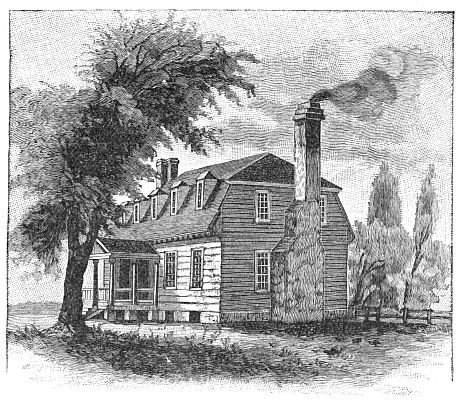
MOORE’S HOUSE, YORKTOWN, IN WHICH THE TERMS OF SURRENDER WERE ARRANGED
Importance of the aid rendered by the French fleet and army On the very same day that Cornwallis surrendered, Sir Henry Clinton, having received naval reinforcements, sailed from New York with twenty-five ships-of-the-line and ten frigates, and 7,000 of his best troops. Five days brought him to the mouth of the Chesapeake, where he learned that he was too late, as had been the case four years before, when he tried to relieve Burgoyne. A fortnight earlier, this force might perhaps have seriously altered the result, for the fleet was strong enough to dispute with Grasse the control over the coast. The French have always taken to themselves the credit of the victory of Yorktown. In the palace of Versailles there is a room the walls of which are covered with huge paintings depicting the innumerable victories of France, from the days of Chlodwig to those of Napoleon. Near the end of the long series, the American visitor cannot fail to notice a scene which is labelled “Bataille de Yorcktown” (misspelled, as is the Frenchman’s wont in dealing with the words of outer barbarians), in which General Rochambeau occupies the most commanding position, while General Washington is perforce contented with a subordinate place. This is not correct history, for the glory of conceiving and conducting the movement undoubtedly belongs to Washington. But it should never be forgotten, not only that the 4,000 men of Rochambeau and the 3,000 of Saint-Simon were necessary for the successful execution of the plan, but also that without the formidable fleet of Grasse the plan could not even have been made. How much longer the war might have dragged out its tedious length, or what might have been its final issue, without this timely assistance, can never be known; and our debt of gratitude to France for her aid on this supreme occasion is something which should always be duly acknowledged.[45]
PAROLE OF CORNWALLIS
Effect of the news in England Early on a dark morning of the fourth week in October, an honest old German, slowly pacing the streets of Philadelphia on his night watch, began shouting, “Basht dree o’glock, und Gornvallis ish dakendt!” and light sleepers sprang out of bed and threw up their windows. Washington’s courier laid the dispatches before Congress in the forenoon, and after dinner a service of prayer and thanksgiving was held in the Lutheran Church. At New Haven and Cambridge the students sang triumphal hymns, and every village green in the country was ablaze with bonfires. The Duke de Lauzun sailed for France in a swift ship, and on the 27th of November all the houses in Paris were illuminated, and the aisles of Notre Dame resounded with the Te Deum. At noon of November 25th, the news was brought to Lord George Germain, at his house in Pall Mall. Getting into a cab, he drove hastily to the Lord Chancellor’s house in Great Russell Street, Bloomsbury, and took him in; and then they drove to Lord North’s office in Downing Street. At the staggering news, all the Prime Minister’s wonted gayety forsook him. He walked wildly up and down the room, throwing his arms about and crying, “O God! it is all over! it is all over! it is all over!” A dispatch was sent to the king at Kew, and when Lord George received the answer that evening, at dinner, he observed that his Majesty wrote calmly, but had forgotten to date his letter,—a thing which had never happened before.
“The tidings,” says Wraxall, who narrates these incidents, “were calculated to diffuse a gloom over the most convivial society, and opened a wide field for political speculation.” There were many people in England, however, who looked at the matter differently from Lord North. This crushing defeat was just what the Duke of Richmond, at the beginning of the war, had publicly declared he hoped for. Charles Fox always took especial delight in reading about the defeats of invading armies, from Marathon and Salamis downward; and over the news of Cornwallis’s surrender he leaped from his chair and clapped his hands. In a debate in Parliament, four months before, the youthful William Pitt had denounced the American war as “most accursed, wicked, barbarous, cruel, unnatural, unjust, and diabolical,” which led Burke to observe, “He is not a chip of the old block; he is the old block itself!”
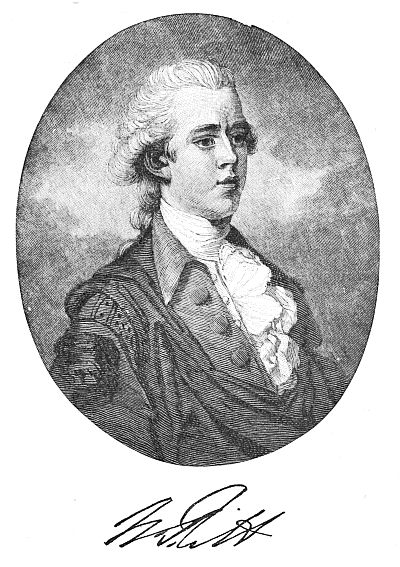
Difficult position of Great Britain The fall of Lord North’s ministry, and with it the overthrow of the personal government of George III., was now close at hand. For a long time the government had been losing favour. In the summer of 1780, the British victories in South Carolina had done something to strengthen it; yet when, in the autumn of that year, Parliament was dissolved, although the king complained that his expenses for purposes of corruption had been twice as great as ever before, the new Parliament was scarcely more favourable to the ministry than the old one. Misfortunes and perplexities crowded in the path of Lord North and his colleagues. The example of American resistance had told upon Ireland, and it was in the full tide of that agitation which is associated with the names of Flood and Grattan that the news of Cornwallis’s surrender was received. For more than a year there had been war in India, where Hyder Ali, for the moment, was carrying everything before him. France, eager to regain her lost foothold upon Hindustan, sent a strong armament thither, and insisted that England must give up all her Indian conquests except Bengal. For a moment England’s new Eastern empire tottered, and was saved only by the superhuman exertions of Warren Hastings, aided by the wonderful military genius of Sir Eyre Coote. In May, 1781, the Spaniards had taken Pensacola, thus driving the British from their last position in Florida. In February, 1782, the Spanish fleet captured Minorca, and the siege of Gibraltar, which had been kept up for nearly three years, was pressed with redoubled energy. During the winter the French recaptured St. Eustatius, and handed it over to Holland; and Grasse’s great fleet swept away all the British possessions in the West Indies, except Jamaica, Barbadoes, and Antigua. All this time the Northern League kept up its jealous watch upon British cruisers in the narrow seas, and among all the powers of Europe the government of George III. could not find a single friend.
Rodney’s victory over Grasse, April 12, 1782 The maritime supremacy of England was, however, impaired but for a moment. Rodney was sent back to the West Indies, and on the 12th of April, 1782, his fleet of thirty-six ships encountered the French near the island of Sainte-Marie-Galante. The battle of eleven hours which ensued, and in which 5,000 men were killed or wounded, was one of the most tremendous contests ever witnessed upon the ocean before the time of Nelson. The French were totally defeated, and Grasse was taken prisoner,—the first French commander-in-chief, by sea or land, who had fallen into an enemy’s hands since Marshal Tallard gave up his sword to Marlborough, on the terrible day of Blenheim. France could do nothing to repair this crushing disaster. Her naval power was eliminated from the situation at a single blow; and in the course of the summer the English achieved another great success by overthrowing the Spaniards at Gibraltar, after a struggle which, for dogged tenacity, is scarcely paralleled in the annals of modern warfare. By the autumn of 1782, England, defeated in the United States, remained victorious and defiant as regarded the other parties to the war.
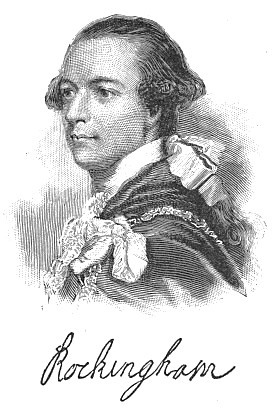
But these great successes came too late to save the doomed ministry of Lord North. After the surrender of Cornwallis, no one but the king thought of pursuing the war in America any further. Even the king gave up all hope of subduing the United States; but he insisted upon retaining the state of Georgia, with the cities of Charleston and New York; and he vowed that, rather than acknowledge the independence of the United States, he would abdicate the throne and retire to Hanover. Lord George Germain was dismissed from office, Sir Henry Clinton was superseded by Sir Guy Carleton, and the king began to dream of a new campaign. But his obstinacy was of no avail. During the winter and spring, General Wayne, acting under Greene’s orders, drove the British from Georgia, while at home the country squires began to go over to the opposition; and Lord North, utterly discouraged and disgusted, refused any longer to pursue a policy of which he disapproved. The baffled and beaten king, like the fox in the fable, declared that the Americans were a wretched set of knaves, and he was glad to be rid of them. The House of Commons began to talk of a vote of censure on the administration. A motion of Conway’s, petitioning the king to stop the war, was lost by only a single vote; and at last, on the 20th of March, 1782, Lord North bowed to the storm, and resigned. The two sections of the Whig party united their forces. Lord Rockingham became Prime Minister, and with him came into office Shelburne, Camden, and Grafton, as well as Fox and Conway, the Duke of Richmond, and Lord John Cavendish, staunch friends of America, all of them, whose appointment involved the recognition of the independence of the United States.
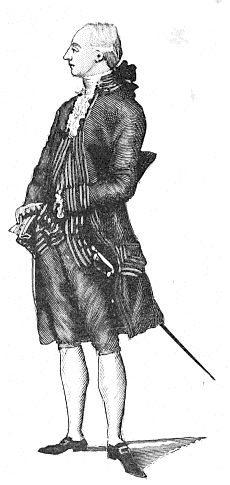
Lord North observed that he had often been accused of issuing lying
bulletins, but he had never told so big a lie as that with which the new
ministry announced its entrance into power; for in introducing the name
of each of these gentlemen, the official bulletin used the words, “His
Majesty has been pleased to appoint!” It was indeed a day of bitter
humiliation for George III. and the men who had been his tools.
 But it
was a day of happy omen for the English race, in the Old World as well
as in the New. For the advent of Lord Rockingham’s ministry meant not
merely the independence of the United States; it meant the downfall of
the only serious danger with which English liberty has been threatened
since the expulsion of the Stuarts. The personal government which George
III. had sought to establish, with its wholesale corruption, its
shameless violations of public law, and its attacks upon freedom of
speech and of the press, became irredeemably discredited, and tottered
to its fall; while the great England of William III., of Walpole, of
Chatham, of the younger Pitt, of Peel, and of Gladstone was set free to
pursue its noble career. Such was the priceless boon which the younger
nation, by its sturdy insistence upon the principles of political
justice, conferred upon the elder. The decisive battle of freedom in
England, as well as in America, and in that vast colonial world for
which Chatham prophesied the dominion of the future, had now been fought
and won. And foremost in accomplishing this glorious work had been the
lofty genius of Washington, and the steadfast valour of the men who
suffered with him at Valley Forge, and whom he led to victory at
Yorktown.
But it
was a day of happy omen for the English race, in the Old World as well
as in the New. For the advent of Lord Rockingham’s ministry meant not
merely the independence of the United States; it meant the downfall of
the only serious danger with which English liberty has been threatened
since the expulsion of the Stuarts. The personal government which George
III. had sought to establish, with its wholesale corruption, its
shameless violations of public law, and its attacks upon freedom of
speech and of the press, became irredeemably discredited, and tottered
to its fall; while the great England of William III., of Walpole, of
Chatham, of the younger Pitt, of Peel, and of Gladstone was set free to
pursue its noble career. Such was the priceless boon which the younger
nation, by its sturdy insistence upon the principles of political
justice, conferred upon the elder. The decisive battle of freedom in
England, as well as in America, and in that vast colonial world for
which Chatham prophesied the dominion of the future, had now been fought
and won. And foremost in accomplishing this glorious work had been the
lofty genius of Washington, and the steadfast valour of the men who
suffered with him at Valley Forge, and whom he led to victory at
Yorktown.
In the light of the foregoing narrative it distinctly appears that, while the American Revolution involved a military struggle between the governments of Great Britain and the United States, it did not imply any essential antagonism of interests or purposes between the British and American peoples. It was not a contest between Englishmen and Americans, but between two antagonistic principles of government, each of which had its advocates and opponents in both countries. It was a contest between Whig and Tory principles, and it was the temporary prevalence of Toryism in the British government that caused the political severance between the two countries. If the ideas of Walpole, or the ideas of Chatham, had continued to prevail at Westminster until the end of the eighteenth century, it is not likely that any such political severance would have occurred. The self-government of the American colonies would not have been interfered with, and such slight grievances as here and there existed might easily have been remedied by the ordinary methods of peace. The American Revolution, unlike most political revolutions, was essentially conservative in character. It was not caused by actually existing oppression, but by the determination to avoid possible oppression in future. Its object was not the acquisition of new liberties, but the preservation of old ones. The principles asserted in the Stamp Act Congress of 1765 differed in no essential respect from those that had been proclaimed five centuries earlier, in Earl Simon’s Parliament of 1265. Political liberty was not an invention of the western hemisphere; it was brought to these shores from Great Britain by our forefathers of the seventeenth century, and their children of the eighteenth naturally refused to surrender the treasure which from time immemorial they had enjoyed.
The decisive incident which in the retrospect appears to have made the Revolution inevitable, as it actually brought it upon the scene, was the Regulating Act of April, 1774, which annulled the charter of Massachusetts, and left that commonwealth to be ruled by a military governor. This atrocious measure, which was emphatically condemned by the most enlightened public sentiment in England, was the measure of a half-crazy young king, carried through a parliament in which more than a hundred members sat for rotten boroughs. It was the first violent manifestation of despotic tendency at the seat of government since 1688; and in this connection it is interesting to remember that in 1684 Charles II. had undertaken to deal with Massachusetts precisely as was attempted ninety years later by George III. In both cases the charter was annulled, and a military governor appointed; and in both cases the liberties of all the colonies were openly threatened by the tyrannical scheme. But in the earlier case the conduct of James II. at once brought on acute irritation in England, so that the evil was promptly removed. In the later case the evil was realized so much sooner and so much more acutely in the colonies than in England as to result in political separation. Instead of a general revolution, overthrowing or promptly curbing the king, there was a partial revolution, which severed the colonies from their old allegiance; but at the same time the success of this partial revolution soon ended in restraining the king. The personal government of George III. was practically ended by the election of 1784.
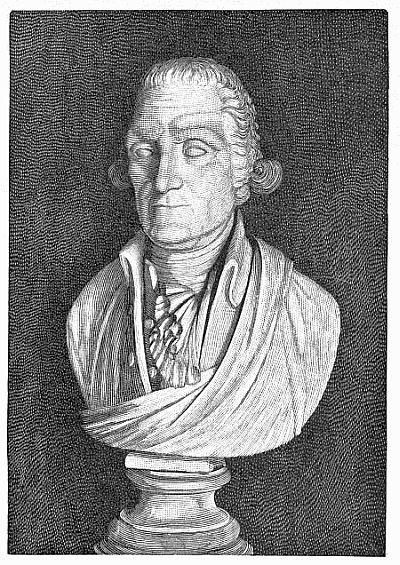
BUST OF WASHINGTON, CHRIST CHURCH, BOSTON
Throughout the war the Whigs of the mother country loyally sustained the principles for which the Americans were fighting, and the results of the war amply justified them. On the other hand, the Tories in America were far from agreed in approving the policy of George III. Some of them rivalled Thurlow and Germain in the heartiness with which they supported the king; but others, and in all probability a far greater number, disapproved of the king’s measures, and perceived their dangerous tendency, but could not persuade themselves to take part in breaking up the great empire which represented all that to their minds was best in civilization. History is not called upon to blame these members of the defeated party. The spirit by which they were animated is not easily distinguishable from that which inspired the victorious party in our Civil War. The expansion of English sway in the world was something to which the American colonies had in no small share contributed, and the rejoicings over Wolfe’s victory had scarcely ceased when the spectre of fratricidal strife came looming up in the horizon. An American who heartily disapproved of Grenville’s well-meaning blunder and Townshend’s malicious challenge might still believe that the situation could be rectified without the disruption of the Empire. Such was the attitude of Thomas Hutchinson, who was surely a patriot, as honest and disinterested as his adversary, Samuel Adams. The attitude of Hutchinson can be perfectly understood if we compare it with that of Falkland in the days of the Long Parliament. In the one case as in the other sound reason was on the side of the Moderates; but their fatal weakness was that they had no practical remedy to offer. Between George III. and Samuel Adams any real compromise was as impossible as between Charles I. and Pym.
It was seriously feared by many patriotic Tories, like Hutchinson, that if the political connection between the colonies and the mother country were to be severed, the new American republics would either tear themselves to pieces in petty and ignominious warfare, like the states of ancient Greece, or else would sink into the position of tools for France or Spain. The history of the thirty years after Yorktown showed that these were not imaginary dangers. The drift toward anarchy, from which we began to be rescued in 1787, was unmistakable; and after 1793 the determination of France to make a tool of the United States became for some years a disturbing and demoralizing element in the political situation. But as we look at these events retrospectively, the conclusion to which we are driven is just opposite to that which was entertained by the Tories. Dread of impending anarchy brought into existence our Federal Constitution in 1787, and nothing short of that would have done it. But for the acute distress entailed by the lack of any stronger government than the Continental Congress, the American people would have been no more willing to enter into a strict Federal Union in 1787 than they had been in 1754. Instead of bringing anarchy, the separation from Great Britain, by threatening anarchy, brought more perfect union. In order that American problems should be worked out successfully, independence was necessary.
It is to be regretted that the attainment of that independence must needs have been surrounded with the bitter memories inseparable from warfare. In such a political atmosphere as that of the ancient Greek world it need not have been so. The Greek colony, save in two or three exceptional cases, enjoyed complete autonomy. Corinth did not undertake to legislate for Syracuse; but the Syracusan did not therefore cease to regard Corinthians as his fellow-countrymen. The conceptions of allegiance and territorial sovereignty, which grew to maturity under the feudal system, made such relations between colony and mother state impossible in the eighteenth century. Autonomy could not be taken for granted, but must be won with the sword.
But while, under the circumstances, a war was inevitable, it is only gross ignorance of history that would find in such a war any justification for lack of cordiality between the people of the United Kingdom and the people of the United States. As already observed, it was not a war between the two peoples, but between two principles. The principle of statecraft against which Washington fought no longer exists among either British or Americans; it is as extinct as the dinosaurs. In all good work that nations can do in the world, the British people are our best allies; and one of the most encouraging symptoms of the advancement of civilization in recent years is the fact that a grave question, which in earlier times and between other nations would doubtless have led to bloodshed, has been amicably adjusted by arbitration. The memory of what was accomplished in 1872 at Geneva is a prouder memory than Saratoga or Yorktown. From such an auspicious beginning, it is not unlikely that a system may soon be developed whereby all international questions that can arise among English-speaking people shall admit of settlement by peaceable discussion. It would be one of the most notable things ever done for the welfare of mankind, and it is hoped that the closing years of our century may be made forever illustrious by such an achievement.
[1] See my Critical Period of American History, chap. i.
[2] In his account of the American Revolution, Mr. Lecky inclines to the Tory side, but he is eminently fair and candid.
[3] On the pedestal of this statue, which stands in front of the North Bridge at Concord, is engraved the following quotation from Emerson’s “Concord Hymn:"—
The poet’s grandfather, Rev. William Emerson, watched the fight from a window of the Old Manse.
[4] It was in this church on March 23, 1775, that Patrick Henry made the famous speech in which he said, “It is too late to retire from the contest. There is no retreat but in submission and slavery. The war is inevitable, and let it come! The next gale that sweeps from the north will bring to our ears the clash of resounding arms! I know not what course others may take, but as for me, give me liberty or give me death.”
[5] In the letter, of which a facsimile is here given, Allen gives the date of the capture of Ticonderoga as the 11th, but a minute survey of the contemporary newspaper and other sources of information makes it clear that this must be a slip of the pen. In his personal “Narrative,” Allen gives the date correctly as the 10th.
[6] This sketch was made on the spot for Lord Rawdon, who was then on Gage’s staff. The spire in the foreground is that of the Old West Church, where Jonathan Mayhew preached; it stood on the site since occupied by Dr. Bartol’s church on Cambridge Street, now a branch of the Boston Public Library. Its position in the picture shows that the sketcher stood on Beacon Hill, 138 feet above the water. The first hill to the right of the spire, on the further side of the river, is Bunker Hill, 110 feet high. The summit of Breed’s Hill, 62 feet high, where Prescott’s redoubt stood, is nearly hidden by the flames of burning Charlestown. At a sale of the effects of the Marquis of Hastings, descendant of Lord Rawdon, this sketch was bought by my friend Dr. Thomas Addis Emmet.
[7] [Of a family always prominent in Rhode Island, he had early come to be the most admired and respected citizen of the colony. His father, a narrow-minded Quaker, though rich in lands, mills, and iron forges, was adverse to education, and kept his son at work in the forges. But the son had an intense thirst for knowledge, and, without neglecting his duties, he bought books and became well versed in history, philosophy, and general literature.]
[8] The first stage was the change from the solid red of the British ensign to the alternate red and white stripes, as seen in the flag on the right, which typified the thirteen confederated colonies. After allegiance to the British crown had been thrown off, the union of red St. George and white St. Andrew crosses upon the blue corner became inappropriate, and in June, 1777, Congress substituted the circle of thirteen white stars on a blue ground, to signify the rise of a new constellation of states.
[9] Jonathan Trumbull, Governor of Connecticut, was a graduate of Harvard in 1737, in the same class with Hutchinson. Washington used to call him “Brother Jonathan.” He was father of John Trumbull, the famous painter.
[10] This view is taken from the Hudson river, and shows Fort George at the extreme right. The street facing upon the river was Greenwich Street, from which the descent to the water was abrupt. The cliff-like look of the banks has since been destroyed by the addition of new land sloping gently down to the water level at West Street. The church most conspicuous in the picture is the old Trinity, which was burned in 1776.
[11] This is a contemporary view of the road by which Howe advanced upon Sullivan’s rear.
[12] I leave this as I wrote it in June, 1883. Since then another version of the facts has been suggested by W. L. Stone in Appleton’s Cyclopædia of American Biography. In this version, Mr. Jones sends a party of Indians under the half-breed Duluth to escort Miss McCrea to the camp, where they are to be married by Mr. Brudenell, the chaplain. It is to be quite a fine little wedding, and the Baroness Riedesel and Lady Harriet Ackland are to be among the spectators. Before Duluth reaches Mrs. McNeil’s house, the Wyandot Panther (here known by the name of a different beast, Le Loup) with his party attacks the house and carries off the two ladies. The Panther’s party meets Duluth’s near the spring. Duluth insists upon taking Jenny with him, and high words ensue between him and the Panther, until the latter, in a towering rage, draws his pistol and shoots the girl. This version, if correct, goes some way toward reconciling the legend with the observed facts.
[13] This contemporary British caricature represents the new allies, “Noble Pair of Brothers,” George III. and an Indian chief, seated together at their cannibal banquet. It expresses the lively disgust with which the employment of Indians was regarded in England.
[14] In the spring of 1776 Lee had written to Edward Rutledge: “By the eternal God! If you do not declare yourselves independent, you deserve to be slaves!” In several such letters Lee had fairly bellowed for independence.
[15] Things seemed to be getting into somewhat the condition contemplated in the satirical print of “The Man in the Moon,” which appeared as frontispiece to a tract published in London in 1776, entitled “A Plea of the Colonies on the Charges brought against them by Lord Mansfield and others.” The Man in the Moon is George III. looking through a telescope held by his Tory chief justice, whose sleeve shows the Scotch plaid of Clan Murray. He looks upon a reversed and topsy-turvy world, in which New York (whose true latitude is nearly the same as that of Naples) appears farther north than London, and America is east of Europe. The American coast is covered with vast armies, and the whole British fleet is on its way thither, leaving England exposed to the attack of a French host gathered at Dunkirk. Meanwhile the Gallic cock crows lustily, and the sketchy outline of Great Britain indicates that the artist supposes the island “may be so far wasted before the year 1800, that people will hardly know where the nation resided that was once so formidable.” See Tracts 985, Harvard University Library.
[16] “This episode appears to me the most criminal in the whole reign of George III., and in my own judgment it is as criminal as any of those acts which led Charles I. to the scaffold.” Lecky, History of England in the Eighteenth Century, vol. iv. p. 83.
[17] As usual in such cases, there is a great diversity of testimony as to what was said. In my first edition I gave the familiar story of which there is a meagre version in Bancroft and a much fuller one in Irving: “What is the meaning of all this?” etc.; but I suspect that story is much too literary. It is not likely that any such conversation occurred at such a moment. A young sergeant, Jacob Morton, was standing close by when Washington met Lee. This Morton, who afterward became a major, was noted for accuracy and precision of statement. In 1840 he gave his account of the affair to Mr. Harrison Robertson, of Charlottesville, Virginia; and in 1895 Mr. Robertson kindly wrote out for me his recollection of that account. According to Morton, Washington simply shouted, “My God! General Lee, what are you about?” This has the earmark of truth. Another account, traceable to Lafayette and likewise probable, says that as Washington swept furiously past and away, he ejaculated with bitter emphasis, “Damned poltroon!”
[18] Such was Steuben’s own testimony on the court-martial. Lee was so enraged by it as to make reflections upon Steuben which presently called forth a challenge from that gentleman. (Lee Papers, iii. 96, 253.) It is to be regretted that we have not the reply in which Lee declined the encounter. There is a reference to it in a letter from Alexander Hamilton to Baron von Steuben, a fortnight after the challenge: “I have read your letter to Lee with pleasure. It was conceived in terms which the offence merited, and, if he had any feeling, must have been felt by him. Considering the pointedness and severity of your expressions, his answer was certainly a very modest one, and proved that he had not a violent appetite for so close a tête-à-tête as you seemed disposed to insist upon. His evasions, if known to the world, would do him very little honour.” Upon what grounds Lee refused to fight with Steuben, it is hard to surmise; for within another week we find him engaged in a duel with Colonel Laurens, as will presently be mentioned in the text.
[19] Washington’s Writings, ed. Ford, vii. 90.
[20] “I never saw the General to so much advantage.... A general rout, dismay, and disgrace would have attended the whole army in any other hands but his. By his own good sense and fortitude he turned the fate of the day.... He did not hug himself at a distance, and leave an Arnold to win laurels for him; but by his own presence he brought order out of confusion, animated his troops, and led them to success."—Hamilton to Boudinot, 5 July, 1778. Observe the well-timed sneer at Gates. Boudinot answers, “The General I always revered and loved ever since I knew him, but in this instance he rose superior to himself. Every lip dwells on his praise, for even his pretended friends (for none dare to acknowledge themselves his enemies) are obliged to croak it forth."—Boudinot to Hamilton, 8 July, 1778.
[21] He has been sometimes described incorrectly as a half-breed, and even as a son of Sir William Johnson. His father was a Mohawk, of the Wolf clan, and son of one of the five chiefs who visited the court of Queen Anne in 1710. The name is sometimes wrongly written “Brandt.” The Indian name is pronounced as if written “Thayendanauga,” with accent on penult. Brant was not a sachem. His eminence was personal, not official. See Morgan, League of the Iroquois, p. 103.
[22] It has been shown that on this occasion Thayendanegea did what he could to restrain the ferocity of his savage followers. See Stone’s Life of Brant, i. 379-381. It has more lately been proved that Thayendanegea commanded only his own Mohawks at Cherry Valley, and the atrocities were committed chiefly by Senecas under the command of Sayenqueraghta. See Molly Brant’s letter in Hayden’s The Massacre of Wyoming, Wilkes-Barré, 1895, p. xxiv.
[23] Cannon were wheeled on the solid ice from Staten Island to the city. See Stone’s Life of Brant, ii. 54.
[24] In a paper read before the Maryland Historical Society. See, also, his Logan and Cresap, Albany, 1867. The story is well told by Mr. Theodore Roosevelt, in his admirable book, The Winning of the West, New York, 1889. Though I leave the present chapter mainly as it was written in 1883, I have, in revising it for publication, derived one or two valuable hints from Mr. Roosevelt’s work.
[25] This point has been well elucidated by Mr. Roosevelt in his Winning of the West, vol. i. pp. 240, 306.
[26] See my Critical Period of American History, chap. i.
[27] “The conduct of the Americans upon this occasion was highly meritorious: for they would have been fully justified in putting the garrison to the sword: not one man of which was put to death but in fair combat.” Stedman’s History of the American War, London, 1794, vol. ii. p. 145. This remark seems to bear unconscious testimony to the somewhat higher degree of humanity which American civilization had reached as compared with civilization in Europe. According to the usage inherited from the so-called ages of chivalry, it was deemed proper to massacre a captured garrison as a “punishment” calculated to deter commanders from wasting lives in trying to defend indefensible places. In the thirteenth article of the international agreement proposed in the Brussels Conference of 1874, such slaughter is called “murder,” and is strictly prohibited; it would not now be tolerated by public opinion anywhere in Europe outside of Turkey. In our Revolutionary War the garrison of Fort Washington was threatened with slaughter by General Howe, but the threat was not carried out. (See above, vol. i. p. 230.) At the capture of Fort Griswold, Sept. 6, 1781, the massacre of the surrendered garrison has always been rightly regarded as a foul blot upon the British record. Mr. Lecky more than once recognizes the humanity of the Americans, and pronounces them superior in this respect to the British. (History of England in the Eighteenth Century, iv. 145, and elsewhere.) Care must be taken, however, in the interests of historic truth, not to press this opinion too far. A great deal of fustian has been written about the “barbarities” of the British soldiers in the Revolutionary War. John Adams compared those honourable and kindly gentlemen, the brothers Howe, with such wretches as Borgia and Alva, and suggested that “medals in gold, silver, and copper ought to be struck in commemoration of the shocking cruelties, the brutal barbarities, and the diabolical impieties of this war; and these should be contrasted with the kindness, tenderness, humanity, and philanthropy which have marked the conduct of Americans toward their prisoners.” (Familiar Letters of John Adams and his Wife, p. 266.) The spirit of this quotation pervades the late George Bancroft’s narrative of the Revolution, and fills it with a carping animosity that is simply silly. In point of fact there was no strongly marked difference between British and Americans in respect of humanity. Much has been said about the horrors of the British prison-ships in New York harbour and elsewhere (see Greene’s Historical View, p. 351); but the horrors of the old Newgate prison near Granby, in my native state of Connecticut, were even worse (see Phelps’s History of the Newgate Prison), and the prisons of Massachusetts were not much better. Honest men unable to pay their debts were thrown into these frightful dungeons and treated as brutally as ever the British treated their prisoners of war.
Blame has been deservedly bestowed upon the British for their employment of Indian auxiliaries; but Americans must to some extent share the blame, for early in 1775, before the bloodshed at Lexington, the Provincial Congress of Massachusetts enlisted Stockbridge Indians as minute-men, and tried to prevail upon the Six Nations “to take an active part in this glorious cause.” Indians served on the American side at the battles of Long Island and White Plains (New York Colonial Documents, viii. 740; Jones’s Annals of Oneida County, p. 854; Winsor, Narr. and Crit. Hist. vi. 612-618). In a well-known passage of the Declaration of Independence the king is arraigned because “he has endeavoured to bring on the inhabitants of our frontiers the merciless Indian savages, whose known rule of warfare is an undistinguished destruction of all ages, sexes, and conditions.” The taint of hypocrisy here is revealed by the fact that Congress had on June 3 authorized Washington to employ 2,000 Indians in Canada; and on July 8 it further empowered him to enlist the tribes in eastern Maine and Nova Scotia. These orders were in pursuance of a resolve of May 25, that “it is highly expedient to engage the Indians in the service of the United Colonies.” (Secret Journals of Congress, p. 44; cf. Washington’s Writings, ed. Ford, iv. 140, 154, 168.) Washington approved of this hiring of Indians. On the whole, as so often happens, we held up our hands in holy horror at other people for doing what we did not scruple to do ourselves.
Among the articles adopted at the Brussels Conference of 1874 was one to the effect that “the population of an occupied territory cannot be compelled to take part in military operations against their own country, nor to swear allegiance to the enemy’s power.” (Farrer, Military Manners and Customs, p. 12.) No such rule was recognized a century ago. In South Carolina the British commanders shot as deserters persons captured in fight after having once accepted British protection. The execution of Col. Isaac Hayne, an eminent citizen, under peculiarly aggravating circumstances, by order of Lord Rawdon, called forth intense indignation. But it should not be forgotten that Greene also, on several occasions, shot as deserters persons found in the enemy’s ranks after serving in his own. Such was the military usage at that time.
A good many of the charges of cruelty, alleged on either side, must be taken with allowances for gross exaggeration. For example, at Concord, April 19, 1775, a farmer’s boy, in combat with a wounded soldier, struck him on the head with a hatchet and killed him. This incident, as magnified by the British, gave rise to the statement that the Americans mutilated and scalped the wounded soldiers lying on the road; a statement which is still sometimes repeated, although it was long ago proved to be false.
On the whole, while I agree with Mr. Lecky that the Americans behaved with more humanity than their antagonists, it does not appear that the difference was a wide one. To the credit of both sides it may be said that there was less barbarity than was usual in European wars before the nineteenth century.
[28] The first commander-in-chief of the United States navy was Ezekiel Hopkins, of Rhode Island, appointed by Congress in December, 1775. His rank was intended to correspond in the navy with that held by Washington in the army. In the papers of the time he is often styled “admiral,” but among seamen he was commonly known as “commodore.” The officers next below him were captains. In February, 1776, Hopkins got out to sea with a small fleet; in April, with two sloops-of-war and three small brigs, he attacked the British sloop Glasgow 20, and failed to take her. His failure was visited with severe and perhaps excessive condemnation; in the following October, Congress passed a vote of censure on him, and in January, 1777, dismissed him from the service. For the rest of the war no commander-in-chief of the navy was appointed.
One of Hopkins’s vessels, the brig Lexington 14, was commanded by John Barry, a native of Wexford county, Ireland, who had long dwelt in Philadelphia. In April, 1776, a few days after Hopkins’s failure, the Lexington met the British tender Edward off the capes of Virginia, and captured her after an hour’s fight. This was the first capture of a British warship by an American. Barry served with distinction through the war and died at the head of the navy in 1803.
[29] In March, 1780, the navy of the United States consisted of the following vessels:—
| America 74, Capt. John Barry, on the stocks at Portsmouth, N. H. | ||
| Confederacy 36, Capt. Seth Harding, refitting at Martinico. | ||
| Bourbon 36, Capt. Thomas Read, on the stocks in Connecticut. | ||
| Alliance 32, Capt. Paul Jones, in France. | ||
| Trumbull 28, Capt. James Nicholson, ready for sea in Connecticut. | ||
| Deane 28, Capt. Samuel Nicholson, on a cruise. | ||
| Providence 28, Capt. Abraham Whipple, Boston 28, Capt. Samuel Tucker, Queen of France 20, Capt. I. Rathbourne, Ranger 18, Capt. S. Sampson, |
} | defending the harbour of Charleston, S.C. |
| Saratoga 18, Capt. J. Young, on the stocks at Philadelphia. | ||
See Sparks MSS. xlix. vol. iii. in Harvard University Library.
[30] Richard Paton’s picture of this sea-fight, of which a photogravure is here given, departs somewhat from the strict truth of history, as is apt to be the case with historical pictures. The Alliance is represented in the act of delivering her impartial volley into the stern of the Serapis and the bow of the Bon Homme Richard, which occurred soon after ten o’clock. At the same time the mainmast of the Serapis is represented as overboard, whereas it did not fall until the ships were separated after the surrender, as late as half past eleven. Apart from this inaccuracy, the general conception of the picture is admirable. The engraving, published in 1780, was dedicated to Sir Richard Pearson, the captain of the Serapis, who was deservedly knighted for his heroic resistance, which saved the Baltic fleet, although he was worsted in the fight. There is a tradition that Paul Jones, on hearing of the honour conferred upon Pearson, good-naturedly observed, “If I ever meet him again I’ll make a lord of him.”
[31] Agricultural communities lack the right kind of experience for understanding the real nature of money, and farmers are peculiarly subject to financial delusions. This has been illustrated again and again in American history, with lamentable consequences, from the Massachusetts issue of “paper money” in 1690 down to the drivelling schemes of the silver lunatics at the present time.
[32] The story of his attempt to enter the service of Luzerne, the French minister who succeeded Gerard, rests upon insufficient authority.
[33] The charge against Mrs. Arnold, in Parton’s Life of Burr, i. 126, is conclusively refuted by Sabine, in his Loyalists of the American Revolution, i. 172-178. I think there can be no doubt that Burr lied.
[34] The version of the reprimand given by Marbois, however, is somewhat apocryphal.
[35] To a gentleman, like Clinton, such a proposal was a gross insult, to which the only fitting answer would have been, “What do you take me for?” The scheme was highly discreditable to all concerned, and if Washington was one of these, it must be pronounced a blot upon his record. The only explanation would be that the “vague sense of injustice” mentioned below must have been felt by him so keenly as to warp for the moment his moral judgment.
[36] In 1782, the British government granted him a pension of £1,000 a year for his lifetime and that of his wife. Arnold died in 1801, Mrs. Arnold in 1804.
[37] As Lecky well says, “there is something inexpressibly touching in the tender affection and the undeviating admiration for her husband, which she retained through all the vicissitudes of his dark and troubled life.” Hist. of England in the Eighteenth Century, iv. 136. Her affection seems to have been repaid with perfect loyalty on Arnold’s part. His domestic life seems to have been above reproach, in which respect he presents a strong contrast to such utterly depraved wretches as Charles Lee and Aaron Burr.
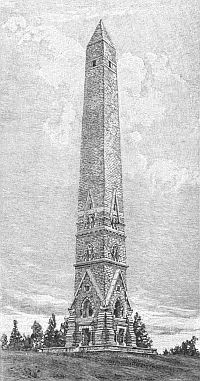
THE SARATOGA MONUMENT
This is the most suitable place for making mention of the Saratoga monument, which was erected in 1883, but is not yet completed. The obelisk, 155 feet in height, stands upon a bluff about 300 feet above the Hudson river, and just south of the road from Schuylerville to Saratoga Springs. The view here given is taken from the southeast. The great pointed-arch niches in the base, just over the doorways, are occupied by bronze statues of heroic size. Of these it was necessary that one should be the unworthy Gates, who commanded the army and received Burgoyne’s surrender. The second and third are obviously Schuyler and Morgan. The fourth niche is vacant. The place belongs to Arnold, who was especially the hero of Saratoga. But for Arnold, the relieving army of St. Leger might have come down the Mohawk valley. But for Arnold, the 19th of September would have seen Gates’s position turned at Bemis Heights. But for Arnold the victory of October 7th would probably have been indecisive, so that time would have been allowed for Clinton to come up the Hudson. In commemorating Saratoga, to leave Arnold unnoticed would be impossible. He has therefore his niche, but it is vacant. When the monument is completed, the names of the four generals are to be inscribed below their niches, and then the empty niche will speak as eloquently as the black veil that in the long series of portraits of Venetian doges covers the place of Marino Faliero.
In the view here given, the empty niche is seen on the left. The niche on the right, or east, contains (on almost too small a scale to be here visible) the statue of Schuyler, with folded arms, gazing upon the field of surrender where he ought to have presided. On the north side stands Gates with a spy-glass, as in the final battle; while Arnold was winning victory for him, he stood on Bemis Heights to watch what he supposed would be the retreat of the Americans! On the west side Morgan is in the attitude of ordering his sharpshooter Tim Murphy to fire upon General Fraser. These poses were suggested by Colonel William Leete Stone, secretary of the Saratoga Monument Association, to whom, indeed, the monument owes its existence.
The interior of the monument is finely decorated with bas-reliefs of scenes in the Burgoyne campaign.
[39] It was the sons of these invincible men who vanquished Wellington’s veterans in the brief but acute agony at New Orleans; it was their grandsons and great-grandsons who came so near vanquishing Grant at Shiloh and Rosecrans at Stone River.
[40] “History, perhaps, does not furnish an instance [he means another instance] of a battle gained under all the disadvantages which the British troops ... had to contend against at Guilford. Nor is there, perhaps, on the records of history, an instance of a battle fought with more determined perseverance than was shown by the British troops on that memorable day.” Stedman, History of the American War, London, 1794, ii. 347.
[41] It is interesting to contrast with the movements of Cornwallis those of an eminent general in more recent times. Early in 1865 General Sherman was at Columbia, on the Congaree river, about thirty miles southwest from Camden, and the difficult task before him was, without any secure base of operations nearer than Savannah, to push the Confederate forces northward to a decisive defeat in North Carolina. With this end in view, Sherman feigned to be aiming at Charlotte, while in reality he moved the bulk of his army northeasterly across the Pedee and Cape Fear rivers to Goldsborough, near the coast, where he established a new and secure base of operations. The battle of Bentonville, fought just before Sherman reached this base, was the unsuccessful attempt of his skilful antagonist, Joseph Johnston, to prevent his reaching it. Sherman’s march northwestward from his new base was well secured, and Johnston’s surrender near Hillsborough was a natural sequel. But—as my friend, Mr. John Codman Ropes, in a letter to me once pointed out—"had Sherman pursued his march from Columbia to Charlotte, and thence until he had met and fought Johnston, the result of the inevitable losses of the battle, leaving the question of victory aside, might have been such as to compel a retreat to Savannah.”
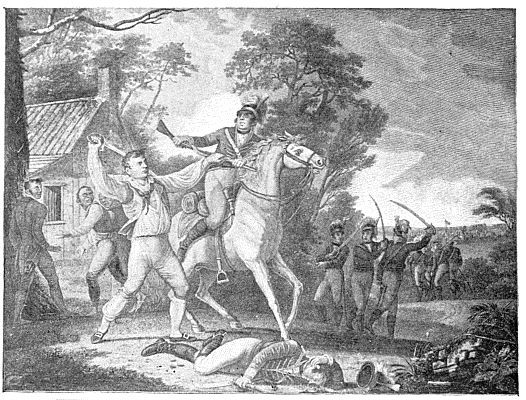
FRANCISCO’S SKIRMISH WITH TARLETON’S DRAGOONS
Just after the fight at Green Spring Tarleton made a raid through Amelia county and as far as Bedford, a hundred miles west of Petersburg. One of the incidents of this raid was made the subject of an engraving that was published in 1814 and soon became a familiar sight on the walls of public coffee-rooms and private parlours. Peter Francisco was a Portuguese waif, an indentured servant of Anthony Winston. As he grew to manhood his strength was such that he could lift upon his shoulder a cannon weighing half a ton, and his agility was equally remarkable. He entered the Continental service in 1777, in his seventeenth year, and fought at Brandywine, Germantown, Fort Mifflin, Monmouth, Stony Point, Camden, Cowpens, and Guilford, where he was wounded and left for dead. Plenty of life remained in him, however. On a July day, somewhere in Amelia county, alone and unarmed, he fell in with nine of Tarleton’s dragoons, one of whom demanded his shoe-buckles. “Take them off yourself,” said the quick-witted fellow-countryman of Magellan. As the man stooped to do the unbuckling, the young giant snatched away his sword and crushed in his skull with a single blow. Then quickly turning he slew two others, one of whom sat on horseback snapping a musket at him. At this moment Tarleton’s troop of 400 men appeared in the distance, whereupon the astute Francisco shouted in tremendous voice some words of command as if to an approaching party of his own. The six unhurt dragoons, who happened to be dismounted, were dazed with the sudden fury of Francisco’s attack, and at his deafening yell they fled in a panic, leaving their horses. These things all happened in the twinkling of an eye. Then Francisco vaulted into the saddle of one of the horses, seized the others by their bridles, and made off through the woods to Prince Edward Court House, where he sold all the horses save one noble charger which he named Tarleton and kept as his pet for many years. See Winston’s Peter Francisco, Soldier of the Revolution, Richmond, 1893.
The above incidents are epitomized in the picture without much regard to accuracy.
[43] This slaughter, though sanctioned by European rules of warfare at that time, was not in accordance with usage in English America, either on the part of British or of Continentals. It was an instance of exceptional cruelty, and must be pronounced a serious blot upon the British record. See above, p. 116.
[44] He died in London, June 14, 1801, and his burial in Brompton cemetery is mentioned in the Gentleman’s Magazine, lxxi. 580.
[45] In using such a word as “gratitude” in this connection, one should not forget that the purposes of France, in helping us, were purely selfish. The feeling of the French government toward us was not really friendly, and its help was doled out with as niggardly a hand as possible. An instance of this was furnished immediately after the surrender of Yorktown, when Lafayette proposed to Grasse a combined movement upon Charleston in concert with Greene, but Grasse obstinately refused. See Harvard University Library, Sparks MSS. Such a movement promised success, though it might have entailed a battle with the British fleet. But Grasse was faithful to the policy of Vergennes, to help the Americans just enough, but not too much. This policy is discussed in my Critical Period of American History, chap, i., “Results of Yorktown,” in which the story is continued from the present chapter.
In the table of contents for Volume 2, the word ‘surrounded’ was mistakenly printed as ‘surrendered’. The surrender takes place two entries later. This has been corrected.
The following minor printer's errors, all in Volume 2, have been corrected as well.
| p. x | Cornwallis [surrendered/surrounded] at Yorktown | |
| p. 16 | a [a] miracle | ‘a’ duplicated on line break removed |
| p. 17 | with those of Great Brit[ia/ai]n | corrected |
| p. 142 | the ordi[n]ary | ‘n’ missing on hyphenation at a line break |
| p. 275 | without supplementary campaigns[,/.] | inadvertent comma |
Transcription of the text of paper prices.
STAMP-OFFICE,
Lincoln’s-Inn, 1765.
A
TABLE
Of the Prices of Parchment and Paper for the Service
of America.
| Parchment. | Paper | ||||||||||
|
|
Paper for Printing
| News. | Almanacks. | ||||||
|
|
Transcription of the text of Notice.
BOSTON, September, 27, 1774-
GENTLEMEN,
The committees of correspondence of this and several of the neighbouring towns, having taken into consideration the vast importance of withholding from the troops now here, labour, straw, timber, slitwork, boards, and in short every article excepting provisions necessary for their subsistance; and being under a necessity from their conduct of considering them as real enemies, we are fully satisfied that it is our bounden duty to withhold from them everything but what meer humanity requires; and therefore we must beg your close and serious attention to the inclosed resolves which were passed unanimously; and as unanimity in all our measures in this day of severe trial, is of the utmost consequence, we do earnestly recommend your co-operation in this measure, as conducive to the good of the whole.
We are,
Your Friends and Fellow Countrymen,
Signed by Order of the joint Committee,
William Cooper, Clerk
Transcription of the text of King’s Proclamation.
By the KING,
A PROCLAMATION
For suppressing Rebellion and Sedition.
GEORGE R.
Whereas many of Our Subjects in divers Parts of Our Colonies and Plantations in North America, misled by dangerous and ill-designing Men, and forgetting the Allegiance which they owe to the Power that has protected and sustained them, after various disorderly Acts committed in Disturbance of the Publick Peace, to the Obstruction of lawful Commerce, and to the Oppression of Our loyal Subjects carrying on the same, have at length proceeded to an open and avowed Rebellion, by arraying themselves in hostile Manner to withstand the Execution of the Law, and traitorously preparing, ordering, and levying War against Us. And whereas there is Reason to apprehend that such Rebellion hath been much promoted and encouraged by the traitorous Correspondence, Counsels, and Comfort of divers wicked and desperate Persons within this Realm: To the End therefore that none of Our Subjects may neglect or violate their Duty through Ignorance thereof, or through any Doubt of the Protection which the Law will afford to their Loyalty and Zeal; We have thought fit, by and with the Advice of Our Privy Council, to issue this Our Royal Proclamation, hereby declaring that not only all Our Officers Civil and Military are obliged to exert their utmost Endeavours to suppress such Rebellion, and to bring the Traitors to Justice; but that all Our Subjects of this Realm and the Dominions thereunto belonging are bound by Law to be aiding and assisting in the Suppression of such Rebellion, and to disclose and make known all traitorous Conspiracies and Attempts against Us, Our Crown and Dignity; And We do accordingly strictly charge and command all Our Officers as well Civil as Military, and all other Our obedient and loyal Subjects, to use their utmost Endeavours to withstand and suppress such Rebellion, and to disclose and make known all Treasons and traitorous Conspiracies which they shall know to be against Us, Our Crown and Dignity; and for that Purpose, that they transmit to One of Our Principal Secretaries of State, or other proper Officer, due and full Information of all Persons who shall be found carrying on Correspondence with, or in any Manner or Degree aiding or abetting the Persons now in open Arms and Rebellion against Our Government within any of Our Colonies and Plantations in North America, in order to bring to condign Punishment the Authors, Perpetrators, and Abettors of such traitorous Designs.
Given at Our Court at St. James’s, the Twenty-third day
of August, One thousand seven hundred and seventy-five,
in the Fifteenth Year of Our Reign.
God save the King.
LONDON:
Printed by Charles Eyre and William Strahan, Printers to the
King’s most Excellent Majesty. 1775.
Transcription of A Page from “COMMON SENSE”.
The Sun never shined on a cause of greater worth. ’Tis not the affair of a City, a County, a Province or a Kingdom; but of a Continent—of at least one eight part of the habitable Globe. ’Tis not the concern of a day, a year, or an age; posterity are virtually involved in the contest, and will be more or less affected even to the end of time by the proceedings now. Now Is the seed-time of Continental union, faith and honor. The least fracture now, will be like a name engraved with the point of a pin on the tender rind of a young oak; the wound will enlarge with the tree, and posterity read it in full grown characters.
By referring the matter from argument to arms, a new æra for politics is struck—a new method of thinking hath arisen. All plans, proposals, &c. prior to the 19th of April, i. e. to the commencement of hostilities, are like the almanacks of the last year; which tho’ proper then, are superseded and useless now. Whatever was advanced by the advocates on either side of the question then, terminated in one and the same point, viz. a union with Great-Britain; the only difference between the parties, was the method of effecting it; the one proposing force, the other friendship: but it hath so far happened that the first hath failed, and the second hath withdrawn her influence.
As much hath been said of the advantages of reconciliation, which like an agreeable dream, hath passed away, and left us as we were, it is but right that we should examine the contrary side of the argument, and enquire into some of the many material injuries which these Colonies sustain, and always will sustain, by being connected with, and dependant on Great-Britain.—To examine that connection and dependance, on the principles of nature and common sense, to see what we have to trust to if separated, and what we are to expect if dependant.
Transcription of the text of Clark’s Letter.
Colonel Clarks Compliments to Mr Hamilton and begs leave to inform him that Col. Clark will not agree to any other Terms than that of Mr Hamilton’s Surendering himself and Garrison, Prisoners at Discretion.
If Mr Hamilton is Desirous of a Conferance with Col. Clark he will meet him at the Church with Captn Helms.
Feb 24th 1779 Geo Clark
End of the Project Gutenberg EBook of The American Revolution, by John Fiske
*** END OF THIS PROJECT GUTENBERG EBOOK THE AMERICAN REVOLUTION ***
***** This file should be named 41266-h.htm or 41266-h.zip *****
This and all associated files of various formats will be found in:
http://www.gutenberg.org/4/1/2/6/41266/
Produced by Charlene Taylor, KD Weeks, Charles Franks and
the Online Distributed Proofreading Team at
http://www.pgdp.net
Updated editions will replace the previous one--the old editions
will be renamed.
Creating the works from public domain print editions means that no
one owns a United States copyright in these works, so the Foundation
(and you!) can copy and distribute it in the United States without
permission and without paying copyright royalties. Special rules,
set forth in the General Terms of Use part of this license, apply to
copying and distributing Project Gutenberg-tm electronic works to
protect the PROJECT GUTENBERG-tm concept and trademark. Project
Gutenberg is a registered trademark, and may not be used if you
charge for the eBooks, unless you receive specific permission. If you
do not charge anything for copies of this eBook, complying with the
rules is very easy. You may use this eBook for nearly any purpose
such as creation of derivative works, reports, performances and
research. They may be modified and printed and given away--you may do
practically ANYTHING with public domain eBooks. Redistribution is
subject to the trademark license, especially commercial
redistribution.
*** START: FULL LICENSE ***
THE FULL PROJECT GUTENBERG LICENSE
PLEASE READ THIS BEFORE YOU DISTRIBUTE OR USE THIS WORK
To protect the Project Gutenberg-tm mission of promoting the free
distribution of electronic works, by using or distributing this work
(or any other work associated in any way with the phrase "Project
Gutenberg"), you agree to comply with all the terms of the Full Project
Gutenberg-tm License available with this file or online at
www.gutenberg.org/license.
Section 1. General Terms of Use and Redistributing Project Gutenberg-tm
electronic works
1.A. By reading or using any part of this Project Gutenberg-tm
electronic work, you indicate that you have read, understand, agree to
and accept all the terms of this license and intellectual property
(trademark/copyright) agreement. If you do not agree to abide by all
the terms of this agreement, you must cease using and return or destroy
all copies of Project Gutenberg-tm electronic works in your possession.
If you paid a fee for obtaining a copy of or access to a Project
Gutenberg-tm electronic work and you do not agree to be bound by the
terms of this agreement, you may obtain a refund from the person or
entity to whom you paid the fee as set forth in paragraph 1.E.8.
1.B. "Project Gutenberg" is a registered trademark. It may only be
used on or associated in any way with an electronic work by people who
agree to be bound by the terms of this agreement. There are a few
things that you can do with most Project Gutenberg-tm electronic works
even without complying with the full terms of this agreement. See
paragraph 1.C below. There are a lot of things you can do with Project
Gutenberg-tm electronic works if you follow the terms of this agreement
and help preserve free future access to Project Gutenberg-tm electronic
works. See paragraph 1.E below.
1.C. The Project Gutenberg Literary Archive Foundation ("the Foundation"
or PGLAF), owns a compilation copyright in the collection of Project
Gutenberg-tm electronic works. Nearly all the individual works in the
collection are in the public domain in the United States. If an
individual work is in the public domain in the United States and you are
located in the United States, we do not claim a right to prevent you from
copying, distributing, performing, displaying or creating derivative
works based on the work as long as all references to Project Gutenberg
are removed. Of course, we hope that you will support the Project
Gutenberg-tm mission of promoting free access to electronic works by
freely sharing Project Gutenberg-tm works in compliance with the terms of
this agreement for keeping the Project Gutenberg-tm name associated with
the work. You can easily comply with the terms of this agreement by
keeping this work in the same format with its attached full Project
Gutenberg-tm License when you share it without charge with others.
1.D. The copyright laws of the place where you are located also govern
what you can do with this work. Copyright laws in most countries are in
a constant state of change. If you are outside the United States, check
the laws of your country in addition to the terms of this agreement
before downloading, copying, displaying, performing, distributing or
creating derivative works based on this work or any other Project
Gutenberg-tm work. The Foundation makes no representations concerning
the copyright status of any work in any country outside the United
States.
1.E. Unless you have removed all references to Project Gutenberg:
1.E.1. The following sentence, with active links to, or other immediate
access to, the full Project Gutenberg-tm License must appear prominently
whenever any copy of a Project Gutenberg-tm work (any work on which the
phrase "Project Gutenberg" appears, or with which the phrase "Project
Gutenberg" is associated) is accessed, displayed, performed, viewed,
copied or distributed:
This eBook is for the use of anyone anywhere at no cost and with
almost no restrictions whatsoever. You may copy it, give it away or
re-use it under the terms of the Project Gutenberg License included
with this eBook or online at www.gutenberg.org
1.E.2. If an individual Project Gutenberg-tm electronic work is derived
from the public domain (does not contain a notice indicating that it is
posted with permission of the copyright holder), the work can be copied
and distributed to anyone in the United States without paying any fees
or charges. If you are redistributing or providing access to a work
with the phrase "Project Gutenberg" associated with or appearing on the
work, you must comply either with the requirements of paragraphs 1.E.1
through 1.E.7 or obtain permission for the use of the work and the
Project Gutenberg-tm trademark as set forth in paragraphs 1.E.8 or
1.E.9.
1.E.3. If an individual Project Gutenberg-tm electronic work is posted
with the permission of the copyright holder, your use and distribution
must comply with both paragraphs 1.E.1 through 1.E.7 and any additional
terms imposed by the copyright holder. Additional terms will be linked
to the Project Gutenberg-tm License for all works posted with the
permission of the copyright holder found at the beginning of this work.
1.E.4. Do not unlink or detach or remove the full Project Gutenberg-tm
License terms from this work, or any files containing a part of this
work or any other work associated with Project Gutenberg-tm.
1.E.5. Do not copy, display, perform, distribute or redistribute this
electronic work, or any part of this electronic work, without
prominently displaying the sentence set forth in paragraph 1.E.1 with
active links or immediate access to the full terms of the Project
Gutenberg-tm License.
1.E.6. You may convert to and distribute this work in any binary,
compressed, marked up, nonproprietary or proprietary form, including any
word processing or hypertext form. However, if you provide access to or
distribute copies of a Project Gutenberg-tm work in a format other than
"Plain Vanilla ASCII" or other format used in the official version
posted on the official Project Gutenberg-tm web site (www.gutenberg.org),
you must, at no additional cost, fee or expense to the user, provide a
copy, a means of exporting a copy, or a means of obtaining a copy upon
request, of the work in its original "Plain Vanilla ASCII" or other
form. Any alternate format must include the full Project Gutenberg-tm
License as specified in paragraph 1.E.1.
1.E.7. Do not charge a fee for access to, viewing, displaying,
performing, copying or distributing any Project Gutenberg-tm works
unless you comply with paragraph 1.E.8 or 1.E.9.
1.E.8. You may charge a reasonable fee for copies of or providing
access to or distributing Project Gutenberg-tm electronic works provided
that
- You pay a royalty fee of 20% of the gross profits you derive from
the use of Project Gutenberg-tm works calculated using the method
you already use to calculate your applicable taxes. The fee is
owed to the owner of the Project Gutenberg-tm trademark, but he
has agreed to donate royalties under this paragraph to the
Project Gutenberg Literary Archive Foundation. Royalty payments
must be paid within 60 days following each date on which you
prepare (or are legally required to prepare) your periodic tax
returns. Royalty payments should be clearly marked as such and
sent to the Project Gutenberg Literary Archive Foundation at the
address specified in Section 4, "Information about donations to
the Project Gutenberg Literary Archive Foundation."
- You provide a full refund of any money paid by a user who notifies
you in writing (or by e-mail) within 30 days of receipt that s/he
does not agree to the terms of the full Project Gutenberg-tm
License. You must require such a user to return or
destroy all copies of the works possessed in a physical medium
and discontinue all use of and all access to other copies of
Project Gutenberg-tm works.
- You provide, in accordance with paragraph 1.F.3, a full refund of any
money paid for a work or a replacement copy, if a defect in the
electronic work is discovered and reported to you within 90 days
of receipt of the work.
- You comply with all other terms of this agreement for free
distribution of Project Gutenberg-tm works.
1.E.9. If you wish to charge a fee or distribute a Project Gutenberg-tm
electronic work or group of works on different terms than are set
forth in this agreement, you must obtain permission in writing from
both the Project Gutenberg Literary Archive Foundation and Michael
Hart, the owner of the Project Gutenberg-tm trademark. Contact the
Foundation as set forth in Section 3 below.
1.F.
1.F.1. Project Gutenberg volunteers and employees expend considerable
effort to identify, do copyright research on, transcribe and proofread
public domain works in creating the Project Gutenberg-tm
collection. Despite these efforts, Project Gutenberg-tm electronic
works, and the medium on which they may be stored, may contain
"Defects," such as, but not limited to, incomplete, inaccurate or
corrupt data, transcription errors, a copyright or other intellectual
property infringement, a defective or damaged disk or other medium, a
computer virus, or computer codes that damage or cannot be read by
your equipment.
1.F.2. LIMITED WARRANTY, DISCLAIMER OF DAMAGES - Except for the "Right
of Replacement or Refund" described in paragraph 1.F.3, the Project
Gutenberg Literary Archive Foundation, the owner of the Project
Gutenberg-tm trademark, and any other party distributing a Project
Gutenberg-tm electronic work under this agreement, disclaim all
liability to you for damages, costs and expenses, including legal
fees. YOU AGREE THAT YOU HAVE NO REMEDIES FOR NEGLIGENCE, STRICT
LIABILITY, BREACH OF WARRANTY OR BREACH OF CONTRACT EXCEPT THOSE
PROVIDED IN PARAGRAPH 1.F.3. YOU AGREE THAT THE FOUNDATION, THE
TRADEMARK OWNER, AND ANY DISTRIBUTOR UNDER THIS AGREEMENT WILL NOT BE
LIABLE TO YOU FOR ACTUAL, DIRECT, INDIRECT, CONSEQUENTIAL, PUNITIVE OR
INCIDENTAL DAMAGES EVEN IF YOU GIVE NOTICE OF THE POSSIBILITY OF SUCH
DAMAGE.
1.F.3. LIMITED RIGHT OF REPLACEMENT OR REFUND - If you discover a
defect in this electronic work within 90 days of receiving it, you can
receive a refund of the money (if any) you paid for it by sending a
written explanation to the person you received the work from. If you
received the work on a physical medium, you must return the medium with
your written explanation. The person or entity that provided you with
the defective work may elect to provide a replacement copy in lieu of a
refund. If you received the work electronically, the person or entity
providing it to you may choose to give you a second opportunity to
receive the work electronically in lieu of a refund. If the second copy
is also defective, you may demand a refund in writing without further
opportunities to fix the problem.
1.F.4. Except for the limited right of replacement or refund set forth
in paragraph 1.F.3, this work is provided to you 'AS-IS', WITH NO OTHER
WARRANTIES OF ANY KIND, EXPRESS OR IMPLIED, INCLUDING BUT NOT LIMITED TO
WARRANTIES OF MERCHANTABILITY OR FITNESS FOR ANY PURPOSE.
1.F.5. Some states do not allow disclaimers of certain implied
warranties or the exclusion or limitation of certain types of damages.
If any disclaimer or limitation set forth in this agreement violates the
law of the state applicable to this agreement, the agreement shall be
interpreted to make the maximum disclaimer or limitation permitted by
the applicable state law. The invalidity or unenforceability of any
provision of this agreement shall not void the remaining provisions.
1.F.6. INDEMNITY - You agree to indemnify and hold the Foundation, the
trademark owner, any agent or employee of the Foundation, anyone
providing copies of Project Gutenberg-tm electronic works in accordance
with this agreement, and any volunteers associated with the production,
promotion and distribution of Project Gutenberg-tm electronic works,
harmless from all liability, costs and expenses, including legal fees,
that arise directly or indirectly from any of the following which you do
or cause to occur: (a) distribution of this or any Project Gutenberg-tm
work, (b) alteration, modification, or additions or deletions to any
Project Gutenberg-tm work, and (c) any Defect you cause.
Section 2. Information about the Mission of Project Gutenberg-tm
Project Gutenberg-tm is synonymous with the free distribution of
electronic works in formats readable by the widest variety of computers
including obsolete, old, middle-aged and new computers. It exists
because of the efforts of hundreds of volunteers and donations from
people in all walks of life.
Volunteers and financial support to provide volunteers with the
assistance they need are critical to reaching Project Gutenberg-tm's
goals and ensuring that the Project Gutenberg-tm collection will
remain freely available for generations to come. In 2001, the Project
Gutenberg Literary Archive Foundation was created to provide a secure
and permanent future for Project Gutenberg-tm and future generations.
To learn more about the Project Gutenberg Literary Archive Foundation
and how your efforts and donations can help, see Sections 3 and 4
and the Foundation information page at www.gutenberg.org
Section 3. Information about the Project Gutenberg Literary Archive
Foundation
The Project Gutenberg Literary Archive Foundation is a non profit
501(c)(3) educational corporation organized under the laws of the
state of Mississippi and granted tax exempt status by the Internal
Revenue Service. The Foundation's EIN or federal tax identification
number is 64-6221541. Contributions to the Project Gutenberg
Literary Archive Foundation are tax deductible to the full extent
permitted by U.S. federal laws and your state's laws.
The Foundation's principal office is located at 4557 Melan Dr. S.
Fairbanks, AK, 99712., but its volunteers and employees are scattered
throughout numerous locations. Its business office is located at 809
North 1500 West, Salt Lake City, UT 84116, (801) 596-1887. Email
contact links and up to date contact information can be found at the
Foundation's web site and official page at www.gutenberg.org/contact
For additional contact information:
Dr. Gregory B. Newby
Chief Executive and Director
gbnewby@pglaf.org
Section 4. Information about Donations to the Project Gutenberg
Literary Archive Foundation
Project Gutenberg-tm depends upon and cannot survive without wide
spread public support and donations to carry out its mission of
increasing the number of public domain and licensed works that can be
freely distributed in machine readable form accessible by the widest
array of equipment including outdated equipment. Many small donations
($1 to $5,000) are particularly important to maintaining tax exempt
status with the IRS.
The Foundation is committed to complying with the laws regulating
charities and charitable donations in all 50 states of the United
States. Compliance requirements are not uniform and it takes a
considerable effort, much paperwork and many fees to meet and keep up
with these requirements. We do not solicit donations in locations
where we have not received written confirmation of compliance. To
SEND DONATIONS or determine the status of compliance for any
particular state visit www.gutenberg.org/donate
While we cannot and do not solicit contributions from states where we
have not met the solicitation requirements, we know of no prohibition
against accepting unsolicited donations from donors in such states who
approach us with offers to donate.
International donations are gratefully accepted, but we cannot make
any statements concerning tax treatment of donations received from
outside the United States. U.S. laws alone swamp our small staff.
Please check the Project Gutenberg Web pages for current donation
methods and addresses. Donations are accepted in a number of other
ways including checks, online payments and credit card donations.
To donate, please visit: www.gutenberg.org/donate
Section 5. General Information About Project Gutenberg-tm electronic
works.
Professor Michael S. Hart was the originator of the Project Gutenberg-tm
concept of a library of electronic works that could be freely shared
with anyone. For forty years, he produced and distributed Project
Gutenberg-tm eBooks with only a loose network of volunteer support.
Project Gutenberg-tm eBooks are often created from several printed
editions, all of which are confirmed as Public Domain in the U.S.
unless a copyright notice is included. Thus, we do not necessarily
keep eBooks in compliance with any particular paper edition.
Most people start at our Web site which has the main PG search facility:
www.gutenberg.org
This Web site includes information about Project Gutenberg-tm,
including how to make donations to the Project Gutenberg Literary
Archive Foundation, how to help produce our new eBooks, and how to
subscribe to our email newsletter to hear about new eBooks.